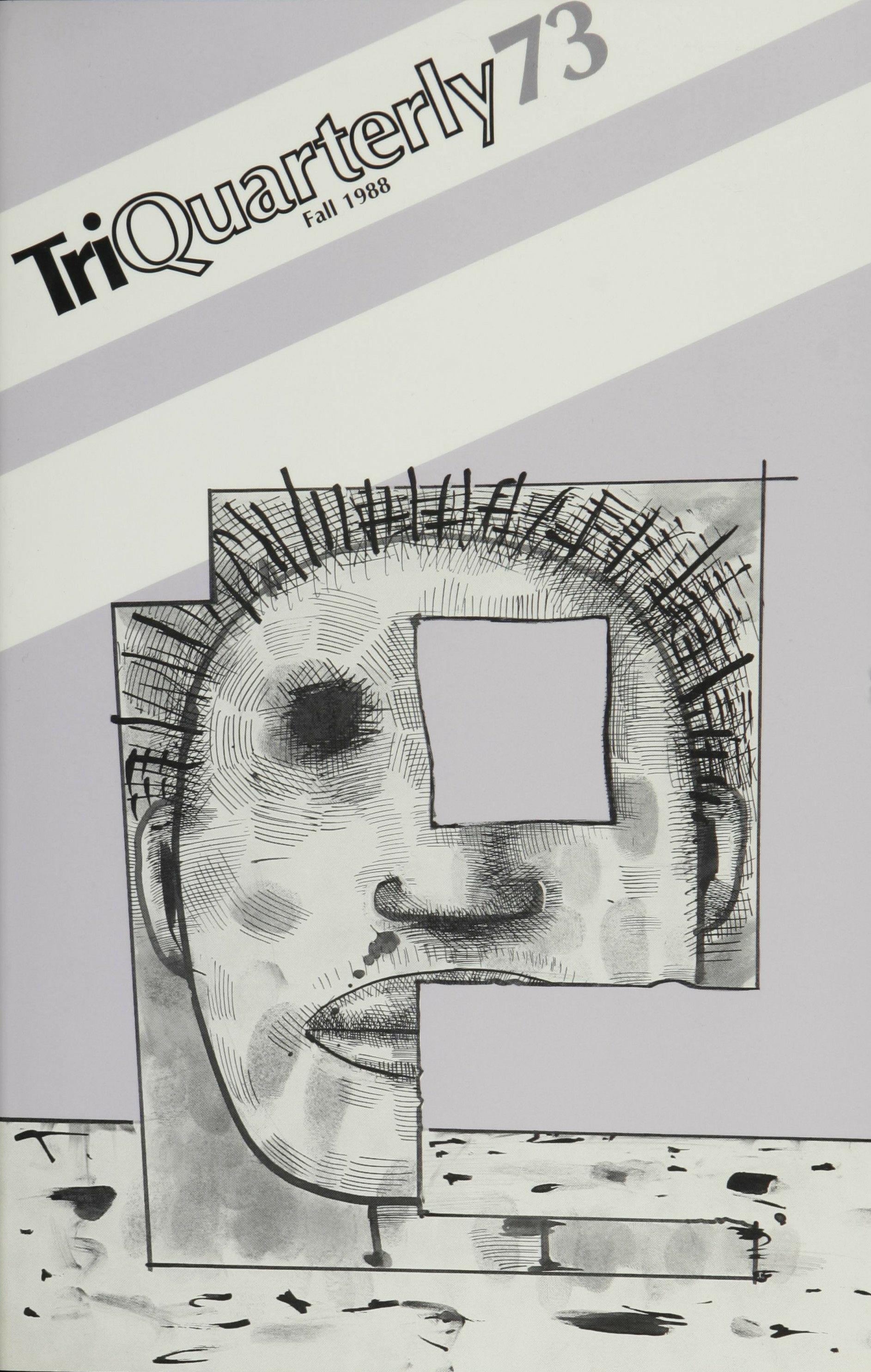
�..,.-
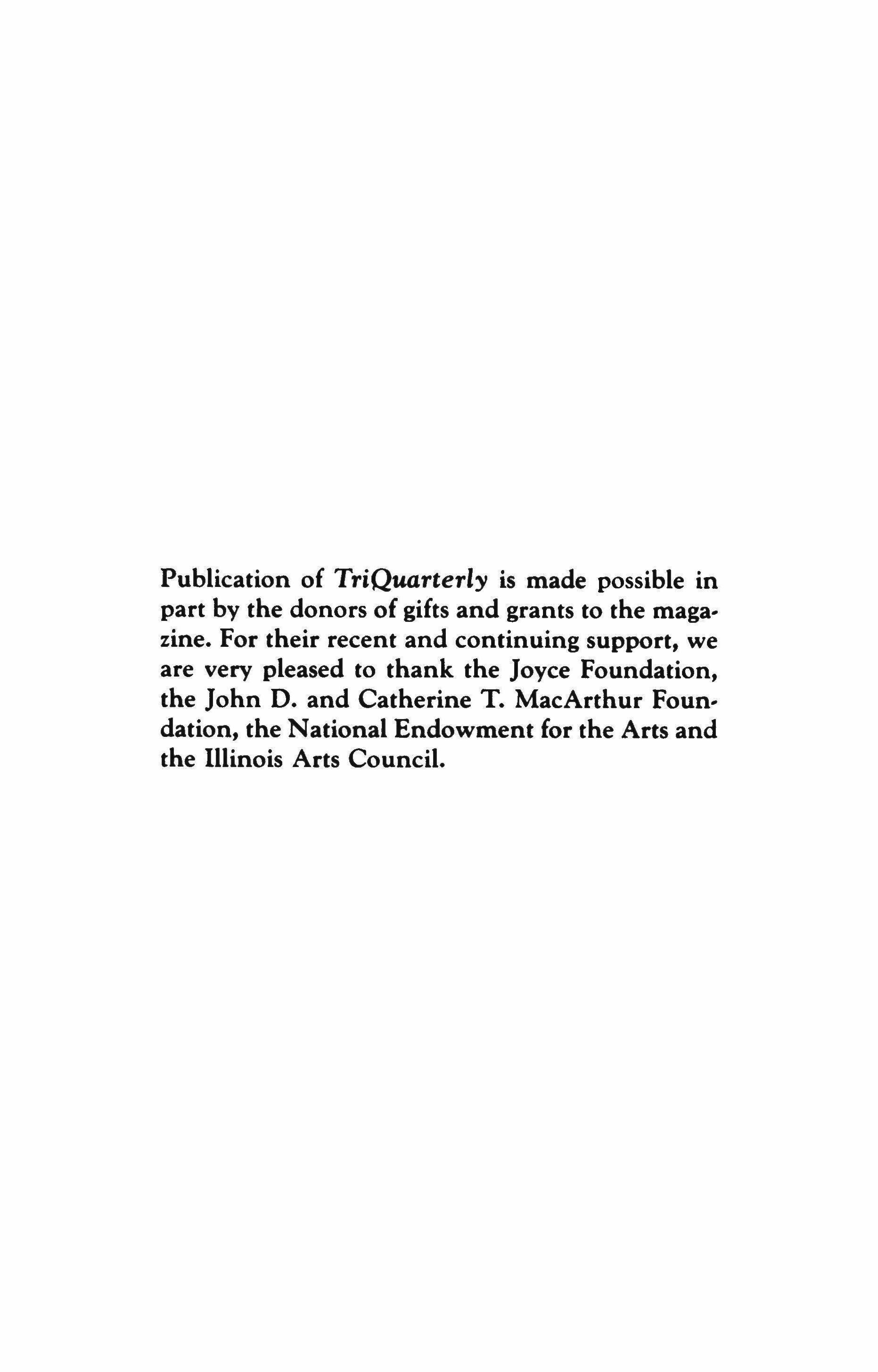
Publication of TTiQuaTteTly is made possible in part by the donors of gifts and grants to the magazine. For their recent and continuing support, we are very pleased to thank the Joyce Foundation, the John D. and Catherine T. MacArthur Foundation, the National Endowment for the Arts and the Illinois Arts Council.
Tri�73 Fall 1988
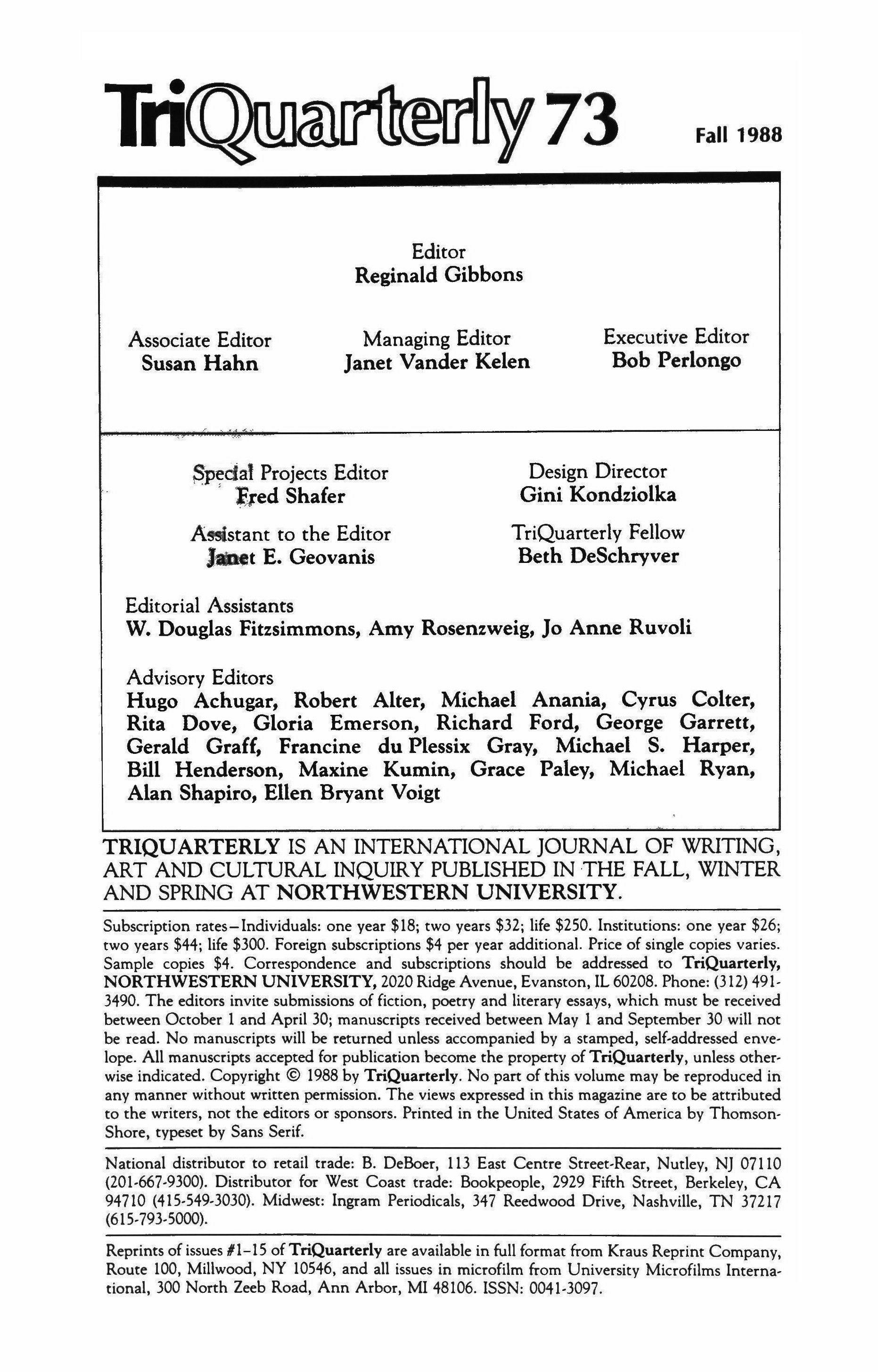
Associate Editor Susan Hahn
Editor
Reginald Gibbons
Managing Editor Janet Vander Kelen
$,pecfat Projects Editor �.red Shafer
A.stant to the Editor J_t E. Geovanis
Editorial Assistants
Executive Editor Bob Perlongo
Design Director Gini Kondziolka
TriQuarterly Fellow
Beth DeSchryver
W. Douglas Fitzsimmons, Amy Rosenzweig, Jo Anne Ruvoli
Advisory Editors
Hugo Achugar, Robert Alter, Michael Anania, Cyrus Colter, Rita Dove, Gloria Emerson, Richard Ford, George Garrett, Gerald Graff, Francine du Plessix Gray, Michael S. Harper, Bill Henderson, Maxine Kumin, Grace Paley, Michael Ryan, Alan Shapiro, Ellen Bryant Voigt
TRIQUARTERLY IS AN INTERNATIONAL JOURNAL OF WRITING, ART AND CULTURAL INQUIRY PUBLISHED IN THE FALL, WINTER AND SPRING AT NORTHWESTERN UNIVERSITY.
Subscription rates-Individuals: one year $18; two years $32; life $250. Institutions: one year $26; two years $44; life $300. Foreign subscriptions $4 per year additional. Price of single copies varies. Sample copies $4. Correspondence and subscriptions should be addressed to TriQuarterIy, NORTHWESTERN UNIVERSITY, 2020 Ridge Avenue, Evanston,IL 60208. Phone: (312) 4913490. The editors invite submissions of fiction, poetry and literary essays, which must be received between October 1 and April 30; manuscripts received between May 1 and September 30 will not be read. No manuscripts will be returned unless accompanied by a stamped, self-addressed envelope. All manuscripts accepted for publication become the property of TriQuarterly, unless otherwise indicated. Copyright © 1988 by TriQuarterIy. No part of this volume may be reproduced in any manner without written permission. The views expressed in this magazine are to be attributed to the writers, not the editors or sponsors. Printed in the United States of America by ThomsonShore, typeset by Sans Serif.
National distributor to retail trade: B. DeBoer, 113 East Centre Street-Rear, Nutley, NJ 07110 (201-667-9300). Distributor for West Coast trade: Bookpeople, 2929 Fifth Street, Berkeley, CA 94710 (415-549-3030). Midwest: Ingram Periodicals, 347 Reedwood Drive, Nashville, TN 37217 (615-793-5000).
Reprints of issues #1-15 of TriQuarterly are available in full format from Kraus Reprint Company, Route 100, Millwood, NY 10546, and all issues in microfilm from University Microfilms International, 300 North Zeeb Road, Ann Arbor, Ml48106. ISSN: 0041-3097.
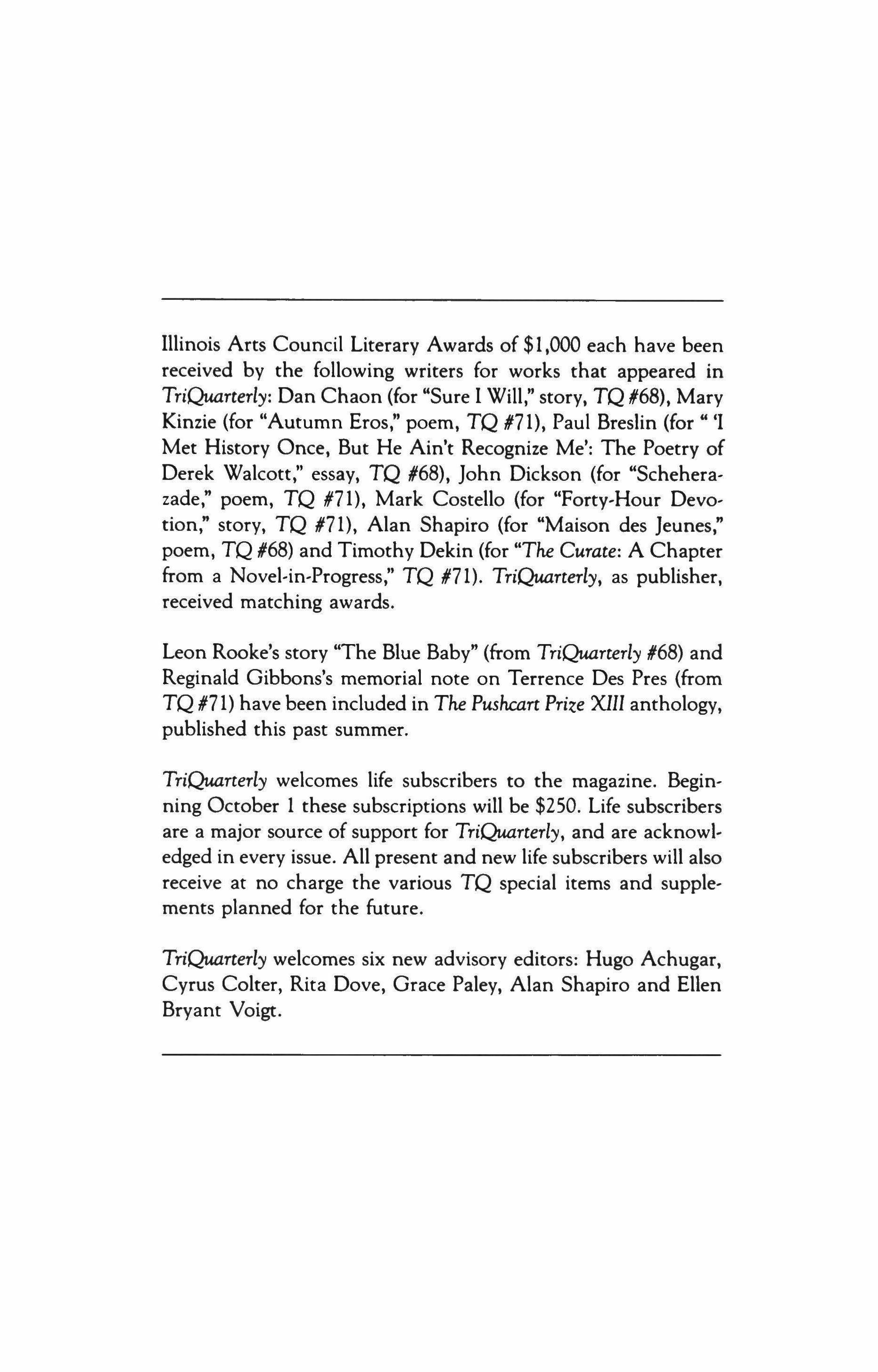
Illinois Arts Council Literary Awards of $1,000 each have been received by the following writers for works that appeared in TriQuarterly: Dan Chaon (for "Sure I Will," story, TQ #68), Mary Kinzie (for "Autumn Eros," poem, TQ #71), Paul Breslin (for" 'I Met History Once, But He Ain't Recognize Me': The Poetry of Derek Walcott," essay, TQ #68), John Dickson (for "Scheherazade," poem, TQ #71), Mark Costello (for "Forty-Hour Devotion," story, TQ #71), Alan Shapiro (for "Maison des [eunes," poem, TQ #68) and Timothy Dekin (for "The Curate: A Chapter from a Novel-in-Progress," TQ #71). TriQuarterly, as publisher, received matching awards.
Leon Rooke's story "The Blue Baby" (from TriQuarterly #68) and Reginald Gibbons's memorial note on Terrence Des Pres (from TQ #71) have been included in The Pushcart Prize XlII anthology, published this past summer.
TriQuarterly welcomes life subscribers to the magazine. Beginning October 1 these subscriptions will be $250. Life subscribers are a major source of support for TriQuarterly, and are acknowledged in every issue. All present and new life subscribers will also receive at no charge the various TQ special items and supplements planned for the future.
TriQuarterly welcomes six new advisory editors: Hugo Achugar, Cyrus Colter, Rita Dove, Grace Paley, Alan Shapiro and Ellen Bryant Voigt.
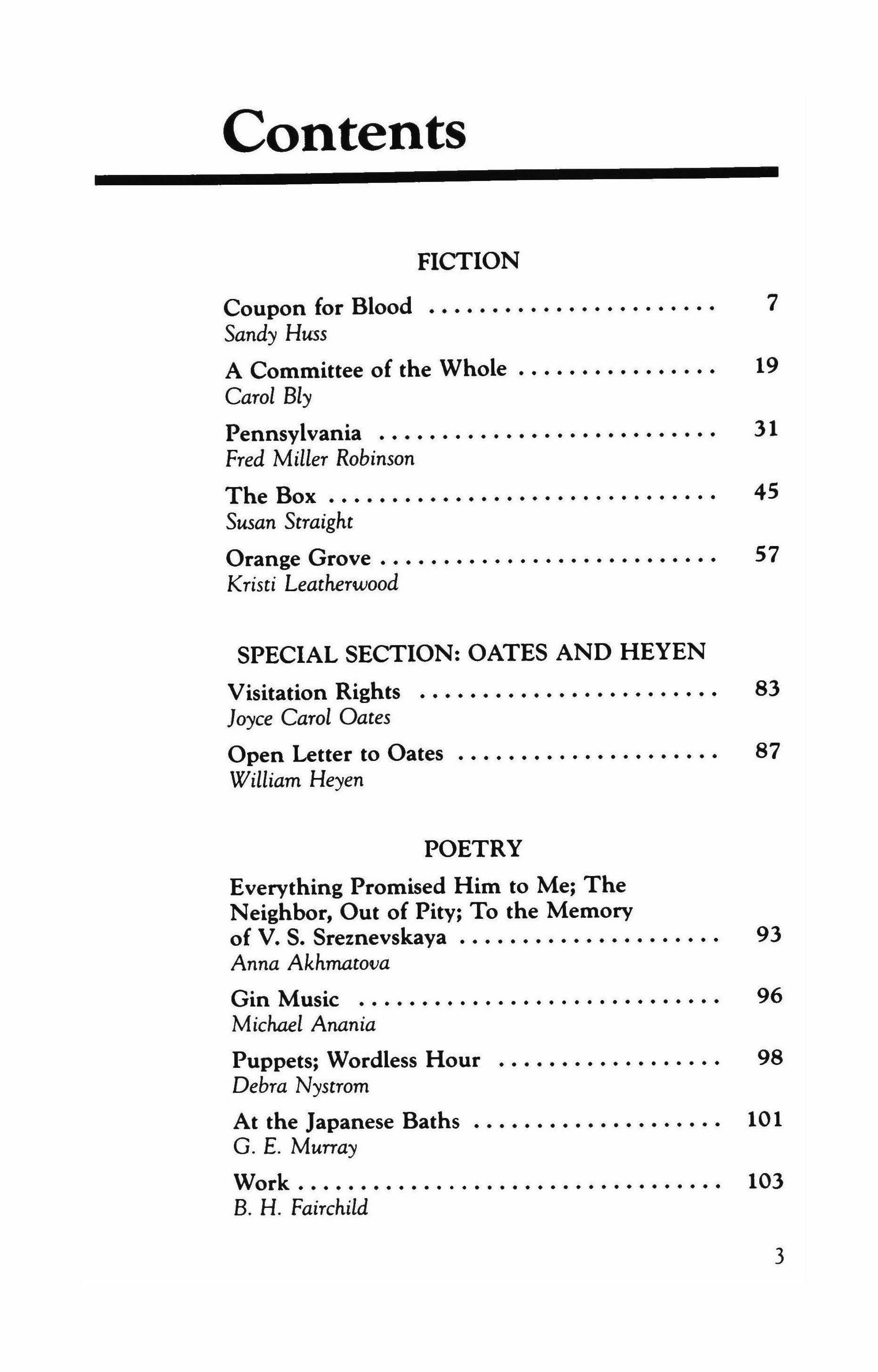
Contents FICTION Coupon for Blood 7 Sandy Huss A Committee of the Whole 19 Carol Bly Pennsylvania 31 Fred Miller Robinson The Box 45 Susan Straight Orange Grove 57 Kristi Leatherwood SPECIAL SECTION: OATES AND HEYEN Visitation Rights 83 Joyce Carol Oates Open Letter to Oates William Heyen 87 POETRY Everything Promised Him to Me; The Neighbor, Out of Pity; To the Memory of V. S. Sreznevskaya 93 Anna Akhmatova Gin Music 96 Michael Anania Puppets; Wordless Hour 98 Debra Nystrom At the Japanese Baths 101 G. E. Murray Work. .• 103 B. H. Fairchild 3
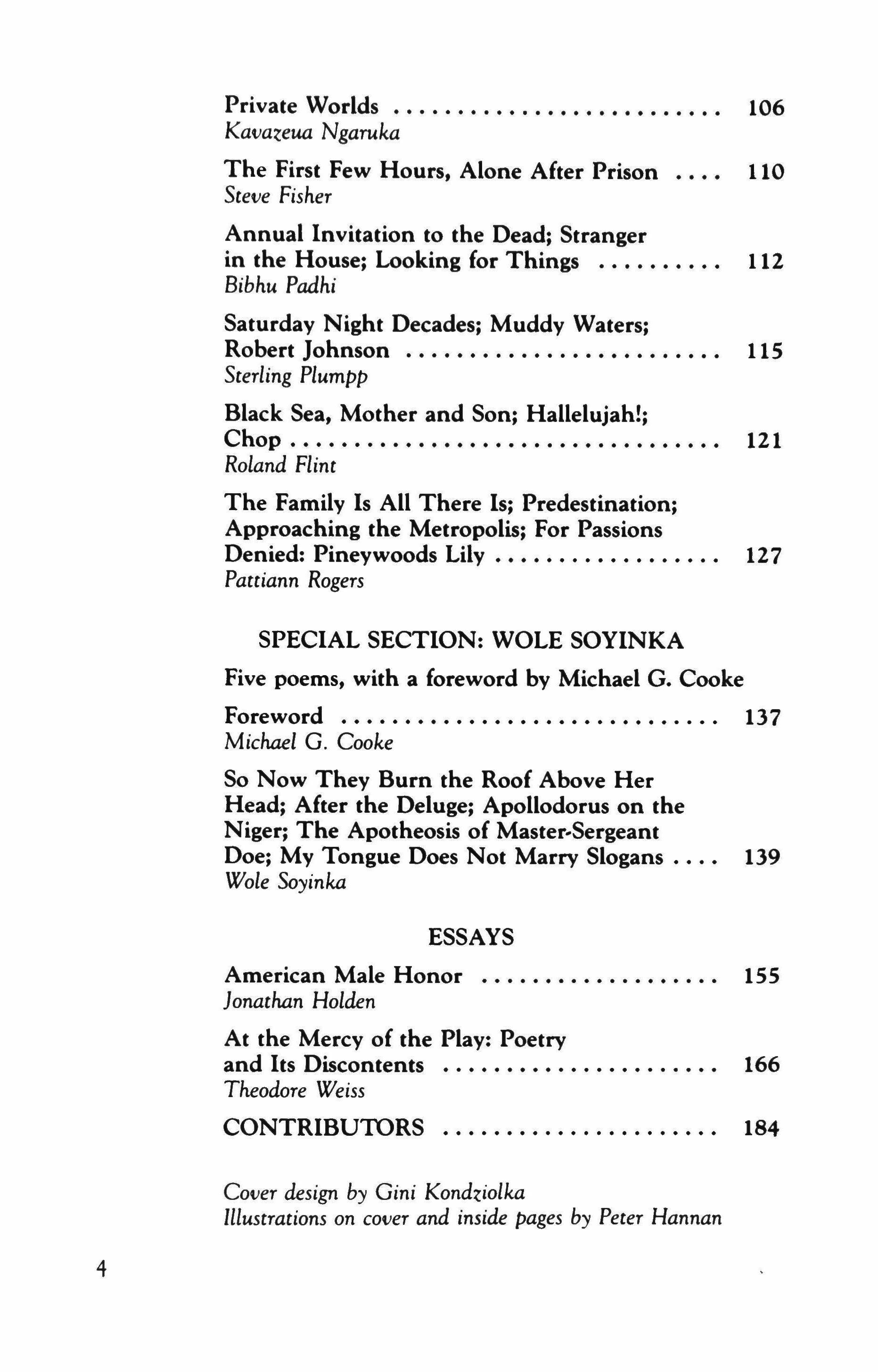
Black Sea, Mother and Son; Hallelujah!;
Flint The Family Is All There Is; Predestination; Approaching the Metropolis; For Passions
Private Worlds •.....•.••....•..•.•....•. 106 Kavazeua Ngaruka The First
Hours, Alone After Prison 110 Steve Fisher Annual
Stranger in the House; Looking for Things ...•.••... 112 Bibhu
Saturday
Robert Johnson .•..••..........••••..... 115 Sterling
Few
Invitation to the Dead;
Padhi
Night Decades; Muddy Waters;
Plumpp
121
Denied: Pineywoods Lily 127 Pattiann Rogers SPECIAL SECTION: WOLE SOYINKA Five poems,
foreword
Michael G. Cooke Foreword .•...••••.•.•....•.•....••.... 137 Michael
So
Niger;
Apotheosis
Master-Sergeant Doe; My Tongue Does Not Marry Slogans. 139 Wole Soyinka ESSAYS American Male Honor ••...••.•....••.... 155 Jonathan Holden At the Mercy of the Play: Poetry and Its Discontents •.•.•••............•.. 166 Theodore Weiss CONTRIBUTORS 184 Cover design by Gini Kondziolka Illustrations on cover and inside pages by Peter Hannan 4
Chop
Roland
with a
by
G. Cooke
Now They Burn the Roof Above Her Head; After the Deluge; Apollodorus on the
The
of

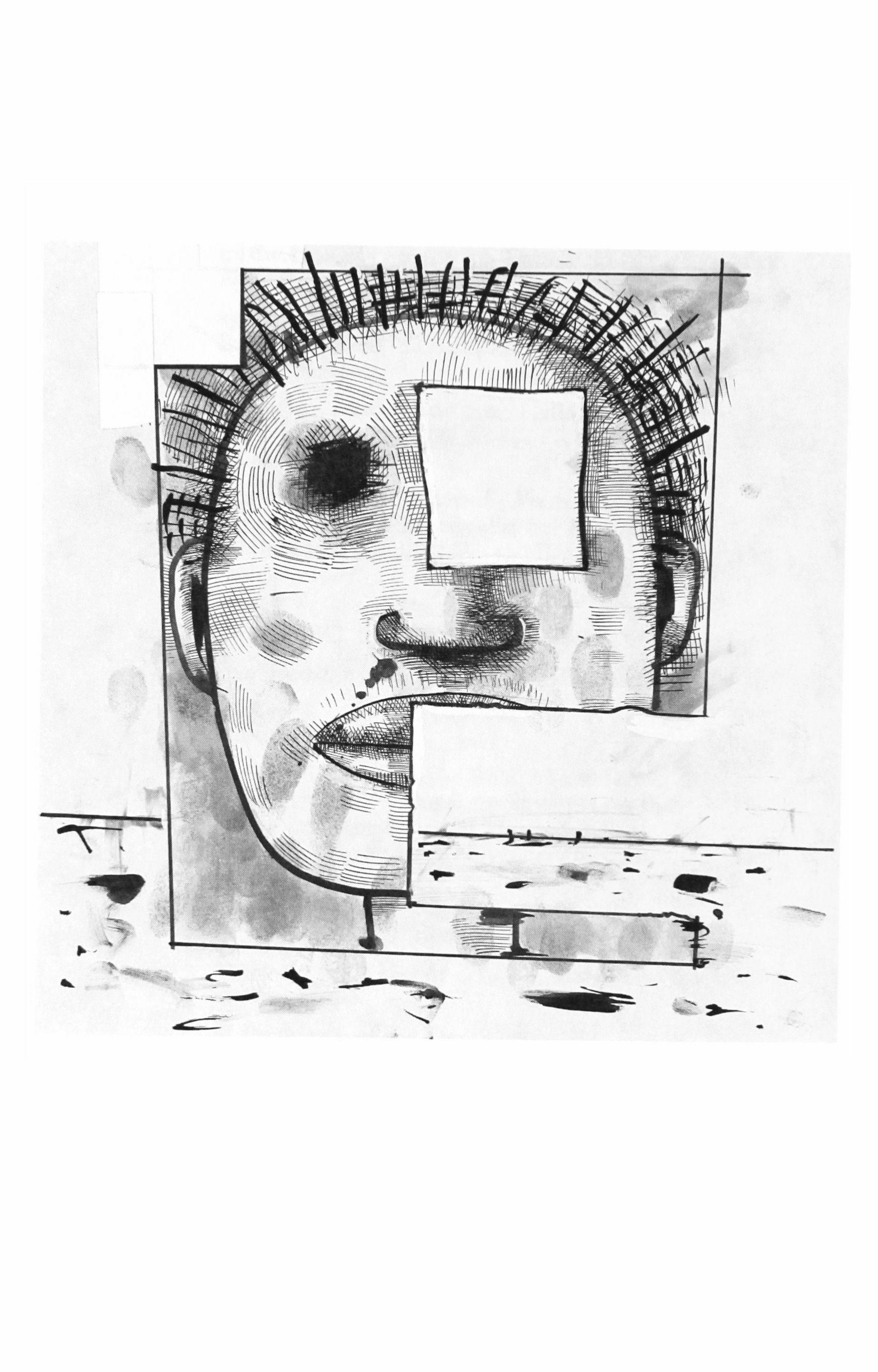
� 4--._--- 7
Coupon for Blood
Sandy Huss
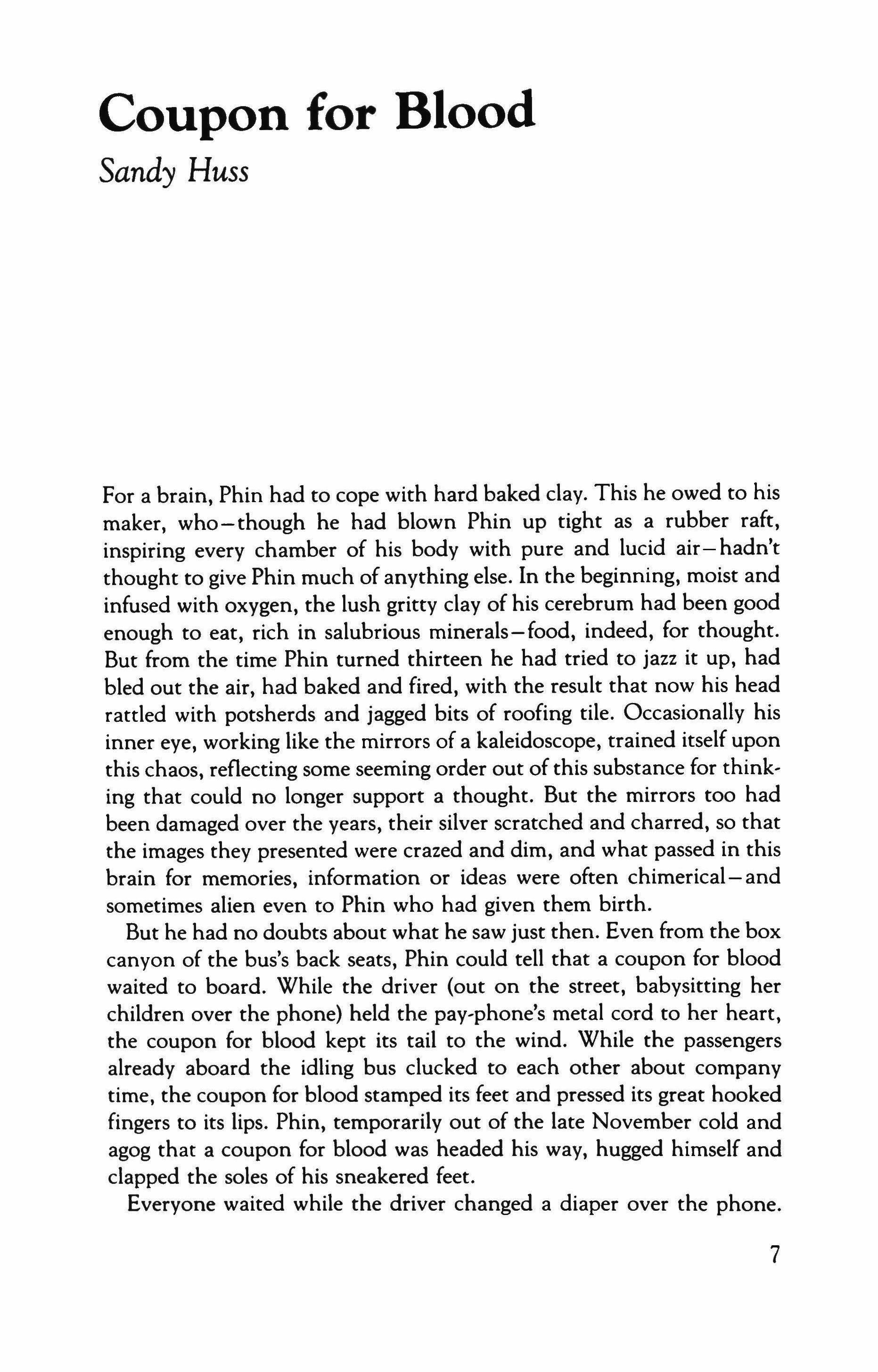
For a brain, Phin had to cope with hard baked clay. This he owed to his maker, who-though he had blown Phin up tight as a rubber raft, inspiring every chamber of his body with pure and lucid air- hadn't thought to give Phin much of anything else. In the beginning, moist and infused with oxygen, the lush gritty clay of his cerebrum had been good enough to eat, rich in salubrious minerals-food, indeed, for thought. But from the time Phin turned thirteen he had tried to jazz it up, had bled out the air, had baked and fired, with the result that now his head rattled with potsherds and jagged bits of roofing tile. Occasionally his inner eye, working like the mirrors of a kaleidoscope, trained itself upon this chaos, reflecting some seeming order out of this substance for thinking that could no longer support a thought. But the mirrors too had been damaged over the years, their silver scratched and charred, so that the images they presented were crazed and dim, and what passed in this brain for memories, information or ideas were often chimerical- and sometimes alien even to Phin who had given them birth.
But he had no doubts about what he saw just then. Even from the box canyon of the bus's back seats, Phin could tell that a coupon for blood waited to board. While the driver (out on the street, babysitting her children over the phone) held the pay-phone's metal cord to her heart, the coupon for blood kept its tail to the wind. While the passengers already aboard the idling bus clucked to each other about company time, the coupon for blood stamped its feet and pressed its great hooked fingers to its lips. Phin, temporarily out of the late November cold and agog that a coupon for blood was headed his way, hugged himself and clapped the soles of his sneakered feet.
Everyone waited while the driver changed a diaper over the phone.
7
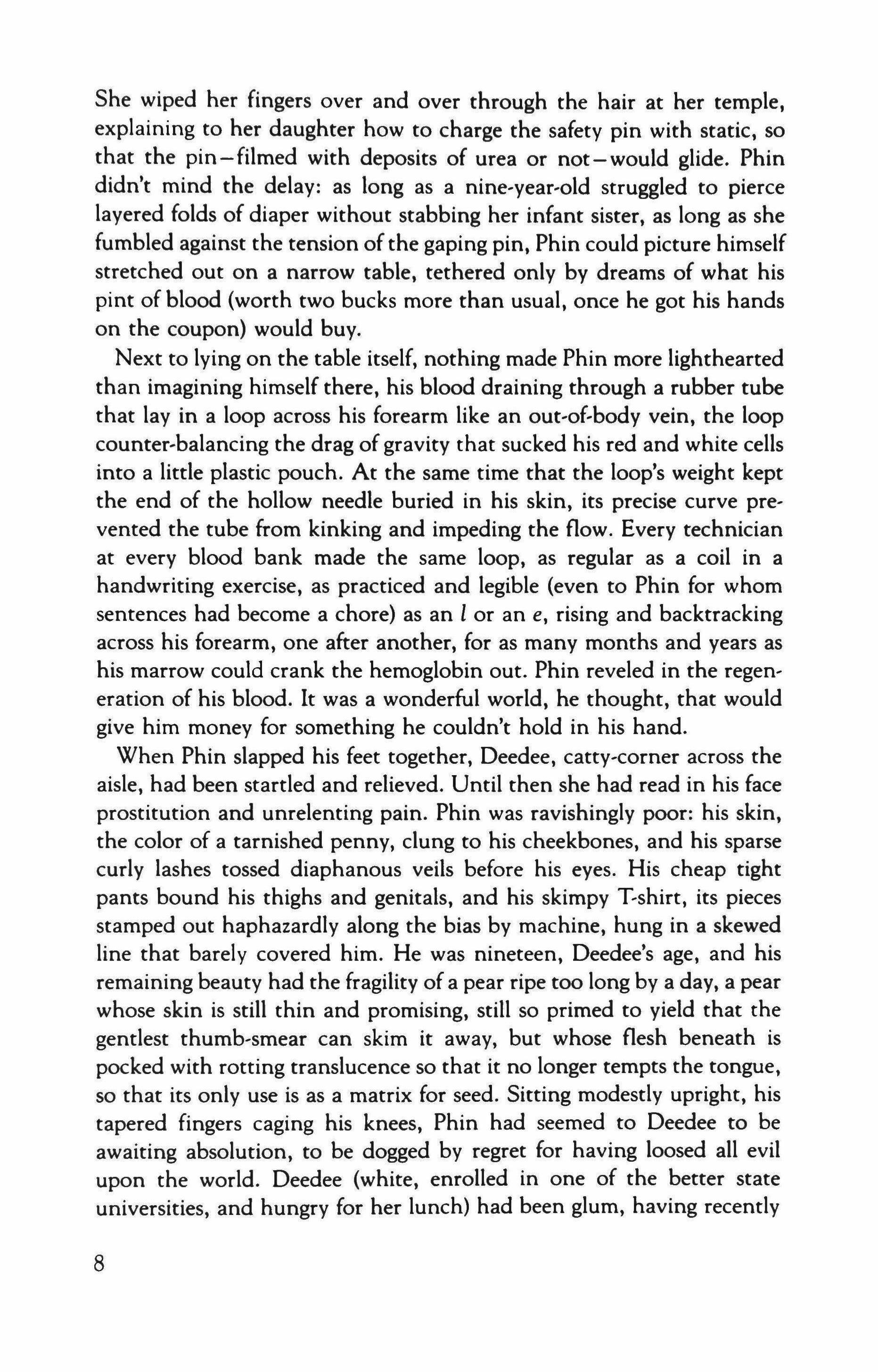
She wiped her fingers over and over through the hair at her temple, explaining to her daughter how to charge the safety pin with static, so that the pin-filmed with deposits of urea or not-would glide. Phin didn't mind the delay: as long as a nine-year-old struggled to pierce layered folds of diaper without stabbing her infant sister, as long as she fumbled against the tension ofthe gaping pin, Phin could picture himself stretched out on a narrow table, tethered only by dreams of what his pint of blood (worth two bucks more than usual, once he got his hands on the coupon) would buy.
Next to lying on the table itself, nothing made Phin more lighthearted than imagining himself there, his blood draining through a rubber tube that lay in a loop across his forearm like an out-of-body vein, the loop counter-balancing the drag of gravity that sucked his red and white cells into a little plastic pouch. At the same time that the loop's weight kept the end of the hollow needle buried in his skin, its precise curve prevented the tube from kinking and impeding the flow. Every technician at every blood bank made the same loop, as regular as a coil in a handwriting exercise, as practiced and legible (even to Phin for whom sentences had become a chore) as an I or an e, rising and backtracking across his forearm, one after another, for as many months and years as his marrow could crank the hemoglobin out. Phin reveled in the regeneration of his blood. It was a wonderful world, he thought, that would give him money for something he couldn't hold in his hand.
When Phin slapped his feet together, Deedee, catty-corner across the aisle, had been startled and relieved. Until then she had read in his face prostitution and unrelenting pain. Phin was ravishingly poor: his skin, the color of a tarnished penny, clung to his cheekbones, and his sparse curly lashes tossed diaphanous veils before his eyes. His cheap tight pants bound his thighs and genitals, and his skimpy T-shirt, its pieces stamped out haphazardly along the bias by machine, hung in a skewed line that barely covered him. He was nineteen, Deedee's age, and his remaining beauty had the fragility of a pear ripe too long by a day, a pear whose skin is still thin and promising, still so primed to yield that the gentlest thumb-smear can skim it away, but whose flesh beneath is pocked with rotting translucence so that it no longer tempts the tongue, so that its only use is as a matrix for seed. Sitting modestly upright, his tapered fingers caging his knees, Phin had seemed to Deedee to be awaiting absolution, to be dogged by regret for having loosed all evil upon the world. Deedee (white, enrolled in one of the better state universities, and hungry for her lunch) had been glum, having recently
8
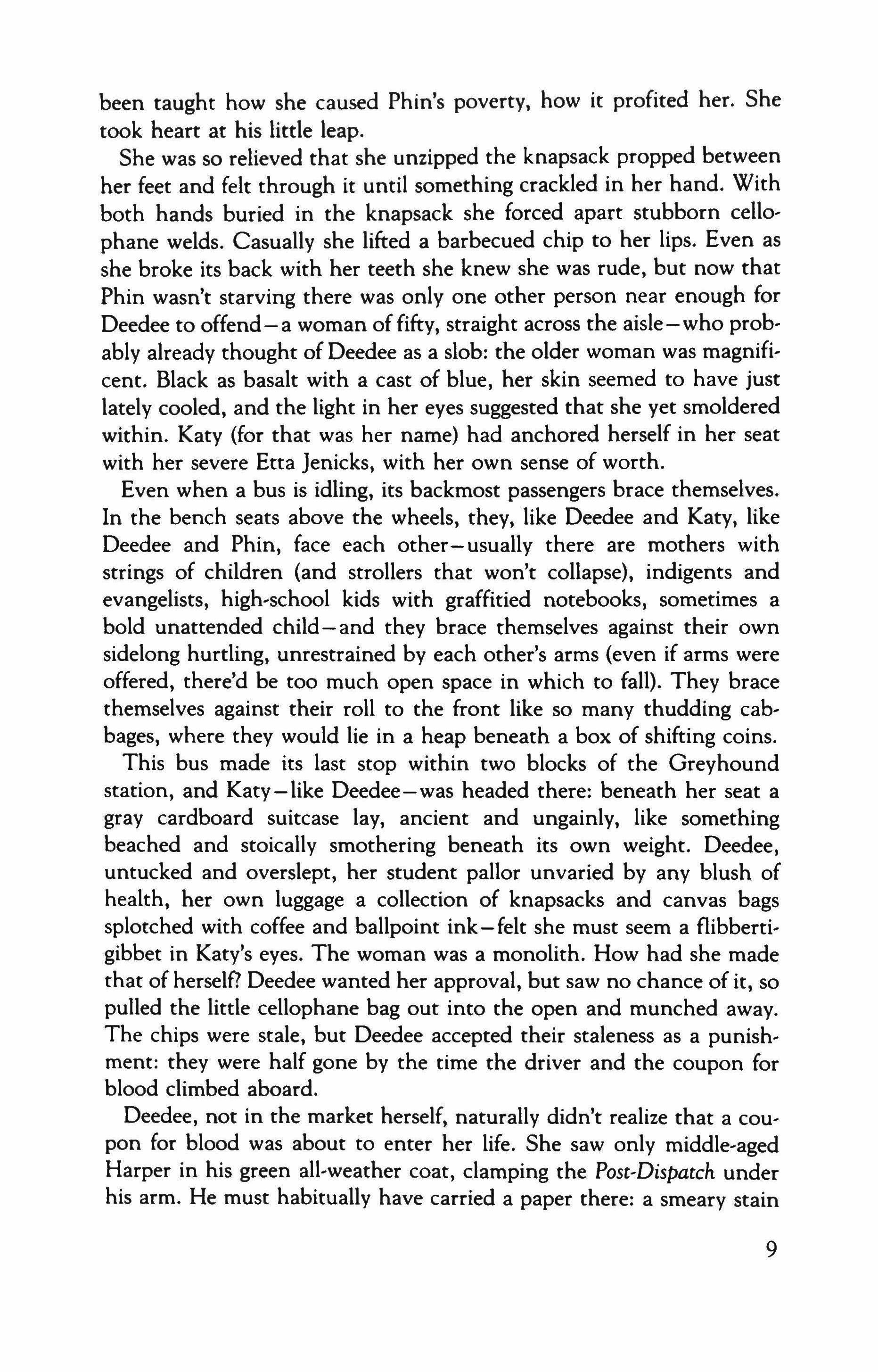
been taught how she caused Phin's poverty, how it profited her. She took heart at his little leap.
She was so relieved that she unzipped the knapsack propped between her feet and felt through it until something crackled in her hand. With both hands buried in the knapsack she forced apart stubborn cello, phane welds. Casually she lifted a barbecued chip to her lips. Even as she broke its back with her teeth she knew she was rude, but now that Phin wasn't starving there was only one other person near enough for Deedee to offend-a woman of fifty, straight across the aisle-who probably already thought of Deedee as a slob: the older woman was magnificent. Black as basalt with a cast of blue, her skin seemed to have just lately cooled, and the light in her eyes suggested that she yet smoldered within. Katy (for that was her name) had anchored herself in her seat with her severe Etta Jenicks, with her own sense of worth.
Even when a bus is idling, its backmost passengers brace themselves. In the bench seats above the wheels, they, like Deedee and Katy, like Deedee and Phin, face each other-usually there are mothers with strings of children (and strollers that won't collapse), indigents and evangelists, high-school kids with graffitied notebooks, sometimes a bold unattended child - and they brace themselves against their own sidelong hurtling, unrestrained by each other's arms (even if arms were offered, there'd be too much open space in which to fall). They brace themselves against their roll to the front like so many thudding cab, bages, where they would lie in a heap beneath a box of shifting coins.
This bus made its last stop within two blocks of the Greyhound station, and Katy-like Deedee-was headed there: beneath her seat a gray cardboard suitcase lay, ancient and ungainly, like something beached and stoically smothering beneath its own weight. Deedee, untucked and overslept, her student pallor unvaried by any blush of health, her own luggage a collection of knapsacks and canvas bags splotched with coffee and ballpoint ink-felt she must seem a flibbertigibbet in Katy's eyes. The woman was a monolith. How had she made that of herself? Deedee wanted her approval, but saw no chance of it, so pulled the little cellophane bag out into the open and munched away. The chips were stale, but Deedee accepted their staleness as a punish, ment: they were half gone by the time the driver and the coupon for blood climbed aboard.
Deedee, not in the market herself, naturally didn't realize that a coupon for blood was about to enter her life. She saw only middle-aged Harper in his green all-weather coat, clamping the Post'Dispatch under his arm. He must habitually have carried a paper there: a smeary stain
9
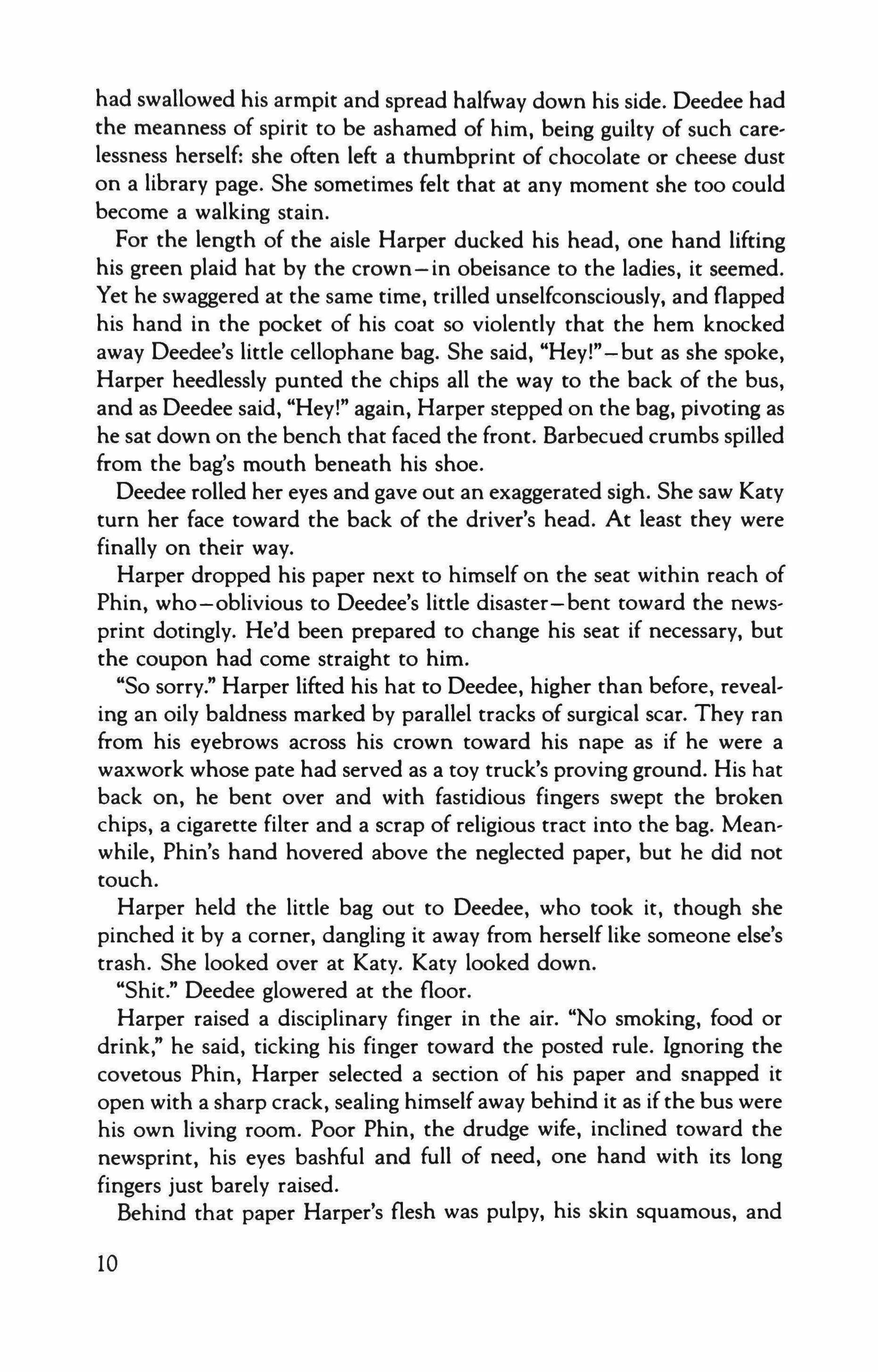
had swallowed his armpit and spread halfway down his side. Deedee had the meanness of spirit to be ashamed of him, being guilty of such carelessness herself: she often left a thumbprint of chocolate or cheese dust on a library page. She sometimes felt that at any moment she too could become a walking stain.
For the length of the aisle Harper ducked his head, one hand lifting his green plaid hat by the crown - in obeisance to the ladies, it seemed. Yet he swaggered at the same time, trilled unselfconsciously, and flapped his hand in the pocket of his coat so violently that the hem knocked away Deedee's little cellophane bag. She said, "Hey!" - but as she spoke, Harper heedlessly punted the chips all the way to the back of the bus, and as Deedee said, "Hey!" again, Harper stepped on the bag, pivoting as he sat down on the bench that faced the front. Barbecued crumbs spilled from the bag's mouth beneath his shoe.
Deedee rolled her eyes and gave out an exaggerated sigh. She saw Katv turn her face toward the back of the driver's head. At least they were finally on their way.
Harper dropped his paper next to himself on the seat within reach of Phin, who-oblivious to Deedee's little disaster-bent toward the newsprint dotingly. He'd been prepared to change his seat if necessary, but the coupon had come straight to him.
"So sorry." Harper lifted his hat to Deedee, higher than before, revealing an oily baldness marked by parallel tracks of surgical scar. They ran from his eyebrows across his crown toward his nape as if he were a waxwork whose pate had served as a toy truck's proving ground. His hat back on, he bent over and with fastidious fingers swept the broken chips, a cigarette filter and a scrap of religious tract into the bag. Meanwhile, Phin's hand hovered above the neglected paper, but he did not touch.
Harper held the little bag out to Deedee, who took it, though she pinched it by a corner, dangling it away from herself like someone else's trash. She looked over at Katy. Katy looked down. "Shit." Deedee glowered at the floor.
Harper raised a disciplinary finger in the air. "No smoking, food or drink," he said, ticking his finger toward the posted rule. Ignoring the covetous Phin, Harper selected a section of his paper and snapped it open with a sharp crack, sealing himself away behind it as if the bus were his own living room. Poor Phin, the drudge wife, inclined toward the newsprint, his eyes bashful and full of need, one hand with its long fingers just barely raised.
Behind that paper Harper's flesh was pulpy, his skin squamous, and
10
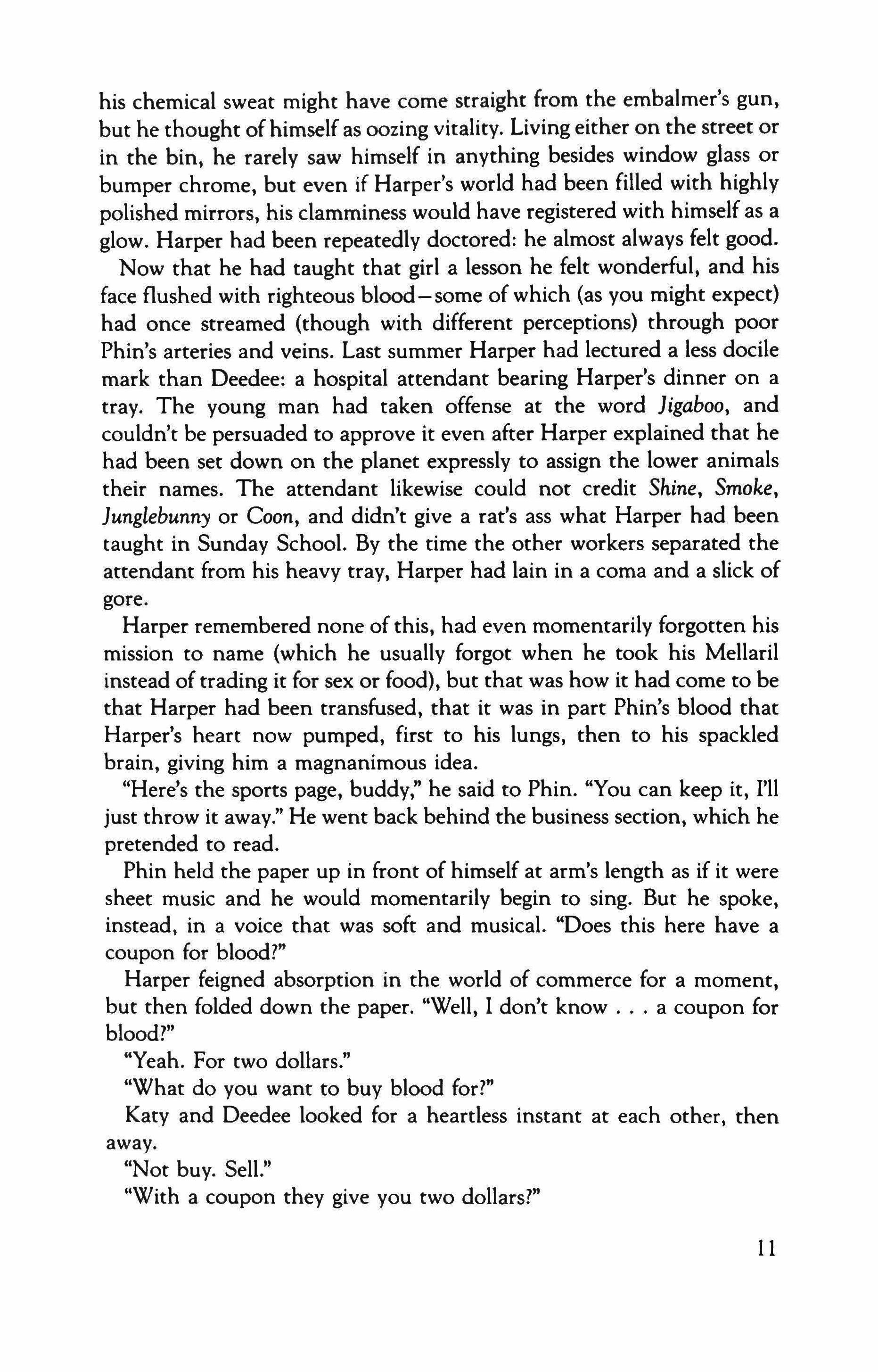
his chemical sweat might have come straight from the embalmer's gun, but he thought of himself as oozing vitality. Living either on the street or in the bin, he rarely saw himself in anything besides window glass or bumper chrome, but even if Harper's world had been filled with highly polished mirrors, his clamminess would have registered with himself as a glow. Harper had been repeatedly doctored: he almost always felt good.
Now that he had taught that girl a lesson he felt wonderful, and his face flushed with righteous blood-some of which (as you might expect) had once streamed (though with different perceptions) through poor Phin's arteries and veins. Last summer Harper had lectured a less docile mark than Deedee: a hospital attendant bearing Harper's dinner on a tray. The young man had taken offense at the word ligaboo, and couldn't be persuaded to approve it even after Harper explained that he had been set down on the planet expressly to assign the lower animals their names. The attendant likewise could not credit Shine, Smoke, lunglebunny or Coon, and didn't give a rat's ass what Harper had been taught in Sunday School. By the time the other workers separated the attendant from his heavy tray, Harper had lain in a coma and a slick of gore.
Harper remembered none of this, had even momentarily forgotten his mission to name (which he usually forgot when he took his Mellaril instead of trading it for sex or food), but that was how it had come to be that Harper had been transfused, that it was in part Phin's blood that Harper's heart now pumped, first to his lungs, then to his spackled brain, giving him a magnanimous idea.
"Here's the sports page, buddy," he said to Phin. "You can keep it, I'll just throw it away." He went back behind the business section, which he pretended to read.
Phin held the paper up in front of himself at arm's length as if it were sheet music and he would momentarily begin to sing. But he spoke, instead, in a voice that was soft and musical. "Does this here have a coupon for blood?"
Harper feigned absorption in the world of commerce for a moment, but then folded down the paper. "Well, I don't know a coupon for blood?"
"Yeah. For two dollars."
"What do you want to buy blood for?"
Katy and Deedee looked for a heartless instant at each other, then away.
"Not buy. Sell."
"With a coupon they give you two dollars?"
11
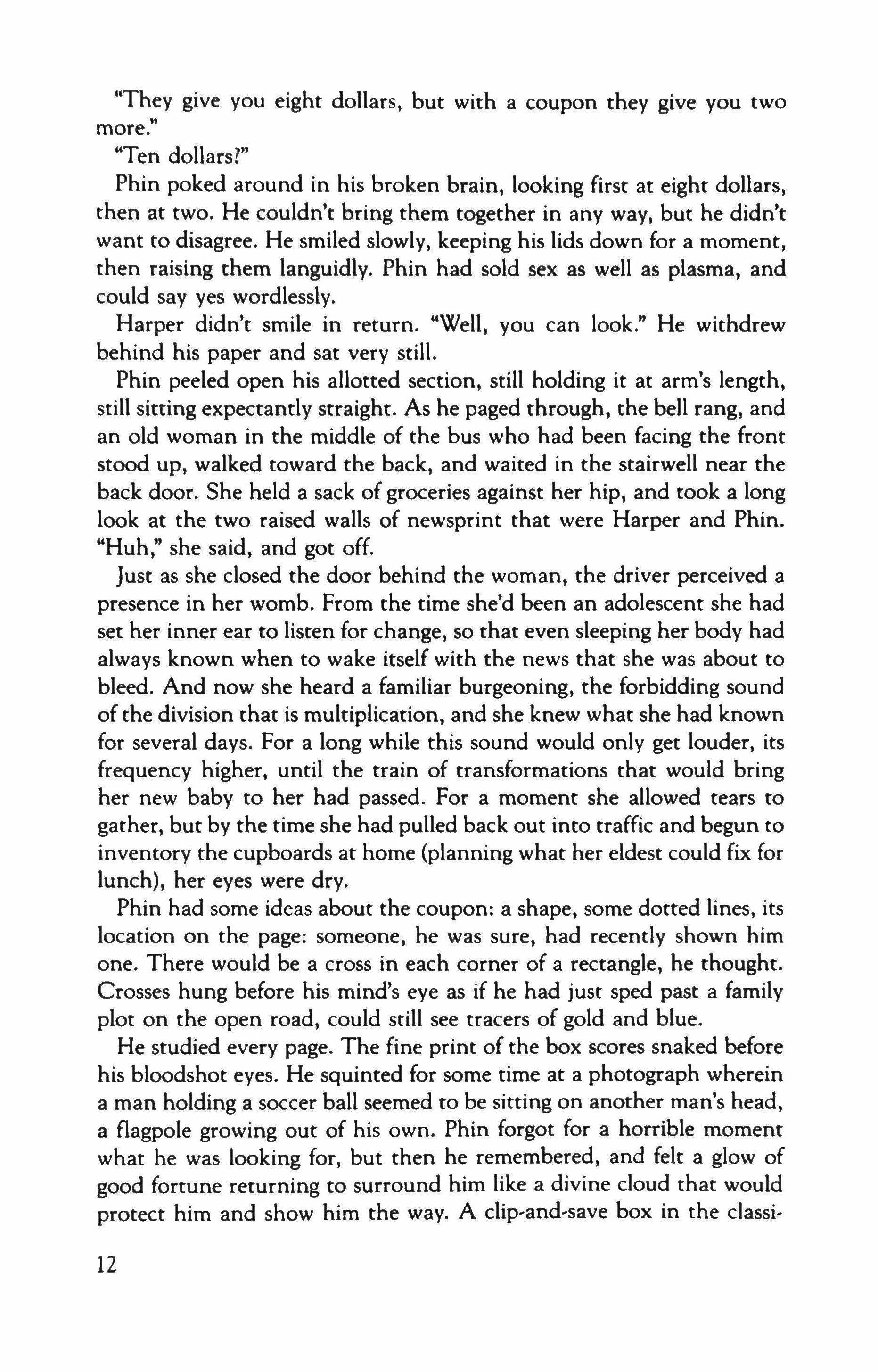
"They give you eight dollars, but with a coupon they give you two more."
"Ten dollars?"
Phin poked around in his broken brain, looking first at eight dollars, then at two. He couldn't bring them together in any way, but he didn't want to disagree. He smiled slowly, keeping his lids down for a moment, then raising them languidly. Phin had sold sex as well as plasma, and could say yes wordlessly.
Harper didn't smile in return. "Well, you can look." He withdrew behind his paper and sat very still.
Phin peeled open his allotted section, still holding it at arm's length, still sitting expectantly straight. As he paged through, the bell rang, and an old woman in the middle of the bus who had been facing the front stood up, walked toward the back, and waited in the stairwell near the back door. She held a sack of groceries against her hip, and took a long look at the two raised walls of newsprint that were Harper and Phin. "Huh," she said, and got off.
Just as she closed the door behind the woman, the driver perceived a presence in her womb. From the time she'd been an adolescent she had set her inner ear to listen for change, so that even sleeping her body had always known when to wake itself with the news that she was about to bleed. And now she heard a familiar burgeoning, the forbidding sound of the division that is multiplication, and she knew what she had known for several days. For a long while this sound would only get louder, its frequency higher, until the train of transformations that would bring her new baby to her had passed. For a moment she allowed tears to gather, but by the time she had pulled back out into traffic and begun to inventory the cupboards at home (planning what her eldest could fix for lunch), her eyes were dry.
Phin had some ideas about the coupon: a shape, some dotted lines, its location on the page: someone, he was sure, had recently shown him one. There would be a cross in each corner of a rectangle, he thought. Crosses hung before his mind's eye as if he had just sped past a family plot on the open road, could still see tracers of gold and blue.
He studied every page. The fine print of the box scores snaked before his bloodshot eyes. He squinted for some time at a photograph wherein a man holding a soccer ball seemed to be sitting on another man's head, a flagpole growing out of his own. Phin forgot for a horrible moment what he was looking for, but then he remembered, and felt a glow of good fortune returning to surround him like a divine cloud that would protect him and show him the way. A clip-and-save box in the classi-
12
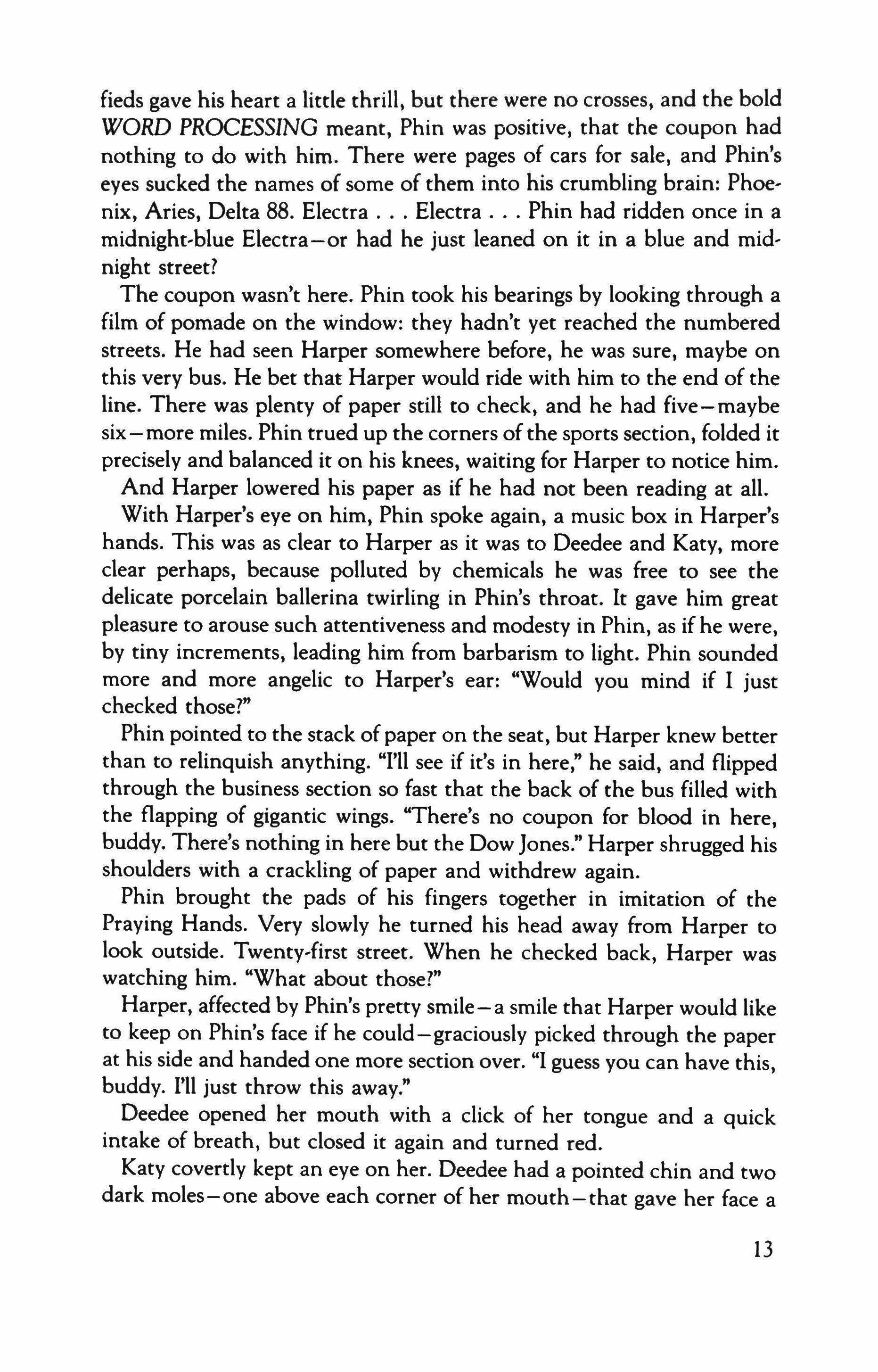
fieds gave his heart a little thrill, but there were no crosses, and the bold WORD PROCESSING meant, Phin was positive, that the coupon had nothing to do with him. There were pages of cars for sale, and Phin's eyes sucked the names of some of them into his crumbling brain: Phoenix, Aries, Delta 88. Electra Electra Phin had ridden once in a midnight-blue Electra-or had he just leaned on it in a blue and midnight street?
The coupon wasn't here. Phin took his bearings by looking through a film of pomade on the window: they hadn't yet reached the numbered streets. He had seen Harper somewhere before, he was sure, maybe on this very bus. He bet that Harper would ride with him to the end of the line. There was plenty of paper still to check, and he had five-maybe six - more miles. Phin trued up the corners of the sports section, folded it precisely and balanced it on his knees, waiting for Harper to notice him.
And Harper lowered his paper as if he had not been reading at all.
With Harper's eye on him, Phin spoke again, a music box in Harper's hands. This was as clear to Harper as it was to Deedee and Katy, more clear perhaps, because polluted by chemicals he was free to see the delicate porcelain ballerina twirling in Phin's throat. It gave him great pleasure to arouse such attentiveness and modesty in Phin, as if he were, by tiny increments, leading him from barbarism to light. Phin sounded more and more angelic to Harper's ear: "Would you mind if I just checked those?"
Phin pointed to the stack of paper on the seat, but Harper knew better than to relinquish anything. "I'll see if it's in here," he said, and flipped through the business section so fast that the back of the bus filled with the flapping of gigantic wings. "There's no coupon for blood in here, buddy. There's nothing in here but the Dow Jones." Harper shrugged his shoulders with a crackling of paper and withdrew again.
Phin brought the pads of his fingers together in imitation of the Praying Hands. Very slowly he turned his head away from Harper to look outside. Twenty-first street. When he checked back, Harper was watching him. "What about those?"
Harper, affected by Phin's pretty smile-a smile that Harper would like to keep on Phin's face if he could-graciously picked through the paper at his side and handed one more section over. "I guess you can have this, buddy. I'll just throw this away."
Deedee opened her mouth with a click of her tongue and a quick intake of breath, but closed it again and turned red.
Katy covertly kept an eye on her. Deedee had a pointed chin and two dark moles-one above each corner of her mouth-that gave her face a
13

catlike triangularity. Her slit-eyed twitching heightened the effect: she seemed as tortured as a house cat spying on a pair of warring toms from the wrong side of a screen-the stink of hot fur, the sight of backs bristling and humped cause her heart to pound, oxygen to crowd her cells, and blood to stream, messianic, through her veins. But she sits, contained, on a windowsill, slapping at it with her tail, raising nothing but backlit, floating motes. Once the fight moves down the block she'll throw herself down from the window and charge-dishing throw rugs one after another out of her way - as far in one direction as the walls of her house will permit, then wheel and take another tack, crash behind the couch and end tables, bruise herself against the furniture.
Deedee for now was still at the window, and the poor stymied thing kept sneaking looks at Katy, wanting Katy to nanny her, wanting Katy to nanny the whole bus. But Katy intended to let those nasty boys run each other ragged - she had problems of her own.
Phin began to page through a thick sheaf of department-store ads as daintily as he had waded through the sports, and Deedee's heart went out to him. Someone who could read ought to step in. Phin, scrawny as he was, probably shouldn't be peddling drop one, but Deedee wanted him to do-to have-whatever he desired, for reasons even she was suspicious of: his blackness, his wasted beauty, that bastard Harper's lunacy. Deedee still clutched her trashed bag of chips out of a horror of littering. Yes, she wanted that smug son-of-a-bitch=crazv or not-to do the generous thing. She imagined herself commandeering the paper, finding-or not finding, definitively-the damn coupon. But every reaction she anticipated from Harper was withering. She couldn't bear to give him an opening.
If Deedee's mother had still been alive, Deedee would have had more to offer than the heroics of a busybody. IfDeedee's mother had still been alive, Deedee wouldn't have been headed back to school the day after Thanksgiving with nothing in her luggage but half a round-trip bus ticket and a desiccated, bloodless meal: she had rice cakes and peanut butter left, stuff suited to the fitful stomach of chemotherapy. (The barbecued chips, Deedee figured, must have been a whim, mentioned by her mother wistfully, fetched by husband or son in a hell-bent car, then rejected from a pit of nausea.)
If Deedee's mother had still been alive, Deedee would have had a couple pounds of turkey in tow, half an apple-cake and a fistful of cold hard cash - the price of her bus ticket and then some. But though Deedee had cooked the holiday meal, she had left it all behind, sure that control over the family larder didn't transfer to the temporary help.
14
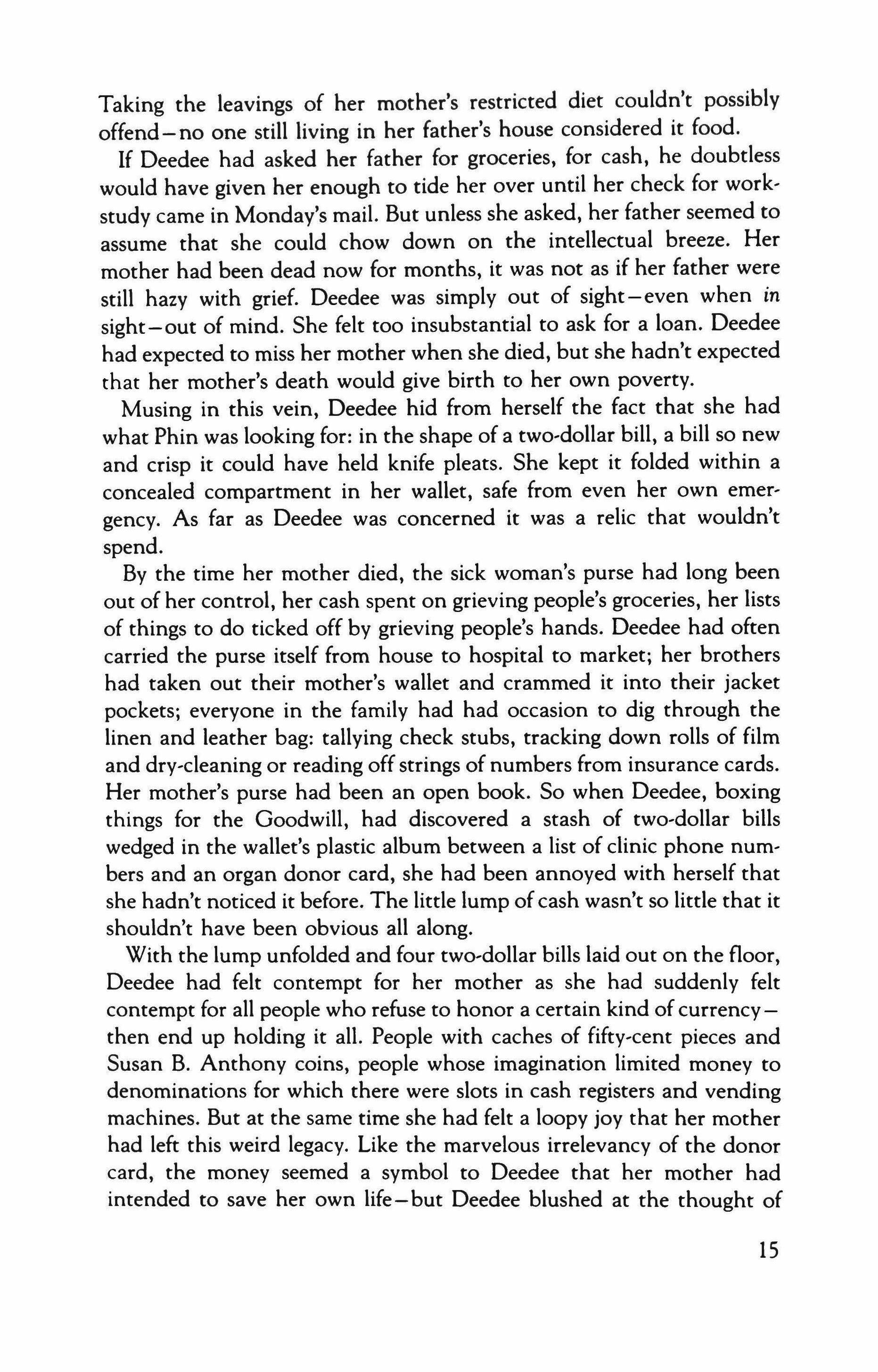
Taking the leavings of her mother's restricted diet couldn't possibly offend - no one still living in her father's house considered it food.
U Deedee had asked her father for groceries, for cash, he doubtless would have given her enough to tide her over until her check for workstudy came in Monday's mail. But unless she asked, her father seemed to assume that she could chow down on the intellectual breeze. Her mother had been dead now for months, it was not as if her father were still hazy with grief. Deedee was simply out of sight-even when in sight-out of mind. She felt too insubstantial to ask for a loan. Deedee had expected to miss her mother when she died, but she hadn't expected that her mother's death would give birth to her own poverty.
Musing in this vein, Deedee hid from herself the fact that she had what Phin was looking for: in the shape of a two-dollar bill, a bill so new and crisp it could have held knife pleats. She kept it folded within a concealed compartment in her wallet, safe from even her own emergency. As far as Deedee was concerned it was a relic that wouldn't spend.
By the time her mother died, the sick woman's purse had long been out of her control, her cash spent on grieving people's groceries, her lists of things to do ticked off by grieving people's hands. Deedee had often carried the purse itself from house to hospital to market; her brothers had taken out their mother's wallet and crammed it into their jacket pockets; everyone in the family had had occasion to dig through the linen and leather bag: tallying check stubs, tracking down rolls of film and dry-cleaning or reading off strings of numbers from insurance cards. Her mother's purse had been an open book. So when Deedee, boxing things for the Goodwill, had discovered a stash of two-dollar bills wedged in the wallet's plastic album between a list of clinic phone numbers and an organ donor card, she had been annoyed with herself that she hadn't noticed it before. The little lump ofcash wasn't so little that it shouldn't have been obvious all along.
With the lump unfolded and four two-dollar bills laid out on the floor, Deedee had felt contempt for her mother as she had suddenly felt contempt for all people who refuse to honor a certain kind of currencythen end up holding it all. People with caches of fifty-cent pieces and Susan B. Anthony coins, people whose imagination limited money to denominations for which there were slots in cash registers and vending machines. But at the same time she had felt a loopy joy that her mother had left this weird legacy. Like the marvelous irrelevancy of the donor card, the money seemed a symbol to Deedee that her mother had intended to save her own life-but Deedee blushed at the thought of
15
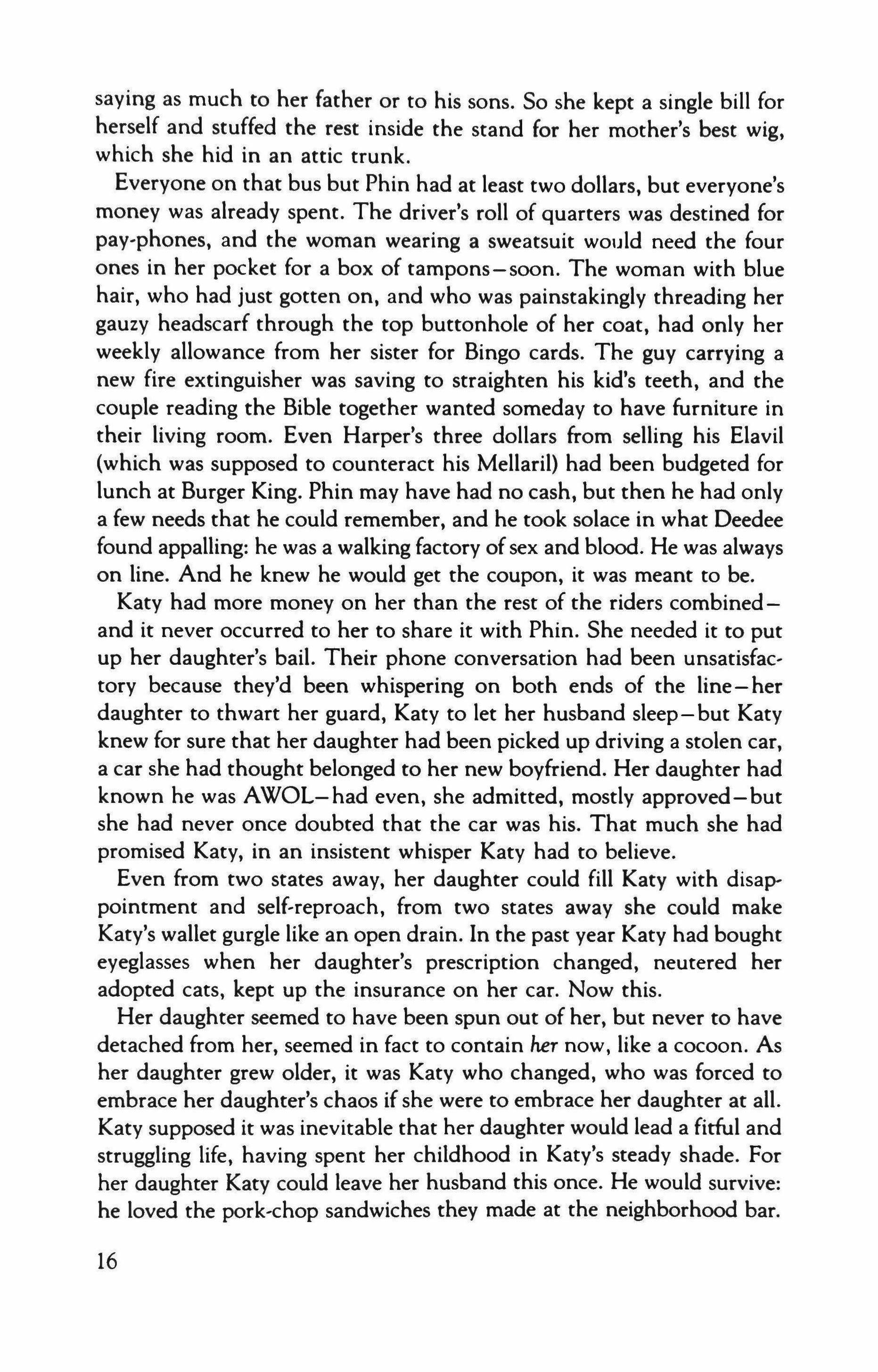
saying as much to her father or to his sons. So she kept a single bill for herself and stuffed the rest inside the stand for her mother's best wig, which she hid in an attic trunk.
Everyone on that bus but Phin had at least two dollars, but everyone's money was already spent. The driver's roll of quarters was destined for pay-phones, and the woman wearing a sweatsuit would need the four ones in her pocket for a box of tampons-soon. The woman with blue hair, who had just gotten on, and who was painstakingly threading her gauzy headscarf through the top buttonhole of her coat, had only her weekly allowance from her sister for Bingo cards. The guy carrying a new fire extinguisher was saving to straighten his kid's teeth, and the couple reading the Bible together wanted someday to have furniture in their living room. Even Harper's three dollars from selling his Elavil (which was supposed to counteract his Mellaril) had been budgeted for lunch at Burger King. Phin may have had no cash, but then he had only a few needs that he could remember, and he took solace in what Deedee found appalling: he was a walking factory of sex and blood. He was always on line. And he knew he would get the coupon, it was meant to be.
Katy had more money on her than the rest of the riders combinedand it never occurred to her to share it with Phin. She needed it to put up her daughter's bail. Their phone conversation had been unsatisfactory because they'd been whispering on both ends of the line-her daughter to thwart her guard, Katy to let her husband sleep-but Katy knew for sure that her daughter had been picked up driving a stolen car, a car she had thought belonged to her new boyfriend. Her daughter had known he was AWOL-had even, she admitted, mostly approved-but she had never once doubted that the car was his. That much she had promised Katv, in an insistent whisper Katy had to believe.
Even from two states away, her daughter could fill Katy with disappointment and self-reproach, from two states away she could make Katy's wallet gurgle like an open drain. In the past year Katy had bought eyeglasses when her daughter's prescription changed, neutered her adopted cats, kept up the insurance on her car. Now this.
Her daughter seemed to have been spun out of her, but never to have detached from her, seemed in fact to contain her now, like a cocoon. As her daughter grew older, it was Katy who changed, who was forced to embrace her daughter's chaos if she were to embrace her daughter at all. Katy supposed it was inevitable that her daughter would lead a fitful and struggling life, having spent her childhood in Katy's steady shade. For her daughter Katy could leave her husband this once. He would survive: he loved the pork-chop sandwiches they made at the neighborhood bar.
16
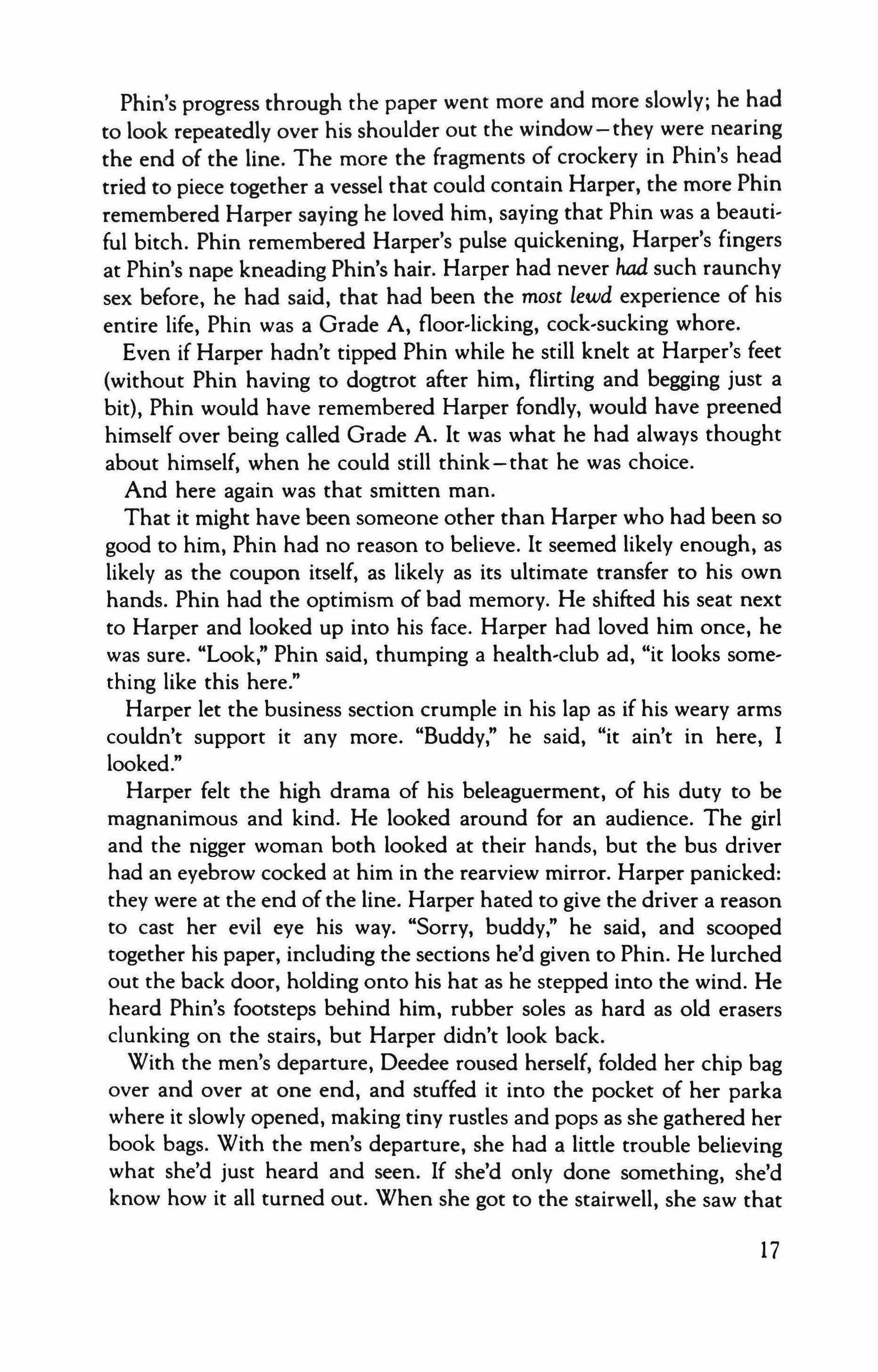
Phin's progress through the paper went more and more slowly; he had to look repeatedly over his shoulder out the window - they were nearing the end of the line. The more the fragments of crockery in Phin's head tried to piece together a vessel that could contain Harper, the more Phin remembered Harper saying he loved him, saying that Phin was a beautiful bitch. Phin remembered Harper's pulse quickening, Harper's fingers at Phin's nape kneading Phin's hair. Harper had never had such raunchy sex before, he had said, that had been the most lewd experience of his entire life, Phin was a Grade A, floor-licking, cock-sucking whore.
Even if Harper hadn't tipped Phin while he still knelt at Harper's feet (without Phin having to dogtrot after him, flirting and begging just a bit), Phin would have remembered Harper fondly, would have preened himself over being called Grade A. It was what he had always thought about himself, when he could still think-that he was choice.
And here again was that smitten man.
That it might have been someone other than Harper who had been so good to him, Phin had no reason to believe. It seemed likely enough, as likely as the coupon itself, as likely as its ultimate transfer to his own hands. Phin had the optimism of bad memory. He shifted his seat next to Harper and looked up into his face. Harper had loved him once, he was sure. "Look," Phin said, thumping a health-club ad, "it looks something like this here."
Harper let the business section crumple in his lap as if his weary arms couldn't support it any more. "Buddy," he said, "it ain't in here, I looked."
Harper felt the high drama of his beleaguerment, of his duty to be magnanimous and kind. He looked around for an audience. The girl and the nigger woman both looked at their hands, but the bus driver had an eyebrow cocked at him in the rearview mirror. Harper panicked: they were at the end of the line. Harper hated to give the driver a reason to cast her evil eye his way. "Sorry, buddy," he said, and scooped together his paper, including the sections he'd given to Phin. He lurched out the back door, holding onto his hat as he stepped into the wind. He heard Phin's footsteps behind him, rubber soles as hard as old erasers clunking on the stairs, but Harper didn't look back.
With the men's departure, Deedee roused herself, folded her chip bag over and over at one end, and stuffed it into the pocket of her parka where it slowly opened, making tiny rustles and pops as she gathered her book bags. With the men's departure, she had a little trouble believing what she'd just heard and seen. If she'd only done something, she'd know how it all turned out. When she got to the stairwell, she saw that
17
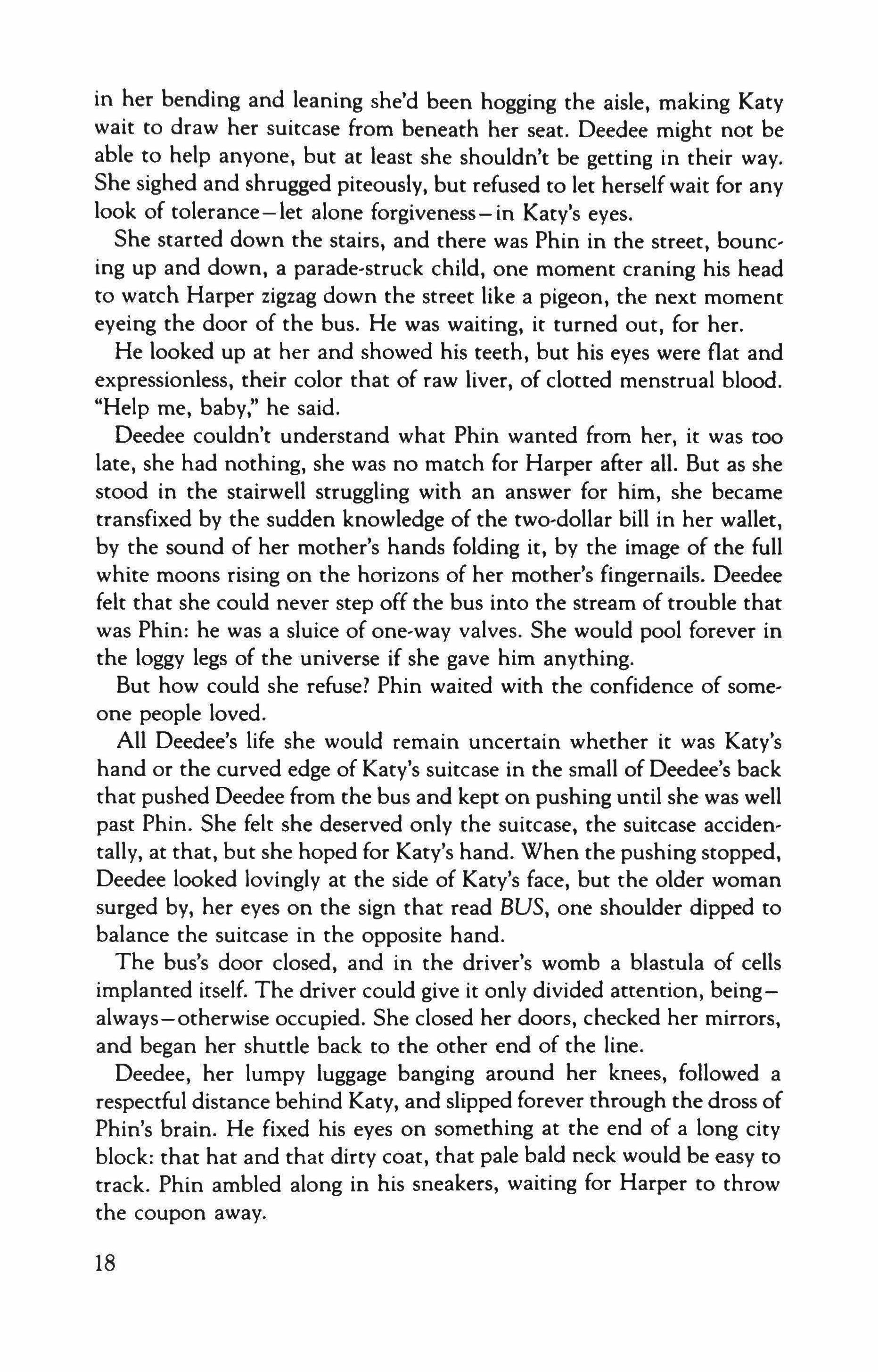
in her bending and leaning she'd been hogging the aisle, making Katy wait to draw her suitcase from beneath her seat. Deedee might not be able to help anyone, but at least she shouldn't be getting in their way. She sighed and shrugged piteously, but refused to let herself wait for any look of tolerance-let alone forgiveness-in Katy's eyes.
She started down the stairs, and there was Phin in the street, bouncing up and down, a parade-struck child, one moment craning his head to watch Harper zigzag down the street like a pigeon, the next moment eyeing the door of the bus. He was waiting, it turned out, for her.
He looked up at her and showed his teeth, but his eyes were flat and expressionless, their color that of raw liver, of clotted menstrual blood. "Help me, baby," he said.
Deedee couldn't understand what Phin wanted from her, it was too late, she had nothing, she was no match for Harper after all. But as she stood in the stairwell struggling with an answer for him, she became transfixed by the sudden knowledge of the two-dollar bill in her wallet, by the sound of her mother's hands folding it, by the image of the full white moons rising on the horizons of her mother's fingernails. Deedee felt that she could never step off the bus into the stream of trouble that was Phin: he was a sluice of one-way valves. She would pool forever in the loggy legs of the universe if she gave him anything.
But how could she refuse? Phin waited with the confidence of someone people loved.
All Deedee's life she would remain uncertain whether it was Katy's hand or the curved edge of Katy's suitcase in the small of Deedee's back that pushed Deedee from the bus and kept on pushing until she was well past Phin. She felt she deserved only the suitcase, the suitcase accidentally, at that, but she hoped for Katy's hand. When the pushing stopped, Deedee looked lovingly at the side of Katy's face, but the older woman surged by, her eyes on the sign that read BUS, one shoulder dipped to balance the suitcase in the opposite hand.
The bus's door closed, and in the driver's womb a blastula of cells implanted itself. The driver could give it only divided attention, beingalways-otherwise occupied. She closed her doors, checked her mirrors, and began her shuttle back to the other end of the line.
Deedee, her lumpy luggage banging around her knees, followed a respectful distance behind Katy, and slipped forever through the dross of Phin's brain. He fixed his eyes on something at the end of a long city block: that hat and that dirty coat, that pale bald neck would be easy to track. Phin ambled along in his sneakers, waiting for Harper to throw the coupon away.
18
A Committee of the Whole
Carol Bly

Since her middle,aged daughter had died before she did, Alice Malley expected only sorrow, increasing solitude, and eventual decrepitude. Instead, she found herself in the midst of twenty-three friendly people enthusiastically bent on any number of projects, one right after another. While Linda was alive, Alice had paid no attention to the other residents at St. Aidan's: they were simply vague background-people you saw greeting one another at the elevators, people accusing each other of cheating at checkers or hearts, people forever corning up with smiles, handing her computer graphics called "Housekeeping Update" or "Our Week's Events" or "This Week in the Duluth Area."
There was a happy, rather drunken couple among them, Charles and Martha. There was a loner, who kept himself to the one third-floor room St. Aidan's had. There was the community paranoid, leRoy Beske, who had a strange conviction that all the world was divided into the lucky Shattuck School graduates and the unlucky, who were principally LeRoy and his grandson. When Charles or anyone else tried to explain to leRoy what a small part of the world's population was made up of Shattuck graduates, he snarled, "You can call 'ern what you wantAndover, St. Paul's, whoever-they're all Shattuck in my book, with their feet on the neck of the poor!"
As long as Linda was alive, Alice Malley's world shook and woke itself at the moment when Linda swung into her room, grinning with her great fair fiftv-vear-old health, her bluff manner, her armsful of organic, gardening treatises. In the spring she generally had a cardboard box or two of cuttings or bare roots. The last time Alice saw her she had brought dwarf-pear stock to try espalier on the parking,lot wall. Meals, nights, walks were simply the distance between Linda's visits. Sometimes
19
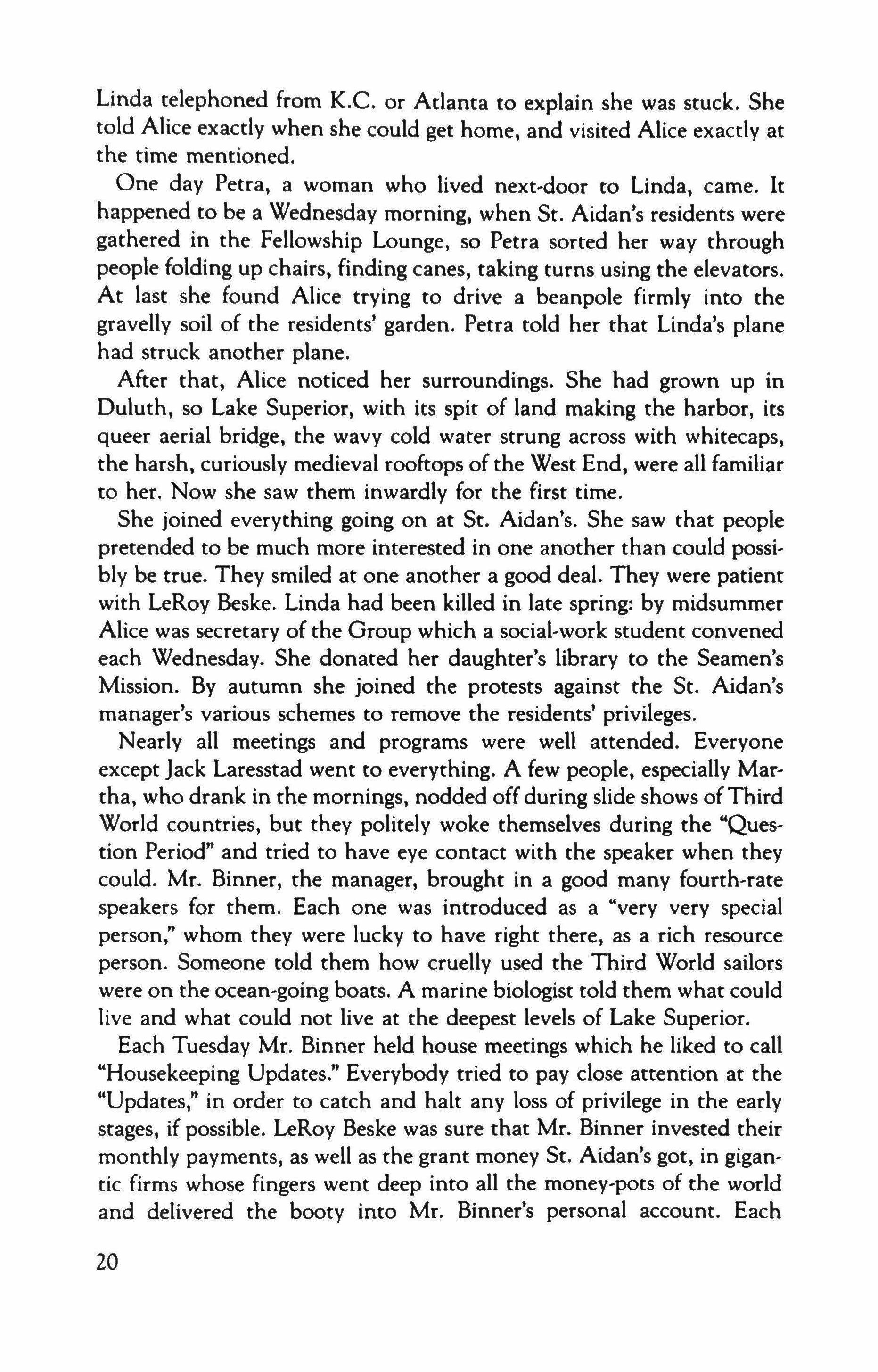
Linda telephoned from K.C. or Atlanta to explain she was stuck. She told Alice exactly when she could get home, and visited Alice exactly at the time mentioned.
One day Petra, a woman who lived next-door to Linda, came. It happened to be a Wednesday morning, when St. Aidan's residents were gathered in the Fellowship Lounge, so Petra sorted her way through people folding up chairs, finding canes, taking turns using the elevators. At last she found Alice trying to drive a beanpole firmly into the gravelly soil of the residents' garden. Petra told her that Linda's plane had struck another plane.
After that, Alice noticed her surroundings. She had grown up in Duluth, so Lake Superior, with its spit of land making the harbor, its queer aerial bridge, the wavy cold water strung across with whitecaps, the harsh, curiously medieval rooftops of the West End, were all familiar to her. Now she saw them inwardly for the first time.
She joined everything going on at St. Aidan's. She saw that people pretended to be much more interested in one another than could possibly be true. They smiled at one another a good deal. They were patient with LeRoy Beske. Linda had been killed in late spring: by midsummer Alice was secretary of the Group which a social-work student convened each Wednesday. She donated her daughter's library to the Seamen's Mission. By autumn she joined the protests against the St. Aidan's manager's various schemes to remove the residents' privileges.
Nearly all meetings and programs were well attended. Everyone except Jack Laresstad went to everything. A few people, especially Mar' tha, who drank in the mornings, nodded off during slide shows ofThird World countries, but they politely woke themselves during the "Question Period" and tried to have eye contact with the speaker when they could. Mr. Binner, the manager, brought in a good many fourth-rate speakers for them. Each one was introduced as a "very very special person," whom they were lucky to have right there, as a rich resource person. Someone told them how cruelly used the Third World sailors were on the ocean-going boats. A marine biologist told them what could live and what could not live at the deepest levels of Lake Superior. Each Tuesday Mr. Binner held house meetings which he liked to call "Housekeeping Updates." Everybody tried to pay close attention at the "Updates," in order to catch and halt any loss of privilege in the early stages, if possible. LeRoy Beske was sure that Mr. Binner invested their monthly payments, as well as the grant money St. Aidan's got, in gigantic firms whose fingers went deep into all the money-pots of the world and delivered the booty into Mr. Binner's personal account. Each
20
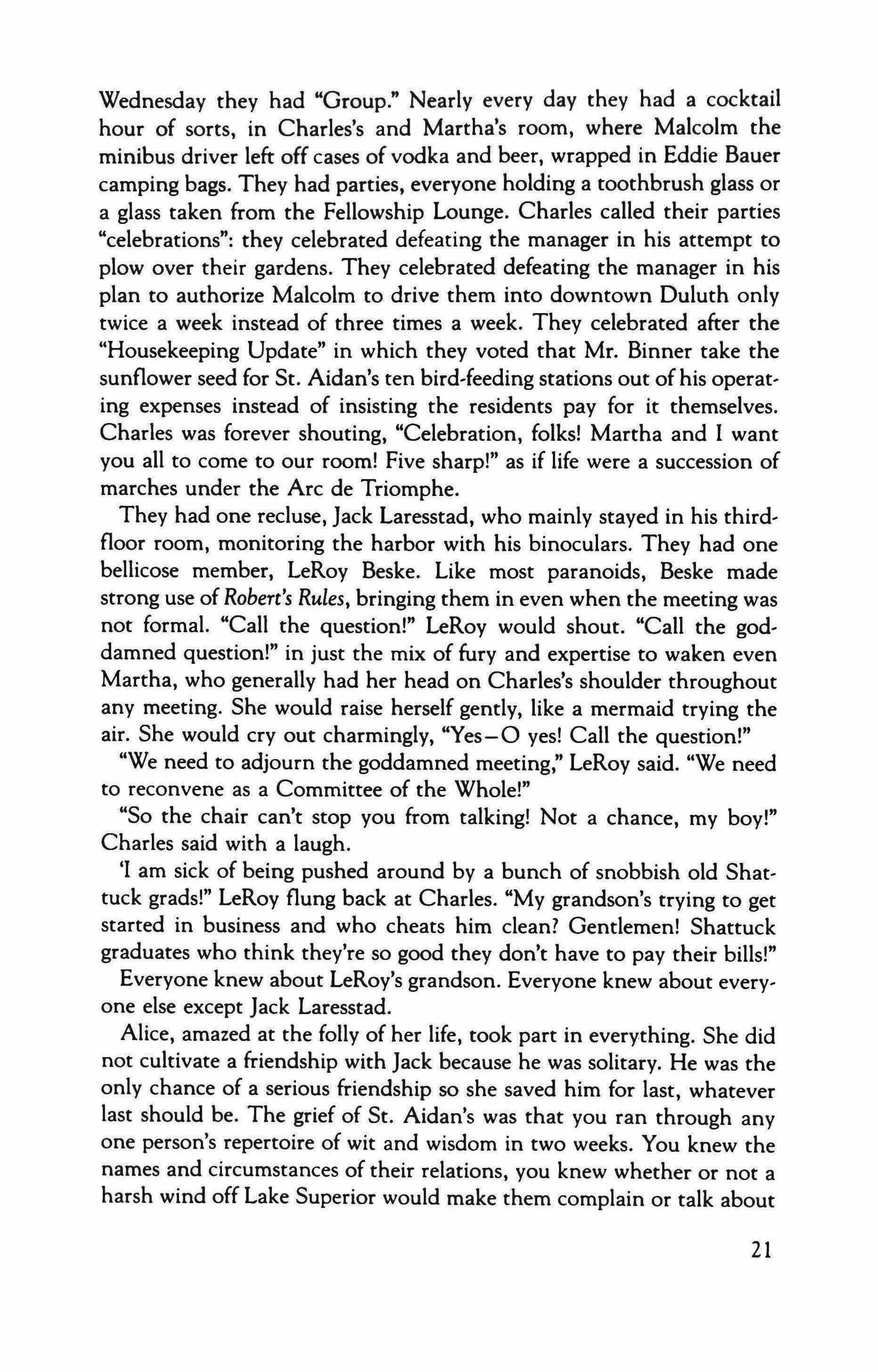
Wednesday they had "Group." Nearly every day they had a cocktail hour of sorts, in Charles's and Martha's room, where Malcolm the minibus driver left off cases of vodka and beer, wrapped in Eddie Bauer camping bags. They had parties, everyone holding a toothbrush glass or a glass taken from the Fellowship Lounge. Charles called their parties "celebrations": they celebrated defeating the manager in his attempt to plow over their gardens. They celebrated defeating the manager in his plan to authorize Malcolm to drive them into downtown Duluth only twice a week instead of three times a week. They celebrated after the "Housekeeping Update" in which they voted that Mr. Binner take the sunflower seed for St. Aidan's ten bird-feeding stations out of his operating expenses instead of insisting the residents pay for it themselves. Charles was forever shouting, "Celebration, folks! Martha and I want you all to come to our room! Five sharp!" as if life were a succession of marches under the Arc de Triomphe.
They had one recluse, Jack Laresstad, who mainly stayed in his thirdfloor room, monitoring the harbor with his binoculars. They had one bellicose member, LeRoy Beske. Like most paranoids, Beske made strong use of Robert's Rules, bringing them in even when the meeting was not formal. "Call the question!" LeRoy would shout. "Call the goddamned question!" in just the mix of fury and expertise to waken even Martha, who generally had her head on Charles's shoulder throughout any meeting. She would raise herself gently, like a mermaid trying the air. She would cry out charmingly, "Yes-O yes! Call the question!"
"We need to adjourn the goddamned meeting," LeRoy said. "We need to reconvene as a Committee of the Whole!"
"So the chair can't stop you from talking! Not a chance, my boy!" Charles said with a laugh.
'I am sick of being pushed around by a bunch of snobbish old Shattuck grads!" LeRoy flung back at Charles. "My grandson's trying to get started in business and who cheats him clean? Gentlemen! Shattuck graduates who think they're so good they don't have to pay their bills!"
Everyone knew about leRoy's grandson. Everyone knew about everyone else except Jack Laresstad.
Alice, amazed at the folly of her life, took part in everything. She did not cultivate a friendship with Jack because he was solitary. He was the only chance of a serious friendship so she saved him for last, whatever last should be. The grief of St. Aidan's was that you ran through any one person's repertoire of wit and wisdom in two weeks. You knew the names and circumstances of their relations, you knew whether or not a harsh wind off Lake Superior would make them complain or talk about
21
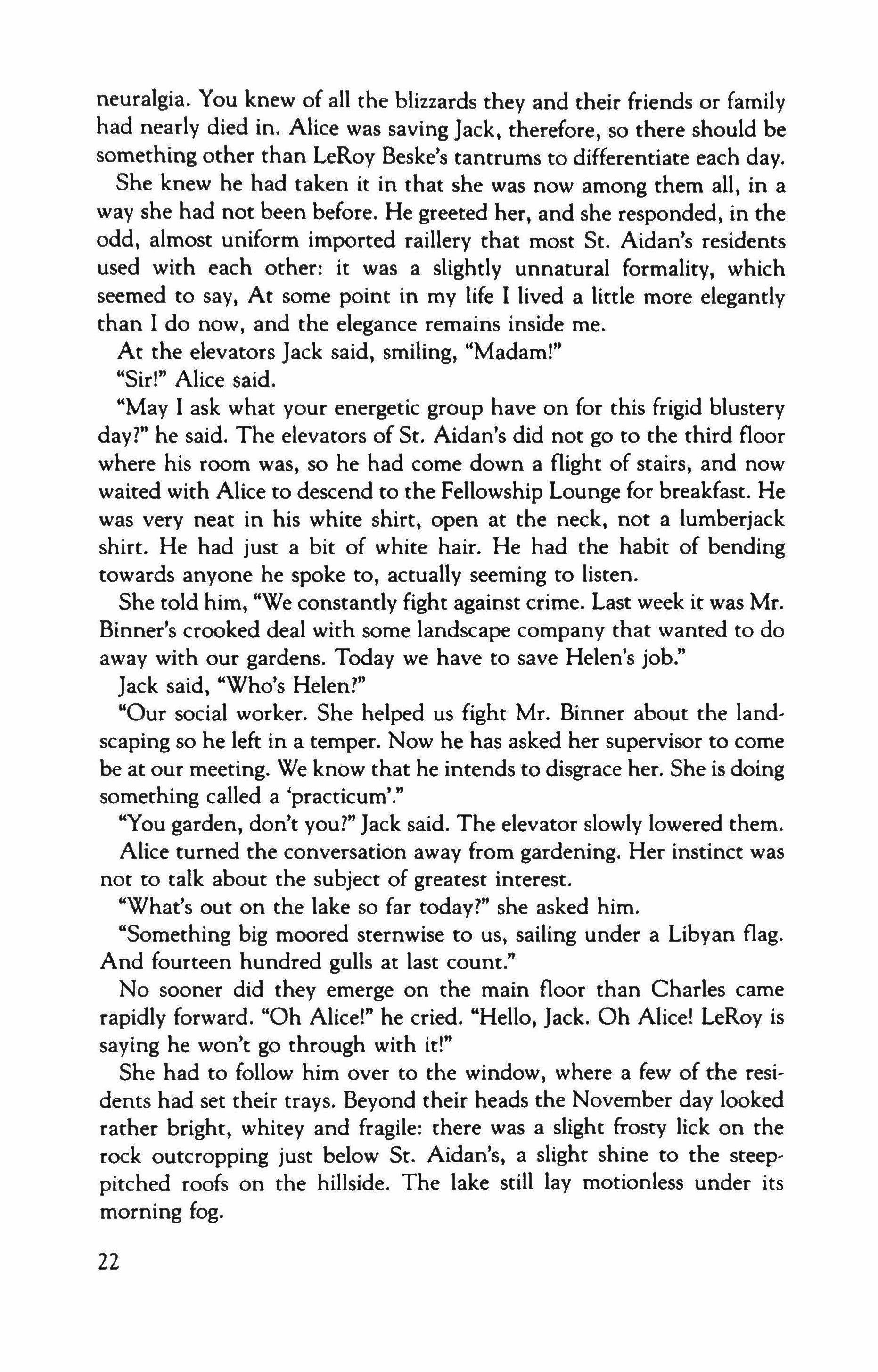
neuralgia. You knew of all the blizzards they and their friends or family had nearly died in. Alice was saving Jack, therefore, so there should be something other than LeRoy Beske's tantrums to differentiate each day.
She knew he had taken it in that she was now among them all, in a way she had not been before. He greeted her, and she responded, in the odd, almost uniform imported raillery that most St. Aidan's residents used with each other: it was a slightly unnatural formality, which seemed to say, At some point in my life I lived a little more elegantly than I do now, and the elegance remains inside me.
At the elevators Jack said, smiling, "Madam!"
"Sir!" Alice said.
"May I ask what your energetic group have on for this frigid blustery day?" he said. The elevators of St. Aidan's did not go to the third floor where his room was, so he had come down a flight of stairs, and now waited with Alice to descend to the Fellowship Lounge for breakfast. He was very neat in his white shirt, open at the neck, not a lumberjack shirt. He had just a bit of white hair. He had the habit of bending towards anyone he spoke to, actually seeming to listen.
She told him, "We constantly fight against crime. Last week it was Mr. Binner's crooked deal with some landscape company that wanted to do away with our gardens. Today we have to save Helen's job."
Jack said, "Who's Helen?"
"Our social worker. She helped us fight Mr. Binner about the landscaping so he left in a temper. Now he has asked her supervisor to come be at our meeting. We know that he intends to disgrace her. She is doing something called a 'practicum',"
"You garden, don't you?" Jack said. The elevator slowly lowered them. Alice turned the conversation away from gardening. Her instinct was not to talk about the subject of greatest interest.
"What's out on the lake so far today?" she asked him.
"Something big moored sternwise to us, sailing under a Libyan flag. And fourteen hundred gulls at last count."
No sooner did they emerge on the main floor than Charles came rapidly forward. "Oh Alice!" he cried. "Hello, Jack. Oh Alice! leRoy is saying he won't go through with it!"
She had to follow him over to the window, where a few of the residents had set their trays. Beyond their heads the November day looked rather bright, whitey and fragile: there was a slight frosty lick on the rock outcropping just below St. Aidan's, a slight shine to the steeppitched roofs on the hillside. The lake still lay motionless under its morning fog.
22
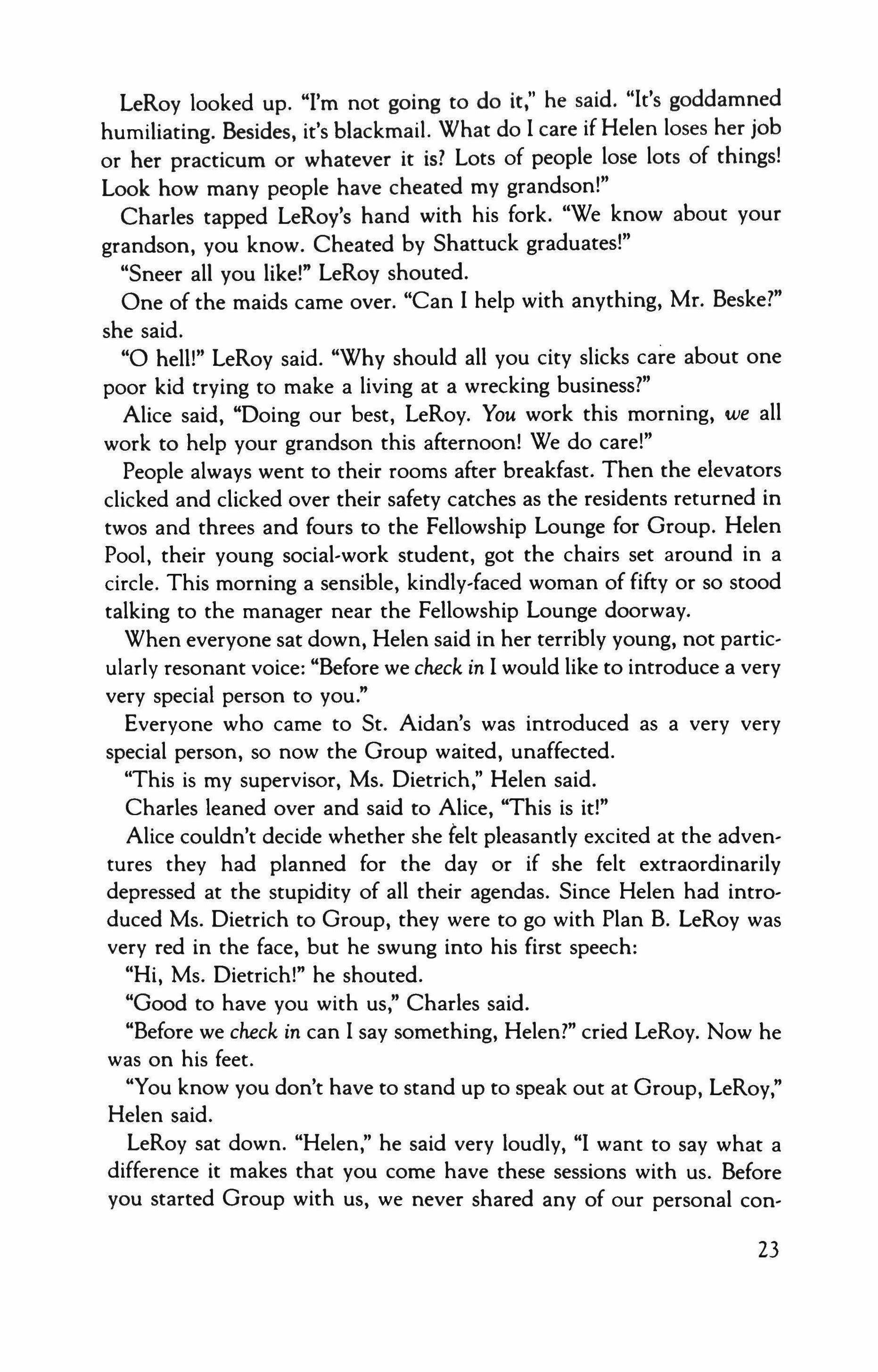
LeRoy looked up. "I'm not going to do it," he said. "It's goddamned humiliating. Besides, it's blackmail. What do I care if Helen loses her job or her practicum or whatever it is? Lots of people lose lots of things! Look how many people have cheated my grandson!"
Charles tapped LeRoy's hand with his fork. "We know about your grandson, you know. Cheated by Shattuck graduates!"
"Sneer all you like!" LeRoy shouted.
One of the maids came over. "Can I help with anything, Mr. Beske?" she said.
"0 hell!" LeRoy said. "Why should all you city slicks care about one poor kid trying to make a living at a wrecking business?"
Alice said, "Doing our best, LeRoy. You work this morning, we all work to help your grandson this afternoon! We do care!"
People always went to their rooms after breakfast. Then the elevators clicked and clicked over their safety catches as the residents returned in twos and threes and fours to the Fellowship Lounge for Group. Helen Pool, their young social-work student, got the chairs set around in a circle. This morning a sensible, kindly-faced woman of fifty or so stood talking to the manager near the Fellowship Lounge doorway.
When everyone sat down, Helen said in her terribly young, not particularly resonant voice: "Before we check in I would like to introduce a very very special person to you."
Everyone who came to St. Aidan's was introduced as a very very special person, so now the Group waited, unaffected.
"This is my supervisor, Ms. Dietrich," Helen said.
Charles leaned over and said to Alice, "This is it!"
Alice couldn't decide whether she lelt pleasantly excited at the adventures they had planned for the day or if she felt extraordinarily depressed at the stupidity of all their agendas. Since Helen had introduced Ms. Dietrich to Group, they were to go with Plan B. LeRoy was very red in the face, but he swung into his first speech:
"Hi, Ms. Dietrich!" he shouted.
"Good to have you with us," Charles said.
"Before we check in can I say something, Helen?" cried LeRoy. Now he was on his feet.
"You know you don't have to stand up to speak out at Group, LeRoy," Helen said.
LeRoy sat down. "Helen," he said very loudly, "I want to say what a difference it makes that you come have these sessions with us. Before you started Group with us, we never shared any of our personal con-
23
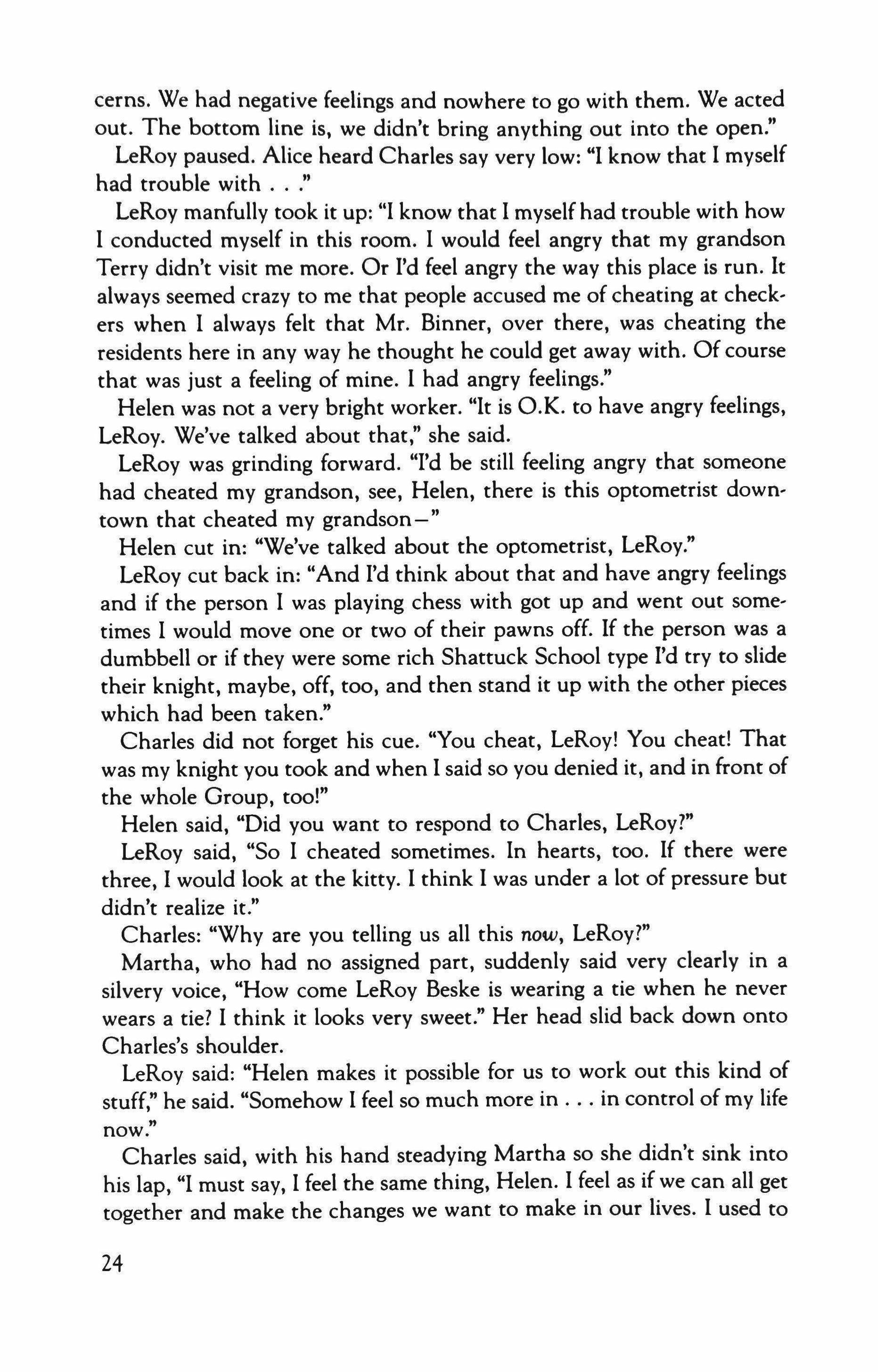
cerns. We had negative feelings and nowhere to go with them. We acted out. The bottom line is, we didn't bring anything out into the open."
LeRoy paused. Alice heard Charles say very low: "I know that I myself had trouble with
LeRoy manfully took it up: "I know that I myselfhad trouble with how I conducted myself in this room. I would feel angry that my grandson Terry didn't visit me more. Or I'd feel angry the way this place is run. It always seemed crazy to me that people accused me of cheating at checkers when I always felt that Mr. Binner, over there, was cheating the residents here in any way he thought he could get away with. Of course that was just a feeling of mine. I had angry feelings."
Helen was not a very bright worker. "It is O.K. to have angry feelings, LeRoy. We've talked about that," she said.
LeRoy was grinding forward. "I'd be still feeling angry that someone had cheated my grandson, see, Helen, there is this optometrist downtown that cheated my grandson -"
Helen cut in: "We've talked about the optometrist, LeRoy."
LeRoy cut back in: "And I'd think about that and have angry feelings and if the person I was playing chess with got up and went out sometimes I would move one or two of their pawns off. If the person was a dumbbell or if they were some rich Shattuck School type I'd try to slide their knight, maybe, off, too, and then stand it up with the other pieces which had been taken."
Charles did not forget his cue. "You cheat, LeRoy! You cheat! That was my knight you took and when I said so you denied it, and in front of the whole Group, too!"
Helen said, "Did you want to respond to Charles, leRoy?"
leRoy said, "So I cheated sometimes. In hearts, too. If there were three, I would look at the kitty. I think I was under a lot of pressure but didn't realize it."
Charles: "Why are you telling us all this now, LeRoy?"
Martha, who had no assigned part, suddenly said very clearly in a silvery voice, "How come LeRoy Beske is wearing a tie when he never wears a tie? I think it looks very sweet." Her head slid back down onto Charles's shoulder.
LeRoy said: "Helen makes it possible for us to work out this kind of stuff," he said. "Somehow I feel so much more in in control of my life now.
Charles said, with his hand steadying Martha so she didn't sink into his lap, "I must say, I feel the same thing, Helen. I feel as if we can all get together and make the changes we want to make in our lives. I used to
24
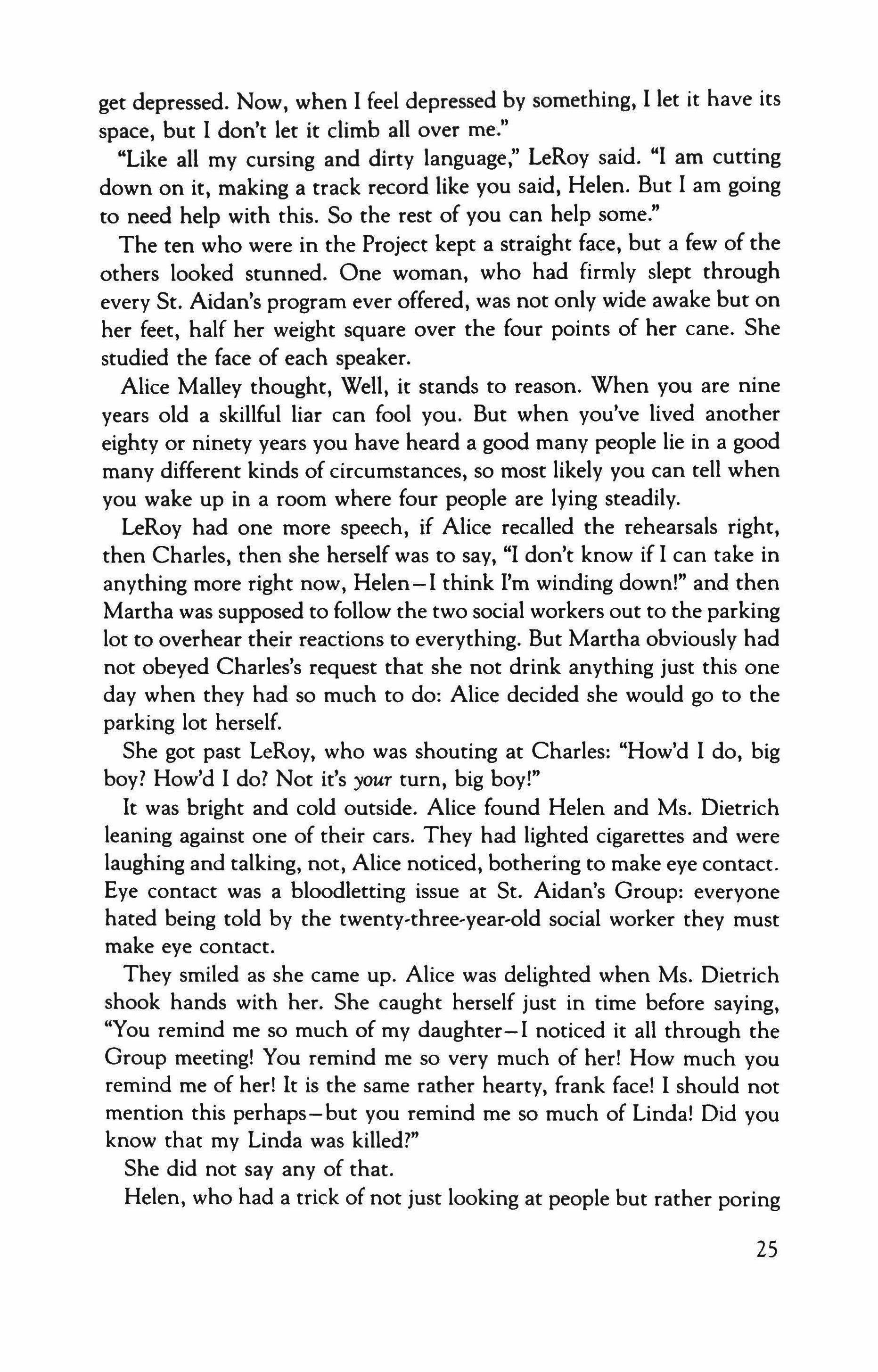
get depressed. Now, when I feel depressed by something, I let it have its space, but I don't let it climb all over me."
"Like all my cursing and dirty language," LeRoy said. "I am cutting down on it, making a track record like you said, Helen. But I am going to need help with this. So the rest of you can help some."
The ten who were in the Project kept a straight face, but a few of the others looked stunned. One woman, who had firmly slept through every St. Aidan's program ever offered, was not only wide awake but on her feet, half her weight square over the four points of her cane. She studied the face of each speaker.
Alice Malley thought, Well, it stands to reason. When you are nine years old a skillful liar can fool you. But when you've lived another eighty or ninety years you have heard a good many people lie in a good many different kinds of circumstances, so most likely you can tell when you wake up in a room where four people are lying steadily.
leRoy had one more speech, if Alice recalled the rehearsals right, then Charles, then she herself was to say, "I don't know if I can take in anything more right now, Helen-I think I'm winding down!" and then Martha was supposed to follow the two social workers out to the parking lot to overhear their reactions to everything. But Martha obviously had not obeyed Charles's request that she not drink anything just this one day when they had so much to do: Alice decided she would go to the parking lot herself.
She got past LeRoy, who was shouting at Charles: "How'd I do, big boy? How'd I do? Not it's your turn, big boy!"
It was bright and cold outside. Alice found Helen and Ms. Dietrich leaning against one of their cars. They had lighted cigarettes and were laughing and talking, not, Alice noticed, bothering to make eye contact. Eye contact was a bloodletting issue at St. Aidan's Group: everyone hated being told by the twenty-three-year-old social worker they must make eye contact.
They smiled as she came up. Alice was delighted when Ms. Dietrich shook hands with her. She caught herself just in time before saying, "You remind me so much of my daughter-I noticed it all through the Group meeting! You remind me so very much of her! How much you remind me of her! It is the same rather hearty, frank face! I should not mention this perhaps-but you remind me so much of Linda! Did you know that my Linda was killed?"
She did not say any of that.
Helen, who had a trick of not just looking at people but rather poring
25
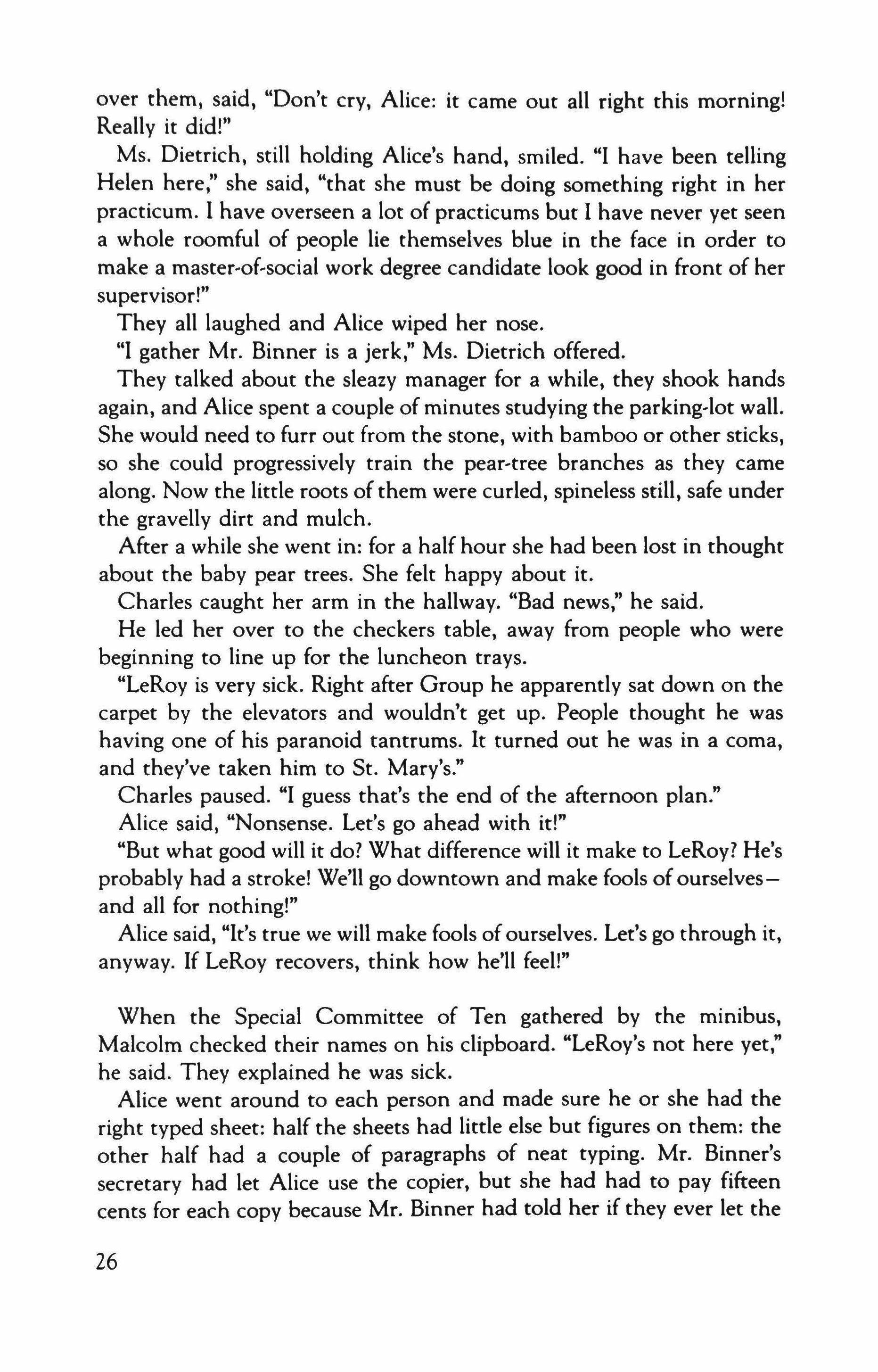
over them, said, "Don't cry, Alice: it came out all right this morning! Really it did!"
Ms. Dietrich, still holding Alice's hand, smiled. "I have been telling Helen here," she said, "that she must be doing something right in her practicum. I have overseen a lot of practicums but I have never yet seen a whole roomful of people lie themselves blue in the face in order to make a master-of-social work degree candidate look good in front of her supervisor!"
They all laughed and Alice wiped her nose.
"I gather Mr. Binner is a jerk," Ms. Dietrich offered.
They talked about the sleazy manager for a while, they shook hands again, and Alice spent a couple of minutes studying the parking-lot wall. She would need to furr out from the stone, with bamboo or other sticks, so she could progressively train the pear-tree branches as they came along. Now the little roots of them were curled, spineless still, safe under the gravelly dirt and mulch.
After a while she went in: for a half hour she had been lost in thought about the baby pear trees. She felt happy about it.
Charles caught her arm in the hallway. "Bad news," he said.
He led her over to the checkers table, away from people who were beginning to line up for the luncheon trays.
"LeRoy is very sick. Right after Group he apparently sat down on the carpet by the elevators and wouldn't get up. People thought he was having one of his paranoid tantrums. It turned out he was in a coma, and they've taken him to St. Mary's."
Charles paused. "I guess that's the end of the afternoon plan."
Alice said, "Nonsense. Let's go ahead with it!"
"But what good will it do? What difference will it make to LeRoy? He's probably had a stroke! We'll go downtown and make fools ofourselvesand all for nothing!"
Alice said, "It's true we will make fools ofourselves. Let's go through it, anyway. If LeRoy recovers, think how he'll feel!"
When the Special Committee of Ten gathered by the minibus, Malcolm checked their names on his clipboard. "LeRoy's not here yet," he said. They explained he was sick.
Alice went around to each person and made sure he or she had the right typed sheet: half the sheets had little else but figures on them: the other half had a couple of paragraphs of neat typing. Mr. Binner's secretary had let Alice use the copier, but she had had to pay fifteen cents for each copy because Mr. Binner had told her if they ever let the
26
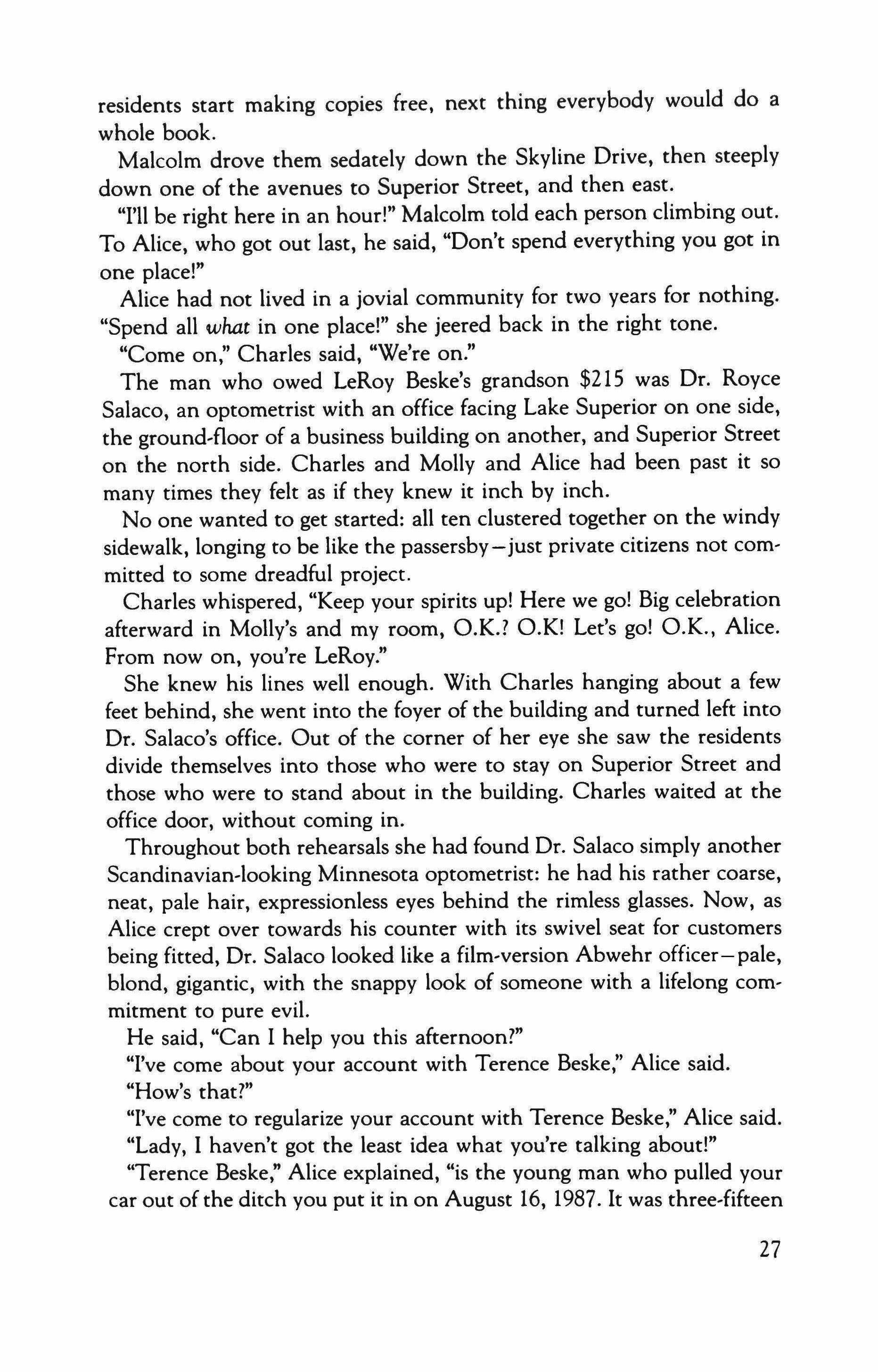
residents start making copies free, next thing everybody would do a whole book.
Malcolm drove them sedately down the Skyline Drive, then steeply down one of the avenues to Superior Street, and then east.
"I'll be right here in an hour!" Malcolm told each person climbing out. To Alice, who got out last, he said, "Don't spend everything you got in one place!"
Alice had not lived in a jovial community for two years for nothing. "Spend all what in one place!" she jeered back in the right tone.
"Come on," Charles said, "We're on."
The man who owed LeRoy Beske's grandson $215 was Dr. Royce Salaco, an optometrist with an office facing Lake Superior on one side, the ground-floor of a business building on another, and Superior Street on the north side. Charles and Molly and Alice had been past it so many times they felt as if they knew it inch by inch.
No one wanted to get started: all ten clustered together on the windy sidewalk, longing to be like the passersby - just private citizens not com' mitted to some dreadful project.
Charles whispered, "Keep your spirits up! Here we go! Big celebration afterward in Molly's and my room, O.K.? O.K! Let's go! O.K., Alice. From now on, you're LeRoy."
She knew his lines well enough. With Charles hanging about a few feet behind, she went into the foyer of the building and turned left into Dr. Salaco's office. Out of the corner of her eye she saw the residents divide themselves into those who were to stay on Superior Street and those who were to stand about in the building. Charles waited at the office door, without coming in.
Throughout both rehearsals she had found Dr. Salaco simply another Scandinavian-looking Minnesota optometrist: he had his rather coarse, neat, pale hair, expressionless eyes behind the rimless glasses. Now, as Alice crept over towards his counter with its swivel seat for customers being fitted, Dr. Salaco looked like a film,version Abwehr officer-pale, blond, gigantic, with the snappy look of someone with a lifelong com, mitment to pure evil.
He said, "Can I help you this afternoon?"
"I've come about your account with Terence Beske," Alice said.
"How's that?"
"I've come to regularize your account with Terence Beske," Alice said.
"Lady, I haven't got the least idea what you're talking about!"
"Terence Beske," Alice explained, "is the young man who pulled your car out of the ditch you put it in on August 16, 1987. It was three-fifteen
27
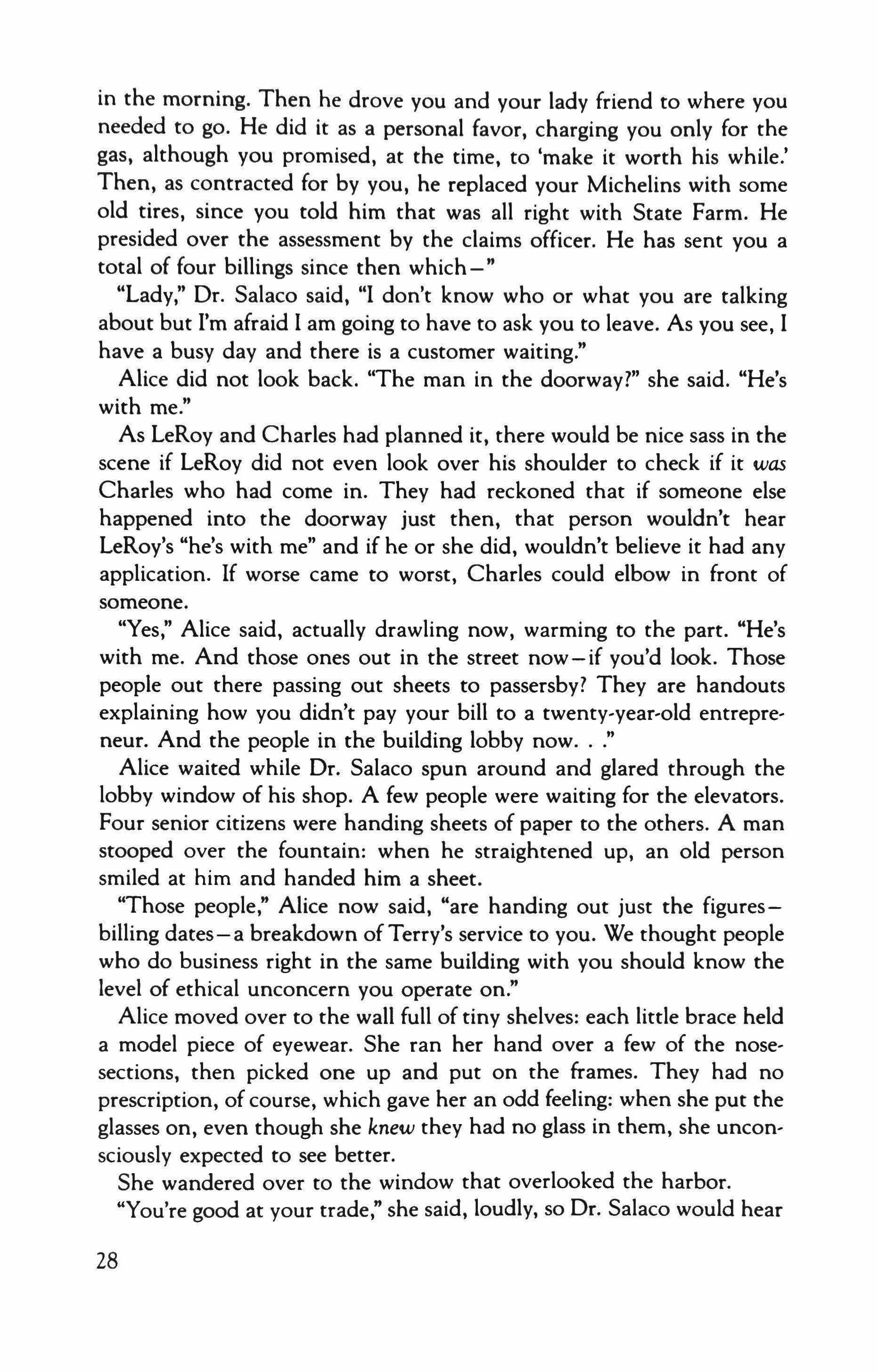
in the morning. Then he drove you and your lady friend to where you needed to go. He did it as a personal favor, charging you only for the gas, although you promised, at the time, to 'make it worth his while.' Then, as contracted for by you, he replaced your Michelins with some old tires, since you told him that was all right with State Farm. He presided over the assessment by the claims officer. He has sent you a total of four billings since then which -"
"Lady," Dr. Salaco said, "I don't know who or what you are talking about but I'm afraid I am going to have to ask you to leave. As you see, I have a busy day and there is a customer waiting."
Alice did not look back. "The man in the doorway?" she said. "He's with me."
As LeRoy and Charles had planned it, there would be nice sass in the scene if LeRoy did not even look over his shoulder to check if it was Charles who had come in. They had reckoned that if someone else happened into the doorway just then, that person wouldn't hear LeRoy's "he's with me" and if he or she did, wouldn't believe it had any application. If worse came to worst, Charles could elbow in front of someone.
"Yes," Alice said, actually drawling now, warming to the part. "He's with me. And those ones out in the street now-if you'd look. Those people out there passing out sheets to passersby? They are handouts explaining how you didn't pay your bill to a twenty-year-old entrepreneur. And the people in the building lobby now
Alice waited while Dr. Salaco spun around and glared through the lobby window of his shop. A few people were waiting for the elevators. Four senior citizens were handing sheets of paper to the others. A man stooped over the fountain: when he straightened up, an old person smiled at him and handed him a sheet.
"Those people," Alice now said, "are handing out just the figuresbilling dates-a breakdown of Terry's service to you. We thought people who do business right in the same building with you should know the level of ethical unconcern you operate on."
Alice moved over to the wall full of tiny shelves: each little brace held a model piece of eyewear. She ran her hand over a few of the nosesections, then picked one up and put on the frames. They had no prescription, of course, which gave her an odd feeling: when she put the glasses on, even though she knew they had no glass in them, she unconsciously expected to see better.
She wandered over to the window that overlooked the harbor.
"You're good at your trade," she said, loudly, so Dr. Salaco would hear
28
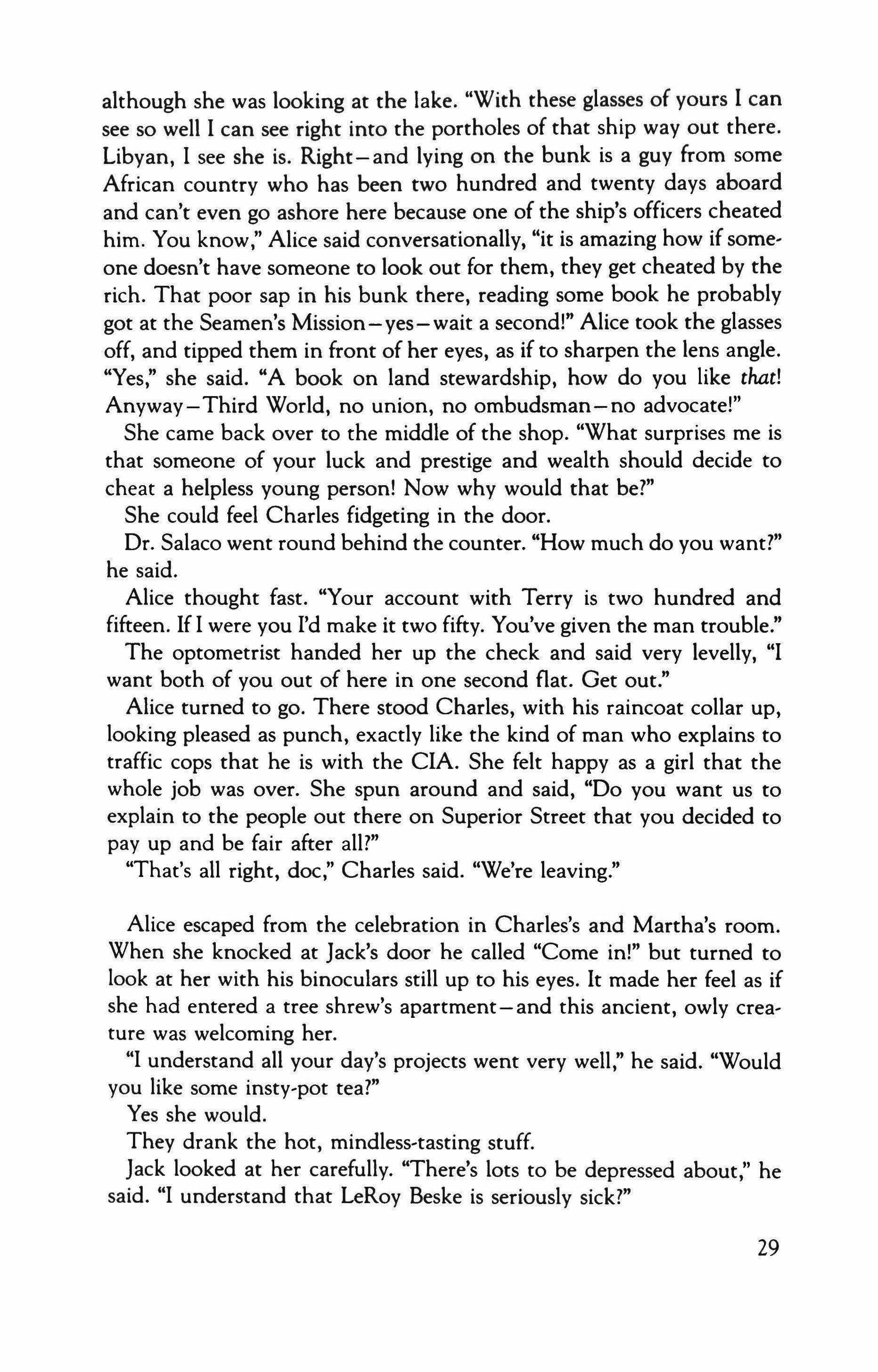
although she was looking at the lake. "With these glasses of yours I can see so weIll can see right into the portholes of that ship way out there. Libyan, 1 see she is. Right-and lying on the bunk is a guy from some African country who has been two hundred and twenty days aboard and can't even go ashore here because one of the ship's officers cheated him. You know," Alice said conversationally, "it is amazing how if someone doesn't have someone to look out for them, they get cheated by the rich. That poor sap in his bunk there, reading some book he probably got at the Seamen's Mission-yes-wait a second!" Alice took the glasses off, and tipped them in front of her eyes, as if to sharpen the lens angle. "Yes," she said. "A book on land stewardship, how do you like that! Anyway - Third World, no union, no ombudsman - no advocate!"
She came back over to the middle of the shop. "What surprises me is that someone of your luck and prestige and wealth should decide to cheat a helpless young person! Now why would that be?"
She could feel Charles fidgeting in the door.
Dr. Salaco went round behind the counter. "How much do you want?" he said.
Alice thought fast. "Your account with Terry is two hundred and fifteen. If! were you I'd make it two fifty. You've given the man trouble."
The optometrist handed her up the check and said very levelly, "I want both of you out of here in one second flat. Get out."
Alice turned to go. There stood Charles, with his raincoat collar up, looking pleased as punch, exactly like the kind of man who explains to traffic cops that he is with the CIA. She felt happy as a girl that the whole job was over. She spun around and said, "Do you want us to explain to the people out there on Superior Street that you decided to pay up and be fair after all?"
"That's all right, doc," Charles said. "We're leaving."
Alice escaped from the celebration in Charles's and Martha's room. When she knocked at Jack's door he called "Come in!" but turned to look at her with his binoculars still up to his eyes. It made her feel as if she had entered a tree shrew's apartment - and this ancient, owly creature was welcoming her.
"I understand all your day's projects went very well," he said. "Would you like some instv-pot tea?"
Yes she would.
They drank the hot, mindless-tasting stuff.
Jack looked at her carefully. "There's lots to be depressed about," he said. "I understand that LeRoy Beske is seriously sick?"
29
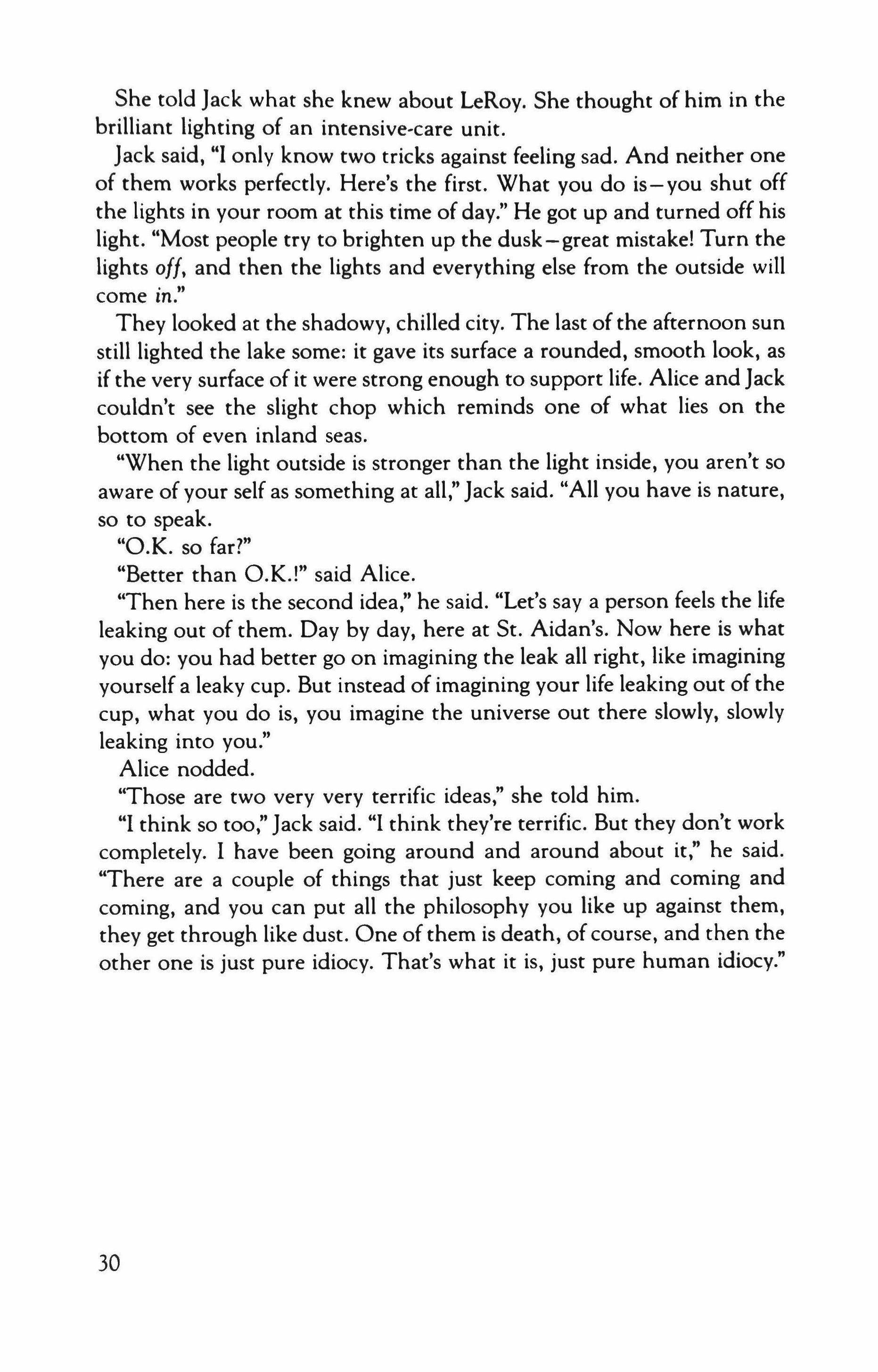
She told Jack what she knew about LeRoy. She thought of him in the brilliant lighting of an intensive-care unit.
Jack said, "I only know two tricks against feeling sad. And neither one of them works perfectly. Here's the first. What you do is-you shut off the lights in your room at this time of day." He got up and turned off his light. "Most people try to brighten up the dusk-great mistake! Turn the lights off, and then the lights and everything else from the outside will come in."
They looked at the shadowy, chilled city. The last of the afternoon sun still lighted the lake some: it gave its surface a rounded, smooth look, as if the very surface of it were strong enough to support life. Alice and Jack couldn't see the slight chop which reminds one of what lies on the bottom of even inland seas.
"When the light outside is stronger than the light inside, you aren't so aware of your self as something at all," Jack said. "All you have is nature, so to speak.
"O.K. so far?"
"Better than O.K.!" said Alice.
"Then here is the second idea," he said. "Let's say a person feels the life leaking out of them. Day by day, here at St. Aidan's. Now here is what you do: you had better go on imagining the leak all right, like imagining yourself a leaky cup. But instead of imagining your life leaking out of the cup, what you do is, you imagine the universe out there slowly, slowly leaking into you."
Alice nodded.
"Those are two very very terrific ideas," she told him. "I think so too," Jack said. "I think they're terrific. But they don't work completely. 1 have been going around and around about it," he said. "There are a couple of things that just keep coming and coming and coming, and you can put all the philosophy you like up against them, they get through like dust. One ofthem is death, of course, and then the other one is just pure idiocy. That's what it is, just pure human idiocy."
30
Pennsylvania
Fred Miller Robinson
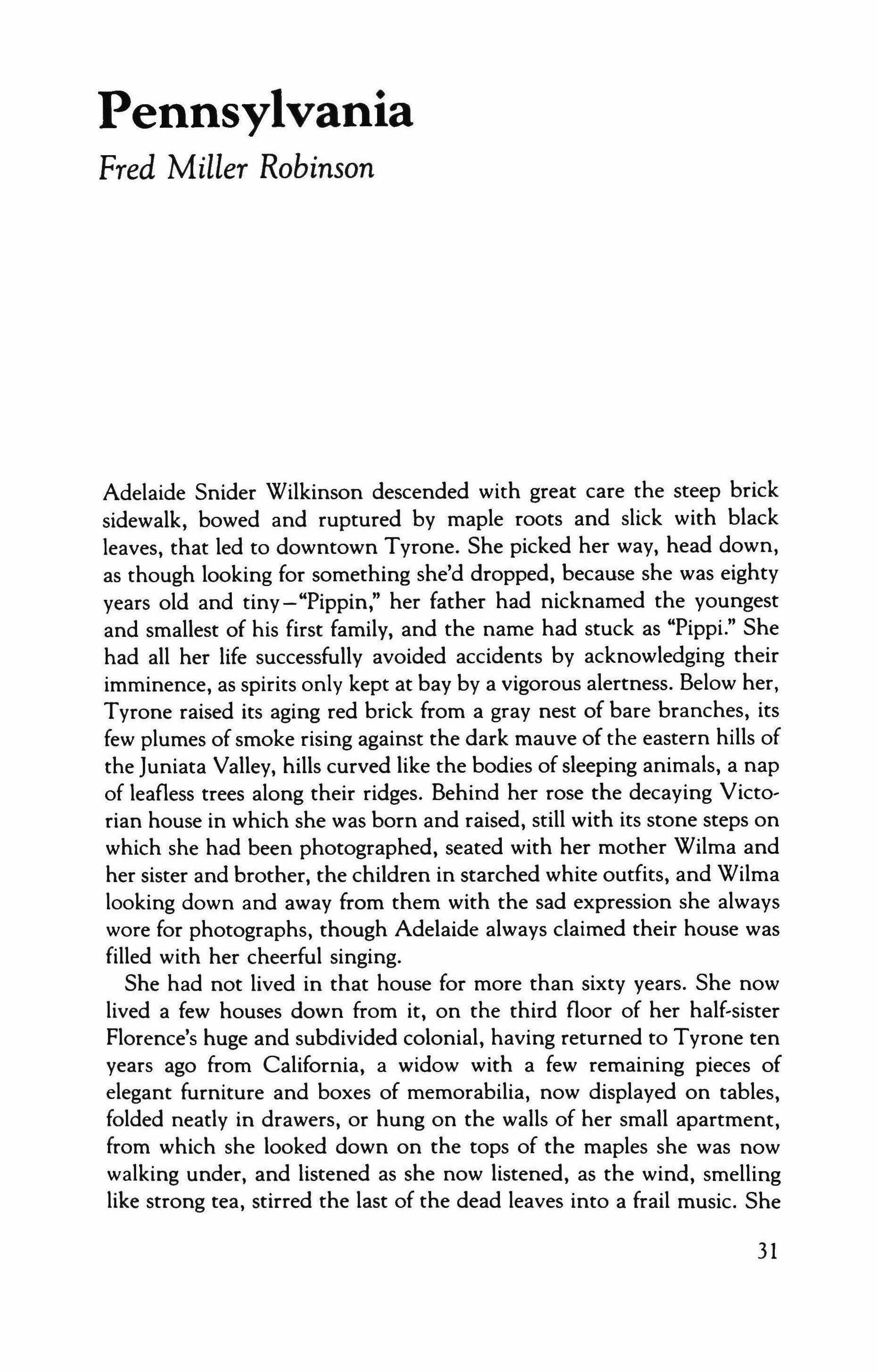
Adelaide Snider Wilkinson descended with great care the steep brick sidewalk, bowed and ruptured by maple roots and slick with black leaves, that led to downtown Tyrone. She picked her way, head down, as though looking for something she'd dropped, because she was eighty years old and tiny - "Pippin," her father had nicknamed the youngest and smallest of his first family, and the name had stuck as "Pippi," She had all her life successfully avoided accidents by acknowledging their imminence, as spirits only kept at bay by a vigorous alertness. Below her, Tyrone raised its aging red brick from a gray nest of bare branches, its few plumes of smoke rising against the dark mauve of the eastern hills of the Juniata Valley, hills curved like the bodies of sleeping animals, a nap of leafless trees along their ridges. Behind her rose the decaying Victorian house in which she was born and raised, still with its stone steps on which she had been photographed, seated with her mother Wilma and her sister and brother, the children in starched white outfits, and Wilma looking down and away from them with the sad expression she always wore for photographs, though Adelaide always claimed their house was filled with her cheerful singing.
She had not lived in that house for more than sixty years. She now lived a few houses down from it, on the third floor of her half-sister Florence's huge and subdivided colonial, having returned to Tyrone ten years ago from California, a widow with a few remaining pieces of elegant furniture and boxes of memorabilia, now displayed on tables, folded neatly in drawers, or hung on the walls of her small apartment, from which she looked down on the tops of the maples she was now walking under, and listened as she now listened, as the wind, smelling like strong tea, stirred the last of the dead leaves into a frail music. She
31
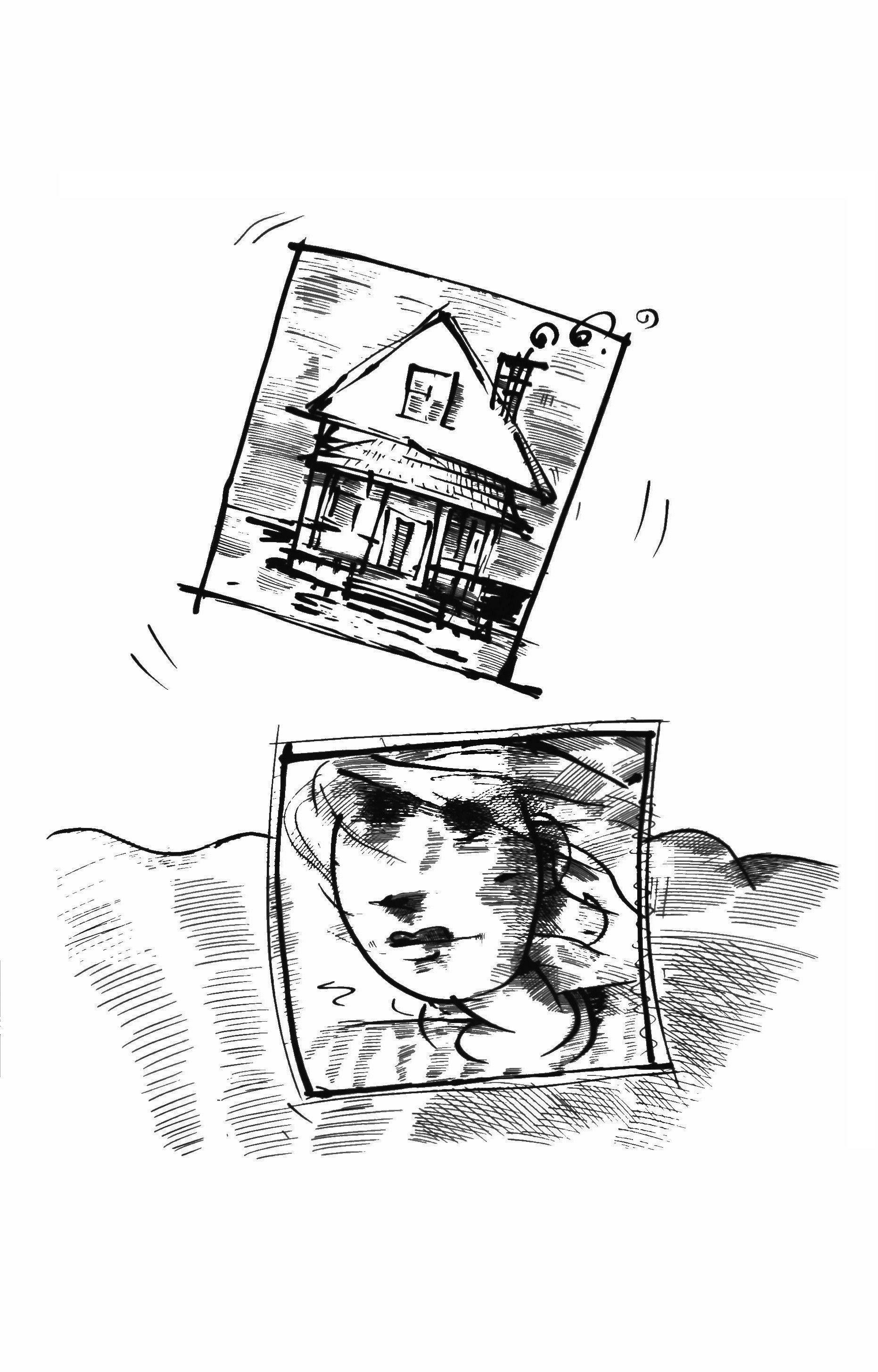
I; I I
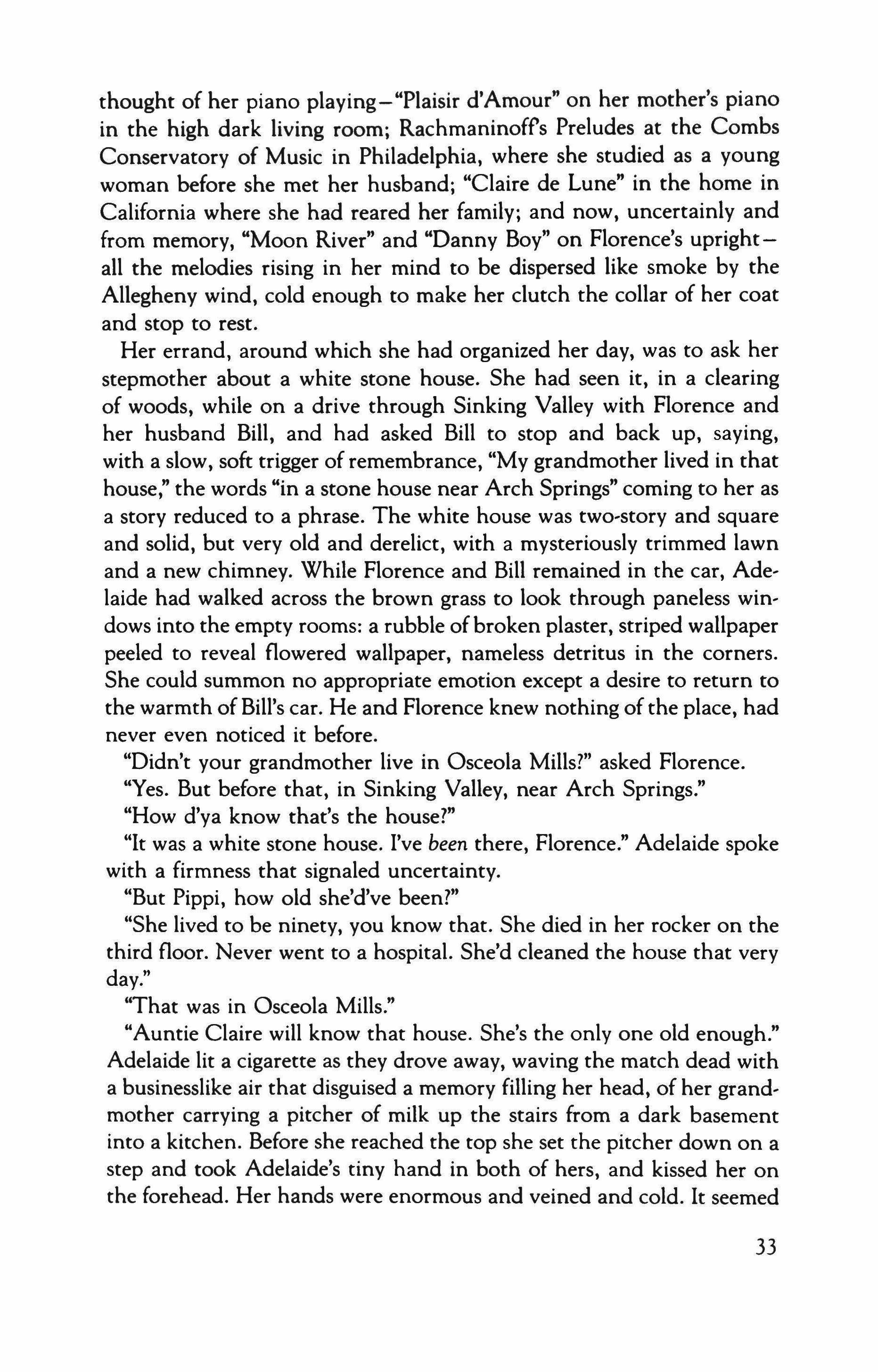
thought of her piano playing-"Plaisir d'Amour" on her mother's piano in the high dark living room; Rachmaninoff's Preludes at the Combs Conservatory of Music in Philadelphia, where she studied as a young woman before she met her husband; "Claire de Lune" in the home in California where she had reared her family; and now, uncertainly and from memory, "Moon River" and "Danny Boy" on Florence's uprightall the melodies rising in her mind to be dispersed like smoke by the Allegheny wind, cold enough to make her clutch the collar of her coat and stop to rest.
Her errand, around which she had organized her day, was to ask her stepmother about a white stone house. She had seen it, in a clearing of woods, while on a drive through Sinking Valley with Florence and her husband Bill, and had asked Bill to stop and back up, saying, with a slow, soft trigger of remembrance, "My grandmother lived in that house," the words "in a stone house near Arch Springs" coming to her as a story reduced to a phrase. The white house was two-story and square and solid, but very old and derelict, with a mysteriously trimmed lawn and a new chimney. While Florence and Bill remained in the car, Adelaide had walked across the brown grass to look through paneless win' dows into the empty rooms: a rubble ofbroken plaster, striped wallpaper peeled to reveal flowered wallpaper, nameless detritus in the corners. She could summon no appropriate emotion except a desire to return to the warmth of Bill's car. He and Florence knew nothing of the place, had never even noticed it before.
"Didn't your grandmother live in Osceola Mills?" asked Florence.
"Yes. But before that, in Sinking Valley, near Arch Springs."
"How d'ya know that's the house?"
"It was a white stone house. I've been there, Florence." Adelaide spoke with a firmness that signaled uncertainty.
"But Pippi, how old she'd've been?"
"She lived to be ninety, you know that. She died in her rocker on the third floor. Never went to a hospital. She'd cleaned the house that very day."
"That was in Osceola Mills."
"Auntie Claire will know that house. She's the only one old enough." Adelaide lit a cigarette as they drove away, waving the match dead with a businesslike air that disguised a memory filling her head, of her grand, mother carrying a pitcher of milk up the stairs from a dark basement into a kitchen. Before she reached the top she set the pitcher down on a step and took Adelaide's tiny hand in both of hers, and kissed her on the forehead. Her hands were enormous and veined and cold. It seemed
33
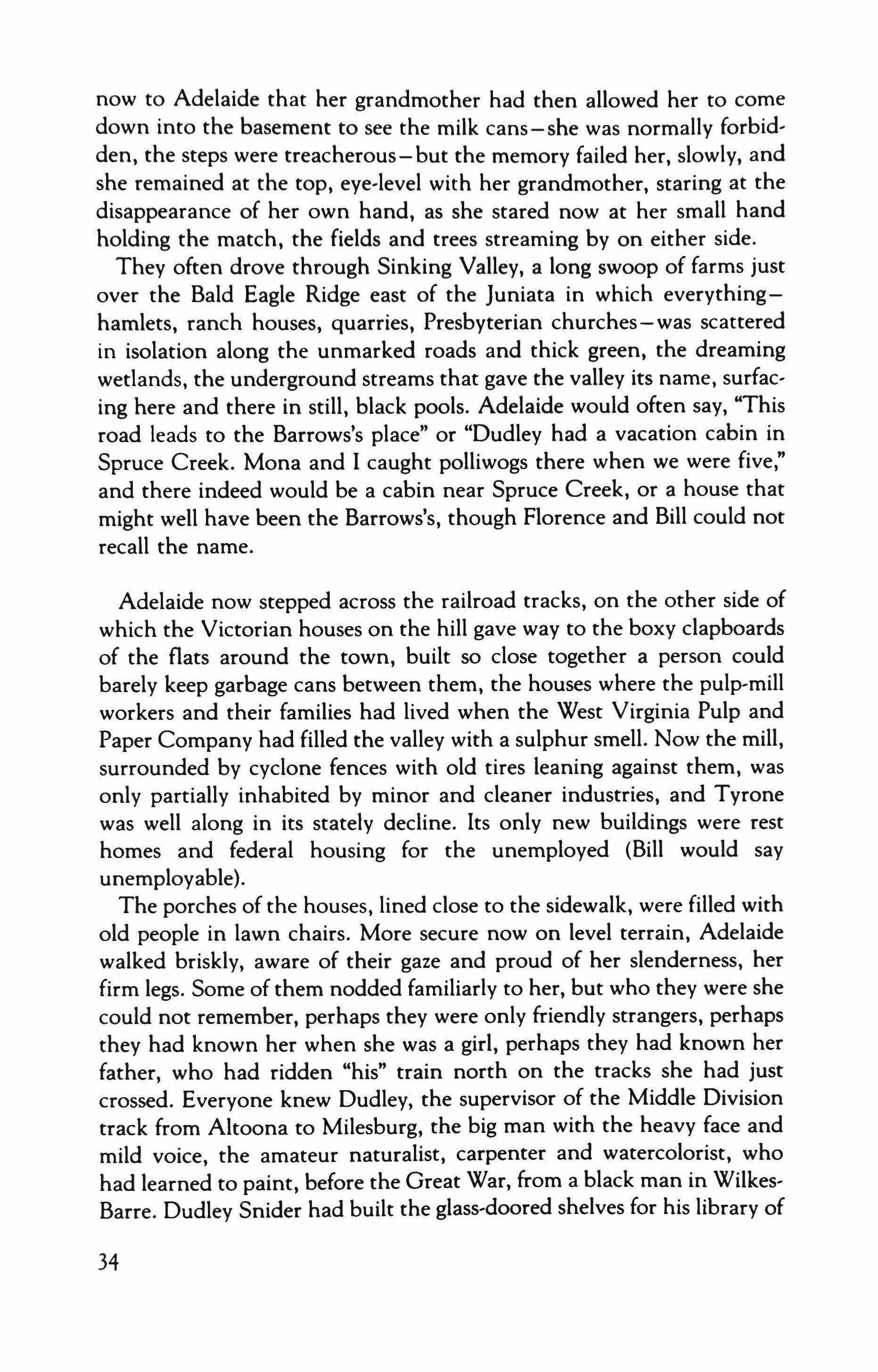
now to Adelaide that her grandmother had then allowed her to come down into the basement to see the milk cans-she was normally forbid, den, the steps were treacherous- but the memory failed her, slowly, and she remained at the top, eye-level with her grandmother, staring at the disappearance of her own hand, as she stared now at her small hand holding the match, the fields and trees streaming by on either side.
They often drove through Sinking Valley, a long swoop of farms just over the Bald Eagle Ridge east of the Juniata in which everythinghamlets, ranch houses, quarries, Presbyterian churches-was scattered in isolation along the unmarked roads and thick green, the dreaming wetlands, the underground streams that gave the valley its name, surfacing here and there in still, black pools. Adelaide would often say, "This road leads to the Barrows's place" or "Dudley had a vacation cabin in Spruce Creek. Mona and I caught polliwogs there when we were five," and there indeed would be a cabin near Spruce Creek, or a house that might well have been the Barrows's, though Florence and Bill could not recall the name.
Adelaide now stepped across the railroad tracks, on the other side of which the Victorian houses on the hill gave way to the boxy clapboards of the flats around the town, built so close together a person could barely keep garbage cans between them, the houses where the pulp-mill workers and their families had lived when the West Virginia Pulp and Paper Company had filled the valley with a sulphur smell. Now the mill, surrounded by cyclone fences with old tires leaning against them, was only partially inhabited by minor and cleaner industries, and Tyrone was well along in its stately decline. Its only new buildings were rest homes and federal housing for the unemployed (Bill would say unemployable).
The porches of the houses, lined close to the sidewalk, were filled with old people in lawn chairs. More secure now on level terrain, Adelaide walked briskly, aware of their gaze and proud of her slenderness, her firm legs. Some of them nodded familiarly to her, but who they were she could not remember, perhaps they were only friendly strangers, perhaps they had known her when she was a girl, perhaps they had known her father, who had ridden "his" train north on the tracks she had just crossed. Everyone knew Dudley, the supervisor of the Middle Division track from Altoona to Milesburg, the big man with the heavy face and mild voice, the amateur naturalist, carpenter and watercolorist, who had learned to paint, before the Great War, from a black man in WilkesBarre. Dudley Snider had built the glass-doored shelves for his library of
34
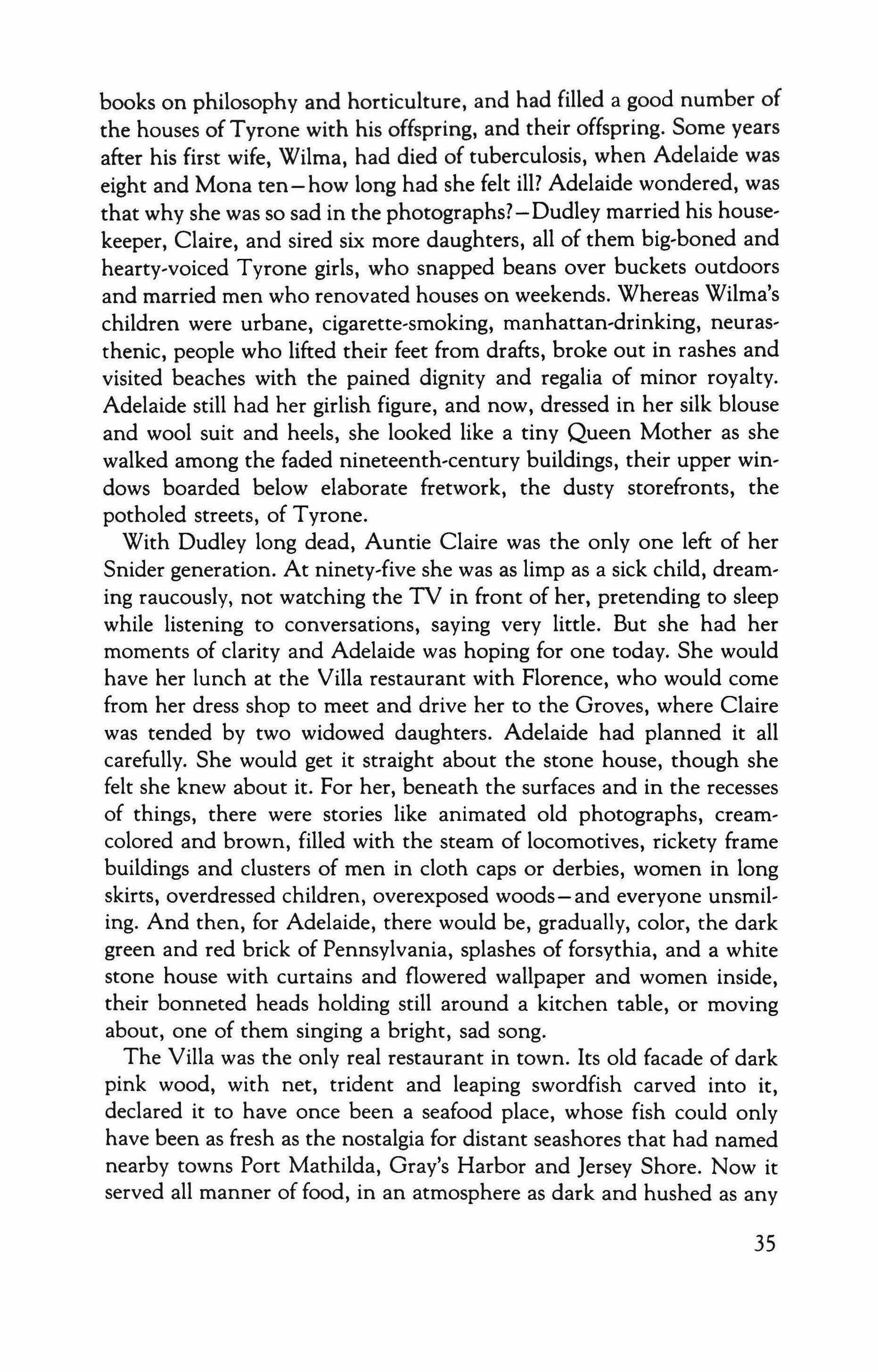
books on philosophy and horticulture, and had filled a good number of the houses of Tyrone with his offspring, and their offspring. Some years after his first wife, Wilma, had died of tuberculosis, when Adelaide was eight and Mona ten - how long had she felt ill? Adelaide wondered, was that why she was so sad in the photographs? - Dudley married his housekeeper, Claire, and sired six more daughters, all of them big-boned and hearty-voiced Tyrone girls, who snapped beans over buckets outdoors and married men who renovated houses on weekends. Whereas Wilma's children were urbane, cigarette-smoking, manhattan-drinking, neurasthenic, people who lifted their feet from drafts, broke out in rashes and visited beaches with the pained dignity and regalia of minor royalty. Adelaide still had her girlish figure, and now, dressed in her silk blouse and wool suit and heels, she looked like a tiny Queen Mother as she walked among the faded nineteenth-century buildings, their upper windows boarded below elaborate fretwork, the dusty storefronts, the potholed streets, of Tyrone.
With Dudley long dead, Auntie Claire was the only one left of her Snider generation. At ninety-five she was as limp as a sick child, dreaming raucously, not watching the TV in front of her, pretending to sleep while listening to conversations, saying very little. But she had her moments of clarity and Adelaide was hoping for one today. She would have her lunch at the Villa restaurant with Florence, who would come from her dress shop to meet and drive her to the Groves, where Claire was tended by two widowed daughters. Adelaide had planned it all carefully. She would get it straight about the stone house, though she felt she knew about it. For her, beneath the surfaces and in the recesses of things, there were stories like animated old photographs, creamcolored and brown, filled with the steam of locomotives, rickety frame buildings and clusters of men in cloth caps or derbies, women in long skirts, overdressed children, overexposed woods-and everyone unsmiling. And then, for Adelaide, there would be, gradually, color, the dark green and red brick of Pennsylvania, splashes of forsythia, and a white stone house with curtains and flowered wallpaper and women inside, their bonneted heads holding still around a kitchen table, or moving about, one of them singing a bright, sad song.
The Villa was the only real restaurant in town. Its old facade of dark pink wood, with net, trident and leaping swordfish carved into it, declared it to have once been a seafood place, whose fish could only have been as fresh as the nostalgia for distant seashores that had named nearby towns Port Mathilda, Gray's Harbor and Jersey Shore. Now it served all manner of food, in an atmosphere as dark and hushed as any
35
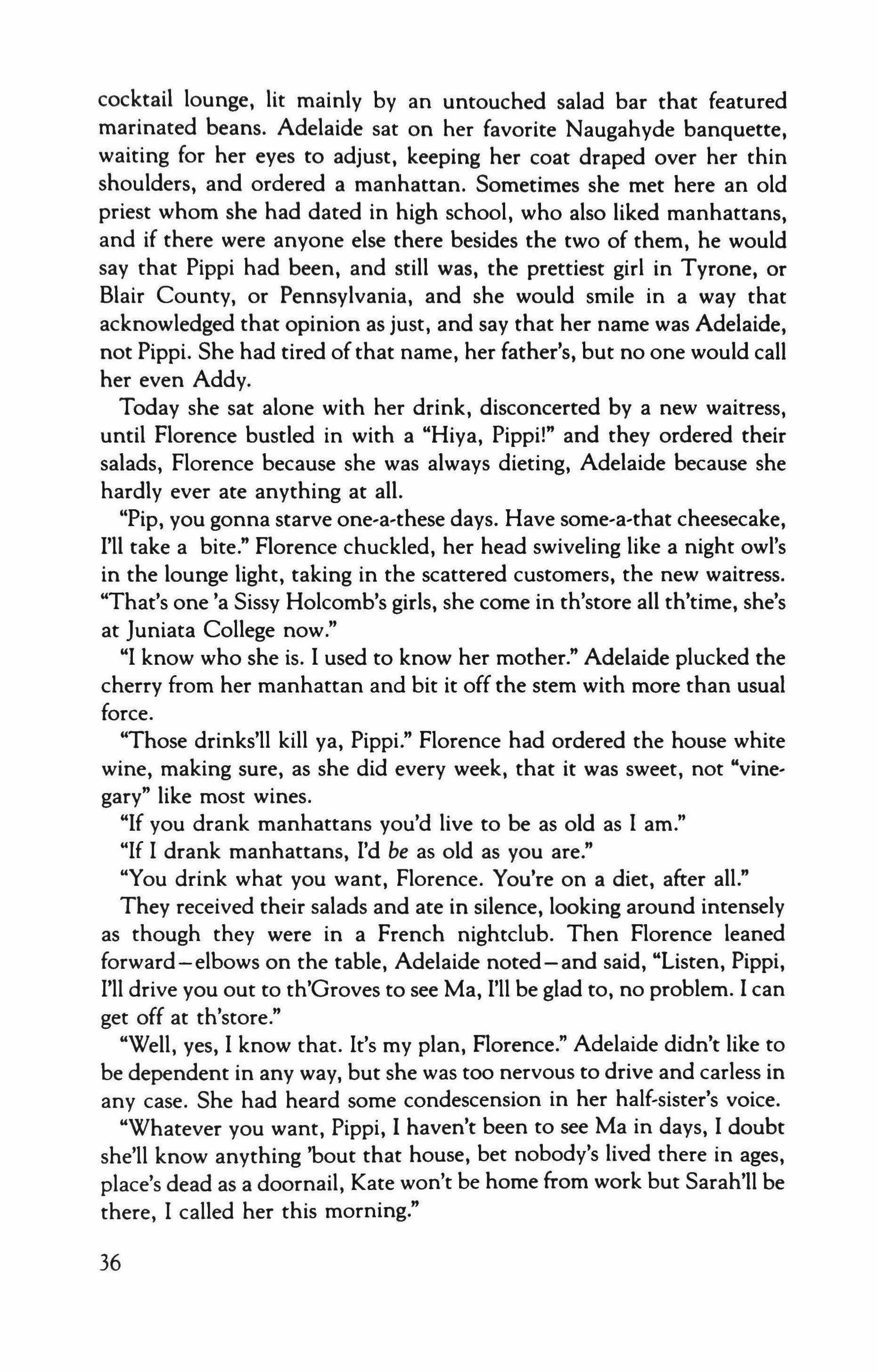
cocktail lounge. lit mainly by an untouched salad bar that featured marinated beans. Adelaide sat on her favorite Naugahyde banquette. waiting for her eyes to adjust. keeping her coat draped over her thin shoulders. and ordered a manhattan. Sometimes she met here an old priest whom she had dated in high school. who also liked manhattans. and if there were anyone else there besides the two of them. he would say that Pippi had been. and still was. the prettiest girl in Tyrone. or Blair County. or Pennsylvania. and she would smile in a way that acknowledged that opinion as just. and say that her name was Adelaide. not Pippi. She had tired of that name. her father's, but no one would call her even Addy.
Today she sat alone with her drink. disconcerted by a new waitress. until Florence bustled in with a "Hiva, Pippil" and they ordered their salads. Florence because she was always dieting. Adelaide because she hardly ever ate anything at all.
"Pip. you gonna starve one-a-these days. Have some-a-that cheesecake. l'll take a bite." Florence chuckled. her head swiveling like a night owl's in the lounge light. taking in the scattered customers. the new waitress. "That's one 'a Sissy Holcomb's girls. she come in th'store all th'tirne, she's at Juniata College now."
"I know who she is. I used to know her mother." Adelaide plucked the cherry from her manhattan and bit it off the stem with more than usual force.
"Those drinks'll kill va, Pippi," Florence had ordered the house white wine, making sure, as she did every week, that it was sweet. not "vinegary" like most wines.
"If you drank manhattans you'd live to be as old as I am."
"If I drank manhattans, I'd be as old as you are."
"You drink what you want, Florence. You're on a diet. after all."
They received their salads and ate in silence, looking around intensely as though they were in a French nightclub. Then Florence leaned forward-elbows on the table, Adelaide noted-and said. "Listen. Pippi, I'll drive you out to th'Groves to see Ma, I'll be glad to. no problem. I can get off at th'store,"
"Well, yes, I know that. It's my plan, Florence." Adelaide didn't like to be dependent in any way, but she was too nervous to drive and carless in any case. She had heard some condescension in her half-sister's voice.
"Whatever you want, Pippi, I haven't been to see Ma in days, I doubt she'll know anything 'bout that house, bet nobody's lived there in ages. place's dead as a doornail, Kate won't be home from work but Sarah'll be there. I called her this morning."
36
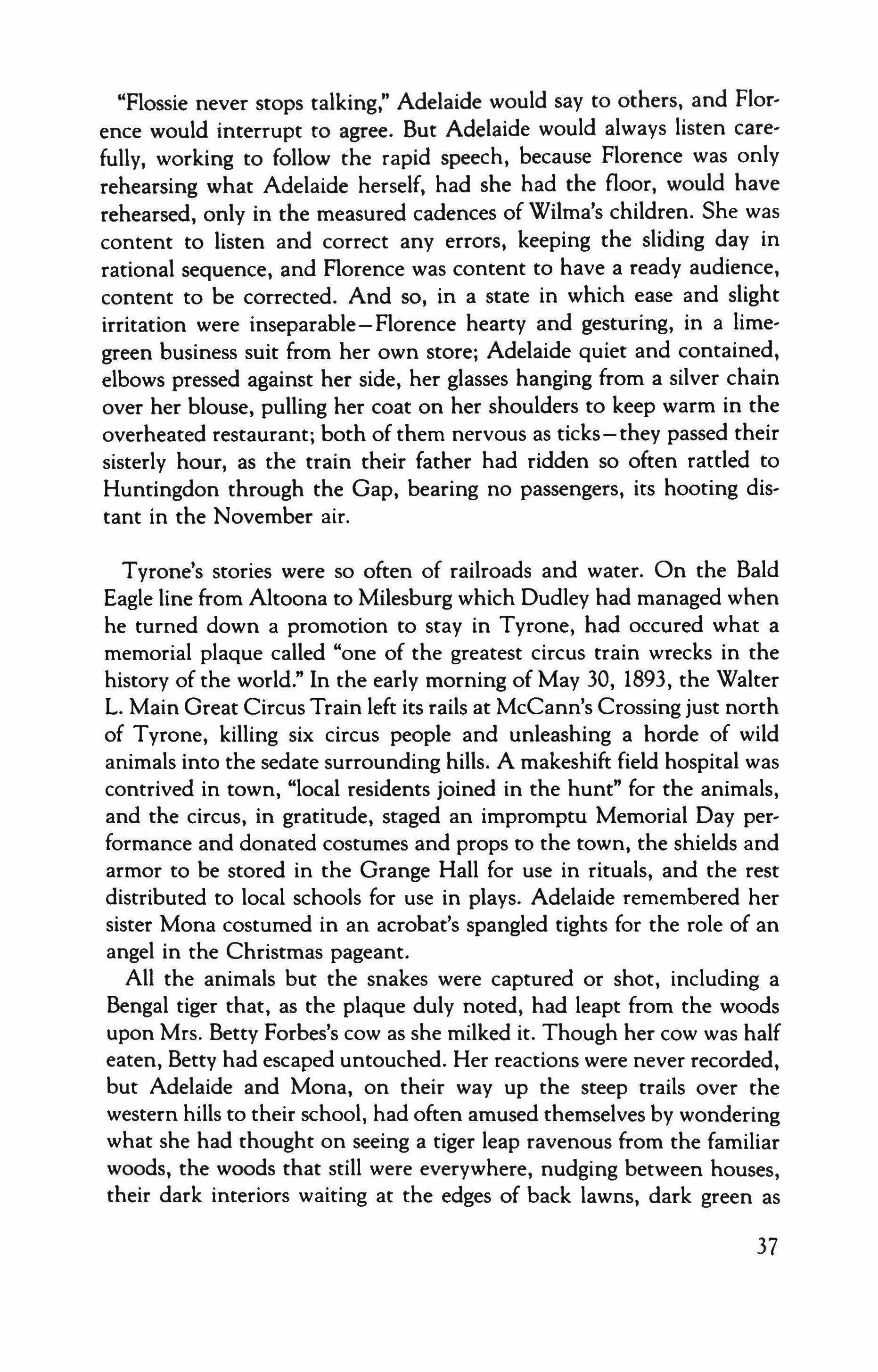
"Flossie never stops talking," Adelaide would say to others, and Florence would interrupt to agree. But Adelaide would always listen care, fully, working to follow the rapid speech, because Florence was only rehearsing what Adelaide herself, had she had the floor, would have rehearsed, only in the measured cadences of Wilma's children. She was content to listen and correct any errors, keeping the sliding day in rational sequence, and Florence was content to have a ready audience, content to be corrected. And so, in a state in which ease and slight irritation were inseparable-Florence hearty and gesturing, in a lime, green business suit from her own store; Adelaide quiet and contained, elbows pressed against her side, her glasses hanging from a silver chain over her blouse, pulling her coat on her shoulders to keep warm in the overheated restaurant; both of them nervous as ticks-they passed their sisterly hour, as the train their father had ridden so often rattled to Huntingdon through the Gap, bearing no passengers, its hooting dis, tant in the November air.
Tyrone's stories were so often of railroads and water. On the Bald Eagle line from Altoona to Milesburg which Dudley had managed when he turned down a promotion to stay in Tyrone, had occured what a memorial plaque called "one of the greatest circus train wrecks in the history of the world." In the early morning of May 30, 1893, the Walter L. Main Great Circus Train left its rails at McCann's Crossing just north of Tyrone, killing six circus people and unleashing a horde of wild animals into the sedate surrounding hills. A makeshift field hospital was contrived in town, "local residents joined in the hunt" for the animals, and the circus, in gratitude, staged an impromptu Memorial Day per' formance and donated costumes and props to the town, the shields and armor to be stored in the Grange Hall for use in rituals, and the rest distributed to local schools for use in plays. Adelaide remembered her sister Mona costumed in an acrobat's spangled tights for the role of an angel in the Christmas pageant.
All the animals but the snakes were captured or shot, including a Bengal tiger that, as the plaque duly noted, had leapt from the woods upon Mrs. Betty Forbes's cow as she milked it. Though her cow was half eaten, Betty had escaped untouched. Her reactions were never recorded, but Adelaide and Mona, on their way up the steep trails over the western hills to their school, had often amused themselves by wondering what she had thought on seeing a tiger leap ravenous from the familiar woods, the woods that still were everywhere, nudging between houses, their dark interiors waiting at the edges of back lawns, dark green as
37
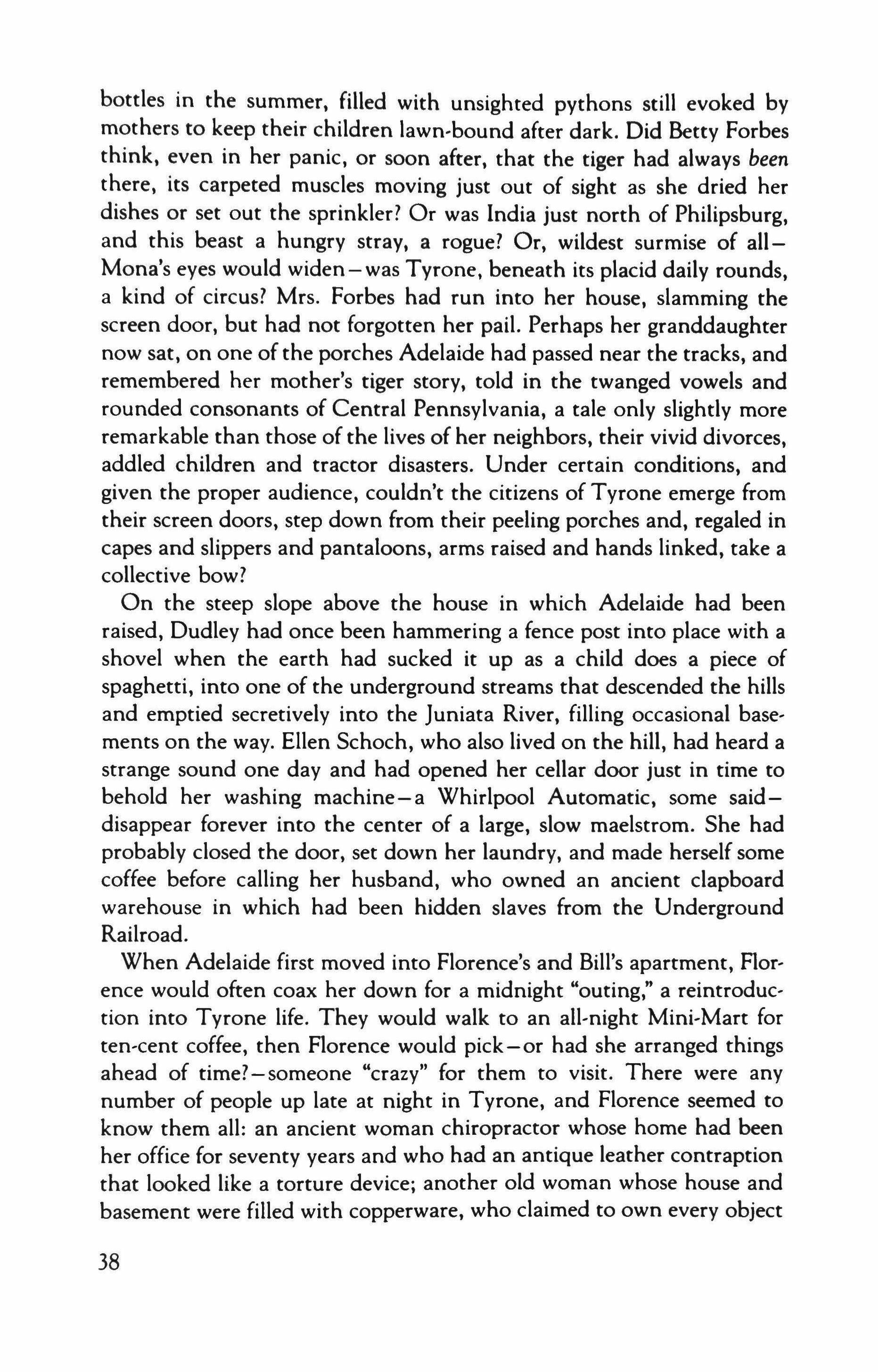
bottles in the summer, filled with unsighred pythons still evoked by mothers to keep their children lawn-bound after dark. Did Betty Forbes think, even in her panic, or soon after, that the tiger had always been there, its carpeted muscles moving just out of sight as she dried her dishes or set out the sprinkler? Or was India just north of Philipsburg, and this beast a hungry stray, a rogue? Or, wildest surmise of allMona's eyes would widen - was Tyrone, beneath its placid daily rounds, a kind of circus? Mrs. Forbes had run into her house, slamming the screen door, but had not forgotten her pail. Perhaps her granddaughter now sat, on one of the porches Adelaide had passed near the tracks, and remembered her mother's tiger story, told in the twanged vowels and rounded consonants of Central Pennsylvania, a tale only slightly more remarkable than those of the lives of her neighbors, their vivid divorces, addled children and tractor disasters. Under certain conditions, and given the proper audience, couldn't the citizens of Tyrone emerge from their screen doors, step down from their peeling porches and, regaled in capes and slippers and pantaloons, arms raised and hands linked, take a collective bow?
On the steep slope above the house in which Adelaide had been raised, Dudley had once been hammering a fence post into place with a shovel when the earth had sucked it up as a child does a piece of spaghetti, into one of the underground streams that descended the hills and emptied secretively into the Juniata River, filling occasional basements on the way. Ellen Schoch, who also lived on the hill, had heard a strange sound one day and had opened her cellar door just in time to behold her washing machine-a Whirlpool Automatic, some saiddisappear forever into the center of a large, slow maelstrom. She had probably closed the door, set down her laundry, and made herself some coffee before calling her husband, who owned an ancient clapboard warehouse in which had been hidden slaves from the Underground Railroad.
When Adelaide first moved into Florence's and Bill's apartment, Florence would often coax her down for a midnight "outing," a reintroduction into Tyrone life. They would walk to an all-night Mini-Mart for ten-cent coffee, then Florence would pick-or had she arranged things ahead of time?-someone "crazy" for them to visit. There were any number of people up late at night in Tyrone, and Florence seemed to know them all: an ancient woman chiropractor whose home had been her office for seventy years and who had an antique leather contraption that looked like a torture device; another old woman whose house and basement were filled with copperware, who claimed to own every object
38
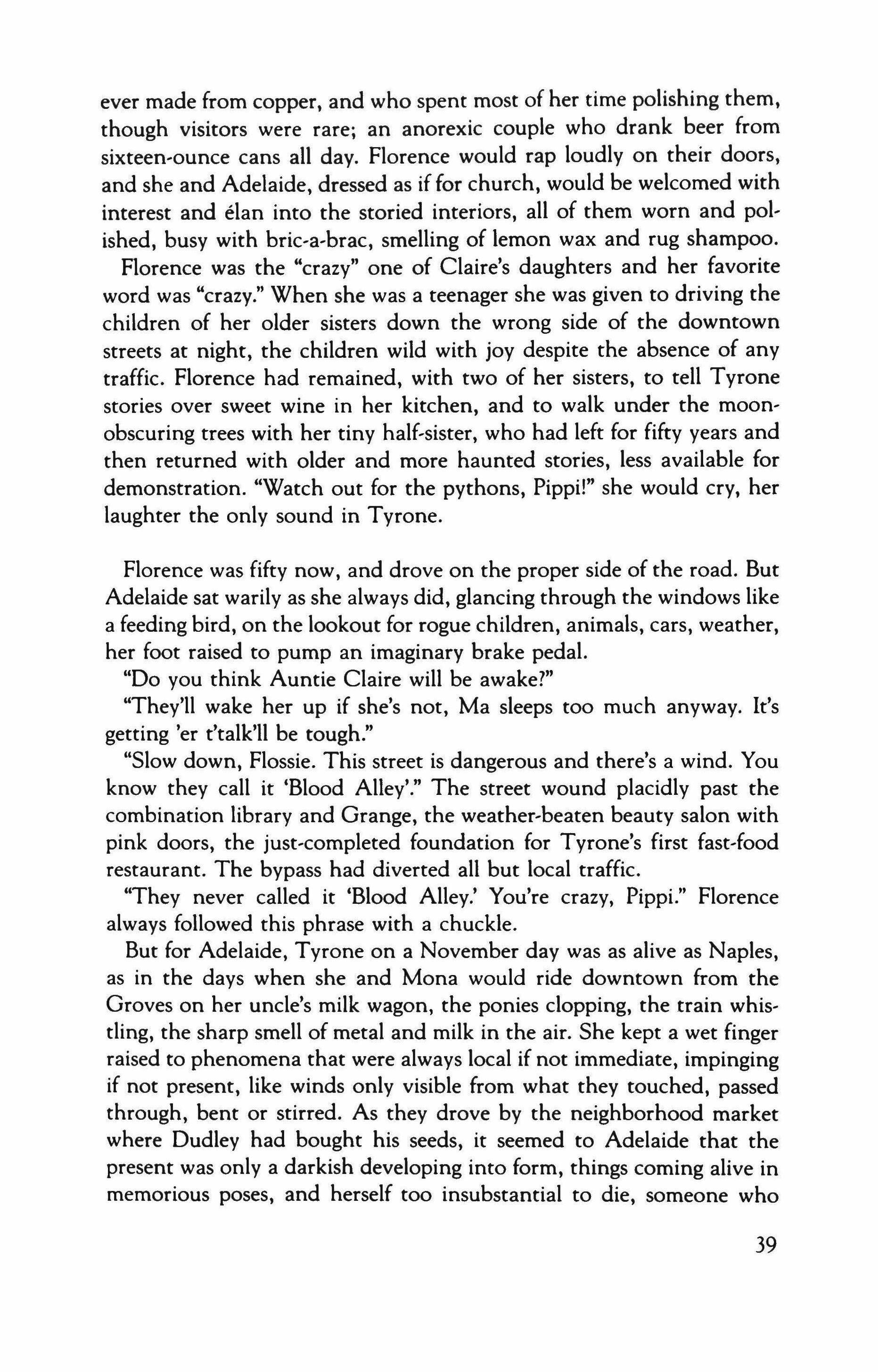
ever made from copper, and who spent most of her time polishing them, though visitors were rare; an anorexic couple who drank beer from sixteen-ounce cans all day. Florence would rap loudly on their doors, and she and Adelaide, dressed as if for church, would be welcomed with interest and elan into the storied interiors, all of them worn and polished, busy with bric-a-brac, smelling of lemon wax and rug shampoo.
Florence was the "crazy" one of Claire's daughters and her favorite word was "crazy." When she was a teenager she was given to driving the children of her older sisters down the wrong side of the downtown streets at night, the children wild with joy despite the absence of any traffic. Florence had remained, with two of her sisters, to tell Tyrone stories over sweet wine in her kitchen, and to walk under the moonobscuring trees with her tiny half-sister, who had left for fifty years and then returned with older and more haunted stories, less available for demonstration. "Watch out for the pythons, Pippi!" she would cry, her laughter the only sound in Tyrone.
Florence was fifty now, and drove on the proper side of the road. But Adelaide sat warily as she always did, glancing through the windows like a feeding bird, on the lookout for rogue children, animals, cars, weather, her foot raised to pump an imaginary brake pedal.
"Do you think Auntie Claire will be awake?"
"They'll wake her up if she's not, Ma sleeps too much anyway. It's getting 'er t'talk'll be tough."
"Slow down, Flossie. This street is dangerous and there's a wind. You know they call it 'Blood Alley'." The street wound placidly past the combination library and Grange, the weather-beaten beauty salon with pink doors, the just-completed foundation for Tyrone's first fast-food restaurant. The bypass had diverted all but local traffic.
"They never called it 'Blood Alley.' You're crazy, Pippi," Florence always followed this phrase with a chuckle.
But for Adelaide, Tyrone on a November day was as alive as Naples, as in the days when she and Mona would ride downtown from the Groves on her uncle's milk wagon, the ponies clopping, the train whistling, the sharp smell of metal and milk in the air. She kept a wet finger raised to phenomena that were always local if not immediate, impinging if not present, like winds only visible from what they touched, passed through, bent or stirred. As they drove by the neighborhood market where Dudley had bought his seeds, it seemed to Adelaide that the present was only a darkish developing into form, things coming alive in memorious poses, and herself too insubstantial to die, someone who
39
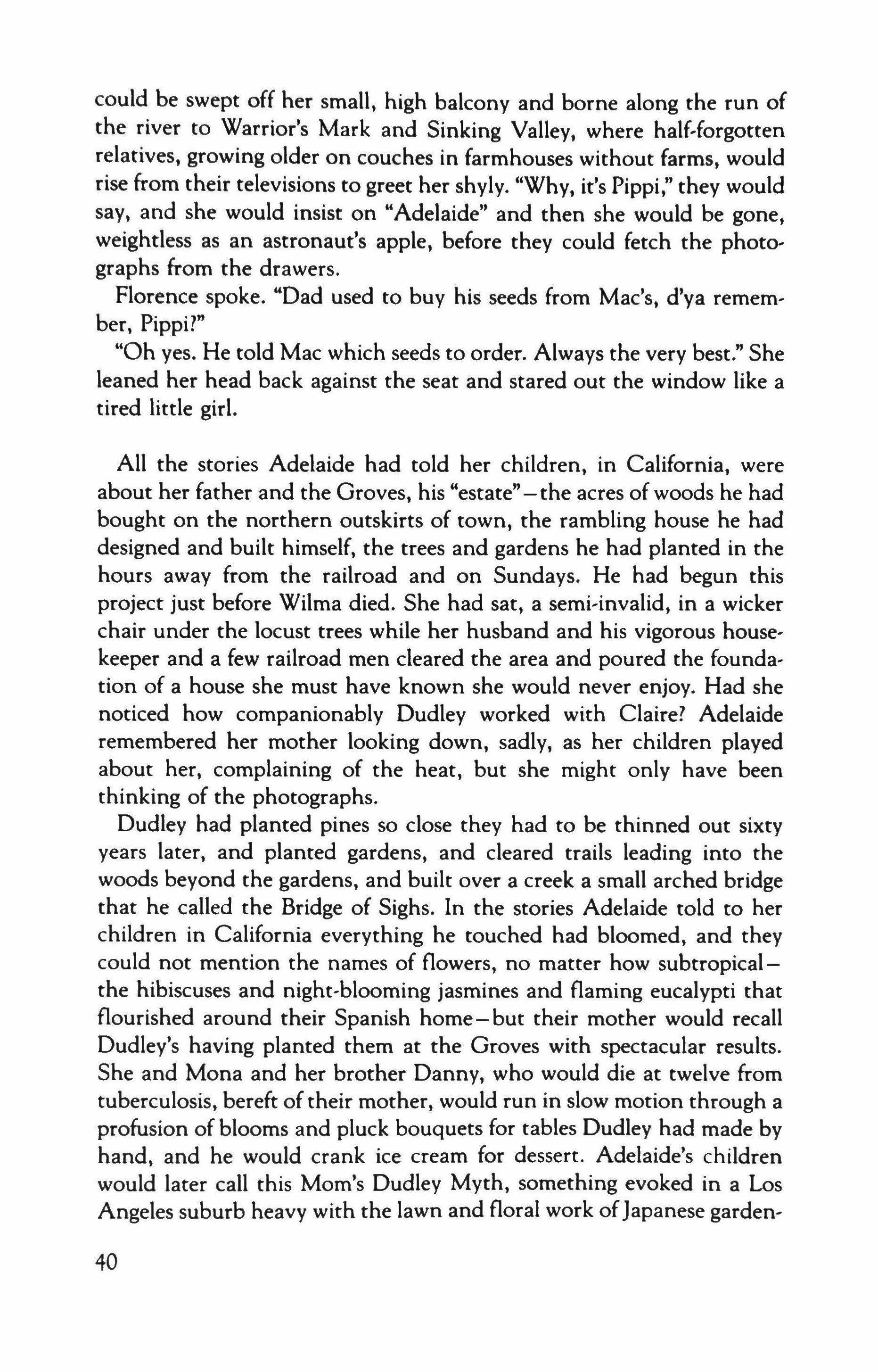
could be swept off her small, high balcony and borne along the run of the river to Warrior's Mark and Sinking Valley, where half-forgotten relatives, growing older on couches in farmhouses without farms, would rise from their televisions to greet her shyly. "Why, it's Pippi," they would say, and she would insist on "Adelaide" and then she would be gone, weightless as an astronaut's apple, before they could fetch the photographs from the drawers.
Florence spoke. "Dad used to buy his seeds from Mac's, d'va remember, Pippi!"
"Oh yes. He told Mac which seeds to order. Always the very best." She leaned her head back against the seat and stared out the window like a tired little girl.
All the stories Adelaide had told her children, in California, were about her father and the Groves, his "estate" - the acres of woods he had bought on the northern outskirts of town, the rambling house he had designed and built himself, the trees and gardens he had planted in the hours away from the railroad and on Sundays. He had begun this project just before Wilma died. She had sat, a semi-invalid, in a wicker chair under the locust trees while her husband and his vigorous house, keeper and a few railroad men cleared the area and poured the foundation of a house she must have known she would never enjoy. Had she noticed how companionably Dudley worked with Claire? Adelaide remembered her mother looking down, sadly, as her children played about her, complaining of the heat, but she might only have been thinking of the photographs.
Dudley had planted pines so close they had to be thinned out sixty years later, and planted gardens, and cleared trails leading into the woods beyond the gardens, and built over a creek a small arched bridge that he called the Bridge of Sighs. In the stories Adelaide told to her children in California everything he touched had bloomed, and they could not mention the names of flowers, no matter how subtropicalthe hibiscuses and night-blooming jasmines and flaming eucalypti that flourished around their Spanish home-but their mother would recall Dudley's having planted them at the Groves with spectacular results. She and Mona and her brother Danny, who would die at twelve from tuberculosis, bereft oftheir mother, would run in slow motion through a profusion of blooms and pluck bouquets for tables Dudley had made by hand, and he would crank ice cream for dessert. Adelaide's children would later call this Mom's Dudley Myth, something evoked in a Los Angeles suburb heavy with the lawn and floral work ofJapanese garden'
40
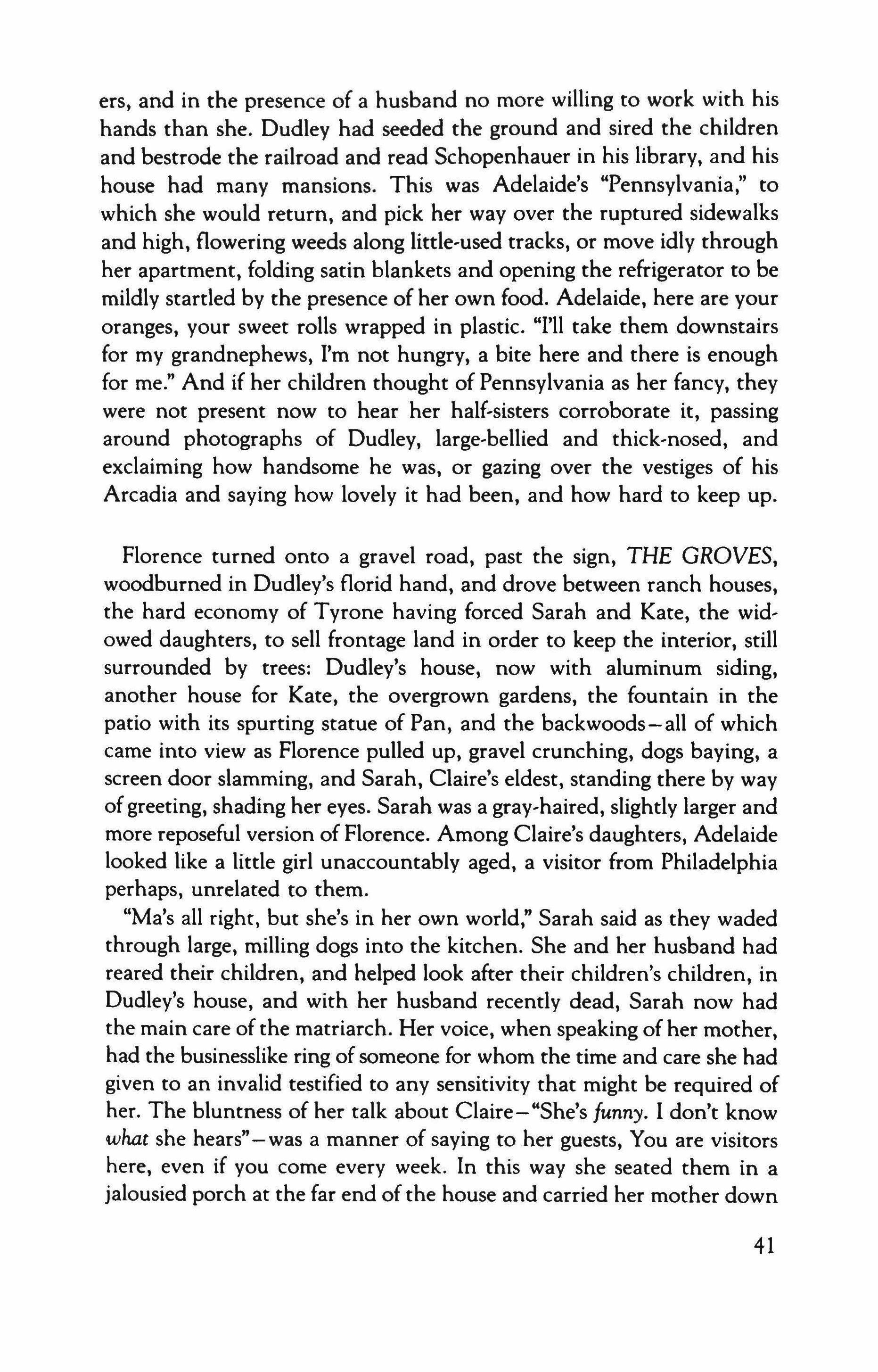
ers, and in the presence of a husband no more willing to work with his hands than she. Dudley had seeded the ground and sired the children and bestrode the railroad and read Schopenhauer in his library, and his house had many mansions. This was Adelaide's "Pennsylvania," to which she would return, and pick her way over the ruptured sidewalks and high, flowering weeds along little-used tracks, or move idly through her apartment, folding satin blankets and opening the refrigerator to be mildly startled by the presence of her own food. Adelaide, here are your oranges, your sweet rolls wrapped in plastic. "I'll take them downstairs for my grandnephews, I'm not hungry, a bite here and there is enough for me." And if her children thought of Pennsylvania as her fancy, they were not present now to hear her half-sisters corroborate it, passing around photographs of Dudley, large-bellied and thick-nosed, and exclaiming how handsome he was, or gazing over the vestiges of his Arcadia and saying how lovely it had been, and how hard to keep up.
Florence turned onto a gravel road, past the sign, THE GROVES, woodburned in Dudley's florid hand, and drove between ranch houses, the hard economy of Tyrone having forced Sarah and Kate, the wid, owed daughters, to sell frontage land in order to keep the interior, still surrounded by trees: Dudley's house, now with aluminum siding, another house for Kate, the overgrown gardens, the fountain in the patio with its spurting statue of Pan, and the backwoods - all of which came into view as Florence pulled up, gravel crunching, dogs baying, a screen door slamming, and Sarah, Claire's eldest, standing there by way ofgreeting, shading her eyes. Sarah was a gray-haired, slightly larger and more reposeful version of Florence. Among Claire's daughters, Adelaide looked like a little girl unaccountably aged, a visitor from Philadelphia perhaps, unrelated to them.
"Ma's all right, but she's in her own world," Sarah said as they waded through large, milling dogs into the kitchen. She and her husband had reared their children, and helped look after their children's children, in Dudley's house, and with her husband recently dead, Sarah now had the main care of the matriarch. Her voice, when speaking of her mother, had the businesslike ring of someone for whom the time and care she had given to an invalid testified to any sensitivity that might be required of her. The bluntness of her talk about Claire-"She's funny. I don't know what she hears" - was a manner of saying to her guests, You are visitors here, even if you come every week. In this way she seated them in a jalousied porch at the far end of the house and carried her mother down
41
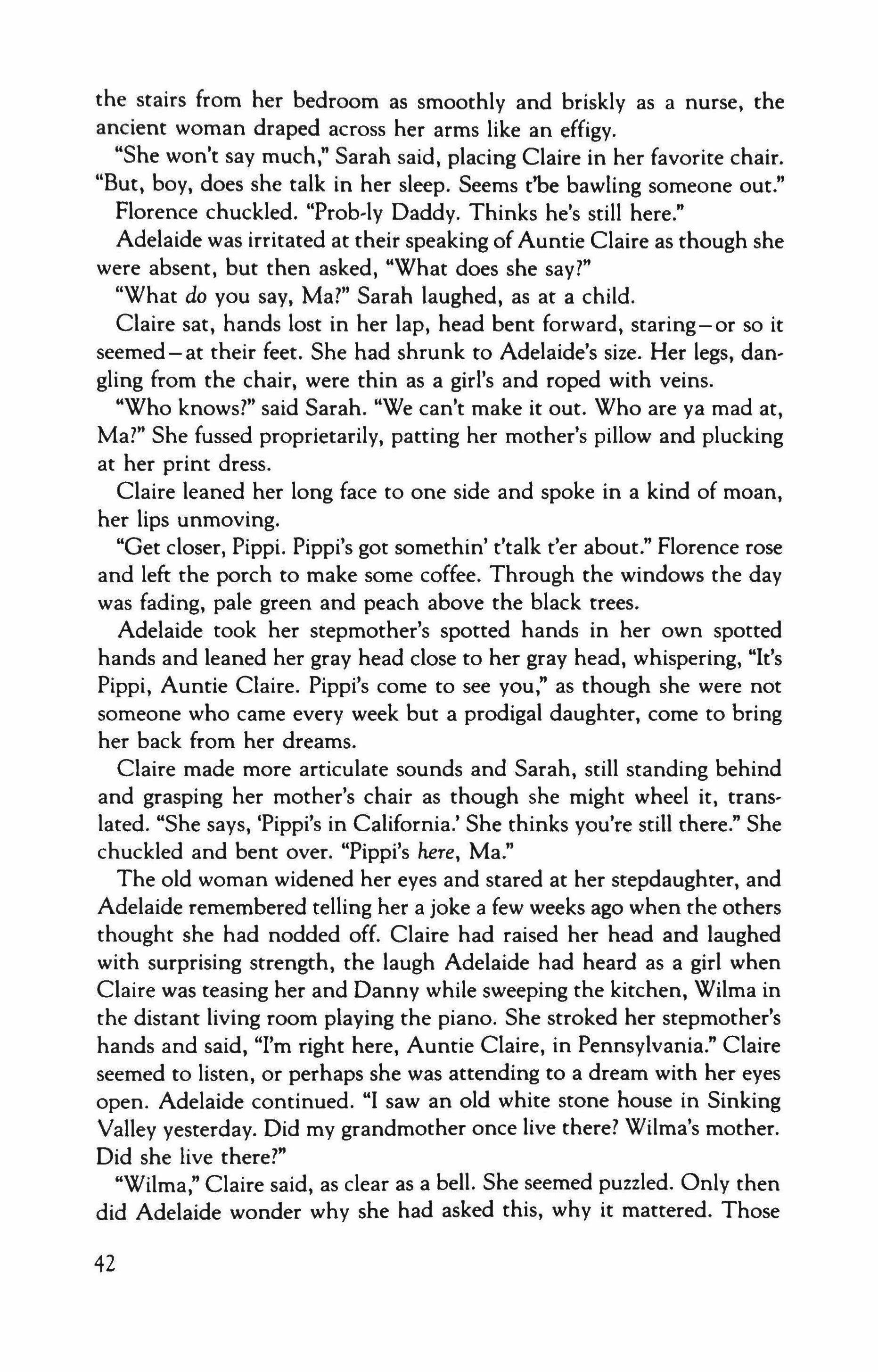
the stairs from her bedroom as smoothly and briskly as a nurse, the ancient woman draped across her arms like an effigy.
"She won't say much," Sarah said, placing Claire in her favorite chair. "But, boy, does she talk in her sleep. Seems t'be bawling someone out."
Florence chuckled. "Prob-lv Daddy. Thinks he's still here."
Adelaide was irritated at their speaking of Auntie Claire as though she were absent, but then asked, "What does she say?"
"What do you say, Ma?" Sarah laughed, as at a child.
Claire sat, hands lost in her lap, head bent forward, staring-or so it seemed - at their feet. She had shrunk to Adelaide's size. Her legs, dangling from the chair, were thin as a girl's and roped with veins.
"Who knows?" said Sarah. "We can't make it out. Who are ya mad at, Ma?" She fussed proprietarily, patting her mother's pillow and plucking at her print dress.
Claire leaned her long face to one side and spoke in a kind of moan, her lips unmoving.
"Get closer, Pippi. Pippi's got somethin' t'talk t'er about." Florence rose and left the porch to make some coffee. Through the windows the day was fading, pale green and peach above the black trees.
Adelaide took her stepmother's spotted hands in her own spotted hands and leaned her gray head close to her gray head, whispering, "It's Pippi, Auntie Claire. Pippi's come to see you," as though she were not someone who came every week but a prodigal daughter, come to bring her back from her dreams.
Claire made more articulate sounds and Sarah, still standing behind and grasping her mother's chair as though she might wheel it, translated. "She says, 'Pippi's in California.' She thinks you're still there." She chuckled and bent over. "Pippi's here, Ma."
The old woman widened her eyes and stared at her stepdaughter, and Adelaide remembered telling her a joke a few weeks ago when the others thought she had nodded off. Claire had raised her head and laughed with surprising strength, the laugh Adelaide had heard as a girl when Claire was teasing her and Danny while sweeping the kitchen, Wilma in the distant living room playing the piano. She stroked her stepmother's hands and said, "I'm right here, Auntie Claire, in Pennsylvania." Claire seemed to listen, or perhaps she was attending to a dream with her eyes open. Adelaide continued. "I saw an old white stone house in Sinking Valley yesterday. Did my grandmother once live there? Wilma's mother. Did she live there?"
"Wilma," Claire said, as clear as a bell. She seemed puzzled. Only then did Adelaide wonder why she had asked this, why it mattered. Those
42
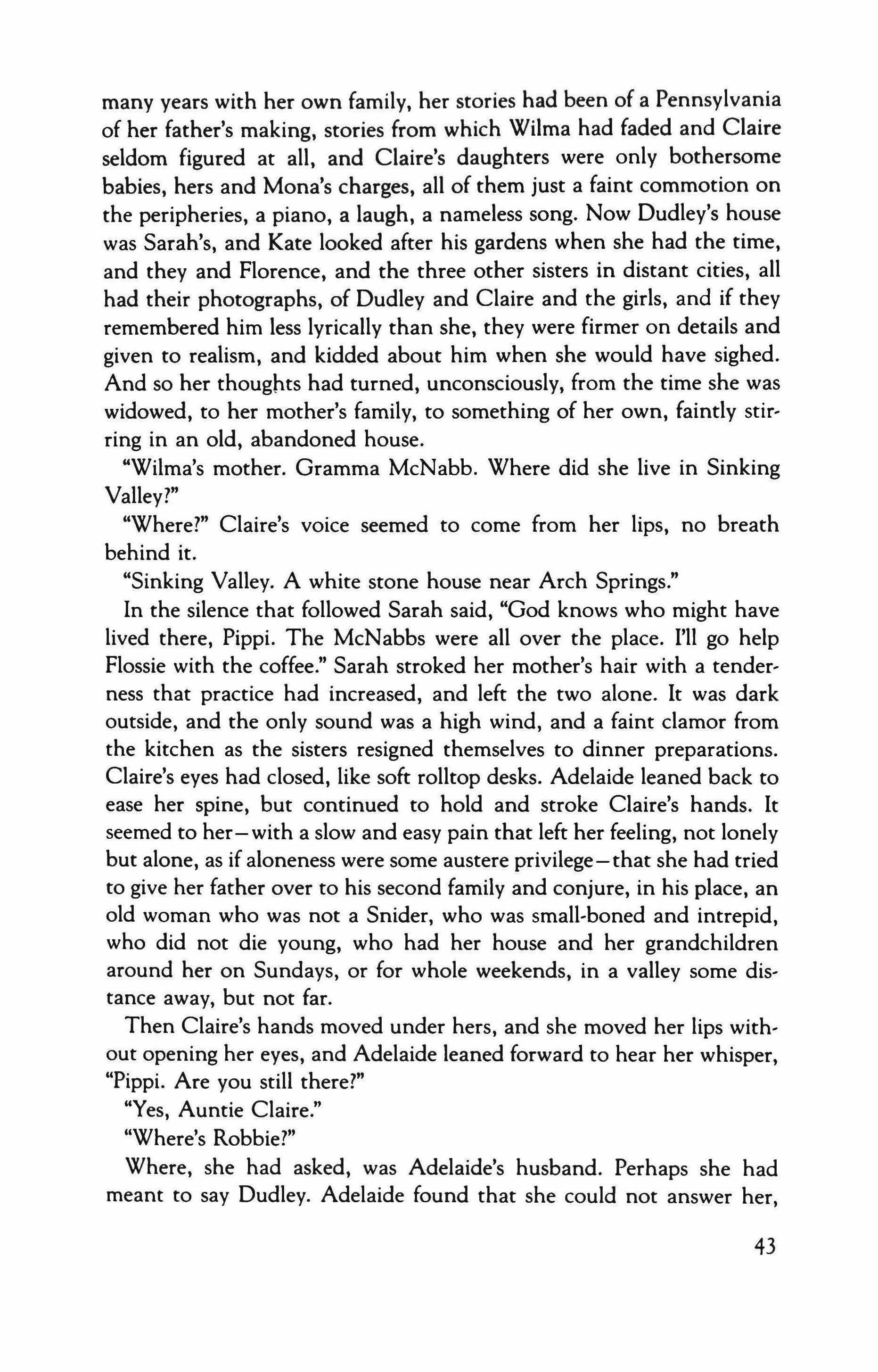
many years with her own family, her stories had been of a Pennsylvania of her father's making, stories from which Wilma had faded and Claire seldom figured at all, and Claire's daughters were only bothersome babies, hers and Mona's charges, all of them just a faint commotion on the peripheries, a piano, a laugh, a nameless song. Now Dudley's house was Sarah's, and Kate looked after his gardens when she had the time, and they and Florence, and the three other sisters in distant cities, all had their photographs, of Dudley and Claire and the girls, and if they remembered him less lyrically than she, they were firmer on details and given to realism, and kidded about him when she would have sighed. And so her thoughts had turned, unconsciously, from the time she was widowed, to her mother's family, to something of her own, faintly stirring in an old, abandoned house.
"Wilma's mother. Gramma McNabb. Where did she live in Sinking Valley?"
"Where?" Claire's voice seemed to come from her lips, no breath behind it.
"Sinking Valley. A white stone house near Arch Springs."
In the silence that followed Sarah said, "God knows who might have lived there, Pippi. The McNabbs were all over the place. I'll go help Flossie with the coffee." Sarah stroked her mother's hair with a tenderness that practice had increased, and left the two alone. It was dark outside, and the only sound was a high wind, and a faint clamor from the kitchen as the sisters resigned themselves to dinner preparations. Claire's eyes had closed, like soft rolltop desks. Adelaide leaned back to ease her spine, but continued to hold and stroke Claire's hands. It seemed to her-with a slow and easy pain that left her feeling, not lonely but alone, as if aloneness were some austere privilege-that she had tried to give her father over to his second family and conjure, in his place, an old woman who was not a Snider, who was small-boned and intrepid, who did not die young, who had her house and her grandchildren around her on Sundays, or for whole weekends, in a valley some distance away, but not far.
Then Claire's hands moved under hers, and she moved her lips without opening her eyes, and Adelaide leaned forward to hear her whisper, "Pippi. Are you still there?"
"Yes, Auntie Claire."
"Where's Robbie?"
Where, she had asked, was Adelaide's husband. Perhaps she had meant to say Dudley. Adelaide found that she could not answer her,
43
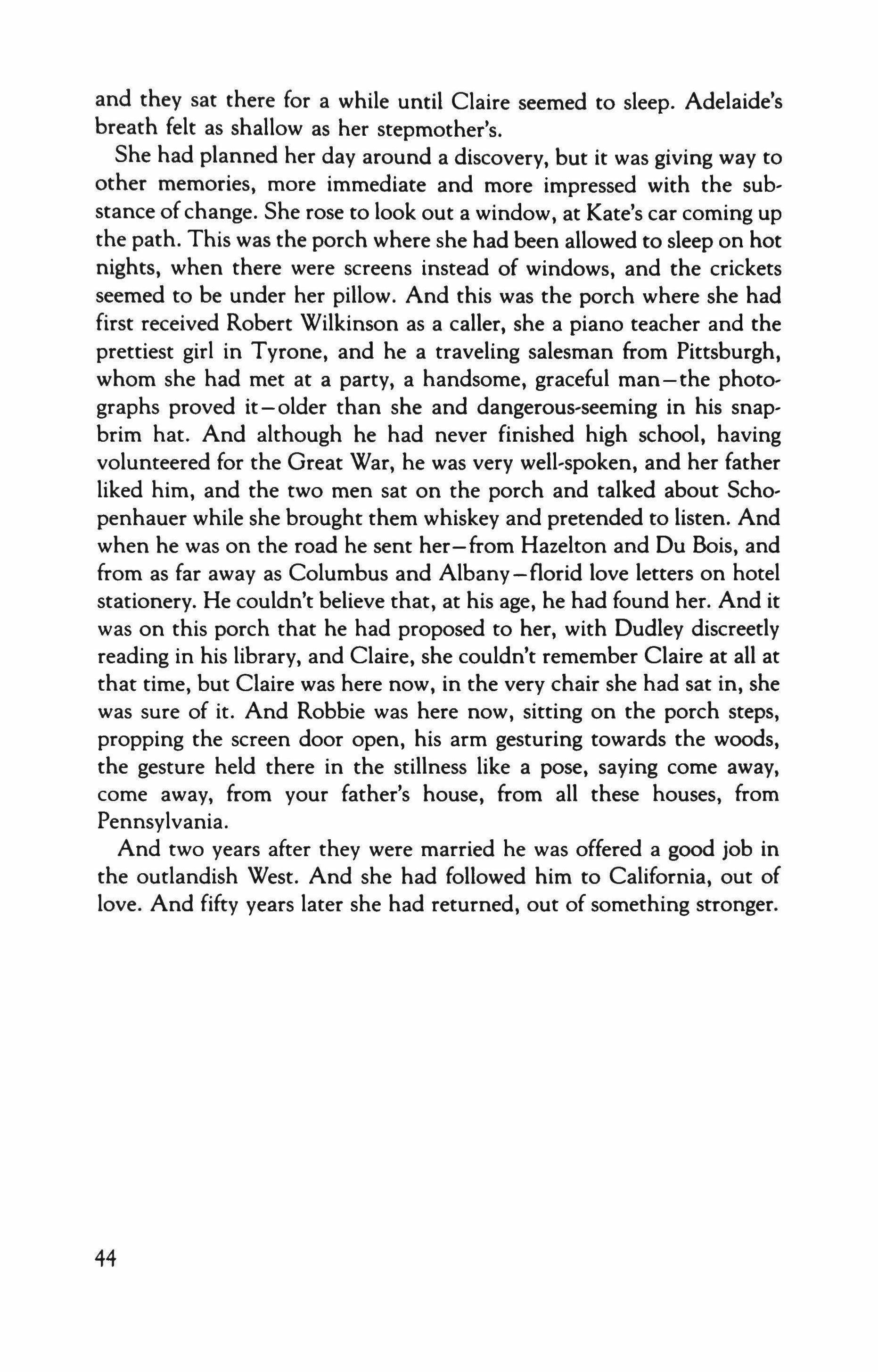
and they sat there for a while until Claire seemed to sleep. Adelaide's breath felt as shallow as her stepmother's. She had planned her day around a discovery, but it was giving way to other memories, more immediate and more impressed with the sub, stance ofchange. She rose to look out a window, at Kate's car coming up the path. This was the porch where she had been allowed to sleep on hot nights, when there were screens instead of windows, and the crickets seemed to be under her pillow. And this was the porch where she had first received Robert Wilkinson as a caller, she a piano teacher and the prettiest girl in Tyrone, and he a traveling salesman from Pittsburgh, whom she had met at a party, a handsome, graceful man-the photo, graphs proved it - older than she and dangerous-seeming in his snap, brim hat. And although he had never finished high school, having volunteered for the Great War, he was very well-spoken, and her father liked him, and the two men sat on the porch and talked about Schopenhauer while she brought them whiskey and pretended to listen. And when he was on the road he sent her-from Hazelton and Du Bois, and from as far away as Columbus and Albany-florid love letters on hotel stationery. He couldn't believe that, at his age, he had found her. And it was on this porch that he had proposed to her, with Dudley discreetly reading in his library, and Claire, she couldn't remember Claire at all at that time, but Claire was here now, in the very chair she had sat in, she was sure of it. And Robbie was here now, sitting on the porch steps, propping the screen door open, his arm gesturing towards the woods, the gesture held there in the stillness like a pose, saying come away, come away, from your father's house, from all these houses, from Pennsylvania.
And two years after they were married he was offered a good job in the outlandish West. And she had followed him to California, out of love. And fifty years later she had returned, out of something stronger.
44
The Box
Susan Straight
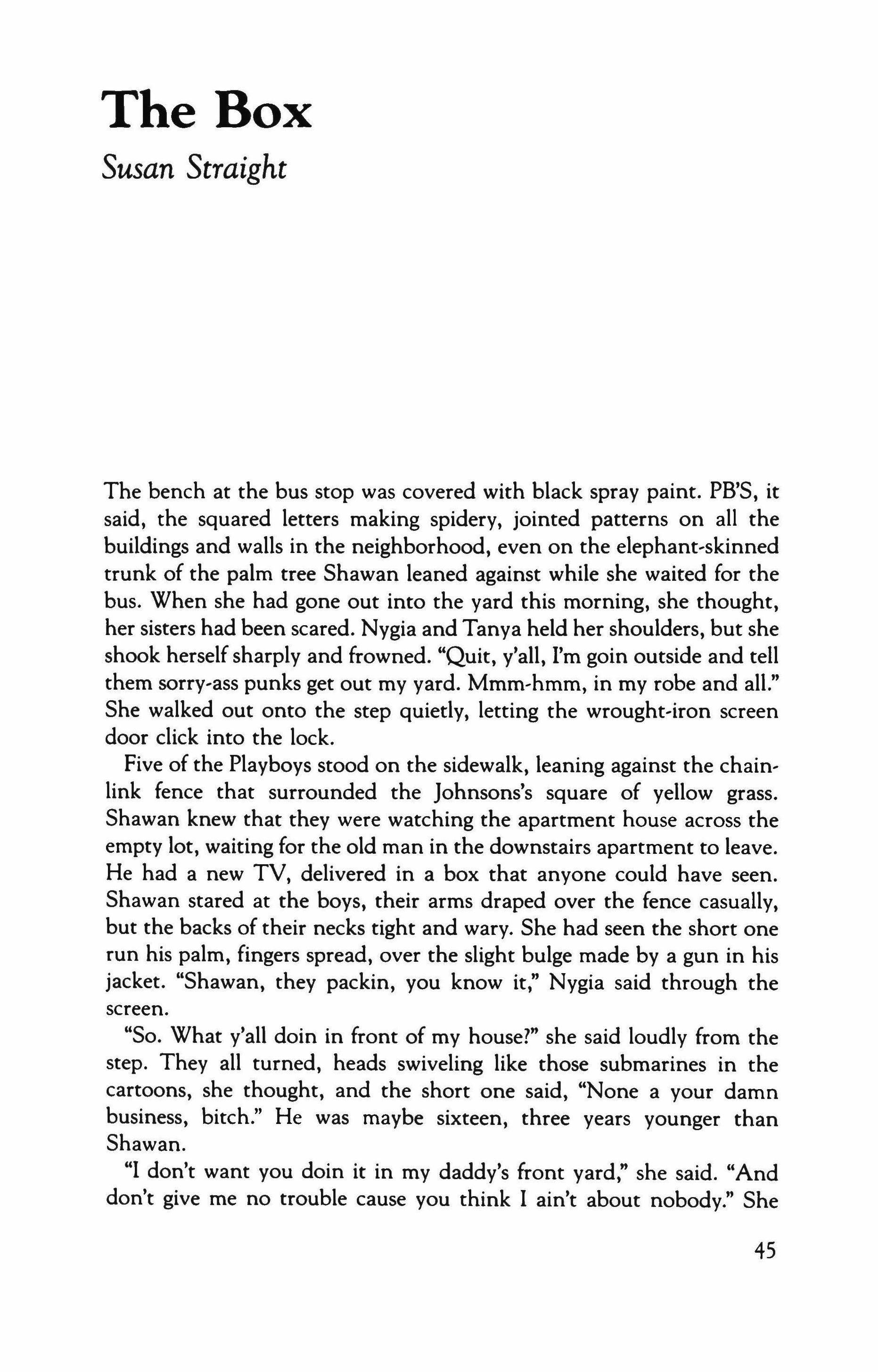
The bench at the bus stop was covered with black spray paint. PB'S, it said, the squared letters making spidery, jointed patterns on all the buildings and walls in the neighborhood, even on the elephant-skinned trunk of the palm tree Shawan leaned against while she waited for the bus. When she had gone out into the yard this morning, she thought, her sisters had been scared. Nvgia and Tanya held her shoulders, but she shook herself sharply and frowned. "Quit, y'all, I'm goin outside and tell them sorry'ass punks get out my yard. Mmm-hrnm, in my robe and all." She walked out onto the step quietly, letting the wrought,iron screen door click into the lock.
Five of the Playboys stood on the sidewalk, leaning against the chain, link fence that surrounded the [ohnsons's square of yellow grass. Shawan knew that they were watching the apartment house across the empty lot, waiting for the old man in the downstairs apartment to leave. He had a new TV, delivered in a box that anyone could have seen. Shawan stared at the boys, their arms draped over the fence casually, but the backs of their necks tight and wary. She had seen the short one run his palm, fingers spread, over the slight bulge made by a gun in his jacket. "Shawan, they packin, you know it," Nygia said through the screen.
"So. What y'all doin in front of my house?" she said loudly from the step. They all turned, heads swiveling like those submarines in the cartoons, she thought, and the short one said, "None a your damn business, bitch." He was maybe sixteen, three years younger than Shawano
"I don't want you doin it in my daddy's front yard," she said. "And don't give me no trouble cause you think 1 ain't about nobody." She
45
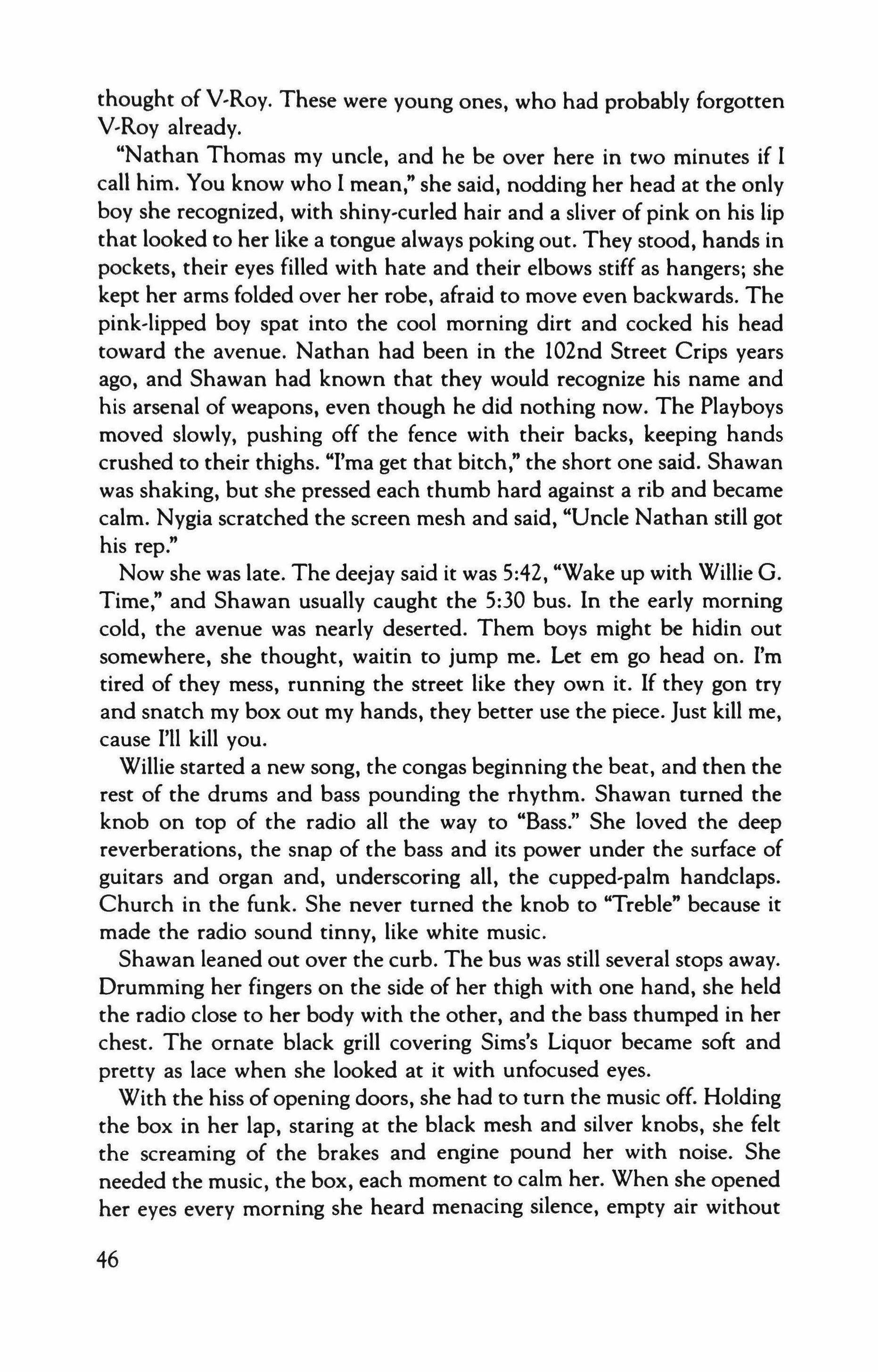
thought of Y-Roy. These were young ones, who had probably forgotten V-Rov already.
"Nathan Thomas my uncle, and he be over here in two minutes if I call him. You know who I mean," she said, nodding her head at the only boy she recognized, with shiny-curled hair and a sliver of pink on his lip that looked to her like a tongue always poking out. They stood, hands in pockets, their eyes filled with hate and their elbows stiff as hangers; she kept her arms folded over her robe, afraid to move even backwards. The pink-lipped boy spat into the cool morning dirt and cocked his head toward the avenue. Nathan had been in the lO2nd Street Crips years ago, and Shawan had known that they would recognize his name and his arsenal of weapons, even though he did nothing now. The Playboys moved slowly, pushing off the fence with their backs, keeping hands crushed to their thighs. "I'ma get that bitch," the short one said. Shawan was shaking, but she pressed each thumb hard against a rib and became calm. Nygia scratched the screen mesh and said, "Uncle Nathan still got his rep."
Now she was late. The deejay said it was 5:42, "Wake up with Willie G. Time," and Shawan usually caught the 5:30 bus. In the early morning cold, the avenue was nearly deserted. Them boys might be hidin out somewhere, she thought, waitin to jump me. Let em go head on. I'm tired of they mess, running the street like they own it. If they gon try and snatch my box out my hands, they better use the piece. Just kill me, cause I'll kill you.
Willie started a new song, the congas beginning the beat, and then the rest of the drums and bass pounding the rhythm. Shawan turned the knob on top of the radio all the way to "Bass." She loved the deep reverberations, the snap of the bass and its power under the surface of guitars and organ and, underscoring all, the cupped-palm handclaps. Church in the funk. She never turned the knob to "Treble" because it made the radio sound tinny, like white music.
Shawan leaned out over the curb. The bus was still several stops away. Drumming her fingers on the side of her thigh with one hand, she held the radio close to her body with the other, and the bass thumped in her chest. The ornate black grill covering Sims's Liquor became soft and pretty as lace when she looked at it with unfocused eyes.
With the hiss of opening doors, she had to turn the music off. Holding the box in her lap, staring at the black mesh and silver knobs, she felt the screaming of the brakes and engine pound her with noise. She needed the music, the box, each moment to calm her. When she opened her eyes every morning she heard menacing silence, empty air without
46
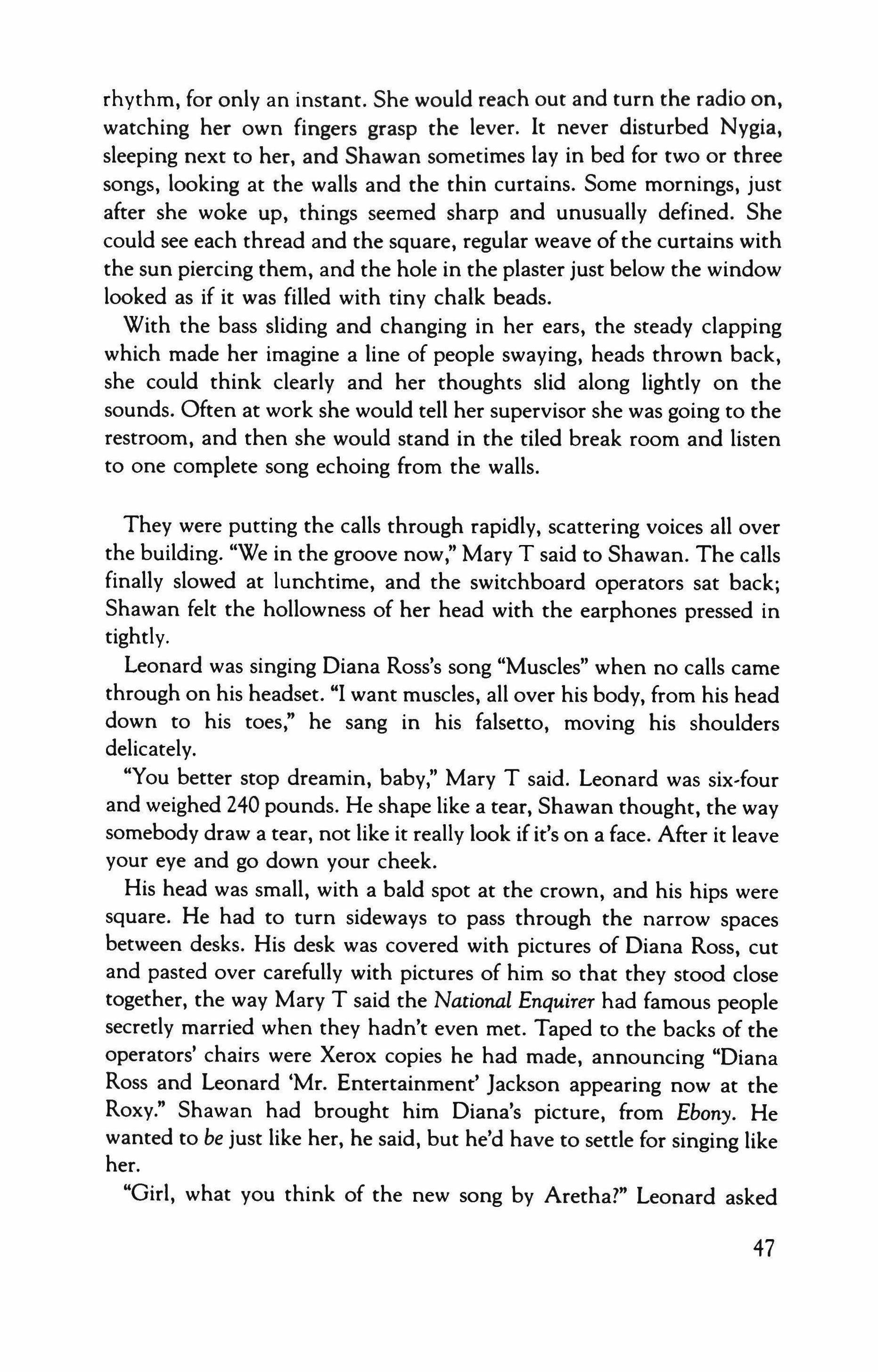
rhythm, for only an instant. She would reach out and turn the radio on, watching her own fingers grasp the lever. It never disturbed Nygia, sleeping next to her, and Shawan sometimes lay in bed for two or three songs, looking at the walls and the thin curtains. Some mornings, just after she woke up, things seemed sharp and unusually defined. She could see each thread and the square, regular weave of the curtains with the sun piercing them, and the hole in the plaster just below the window looked as if it was filled with tiny chalk beads.
With the bass sliding and changing in her ears, the steady clapping which made her imagine a line of people swaying, heads thrown back, she could think clearly and her thoughts slid along lightly on the sounds. Often at work she would tell her supervisor she was going to the restroom, and then she would stand in the tiled break room and listen to one complete song echoing from the walls.
They were putting the calls through rapidly, scattering voices all over the building. "We in the groove now," Mary T said to Shawano The calls finally slowed at lunchtime, and the switchboard operators sat back; Shawan felt the hollowness of her head with the earphones pressed in tightly.
Leonard was singing Diana Ross's song "Muscles" when no calls came through on his headset. "I want muscles, all over his body, from his head down to his toes," he sang in his falsetto, moving his shoulders delicately.
"You better stop dreamin, baby," Mary T said. Leonard was six-four and weighed 240 pounds. He shape like a tear, Shawan thought, the way somebody draw a tear, not like it really look if it's on a face. After it leave your eye and go down your cheek.
His head was small, with a bald spot at the crown, and his hips were square. He had to turn sideways to pass through the narrow spaces between desks. His desk was covered with pictures of Diana Ross, cut and pasted over carefully with pictures of him so that they stood close together, the way Mary T said the National Enquirer had famous people secretly married when they hadn't even met. Taped to the backs of the operators' chairs were Xerox copies he had made, announcing "Diana Ross and Leonard 'Mr. Entertainment' Jackson appearing now at the Roxy." Shawan had brought him Diana's picture, from Ebony. He wanted to be just like her, he said, but he'd have to settle for singing like her.
"Girl, what you think of the new song by Aretha?" Leonard asked
47
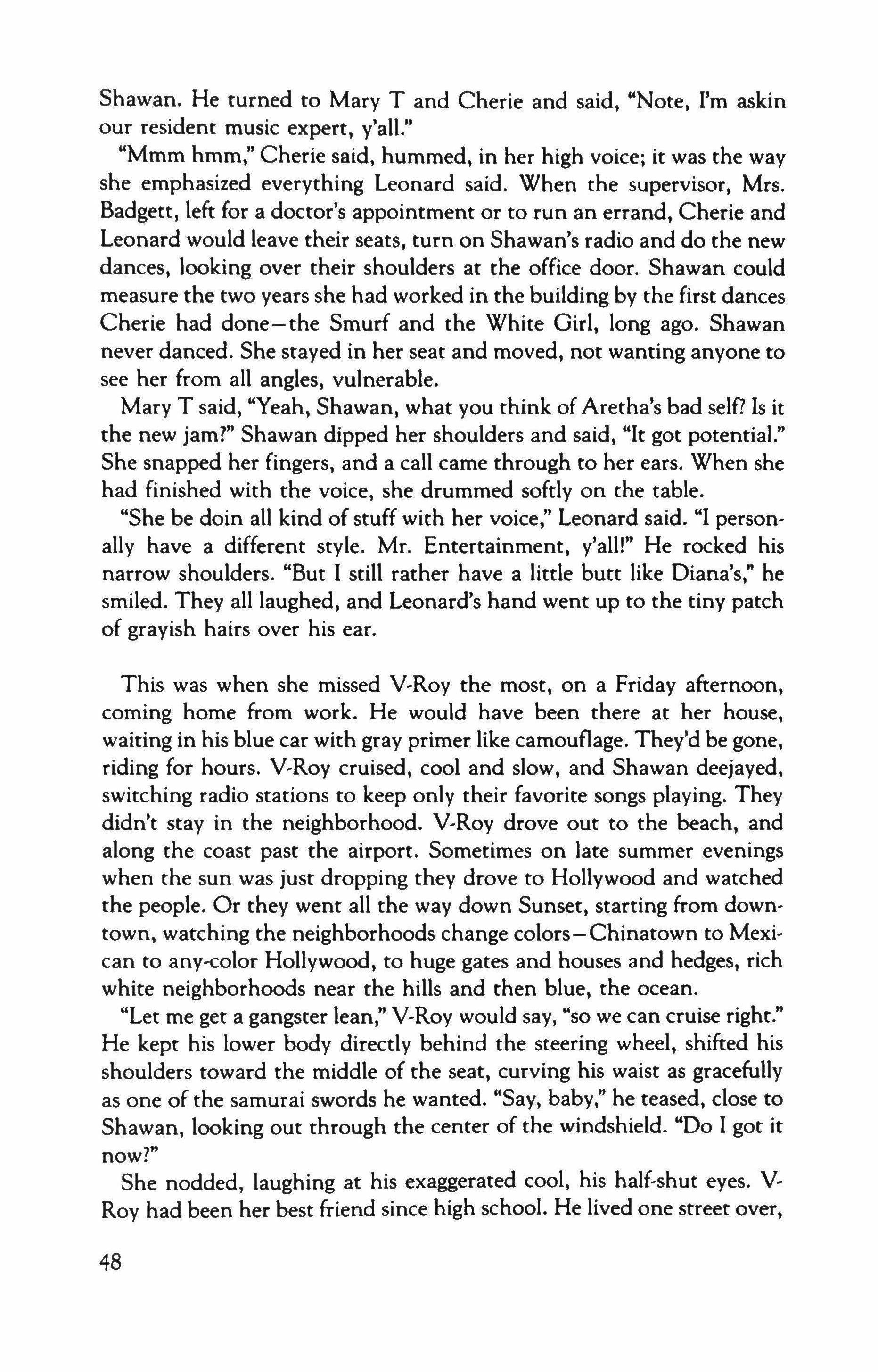
Shawano He turned to Mary T and Cherie and said, "Note, I'm askin our resident music expert, y'all."
"Mmm hmm," Cherie said, hummed, in her high voice; it was the way she emphasized everything Leonard said. When the supervisor, Mrs. Badgett, left for a doctor's appointment or to run an errand, Cherie and Leonard would leave their seats, turn on Shawan's radio and do the new dances, looking over their shoulders at the office door. Shawan could measure the two years she had worked in the building by the first dances Cherie had done-the Smurf and the White Girl, long ago. Shawan never danced. She stayed in her seat and moved, not wanting anyone to see her from all angles, vulnerable.
Mary T said, "Yeah, Shawan, what you think of Aretha's bad self? Is it the new jam?" Shawan dipped her shoulders and said, "It got potential." She snapped her fingers, and a call came through to her ears. When she had finished with the voice, she drummed softly on the table.
"She be doin all kind of stuff with her voice," Leonard said. "I personally have a different style. Mr. Entertainment, y'all!" He rocked his narrow shoulders. "But I still rather have a little butt like Diana's," he smiled. They all laughed, and Leonard's hand went up to the tiny patch of grayish hairs over his ear.
This was when she missed V-Roy the most, on a Friday afternoon, coming home from work. He would have been there at her house, waiting in his blue car with gray primer like camouflage. They'd be gone, riding for hours. V-Roy cruised, cool and slow, and Shawan deejayed, switching radio stations to keep only their favorite songs playing. They didn't stay in the neighborhood. V-Roy drove out to the beach, and along the coast past the airport. Sometimes on late summer evenings when the sun was just dropping they drove to Hollywood and watched the people. Or they went all the way down Sunset, starting from downtown, watching the neighborhoods change colors-Chinatown to Mexican to any-color Hollywood, to huge gates and houses and hedges, rich white neighborhoods near the hills and then blue, the ocean.
"Let me get a gangster lean," V-Roy would say, "so we can cruise right." He kept his lower body directly behind the steering wheel, shifted his shoulders toward the middle of the seat, curving his waist as gracefully as one of the samurai swords he wanted. "Say, baby," he teased, close to Shawan, looking out through the center of the windshield. "Do I got it now?"
She nodded, laughing at his exaggerated cool, his half-shut eyes. VRoy had been her best friend since high school. He lived one street over,
48
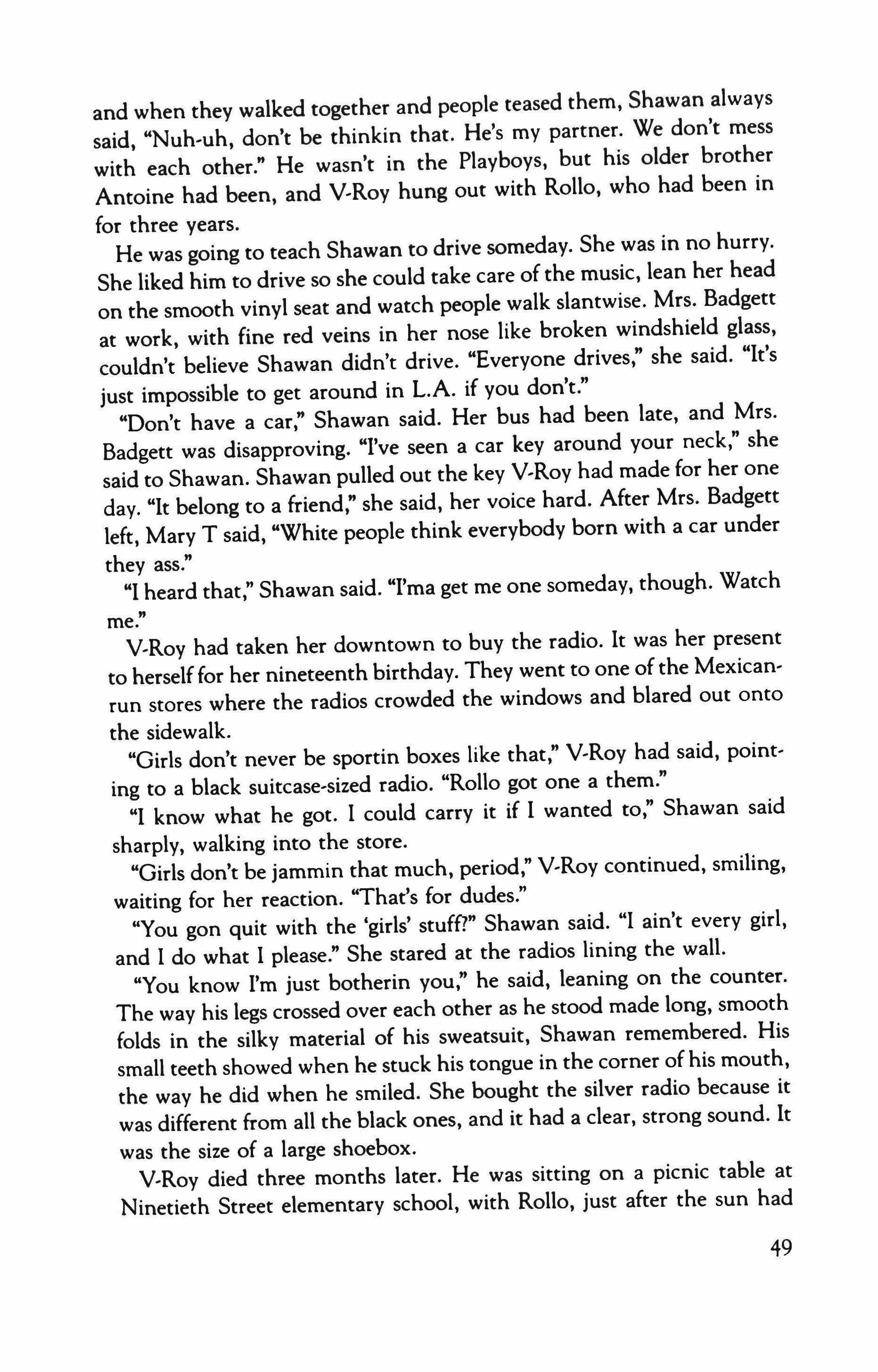
and when they walked together and people teased them, Shawan always said, "Nuh-uh, don't be thinkin that. He's my partner. We don't mess with each other." He wasn't in the Playboys, but his older brother Antoine had been, and V�Roy hung out with Rollo, who had been in for three years.
He was going to teach Shawan to drive someday. She was in no hurry. She liked him to drive so she could take care ofthe music, lean her head on the smooth vinyl seat and watch people walk slantwise. Mrs. Badgett at work, with fine red veins in her nose like broken windshield glass, couldn't believe Shawan didn't drive. "Everyone drives," she said. "It's just impossible to get around in L.A. if you don't."
"Don't have a car," Shawan said. Her bus had been late, and Mrs. Badgett was disapproving. "I've seen a car key around your neck," she said to Shawano Shawan pulled out the key V�Roy had made for her one day. "It belong to a friend," she said, her voice hard. After Mrs. Badgett left, Mary T said, "White people think everybody born with a car under they ass."
"I heard that," Shawan said. "I'ma get me one someday, though. Watch me."
V�Roy had taken her downtown to buy the radio. It was her present to herself for her nineteenth birthday. They went to one ofthe Mexicanrun stores where the radios crowded the windows and blared out onto the sidewalk.
"Girls don't never be sportin boxes like that," V�Roy had said, pointing to a black suitcase-sized radio. "Rollo got one a them."
"I know what he got. I could carry it if 1 wanted to," Shawan said sharply, walking into the store.
"Girls don't be jammin that much, period," V�Roy continued, smiling, waiting for her reaction. "That's for dudes."
"You gon quit with the 'girls' stuffl" Shawan said. "I ain't every girl, and 1 do what 1 please." She stared at the radios lining the wall.
"You know I'm just botherin you," he said, leaning on the counter. The way his legs crossed over each other as he stood made long, smooth folds in the silky material of his sweatsuit, Shawan remembered. His small teeth showed when he stuck his tongue in the corner of his mouth, the way he did when he smiled. She bought the silver radio because it was different from all the black ones, and it had a clear, strong sound. It was the size of a large shoebox.
V�Roy died three months later. He was sitting on a picnic table at Ninetieth Street elementary school, with Rollo, just after the sun had
49
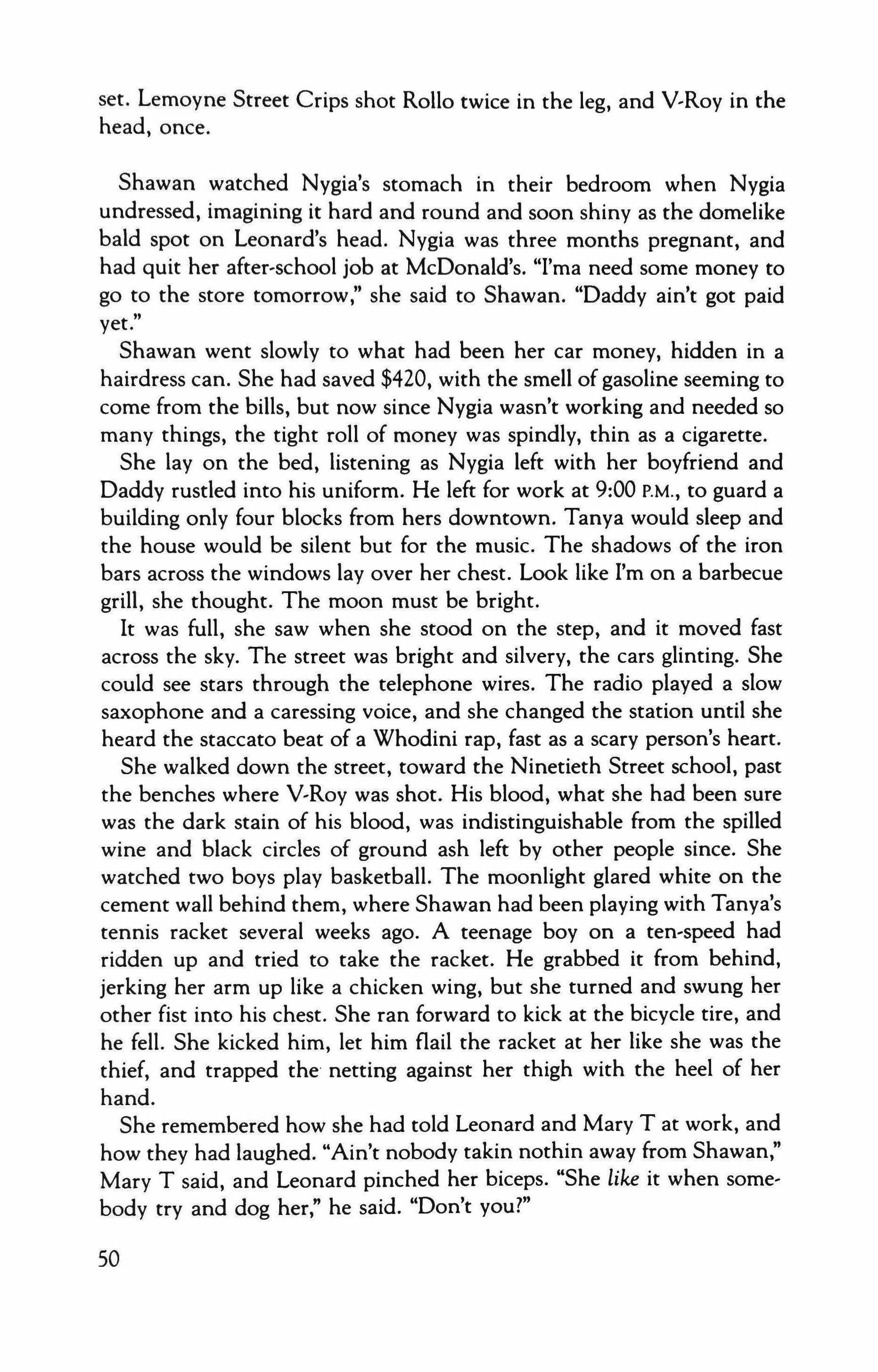
set. Lemoyne Street Crips shot Rollo twice in the leg, and V-Roy in the head, once.
Shawan watched Nygia's stomach in their bedroom when Nygia undressed, imagining it hard and round and soon shiny as the domelike bald spot on Leonard's head. Nvgia was three months pregnant, and had quit her after-school job at McDonald's. "I'ma need some money to go to the store tomorrow," she said to Shawano "Daddy ain't got paid yet."
Shawan went slowly to what had been her car money, hidden in a hairdress can. She had saved $420, with the smell of gasoline seeming to come from the bills, but now since Nygia wasn't working and needed so many things, the tight roll of money was spindly, thin as a cigarette. She lay on the bed, listening as Nygia left with her boyfriend and Daddy rustled into his uniform. He left for work at 9:00 P.M., to guard a building only four blocks from hers downtown. Tanya would sleep and the house would be silent but for the music. The shadows of the iron bars across the windows layover her chest. Look like I'm on a barbecue grill, she thought. The moon must be bright. It was full, she saw when she stood on the step, and it moved fast across the sky. The street was bright and silvery, the cars glinting. She could see stars through the telephone wires. The radio played a slow saxophone and a caressing voice, and she changed the station until she heard the staccato beat of a Whodini rap, fast as a scary person's heart.
She walked down the street, toward the Ninetieth Street school, past the benches where V-Roy was shot. His blood, what she had been sure was the dark stain of his blood, was indistinguishable from the spilled wine and black circles of ground ash left by other people since. She watched two boys play basketball. The moonlight glared white on the cement wall behind them, where Shawan had been playing with Tanya's tennis racket several weeks ago. A teenage boy on a ten-speed had ridden up and tried to take the racket. He grabbed it from behind, jerking her arm up like a chicken wing, but she turned and swung her other fist into his chest. She ran forward to kick at the bicycle tire, and he fell. She kicked him, let him flail the racket at her like she was the thief, and trapped the netting against her thigh with the heel of her hand.
She remembered how she had told Leonard and Mary T at work, and how they had laughed. "Ain't nobody takin nothin away from Shawan," Mary T said, and Leonard pinched her biceps. "She like it when somebody try and dog her," he said. "Don't you?"
50
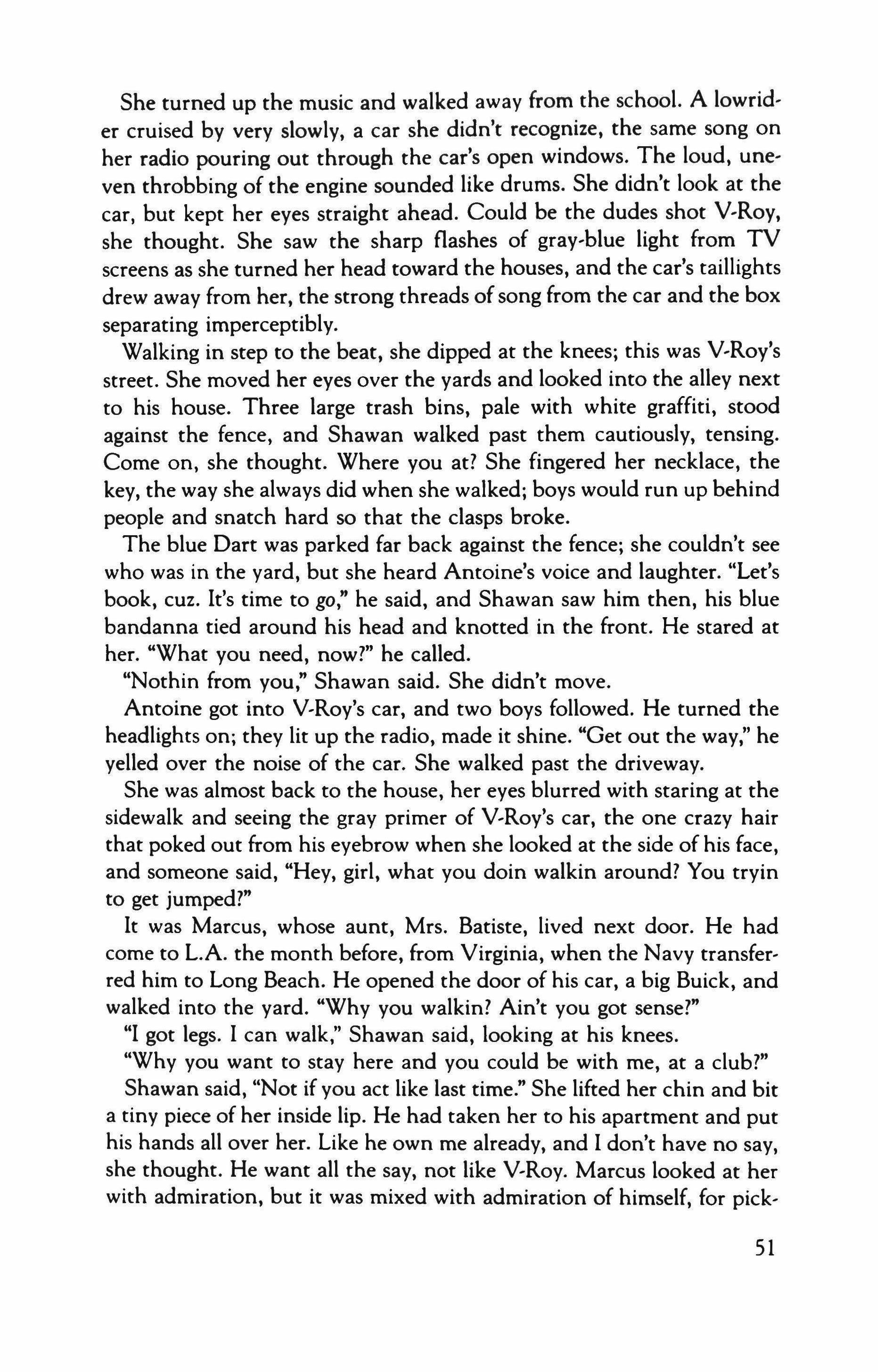
She turned up the music and walked away from the school. A lowrider cruised by very slowly, a car she didn't recognize, the same song on her radio pouring out through the car's open windows. The loud, uneven throbbing of the engine sounded like drums. She didn't look at the car, but kept her eyes straight ahead. Could be the dudes shot V-Roy, she thought. She saw the sharp flashes of gray-blue light from TV screens as she turned her head toward the houses, and the car's taillights drew away from her, the strong threads of song from the car and the box separating imperceptibly.
Walking in step to the beat, she dipped at the knees; this was V-Roy's street. She moved her eyes over the yards and looked into the alley next to his house. Three large trash bins, pale with white graffiti, stood against the fence, and Shawan walked past them cautiously, tensing. Come on, she thought. Where you at? She fingered her necklace, the key, the way she always did when she walked; boys would run up behind people and snatch hard so that the clasps broke.
The blue Dart was parked far back against the fence; she couldn't see who was in the yard, but she heard Antoine's voice and laughter. "Let's book, cuz. It's time to go," he said, and Shawan saw him then, his blue bandanna tied around his head and knotted in the front. He stared at her. "What you need, now?" he called.
"Nothin from you," Shawan said. She didn't move.
Antoine got into V-Roy's car, and two boys followed. He turned the headlights on; they lit up the radio, made it shine. "Get out the way," he yelled over the noise of the car. She walked past the driveway.
She was almost back to the house, her eyes blurred with staring at the sidewalk and seeing the gray primer of V-Roy's car, the one crazy hair that poked out from his eyebrow when she looked at the side of his face, and someone said, "Hey, girl, what you doin walkin around? You tryin to get jumped?"
It was Marcus, whose aunt, Mrs. Batiste, lived next door. He had come to L.A. the month before, from Virginia, when the Navy transferred him to Long Beach. He opened the door of his car, a big Buick, and walked into the yard. "Why you walkin? Ain't you got sense?"
"I got legs. I can walk," Shawan said, looking at his knees.
"Why you want to stay here and you could be with me, at a club?"
Shawan said, "Not if you act like last time." She lifted her chin and bit a tiny piece of her inside lip. He had taken her to his apartment and put his hands all over her. Like he own me already, and I don't have no say, she thought. He want all the say, not like V-Roy. Marcus looked at her with admiration, but it was mixed with admiration of himself, for pick-
51
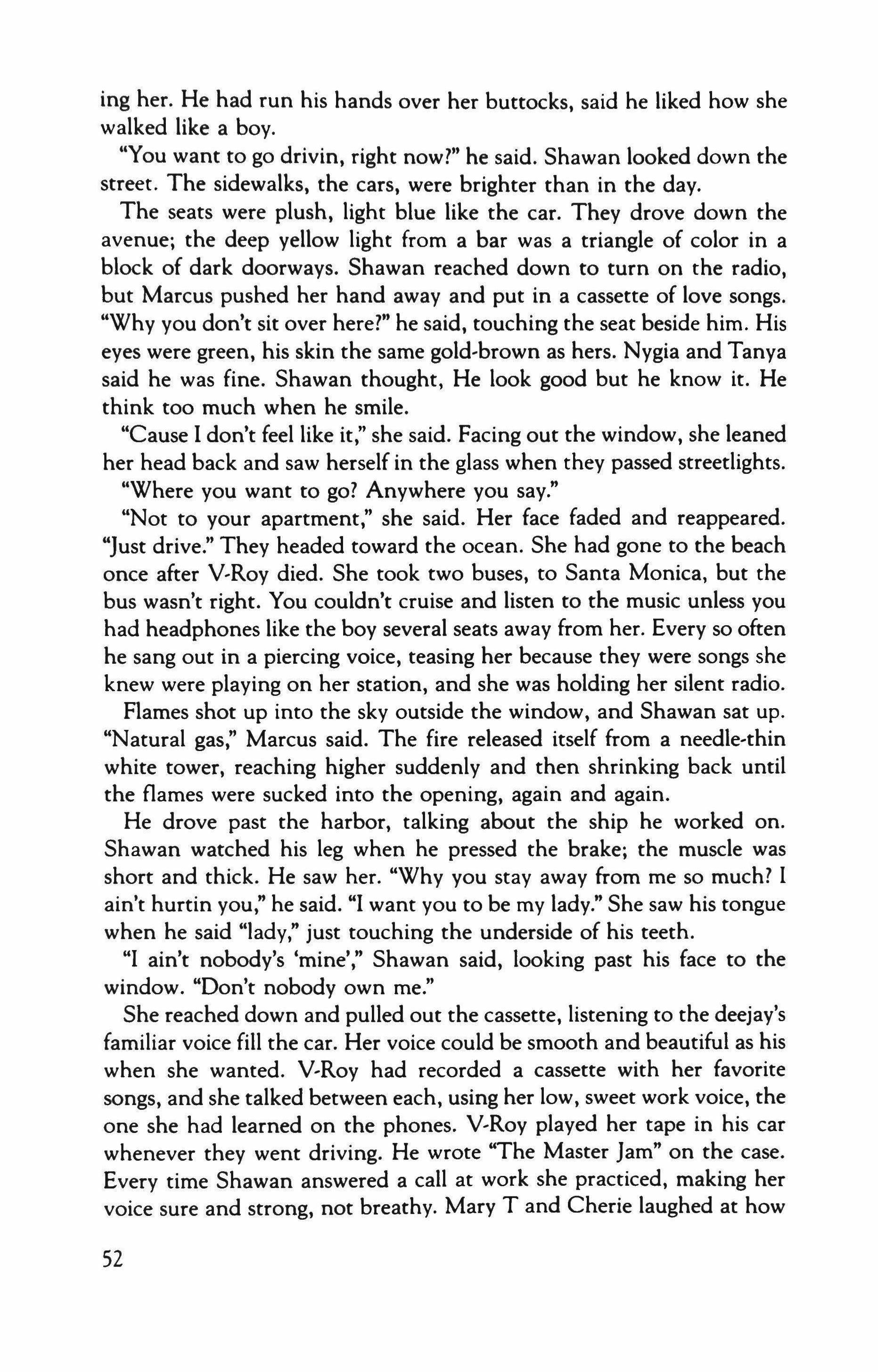
ing her. He had run his hands over her buttocks, said he liked how she walked like a boy.
"You want to go drivin, right now?" he said. Shawan looked down the street. The sidewalks, the cars, were brighter than in the day.
The seats were plush, light blue like the car. They drove down the avenue; the deep yellow light from a bar was a triangle of color in a block of dark doorways. Shawan reached down to turn on the radio, but Marcus pushed her hand away and put in a cassette of love songs. "Why you don't sit over here?" he said, touching the seat beside him. His eyes were green, his skin the same gold-brown as hers. Nygia and Tanya said he was fine. Shawan thought, He look good but he know it. He think too much when he smile.
"Cause I don't feel like it," she said. Facing out the window, she leaned her head back and saw herself in the glass when they passed streetlights.
"Where you want to go? Anywhere you say."
"Not to your apartment," she said. Her face faded and reappeared. "Just drive." They headed toward the ocean. She had gone to the beach once after V-Roy died. She took two buses, to Santa Monica, but the bus wasn't right. You couldn't cruise and listen to the music unless you had headphones like the boy several seats away from her. Every so often he sang out in a piercing voice, teasing her because they were songs she knew were playing on her station, and she was holding her silent radio.
Flames shot up into the sky outside the window, and Shawan sat up. "Natural gas," Marcus said. The fire released itself from a needle-thin white tower, reaching higher suddenly and then shrinking back until the flames were sucked into the opening, again and again.
He drove past the harbor, talking about the ship he worked on. Shawan watched his leg when he pressed the brake; the muscle was short and thick. He saw her. "Why you stay away from me so much? I ain't hurtin you," he said. "I want you to be my lady." She saw his tongue when he said "lady," just touching the underside of his teeth.
"I ain't nobody's 'mine'," Shawan said, looking past his face to the window. "Don't nobody own me."
She reached down and pulled out the cassette, listening to the deejay's familiar voice fill the car. Her voice could be smooth and beautiful as his when she wanted. V-Roy had recorded a cassette with her favorite songs, and she talked between each, using her low, sweet work voice, the one she had learned on the phones. V-Roy played her tape in his car whenever they went driving. He wrote "The Master Jam" on the case. Every time Shawan answered a call at work she practiced, making her voice sure and strong, not breathy. Mary T and Cherie laughed at how
52
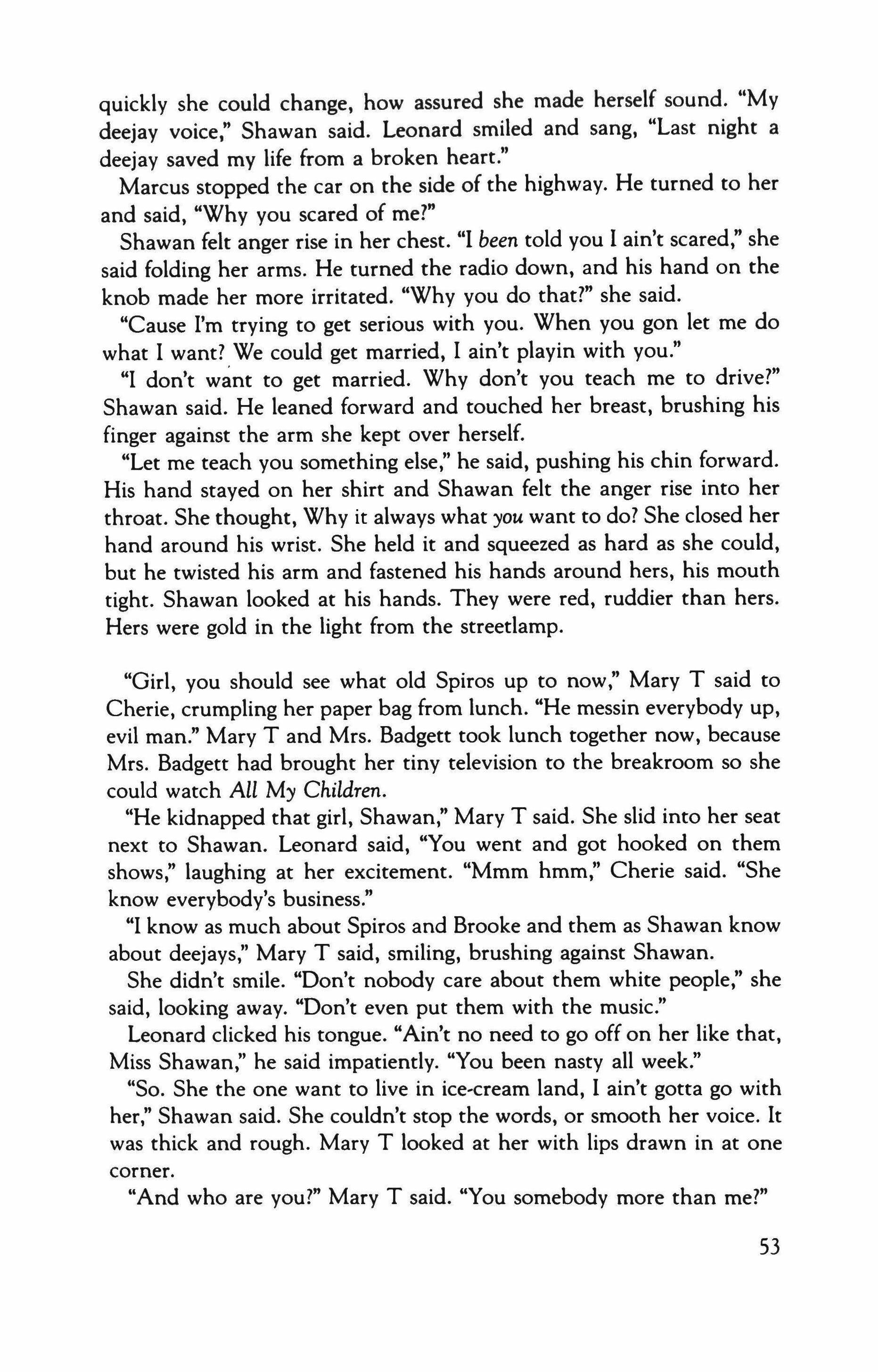
quickly she could change, how assured she made herself sound. "My deejay voice," Shawan said. Leonard smiled and sang, "Last night a deejay saved my life from a broken heart."
Marcus stopped the car on the side of the highway. He turned to her and said, "Why you scared of me?"
Shawan felt anger rise in her chest. "I been told you I ain't scared," she said folding her arms. He turned the radio down, and his hand on the knob made her more irritated. "Why you do that?" she said.
"Cause I'm trying to get serious with you. When you gon let me do what I want? We could get married, I ain't playin with you."
"I don't want to get married. Why don't you teach me to drive?" Shawan said. He leaned forward and touched her breast, brushing his finger against the arm she kept over herself.
"Let me teach you something else," he said, pushing his chin forward. His hand stayed on her shirt and Shawan felt the anger rise into her throat. She thought, Why it always what you want to do? She closed her hand around his wrist. She held it and squeezed as hard as she could, but he twisted his arm and fastened his hands around hers, his mouth tight. Shawan looked at his hands. They were red, ruddier than hers. Hers were gold in the light from the streetlamp.
"Girl, you should see what old Spiros up to now," Mary T said to Cherie, crumpling her paper bag from lunch. "He messin everybody up, evil man." Mary T and Mrs. Badgett took lunch together now, because Mrs. Badgett had brought her tiny television to the breakroom so she could watch All My Children.
"He kidnapped that girl, Shawan," Mary T said. She slid into her seat next to Shawano Leonard said, "You went and got hooked on them shows," laughing at her excitement. "Mrnm hmm," Cherie said. "She know everybody's business."
"I know as much about Spiros and Brooke and them as Shawan know about deejays," Mary T said, smiling, brushing against Shawano
She didn't smile. "Don't nobody care about them white people," she said, looking away. "Don't even put them with the music."
Leonard clicked his tongue. "Ain't no need to go off on her like that, Miss Shawan," he said impatiently. "You been nasty all week."
"So. She the one want to live in ice-cream land, I ain't gotta go with her," Shawan said. She couldn't stop the words, or smooth her voice. It was thick and rough. Mary T looked at her with lips drawn in at one corner.
"And who are you?" Mary T said. "You somebody more than me?"
53

Shawan said nothing. She had always waited for Mary T and Cherie to admire her voice, to ask her about music, when she came to work; now she felt herself wanting to shout at them for no reason. "I'm sorry," she said, looking at the gray metal desk. "But them people life ain't about nothin,"
"They got some brothers and sisters on now," Mary T said. Leonard came to stand behind Shawan's chair, and he touched the back of her neck. "Not no real ones," he said gently. "You want me to sing?"
"No. Diana's songs is all old," Shawan said coldly. She went into the break room, but while the drums and hands clapping bounced back at her she cried instead of swaying.
She liked to see their suits, the elegant tailoring, how the coats made a sharp line from shoulder to hand as if nothing could soften it. Marcus had a suit like that, she thought, walking toward the bus stop. Two men who looked like bankers in her building approached, flicking their eyes over the radio quickly and then glancing away in disgust. "Everywhere you go," one of them said, and Shawan smiled, curling her arm tighter around the metal.
The only open seat was in the middle of the bus, just ahead of the rear door. Her foot was partly in the aisle, flat on the rubber floor, to steady her body when the bus lurched and swayed. An old man sat by the window, leaning his head against the yellowed glass. She stared at his clenched hands; they were black between the wrist and knuckles, ashy gray between the fingers and on the joints.
The bus stopped often in the downtown traffic, and soon the crowds of people waiting impatiently at the crosswalks and the crush of bodies standing in the aisles of the bus surrounded her. Nearly empty buses with signs flashing for Santa Monica and Westwood passed like mirrors. She made her eyes blurry and dreamed until she felt the drag of stops much less frequently and knew they had left downtown and entered the long avenues of South-Central L.A. Her calf muscles relaxed and she put one hand on her knee.
A young man stood up in the back of the bus and pulled a gun out of his jacket. Shawan had moved her head to the clear space by the door and she saw him walk to the crowd's end and turn his back. "Everybody shut up," he said, not loudly. He faced the people in the rear of the bus, holding a shopping bag with brown string handles, and the people near him began to drop their wallets and watches and rings into the bag. He held it with one hand, his wrist curving up and the bag falling open in
54
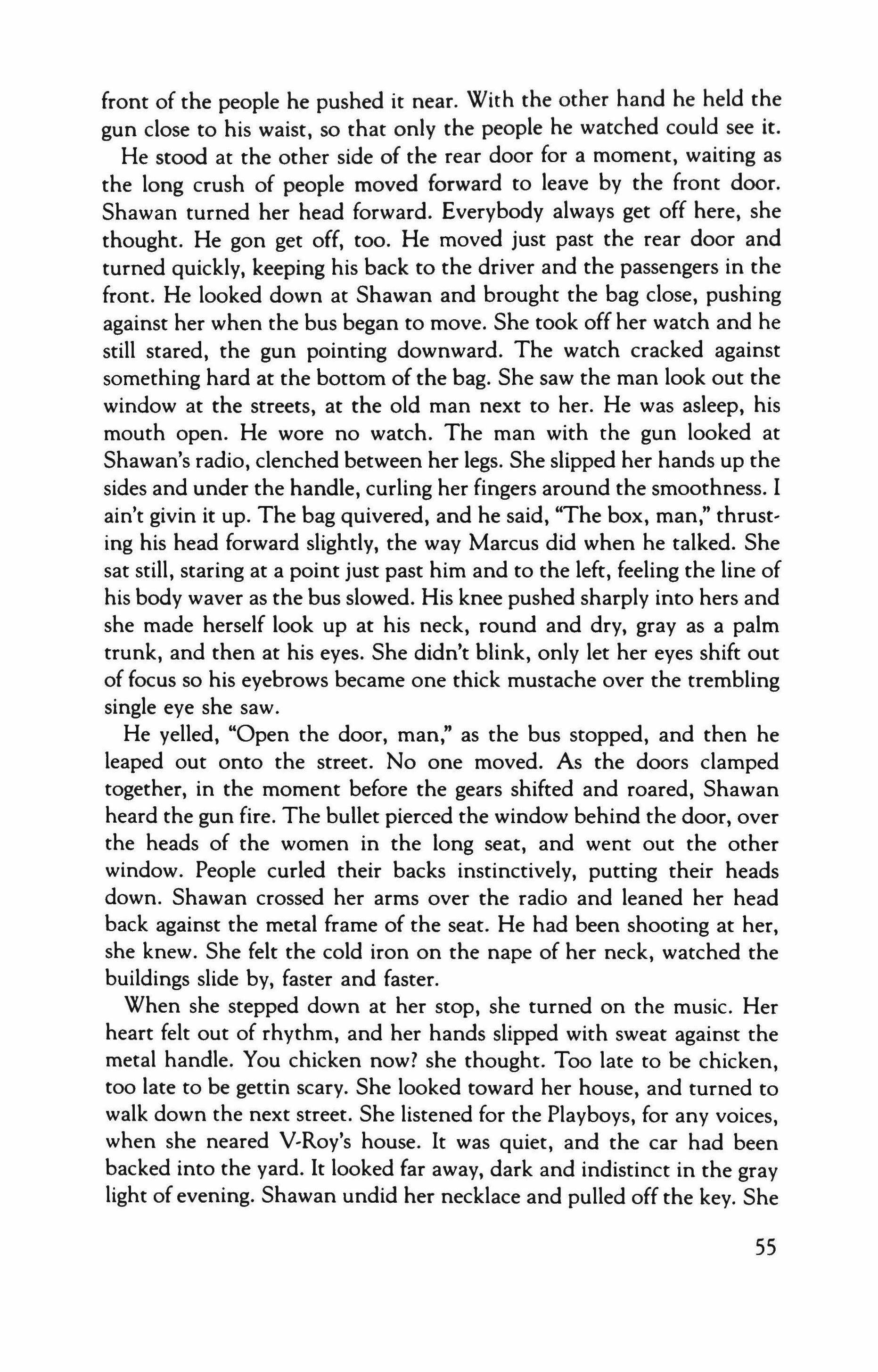
front of the people he pushed it near. With the other hand he held the gun close to his waist, so that only the people he watched could see it. He stood at the other side of the rear door for a moment, waiting as the long crush of people moved forward to leave by the front door. Shawan turned her head forward. Everybody always get off here, she thought. He gon get off, too. He moved just past the rear door and turned quickly, keeping his back to the driver and the passengers in the front. He looked down at Shawan and brought the bag close, pushing against her when the bus began to move. She took off her watch and he still stared, the gun pointing downward. The watch cracked against something hard at the bottom of the bag. She saw the man look out the window at the streets, at the old man next to her. He was asleep, his mouth open. He wore no watch. The man with the gun looked at Shawan's radio, clenched between her legs. She slipped her hands up the sides and under the handle, curling her fingers around the smoothness. I ain't givin it up. The bag quivered, and he said, "The box, man," thrusting his head forward slightly, the way Marcus did when he talked. She sat still, staring at a point just past him and to the left, feeling the line of his body waver as the bus slowed. His knee pushed sharply into hers and she made herself look up at his neck, round and dry, gray as a palm trunk, and then at his eyes. She didn't blink, only let her eyes shift out of focus so his eyebrows became one thick mustache over the trembling single eye she saw.
He yelled, "Open the door, man," as the bus stopped, and then he leaped out onto the street. No one moved. As the doors clamped together, in the moment before the gears shifted and roared, Shawan heard the gun fire. The bullet pierced the window behind the door, over the heads of the women in the long seat, and went out the other window. People curled their backs instinctively, putting their heads down. Shawan crossed her arms over the radio and leaned her head back against the metal frame of the seat. He had been shooting at her, she knew. She felt the cold iron on the nape of her neck, watched the buildings slide by, faster and faster. When she stepped down at her stop, she turned on the music. Her heart felt out of rhythm, and her hands slipped with sweat against the metal handle. You chicken now? she thought. Too late to be chicken, too late to be gettin scary. She looked toward her house, and turned to walk down the next street. She listened for the Playboys, for any voices, when she neared V-Roy's house. It was quiet, and the car had been backed into the yard. It looked far away, dark and indistinct in the gray light of evening. Shawan undid her necklace and pulled off the key. She
55
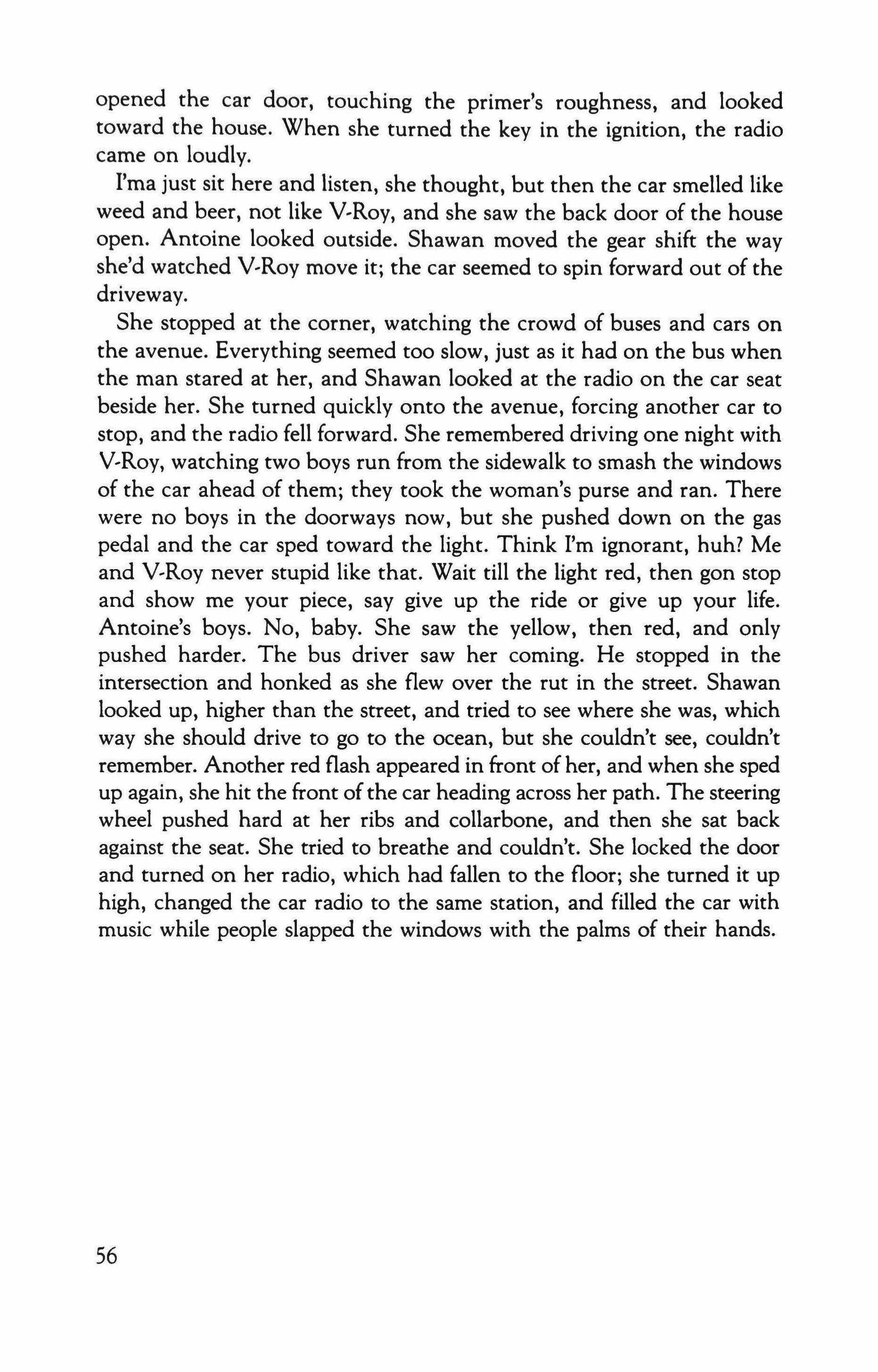
opened the car door, touching the primer's roughness, and looked toward the house. When she turned the key in the ignition, the radio came on loudly.
I'ma just sit here and listen, she thought, but then the car smelled like weed and beer, not like V-Roy, and she saw the back door of the house open. Antoine looked outside. Shawan moved the gear shift the way she'd watched V-Roy move it; the car seemed to spin forward out of the driveway.
She stopped at the corner, watching the crowd of buses and cars on the avenue. Everything seemed too slow, just as it had on the bus when the man stared at her, and Shawan looked at the radio on the car seat beside her. She turned quickly onto the avenue, forcing another car to stop, and the radio fell forward. She remembered driving one night with V-Roy, watching two boys run from the sidewalk to smash the windows of the car ahead of them; they took the woman's purse and ran. There were no boys in the doorways now, but she pushed down on the gas pedal and the car sped toward the light. Think I'm ignorant, huh? Me and V-Roy never stupid like that. Wait till the light red, then gon stop and show me your piece, say give up the ride or give up your life. Antoine's boys. No, baby. She saw the yellow, then red, and only pushed harder. The bus driver saw her coming. He stopped in the intersection and honked as she flew over the rut in the street. Shawan looked up, higher than the street, and tried to see where she was, which way she should drive to go to the ocean, but she couldn't see, couldn't remember. Another red flash appeared in front of her, and when she sped up again, she hit the front ofthe car heading across her path. The steering wheel pushed hard at her ribs and collarbone, and then she sat back against the seat. She tried to breathe and couldn't. She locked the door and turned on her radio, which had fallen to the floor; she turned it up high, changed the car radio to the same station, and filled the car with music while people slapped the windows with the palms of their hands.
56
Orange Grove
Kiisti Leatherwood
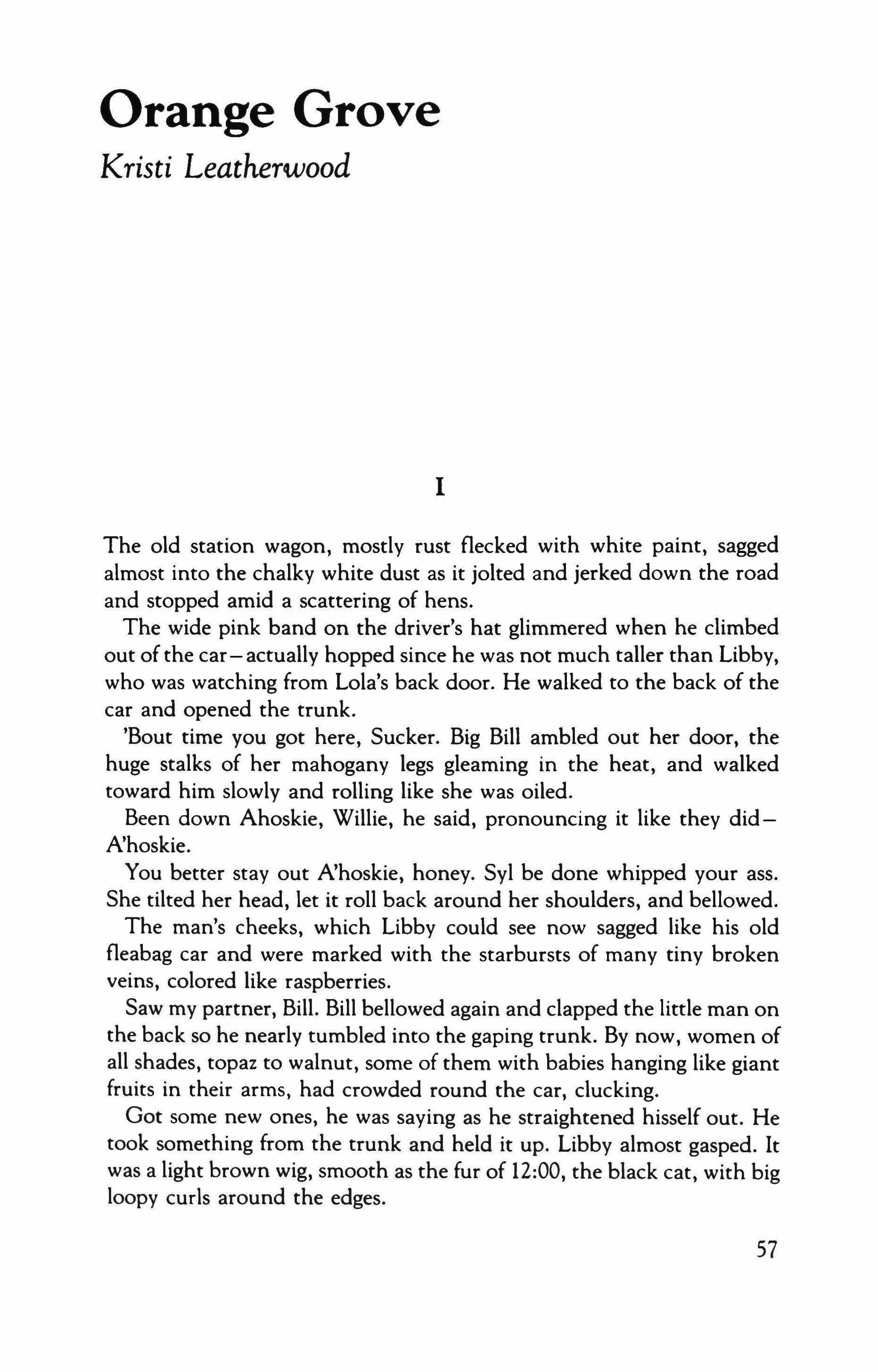
IThe old station wagon, mostly rust flecked with white paint, sagged almost into the chalky white dust as it jolted and jerked down the road and stopped amid a scattering of hens.
The wide pink band on the driver's hat glimmered when he climbed out of the car-actually hopped since he was not much taller than Libby, who was watching from Lola's back door. He walked to the back of the car and opened the trunk.
'Bout time you got here, Sucker. Big Bill ambled out her door, the huge stalks of her mahogany legs gleaming in the heat, and walked toward him slowly and rolling like she was oiled.
Been down Ahoskie, Willie, he said, pronouncing it like they didA'hoskie.
You better stay out A'hoskie, honey. Syl be done whipped your ass. She tilted her head, let it roll back around her shoulders, and bellowed.
The man's cheeks, which Libby could see now sagged like his old fleabag car and were marked with the starbursts of many tiny broken veins, colored like raspberries.
Saw my partner, Bill. Bill bellowed again and clapped the little man on the back so he nearly tumbled into the gaping trunk. By now, women of all shades, topaz to walnut, some of them with babies hanging like giant fruits in their arms, had crowded round the car, clucking.
Got some new ones, he was saying as he straightened hisself out. He took something from the trunk and held it up. Libby almost gasped. It was a light brown wig, smooth as the fur of 12:00, the black cat, with big loopy curls around the edges.
57
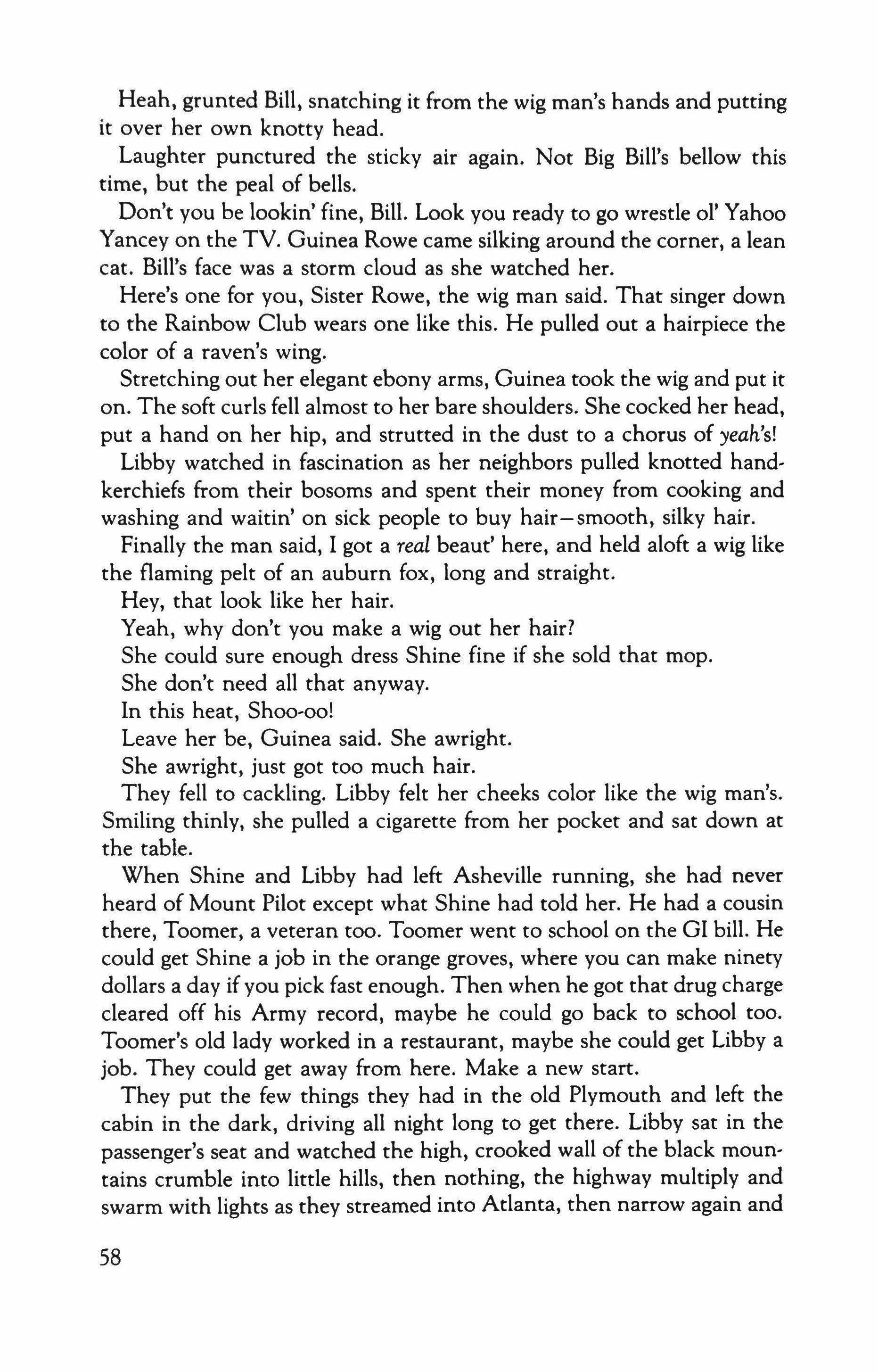
Heah, grunted Bill, snatching it from the wig man's hands and putting it over her own knotty head.
Laughter punctured the sticky air again. Not Big Bill's bellow this time, but the peal of bells.
Don't you be lookin' fine, Bill. Look you ready to go wrestle 01' Yahoo Yancey on the TV. Guinea Rowe came silking around the corner, a lean cat. Bill's face was a storm cloud as she watched her.
Here's one for you, Sister Rowe, the wig man said. That singer down to the Rainbow Club wears one like this. He pulled out a hairpiece the color of a raven's wing.
Stretching out her elegant ebony arms, Guinea took the wig and put it on. The soft curls fell almost to her bare shoulders. She cocked her head, put a hand on her hip, and strutted in the dust to a chorus of yeah's!
Libby watched in fascination as her neighbors pulled knotted handkerchiefs from their bosoms and spent their money from cooking and washing and waitin' on sick people to buy hair-smooth, silky hair.
Finally the man said, I got a real beaut' here, and held aloft a wig like the flaming pelt of an auburn fox, long and straight.
Hey, that look like her hair.
Yeah, why don't you make a wig out her hair?
She could sure enough dress Shine fine if she sold that mop.
She don't need all that anyway.
In this heat, Shoo-oo!
Leave her be, Guinea said. She awright.
She awright, just got too much hair.
They fell to cackling. Libby felt her cheeks color like the wig man's. Smiling thinly, she pulled a cigarette from her pocket and sat down at the table.
When Shine and Libby had left Asheville running, she had never heard of Mount Pilot except what Shine had told her. He had a cousin there, Toomer, a veteran too. Toomer went to school on the GI bill. He could get Shine a job in the orange groves, where you can make ninety dollars a day if you pick fast enough. Then when he got that drug charge cleared off his Army record, maybe he could go back to school too. Toomer's old lady worked in a restaurant, maybe she could get Libby a job. They could get away from here. Make a new start.
They put the few things they had in the old Plymouth and left the cabin in the dark, driving all night long to get there. Libby sat in the passenger's seat and watched the high, crooked wall of the black mountains crumble into little hills, then nothing, the highway multiply and swarm with lights as they streamed into Atlanta, then narrow again and
58
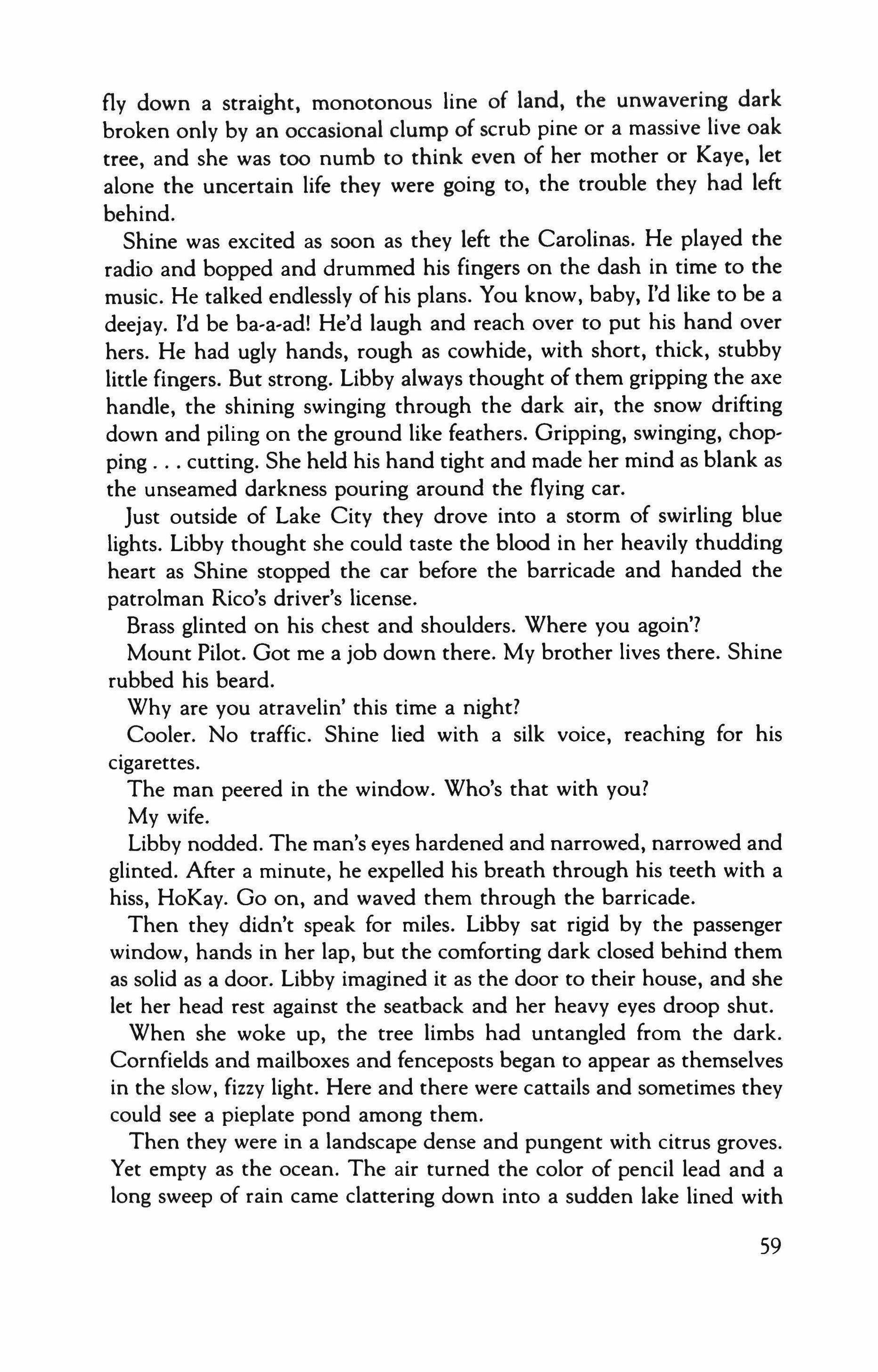
fly down a straight, monotonous line of land, the unwavering dark broken only by an occasional clump of scrub pine or a massive live oak tree, and she was too numb to think even of her mother or Kaye, let alone the uncertain life they were going to, the trouble they had left behind.
Shine was excited as soon as they left the Carolinas. He played the radio and bopped and drummed his fingers on the dash in time to the music. He talked endlessly of his plans. You know, baby, I'd like to be a deejay. I'd be ba-a-ad! He'd laugh and reach over to put his hand over hers. He had ugly hands, rough as cowhide, with short, thick, stubby little fingers. But strong. Libby always thought of them gripping the axe handle, the shining swinging through the dark air, the snow drifting down and piling on the ground like feathers. Gripping, swinging, chopping cutting. She held his hand tight and made her mind as blank as the unseamed darkness pouring around the flying car.
Just outside of Lake City they drove into a storm of swirling blue lights. Libby thought she could taste the blood in her heavily thudding heart as Shine stopped the car before the barricade and handed the patrolman Rico's driver's license.
Brass glinted on his chest and shoulders. Where you agoin'?
Mount Pilot. Got me a job down there. My brother lives there. Shine rubbed his beard.
Why are you atravelin' this time a night?
Cooler. No traffic. Shine lied with a silk voice, reaching for his cigarettes.
The man peered in the window. Who's that with you?
My wife.
Libby nodded. The man's eyes hardened and narrowed, narrowed and glinted. After a minute, he expelled his breath through his teeth with a hiss, HoKay. Go on, and waved them through the barricade.
Then they didn't speak for miles. Libby sat rigid by the passenger window, hands in her lap, but the comforting dark closed behind them as solid as a door. Libby imagined it as the door to their house, and she let her head rest against the seatback and her heavy eyes droop shut.
When she woke up, the tree limbs had untangled from the dark. Cornfields and mailboxes and fenceposts began to appear as themselves in the slow, fizzy light. Here and there were cattails and sometimes they could see a pieplate pond among them.
Then they were in a landscape dense and pungent with citrus groves. Yet empty as the ocean. The air turned the color of pencil lead and a long sweep of rain came clattering down into a sudden lake lined with
59
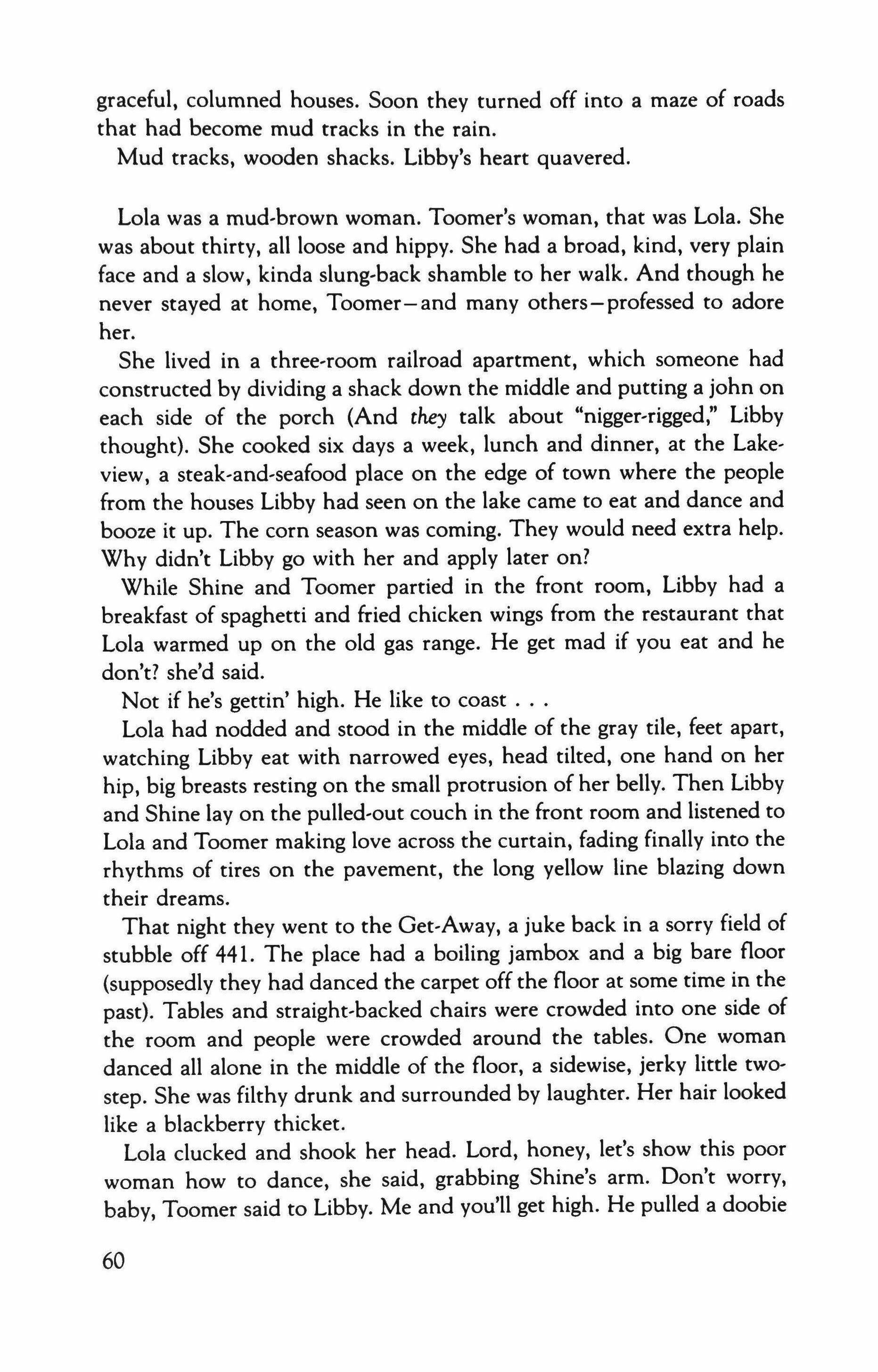
graceful, columned houses. Soon they turned off into a maze of roads that had become mud tracks in the rain.
Mud tracks, wooden shacks. Libby's heart quavered.
Lola was a mud-brown woman. Toomer's woman, that was Lola. She was about thirty, all loose and hippy. She had a broad, kind, very plain face and a slow, kinda slung-back shamble to her walk. And though he never stayed at home, Toomer-and many others-professed to adore her.
She lived in a three-room railroad apartment, which someone had constructed by dividing a shack down the middle and putting a john on each side of the porch (And they talk about "nigger-rigged," Libby thought). She cooked six days a week, lunch and dinner, at the Lakeview, a steak-and-seafood place on the edge of town where the people from the houses Libby had seen on the lake came to eat and dance and booze it up. The corn season was coming. They would need extra help. Why didn't Libby go with her and apply later on?
While Shine and Toomer partied in the front room, Libby had a breakfast of spaghetti and fried chicken wings from the restaurant that Lola warmed up on the old gas range. He get mad if you eat and he don't? she'd said.
Not if he's gettin' high. He like to coast
Lola had nodded and stood in the middle of the gray tile, feet apart, watching Libby eat with narrowed eyes, head tilted, one hand on her hip, big breasts resting on the small protrusion of her belly. Then Libby and Shine lay on the pulled-out couch in the front room and listened to Lola and Toomer making love across the curtain, fading finally into the rhythms of tires on the pavement, the long yellow line blazing down their dreams.
That night they went to the Get-Away, a juke back in a sorry field of stubble off 441. The place had a boiling jambox and a big bare floor (supposedly they had danced the carpet off the floor at some time in the past). Tables and straight-backed chairs were crowded into one side of the room and people were crowded around the tables. One woman danced all alone in the middle of the floor, a sidewise, jerky little twostep. She was filthy drunk and surrounded by laughter. Her hair looked like a blackberry thicket.
Lola clucked and shook her head. Lord, honey, let's show this poor woman how to dance, she said, grabbing Shine's arm. Don't worry, baby, Toomer said to Libby. Me and you'll get high. He pulled a doobie
60
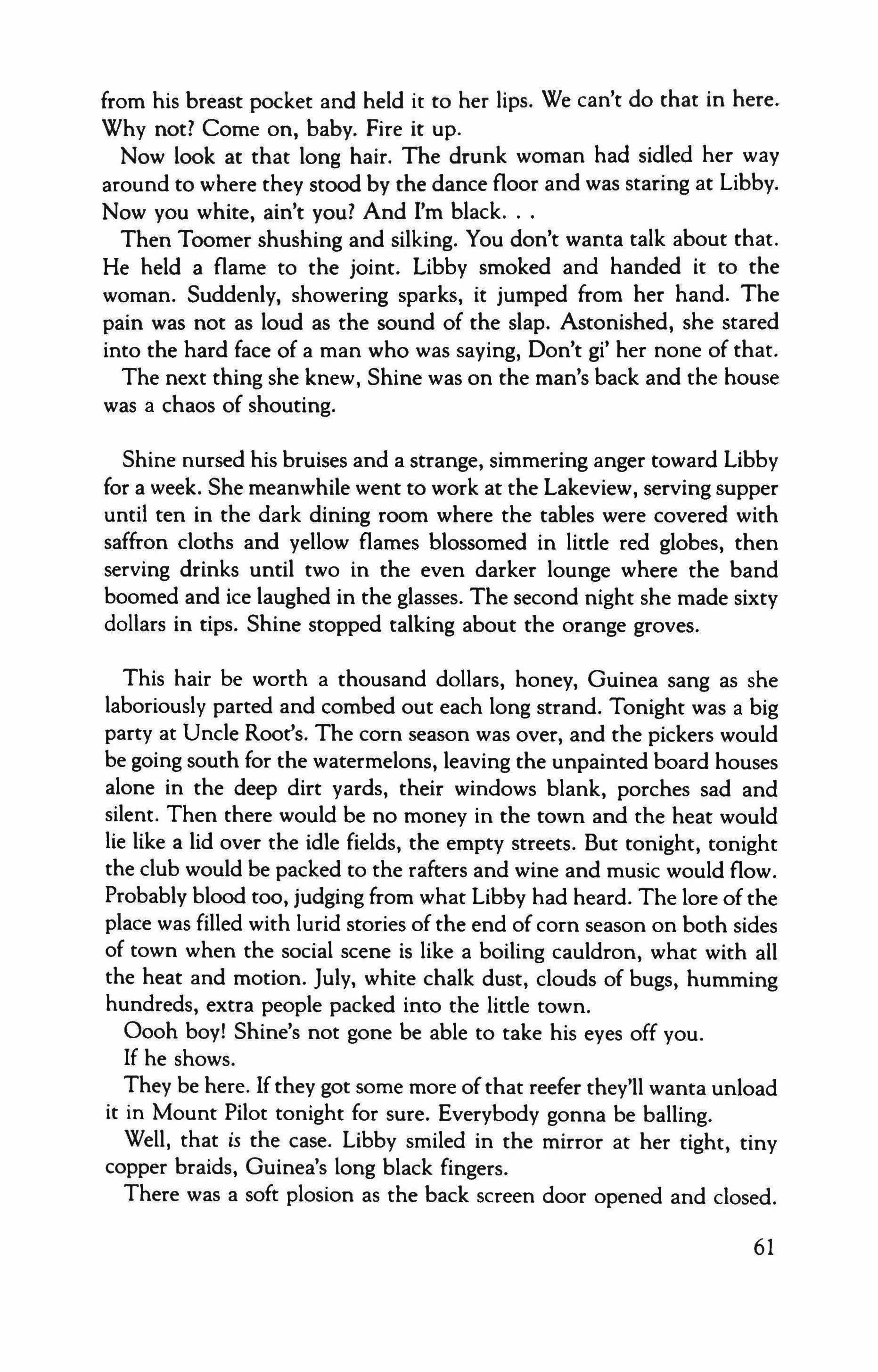
from his breast pocket and held it to her lips. We can't do that in here. Why not? Come on, baby. Fire it up.
Now look at that long hair. The drunk woman had sidled her way around to where they stood by the dance floor and was staring at Libby. Now you white, ain't you? And I'm black
Then Toomer shushing and silking. You don't wanta talk about that. He held a flame to the joint. Libby smoked and handed it to the woman. Suddenly, showering sparks, it jumped from her hand. The pain was not as loud as the sound of the slap. Astonished, she stared into the hard face of a man who was saying, Don't gi' her none of that.
The next thing she knew, Shine was on the man's back and the house was a chaos of shouting.
Shine nursed his bruises and a strange, simmering anger toward Libby for a week. She meanwhile went to work at the Lakeview, serving supper until ten in the dark dining room where the tables were covered with saffron cloths and yellow flames blossomed in little red globes, then serving drinks until two in the even darker lounge where the band boomed and ice laughed in the glasses. The second night she made sixty dollars in tips. Shine stopped talking about the orange groves.
This hair be worth a thousand dollars, honey, Guinea sang as she laboriously parted and combed out each long strand. Tonight was a big party at Uncle Root's. The corn season was over, and the pickers would be going south for the watermelons, leaving the unpainted board houses alone in the deep dirt yards, their windows blank, porches sad and silent. Then there would be no money in the town and the heat would lie like a lid over the idle fields, the empty streets. But tonight, tonight the club would be packed to the rafters and wine and music would flow. Probably blood too, judging from what Libby had heard. The lore of the place was filled with lurid stories of the end of corn season on both sides of town when the social scene is like a boiling cauldron, what with all the heat and motion. July, white chalk dust, clouds of bugs, humming hundreds, extra people packed into the little town.
Oooh boy! Shine's not gone be able to take his eyes off you.
If he shows.
They be here. If they got some more ofthat reefer they'll wanta unload it in Mount Pilot tonight for sure. Everybody gonna be balling.
Well, that is the case. Libby smiled in the mirror at her tight, tiny copper braids, Guinea's long black fingers.
There was a soft plosion as the back screen door opened and closed.
61
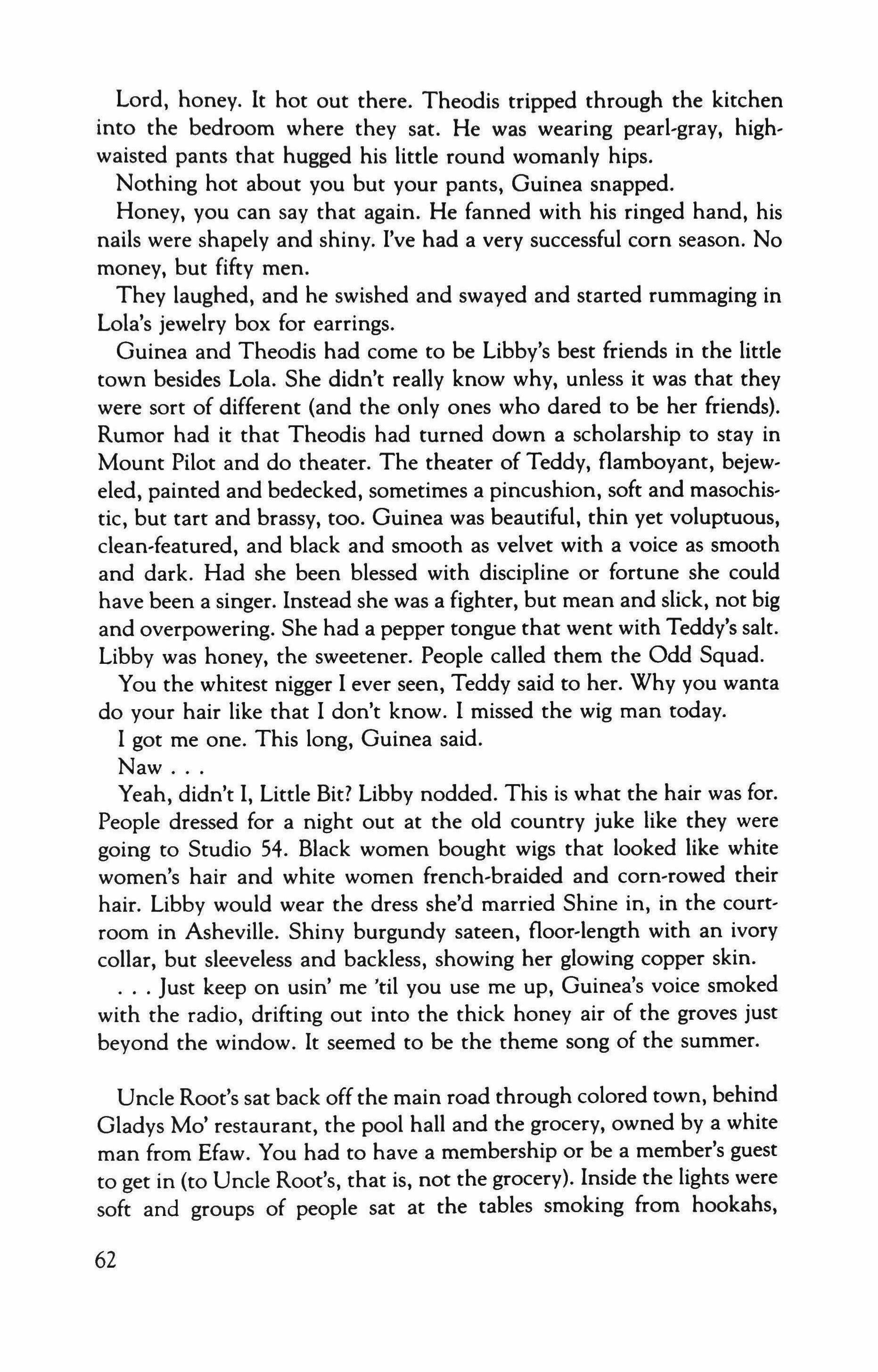
Lord, honey. It hot out there. Theodis tripped through the kitchen into the bedroom where they sat. He was wearing pearl-gray, highwaisted pants that hugged his little round womanly hips.
Nothing hot about you but your pants, Guinea snapped.
Honey, you can say that again. He fanned with his ringed hand, his nails were shapely and shiny. I've had a very successful corn season. No money, but fifty men.
They laughed, and he swished and swayed and started rummaging in Lola's jewelry box for earrings.
Guinea and Theodis had come to be Libby's best friends in the little town besides Lola. She didn't really know why, unless it was that they were sort of different (and the only ones who dared to be her friends). Rumor had it that Theodis had turned down a scholarship to stay in Mount Pilot and do theater. The theater of Teddy, flamboyant, bejeweled, painted and bedecked, sometimes a pincushion, soft and masochistic, but tart and brassy, too. Guinea was beautiful, thin yet voluptuous, clean-featured, and black and smooth as velvet with a voice as smooth and dark. Had she been blessed with discipline or fortune she could have been a singer. Instead she was a fighter, but mean and slick, not big and overpowering. She had a pepper tongue that went with Teddy's salt. Libby was honey, the sweetener. People called them the Odd Squad. You the whitest nigger I ever seen, Teddy said to her. Why you wanta do your hair like that I don't know. I missed the wig man today. I got me one. This long, Guinea said.
Naw
Yeah, didn't I, Little Bit? Libby nodded. This is what the hair was for. People dressed for a night out at the old country juke like they were going to Studio 54. Black women bought wigs that looked like white women's hair and white women french-braided and corn-rowed their hair. Libby would wear the dress she'd married Shine in, in the courtroom in Asheville. Shiny burgundy sateen, floor-length with an ivory collar, but sleeveless and backless, showing her glowing copper skin Just keep on usin' me 'til you use me up, Guinea's voice smoked with the radio, drifting out into the thick honey air of the groves just beyond the window. It seemed to be the theme song of the summer.
Uncle Root's sat back off the main road through colored town, behind Gladys Mo' restaurant, the pool hall and the grocery, owned by a white man from Efaw. You had to have a membership or be a member's guest to get in (to Uncle Root's, that is, not the grocery). Inside the lights were soft and groups of people sat at the tables smoking from hookahs,
62
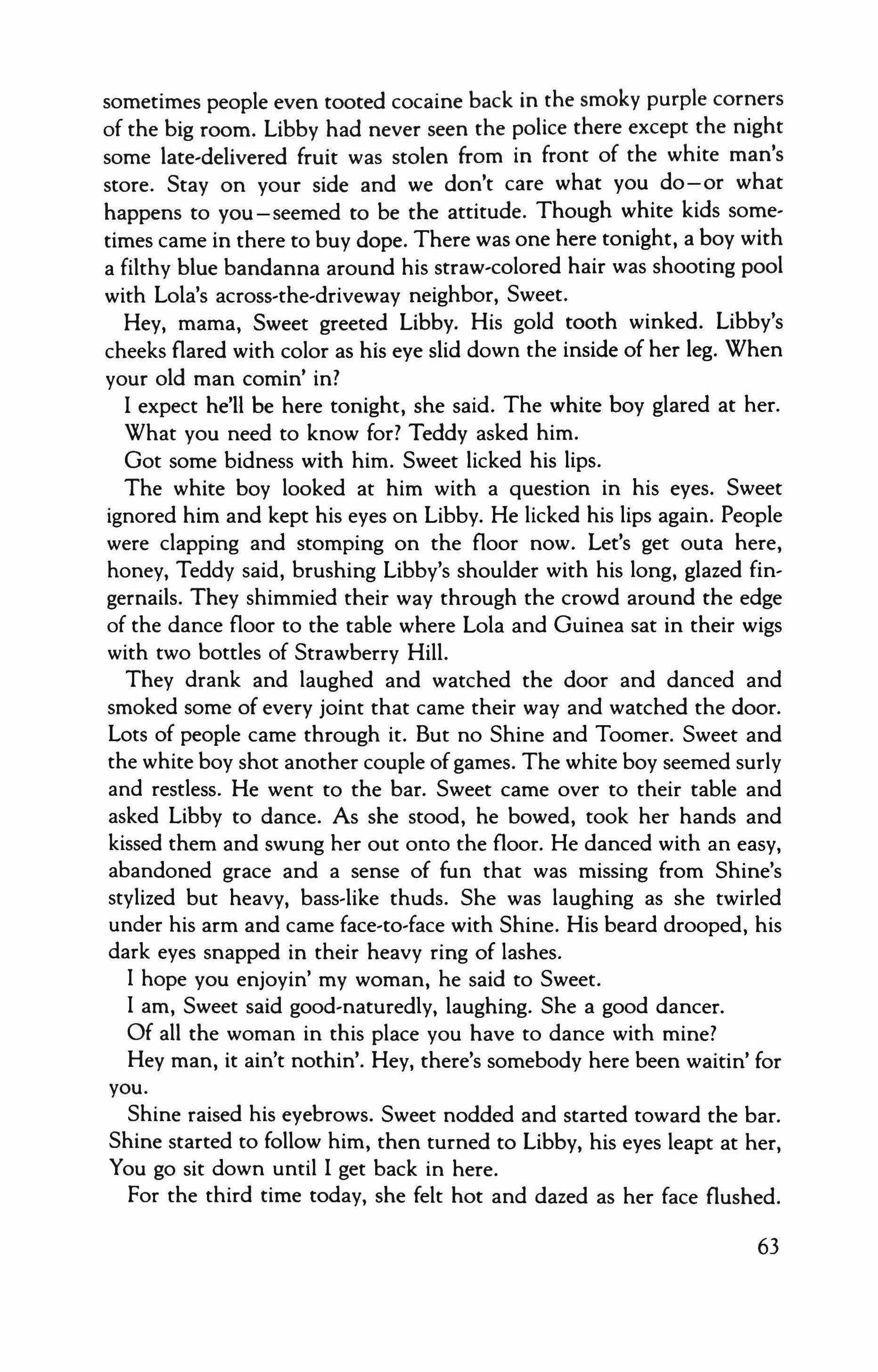
sometimes people even tooted cocaine back in the smoky purple corners of the big room. Libby had never seen the police there except the night some late-delivered fruit was stolen from in front of the white man's store. Stay on your side and we don't care what you do-or what happens to you-seemed to be the attitude. Though white kids some, times came in there to buy dope. There was one here tonight, a boy with a filthy blue bandanna around his straw-colored hair was shooting pool with Lola's across-the-driveway neighbor, Sweet.
Hey, mama, Sweet greeted Libby. His gold tooth winked. Libby's cheeks flared with color as his eye slid down the inside of her leg. When your old man comin' in?
I expect he'll be here tonight, she said. The white boy glared at her. What you need to know for? Teddy asked him.
Got some bidness with him. Sweet licked his lips.
The white boy looked at him with a question in his eyes. Sweet ignored him and kept his eyes on Libby. He licked his lips again. People were clapping and stomping on the floor now. Let's get outa here, honey, Teddy said, brushing Libby's shoulder with his long, glazed fin, gernails. They shimmied their way through the crowd around the edge of the dance floor to the table where Lola and Guinea sat in their wigs with two bottles of Strawberry Hill.
They drank and laughed and watched the door and danced and smoked some of every joint that came their way and watched the door. Lots of people came through it. But no Shine and Toomer. Sweet and the white boy shot another couple of games. The white boy seemed surly and restless. He went to the bar. Sweet came over to their table and asked Libby to dance. As she stood, he bowed, took her hands and kissed them and swung her out onto the floor. He danced with an easy, abandoned grace and a sense of fun that was missing from Shine's stylized but heavy, bass-like thuds. She was laughing as she twirled under his arm and came face-to-face with Shine. His beard drooped, his dark eyes snapped in their heavy ring of lashes.
I hope you enjoyin' my woman, he said to Sweet.
I am, Sweet said good-naturedlv, laughing. She a good dancer.
Of all the woman in this place you have to dance with mine?
Hey man, it ain't nothin', Hey, there's somebody here been waitin' for you.
Shine raised his eyebrows. Sweet nodded and started toward the bar. Shine started to follow him, then turned to Libby, his eyes leapt at her, You go sit down until I get back in here.
For the third time today, she felt hot and dazed as her face flushed.
63
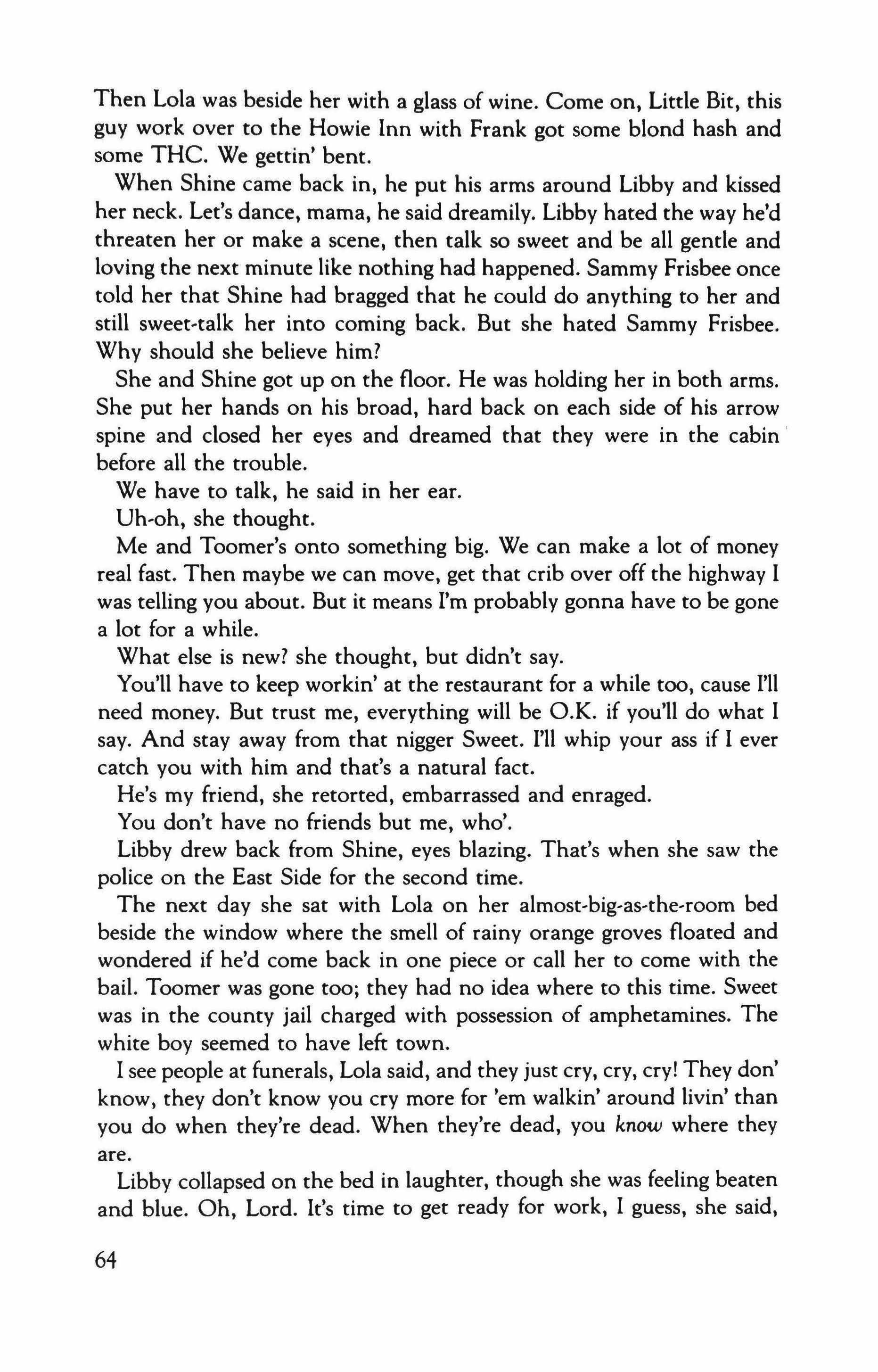
Then Lola was beside her with a glass of wine. Come on, Little Bit, this guy work over to the Howie Inn with Frank got some blond hash and some THC. We gettin' bent.
When Shine came back in, he put his arms around Libby and kissed her neck. Let's dance, mama, he said dreamily. Libby hated the way he'd threaten her or make a scene, then talk so sweet and be all gentle and loving the next minute like nothing had happened. Sammy Frisbee once told her that Shine had bragged that he could do anything to her and still sweet-talk her into coming back. But she hated Sammy Frisbee. Why should she believe him?
She and Shine got up on the floor. He was holding her in both arms. She put her hands on his broad, hard back on each side of his arrow spine and closed her eyes and dreamed that they were in the cabin before all the trouble.
We have to talk, he said in her ear.
Uh-oh, she thought.
Me and Toomer's onto something big. We can make a lot of money real fast. Then maybe we can move, get that crib over off the highway I was telling you about. But it means I'm probably gonna have to be gone a lot for a while.
What else is new? she thought, but didn't say.
You'll have to keep workin' at the restaurant for a while too, cause I'll need money. But trust me, everything will be O.K. if you'll do what I say. And stay away from that nigger Sweet. l'll whip your ass if I ever catch you with him and that's a natural fact.
He's my friend, she retorted, embarrassed and enraged.
You don't have no friends but me, who'.
Libby drew back from Shine, eyes blazing. That's when she saw the police on the East Side for the second time.
The next day she sat with Lola on her almost-big-as-the-room bed beside the window where the smell of rainy orange groves floated and wondered if he'd come back in one piece or call her to come with the bail. Toomer was gone too; they had no idea where to this time. Sweet was in the county jail charged with possession of amphetamines. The white boy seemed to have left town.
I see people at funerals, Lola said, and they just cry, cry, cry! They don' know, they don't know you cry more for 'em walkin' around livin' than you do when they're dead. When they're dead, you know where they are.
Libby collapsed on the bed in laughter, though she was feeling beaten and blue. Oh, Lord. It's time to get ready for work, I guess, she said,
64
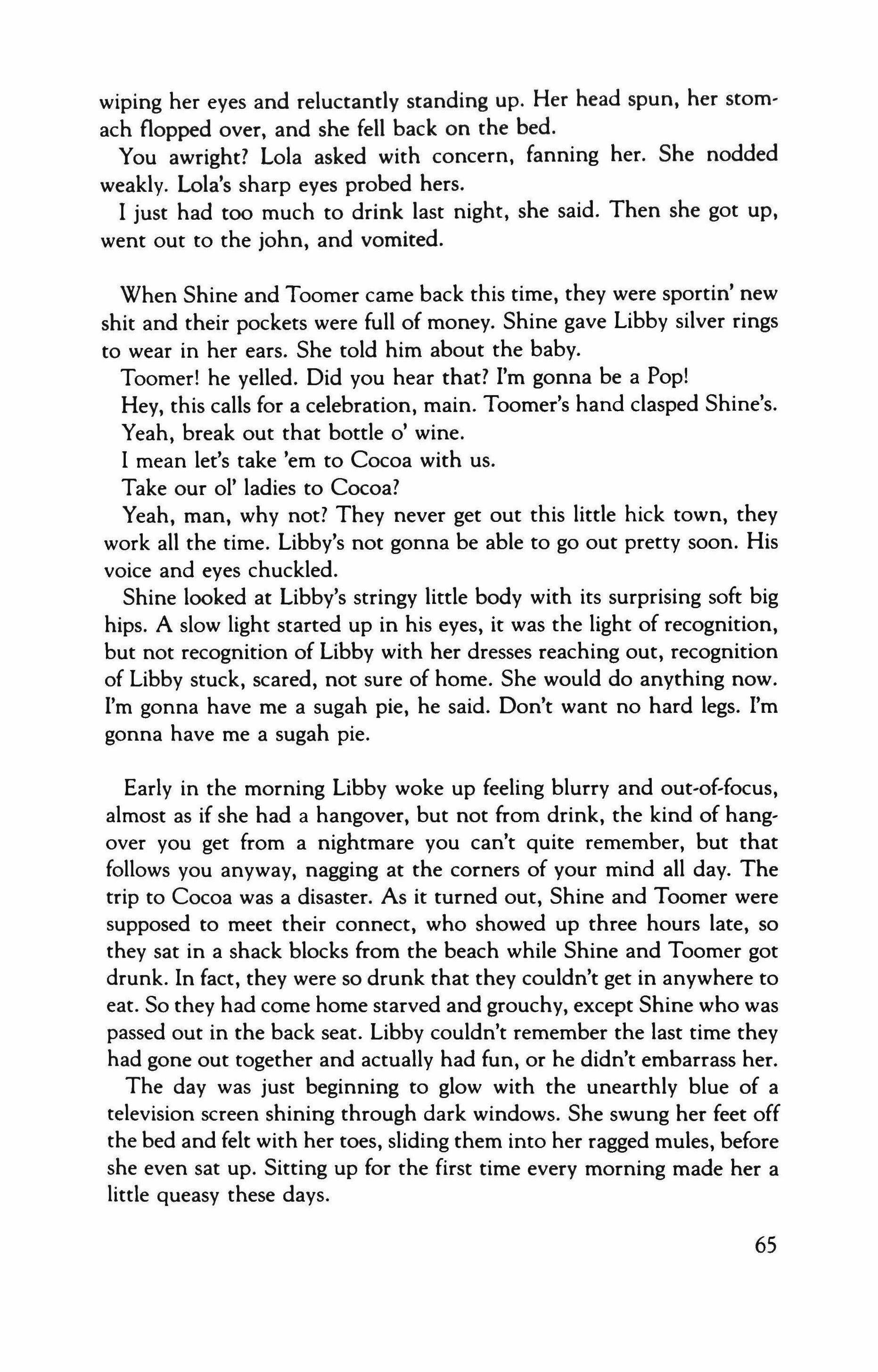
wiping her eyes and reluctantly standing up. Her head spun, her stomach flopped over, and she fell back on the bed.
You awright? Lola asked with concern, fanning her. She nodded weakly. Lola's sharp eyes probed hers.
I just had too much to drink last night, she said. Then she got up, went out to the john, and vomited.
When Shine and Toomer came back this time, they were sportin' new shit and their pockets were full of money. Shine gave Libby silver rings to wear in her ears. She told him about the baby.
Toomer! he yelled. Did you hear that? I'm gonna be a Pop!
Hey, this calls for a celebration, main. Toomer's hand clasped Shine's. Yeah, break out that bottle 0' wine.
I mean let's take 'em to Cocoa with us.
Take our 01' ladies to Cocoa?
Yeah, man, why not? They never get out this little hick town, they work all the time. Libby's not gonna be able to go out pretty soon. His voice and eyes chuckled.
Shine looked at Libby's stringy little body with its surprising soft big hips. A slow light started up in his eyes, it was the light of recognition, but not recognition of Libby with her dresses reaching out, recognition of Libby stuck, scared, not sure of home. She would do anything now. I'm gonna have me a sugah pie, he said. Don't want no hard legs. I'm gonna have me a sugah pie.
Early in the morning Libby woke up feeling blurry and out-of-focus, almost as if she had a hangover, but not from drink, the kind of hangover you get from a nightmare you can't quite remember, but that follows you anyway, nagging at the corners of your mind all day. The trip to Cocoa was a disaster. As it turned out, Shine and Toomer were supposed to meet their connect, who showed up three hours late, so they sat in a shack blocks from the beach while Shine and Toomer got drunk. In fact, they were so drunk that they couldn't get in anywhere to eat. So they had come home starved and grouchy, except Shine who was passed out in the back seat. Libby couldn't remember the last time they had gone out together and actually had fun, or he didn't embarrass her.
The day was just beginning to glow with the unearthly blue of a television screen shining through dark windows. She swung her feet off the bed and felt with her toes, sliding them into her ragged mules, before she even sat up. Sitting up for the first time every morning made her a little queasy these days.
65
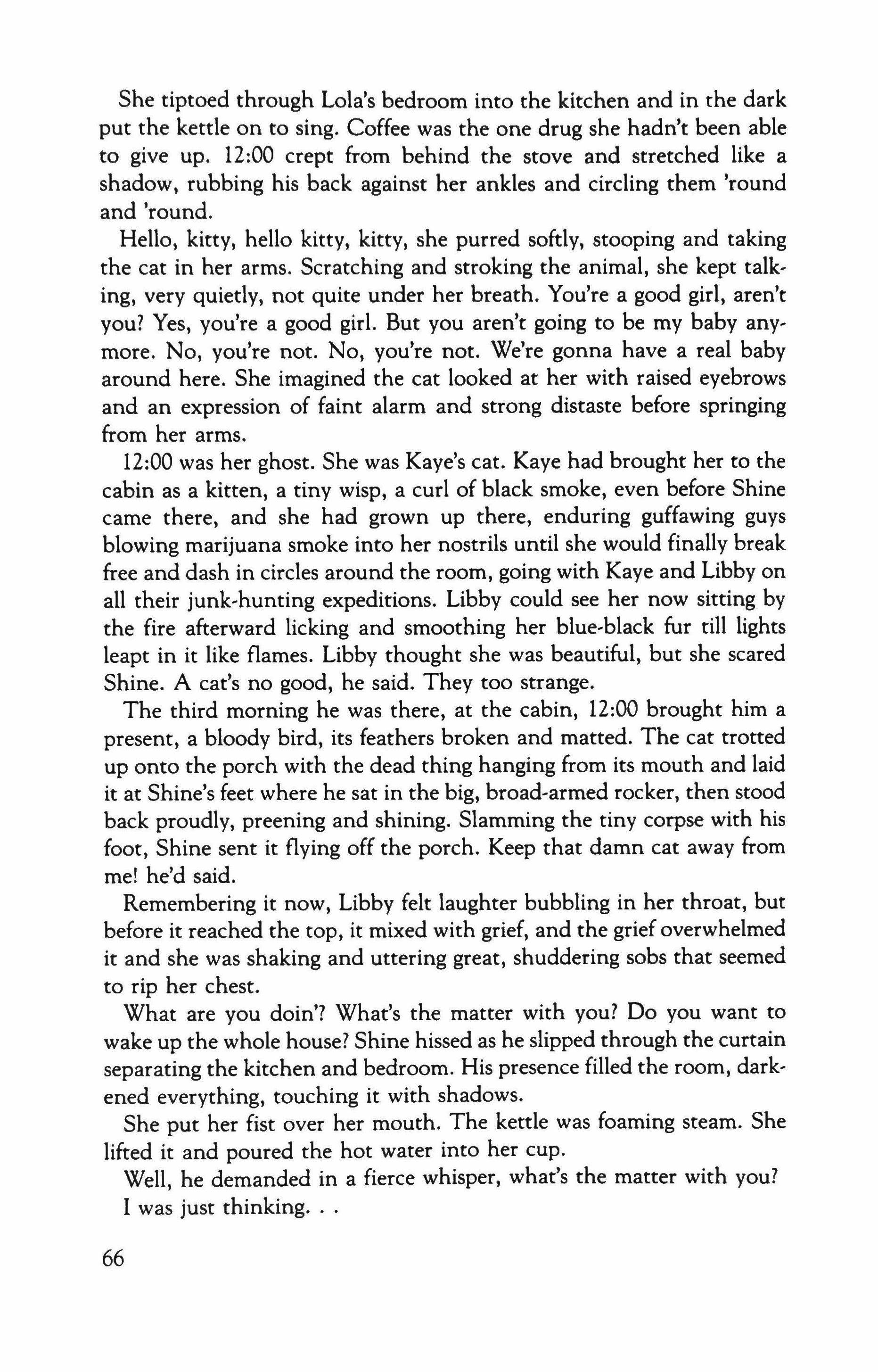
She tiptoed through Lola's bedroom into the kitchen and in the dark put the kettle on to sing. Coffee was the one drug she hadn't been able to give up. 12:00 crept from behind the stove and stretched like a shadow, rubbing his back against her ankles and circling them 'round and 'round.
Hello, kitty, hello kitty, kitty, she purred softly, stooping and taking the cat in her arms. Scratching and stroking the animal, she kept talk, ing, very quietly, not quite under her breath. You're a good girl, aren't you? Yes, you're a good girl. But you aren't going to be my baby any, more. No, you're not. No, you're not. We're gonna have a real baby around here. She imagined the cat looked at her with raised eyebrows and an expression of faint alarm and strong distaste before springing from her arms.
12:00 was her ghost. She was Kaye's cat. Kaye had brought her to the cabin as a kitten, a tiny wisp, a curl of black smoke, even before Shine came there, and she had grown up there, enduring guffawing guys blowing marijuana smoke into her nostrils until she would finally break free and dash in circles around the room, going with Kaye and Libby on all their junk-hunting expeditions. Libby could see her now sitting by the fire afterward licking and smoothing her blue-black fur till lights leapt in it like flames. Libby thought she was beautiful, but she scared Shine. A eat's no good, he said. They too strange.
The third morning he was there, at the cabin, 12:00 brought him a present, a bloody bird, its feathers broken and matted. The cat trotted up onto the porch with the dead thing hanging from its mouth and laid it at Shine's feet where he sat in the big, broad-armed rocker, then stood back proudly, preening and shining. Slamming the tiny corpse with his foot, Shine sent it flying off the porch. Keep that damn cat away from me! he'd said.
Remembering it now, Libby felt laughter bubbling in her throat, but before it reached the top, it mixed with grief, and the grief overwhelmed it and she was shaking and uttering great, shuddering sobs that seemed to rip her chest.
What are you doin'? What's the matter with you? Do you want to wake up the whole house? Shine hissed as he slipped through the curtain separating the kitchen and bedroom. His presence filled the room, dark, ened everything, touching it with shadows.
She put her fist over her mouth. The kettle was foaming steam. She lifted it and poured the hot water into her cup.
Well, he demanded in a fierce whisper, what's the matter with you?
I was just thinking
66
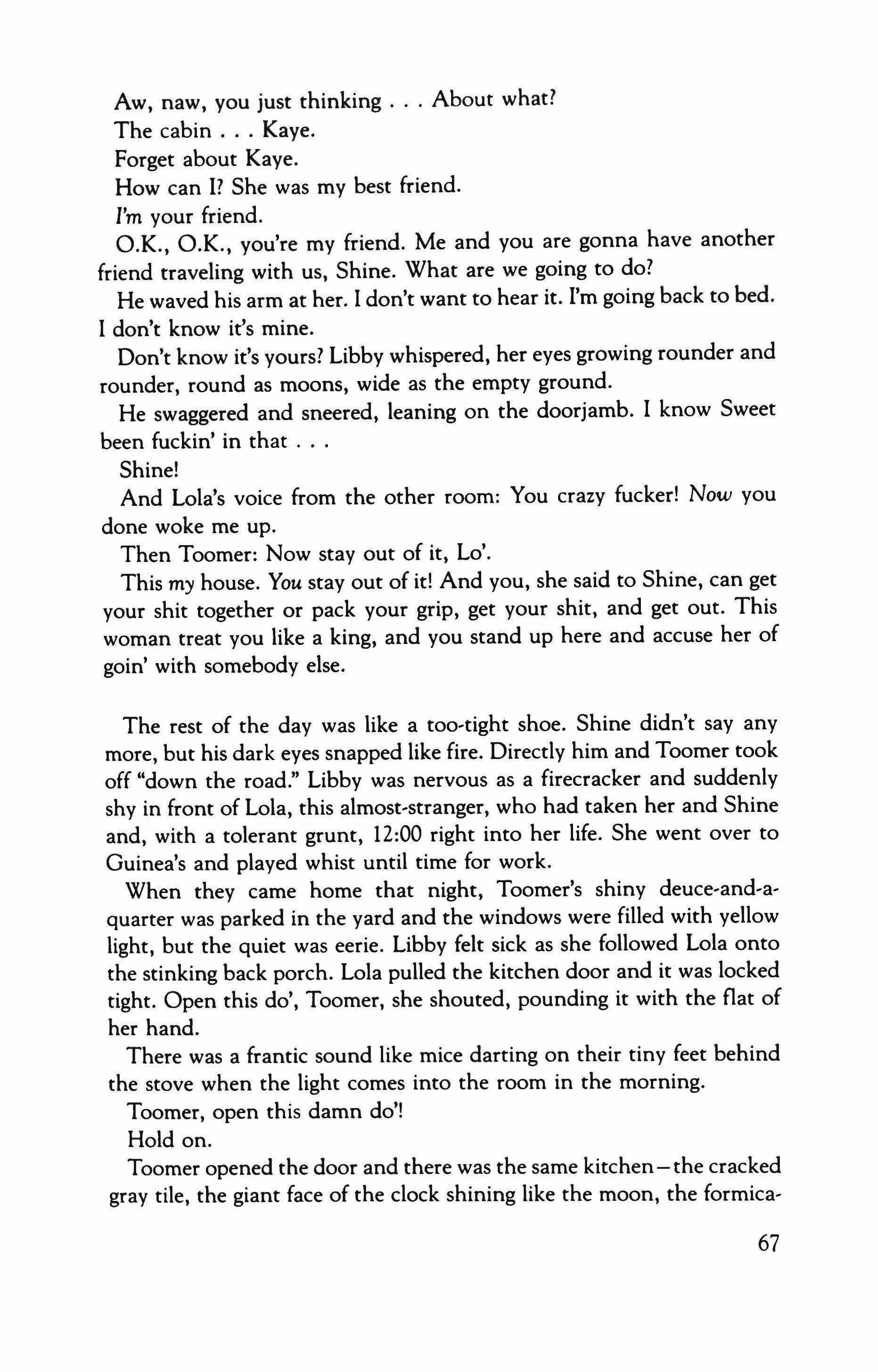
Aw, naw, you just thinking About what?
The cabin Kaye.
Forget about Kaye.
How can l? She was my best friend.
I'm your friend.
O.K., O.K., you're my friend. Me and you are gonna have another friend traveling with us, Shine. What are we going to do?
He waved his arm at her. I don't want to hear it. I'm going back to bed. I don't know it's mine.
Don't know it's yours? Libby whispered, her eyes growing rounder and rounder, round as moons, wide as the empty ground.
He swaggered and sneered, leaning on the doorjamb. I know Sweet been fuckin' in that Shine!
And Lola's voice from the other room: You crazy fucker! Now you done woke me up.
Then Toomer: Now stay out of it, Lo'.
This my house. You stay out of it! And you, she said to Shine, can get your shit together or pack your grip, get your shit, and get out. This woman treat you like a king, and you stand up here and accuse her of goin' with somebody else.
The rest of the day was like a too-tight shoe. Shine didn't say any more, but his dark eyes snapped like fire. Directly him and Toomer took off "down the road." Libby was nervous as a firecracker and suddenly shy in front of Lola, this almost-stranger, who had taken her and Shine and, with a tolerant grunt, 12:00 right into her life. She went over to Guinea's and played whist until time for work.
When they came home that night, Toomer's shiny deuce-and-aquarter was parked in the yard and the windows were filled with yellow light, but the quiet was eerie. Libby felt sick as she followed Lola onto the stinking back porch. Lola pulled the kitchen door and it was locked tight. Open this do', Toomer, she shouted, pounding it with the flat of her hand.
There was a frantic sound like mice darting on their tiny feet behind the stove when the light comes into the room in the morning.
Toomer, open this damn do'!
Hold on.
Toomer opened the door and there was the same kitchen - the cracked gray tile, the giant face of the clock shining like the moon, the formica-
67

topped table and its four ragged chairs. And the tie, hanging over the back of one of them.
So, here we go again. Libby walked like a robot straight into the front room, where Shine sat before the tiny black-and-white TV and looked down at him. His mahogany face glittered with sweat. He turned to her with big, black eyes wide as the empty ground.
Lola hit the ceiling when she found out what was going on. Libby didn't tell her because she knew Shine would jump her for it, but she also knew it was just a matter of time. And, sure enough, a day or two later, she and Lola were having their coffee. The sugar bowl was empty. When Lola went to reach the sugar from the top shelf, there was the syringe.
What's this? she asked, turning to Libby with it in her hand, her dark eyes narrowed to slits.
Libby's cheeks sickened. It looks like a needle.
I know that. What's it doing in here? That nigger don't shoot dope, do he?
I think they both are, Lo'.
Toomer never mess wit' that shit before.
He is now.
It's that got-damn slick's fault! I want his black ass outa here! You welcome to stay, Libby, you been good to me, but he leavin' tonight. If I'm not welcome at my cousin house, my lady not either. We a family. Shine's voice smooth as glass from the back door.
Lola whirled to face him; her voice was dark with anger and menace.
This not your cousin's house. He a guest here, too. And if he start doin' that shit, his ass is out in the streets.
He flung the door open and stepped in. Come on, Libby, let's get outa here. I don't need this 01' hosebag all up in my face.
Shine! This woman has taken you into her home
And now she's throwin' you out, ass.
She don't have to go nowhere.
Because of your bullshit as usual! Libby screamed, jumping up from the table.
Shine took three fierce strides toward her and brought the flat of his hand crashing against her face. She stumbled and fell backward, tangling her foot in the rung of the chair. There was blood in his eyes and on her tongue.
68
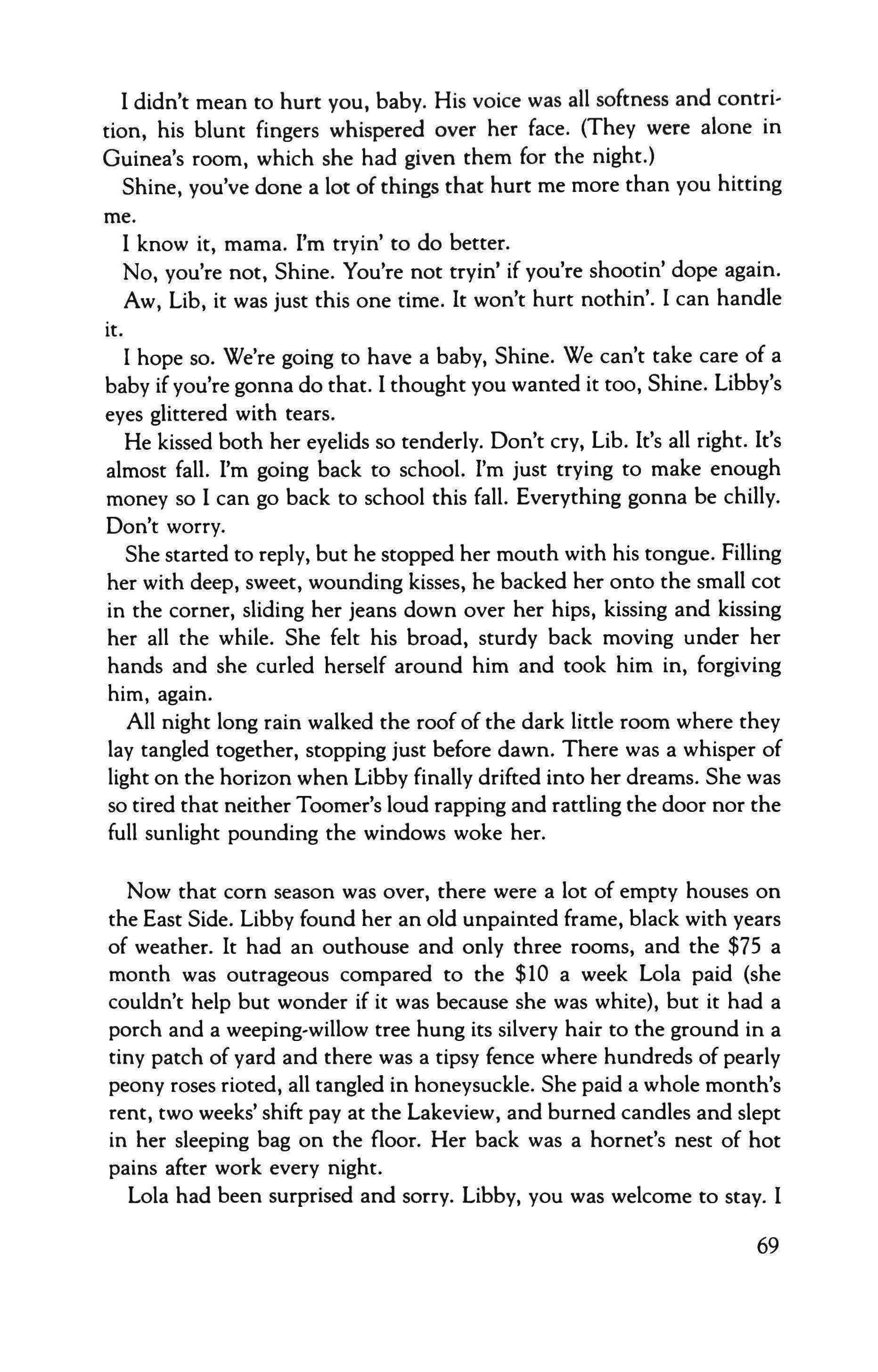
I didn't mean to hurt you, baby. His voice was all softness and contrition, his blunt fingers whispered over her face. (They were alone in Guinea's room, which she had given them for the night.)
Shine, you've done a lot of things that hurt me more than you hitting me.
I know it, mama. I'm tryin' to do better. No, you're not, Shine. You're not tryin' if you're shootin' dope again. Aw, Lib, it was just this one time. It won't hurt nothin'. I can handle it.
I hope so. We're going to have a baby, Shine. We can't take care of a baby if you're gonna do that. I thought you wanted it too, Shine. Libby's eyes glittered with tears.
He kissed both her eyelids so tenderly. Don't cry, Lib. It's all right. It's almost fall. I'm going back to school. I'm just trying to make enough money so I can go back to school this fall. Everything gonna be chilly. Don't worry.
She started to reply, but he stopped her mouth with his tongue. Filling her with deep, sweet, wounding kisses, he backed her onto the small cot in the corner, sliding her jeans down over her hips, kissing and kissing her all the while. She felt his broad, sturdy back moving under her hands and she curled herself around him and took him in, forgiving him, again.
All night long rain walked the roof of the dark little room where they lay tangled together, stopping just before dawn. There was a whisper of light on the horizon when Libby finally drifted into her dreams. She was so tired that neither Toomer's loud rapping and rattling the door nor the full sunlight pounding the windows woke her.
Now that corn season was over, there were a lot of empty houses on the East Side. Libby found her an old unpainted frame, black with years of weather. It had an outhouse and only three rooms, and the $75 a month was outrageous compared to the $10 a week Lola paid (she couldn't help but wonder if it was because she was white), but it had a porch and a weeping-willow tree hung its silvery hair to the ground in a tiny patch of yard and there was a tipsy fence where hundreds of pearly peony roses rioted, all tangled in honeysuckle. She paid a whole month's rent, two weeks' shift pay at the Lakeview, and burned candles and slept in her sleeping bag on the floor. Her back was a hornet's nest of hot pains after work every night.
Lola had been surprised and sorry. Libby, you was welcome to stay. I
69
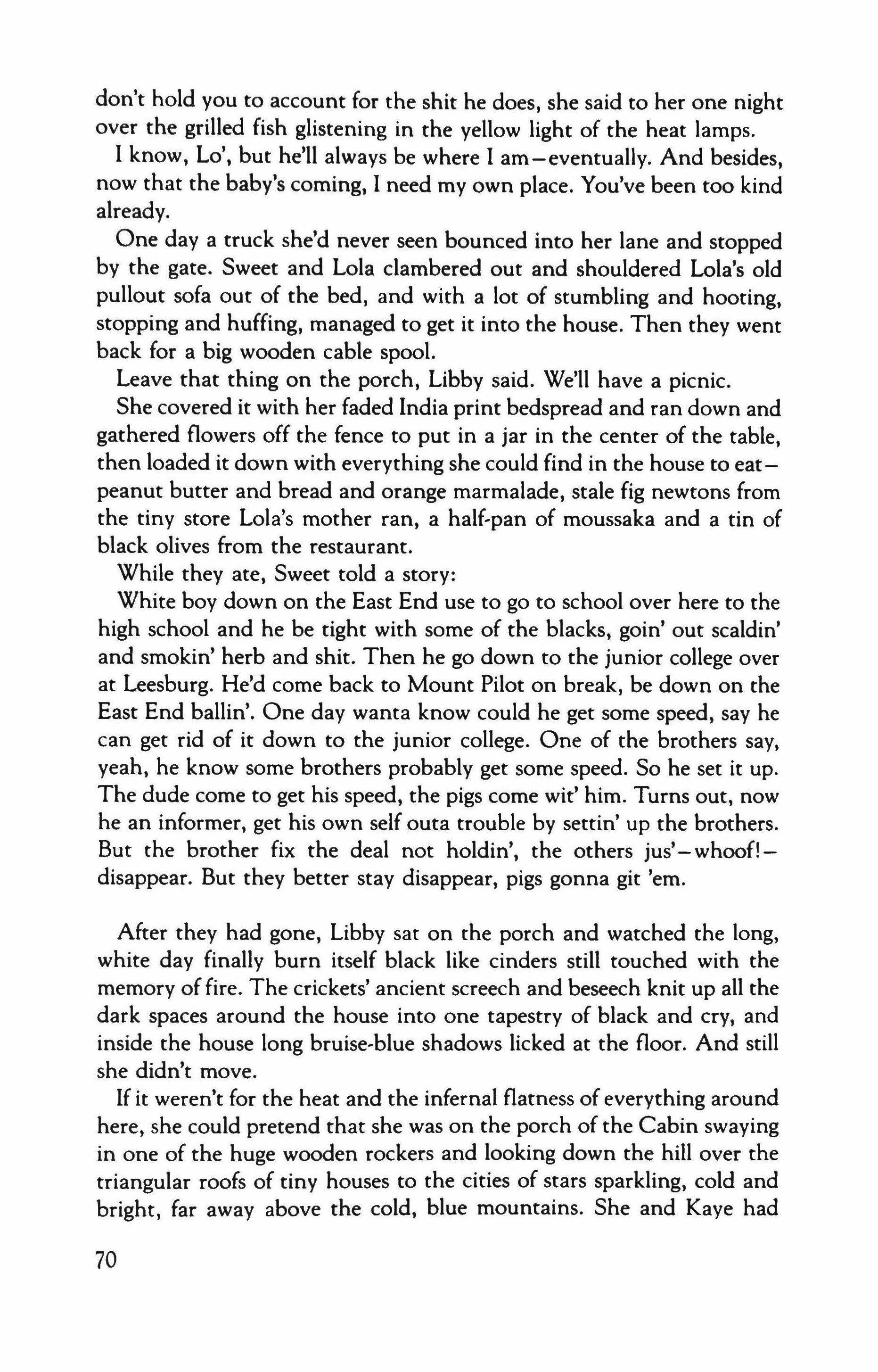
don't hold you to account for the shit he does, she said to her one night over the grilled fish glistening in the yellow light of the heat lamps. I know, La', but he'll always be where I am-eventually. And besides, now that the baby's coming, I need my own place. You've been too kind already.
One day a truck she'd never seen bounced into her lane and stopped by the gate. Sweet and Lola clambered out and shouldered Lola's old pullout sofa out of the bed, and with a lot of stumbling and hooting, stopping and huffing, managed to get it into the house. Then they went back for a big wooden cable spool.
Leave that thing on the porch, Libby said. We'll have a picnic.
She covered it with her faded India print bedspread and ran down and gathered flowers off the fence to put in a jar in the center of the table, then loaded it down with everything she could find in the house to eatpeanut butter and bread and orange marmalade, stale fig newtons from the tiny store Lola's mother ran, a half-pan of moussaka and a tin of black olives from the restaurant.
While they ate, Sweet told a story:
White boy down on the East End use to go to school over here to the high school and he be tight with some of the blacks, goin' out scaldin' and smokin' herb and shit. Then he go down to the junior college over at Leesburg. He'd come back to Mount Pilot on break, be down on the East End ballin'. One day wanta know could he get some speed, say he can get rid of it down to the junior college. One of the brothers say, yeah, he know some brothers probably get some speed. So he set it up. The dude come to get his speed, the pigs come wit' him. Turns out, now he an informer, get his own self outa trouble by settin' up the brothers. But the brother fix the deal not holdin', the others jus' - whoof!disappear. But they better stay disappear, pigs gonna git 'em.
After they had gone, Libby sat on the porch and watched the long, white day finally burn itself black like cinders still touched with the memory offire. The crickets' ancient screech and beseech knit up all the dark spaces around the house into one tapestry of black and cry, and inside the house long bruise-blue shadows licked at the floor. And still she didn't move.
If it weren't for the heat and the infernal flatness of everything around here, she could pretend that she was on the porch of the Cabin swaying in one of the huge wooden rockers and looking down the hill over the triangular roofs of tiny houses to the cities of stars sparkling, cold and bright, far away above the cold, blue mountains. She and Kaye had
70
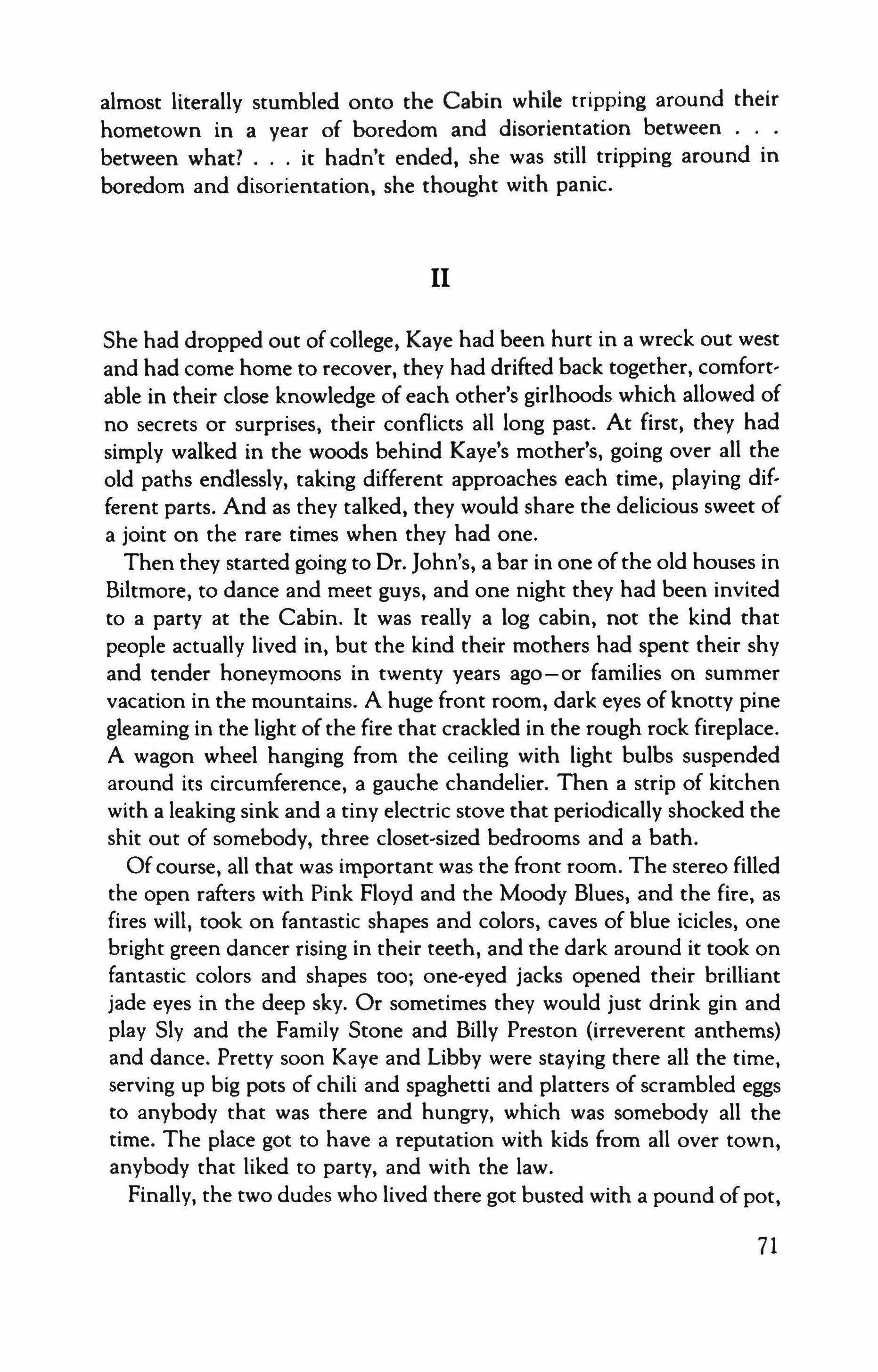
almost literally stumbled onto the Cabin while tripping around their hometown in a year of boredom and disorientation between between what? it hadn't ended, she was still tripping around in boredom and disorientation, she thought with panic.
II
She had dropped out of college, Kaye had been hurt in a wreck out west and had come home to recover, they had drifted back together, comfortable in their close knowledge of each other's girlhoods which allowed of no secrets or surprises, their conflicts all long past. At first, they had simply walked in the woods behind Kaye's mother's, going over all the old paths endlessly, taking different approaches each time, playing different parts. And as they talked, they would share the delicious sweet of a joint on the rare times when they had one.
Then they started going to Dr. John's, a bar in one ofthe old houses in Biltmore, to dance and meet guys, and one night they had been invited to a party at the Cabin. It was really a log cabin, not the kind that people actually lived in, but the kind their mothers had spent their shy and tender honeymoons in twenty years ago-or families on summer vacation in the mountains. A huge front room, dark eyes of knotty pine gleaming in the light of the fire that crackled in the rough rock fireplace. A wagon wheel hanging from the ceiling with light bulbs suspended around its circumference, a gauche chandelier. Then a strip of kitchen with a leaking sink and a tiny electric stove that periodically shocked the shit out of somebody, three closet-sized bedrooms and a bath.
Of course, all that was important was the front room. The stereo filled the open rafters with Pink Floyd and the Moody Blues, and the fire, as fires will, took on fantastic shapes and colors, caves of blue icicles, one bright green dancer rising in their teeth, and the dark around it took on fantastic colors and shapes tOOj one-eyed jacks opened their brilliant jade eyes in the deep sky. Or sometimes they would just drink gin and play Sly and the Family Stone and Billy Preston (irreverent anthems) and dance. Pretty soon Kaye and Libby were staying there all the time, serving up big pots of chili and spaghetti and platters of scrambled eggs to anybody that was there and hungry, which was somebody all the time. The place got to have a reputation with kids from all over town, anybody that liked to party, and with the law.
Finally, the two dudes who lived there got busted with a pound of pot,
71
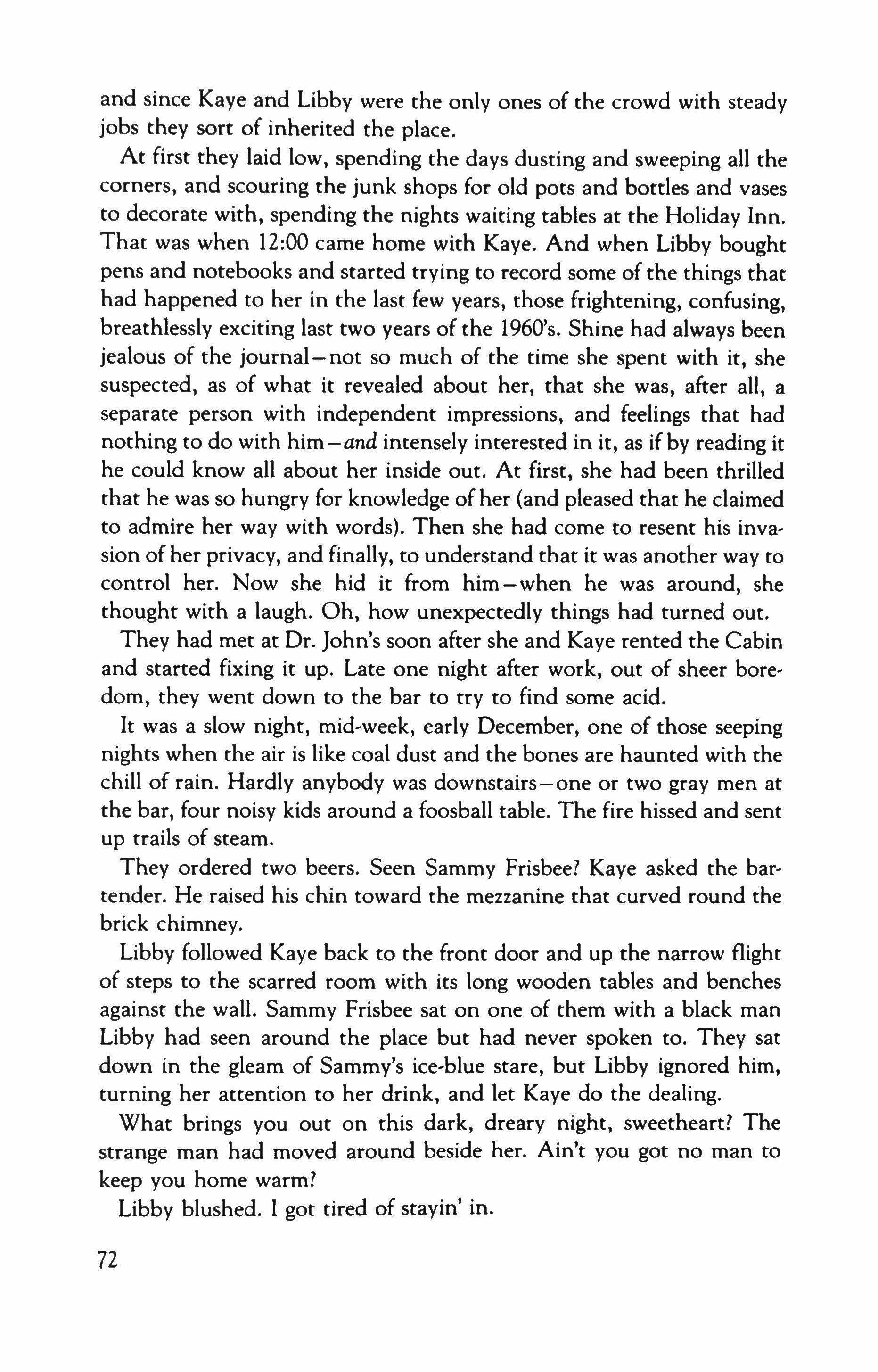
and since Kaye and Libby were the only ones of the crowd with steady jobs they sort of inherited the place.
At first they laid low, spending the days dusting and sweeping all the corners, and scouring the junk shops for old pots and bottles and vases to decorate with, spending the nights waiting tables at the Holiday Inn. That was when 12:00 came home with Kaye. And when Libby bought pens and notebooks and started trying to record some of the things that had happened to her in the last few years, those frightening, confusing, breathlessly exciting last two years of the 1960's. Shine had always been jealous of the journal- not so much of the time she spent with it, she suspected, as of what it revealed about her, that she was, after all, a separate person with independent impressions, and feelings that had nothing to do with him -and intensely interested in it, as if by reading it he could know all about her inside out. At first, she had been thrilled that he was so hungry for knowledge of her (and pleased that he claimed to admire her way with words). Then she had come to resent his invasion of her privacy, and finally, to understand that it was another way to control her. Now she hid it from him-when he was around, she thought with a laugh. Oh, how unexpectedly things had turned out. They had met at Dr. John's soon after she and Kaye rented the Cabin and started fixing it up. Late one night after work, out of sheer boredom, they went down to the bar to try to find some acid.
It was a slow night, mid-week, early December, one of those seeping nights when the air is like coal dust and the bones are haunted with the chill of rain. Hardly anybody was downstairs-one or two gray men at the bar, four noisy kids around a foosball table. The fire hissed and sent up trails of steam.
They ordered two beers. Seen Sammy Frisbee? Kaye asked the bartender. He raised his chin toward the mezzanine that curved round the brick chimney.
Libby followed Kaye back to the front door and up the narrow flight of steps to the scarred room with its long wooden tables and benches against the wall. Sammy Frisbee sat on one of them with a black man Libby had seen around the place but had never spoken to. They sat down in the gleam of Sammy's ice-blue stare, but Libby ignored him, turning her attention to her drink, and let Kaye do the dealing. What brings you out on this dark, dreary night, sweetheart? The strange man had moved around beside her. Ain't you got no man to keep you home warm?
Libby blushed. I got tired of stayin' in.
72

Pretty gal like you don't need to be in, unless it's wit' her man. Need to be out where you can be seen.
You see me.
Un-huh, now I do. Ain't seen you around lately. I thought maybe you was honeymoonin'.
The direct way he approached her stunned Libby, but only a little. He and Sammy rode back to the Cabin with them, his hand lightly touching her leg all the way up the dark hill.
The four of them sat in a circle in front of the fire, passing a bottle and laughing until even Sammy's snarl softened and he lay his dark, curly head in Kaye's lap. Libby couldn't take her eyes off Shine, who constantly moved and gestured with his rough, short-fingered hands. The dancing firelight caused the satiny darkness of his skin to glimmer, and he seemed to her to throb with life and music. When the conversation turned, as it always did, to the war and she learned that he had been there, she drew even closer to him, eyes and ears wide, eager to hear him talk about it.
They got some hell uh fire drugs over there. Make you think you nuts. Me and my partner Spirit usta to go down to this little house in the village all the time, real old woman live there, but she be havin' everything-reefah, hash, ha'ron, opium, you name it. Once we was down there, had did some of that 0'1 brown ha'ron, been smokin' some 0'. We was bent. In come this old man, start talking to her in that high, fast voice they got, you know, and waving his hands and shit. Seem like he excited, keep on gettin' faster and faster. Me and Spirit start lookin' at each other, thinking, this mo'fucker the VC, workin' for the military police or what? Then the lady went through this bamboo curtain she had hanging there and we scared, 'bout ready to bolt. And she come back with some incense, give it to the old dude, he give her some coins and go on. Turns out, his kid had died and he'd come to get incense for the funeral.
He laughed, Boy, was we bent, laughed again, shook his head. They was funny people, slick, built tunnels everywhere, like ants. Whole camps 'd be destroyed, not a bomb dropped. Mo'fuckers coming up out the ground. They could make weapons out anything, even our trash. We'd find grenades made out of Coke bottles we threw away. But they had to do that on account they didn't have nothin'. Like the niggers, had to make do. Probably barbecue that damn cat you got.
She and Kaye were rarely alone after that night. Shine was at the Cabin almost all the time and Sammy less often. Sometimes the two men worked odd jobs for Manpower, but most of the time they just
73
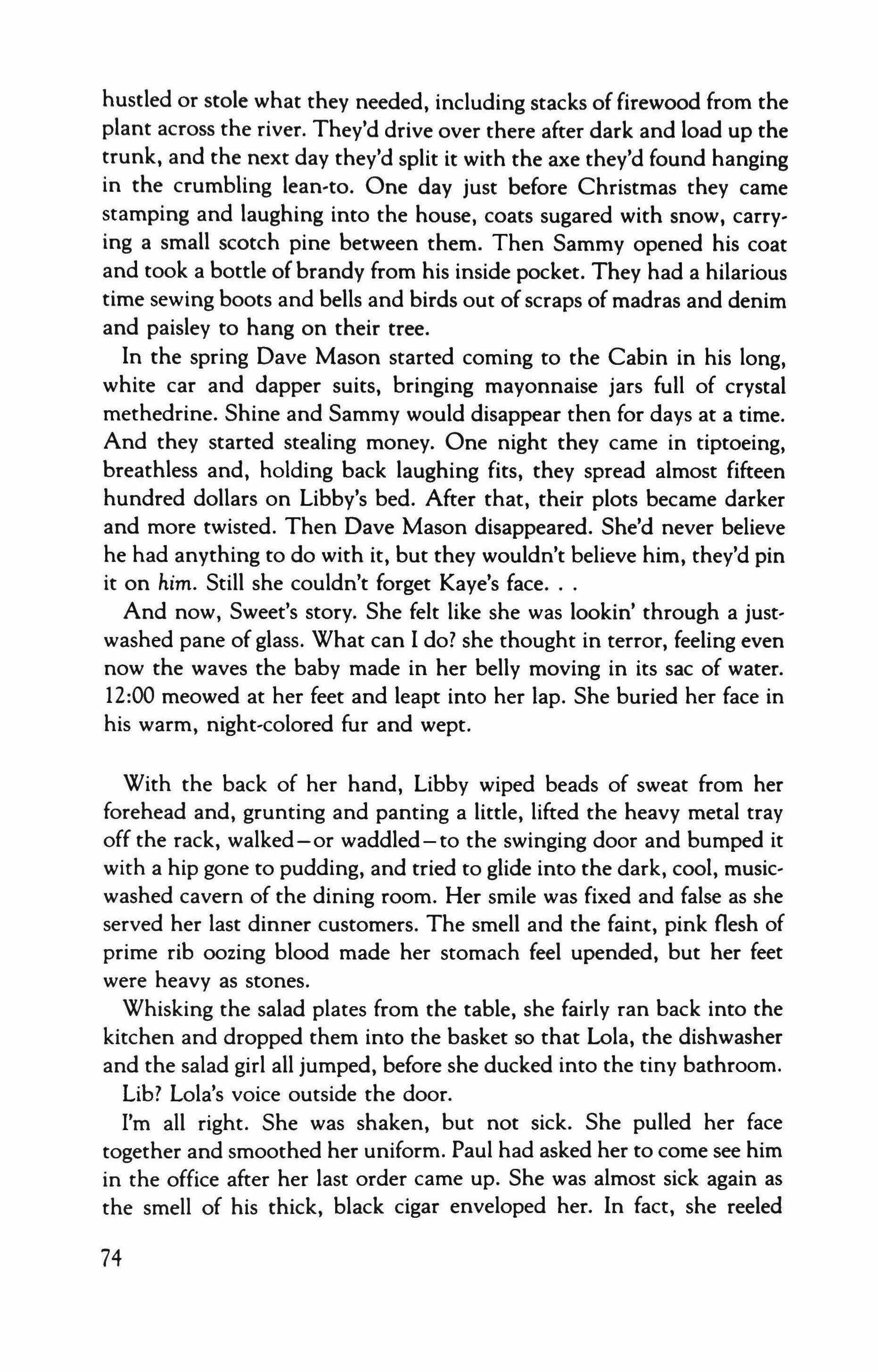
hustled or stole what they needed, including stacks of firewood from the plant across the river. They'd drive over there after dark and load up the trunk, and the next day they'd split it with the axe they'd found hanging in the crumbling lean-to. One day just before Christmas they came stamping and laughing into the house, coats sugared with snow, carrying a small scotch pine between them. Then Sammy opened his coat and took a bottle of brandy from his inside pocket. They had a hilarious time sewing boots and bells and birds out of scraps of madras and denim and paisley to hang on their tree.
In the spring Dave Mason started coming to the Cabin in his long, white car and dapper suits, bringing mayonnaise jars full of crystal methedrine. Shine and Sammy would disappear then for days at a time. And they started stealing money. One night they came in tiptoeing, breathless and, holding back laughing fits, they spread almost fifteen hundred dollars on Libby's bed. After that, their plots became darker and more twisted. Then Dave Mason disappeared. She'd never believe he had anything to do with it, but they wouldn't believe him, they'd pin it on him. Still she couldn't forget Kaye's face
And now, Sweet's story. She felt like she was lookin' through a justwashed pane of glass. What can I do? she thought in terror, feeling even now the waves the baby made in her belly moving in its sac of water. 12:00 meowed at her feet and leapt into her lap. She buried her face in his warm, night-colored fur and wept.
With the back of her hand, Libby wiped beads of sweat from her forehead and, grunting and panting a little, lifted the heavy metal tray off the rack, walked-or waddled-to the swinging door and bumped it with a hip gone to pudding, and tried to glide into the dark, cool, musicwashed cavern of the dining room. Her smile was fixed and false as she served her last dinner customers. The smell and the faint, pink flesh of prime rib oozing blood made her stomach feel upended, but her feet were heavy as stones.
Whisking the salad plates from the table, she fairly ran back into the kitchen and dropped them into the basket so that Lola, the dishwasher and the salad girl all jumped, before she ducked into the tiny bathroom. Lib? Lola's voice outside the door.
I'm all right. She was shaken, but not sick. She pulled her face together and smoothed her uniform. Paul had asked her to come see him in the office after her last order came up. She was almost sick again as the smell of his thick, black cigar enveloped her. In fact, she reeled
74
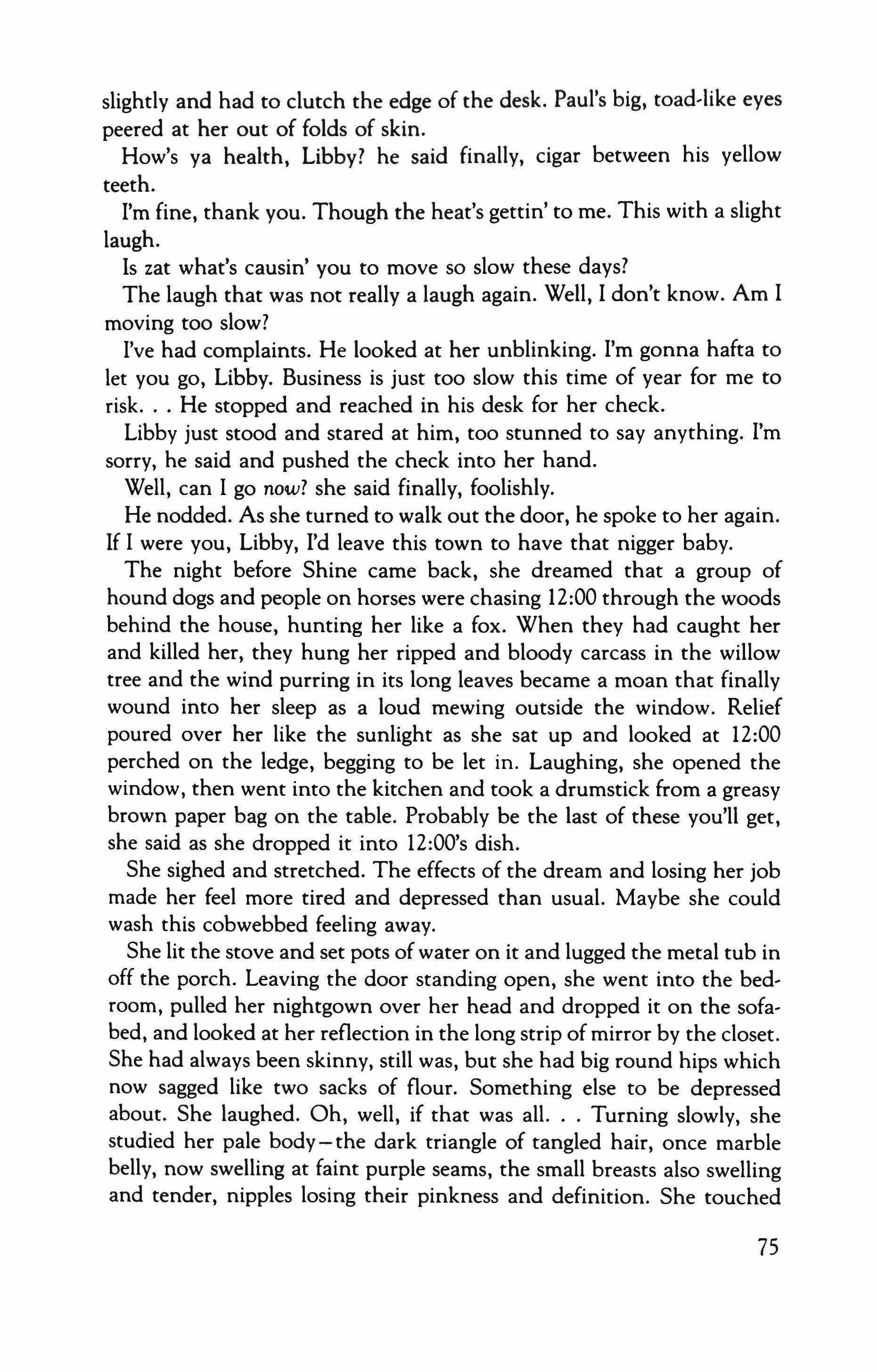
slightly and had to clutch the edge of the desk. Paul's big, toad-like eyes peered at her out of folds of skin.
How's ya health, Libby? he said finally, cigar between his yellow teeth.
I'm fine, thank you. Though the heat's gettin' to me. This with a slight laugh.
Is zat what's causin' you to move so slow these days?
The laugh that was not really a laugh again. Well, I don't know. Am I moving too slow?
I've had complaints. He looked at her unblinking. I'm gonna hafta to let you go, Libby. Business is just too slow this time of year for me to risk. He stopped and reached in his desk for her check.
Libby just stood and stared at him, too stunned to say anything. I'm sorry, he said and pushed the check into her hand.
Well, can I go now? she said finally, foolishly.
He nodded. As she turned to walk out the door, he spoke to her again. If I were you, Libby, I'd leave this town to have that nigger baby.
The night before Shine came back, she dreamed that a group of hound dogs and people on horses were chasing 12:00 through the woods behind the house, hunting her like a fox. When they had caught her and killed her, they hung her ripped and bloody carcass in the willow tree and the wind purring in its long leaves became a moan that finally wound into her sleep as a loud mewing outside the window. Relief poured over her like the sunlight as she sat up and looked at 12:00 perched on the ledge, begging to be let in. Laughing, she opened the window, then went into the kitchen and took a drumstick from a greasy brown paper bag on the table. Probably be the last of these you'll get, she said as she dropped it into 12:00's dish.
She sighed and stretched. The effects of the dream and losing her job made her feel more tired and depressed than usual. Maybe she could wash this cobwebbed feeling away.
She lit the stove and set pots of water on it and lugged the metal tub in off the porch. Leaving the door standing open, she went into the bedroom, pulled her nightgown over her head and dropped it on the sofabed, and looked at her reflection in the long strip of mirror by the closet. She had always been skinny, still was, but she had big round hips which now sagged like two sacks of flour. Something else to be depressed about. She laughed. Oh, well, if that was all Turning slowly, she studied her pale body-the dark triangle of tangled hair, once marble belly, now swelling at faint purple seams, the small breasts also swelling and tender, nipples losing their pinkness and definition. She touched
75
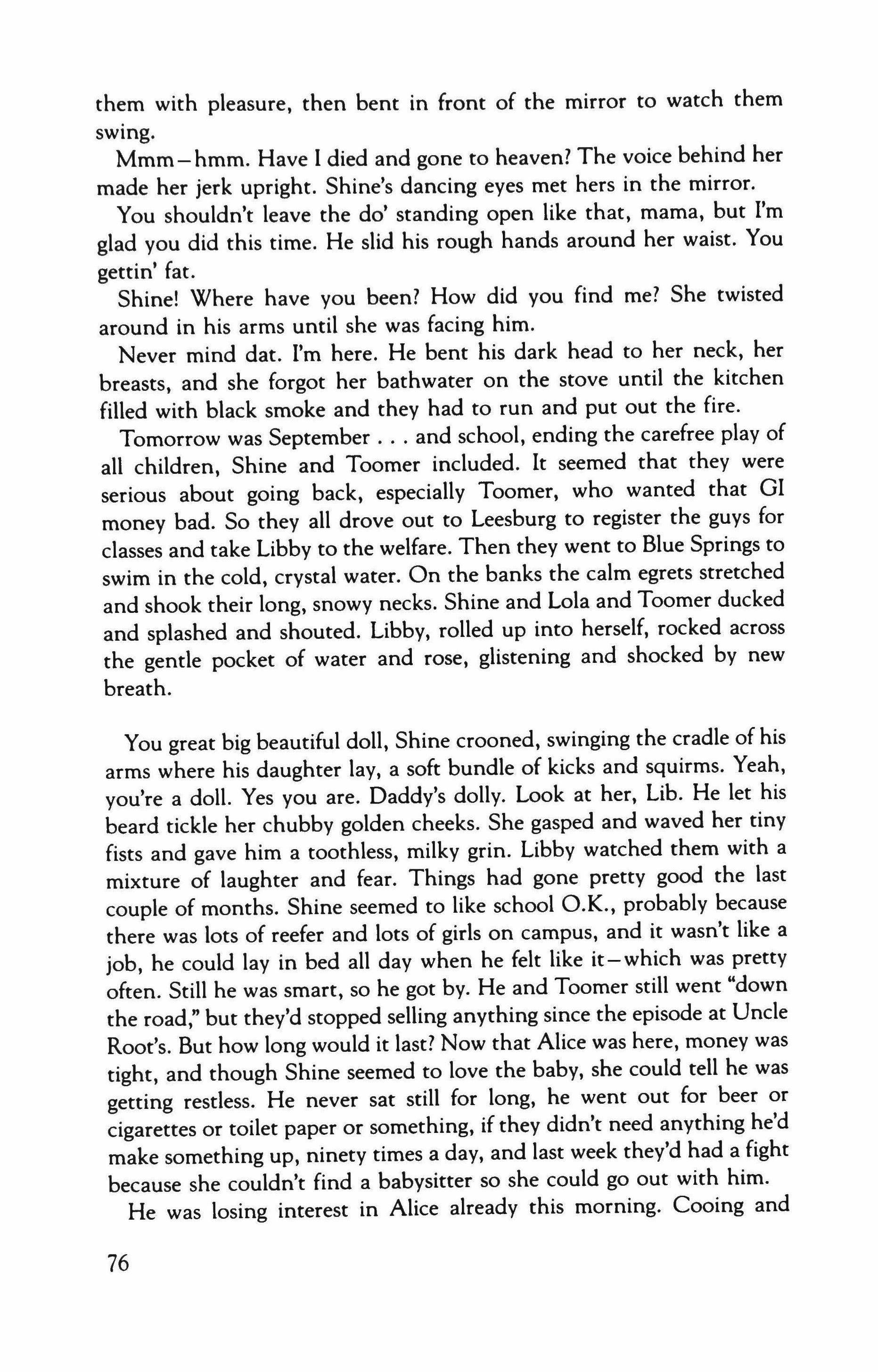
them with pleasure, then bent in front of the mirror to watch them swing.
Mmm - hmm. Have I died and gone to heaven? The voice behind her made her jerk upright. Shine's dancing eyes met hers in the mirror.
You shouldn't leave the do' standing open like that, mama, but I'm glad you did this time. He slid his rough hands around her waist. You gettin' fat.
Shine! Where have you been? How did you find me? She twisted around in his arms until she was facing him.
Never mind dar. I'm here. He bent his dark head to her neck, her breasts, and she forgot her bathwater on the stove until the kitchen filled with black smoke and they had to run and put out the fire.
Tomorrow was September and school, ending the carefree play of all children, Shine and Toomer included. It seemed that they were serious about going back, especially Toomer, who wanted that GI money bad. So they all drove out to Leesburg to register the guys for classes and take Libby to the welfare. Then they went to Blue Springs to swim in the cold, crystal water. On the banks the calm egrets stretched and shook their long, snowy necks. Shine and Lola and Toomer ducked and splashed and shouted. Libby, rolled up into herself, rocked across the gentle pocket of water and rose, glistening and shocked by new breath.
You great big beautiful doll, Shine crooned, swinging the cradle of his arms where his daughter lay, a soft bundle of kicks and squirms. Yeah, you're a doll. Yes you are. Daddy's dolly. Look at her, Lib. He let his beard tickle her chubby golden cheeks. She gasped and waved her tiny fists and gave him a toothless, milky grin. Libby watched them with a mixture of laughter and fear. Things had gone pretty good the last couple of months. Shine seemed to like school O.K., probably because there was lots of reefer and lots of girls on campus, and it wasn't like a job, he could lay in bed all day when he felt like it - which was pretty often. Still he was smart, so he got by. He and Toomer still went "down the road," but they'd stopped selling anything since the episode at Uncle Root's. But how long would it last? Now that Alice was here, money was tight, and though Shine seemed to love the baby, she could tell he was getting restless. He never sat still for long, he went out for beer or cigarettes or toilet paper or something, if they didn't need anything he'd make something up, ninety times a day, and last week they'd had a fight because she couldn't find a babysitter so she could go out with him.
He was losing interest in Alice already this morning. Cooing and
76
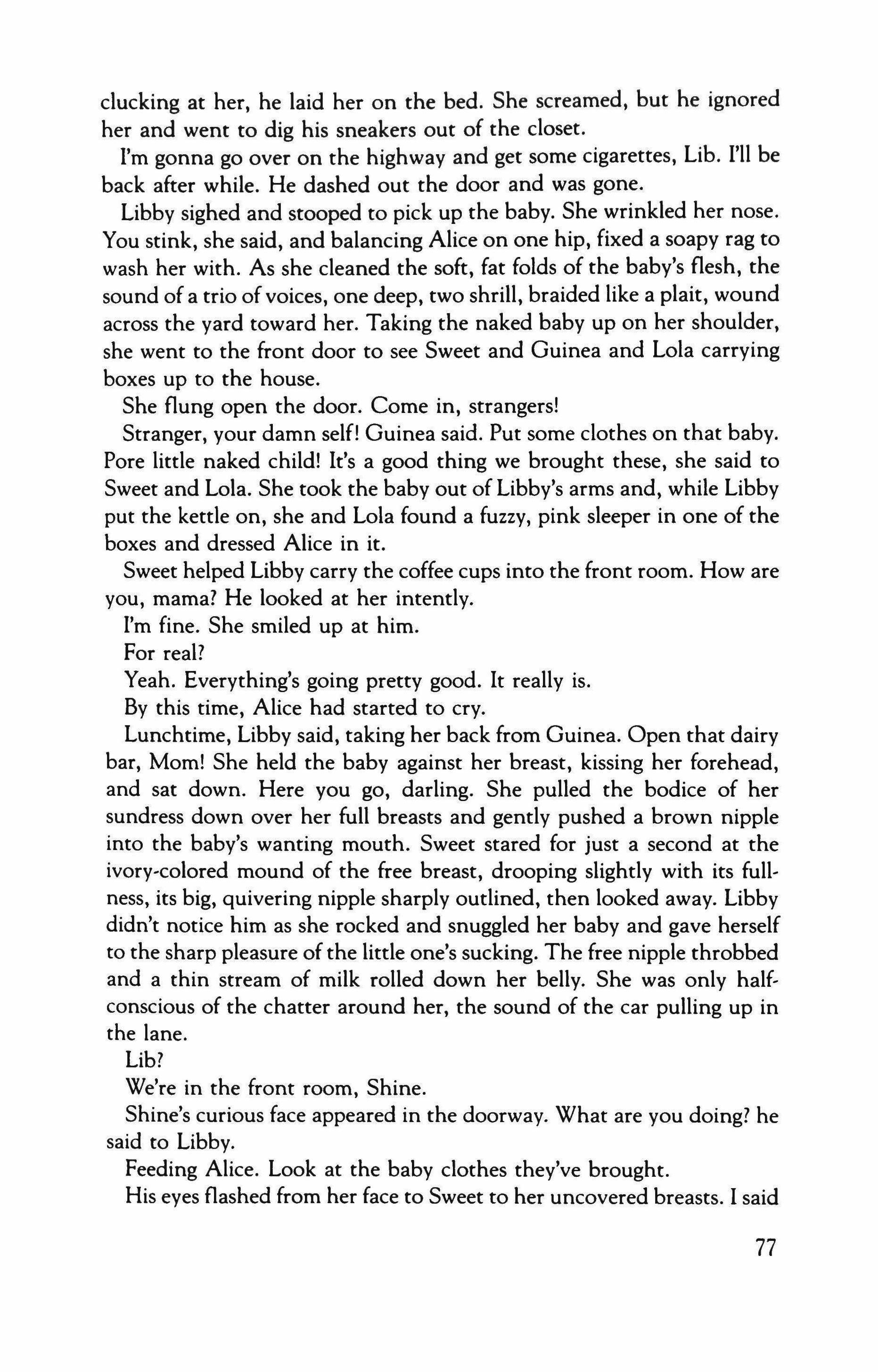
clucking at her, he laid her on the bed. She screamed, but he ignored her and went to dig his sneakers out of the closet.
I'm gonna go over on the highway and get some cigarettes, Lib. I'll be back after while. He dashed out the door and was gone.
Libby sighed and stooped to pick up the baby. She wrinkled her nose. You stink, she said, and balancing Alice on one hip, fixed a soapy rag to wash her with. As she cleaned the soft, fat folds of the baby's flesh, the sound of a trio ofvoices, one deep, two shrill, braided like a plait, wound across the yard toward her. Taking the naked baby up on her shoulder, she went to the front door to see Sweet and Guinea and Lola carrying boxes up to the house.
She flung open the door. Come in, strangers!
Stranger, your damn self! Guinea said. Put some clothes on that baby. Pore little naked child! It's a good thing we brought these, she said to Sweet and Lola. She took the baby out of Libby's arms and, while Libby put the kettle on, she and Lola found a fuzzy, pink sleeper in one of the boxes and dressed Alice in it.
Sweet helped Libby carry the coffee cups into the front room. How are you, mama? He looked at her intently.
I'm fine. She smiled up at him.
For real?
Yeah. Everything's going pretty good. It really is. By this time, Alice had started to cry.
Lunchtime, Libby said, taking her back from Guinea. Open that dairy bar, Mom! She held the baby against her breast, kissing her forehead, and sat down. Here you go, darling. She pulled the bodice of her sundress down over her full breasts and gently pushed a brown nipple into the baby's wanting mouth. Sweet stared for just a second at the ivory-colored mound of the free breast, drooping slightly with its fullness, its big, quivering nipple sharply outlined, then looked away. Libby didn't notice him as she rocked and snuggled her baby and gave herself to the sharp pleasure of the little one's sucking. The free nipple throbbed and a thin stream of milk rolled down her belly. She was only halfconscious of the chatter around her, the sound of the car pulling up in the lane.
Lib?
We're in the front room, Shine. Shine's curious face appeared in the doorway. What are you doing? he said to Libby.
Feeding Alice. Look at the baby clothes they've brought. His eyes flashed from her face to Sweet to her uncovered breasts. I said
77
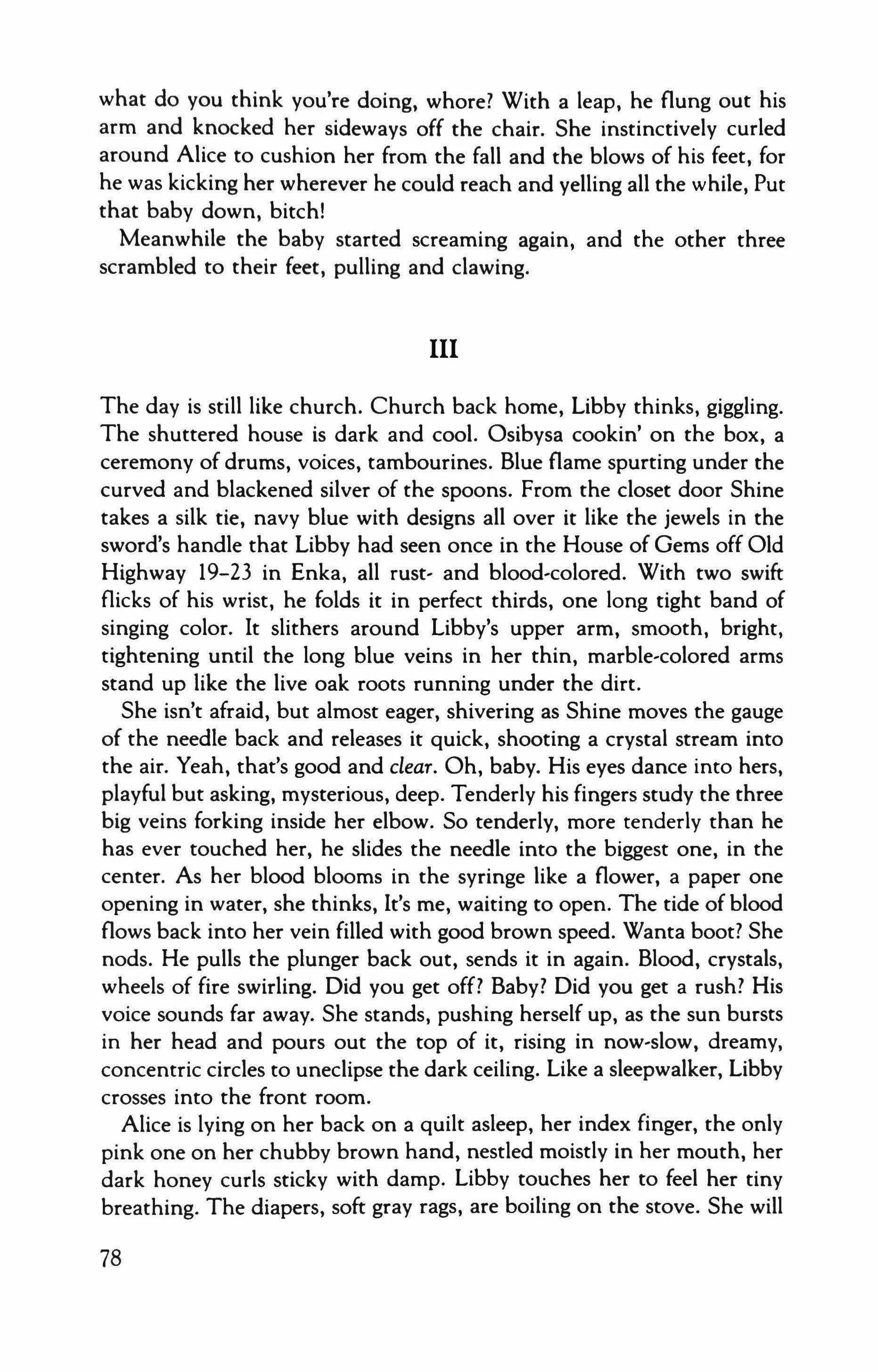
what do you think you're doing, whore? With a leap, he flung out his arm and knocked her sideways off the chair. She instinctively curled around Alice to cushion her from the fall and the blows of his feet, for he was kicking her wherever he could reach and yelling all the while, Put that baby down, bitch!
Meanwhile the baby started screaming again, and the other three scrambled to their feet, pulling and clawing.
III
The day is still like church. Church back home, Libby thinks, giggling. The shuttered house is dark and cool. Osibysa cookin' on the box, a ceremony of drums, voices, tambourines. Blue flame spurting under the curved and blackened silver of the spoons. From the closet door Shine takes a silk tie, navy blue with designs all over it like the jewels in the sword's handle that Libby had seen once in the House of Gems off Old Highway 19-23 in Enka, all rust, and blood-colored. With two swift flicks of his wrist, he folds it in perfect thirds, one long tight band of singing color. It slithers around Libby's upper arm, smooth, bright, tightening until the long blue veins in her thin, marble-colored arms stand up like the live oak roots running under the dirt.
She isn't afraid, but almost eager, shivering as Shine moves the gauge of the needle back and releases it quick, shooting a crystal stream into the air. Yeah, that's good and clear. Oh, baby. His eyes dance into hers, playful but asking, mysterious, deep. Tenderly his fingers study the three big veins forking inside her elbow. So tenderly, more tenderly than he has ever touched her, he slides the needle into the biggest one, in the center. As her blood blooms in the syringe like a flower, a paper one opening in water, she thinks, It's me, waiting to open. The tide of blood flows back into her vein filled with good brown speed. Wanta boot? She nods. He pulls the plunger back out, sends it in again. Blood, crystals, wheels of fire swirling. Did you get off? Baby? Did you get a rush? His voice sounds far away. She stands, pushing herself up, as the sun bursts in her head and pours out the top of it, rising in now-slow, dreamy, concentric circles to uneclipse the dark ceiling. Like a sleepwalker, Libby crosses into the front room.
Alice is lying on her back on a quilt asleep, her index finger, the only pink one on her chubby brown hand, nestled moistly in her mouth, her dark honey curls sticky with damp. Libby touches her to feel her tiny breathing. The diapers, soft gray rags, are boiling on the stove. She will
78
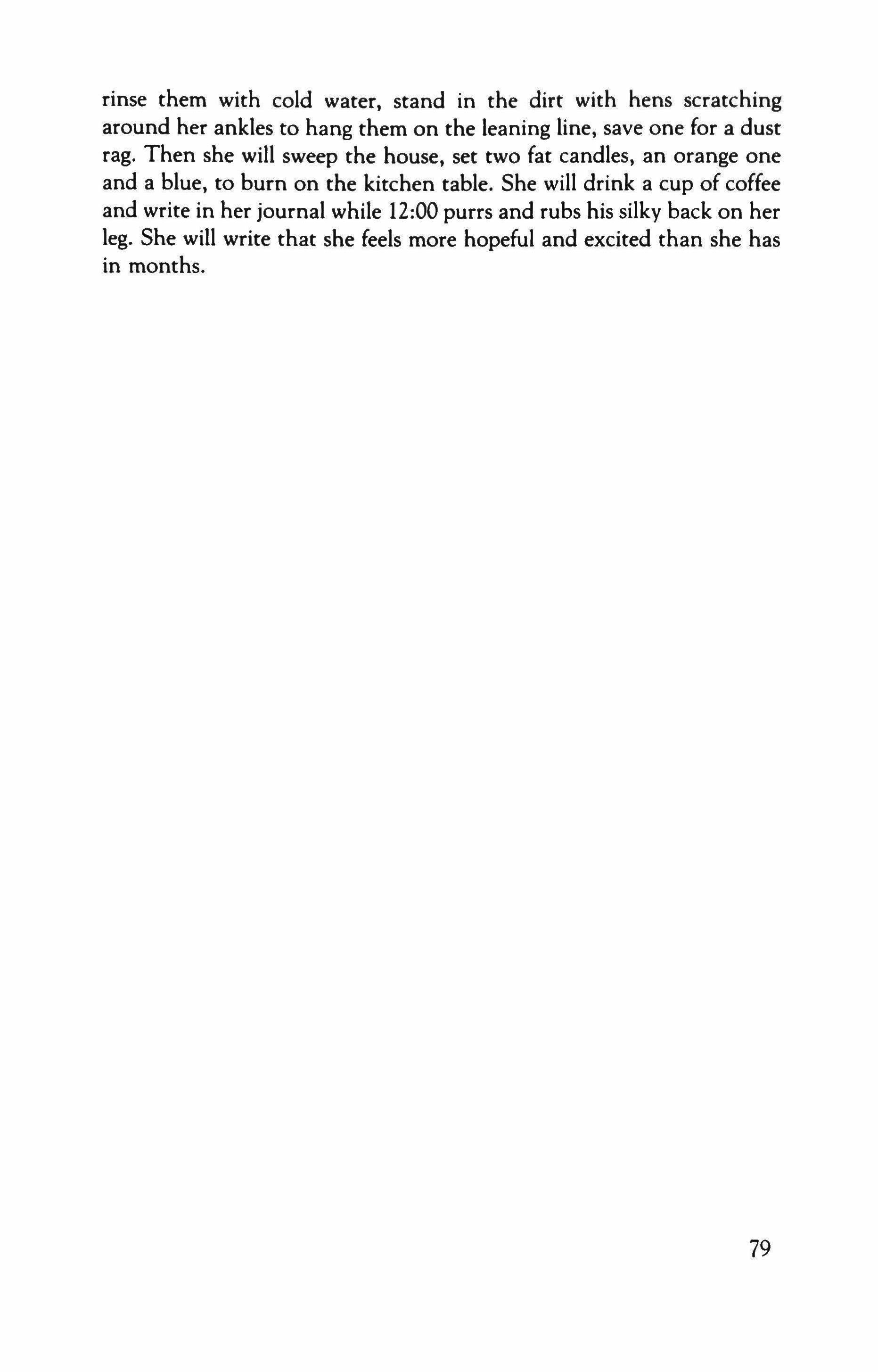
rinse them with cold water, stand in the dirt with hens scratching around her ankles to hang them on the leaning line, save one for a dust rag. Then she will sweep the house, set two fat candles, an orange one and a blue, to burn on the kitchen table. She will drink a cup of coffee and write in her journal while 12:00 purrs and rubs his silky back on her leg. She will write that she feels more hopeful and excited than she has in months.
79

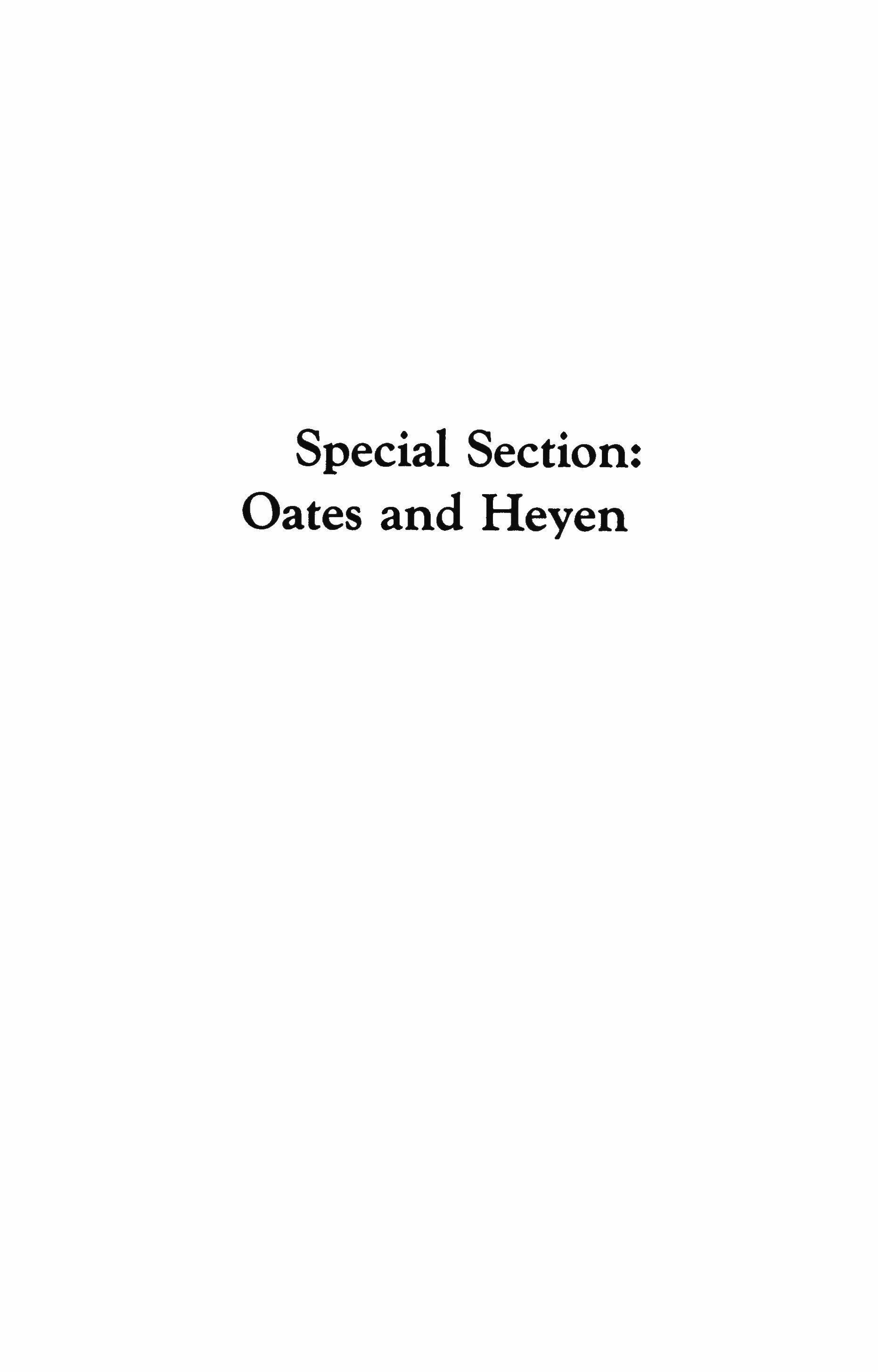
Special
Section: Oates and Heyen
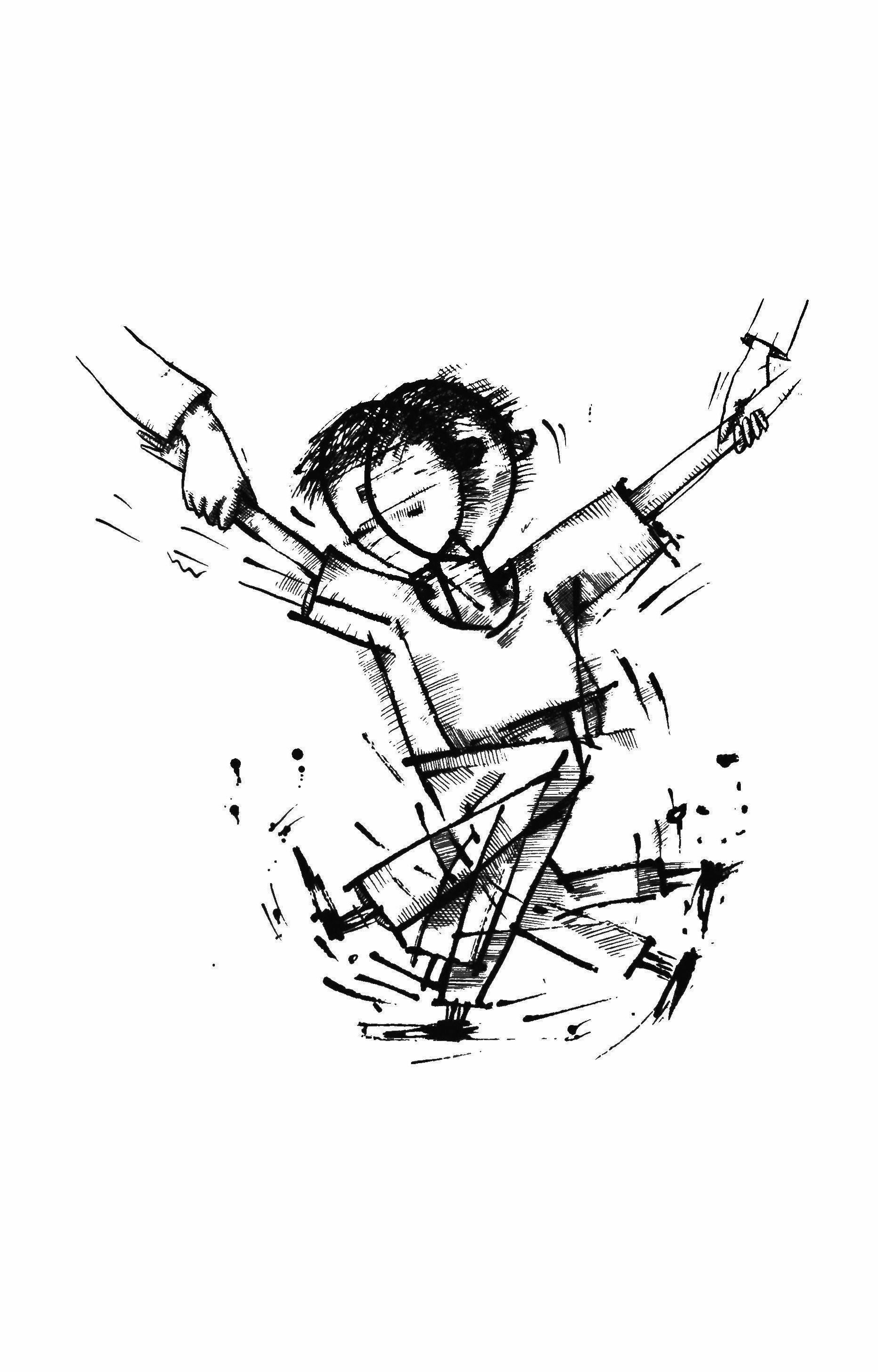
, ., • � •
Visitation Rights
Joyce Carol Oates
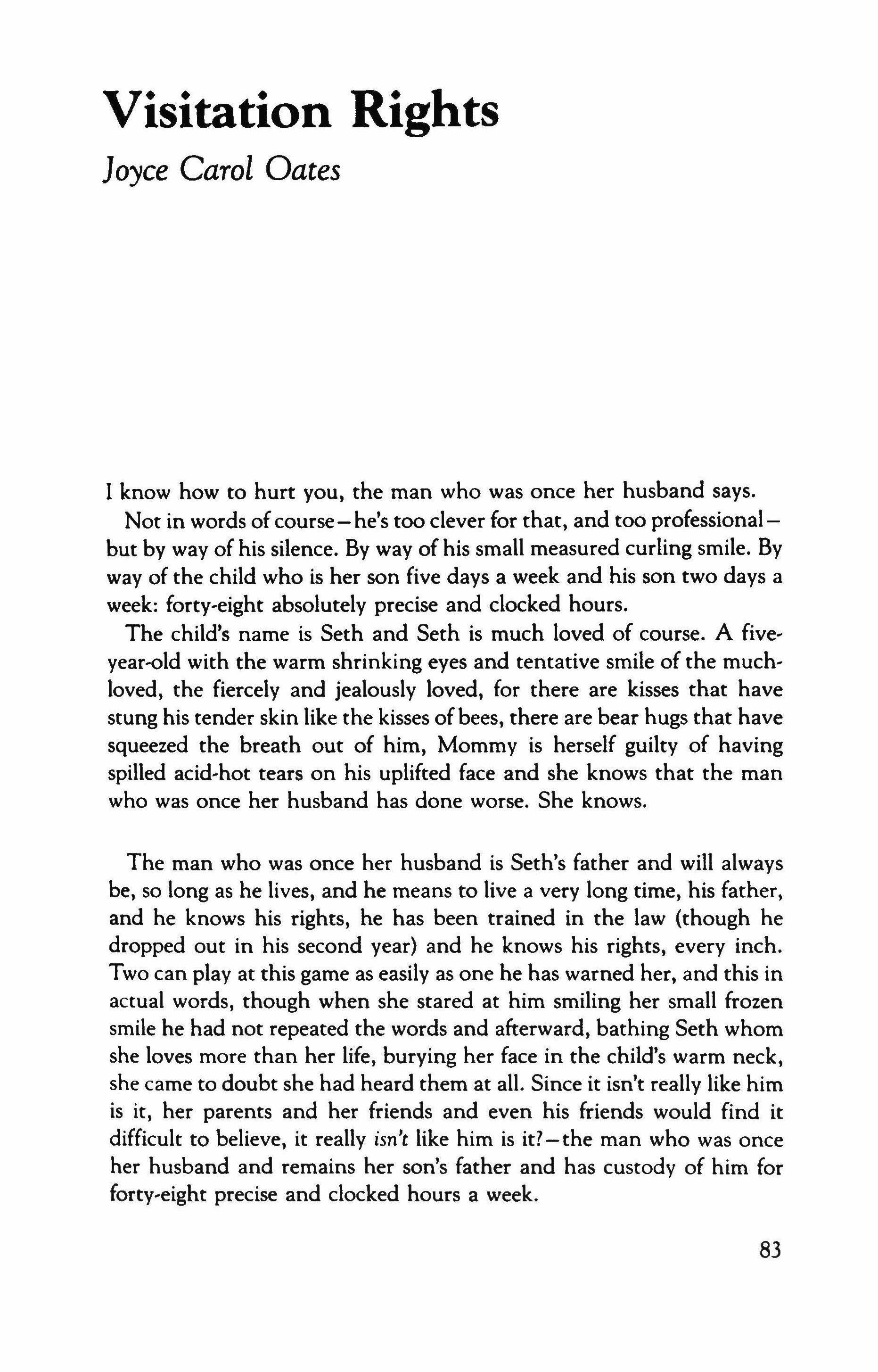
I know how to hurt you, the man who was once her husband says. Not in words of course - he's too clever for that, and too professionalbut by way of his silence. By way of his small measured curling smile. By way of the child who is her son five days a week and his son two days a week: forty-eight absolutely precise and clocked hours.
The child's name is Seth and Seth is much loved of course. A fiveyear-old with the warm shrinking eyes and tentative smile of the muchloved, the fiercely and jealously loved, for there are kisses that have stung his tender skin like the kisses ofbees, there are bear hugs that have squeezed the breath out of him, Mommy is herself guilty of having spilled acid-hot tears on his uplifted face and she knows that the man who was once her husband has done worse. She knows.
The man who was once her husband is Seth's father and will always be, so long as he lives, and he means to live a very long time, his father, and he knows his rights, he has been trained in the law (though he dropped out in his second year) and he knows his rights, every inch. Two can play at this game as easily as one he has warned her, and this in actual words, though when she stared at him smiling her small frozen smile he had not repeated the words and afterward, bathing Seth whom she loves more than her life, burying her face in the child's warm neck, she came to doubt she had heard them at all. Since it isn't really like him is it, her parents and her friends and even his friends would find it difficult to believe, it really isn't like him is it?-the man who was once her husband and remains her son's father and has custody of him for forty-eight precise and clocked hours a week.
83
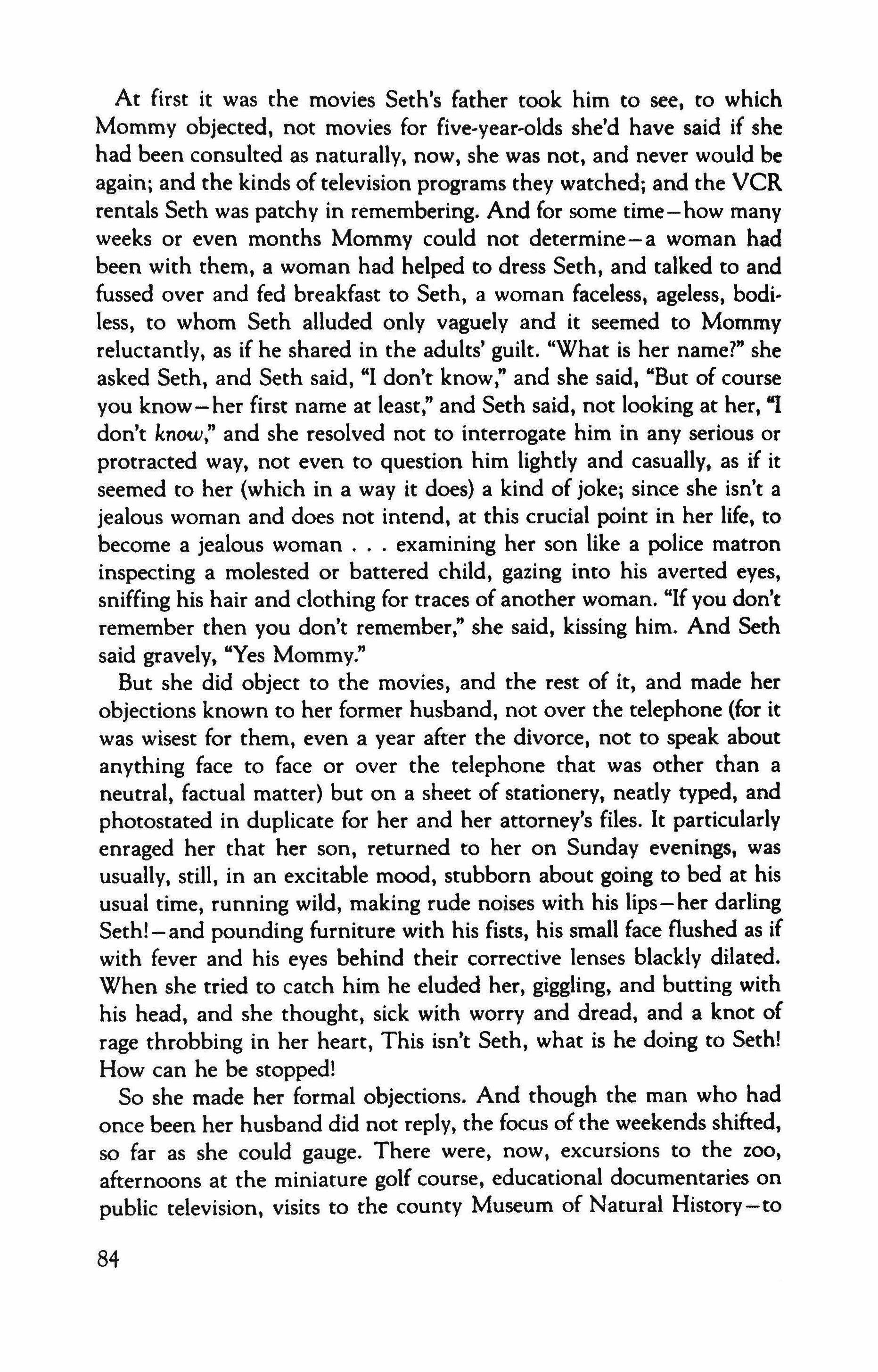
At first it was the movies Seth's father took him to see, to which Mommy objected, not movies for five-vear-olds she'd have said if she had been consulted as naturally, now, she was not, and never would be again; and the kinds of television programs they watched; and the VCR rentals Seth was patchy in remembering. And for some time-how many weeks or even months Mommy could not determine-a woman had been with them, a woman had helped to dress Seth, and talked to and fussed over and fed breakfast to Seth, a woman faceless, ageless, bodiless, to whom Seth alluded only vaguely and it seemed to Mommy reluctantly, as if he shared in the adults' guilt. "What is her name?" she asked Seth, and Seth said, "I don't know," and she said, "But of course you know-her first name at least," and Seth said, not looking at her, "I don't know," and she resolved not to interrogate him in any serious or protracted way, not even to question him lightly and casually, as if it seemed to her {which in a way it does} a kind of joke; since she isn't a jealous woman and does not intend, at this crucial point in her life, to become a jealous woman examining her son like a police matron inspecting a molested or battered child, gazing into his averted eyes, sniffing his hair and clothing for traces of another woman. "If you don't remember then you don't remember," she said, kissing him. And Seth said gravely, "Yes Mommy."
But she did object to the movies, and the rest of it, and made her objections known to her former husband, not over the telephone {for it was wisest for them, even a year after the divorce, not to speak about anything face to face or over the telephone that was other than a neutral, factual matter} but on a sheet of stationery, neatly typed, and photostated in duplicate for her and her attorney's files. It particularly enraged her that her son, returned to her on Sunday evenings, was usually, still, in an excitable mood, stubborn about going to bed at his usual time, running wild, making rude noises with his lips-her darling Seth! - and pounding furniture with his fists, his small face flushed as if with fever and his eyes behind their corrective lenses blackly dilated. When she tried to catch him he eluded her, giggling, and butting with his head, and she thought, sick with worry and dread, and a knot of rage throbbing in her heart, This isn't Seth, what is he doing to Seth! How can he be stopped!
So she made her formal objections. And though the man who had once been her husband did not reply, the focus of the weekends shifted, so far as she could gauge. There were, now, excursions to the zoo, afternoons at the miniature golf course, educational documentaries on public television, visits to the county Museum of Natural History-to
84
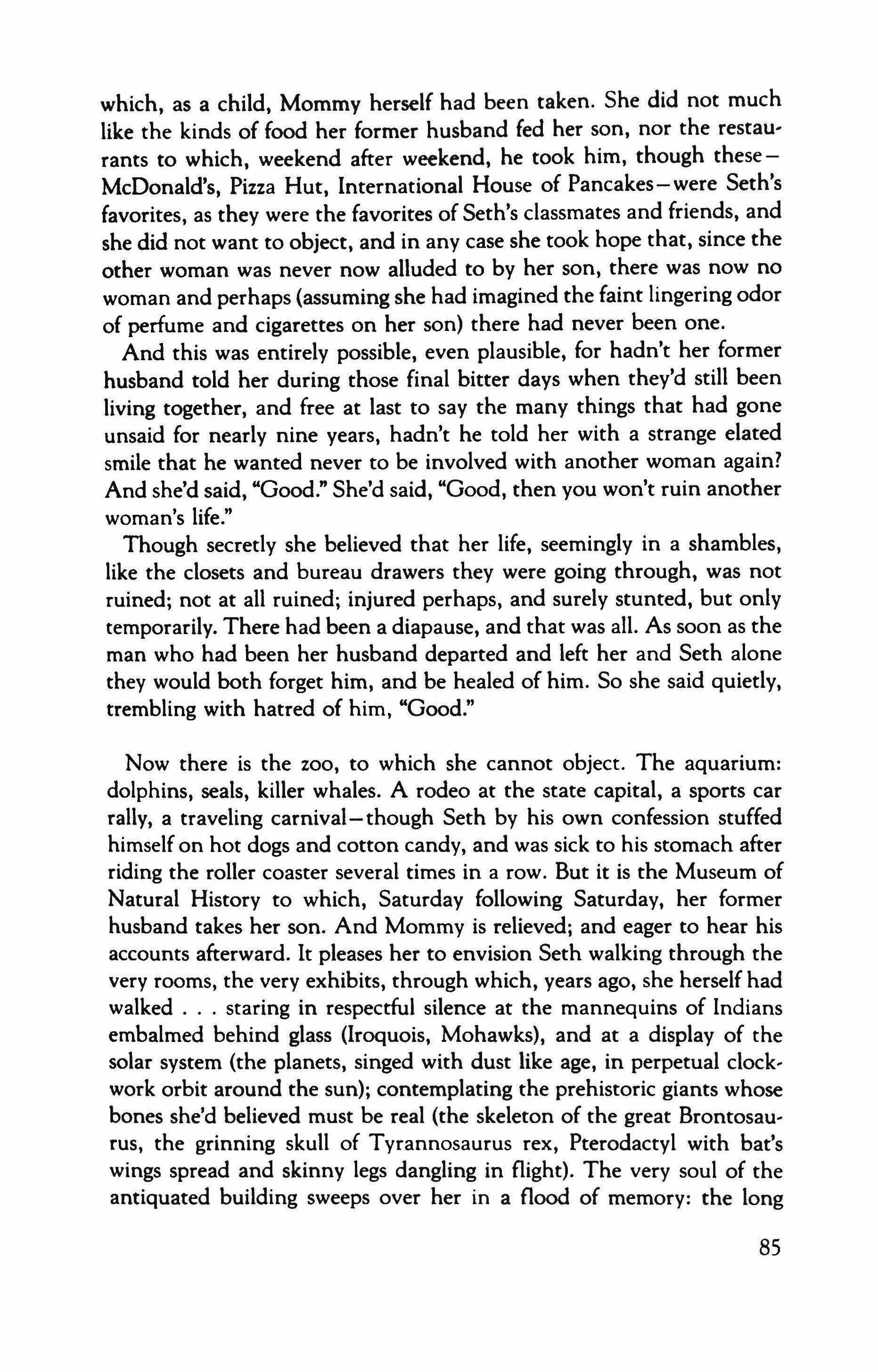
which, as a child, Mommy herself had been taken. She did not much like the kinds of food her former husband fed her son, nor the restaurants to which, weekend after weekend, he took him, though theseMcDonald's, Pizza Hut, International House of Pancakes-were Seth's favorites, as they were the favorites of Seth's classmates and friends, and she did not want to object, and in any case she took hope that, since the other woman was never now alluded to by her son, there was now no woman and perhaps (assuming she had imagined the faint lingering odor of perfume and cigarettes on her son) there had never been one.
And this was entirely possible, even plausible, for hadn't her former husband told her during those final bitter days when they'd still been living together, and free at last to say the many things that had gone unsaid for nearly nine years, hadn't he told her with a strange elated smile that he wanted never to be involved with another woman again? And she'd said, "Good." She'd said, "Good, then you won't ruin another woman's life."
Though secretly she believed that her life, seemingly in a shambles, like the closets and bureau drawers they were going through, was not ruined; not at all ruined; injured perhaps, and surely stunted, but only temporarily. There had been a diapause, and that was all. As soon as the man who had been her husband departed and left her and Seth alone they would both forget him, and be healed of him. So she said quietly, trembling with hatred of him, "Good."
Now there is the zoo, to which she cannot object. The aquarium: dolphins, seals, killer whales. A rodeo at the state capital, a sports car rally, a traveling carnival-though Seth by his own confession stuffed himself on hot dogs and cotton candy, and was sick to his stomach after riding the roller coaster several times in a row. But it is the Museum of Natural History to which, Saturday following Saturday, her former husband takes her son. And Mommy is relieved; and eager to hear his accounts afterward. It pleases her to envision Seth walking through the very rooms, the very exhibits, through which, years ago, she herself had walked staring in respectful silence at the mannequins of Indians embalmed behind glass (Iroquois, Mohawks), and at a display of the solar system (the planets, singed with dust like age, in perpetual clockwork orbit around the sun); contemplating the prehistoric giants whose bones she'd believed must be real (the skeleton of the great Brontosaurus, the grinning skull of Tyrannosaurus rex, Pterodactyl with bat's wings spread and skinny legs dangling in flight). The very soul of the antiquated building sweeps over her in a flood of memory: the long
85
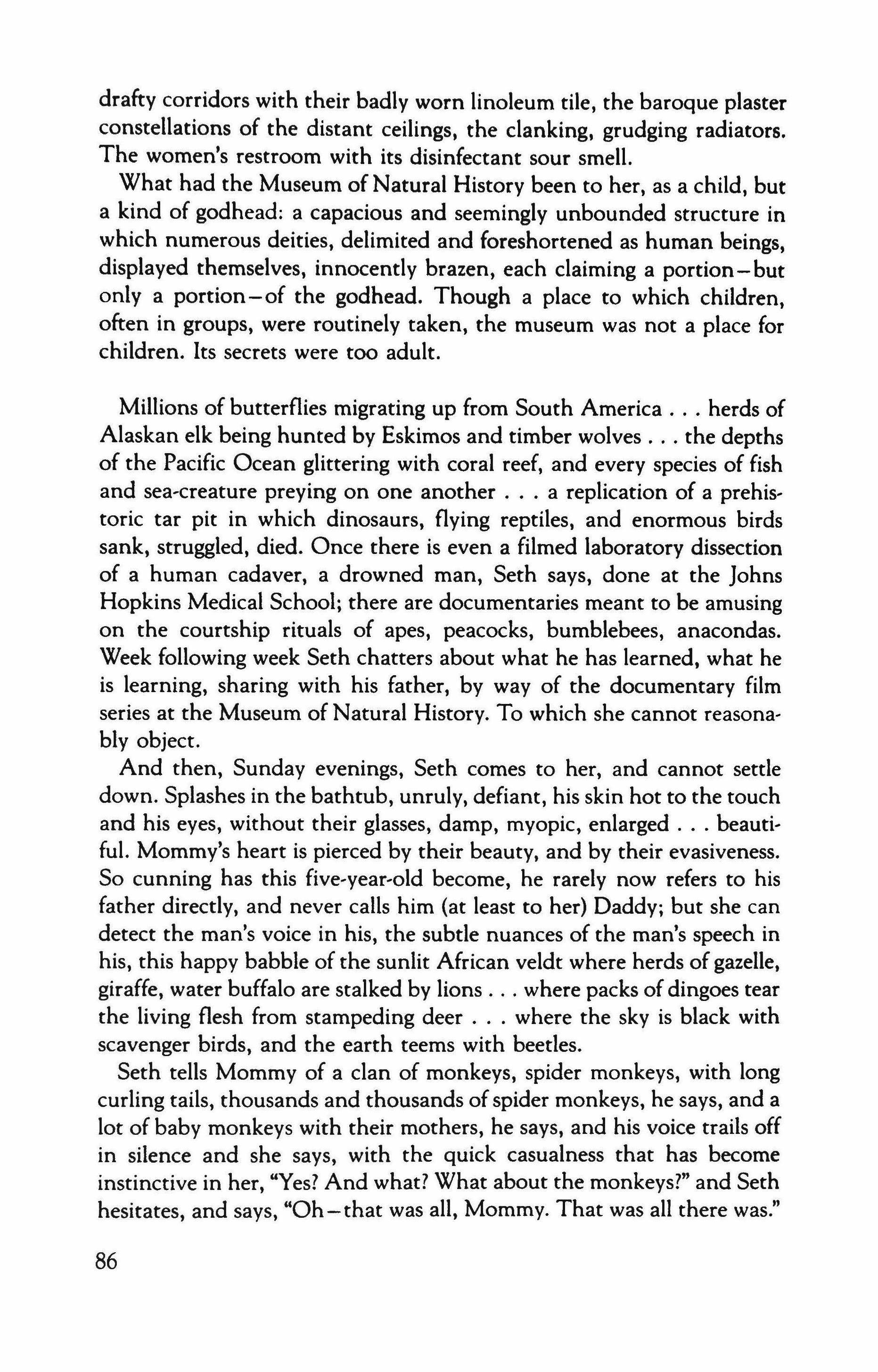
drafty corridors with their badly worn linoleum tile, the baroque plaster constellations of the distant ceilings, the clanking, grudging radiators. The women's restroom with its disinfectant sour smell.
What had the Museum of Natural History been to her, as a child, but a kind of godhead: a capacious and seemingly unbounded structure in which numerous deities, delimited and foreshortened as human beings, displayed themselves, innocently brazen, each claiming a portion-but only a portion-of the godhead. Though a place to which children, often in groups, were routinely taken, the museum was not a place for children. Its secrets were too adult.
Millions of butterflies migrating up from South America herds of Alaskan elk being hunted by Eskimos and timber wolves the depths of the Pacific Ocean glittering with coral reef, and every species of fish and sea-creature preying on one another a replication of a prehistoric tar pit in which dinosaurs, flying reptiles, and enormous birds sank, struggled, died. Once there is even a filmed laboratory dissection of a human cadaver, a drowned man, Seth says, done at the Johns Hopkins Medical School; there are documentaries meant to be amusing on the courtship rituals of apes, peacocks, bumblebees, anacondas. Week following week Seth chatters about what he has learned, what he is learning, sharing with his father, by way of the documentary film series at the Museum of Natural History. To which she cannot reasonably object.
And then, Sunday evenings, Seth comes to her, and cannot settle down. Splashes in the bathtub, unruly, defiant, his skin hot to the touch and his eyes, without their glasses, damp, myopic, enlarged beautiful. Mommy's heart is pierced by their beauty, and by their evasiveness. So cunning has this five-year-old become, he rarely now refers to his father directly, and never calls him (at least to her) Daddy; but she can detect the man's voice in his, the subtle nuances of the man's speech in his, this happy babble of the sunlit African veldt where herds of gazelle, giraffe, water buffalo are stalked by lions where packs of dingoes tear the living flesh from stampeding deer where the sky is black with scavenger birds, and the earth teems with beetles.
Seth tells Mommy of a clan of monkeys, spider monkeys, with long curling tails, thousands and thousands of spider monkeys, he says, and a lot of baby monkeys with their mothers, he says, and his voice trails off in silence and she says, with the quick casualness that has become instinctive in her, "Yes? And what? What about the monkeys?" and Seth hesitates, and says, "Oh - that was all, Mommy. That was all there was."
86
Open Letter to Oates
William Heyen
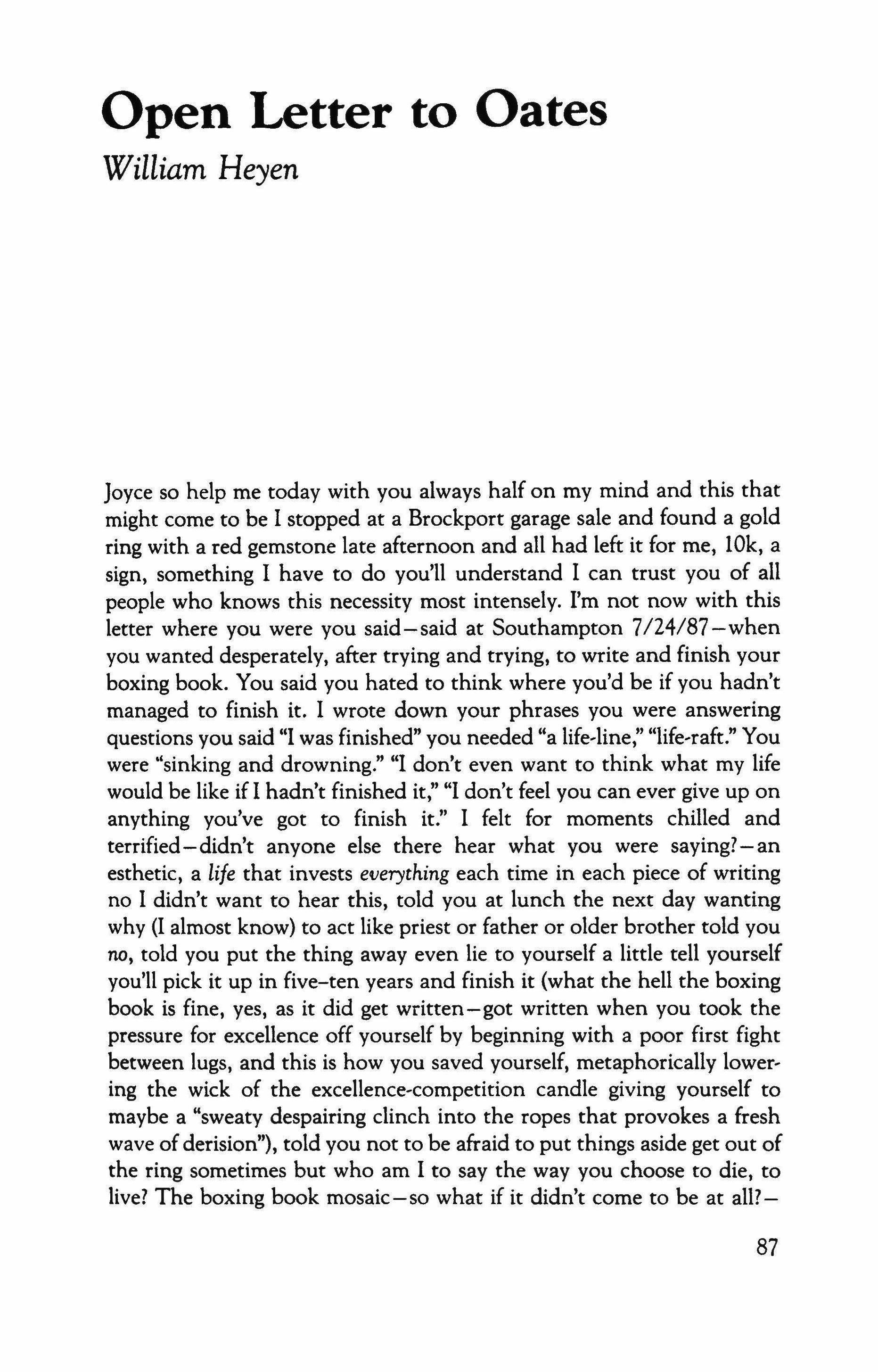
Joyce so help me today with you always half on my mind and this that might corne to be I stopped at a Brockport garage sale and found a gold ring with a red gemstone late afternoon and all had left it for me, lOk, a sign, something I have to do you'll understand I can trust you of all people who knows this necessity most intensely. I'm not now with this letter where you were you said - said at Southampton 7124/87 - when you wanted desperately, after trying and trying, to write and finish your boxing book. You said you hated to think where you'd be if you hadn't managed to finish it. I wrote down your phrases you were answering questions you said "I was finished" you needed "a life-line," "life-raft," You were "sinking and drowning." "I don't even want to think what my life would be like if I hadn't finished it," "I don't feel you can ever give up on anything you've got to finish it." I felt for moments chilled and terrified - didn't anyone else there hear what you were saying? - an esthetic, a life that invests everything each time in each piece of writing no I didn't want to hear this, told you at lunch the next day wanting why (I almost know) to act like priest or father or older brother told you no, told you put the thing away even lie to yourself a little tell yourself you'll pick it up in five-ten years and finish it (what the hell the boxing book is fine, yes, as it did get written-got written when you took the pressure for excellence off yourself by beginning with a poor first fight between lugs, and this is how you saved yourself, metaphorically lower, ing the wick of the excellence-competition candle giving yourself to maybe a "sweaty despairing clinch into the ropes that provokes a fresh wave ofderision"), told you not to be afraid to put things aside get out of the ring sometimes but who am I to say the way you choose to die, to live? The boxing book mosaic-so what if it didn't corne to be at all?-
87
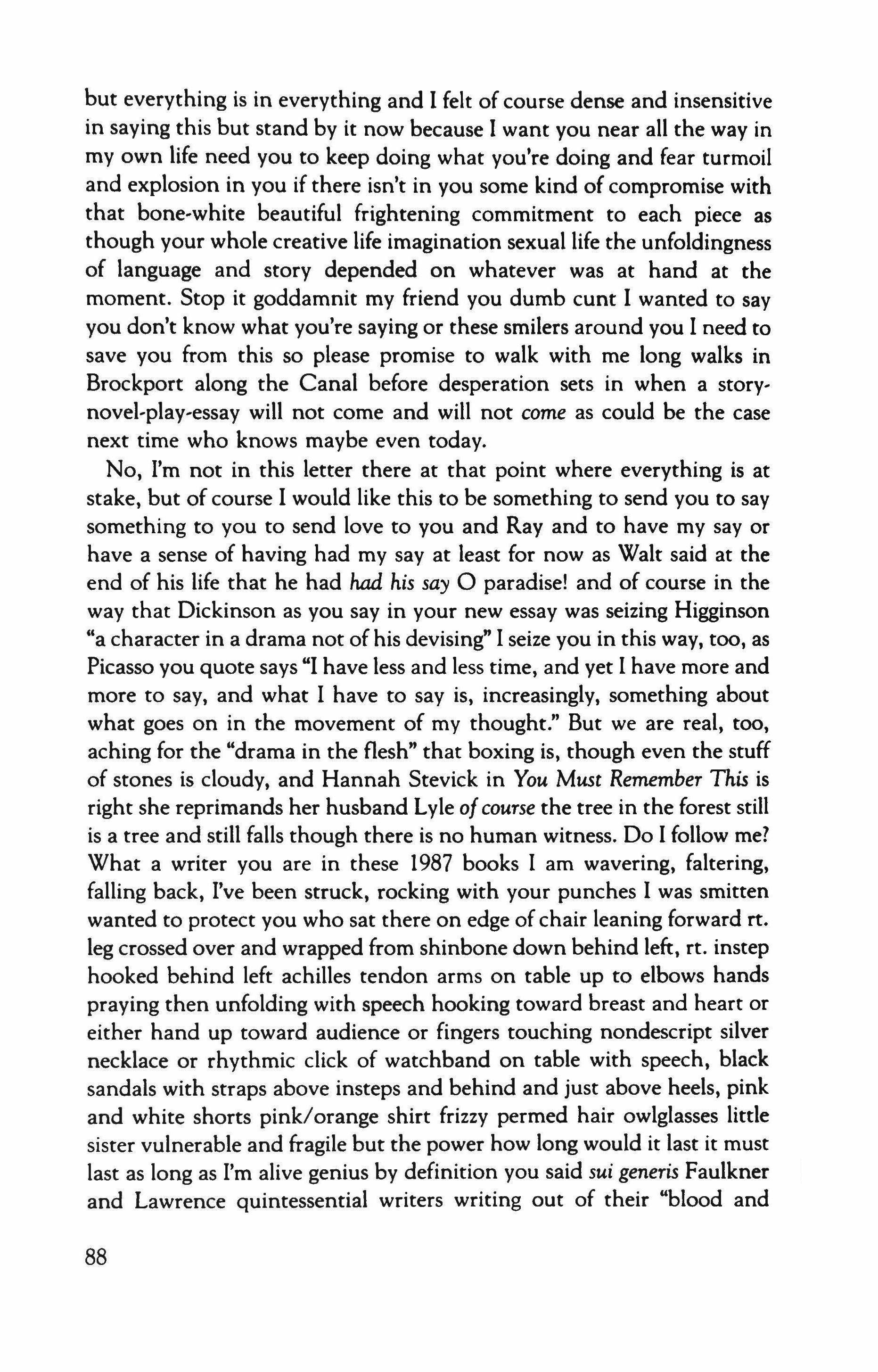
but everything is in everything and I felt of course dense and insensitive in saying this but stand by it now because I want you near all the way in my own life need you to keep doing what you're doing and fear turmoil and explosion in you if there isn't in you some kind of compromise with that bone-white beautiful frightening commitment to each piece as though your whole creative life imagination sexual life the unfoldingness of language and story depended on whatever was at hand at the moment. Stop it goddamnit my friend you dumb cunt I wanted to say you don't know what you're saying or these smilers around you I need to save you from this so please promise to walk with me long walks in Brockport along the Canal before desperation sets in when a storynovel-play-essay will not come and will not come as could be the case next time who knows maybe even today.
No, I'm not in this letter there at that point where everything is at stake, but of course I would like this to be something to send you to say something to you to send love to you and Ray and to have my say or have a sense of having had my say at least for now as Walt said at the end of his life that he had had his say 0 paradise! and of course in the way that Dickinson as you say in your new essay was seizing Higginson "a character in a drama not of his devising" I seize you in this way, too, as Picasso you quote says "I have less and less time, and yet I have more and more to say, and what I have to say is, increasingly, something about what goes on in the movement of my thought." But we are real, too, aching for the "drama in the flesh" that boxing is, though even the stuff of stones is cloudy, and Hannah Stevick in You Must Remember This is right she reprimands her husband Lyle of course the tree in the forest still is a tree and still falls though there is no human witness. Do I follow me? What a writer you are in these 1987 books I am wavering, faltering, falling back, I've been struck, rocking with your punches I was smitten wanted to protect you who sat there on edge of chair leaning forward rt. leg crossed over and wrapped from shinbone down behind left, rt. instep hooked behind left achilles tendon arms on table up to elbows hands praying then unfolding with speech hooking toward breast and heart or either hand up toward audience or fingers touching nondescript silver necklace or rhythmic click of watchband on table with speech, black sandals with straps above insteps and behind and just above heels, pink and white shorts pink/orange shirt frizzy permed hair owlglasses little sister vulnerable and fragile but the power how long would it last it must last as long as I'm alive genius by definition you said sui generis Faulkner and Lawrence quintessential writers writing out of their "blood and
88
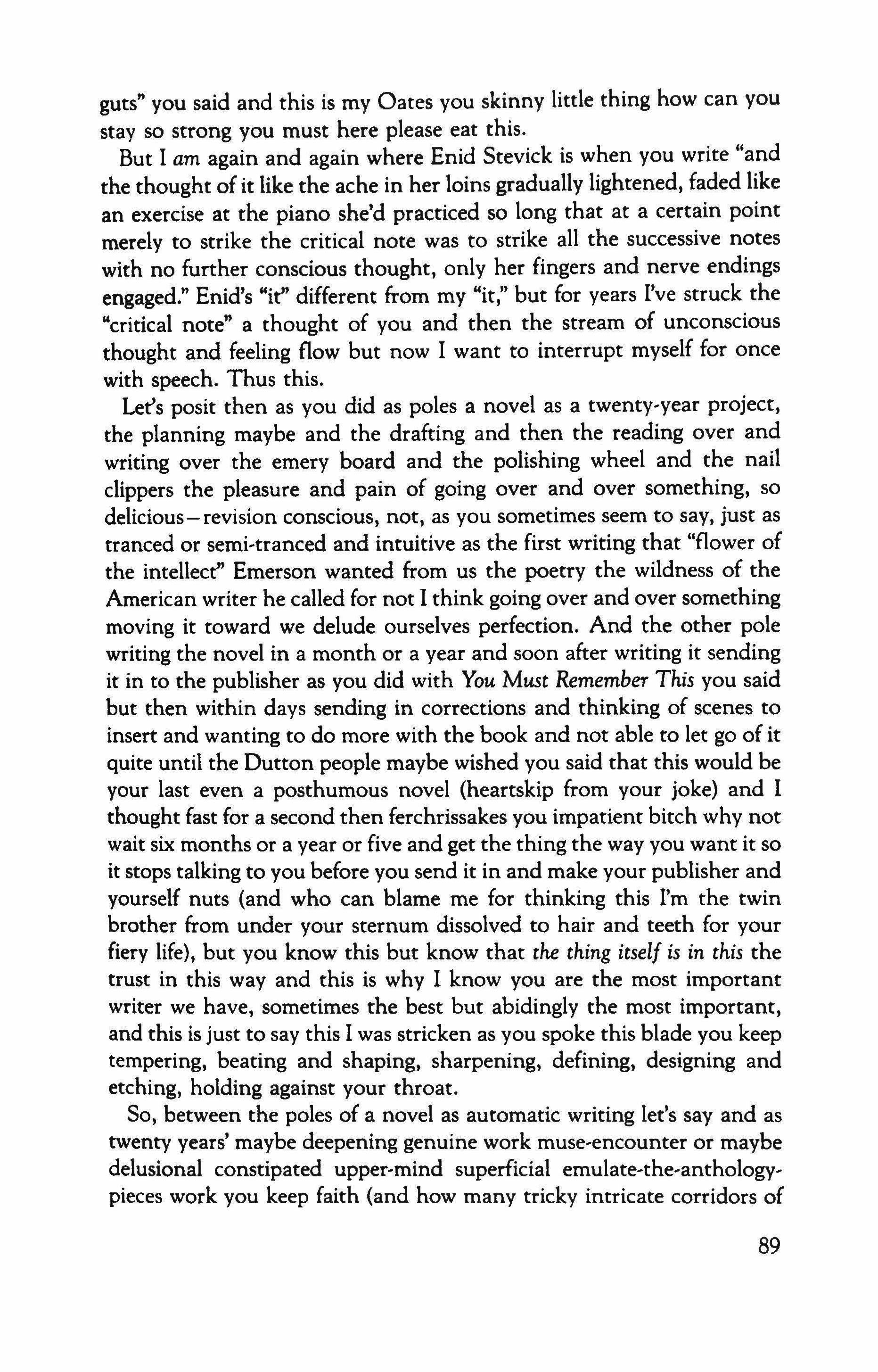
guts" you said and this is my Oates you skinny little thing how can you stay so strong you must here please eat this.
But I am again and again where Enid Stevick is when you write "and the thought of it like the ache in her loins gradually lightened, faded like an exercise at the piano she'd practiced so long that at a certain point merely to strike the critical note was to strike all the successive notes with no further conscious thought, only her fingers and nerve endings engaged." Enid's "it" different from my "it," but for years I've struck the "critical note" a thought of you and then the stream of unconscious thought and feeling flow but now I want to interrupt myself for once with speech. Thus this.
Let's posit then as you did as poles a novel as a twenty-year project, the planning maybe and the drafting and then the reading over and writing over the emery board and the polishing wheel and the nail clippers the pleasure and pain of going over and over something, so delicious-revision conscious, not, as you sometimes seem to say, just as tranced or semi-tranced and intuitive as the first writing that "flower of the intellect" Emerson wanted from us the poetry the wildness of the American writer he called for not I think going over and over something moving it toward we delude ourselves perfection. And the other pole writing the novel in a month or a year and soon after writing it sending it in to the publisher as you did with You Must Remember This you said but then within days sending in corrections and thinking of scenes to insert and wanting to do more with the book and not able to let go of it quite until the Dutton people maybe wished you said that this would be your last even a posthumous novel (heartskip from your joke) and I thought fast for a second then ferchrissakes you impatient bitch why not wait six months or a year or five and get the thing the way you want it so it stops talking to you before you send it in and make your publisher and yourself nuts (and who can blame me for thinking this I'm the twin brother from under your sternum dissolved to hair and teeth for your fiery life), but you know this but know that the thing itself is in this the trust in this way and this is why I know you are the most important writer we have, sometimes the best but abidingly the most important, and this is just to say this I was stricken as you spoke this blade you keep tempering, beating and shaping, sharpening, defining, designing and etching, holding against your throat.
So, between the poles of a novel as automatic writing let's say and as twenty years' maybe deepening genuine work muse-encounter or maybe delusional constipated upper-mind superficial emulate-the-anthologypieces work you keep faith (and how many tricky intricate corridors of
89
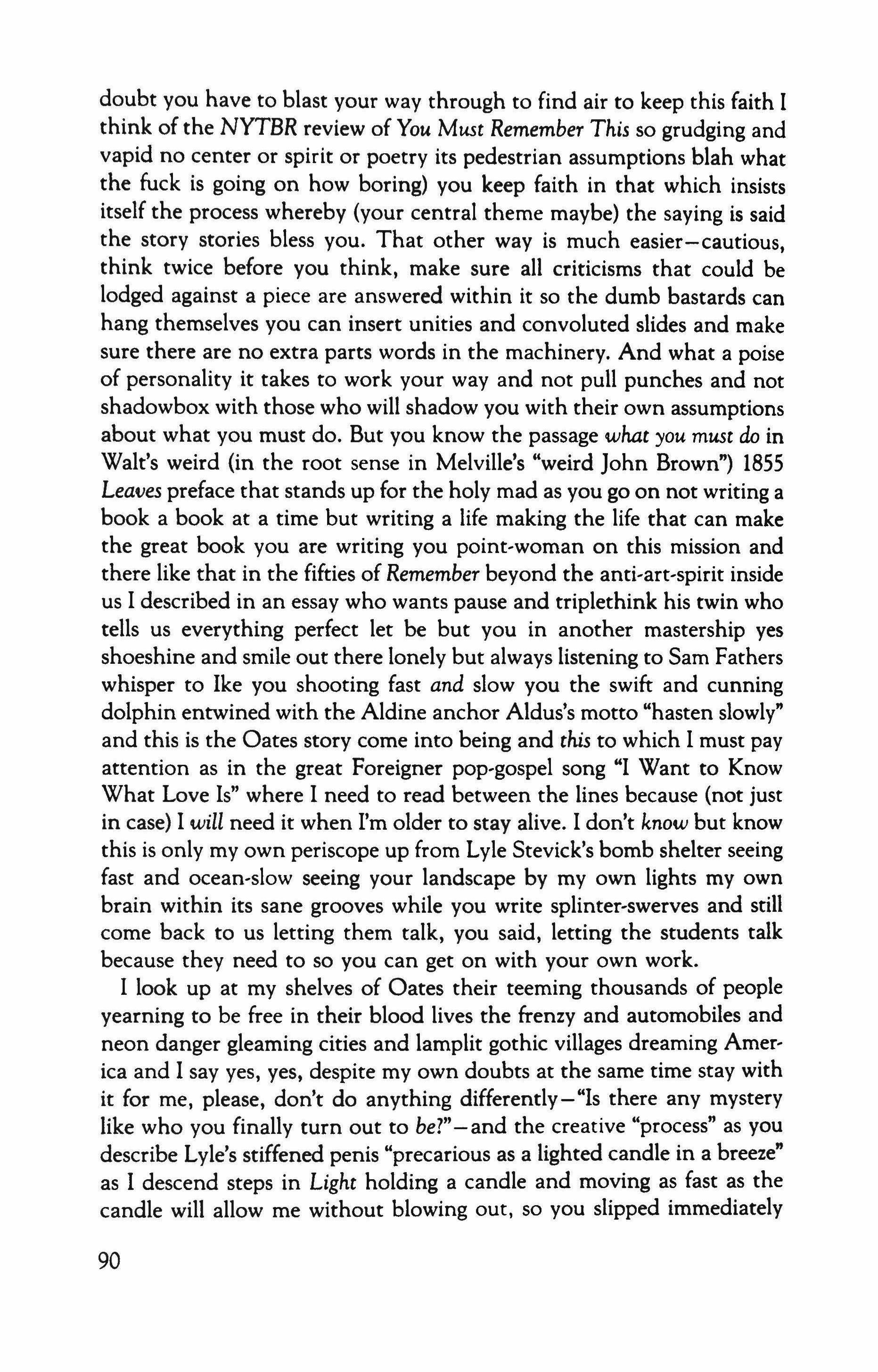
doubt you have to blast your way through to find air to keep this faith I think of the NYTBR review of You Must Remember This so grudging and vapid no center or spirit or poetry its pedestrian assumptions blah what the fuck is going on how boring) you keep faith in that which insists itself the process whereby (your central theme maybe) the saying is said the story stories bless you. That other way is much easier-cautious, think twice before you think, make sure all criticisms that could be lodged against a piece are answered within it so the dumb bastards can hang themselves you can insert unities and convoluted slides and make sure there are no extra parts words in the machinery. And what a poise of personality it takes to work your way and not pull punches and not shadowbox with those who will shadow you with their own assumptions about what you must do. But you know the passage what you must do in Walt's weird (in the root sense in Melville's "weird John Brown") 1855 Leaves preface that stands up for the holy mad as you go on not writing a book a book at a time but writing a life making the life that can make the great book you are writing you point-woman on this mission and there like that in the fifties of Remember beyond the anti-art-spirit inside us I described in an essay who wants pause and triplerhink his twin who tells us everything perfect let be but you in another mastership yes shoeshine and smile out there lonely but always listening to Sam Fathers whisper to Ike you shooting fast and slow you the swift and cunning dolphin entwined with the Aldine anchor Aldus's motto "hasten slowly" and this is the Oates story come into being and this to which I must pay attention as in the great Foreigner pop-gospel song "I Want to Know What Love Is" where I need to read between the lines because (not just in case) I will need it when I'm older to stay alive. I don't know but know this is only my own periscope up from Lyle Stevick's bomb shelter seeing fast and ocean-slow seeing your landscape by my own lights my own brain within its sane grooves while you write splinter-swerves and still come back to us letting them talk, you said, letting the students talk because they need to so you can get on with your own work.
I look up at my shelves of Oates their teeming thousands of people yearning to be free in their blood lives the frenzy and automobiles and neon danger gleaming cities and lamplit gothic villages dreaming America and I say yes, yes, despite my own doubts at the same time stay with it for me, please, don't do anything differently-"Is there any mystery like who you finally turn out to be?,'-and the creative "process" as you describe Lyle's stiffened penis "precarious as a lighted candle in a breeze" as I descend steps in Light holding a candle and moving as fast as the candle will allow me without blowing out, so you slipped immediately
90
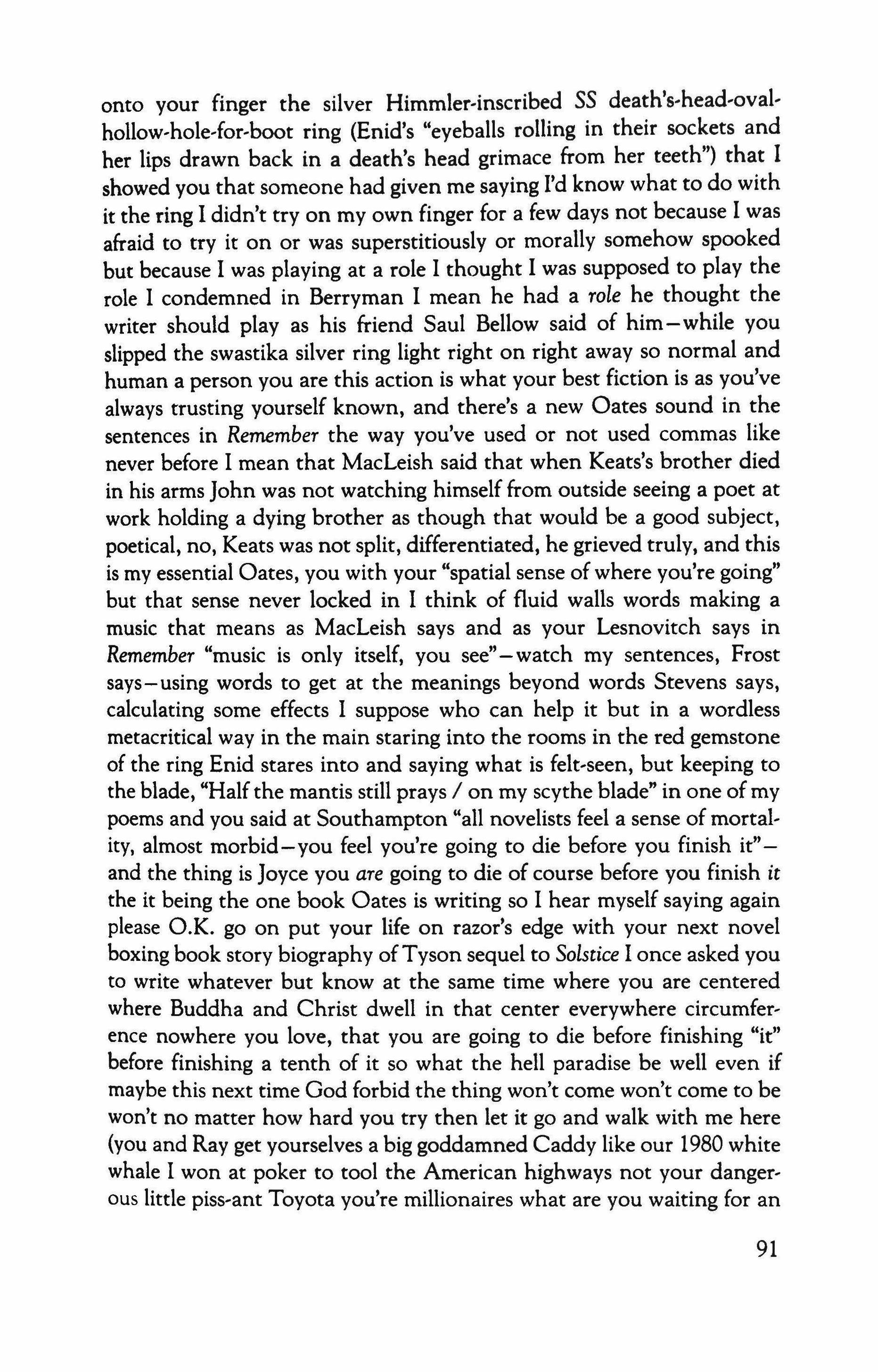
onto your finger the silver Himmler-inscribed SS death's-head-ovalhollow-hole-for-boot ring (Enid's "eyeballs rolling in their sockets and her lips drawn back in a death's head grimace from her teeth") that I showed you that someone had given me saying I'd know what to do with it the ring I didn't tryon my own finger for a few days not because I was afraid to try it on or was superstitiously or morally somehow spooked but because I was playing at a role I thought I was supposed to play the role I condemned in Berryman I mean he had a role he thought the writer should playas his friend Saul Bellow said of him - while you slipped the swastika silver ring light right on right away so normal and human a person you are this action is what your best fiction is as you've always trusting yourself known, and there's a new Oates sound in the sentences in Remember the way you've used or not used commas like never before I mean that MacLeish said that when Keats's brother died in his arms John was not watching himself from outside seeing a poet at work holding a dying brother as though that would be a good subject, poetical, no, Keats was not split, differentiated, he grieved truly, and this is my essential Oates, you with your "spatial sense of where you're going" but that sense never locked in I think of fluid walls words making a music that means as MacLeish says and as your Lesnovitch says in Remember "music is only itself, you see" - watch my sentences, Frost says-using words to get at the meanings beyond words Stevens says, calculating some effects I suppose who can help it but in a wordless metacritical way in the main staring into the rooms in the red gemstone of the ring Enid stares into and saying what is felt-seen, but keeping to the blade, "Halfthe mantis still prays / on my scythe blade" in one of my poems and you said at Southampton "all novelists feel a sense of mortality, almost morbid-you feel you're going to die before you finish it"and the thing is Joyce you are going to die of course before you finish it the it being the one book Oates is writing so I hear myself saying again please O.K. go on put your life on razor's edge with your next novel boxing book story biography ofTyson sequel to Solstice I once asked you to write whatever but know at the same time where you are centered where Buddha and Christ dwell in that center everywhere circumference nowhere you love, that you are going to die before finishing "it" before finishing a tenth of it so what the hell paradise be well even if maybe this next time God forbid the thing won't come won't come to be won't no matter how hard you try then let it go and walk with me here (you and Ray get yourselves a big goddamned Caddy like our 1980 white whale I won at poker to tool the American highways not your dangerous little piss-ant Toyota you're millionaires what are you waiting for an
91
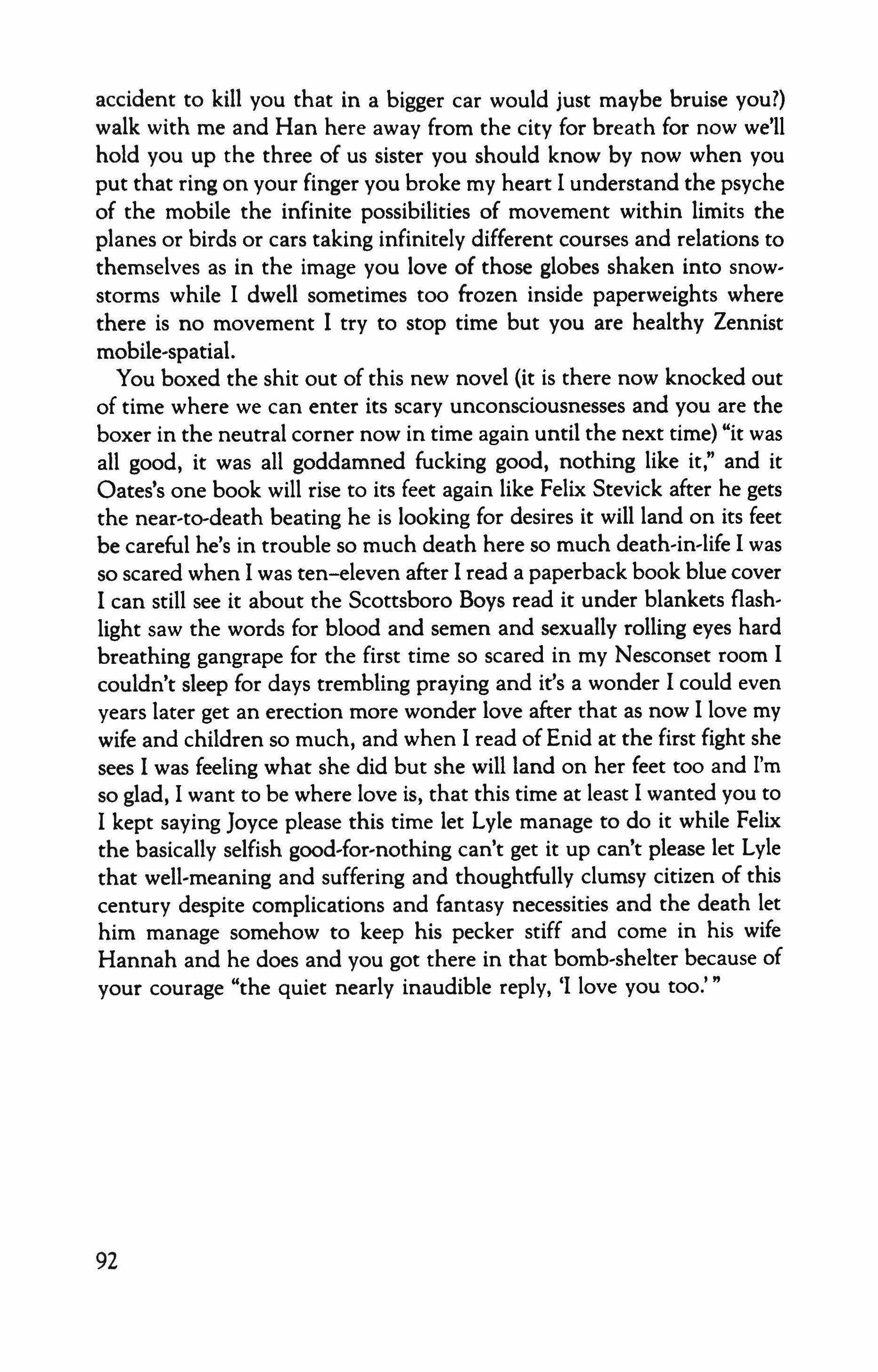
accident to kill you that in a bigger car would just maybe bruise you?) walk with me and Han here away from the city for breath for now we'll hold you up the three of us sister you should know by now when you put that ring on your finger you broke my heart 1 understand the psyche of the mobile the infinite possibilities of movement within limits the planes or birds or cars taking infinitely different courses and relations to themselves as in the image you love of those globes shaken into snowstorms while I dwell sometimes too frozen inside paperweights where there is no movement I try to stop time but you are healthy Zennist mobile-spatial.
You boxed the shit out of this new novel (it is there now knocked out of time where we can enter its scary unconsciousnesses and you are the boxer in the neutral corner now in time again until the next time) "it was all good, it was all goddamned fucking good, nothing like it," and it Oates's one book will rise to its feet again like Felix Stevick after he gets the near-to-death beating he is looking for desires it will land on its feet be careful he's in trouble so much death here so much death-in-life 1 was so scared when I was ten-eleven after 1 read a paperback book blue cover I can still see it about the Scottsboro Boys read it under blankets flashlight saw the words for blood and semen and sexually rolling eyes hard breathing gangrape for the first time so scared in my Nesconset room I couldn't sleep for days trembling praying and it's a wonder 1 could even years later get an erection more wonder love after that as now 1 love my wife and children so much, and when 1 read of Enid at the first fight she sees I was feeling what she did but she will land on her feet too and I'm so glad, 1 want to be where love is, that this time at least I wanted you to 1 kept saying Joyce please this time let Lyle manage to do it while Felix the basically selfish good-for-nothing can't get it up can't please let Lyle that well-meaning and suffering and thoughtfully clumsy citizen of this century despite complications and fantasy necessities and the death let him manage somehow to keep his peeker stiff and come in his wife Hannah and he does and you got there in that bomb-shelter because of your courage "the quiet nearly inaudible reply, '1 love you too.'''
92
Three Poems
Anna Akhmatova
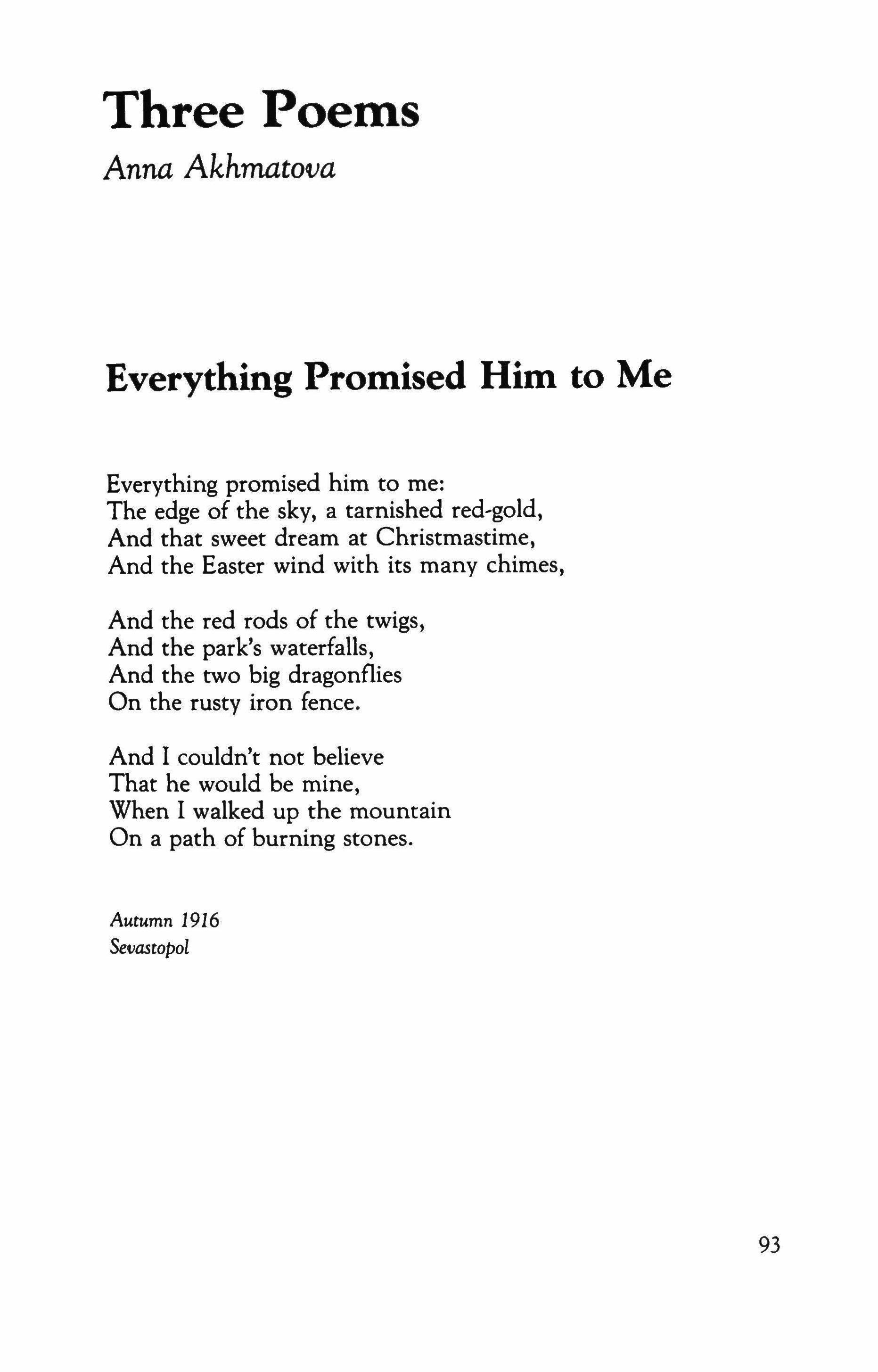
Everything Promised Him to Me
Everything promised him to me: The edge of the sky, a tarnished red-gold, And that sweet dream at Christmastime, And the Easter wind with its many chimes, And the red rods of the twigs, And the park's waterfalls, And the two big dragonflies On the rusty iron fence.
And I couldn't not believe That he would be mine, When I walked up the mountain On a path of burning stones.
Autumn 1916 SetJastopol
93
The Neighbor, Out of Pity

The neighbor, out of pity-two blocks, The old women, as usual- up to the gates, But the one whose hand I held Will go with me to the rim of the pit. And he will stand completely alone in the world, On our black, crumbly native land, And he'll call louder, but my voice won't answer Him, as it always did before.
August 15, 1940
94
To the Memory of V. S. Sreznevskava
It almost cannot be, because you always were: In the shadow of the blessed linden, in the siege and in the hospital, In the prison cell and there, where there were evil birds And splendid grasses and dreadful tides. Oh, how everything changed, but you always were, And it seems as if they cut away half my soul, The half that was you - and the main reason For having it, I knew. And suddenly I forgot everything But your ringing voice calls out to me from there, And asks me not to grieve, but to wait for death as for a miracle.
All right! I'll try.
September 9, 1964 Komarovo
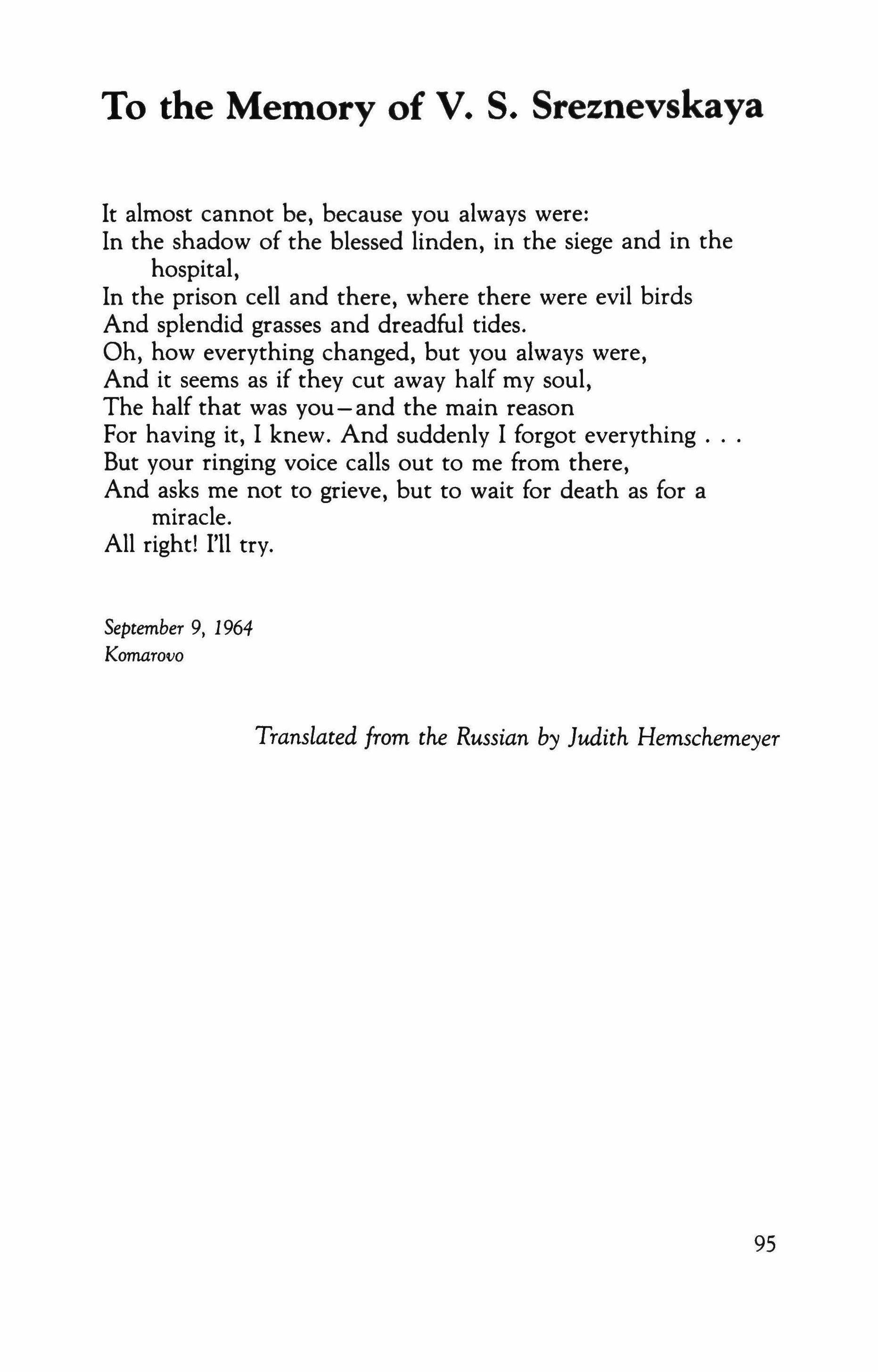
Translated from the Russian by Judith Hemschemeyer
95
Gin Music
Michael Anania
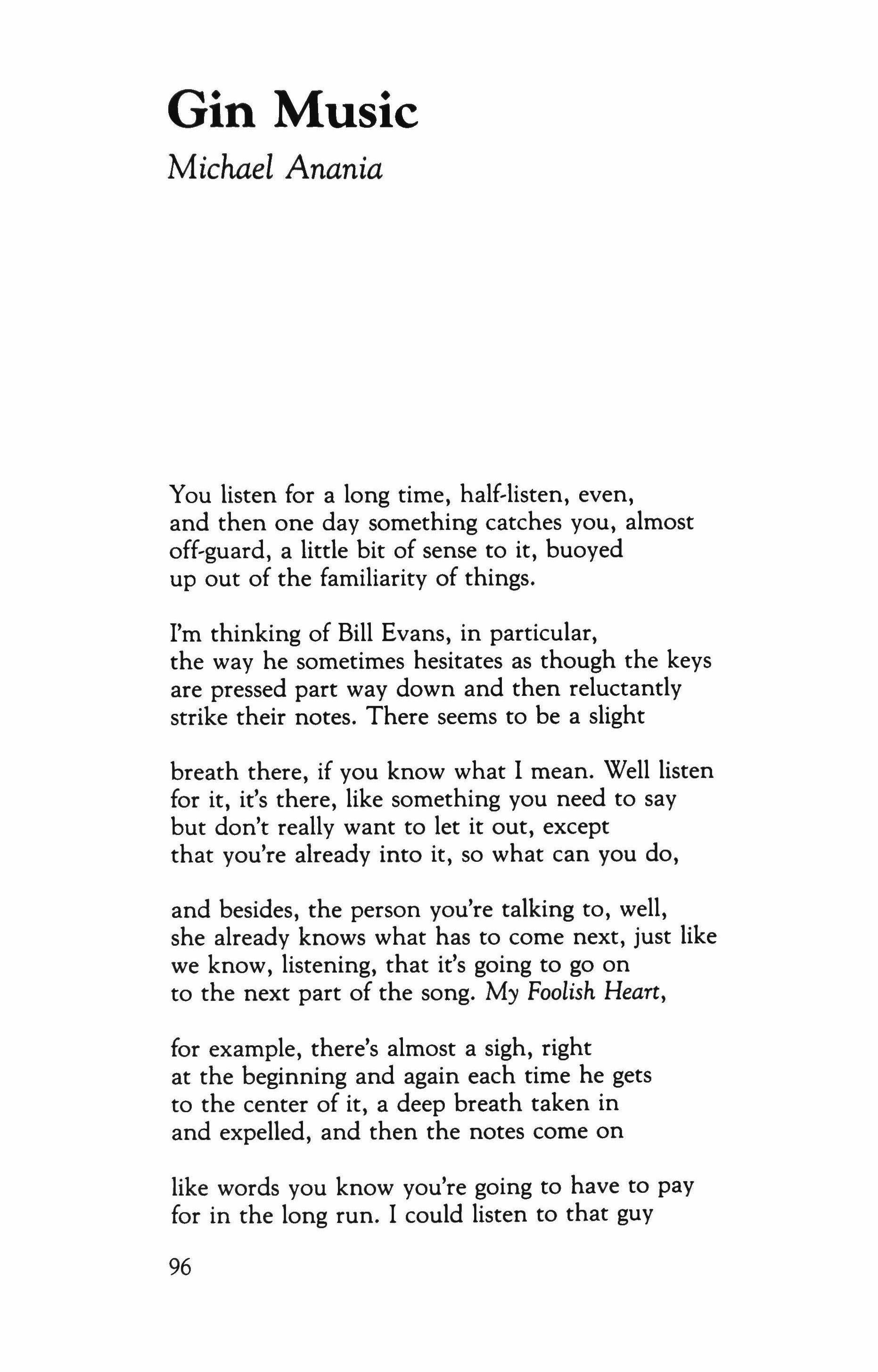
You listen for a long time, half-listen, even, and then one day something catches you, almost off-guard, a little bit of sense to it, buoyed up out of the familiarity of things.
I'm thinking of Bill Evans, in particular, the way he sometimes hesitates as though the keys are pressed part way down and then reluctantly strike their notes. There seems to be a slight
breath there, if you know what I mean. Well listen for it, it's there, like something you need to say but don't really want to let it out, except that you're already into it, so what can you do, and besides, the person you're talking to, well, she already knows what has to come next, just like we know, listening, that it's going to go on to the next part of the song. My Foolish Heart, for example, there's almost a sigh, right at the beginning and again each time he gets to the center of it, a deep breath taken in and expelled, and then the notes come on like words you know you're going to have to pay for in the long run. I could listen to that guy
96
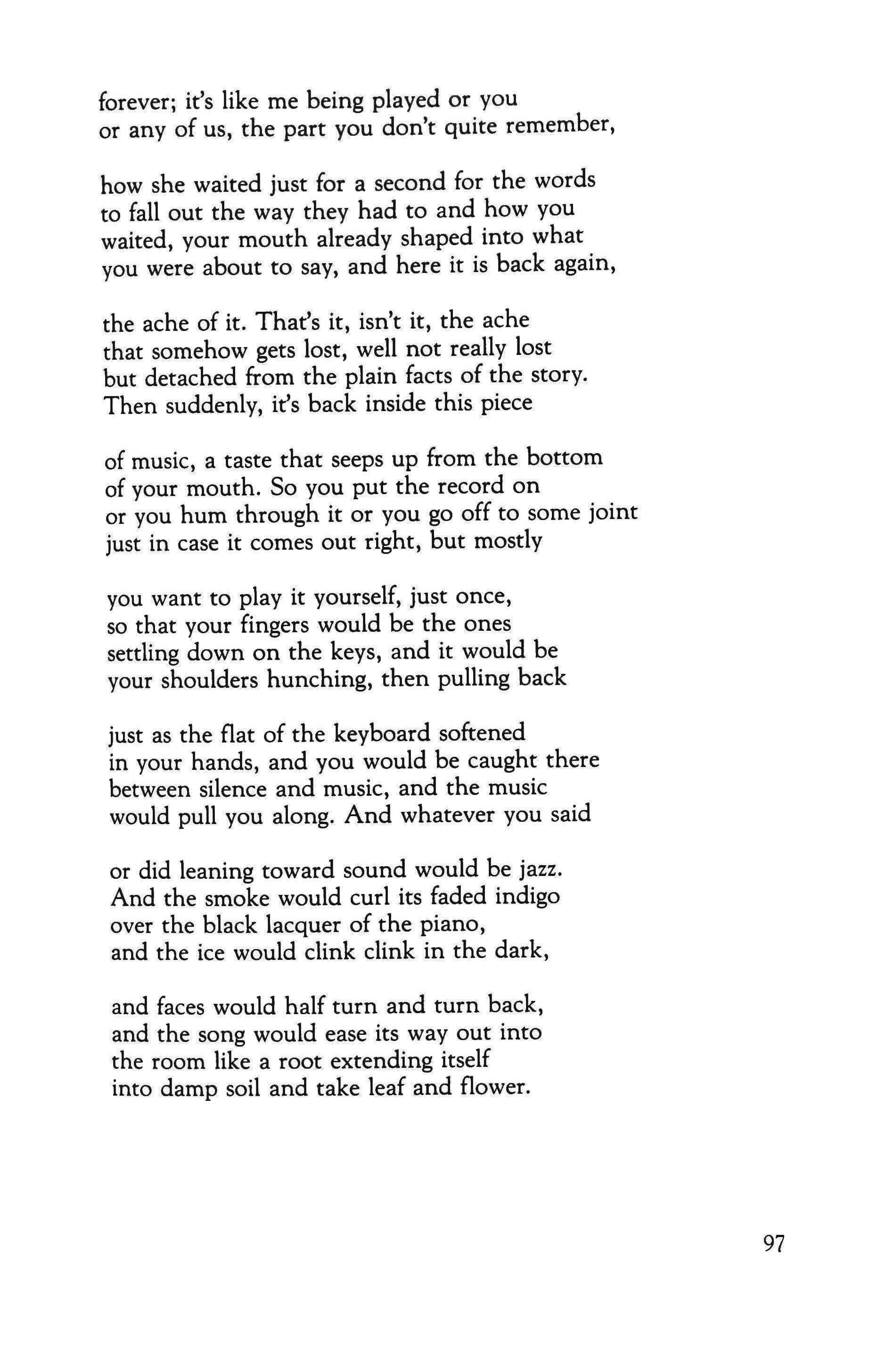
forever; it's like me being played or you or any of us, the part you don't quite remember,
how she waited just for a second for the words to fall out the way they had to and how you waited, your mouth already shaped into what you were about to say, and here it is back again, the ache of it. That's it, isn't it, the ache that somehow gets lost, well not really lost but detached from the plain facts of the story. Then suddenly, it's back inside this piece
of music, a taste that seeps up from the bottom of your mouth. So you put the record on or you hum through it or you go off to some joint just in case it comes out right, but mostly you want to play it yourself, just once, so that your fingers would be the ones settling down on the keys, and it would be your shoulders hunching, then pulling back
just as the flat of the keyboard softened in your hands, and you would be caught there between silence and music, and the music would pull you along. And whatever you said or did leaning toward sound would be jazz. And the smoke would curl its faded indigo over the black lacquer of the piano, and the ice would clink clink in the dark, and faces would half turn and turn back, and the song would ease its way out into the room like a root extending itself into damp soil and take leaf and flower.
97
Two Poems
Debra Nystrom
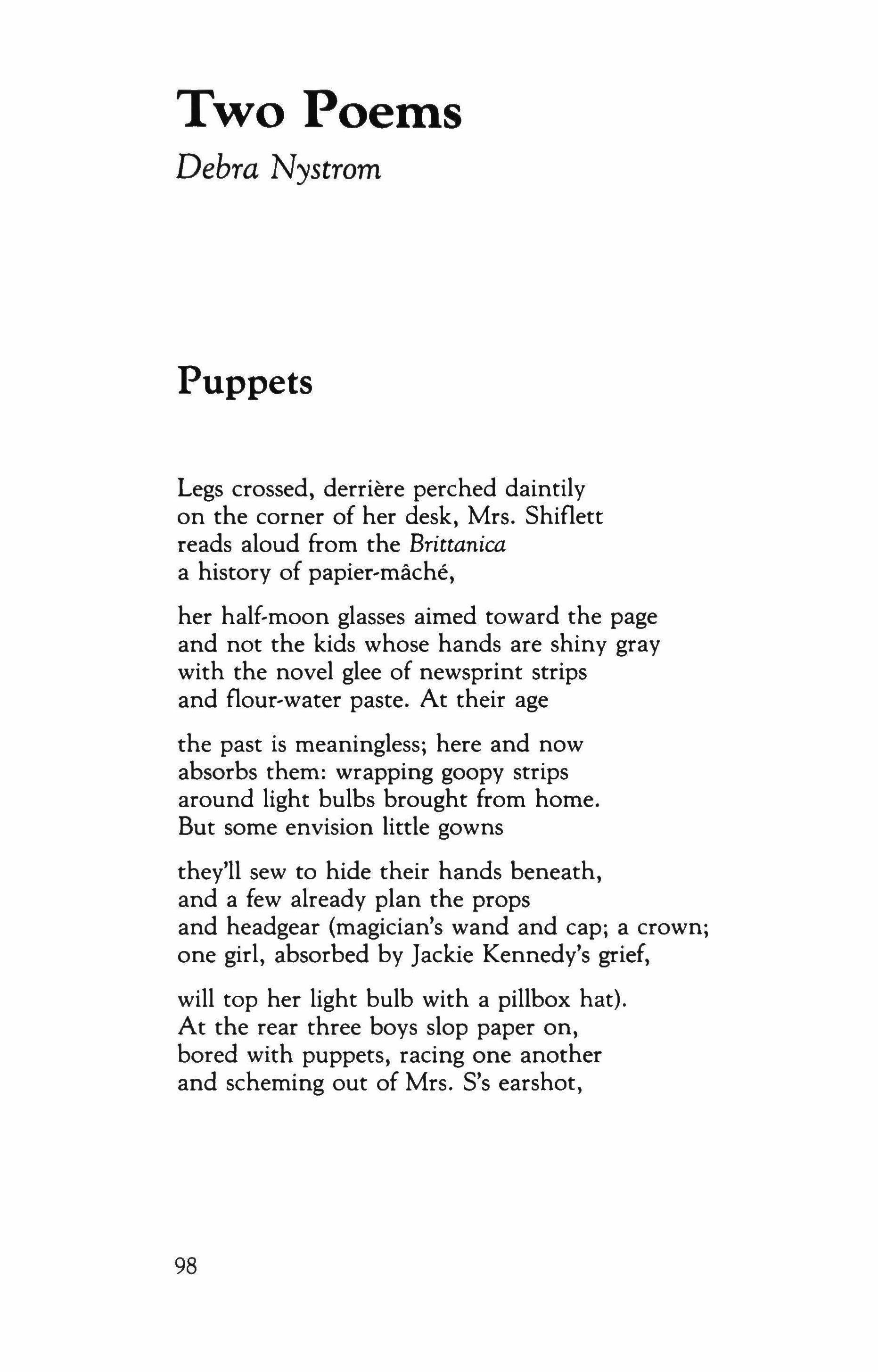
Puppets
Legs crossed, derriere perched daintily on the corner of her desk, Mrs. Shiflett reads aloud from the Brittanica a history of papier-mache, her half-moon glasses aimed toward the page and not the kids whose hands are shiny gray with the novel glee of newsprint strips and flour-water paste. At their age the past is meaningless; here and now absorbs them: wrapping goopy strips around light bulbs brought from home. But some envision little gowns
they'll sew to hide their hands beneath, and a few already plan the props and headgear (magician's wand and cap; a crown; one girl, absorbed by Jackie Kennedy's grief, will top her light bulb with a pillbox hat). At the rear three boys slop paper on, bored with puppets, racing one another and scheming out of Mrs. S's earshot,
98
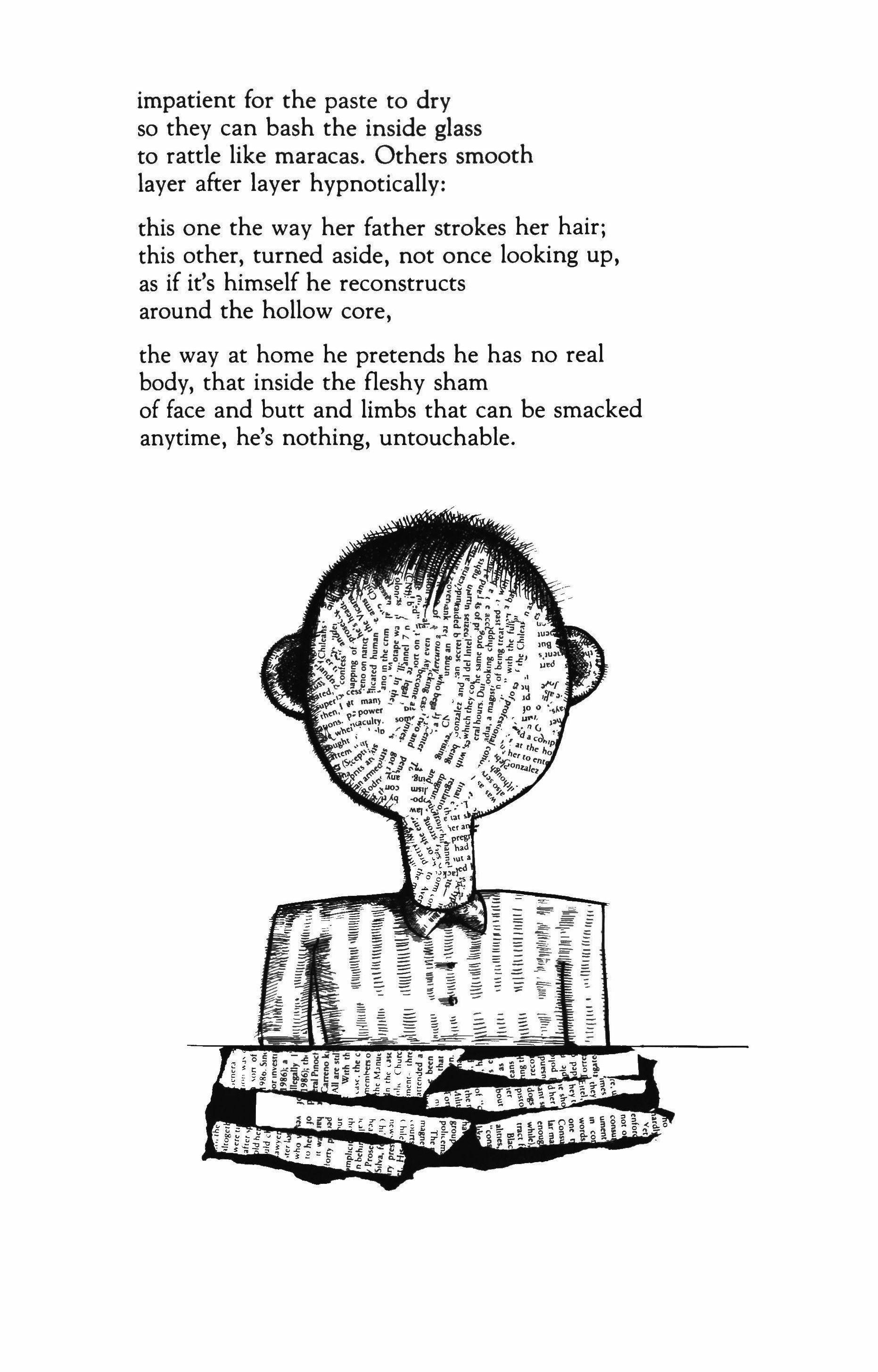
impatient for the paste to dry so they can bash the inside glass to rattle like maracas. Others smooth layer after layer hypnotically:
this one the way her father strokes her hair; this other, turned aside, not once looking up, as if it's himself he reconstructs around the hollow core, the way at home he pretends he has no real body, that inside the fleshy sham of face and butt and limbs that can be smacked anytime, he's nothing, untouchable.
Wordless Hour
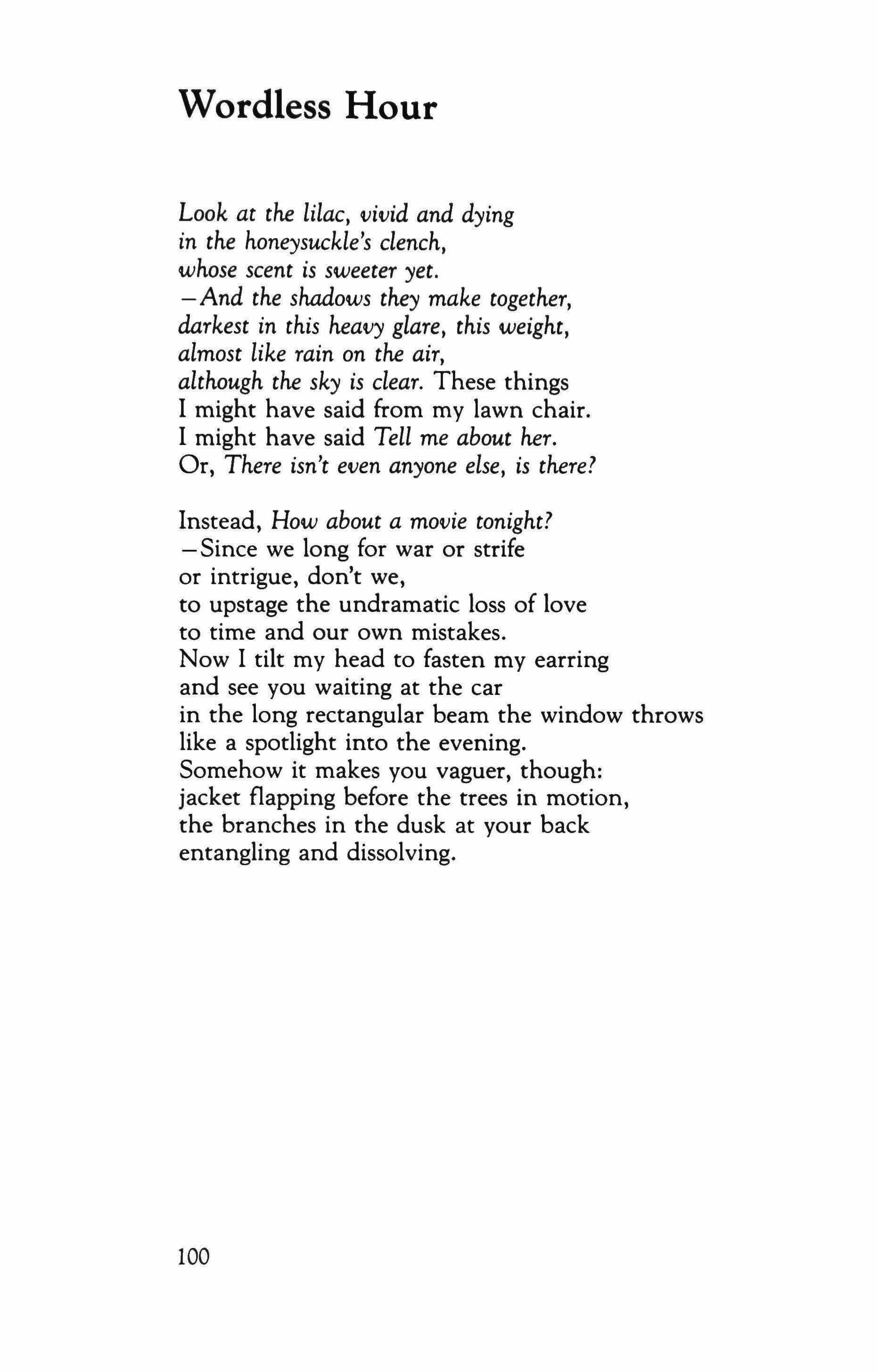
Look at the lilac, vivid and dying in the honeysuckle's clench, whose scent is sweeter yet.
- And the shadows they make together, darkest in this heavy glare, this weight, almost like rain on the air, although the sky is clear. These things I might have said from my lawn chair. I might have said Tell me about her. Or, There isn't even anyone else, is there?
Instead, How about a movie tonight?
- Since we long for war or strife or intrigue, don't we, to upstage the undramatic loss of love to time and our own mistakes. Now I tilt my head to fasten my earring and see you waiting at the car in the long rectangular beam the window throws like a spotlight into the evening. Somehow it makes you vaguer, though: jacket flapping before the trees in motion, the branches in the dusk at your back entangling and dissolving.
100
At the Japanese Baths
G. E. Murray
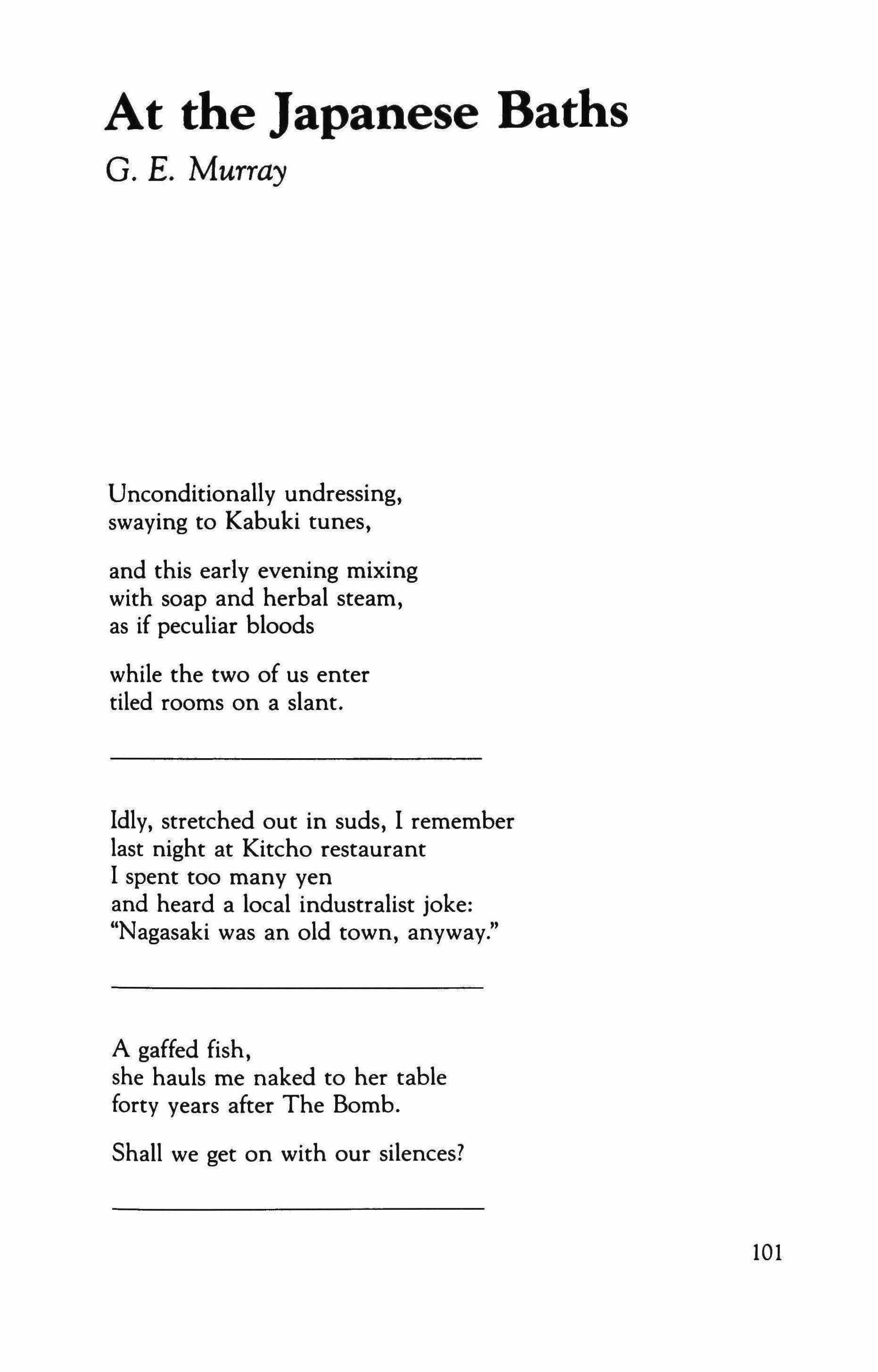
Unconditionally undressing, swaying to Kabuki tunes, and this early evening mixing with soap and herbal steam, as if peculiar bloods while the two of us enter tiled rooms on a slant.
Idly, stretched out in suds, I remember last night at Kitcho restaurant I spent too many yen and heard a local industralist joke: "Nagasaki was an old town, anyway."
A gaffed fish, she hauls me naked to her table forty years after The Bomb.
Shall we get on with our silences?
101
Hunkered, she knows bones hot and distant as stars Toweled off, I lie on my back close to joy and her tiny, intelligent knees, raised to art, as we translate a dialogue of grunts, deep as that.
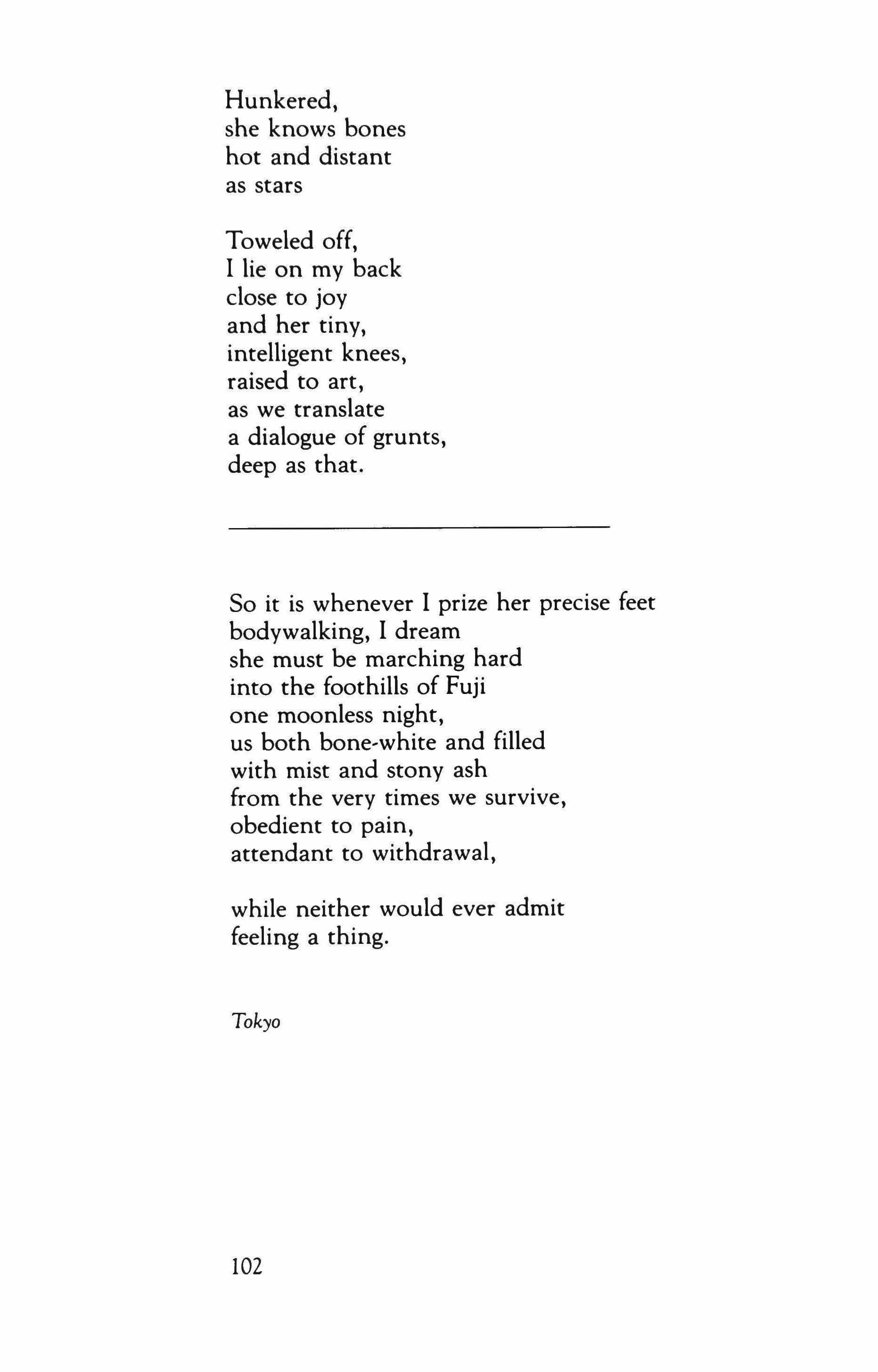
So it is whenever I prize her precise feet bodywalking, I dream she must be marching hard into the foothills of Fuji one moonless night, us both bone-white and filled with mist and stony ash from the very times we survive, obedient to pain, attendant to withdrawal, while neither would ever admit feeling a thing. Tokyo
102
Work
B. H. Fairchild
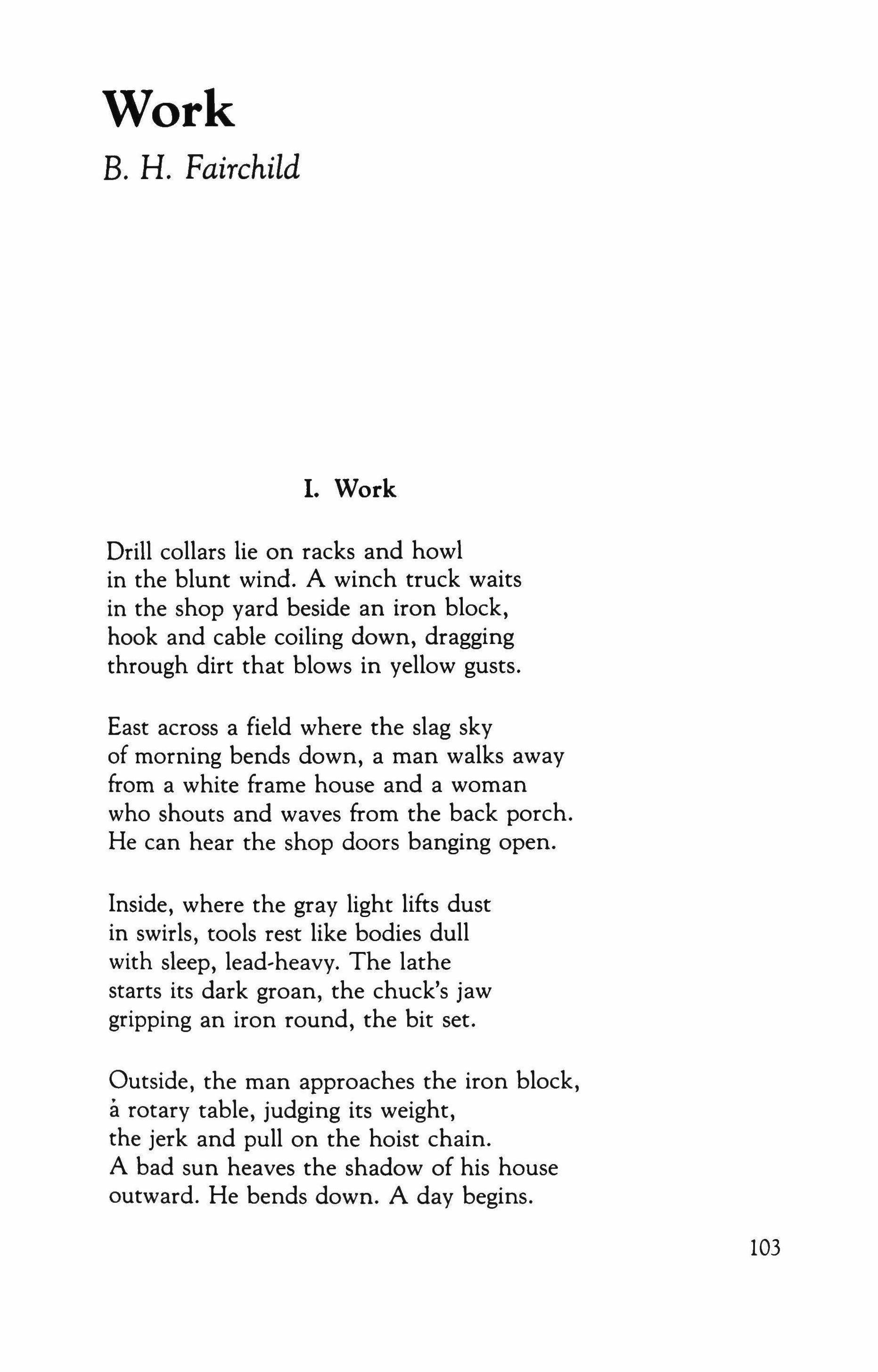
I. Work
Drill collars lie on racks and howl in the blunt wind. A winch truck waits in the shop yard beside an iron block, hook and cable coiling down, dragging through dirt that blows in yellow gusts.
East across a field where the slag sky of morning bends down, a man walks away from a white frame house and a woman who shouts and waves from the back porch. He can hear the shop doors banging open.
Inside, where the gray light lifts dust in swirls, tools rest like bodies dull with sleep, lead-heavy. The lathe starts its dark groan, the chuck's jaw gripping an iron round, the bit set.
Outside, the man approaches the iron block, a rotary table, judging its weight, the jerk and pull on the hoist chain. A bad sun heaves the shadow of his house outward. He bends down. A day begins.
103
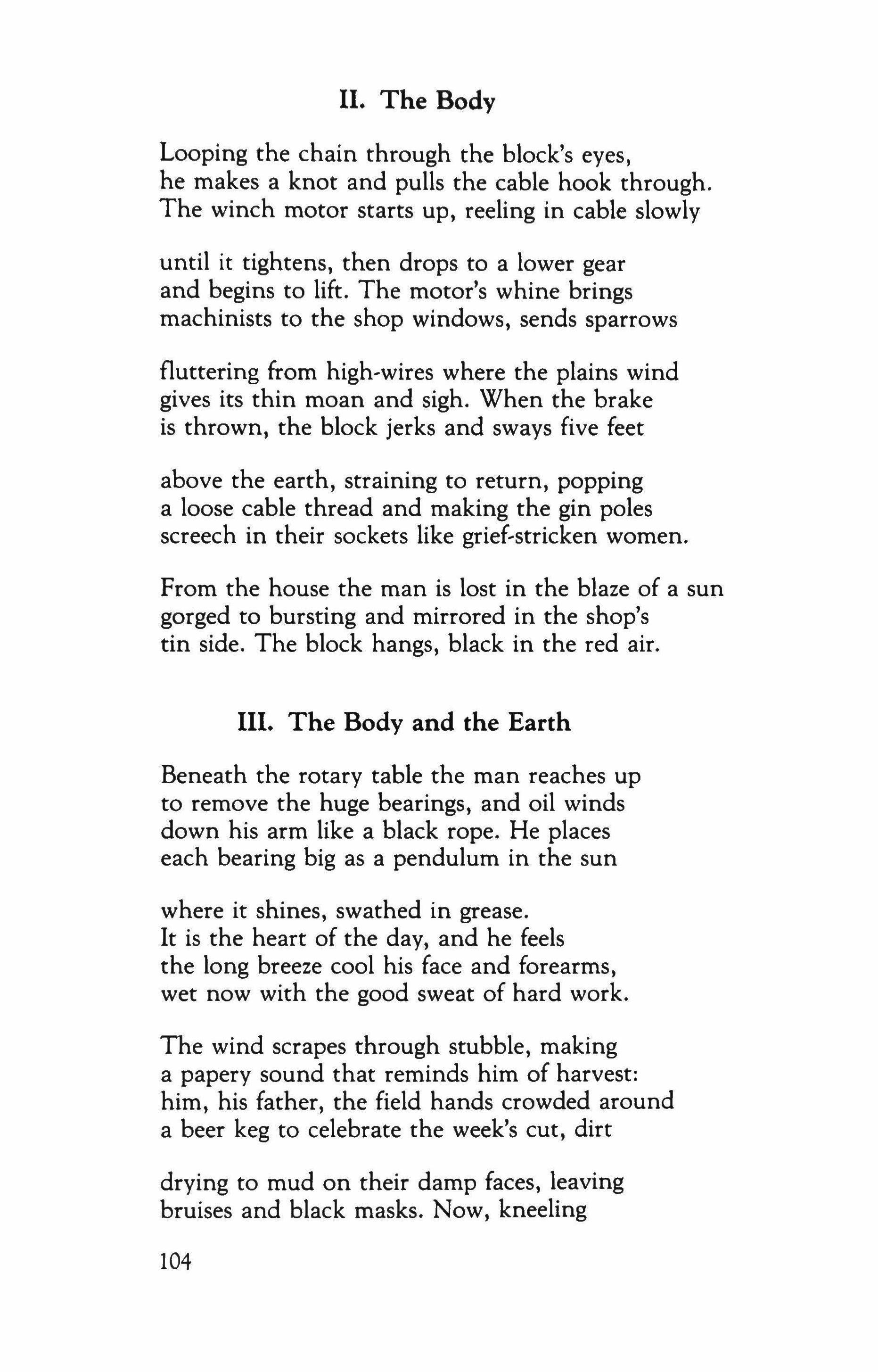
II. The Body
Looping the chain through the block's eyes, he makes a knot and pulls the cable hook through. The winch motor starts up, reeling in cable slowly
until it tightens, then drops to a lower gear and begins to lift. The motor's whine brings machinists to the shop windows, sends sparrows
fluttering from high-wires where the plains wind gives its thin moan and sigh. When the brake is thrown, the block jerks and sways five feet
above the earth, straining to return, popping a loose cable thread and making the gin poles screech in their sockets like grief-stricken women.
From the house the man is lost in the blaze of a sun gorged to bursting and mirrored in the shop's tin side. The block hangs, black in the red air.
III. The Body and the Earth
Beneath the rotary table the man reaches up to remove the huge bearings, and oil winds down his arm like a black rope. He places each bearing big as a pendulum in the sun
where it shines, swathed in grease. It is the heart of the day, and he feels the long breeze cool his face and forearms, wet now with the good sweat of hard work.
The wind scrapes through stubble, making a papery sound that reminds him of harvest: him, his father, the field hands crowded around a beer keg to celebrate the week's cut, dirt
drying to mud on their damp faces, leaving bruises and black masks. Now, kneeling
104
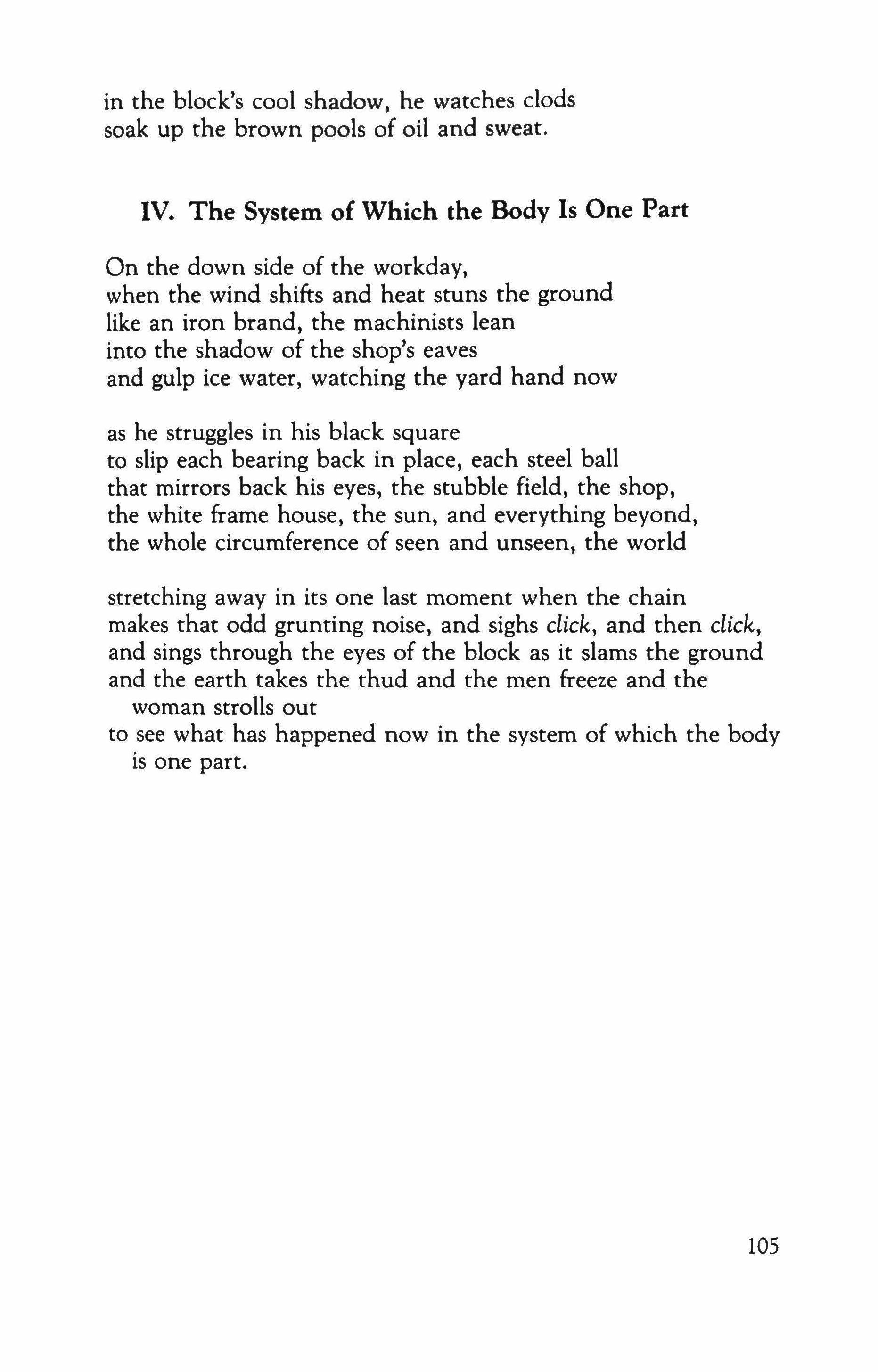
in the block's cool shadow, he watches clods soak up the brown pools of oil and sweat.
IV. The System of Which the Body Is One Part
On the down side of the workday, when the wind shifts and heat stuns the ground like an iron brand, the machinists lean into the shadow of the shop's eaves and gulp ice water, watching the yard hand now
as he struggles in his black square to slip each bearing back in place, each steel ball that mirrors back his eyes, the stubble field, the shop, the white frame house, the sun, and everything beyond, the whole circumference of seen and unseen, the world
stretching away in its one last moment when the chain makes that odd grunting noise, and sighs click, and then click, and sings through the eyes of the block as it slams the ground and the earth takes the thud and the men freeze and the woman strolls out to see what has happened now in the system of which the body is one part.
105
Private Worlds
Kavazeua Ngaruka
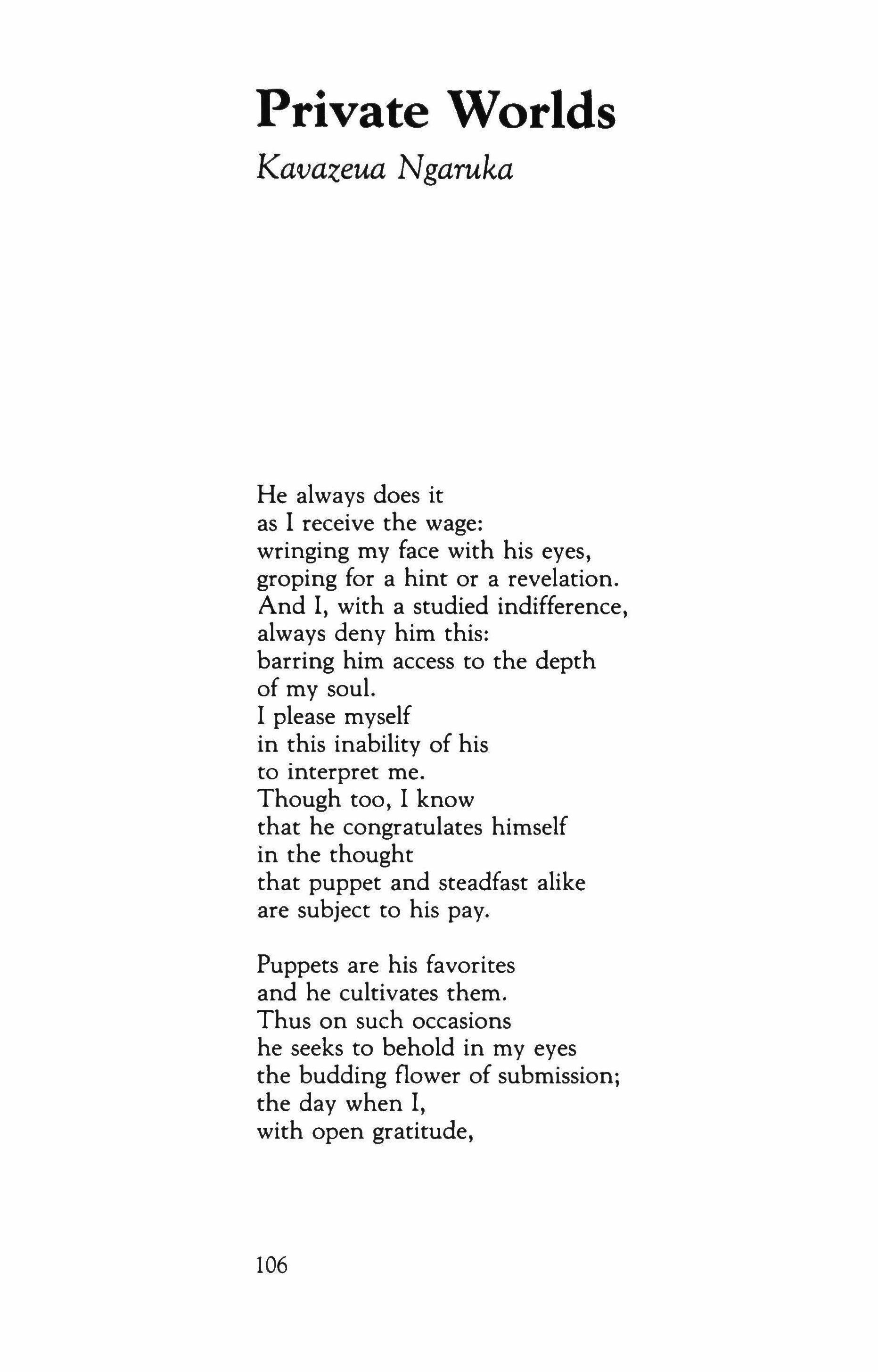
He always does it as I receive the wage: wringing my face with his eyes, groping for a hint or a revelation. And I, with a studied indifference, always deny him this: barring him access to the depth of my soul. I please myself in this inability of his to interpret me. Though too, I know that he congratulates himself in the thought that puppet and steadfast alike are subject to his pay.
Puppets are his favorites and he cultivates them. Thus on such occasions he seeks to behold in my eyes the budding flower of submission; the day when I, with open gratitude,
106
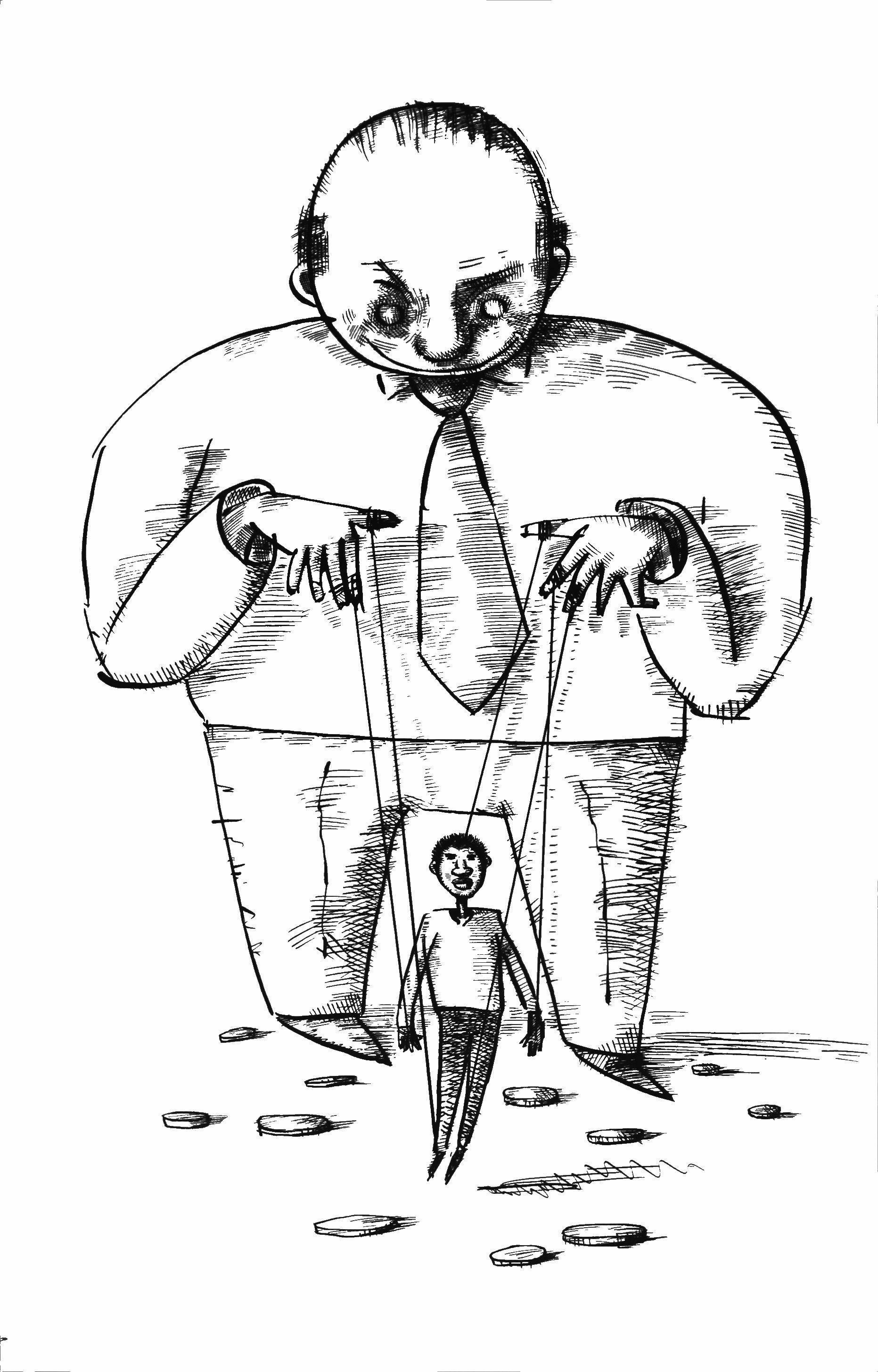
P-
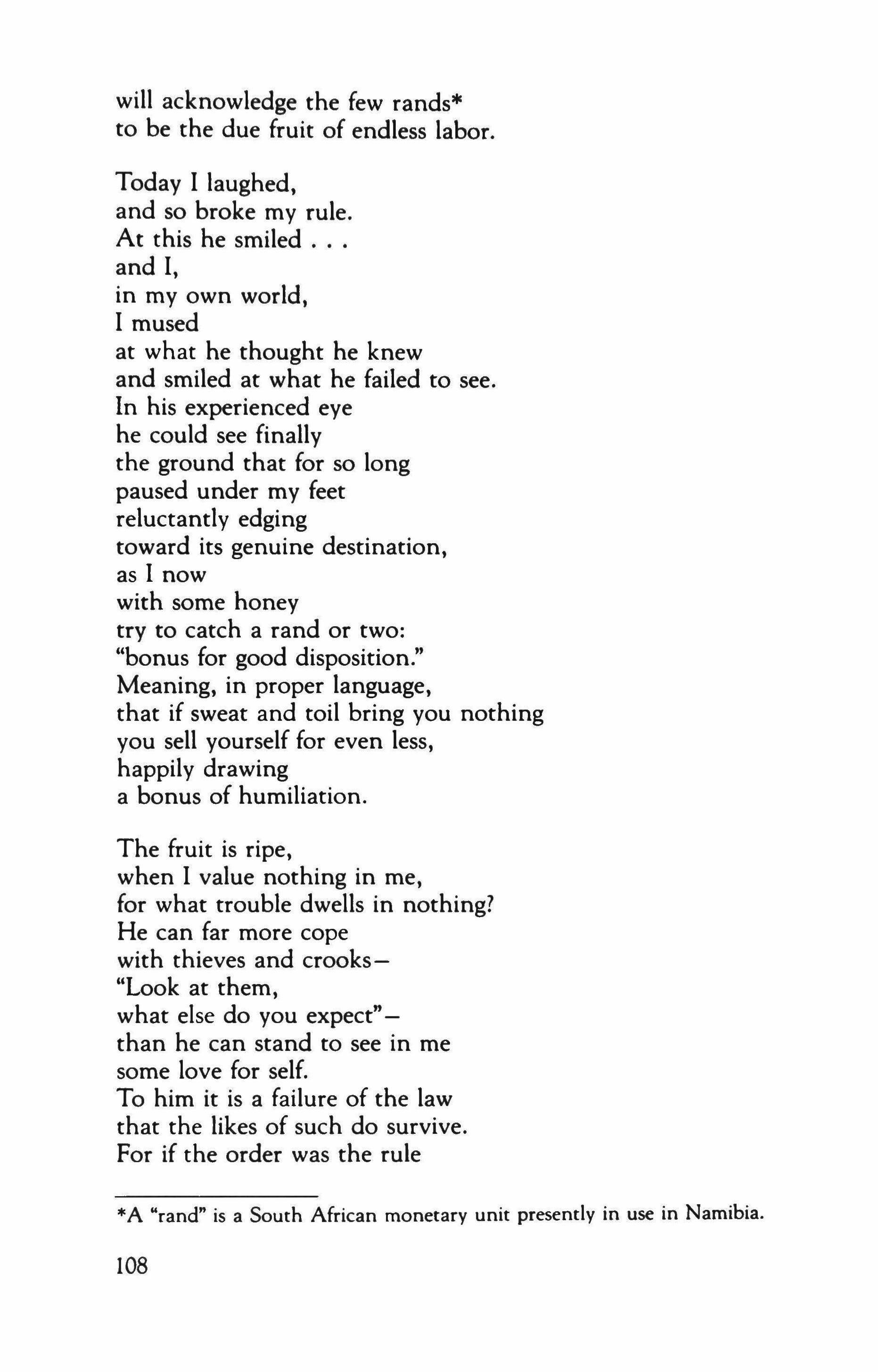
will acknowledge the few rands* to be the due fruit of endless labor.
Today I laughed, and so broke my rule. At this he smiled and I, in my own world, I mused at what he thought he knew and smiled at what he failed to see. In his experienced eye he could see finally the ground that for so long paused under my feet reluctantly edging toward its genuine destination, as I now with some honey try to catch a rand or two: "bonus for good disposition." Meaning, in proper language, that if sweat and toil bring you nothing you sell yourself for even less, happily drawing a bonus of humiliation.
The fruit is ripe, when I value nothing in me, for what trouble dwells in nothing? He can far more cope with thieves and crooks"Look at them, what else do you expect"than he can stand to see in me some love for self. To him it is a failure of the law that the likes of such do survive. For if the order was the rule
*A "rand" is a South African monetary unit presently in use in Namibia.
108
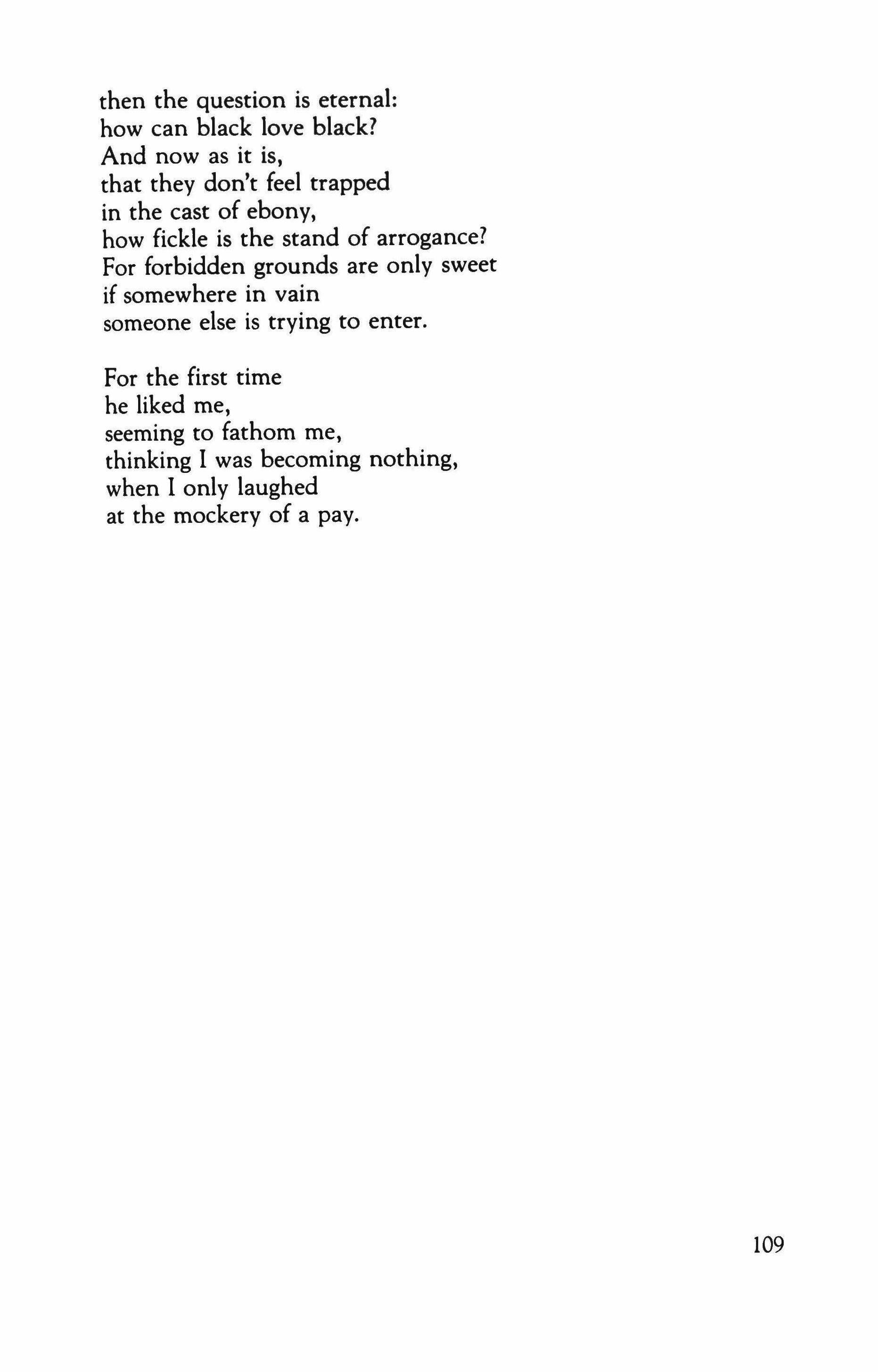
then the question is eternal: how can black love black? And now as it is, that they don't feel trapped in the cast of ebony, how fickle is the stand of arrogance? For forbidden grounds are only sweet if somewhere in vain someone else is trying to enter.
For the first time he liked me, seeming to fathom me, thinking I was becoming nothing, when I only laughed at the mockery of a pay.
109
The First Few Hours, Alone After Prison
Steve Fisher
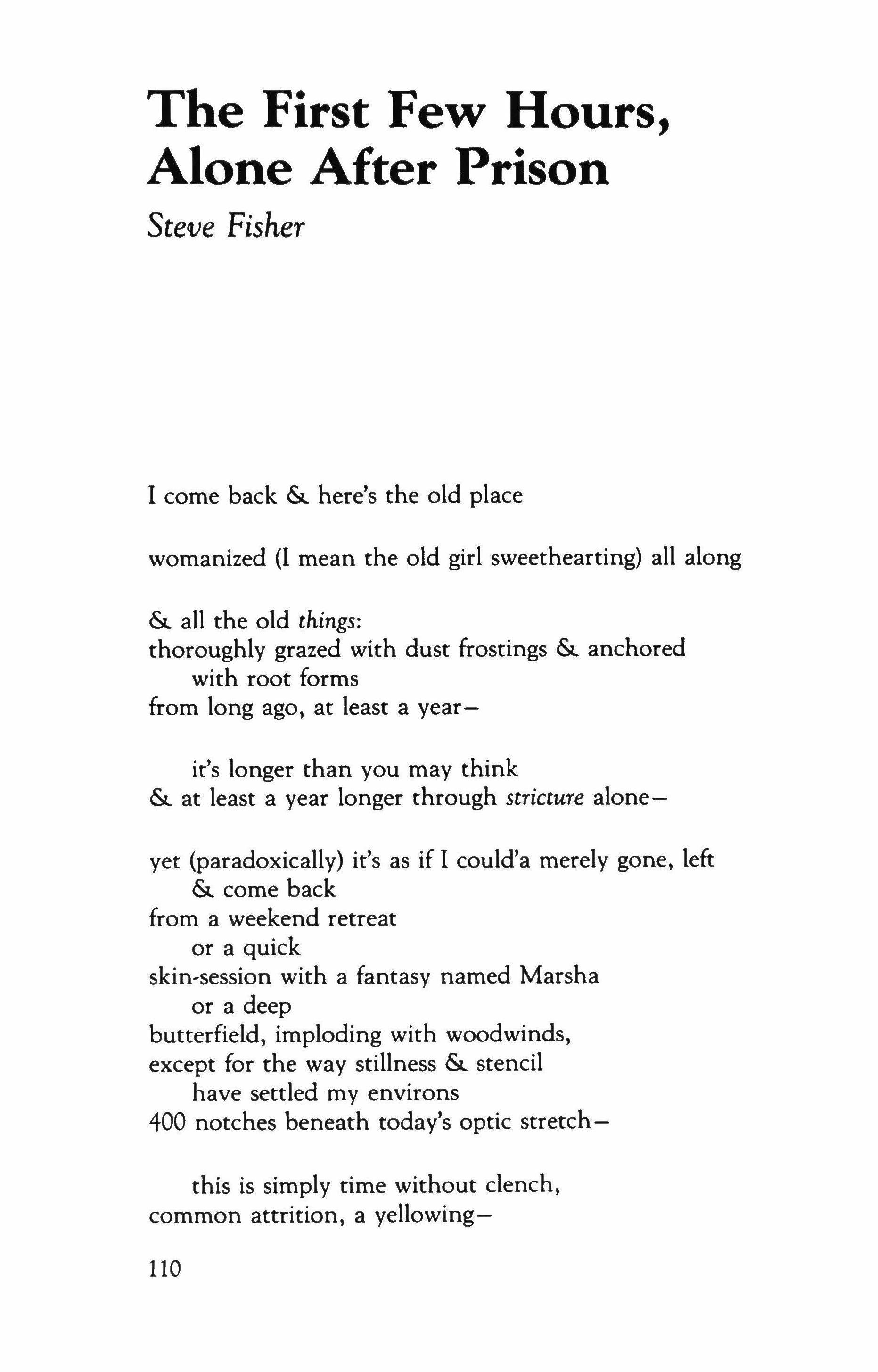
1 corne back & here's the old place
womanized (I mean the old girl sweethearting) all along & all the old things: thoroughly grazed with dust frostings & anchored with root forms from long ago, at least a year-
it's longer than you may think & at least a year longer through stricture alone-
yet (paradoxically) it's as if I could'a merely gone, left & corne back from a weekend retreat or a quick skin-session with a fantasy named Marsha or a deep butterfield, imploding with woodwinds, except for the way stillness & stencil have settled my environs 400 notches beneath today's optic stretchthis is simply time without clench, common attrition, a yellowing-
110
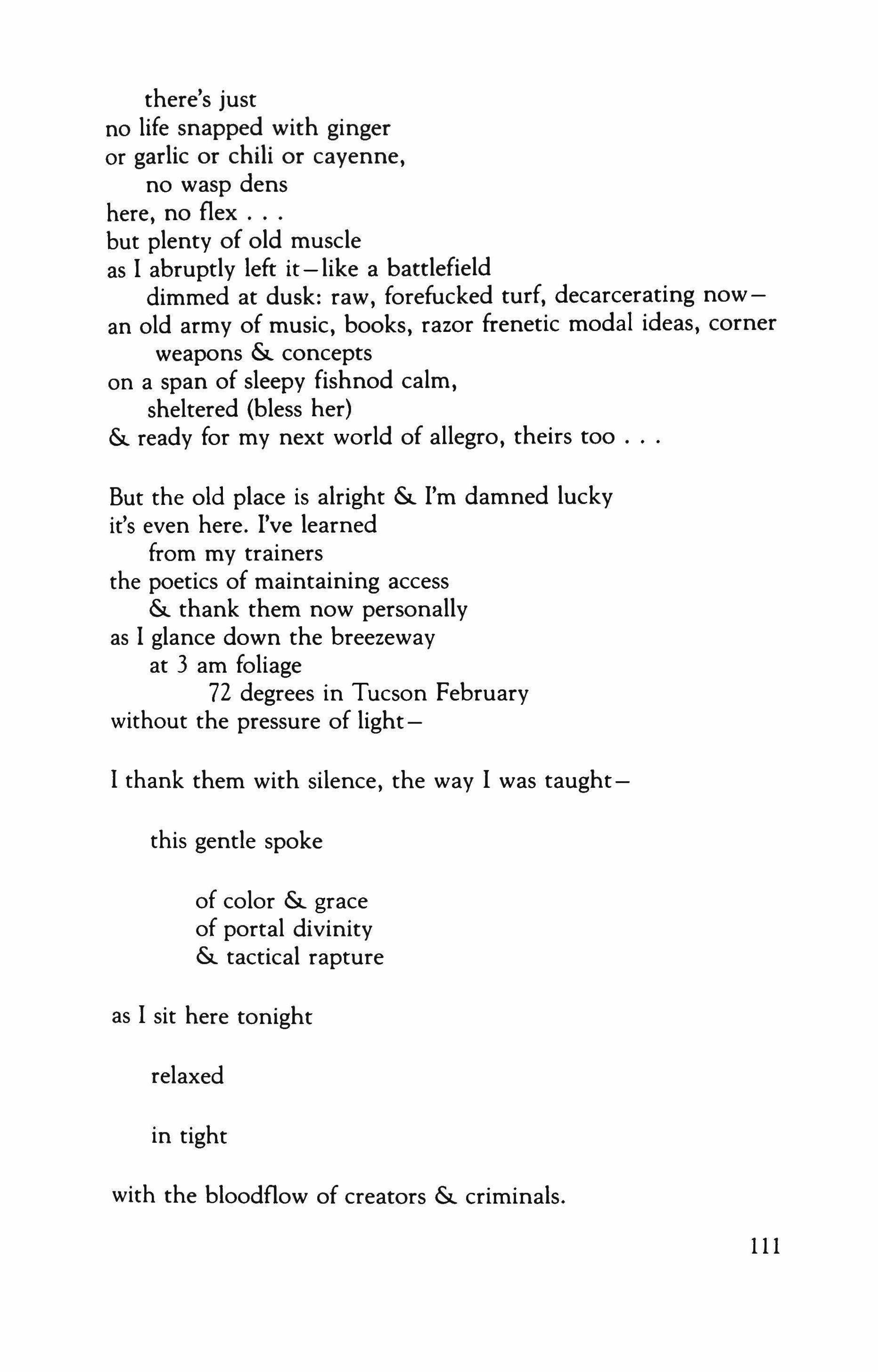
there's just no life snapped with ginger or garlic or chili or cayenne, no wasp dens here, no flex but plenty of old muscle as I abruptly left it -like a battlefield dimmed at dusk: raw, forefucked turf, decarcerating nowan old army of music, books, razor frenetic modal ideas, corner weapons & concepts on a span of sleepy fishnod calm, sheltered (bless her) & ready for my next world of allegro, theirs too
But the old place is alright & I'm damned lucky it's even here. I've learned from my trainers the poetics of maintaining access & thank them now personally as I glance down the breezeway at 3 am foliage 72 degrees in Tucson February without the pressure of light-
I thank them with silence, the way I was taughtthis gentle spoke of color & grace of portal divinity & tactical rapture as I sit here tonight relaxed in tight with the bloodflow of creators & criminals.
111
Three Poems
Bibhu Padhi
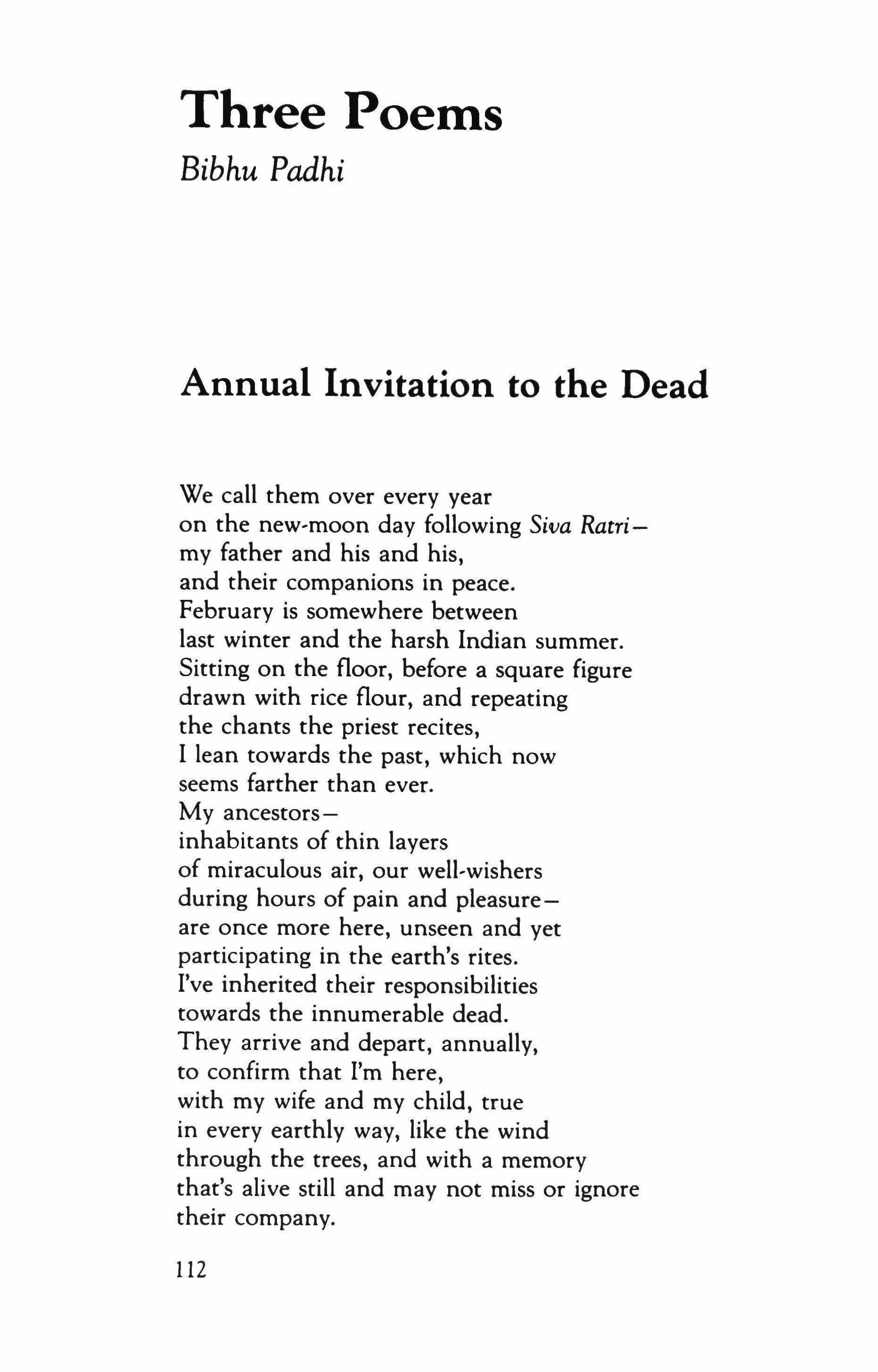
Annual Invitation to the Dead
We call them over every year on the new-moon day following Siva Ratrimy father and his and his, and their companions in peace. February is somewhere between last winter and the harsh Indian summer. Sitting on the floor, before a square figure drawn with rice flour, and repeating the chants the priest recites, I lean towards the past, which now seems farther than ever. My ancestorsinhabitants of thin layers of miraculous air, our well-wishers during hours of pain and pleasureare once more here, unseen and yet participating in the earth's rites. I've inherited their responsibilities towards the innumerable dead. They arrive and depart, annually, to confirm that I'm here, with my wife and my child, true in every earthly way, like the wind through the trees, and with a memory that's alive still and may not miss or ignore their company.
112
Stranger in the House
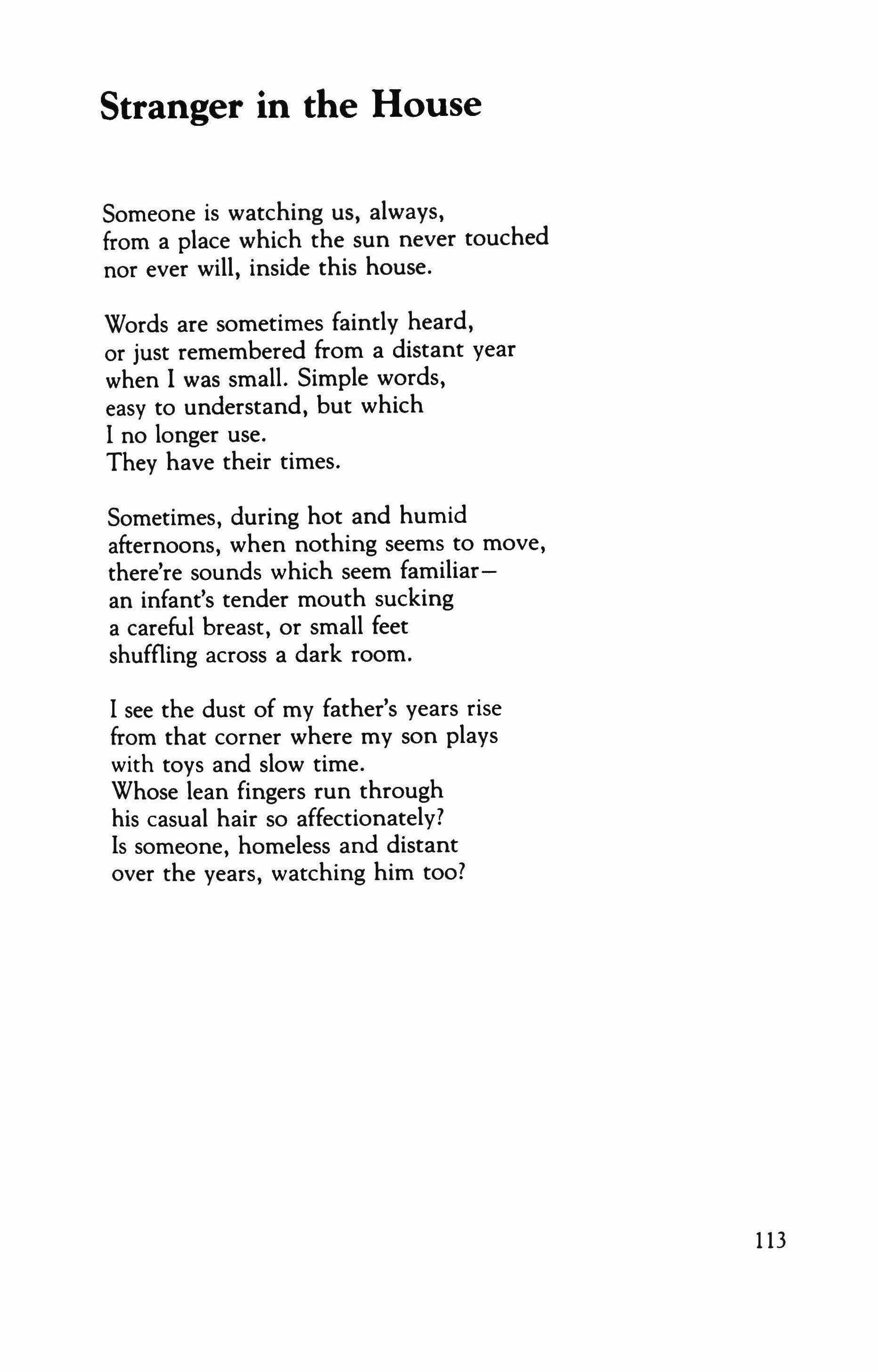
Someone is watching us, always, from a place which the sun never touched nor ever will, inside this house.
Words are sometimes faintly heard, or just remembered from a distant year when I was small. Simple words, easy to understand, but which I no longer use. They have their times.
Sometimes, during hot and humid afternoons, when nothing seems to move, there're sounds which seem familiaran infant's tender mouth sucking a careful breast, or small feet shuffling across a dark room.
I see the dust of my father's years rise from that corner where my son plays with toys and slow time. Whose lean fingers run through his casual hair so affectionately? Is someone, homeless and distant over the years, watching him too?
113
Looking for Things
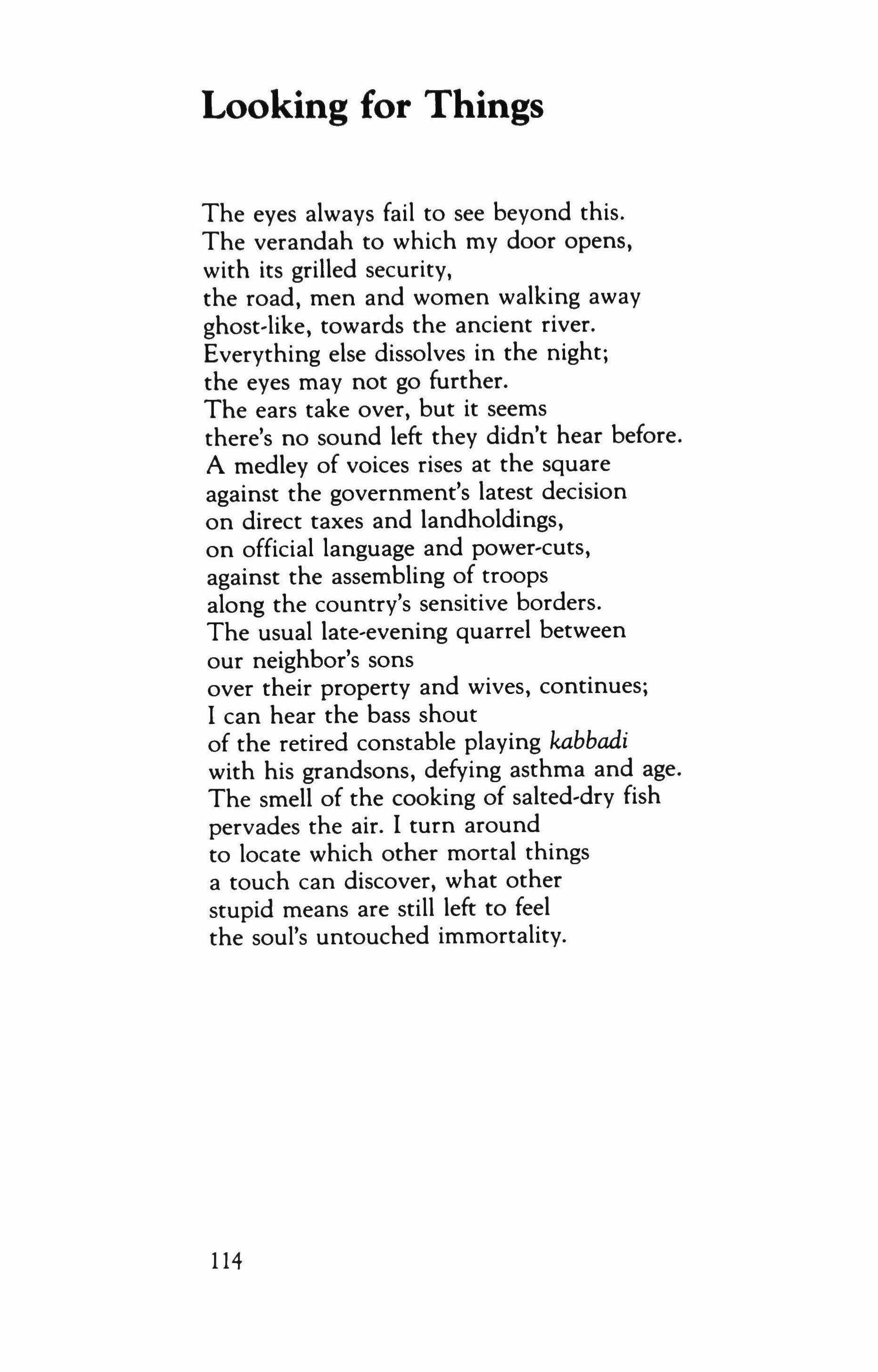
The eyes always fail to see beyond this. The verandah to which my door opens, with its grilled security, the road, men and women walking away ghost-like, towards the ancient river. Everything else dissolves in the night; the eyes may not go further. The ears take over, but it seems there's no sound left they didn't hear before. A medley of voices rises at the square against the government's latest decision on direct taxes and landholdings, on official language and power-cuts, against the assembling of troops along the country's sensitive borders. The usual late-evening quarrel between our neighbor's sons over their property and wives, continues; I can hear the bass shout of the retired constable playing kabbadi with his grandsons, defying asthma and age. The smell of the cooking of salted-dry fish pervades the air. I turn around to locate which other mortal things a touch can discover, what other stupid means are still left to feel the soul's untouched immortality.
114
Three Poems
Sterling Plumpp
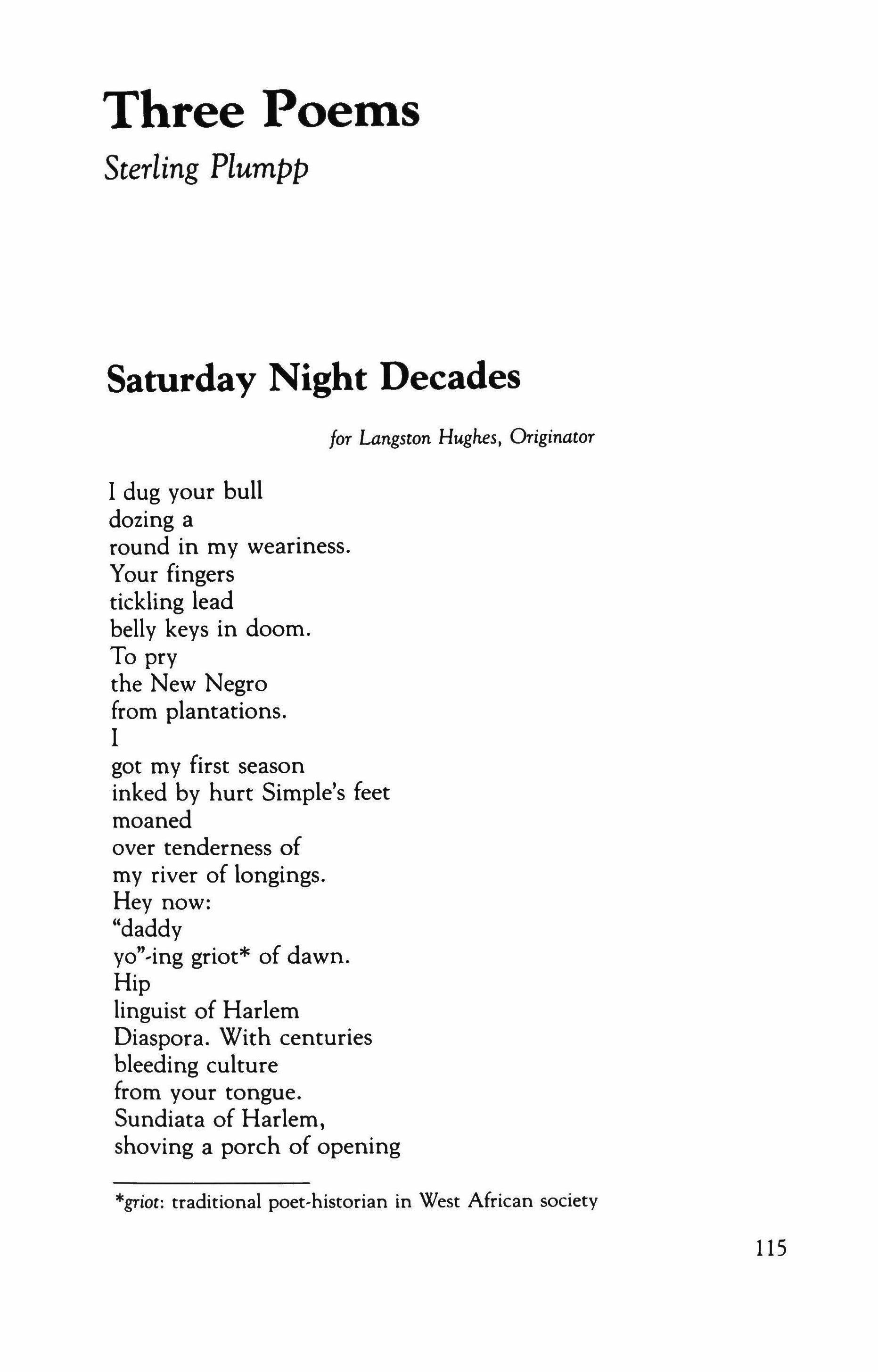
Saturday Night Decades
for Langston Hughes, Originator
I dug your bull dozing a round in my weariness. Your fingers tickling lead belly keys in doom. To pry the New Negro from plantations. I got my first season inked by hurt Simple's feet moaned over tenderness of my river of longings. Hey now: "daddy yo"-ing griot* of dawn. Hip linguist of Harlem Diaspora. With centuries bleeding culture from your tongue. Sundiata of Harlem, shoving a porch of opening
*griot: traditional poet-historian in West African society
115
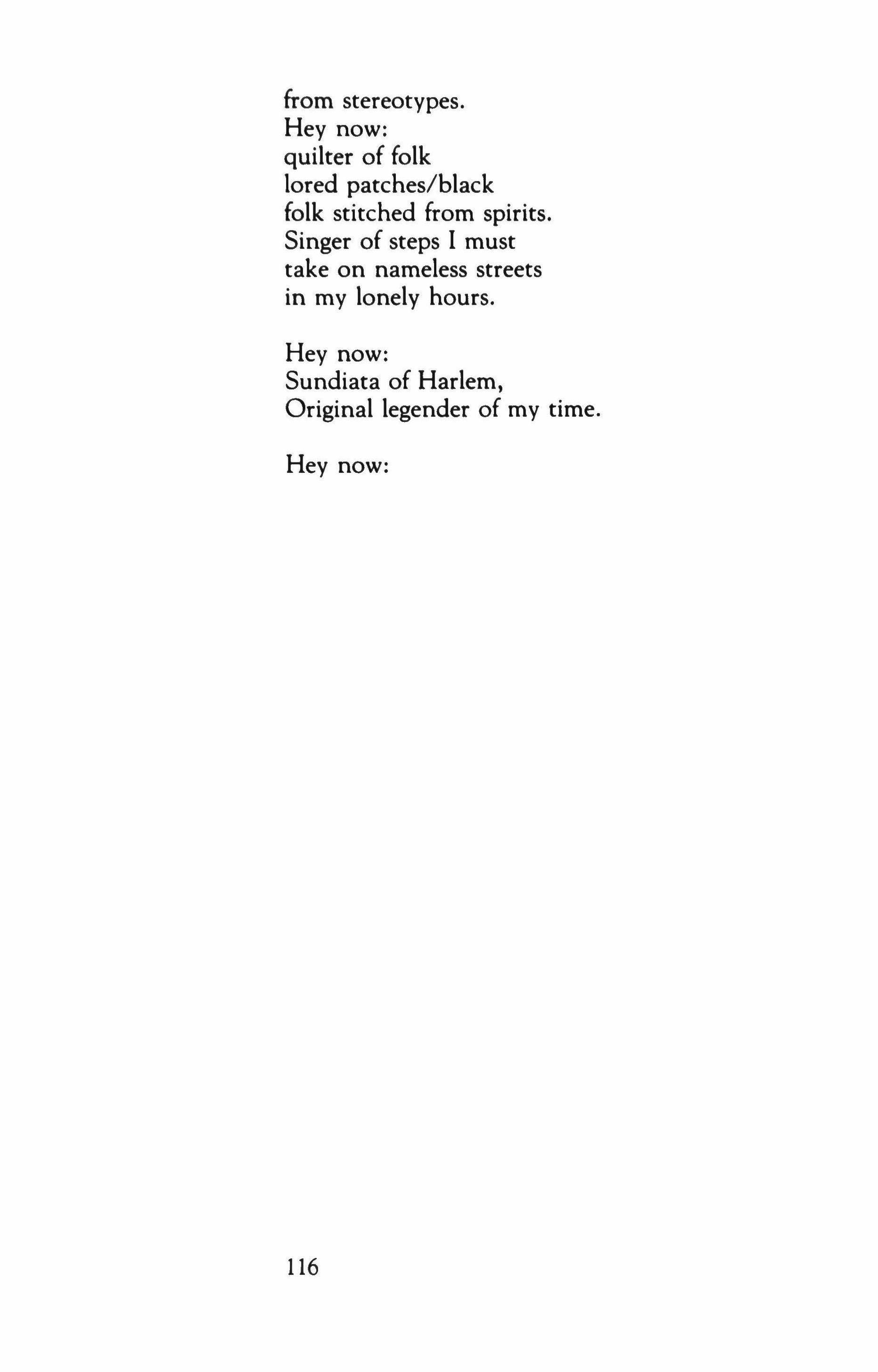
from stereotypes.
Hey now: quilter of folk lored patches/black folk stitched from spirits. Singer of steps I must take on nameless streets in my lonely hours.
Hey now: Sundiata of Harlem, Original legender of my time.
Hey now:
116
Muddy Waters
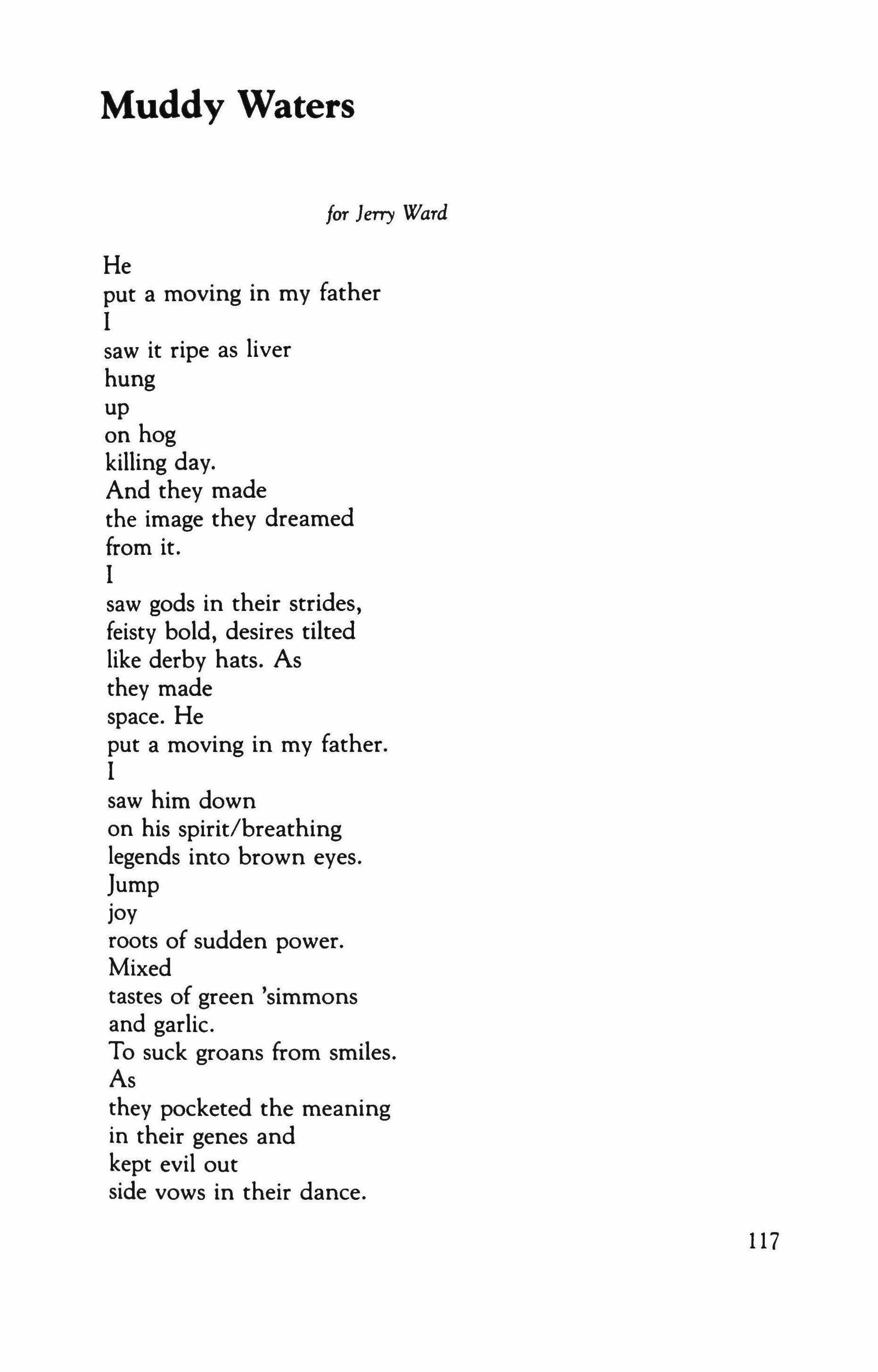
for Jerry Ward
He put a moving in my father I saw it ripe as liver hung up on hog killing day. And they made the image they dreamed from it. I saw gods in their strides, feisty bold, desires tilted like derby hats. As they made space. He put a moving in my father. I saw him down on his spirit/breathing legends into brown eyes. Jump joy roots of sudden power. Mixed tastes of green 'simmons and garlic. To suck groans from smiles. As they pocketed the meaning in their genes and kept evil out side vows in their dance.
117
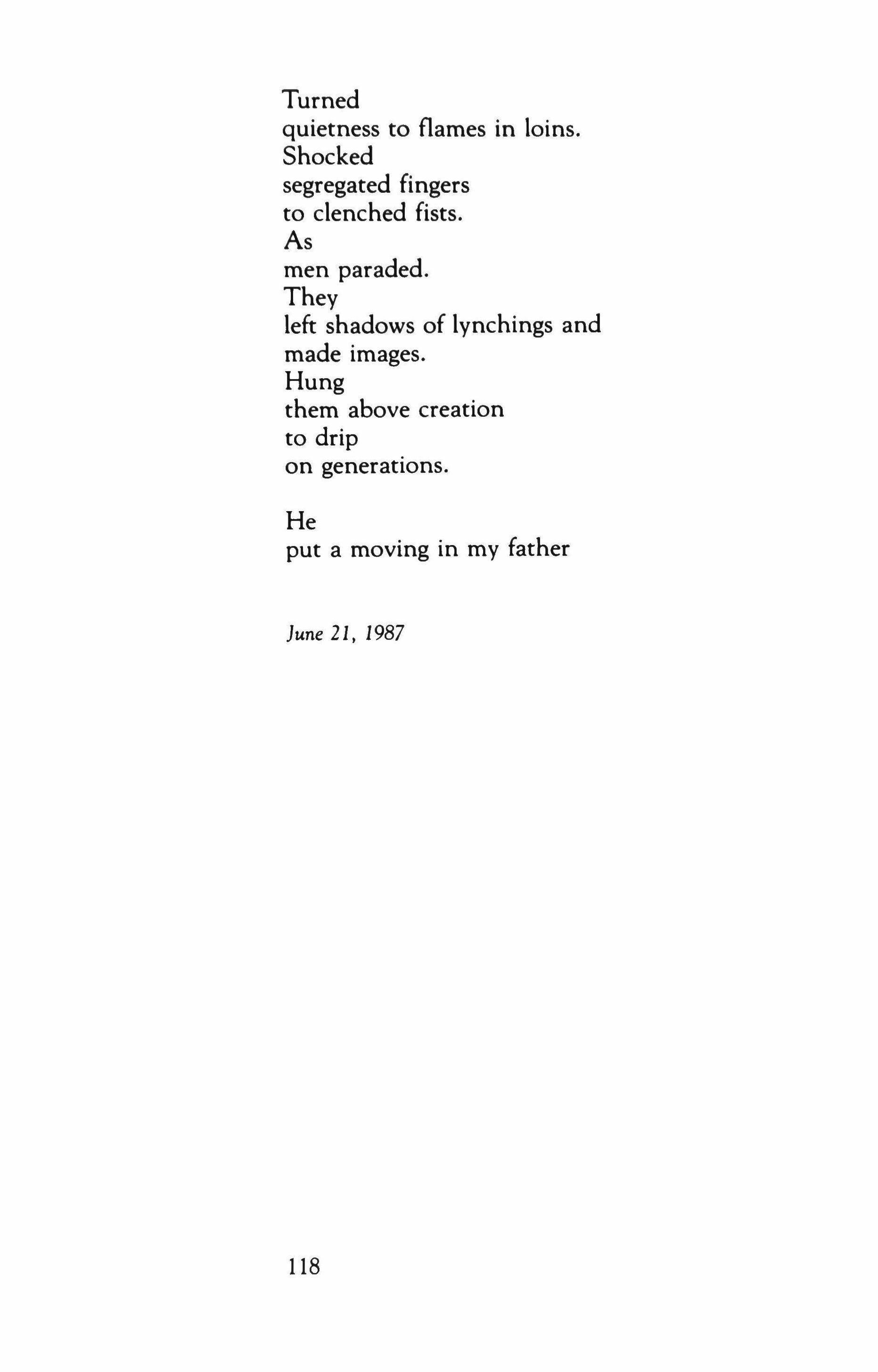
Turned quietness to flames in loins. Shocked segregated fingers to clenched fists. As men paraded. They left shadows of lynchings and made images. Hung them above creation to drip on generations. He put a moving in my father
june 21, 1987
118
Robert Johnson
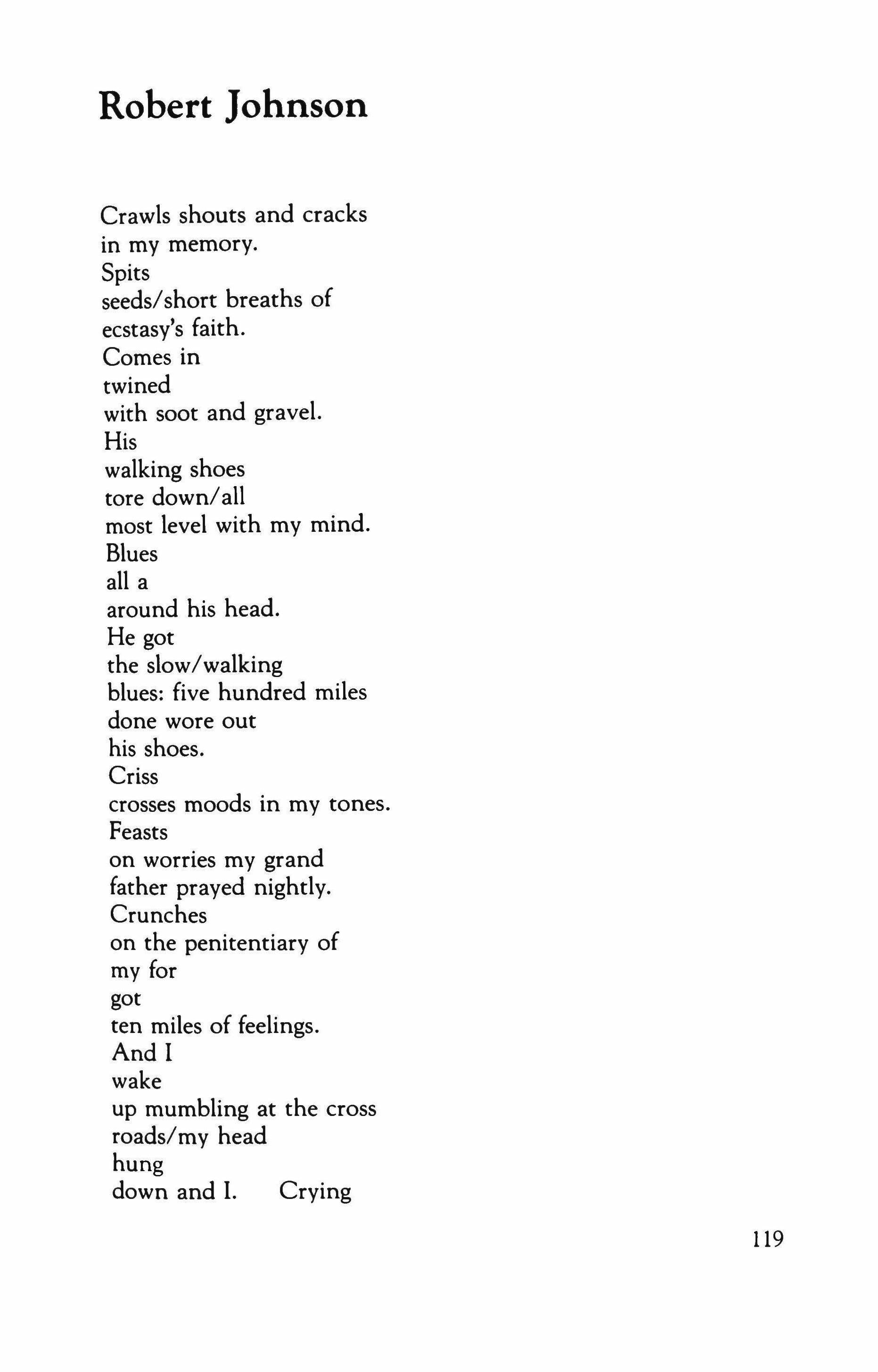
Crawls shouts and cracks in my memory. Spits seeds/short breaths of ecstasy's faith. Comes in twined with soot and gravel. His walking shoes tore down/all most level with my mind. Blues all a around his head. He got the slow/walking blues: five hundred miles done wore out his shoes. Criss crosses moods in my tones. Feasts on worries my grand father prayed nightly. Crunches on the penitentiary of my for got ten miles of feelings. And I wake up mumbling at the cross roads/my head hung down and l. Crying
119
poison/whips hissed-screamed in my past. And the windows/painted with blood in my soul crack. As he shouts my future in a half cry/half late evening moon and I.
Crawl a thousand steps/for his voice. Hell hounds on my trail Hell hounds on my trail.
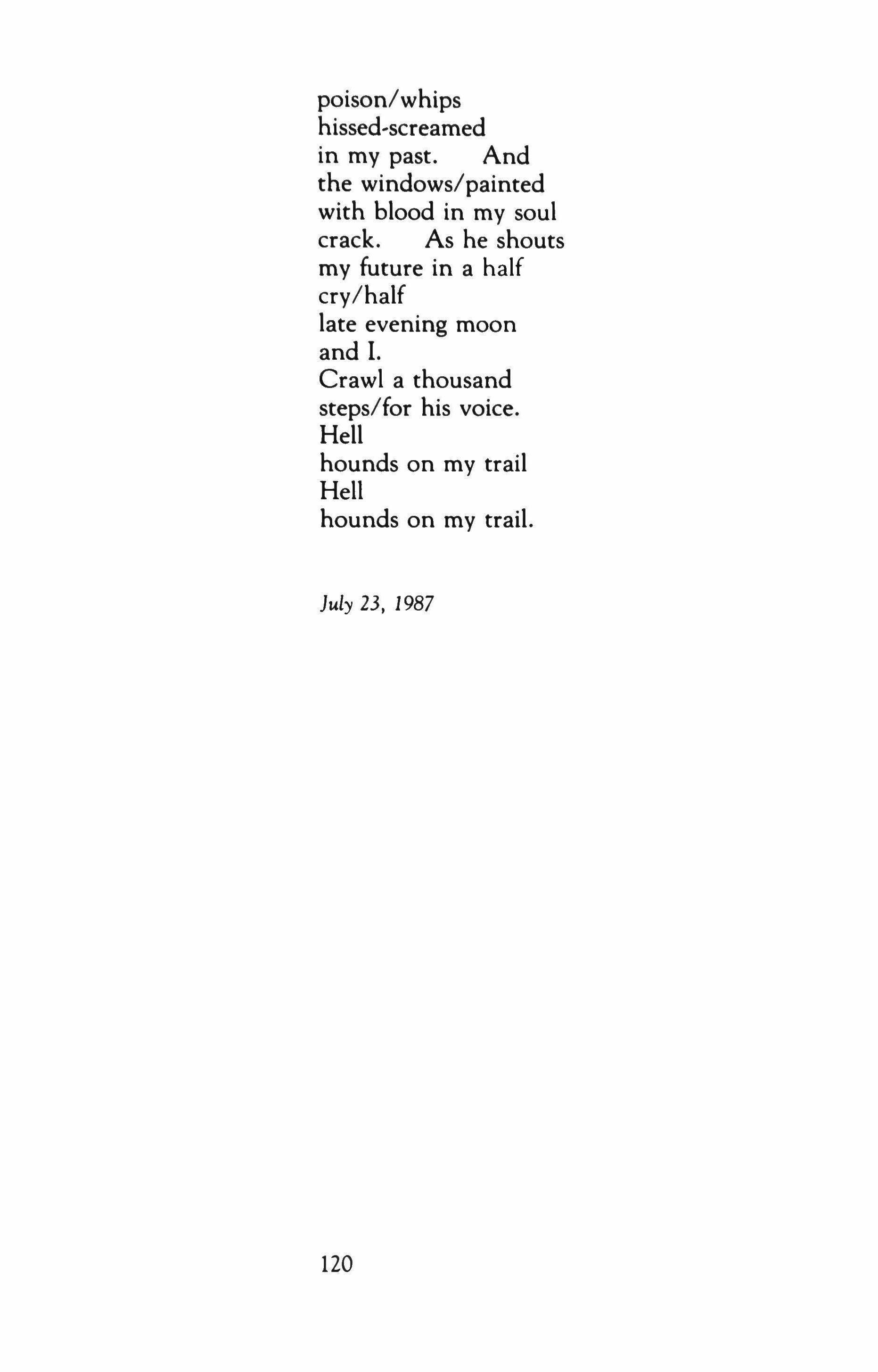
July 23, 1987
120
Three Poems
Roland Flint
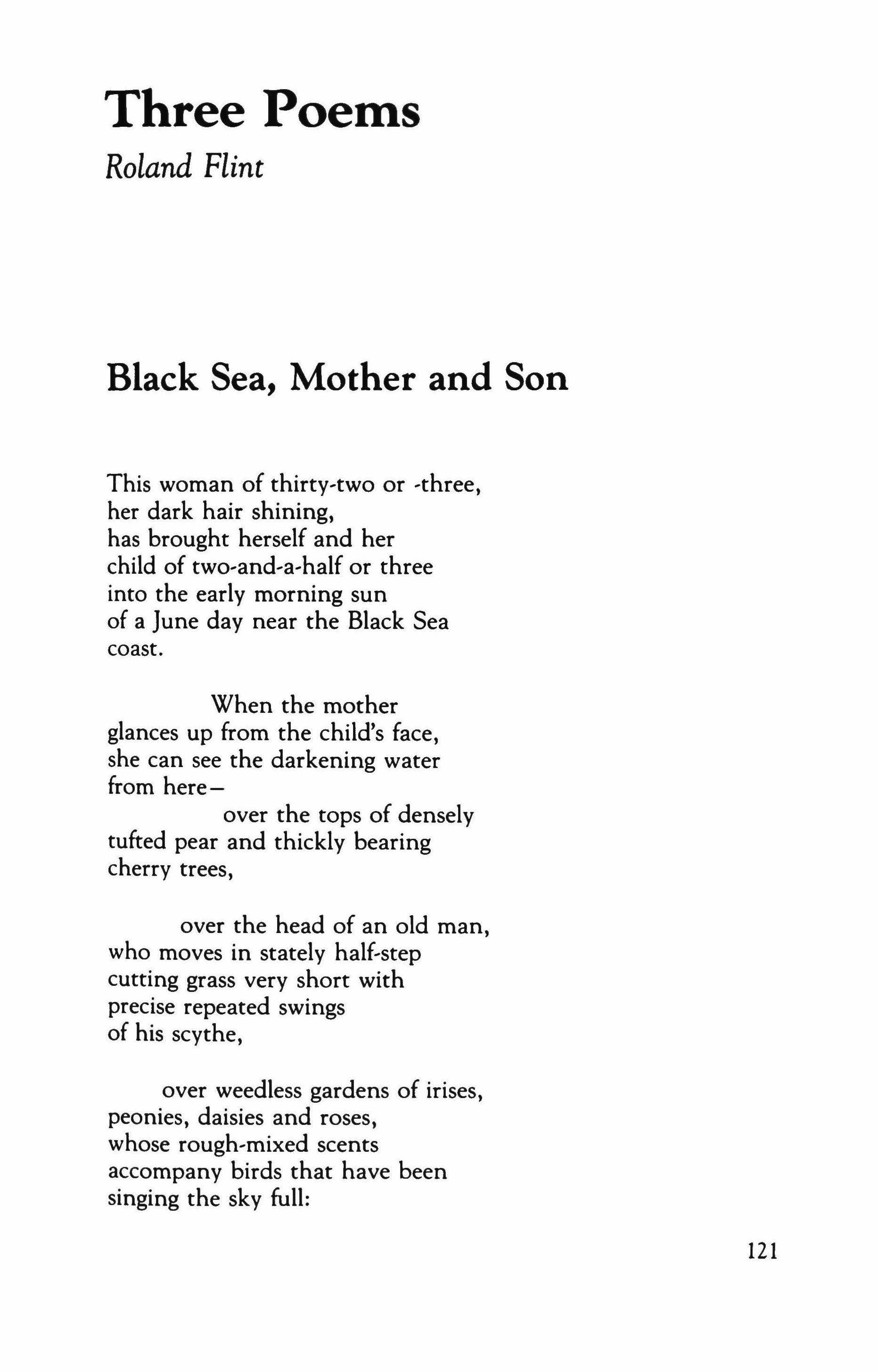
Black Sea, Mother and Son
This woman of thirty-two or -three, her dark hair shining, has brought herself and her child of two-and-a-half or three into the early morning sun of a June day near the Black Sea coast.
When the mother glances up from the child's face, she can see the darkening water from here-
over the tops of densely tufted pear and thickly bearing cherry trees,
over the head of an old man, who moves in stately half-step cutting grass very short with precise repeated swings of his scythe,
over weedless gardens of irises, peonies, daisies and roses, whose rough-mixed scents accompany birds that have been singing the sky full:
121
earlier, the song of nightingales, but mostly, now, a throaty treble of swallows.
Because it is June, when poplars winnow the blue skies ragged they yield a snowy summer cotton, which women have been sweeping up since dawn before rinsing the terrace stones, so vacationers at white tables may take the sun with tea, like cheese with bread, while looking up to receive as well the odd comfort of a flying sea.
And here the mother has been charming her son to eat his cupful of milk and bread and honey, while she drinks the sweet black Turkish coffee she loves.
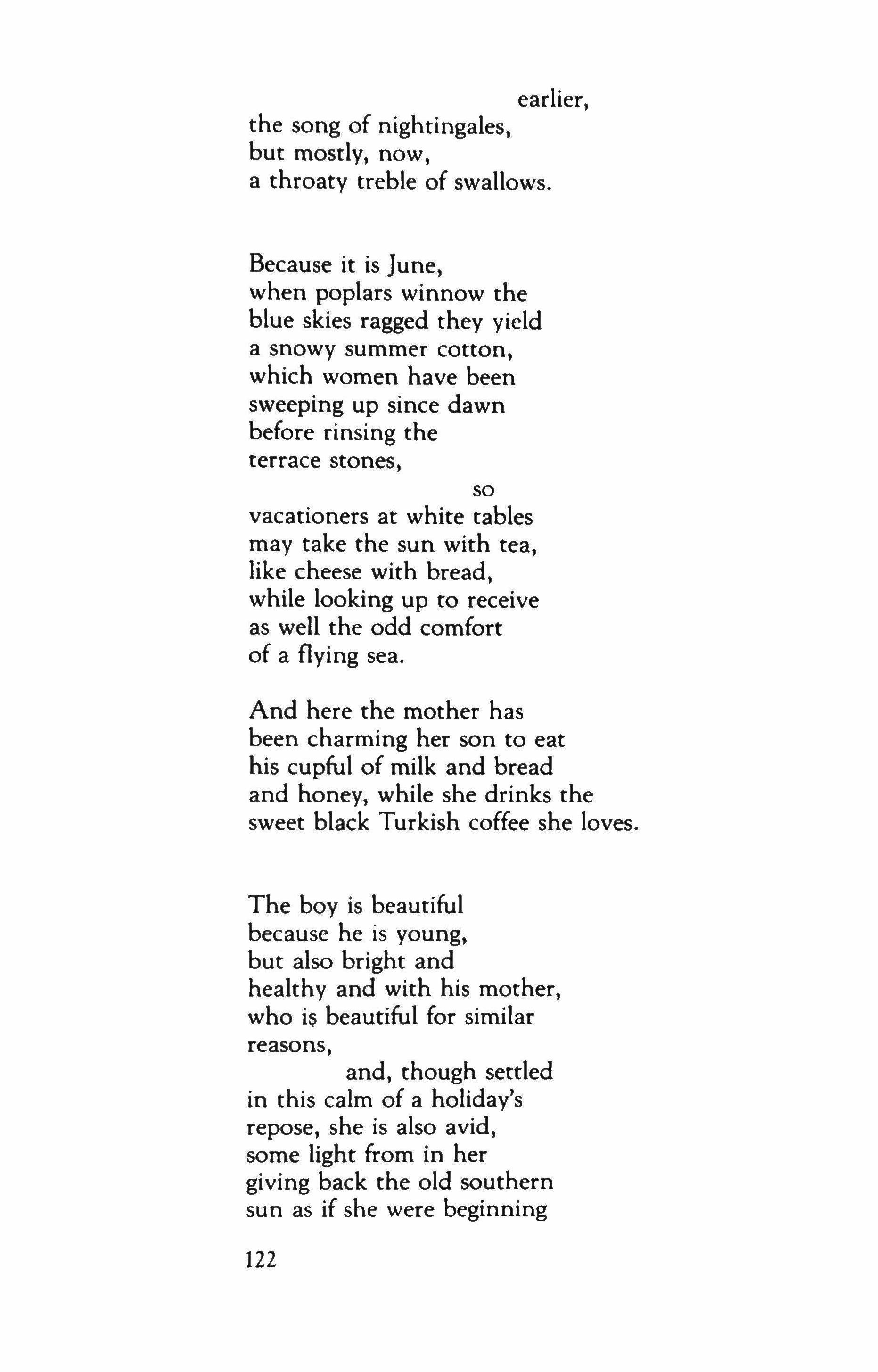
The boy is beautiful because he is young, but also bright and healthy and with his mother, who is beautiful for similar reasons, and, though settled in this calm of a holiday's repose, she is also avid, some light from in her giving back the old southern sun as if she were beginning
122
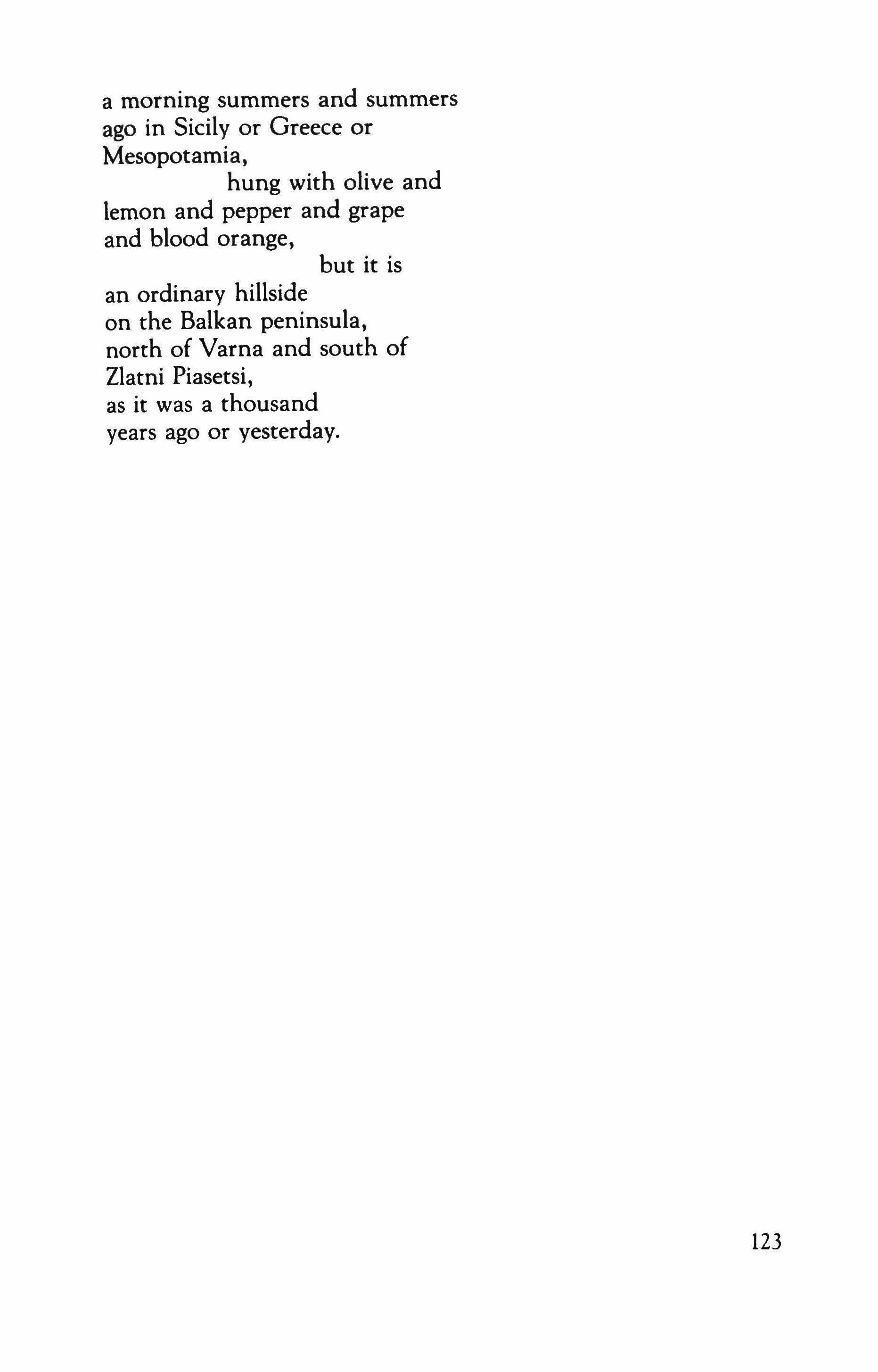
a morning summers and summers ago in Sicily or Greece or Mesopotamia, hung with olive and lemon and pepper and grape and blood orange, but it is an ordinary hillside on the Balkan peninsula, north of Varna and south of Zlatni Piasetsi, as it was a thousand years ago or yesterday.
123
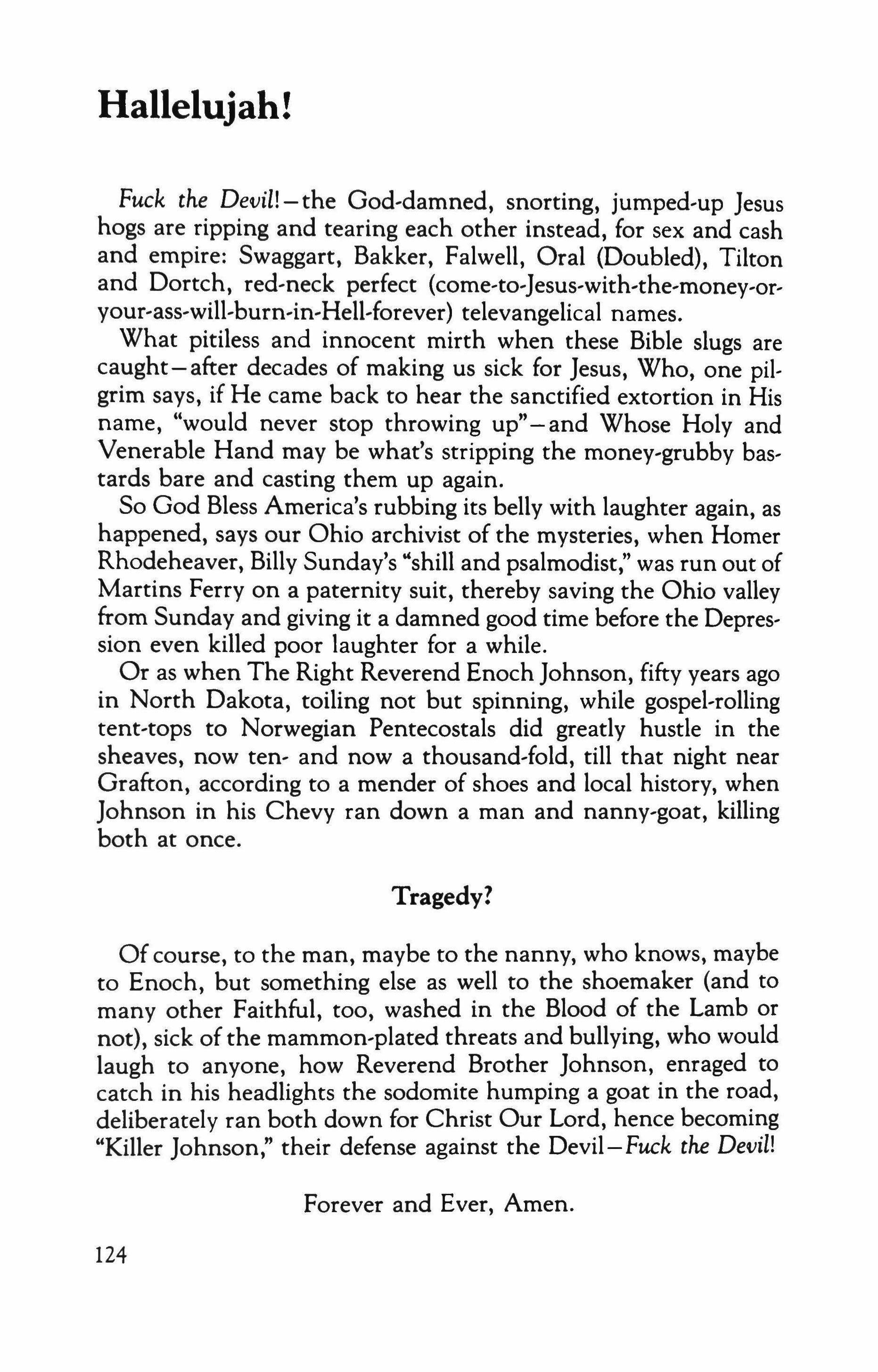
Hallelujah!
Fuck the Devil! - the God-damned, snorting, jumped-up Jesus hogs are ripping and tearing each other instead, for sex and cash and empire: Swaggart, Bakker, Falwell, Oral (Doubled), Tilton and Dortch, red-neck perfect (come-to-jesus-with-the-money-oryour-ass-will-burn-in-Hell-forever) televangelical names.
What pitiless and innocent mirth when these Bible slugs are caught - after decades of making us sick for Jesus, Who, one pilgrim says, if He came back to hear the sanctified extortion in His name, "would never stop throwing up" - and Whose Holy and Venerable Hand may be what's stripping the money-grubby bas, tards bare and casting them up again.
So God Bless America's rubbing its belly with laughter again, as happened, says our Ohio archivist of the mysteries, when Homer Rhodeheaver, Billy Sunday's "shill and psalmodist," was run out of Martins Ferry on a paternity suit, thereby saving the Ohio valley from Sunday and giving it a damned good time before the Depression even killed poor laughter for a while.
Or as when The Right Reverend Enoch Johnson, fifty years ago in North Dakota, toiling not but spinning, while gospel-rolling rent-tops to Norwegian Pentecostals did greatly hustle in the sheaves, now ten, and now a thousand-fold, till that night near Grafton, according to a mender of shoes and local history, when Johnson in his Chevy ran down a man and nanny-goat, killing both at once.
Tragedy?
Of course, to the man, maybe to the nanny, who knows, maybe to Enoch, but something else as well to the shoemaker (and to many other Faithful, too, washed in the Blood of the Lamb or not), sick of the mammon-plated threats and bullying, who would laugh to anyone, how Reverend Brother Johnson, enraged to catch in his headlights the sodomite humping a goat in the road, deliberately ran both down for Christ Our Lord, hence becoming "Killer Johnson," their defense against the Devil-Fuck the Devil!
Forever and Ever, Amen.
124
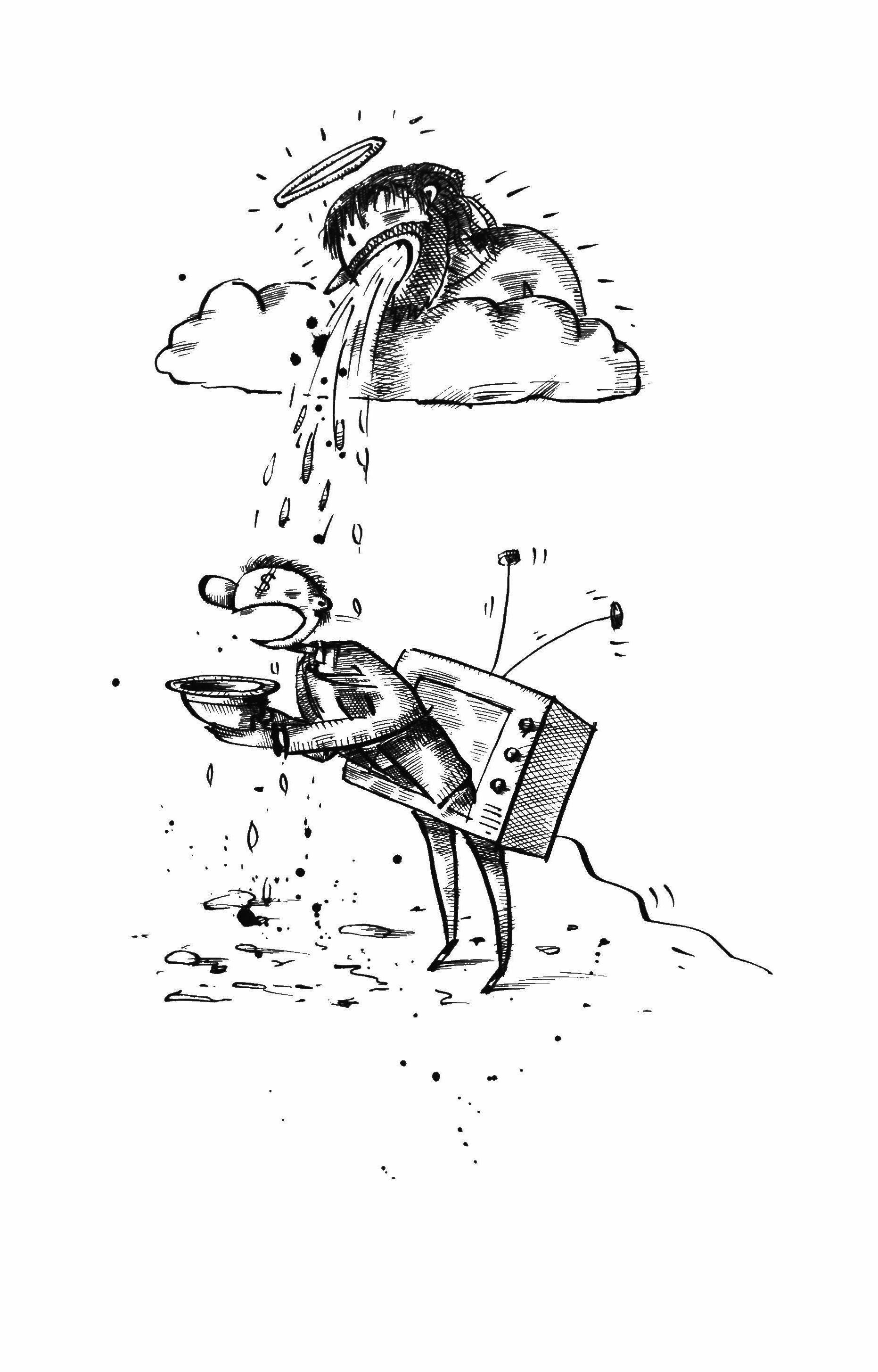
• •
Chop
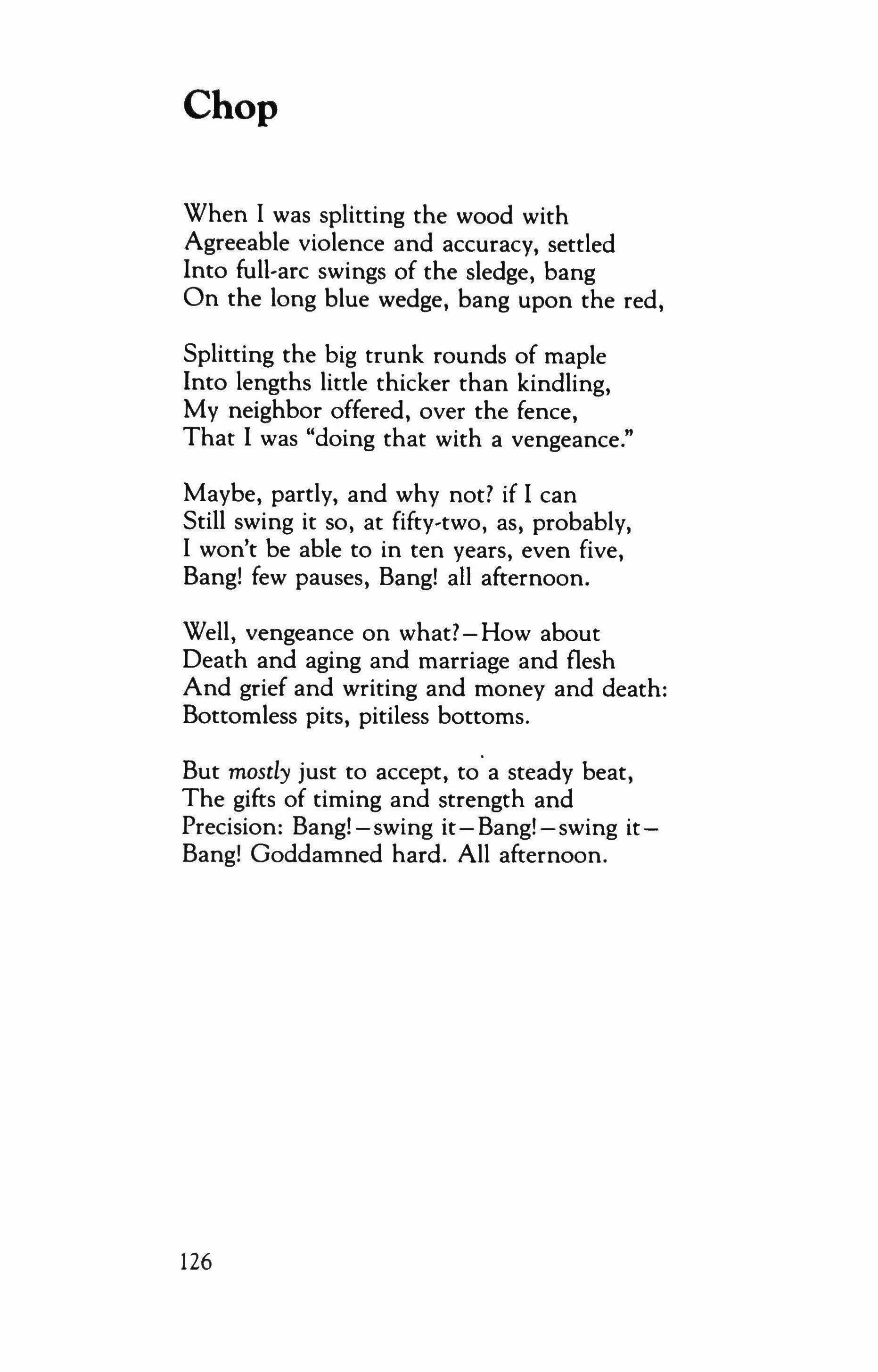
When I was splitting the wood with Agreeable violence and accuracy, settled Into full-arc swings of the sledge, bang On the long blue wedge, bang upon the red,
Splitting the big trunk rounds of maple Into lengths little thicker than kindling, My neighbor offered, over the fence, That I was "doing that with a vengeance."
Maybe, partly, and why not? if I can Still swing it so, at fifty-two, as, probably, I won't be able to in ten years, even five, Bang! few pauses, Bang! all afternoon.
Well, vengeance on what? - How about Death and aging and marriage and flesh And grief and writing and money and death: Bottomless pits, pitiless bottoms.
But mostly just to accept, to' a steady beat, The gifts of timing and strength and Precision: Bang! - swing it - Bang! - swing itBang! Goddamned hard. All afternoon.
126
Four Poems
Pattiann Rogers
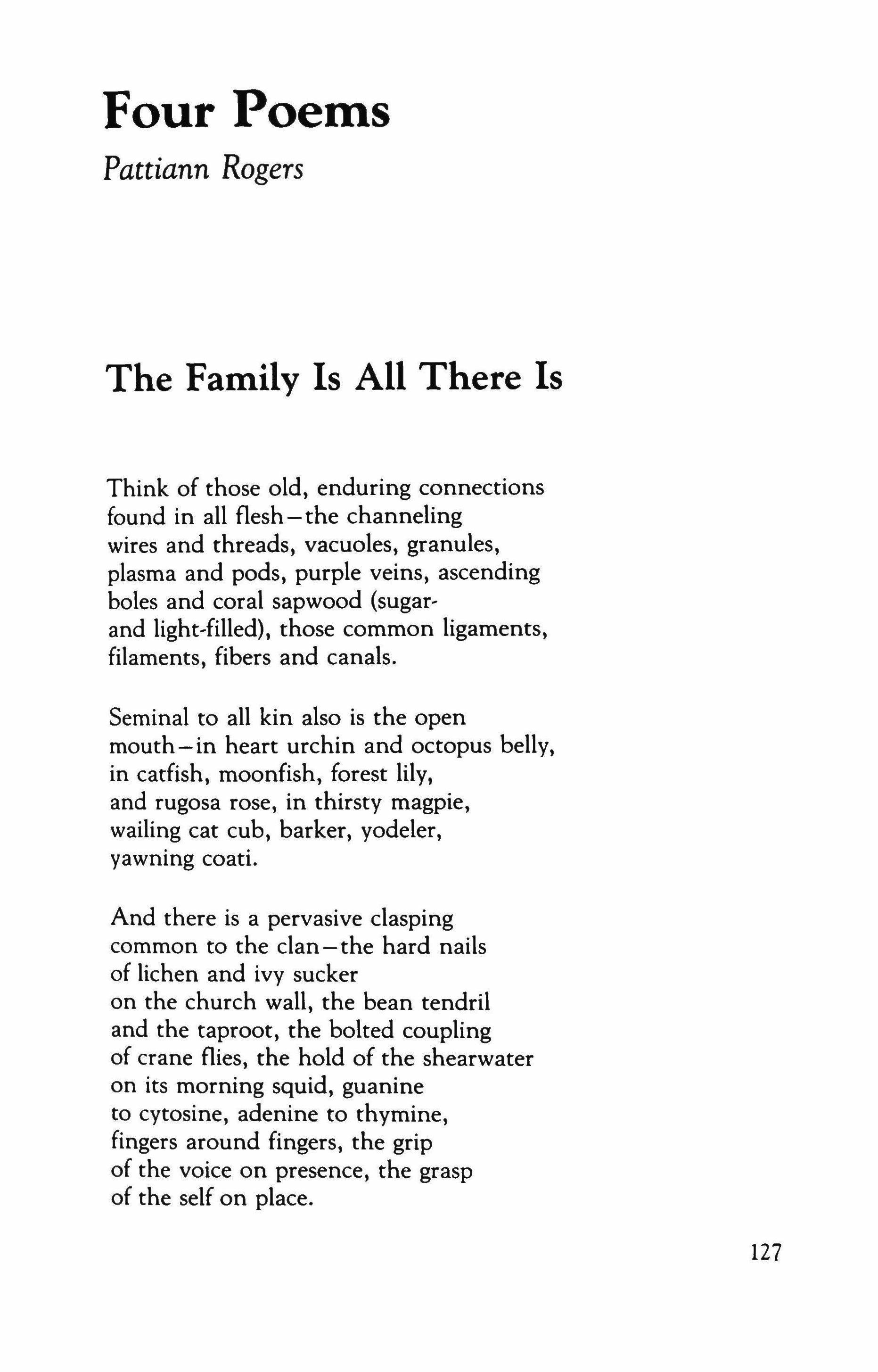
The Family Is All There Is
Think of those old, enduring connections found in all flesh - the channeling wires and threads, vacuoles, granules, plasma and pods, purple veins, ascending boles and coral sapwood (sugarand light-filled), those common ligaments, filaments, fibers and canals.
Seminal to all kin also is the open mouth-in heart urchin and octopus belly, in catfish, moonfish, forest lily, and rugosa rose, in thirsty magpie, wailing cat cub, barker, yodeler, yawning coati.
And there is a pervasive clasping common to the clan - the hard nails of lichen and ivy sucker on the church wall, the bean tendril and the taproot, the bolted coupling of crane flies, the hold of the shearwater on its morning squid, guanine to cytosine, adenine to thymine, fingers around fingers, the grip of the voice on presence, the grasp of the self on place.
127
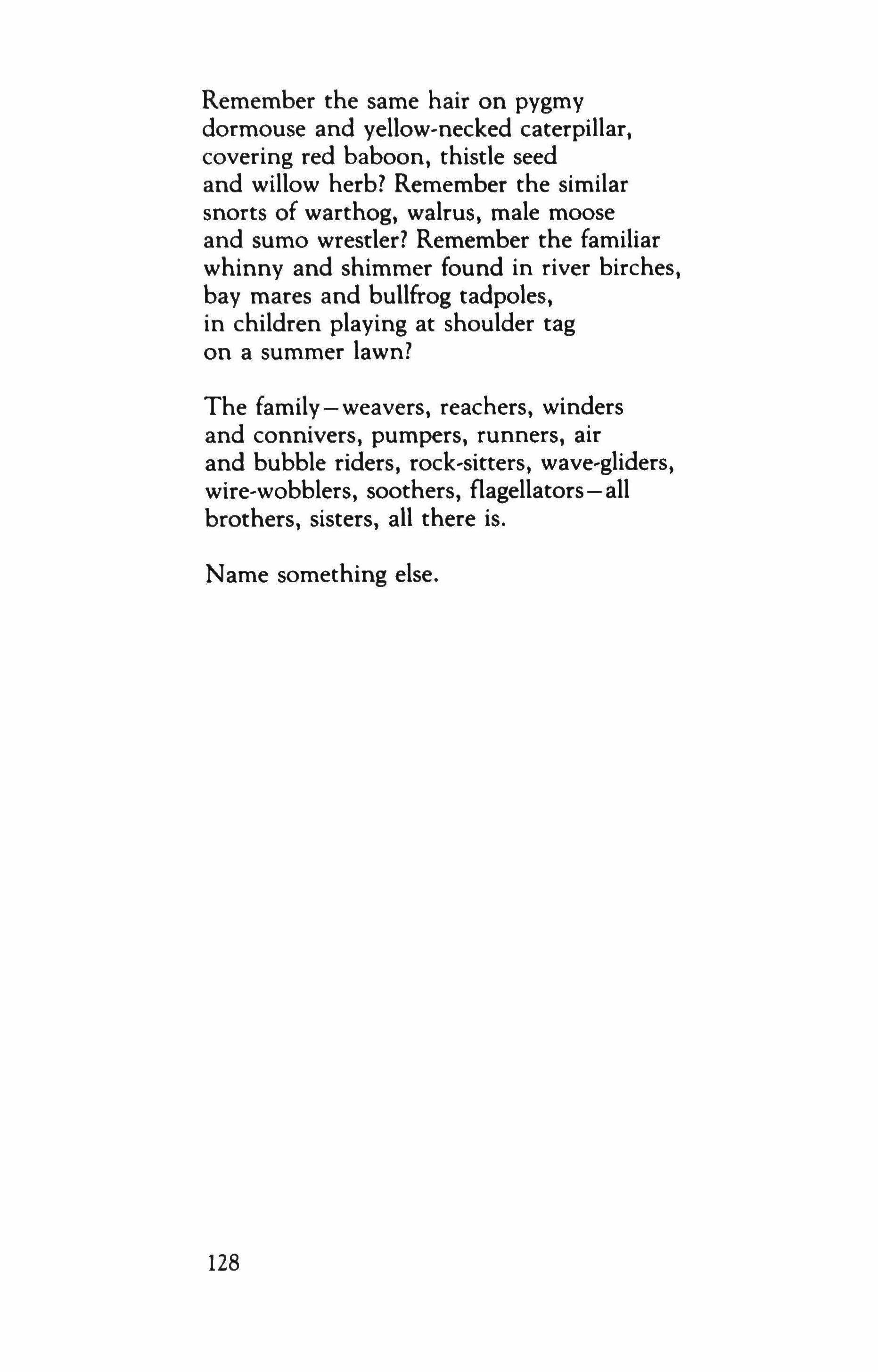
Remember the same hair on pygmy dormouse and yellow-necked caterpillar, covering red baboon, thistle seed and willow herb? Remember the similar snorts of warthog, walrus, male moose and sumo wrestler? Remember the familiar whinny and shimmer found in river birches, bay mares and bullfrog tadpoles, in children playing at shoulder tag on a summer lawn?
The familyweavers, reachers, winders and connivers, pumpers, runners, air and bubble riders, rock-sitters, wave-gliders, wire-wobblers, soothers, flagellators - all brothers, sisters, all there is.
Name something else.
128
Predestination
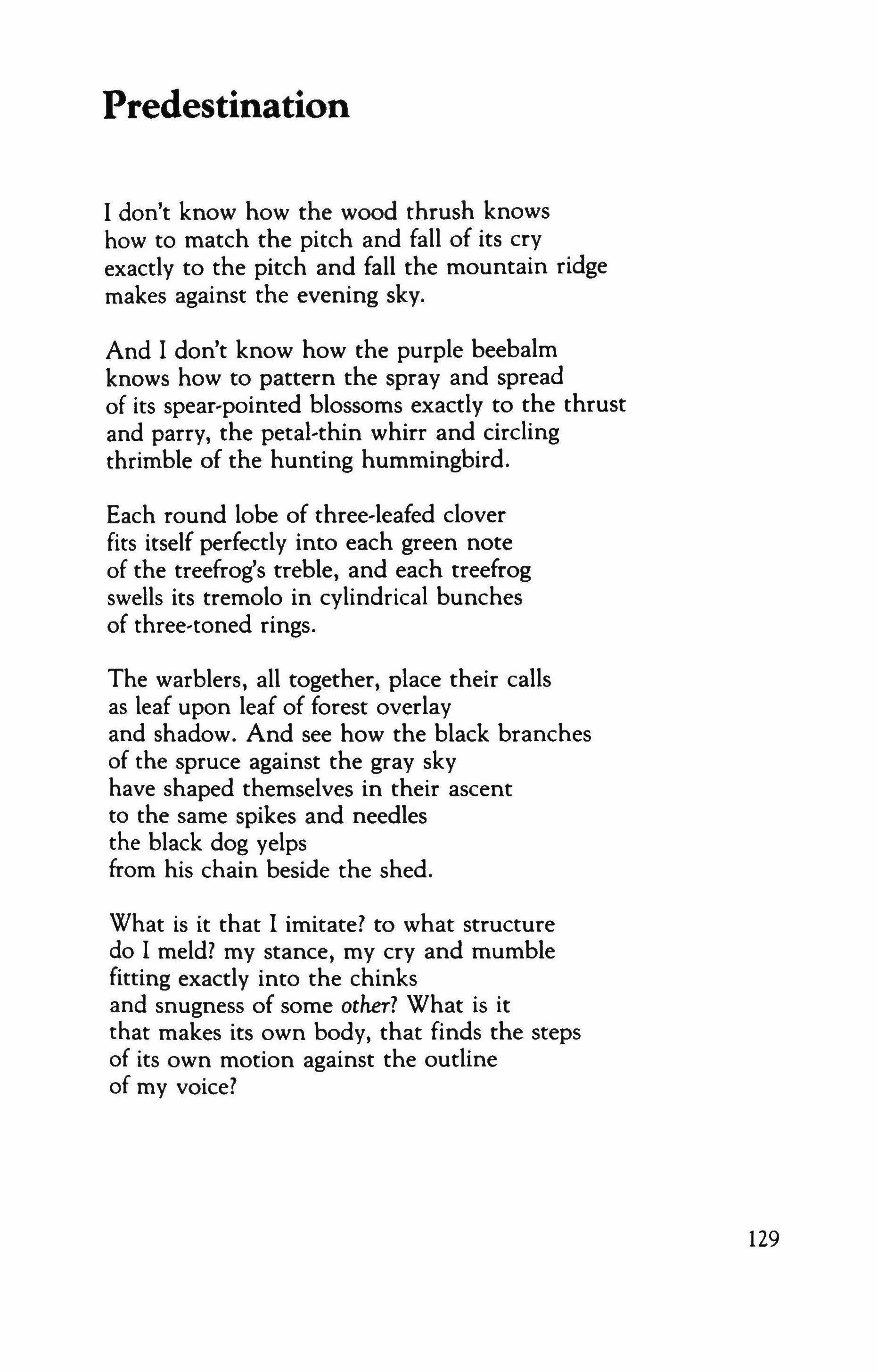
I don't know how the wood thrush knows how to match the pitch and fall of its cry exactly to the pitch and fall the mountain ridge makes against the evening sky.
And I don't know how the purple beebalm knows how to pattern the spray and spread of its spear-pointed blossoms exactly to the thrust and parry, the petal-thin whirr and circling thrirnble of the hunting hummingbird.
Each round lobe of three,leafed clover fits itself perfectly into each green note of the treefrog's treble, and each treefrog swells its tremolo in cylindrical bunches of three-toned rings.
The warblers, all together, place their calls as leaf upon leaf of forest overlay and shadow. And see how the black branches of the spruce against the gray sky have shaped themselves in their ascent to the same spikes and needles the black dog yelps from his chain beside the shed.
What is it that I imitate? to what structure do I meld? my stance, my cry and mumble fitting exactly into the chinks and snugness of some other? What is it that makes its own body, that finds the steps of its own motion against the outline of my voice?
129
There must be something. There must. Since my conviction may be its very stature and its very spine, how can I be convinced otherwise?
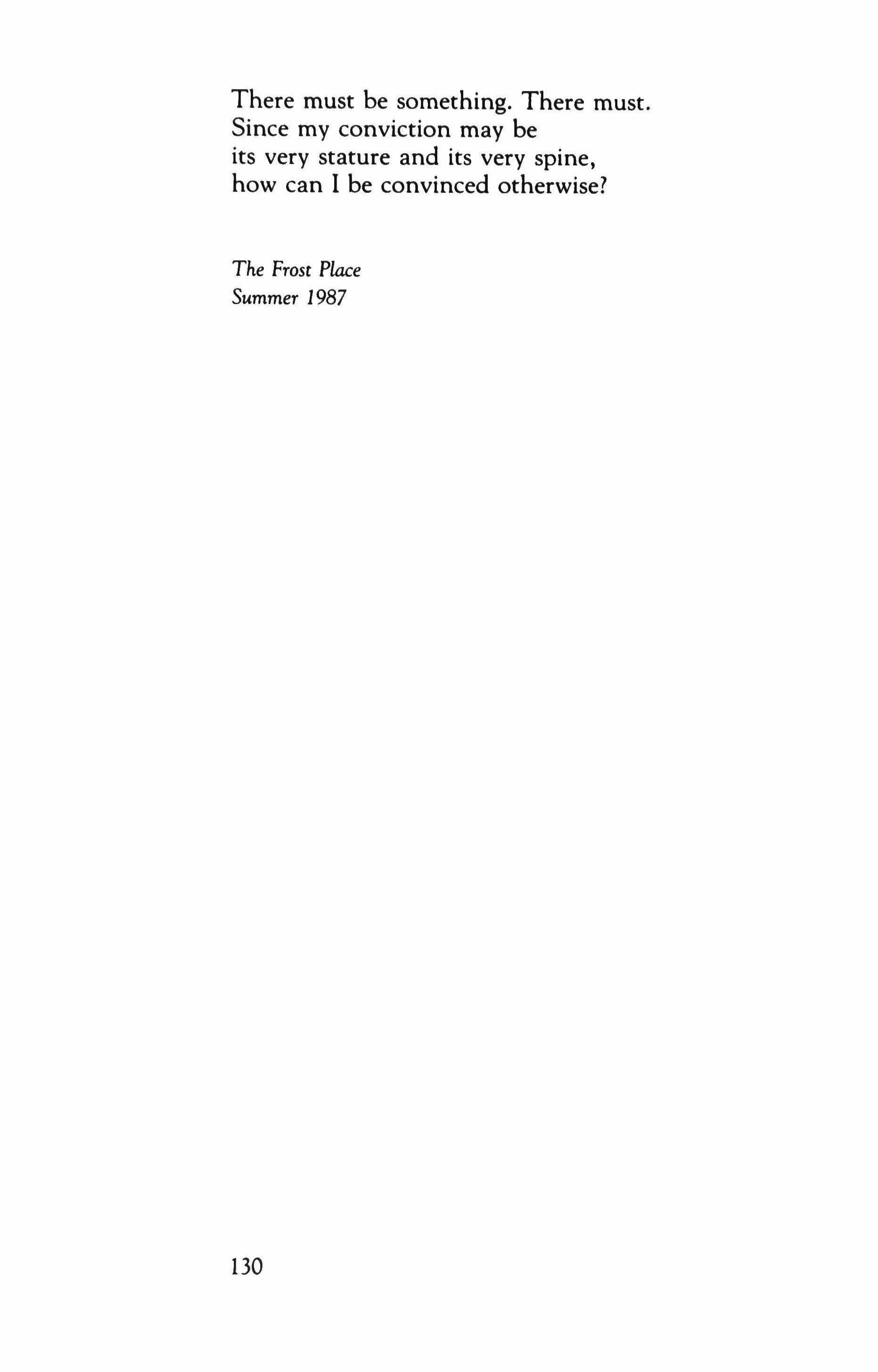
The Frost Place Summer 1987
130
Approaching the Metropolis
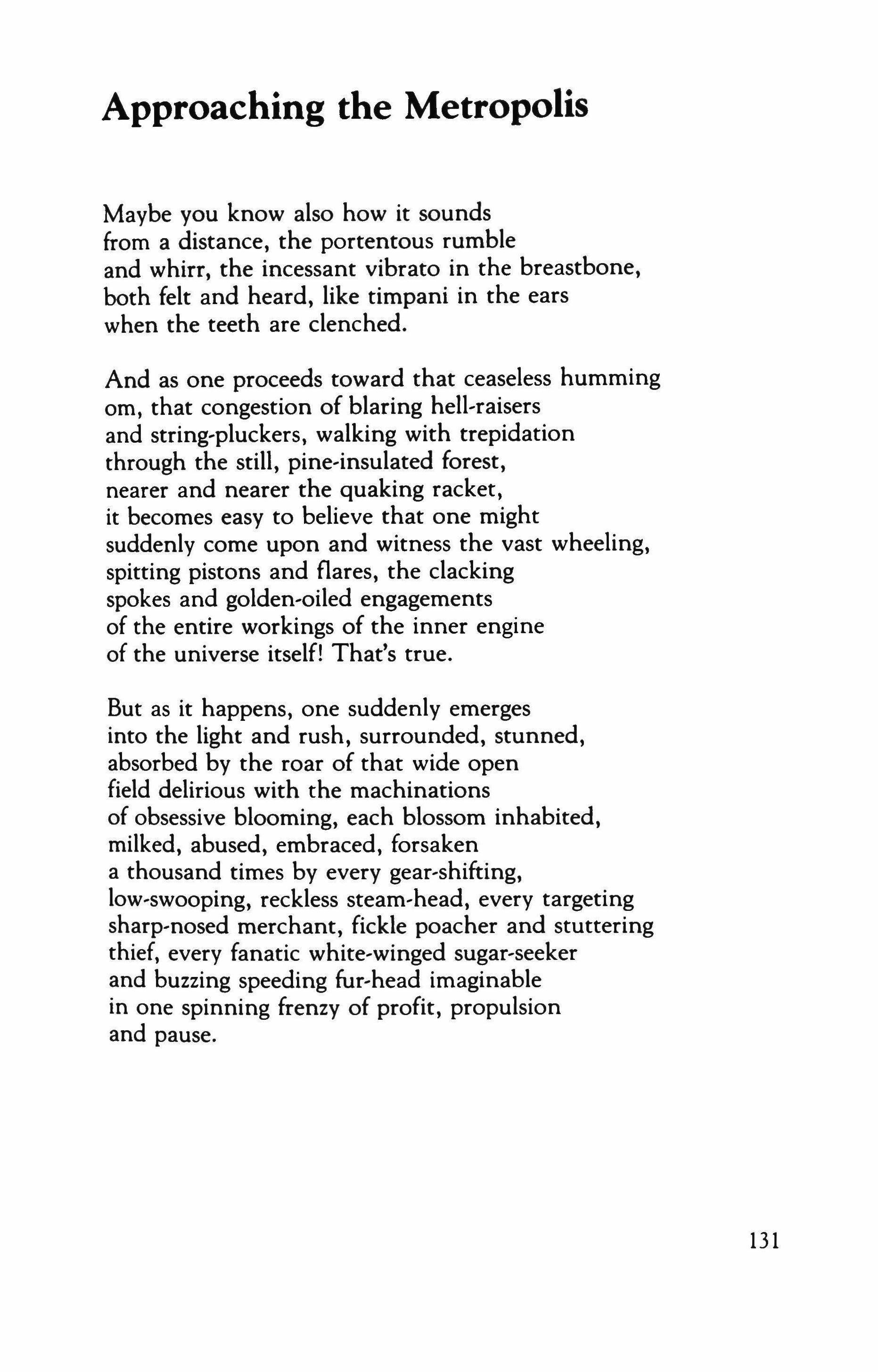
Maybe you know also how it sounds from a distance, the portentous rumble and whirr, the incessant vibrato in the breastbone, both felt and heard, like timpani in the ears when the teeth are clenched.
And as one proceeds toward that ceaseless humming om, that congestion of blaring hell-raisers and string-pluckers, walking with trepidation through the still, pine-insulated forest, nearer and nearer the quaking racket, it becomes easy to believe that one might suddenly come upon and witness the vast wheeling, spitting pistons and flares, the clacking spokes and golden-oiled engagements of the entire workings of the inner engine of the universe itself! That's true.
But as it happens, one suddenly emerges into the light and rush, surrounded, stunned, absorbed by the roar of that wide open field delirious with the machinations of obsessive blooming, each blossom inhabited, milked, abused, embraced, forsaken a thousand times by every gear-shifting, low-swooping, reckless steam-head, every targeting sharp-nosed merchant, fickle poacher and stuttering thief, every fanatic white-winged sugar-seeker and buzzing speeding fur-head imaginable in one spinning frenzy of profit, propulsion and pause.
131

So inevitably caught-up, converted! May God, with the same energy and devotion, bless now, this and all carnal, egocentric, hard-driving, fuel-finding, single-minded, death-damning cities, of any kind.
The Frost Place Summer 1987
132
For Passions Denied: Pineywoods Lily
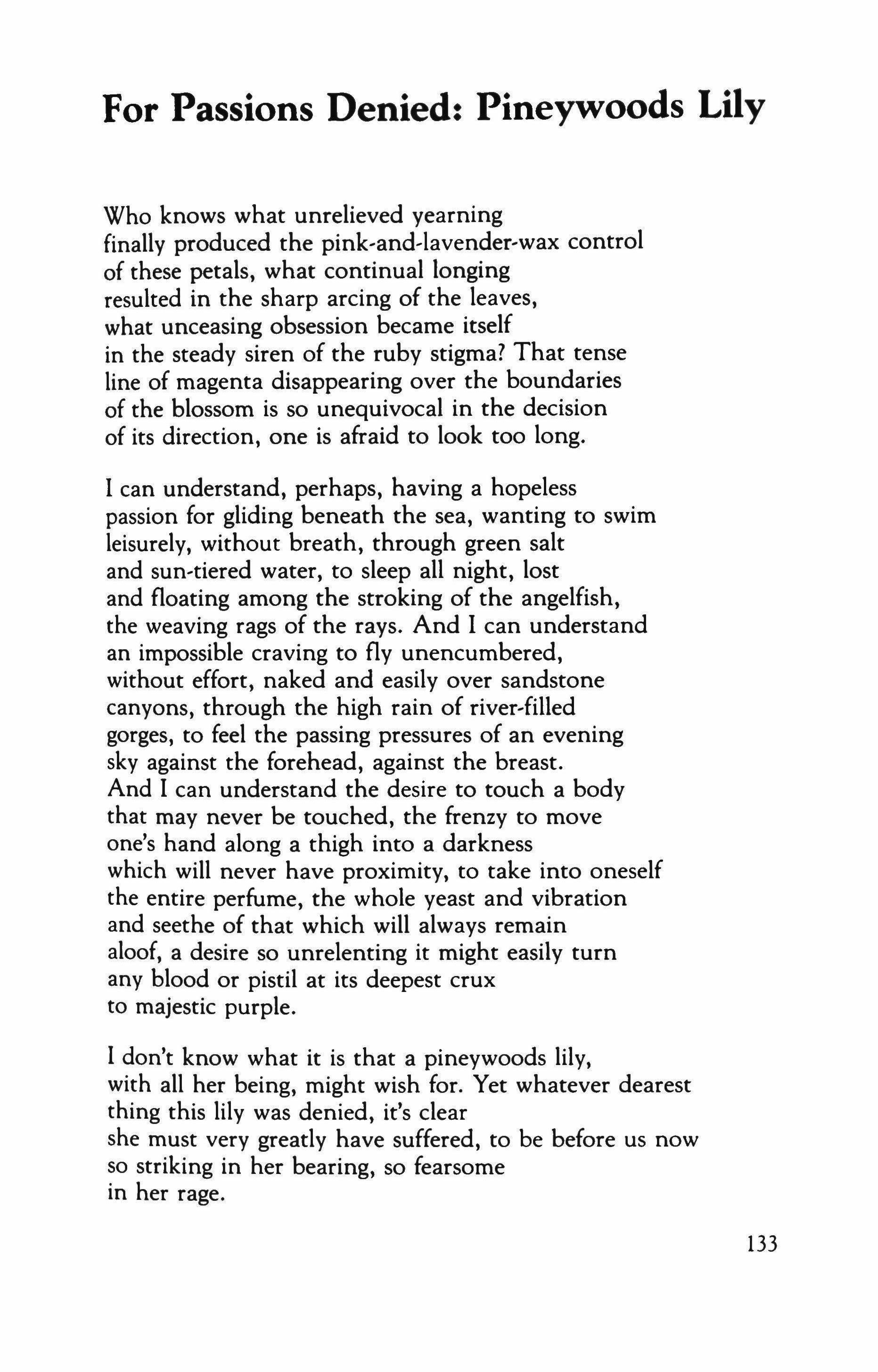
Who knows what unrelieved yearning finally produced the pink-and-lavender-wax control of these petals, what continual longing resulted in the sharp arcing of the leaves, what unceasing obsession became itself in the steady siren of the ruby stigma? That tense line of magenta disappearing over the boundaries of the blossom is so unequivocal in the decision of its direction, one is afraid to look too long.
I can understand, perhaps, having a hopeless passion for gliding beneath the sea, wanting to swim leisurely, without breath, through green salt and sun-tiered water, to sleep all night, lost and floating among the stroking of the angelfish, the weaving rags of the rays. And I can understand an impossible craving to fly unencumbered, without effort, naked and easily over sandstone canyons, through the high rain of river-filled gorges, to feel the passing pressures of an evening sky against the forehead, against the breast. And I can understand the desire to touch a body that may never be touched, the frenzy to move one's hand along a thigh into a darkness which will never have proximity, to take into oneself the entire perfume, the whole yeast and vibration and seethe of that which will always remain aloof, a desire so unrelenting it might easily turn any blood or pistil at its deepest crux to majestic purple.
I don't know what it is that a pineywoods lily, with all her being, might wish for. Yet whatever dearest thing this lily was denied, it's clear she must very greatly have suffered, to be before us now so striking in her bearing, so fearsome in her rage.
133


Special Section: Wole Soyinka

Foreword
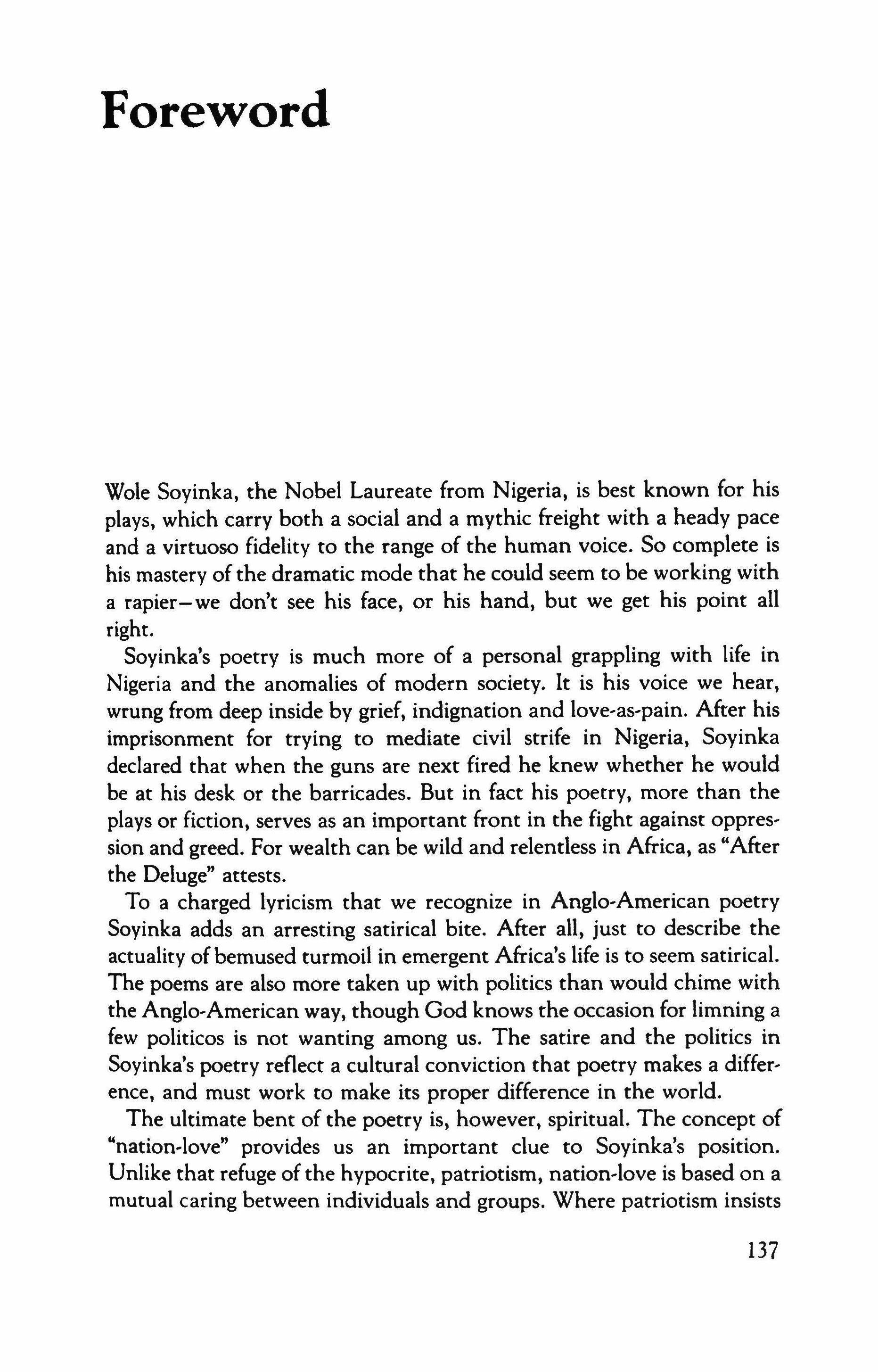
Wole Soyinka, the Nobel Laureate from Nigeria, is best known for his plays, which carry both a social and a mythic freight with a heady pace and a virtuoso fidelity to the range of the human voice. So complete is his mastery of the dramatic mode that he could seem to be working with a rapier-we don't see his face, or his hand, but we get his point all right.
Soyinka's poetry is much more of a personal grappling with life in Nigeria and the anomalies of modern society. It is his voice we hear, wrung from deep inside by grief, indignation and love-as-pain. After his imprisonment for trying to mediate civil strife in Nigeria, Soyinka declared that when the guns are next fired he knew whether he would be at his desk or the barricades. But in fact his poetry, more than the plays or fiction, serves as an important front in the fight against oppression and greed. For wealth can be wild and relentless in Africa, as "After the Deluge" attests.
To a charged lyricism that we recognize in Anglo-American poetry Soyinka adds an arresting satirical bite. After all, just to describe the actuality ofbemused turmoil in emergent Africa's life is to seem satirical. The poems are also more taken up with politics than would chime with the Anglo-American way, though God knows the occasion for limning a few politicos is not wanting among us. The satire and the politics in Soyinka's poetry reflect a cultural conviction that poetry makes a difference, and must work to make its proper difference in the world.
The ultimate bent of the poetry is, however, spiritual. The concept of "nation-love" provides us an important clue to Soyinka's position. Unlike that refuge ofthe hypocrite, patriotism, nation-love is based on a mutual caring between individuals and groups. Where patriotism insists
137
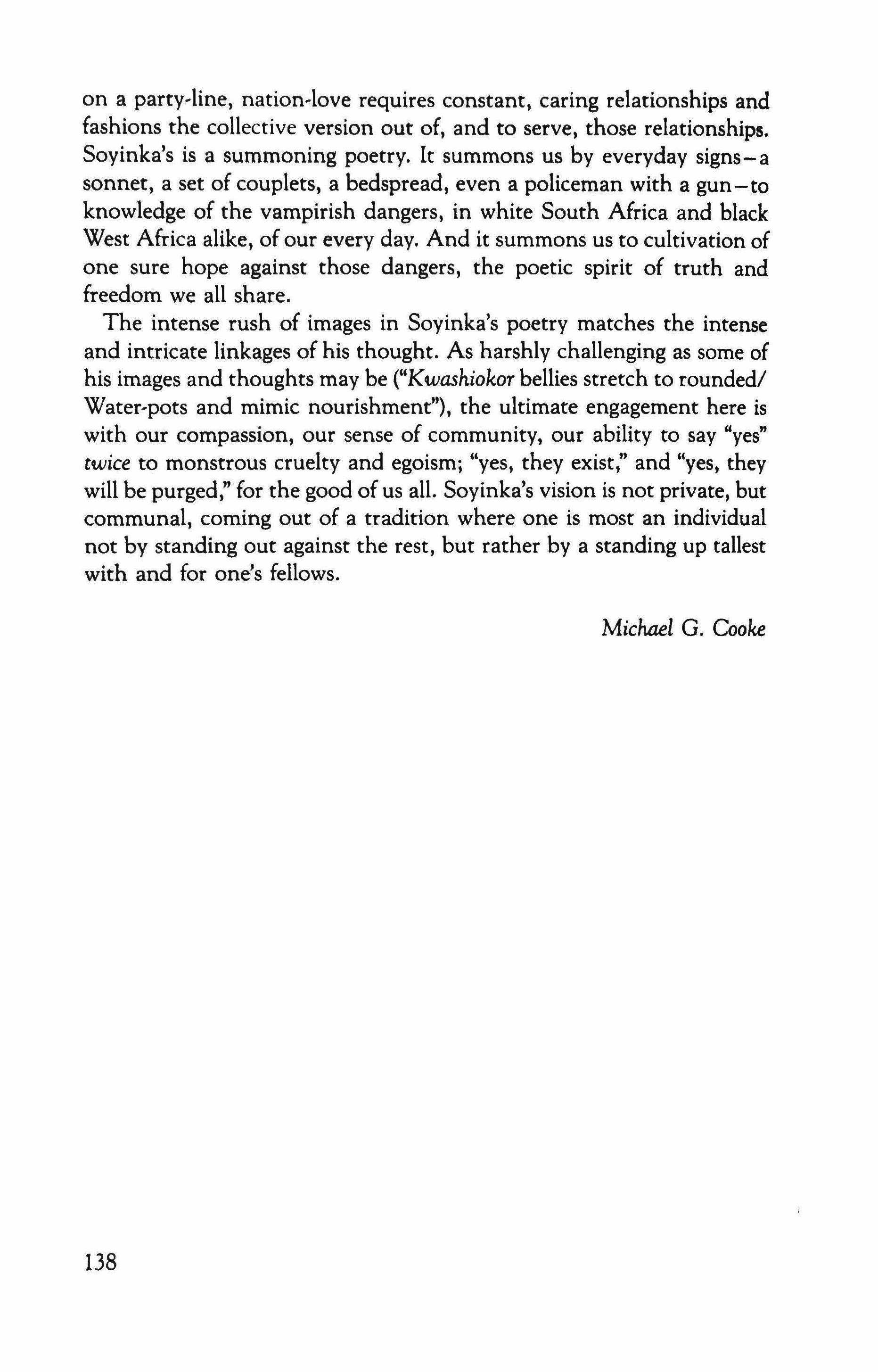
on a party-line, nation-love requires constant, caring relationships and fashions the collective version out of, and to serve, those relationships. Soyinka's is a summoning poetry. It summons us by everyday signs-a sonnet, a set of couplets, a bedspread, even a policeman with a gun-to knowledge of the vampirish dangers, in white South Africa and black West Africa alike, of our every day. And it summons us to cultivation of one sure hope against those dangers, the poetic spirit of truth and freedom we all share.
The intense rush of images in Soyinka's poetry matches the intense and intricate linkages of his thought. As harshly challenging as some of his images and thoughts may be ("KwashiokoT bellies stretch to rounded/ Water-pots and mimic nourishment"), the ultimate engagement here is with our compassion, our sense of community, our ability to say "yes" twice to monstrous cruelty and egoism; "yes, they exist," and "yes, they will be purged," for the good of us all. Soyinka's vision is not private, but communal, coming out of a tradition where one is most an individual not by standing out against the rest, but rather by a standing up tallest with and for one's fellows.
Michael G. Cooke
138
Five Poems
Wole Soyinka
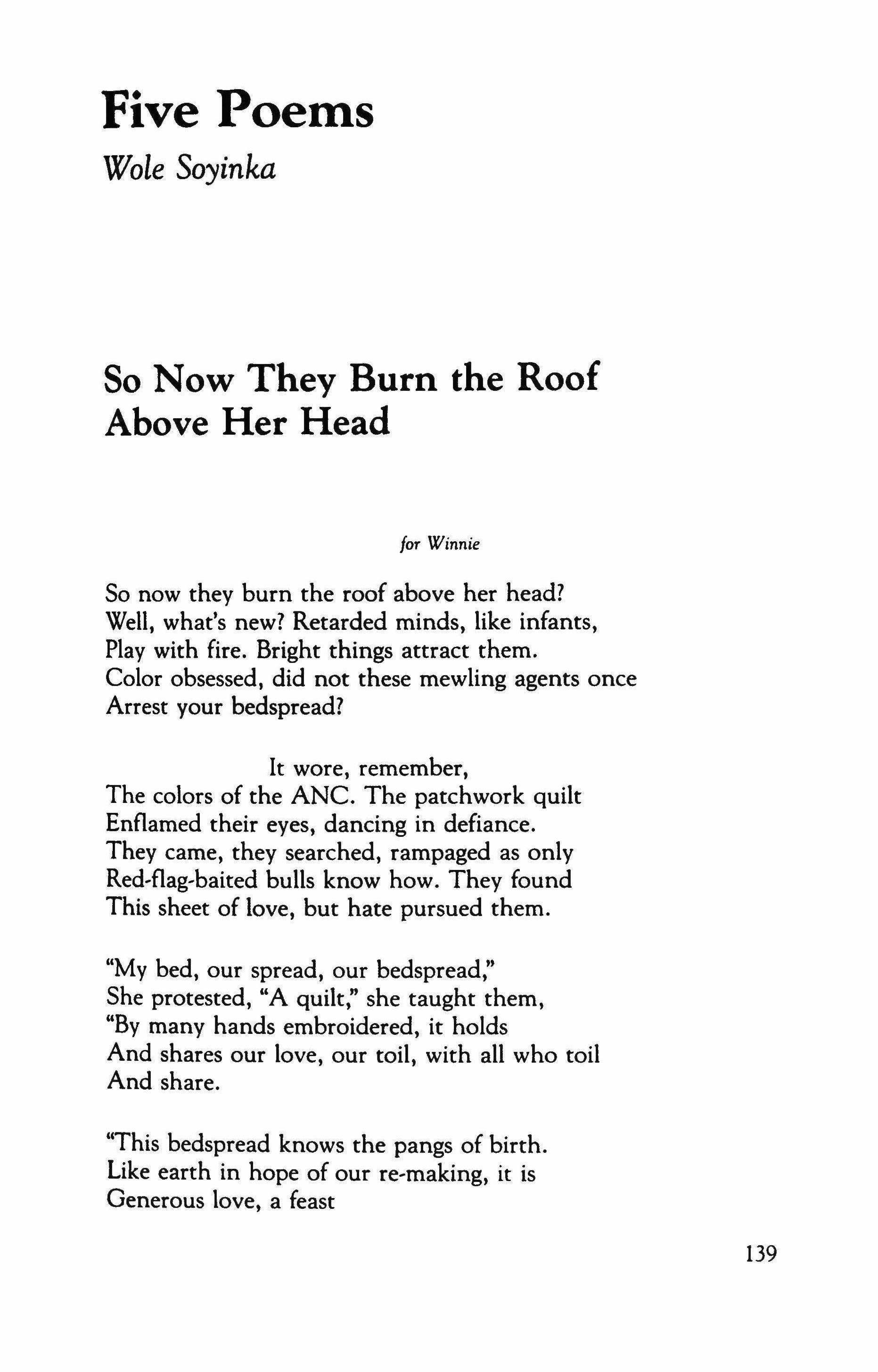
So Now They Burn the Roof Above Her Head
fOT Winnie
So now they burn the roof above her head? Well, what's new? Retarded minds, like infants, Play with fire. Bright things attract them. Color obsessed, did not these mewling agents once Arrest your bedspread?
It wore, remember, The colors of the ANC. The patchwork quilt Enflamed their eyes, dancing in defiance. They came, they searched, rampaged as only Red-flag-baited bulls know how. They found This sheet of love, but hate pursued them.
"My bed, our spread, our bedspread," She protested, "A quilt," she taught them, "By many hands embroidered, it holds And shares our love, our toil, with all who toil And share.
"This bedspread knows the pangs of birth. Like earth in hope of our re-making, it is Generous love, a feast
139

." ( ,. .j..---i �-;;s
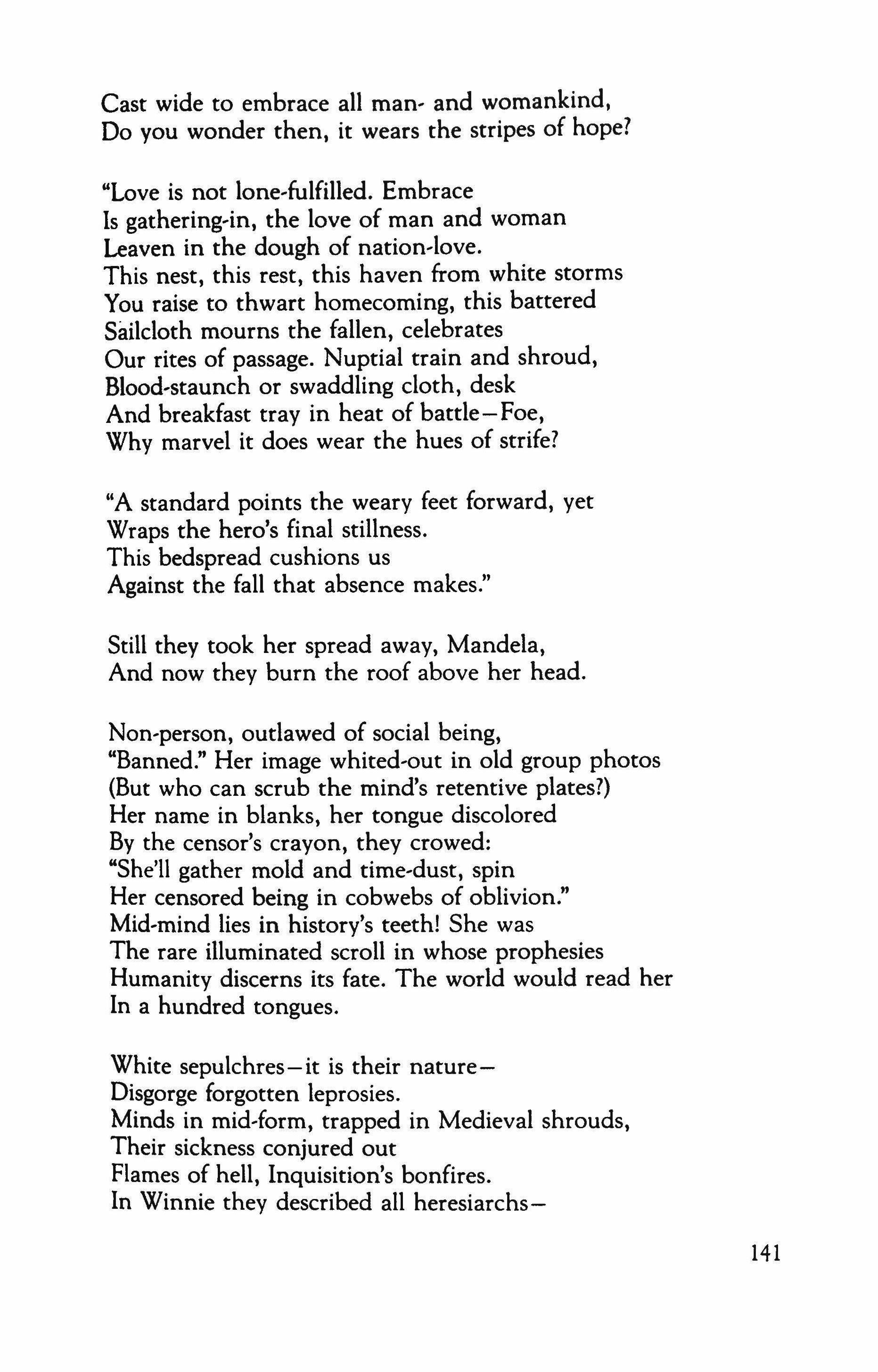
Cast wide to embrace all man' and womankind, Do you wonder then, it wears the stripes of hope?
"Love is not lone-fulfilled. Embrace Is gathering-in, the love of man and woman Leaven in the dough of nation-love. This nest, this rest, this haven from white storms You raise to thwart homecoming, this battered Sailcloth mourns the fallen, celebrates Our rites of passage. Nuptial train and shroud, Blood-staunch or swaddling cloth, desk And breakfast tray in heat of battle-Foe, Why marvel it does wear the hues of strife?
"A standard points the weary feet forward, yet Wraps the hero's final stillness. This bedspread cushions us Against the fall that absence makes."
Still they took her spread away, Mandela, And now they burn the roof above her head.
Non-person, outlawed of social being, "Banned." Her image whited-out in old group photos (But who can scrub the mind's retentive plates?) Her name in blanks, her tongue discolored By the censor's crayon, they crowed: "She'll gather mold and time-dust, spin Her censored being in cobwebs of oblivion." Mid-mind lies in history's teeth! She was The rare illuminated scroll in whose prophesies Humanity discerns its fate. The world would read her In a hundred tongues.
White sepulchres-it is their natureDisgorge forgotten leprosies. Minds in mid-form, trapped in Medieval shrouds, Their sickness conjured out Flames of hell, Inquisition's bonfires. In Winnie they described all heresiarchs-
141
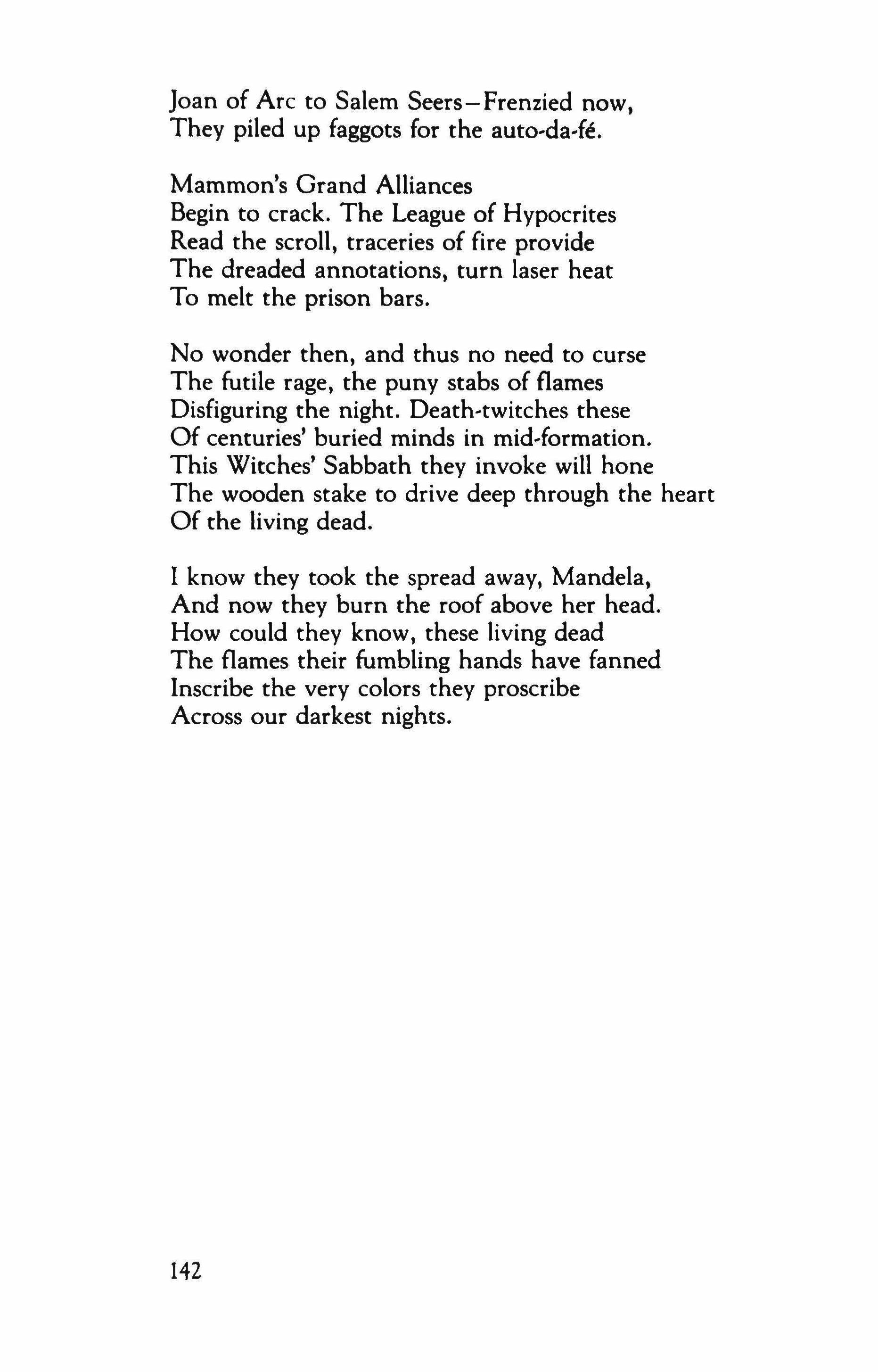
Joan of Arc to Salem Seers-Frenzied now, They piled up faggots for the auto-da-fe.
Mammon's Grand Alliances
Begin to crack. The League of Hypocrites Read the scroll, traceries of fire provide The dreaded annotations, turn laser heat To melt the prison bars.
No wonder then, and thus no need to curse
The futile rage, the puny stabs of flames
Disfiguring the night. Death-twitches these Of centuries' buried minds in mid-formation. This Witches' Sabbath they invoke will hone The wooden stake to drive deep through the heart Of the living dead.
I know they took the spread away, Mandela, And now they burn the roof above her head. How could they know, these living dead The flames their fumbling hands have fanned Inscribe the very colors they proscribe Across our darkest nights.
142
After the Deluge
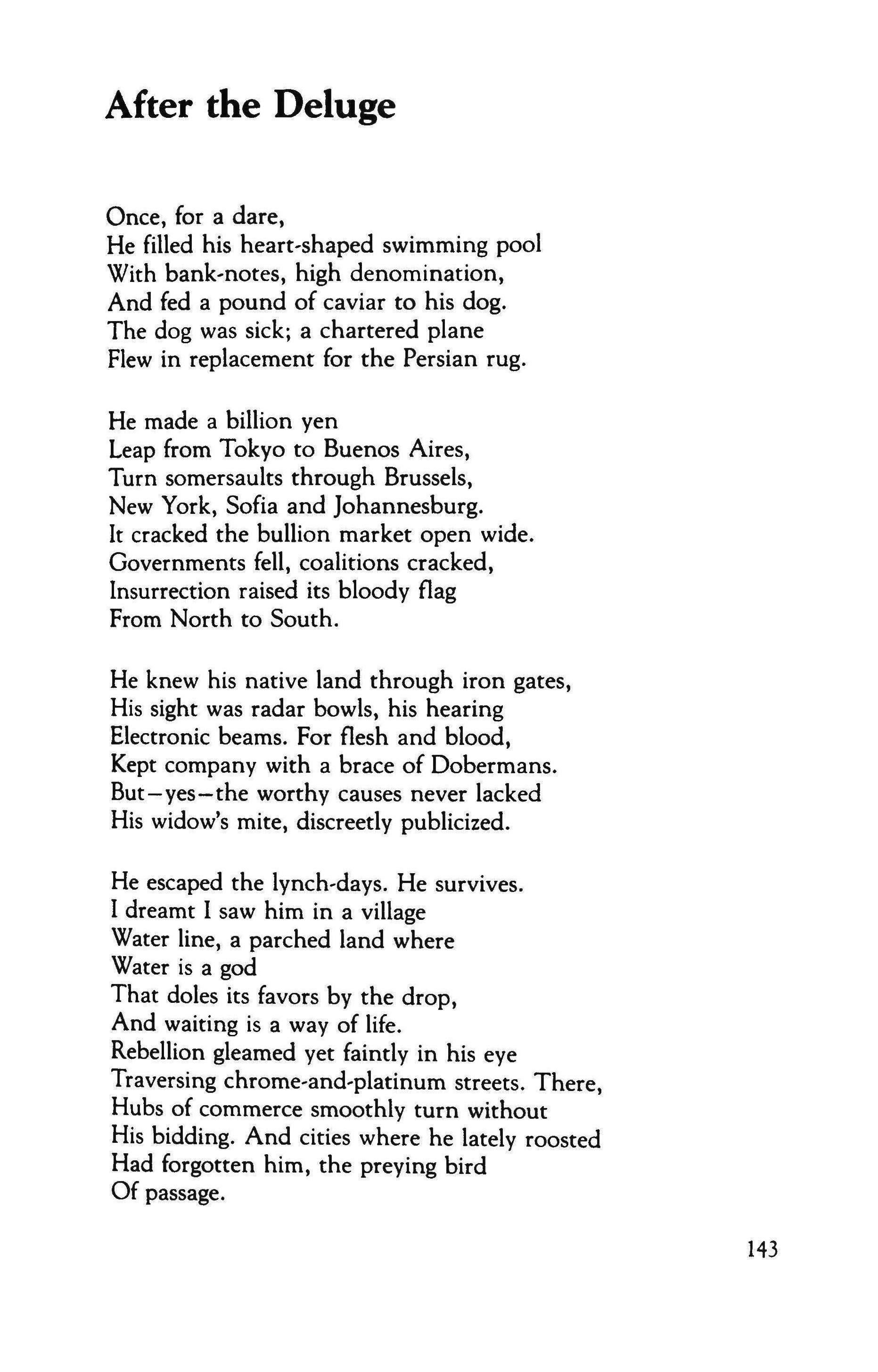
Once, for a dare, He filled his heart-shaped swimming pool With bank-notes, high denomination, And fed a pound of caviar to his dog. The dog was sick; a chartered plane Flew in replacement for the Persian rug.
He made a billion yen Leap from Tokyo to Buenos Aires, Turn somersaults through Brussels, New York, Sofia and Johannesburg. It cracked the bullion market open wide. Governments fell, coalitions cracked, Insurrection raised its bloody flag From North to South.
He knew his native land through iron gates, His sight was radar bowls, his hearing Electronic beams. For flesh and blood, Kept company with a brace of Dobermans. But-yes-the worthy causes never lacked His widow's mite, discreetly publicized.
He escaped the lynch-days. He survives. I dreamt I saw him in a village Water line, a parched land where Water is a god That doles its favors by the drop, And waiting is a way of life.
Rebellion gleamed yet faintly in his eye Traversing chrome-and-plarinum streets. There, Hubs of commerce smoothly turn without His bidding. And cities where he lately roosted Had forgotten him, the preying bird Of passage.
143
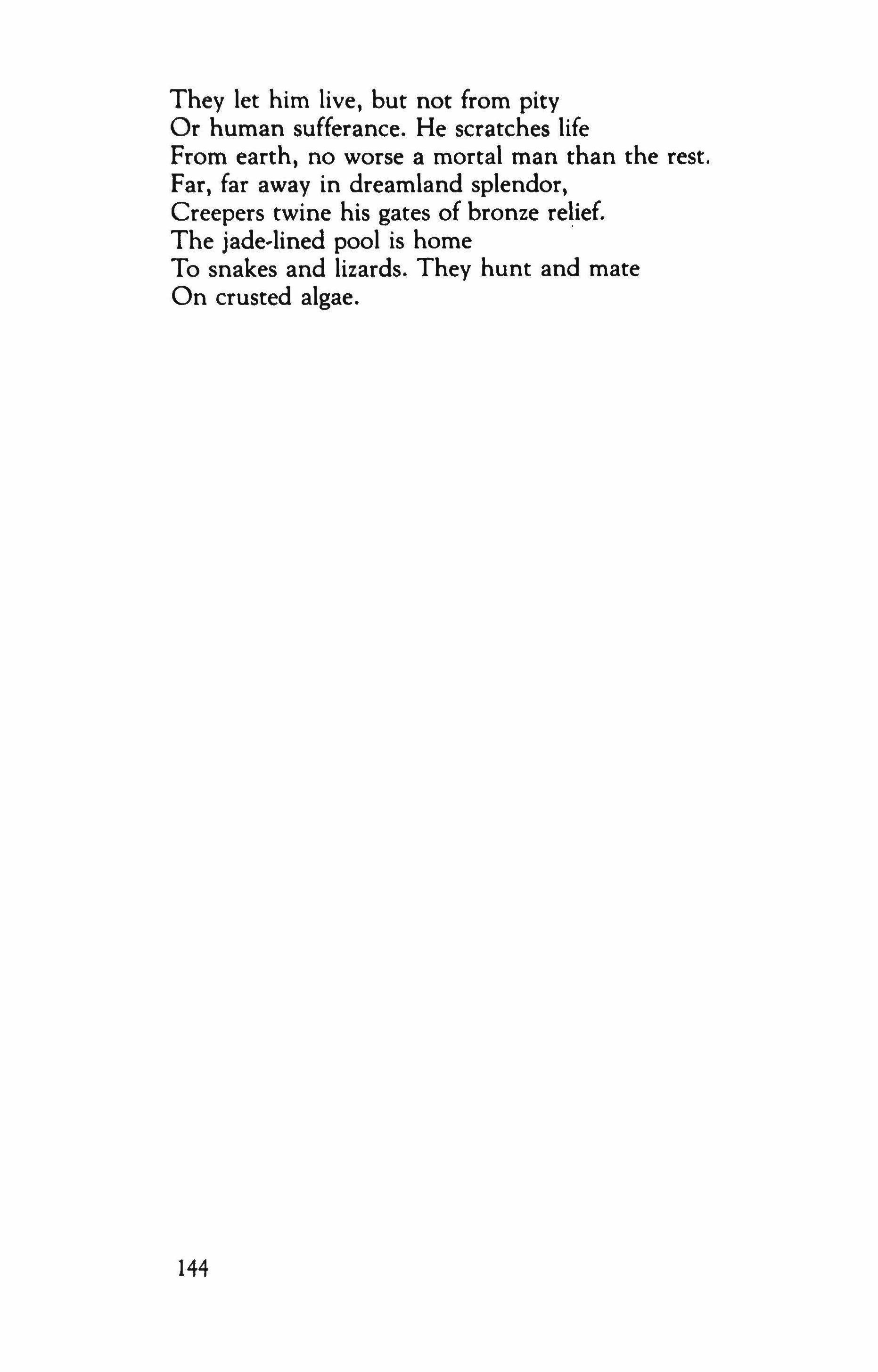
They let him live, but not from pity Or human sufferance. He scratches life From earth, no worse a mortal man than the rest. Far, far away in dreamland splendor, Creepers twine his gates of bronze relief. The jade-lined pool is horne To snakes and lizards. They hunt and mate On crusted algae.
144
Apollodorus on the Niger
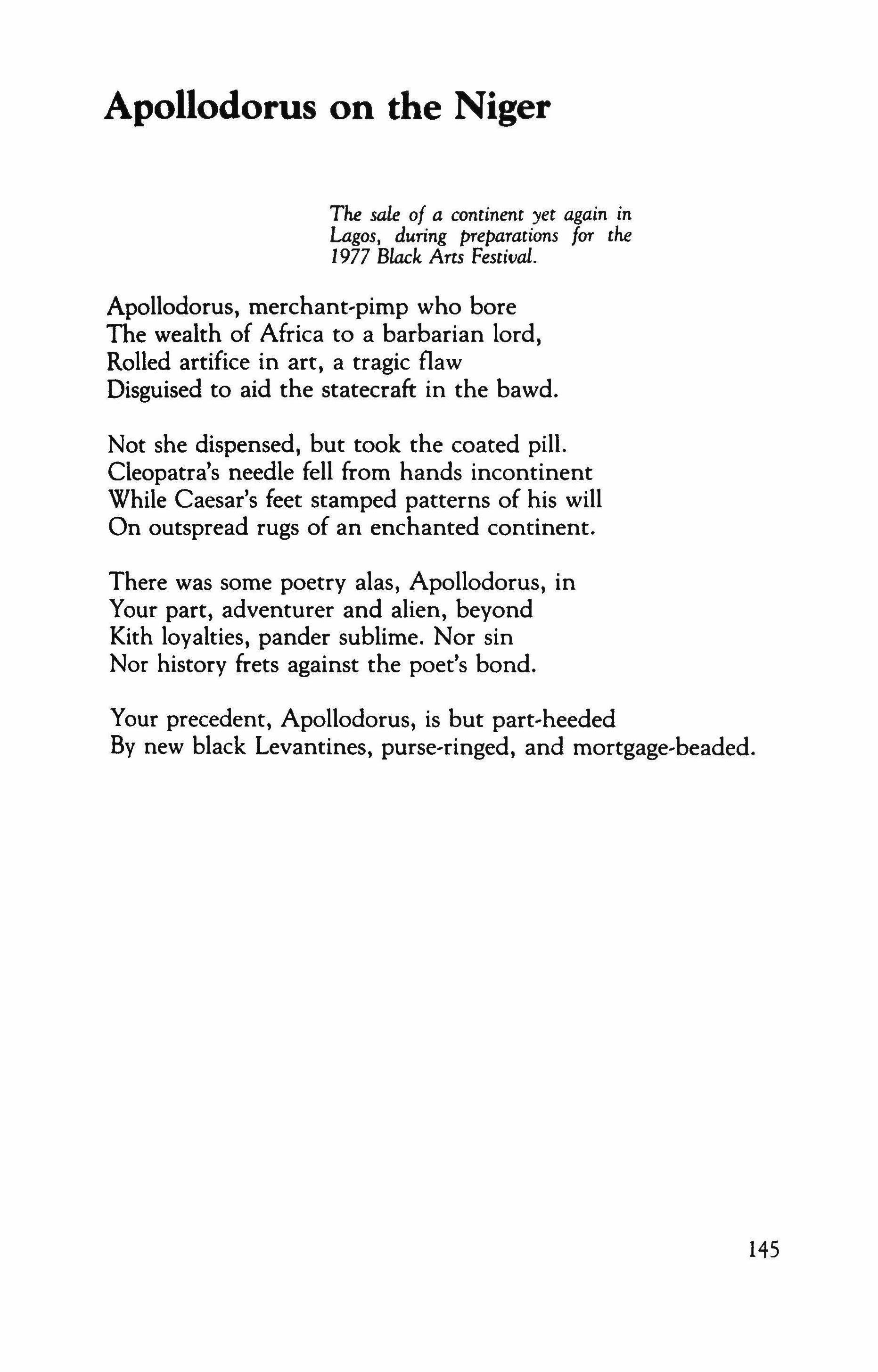
The sale of a continent yet again in Lagos, during preparations for the 1977 Black Arts Festival.
Apollodorus, merchant-pimp who bore
The wealth of Africa to a barbarian lord, Rolled artifice in art, a tragic flaw
Disguised to aid the statecraft in the bawd.
Not she dispensed, but took the coated pill. Cleopatra's needle fell from hands incontinent While Caesar's feet stamped patterns of his will On outspread rugs of an enchanted continent.
There was some poetry alas, Apollodorus, in Your part, adventurer and alien, beyond Kith loyalties, pander sublime. Nor sin Nor history frets against the poet's bond.
Your precedent, Apollodorus, is but part'heeded By new black Levantines, purse-ringed, and mortgage-beaded.
145
The Apotheosis of Master-Sergeant Doe
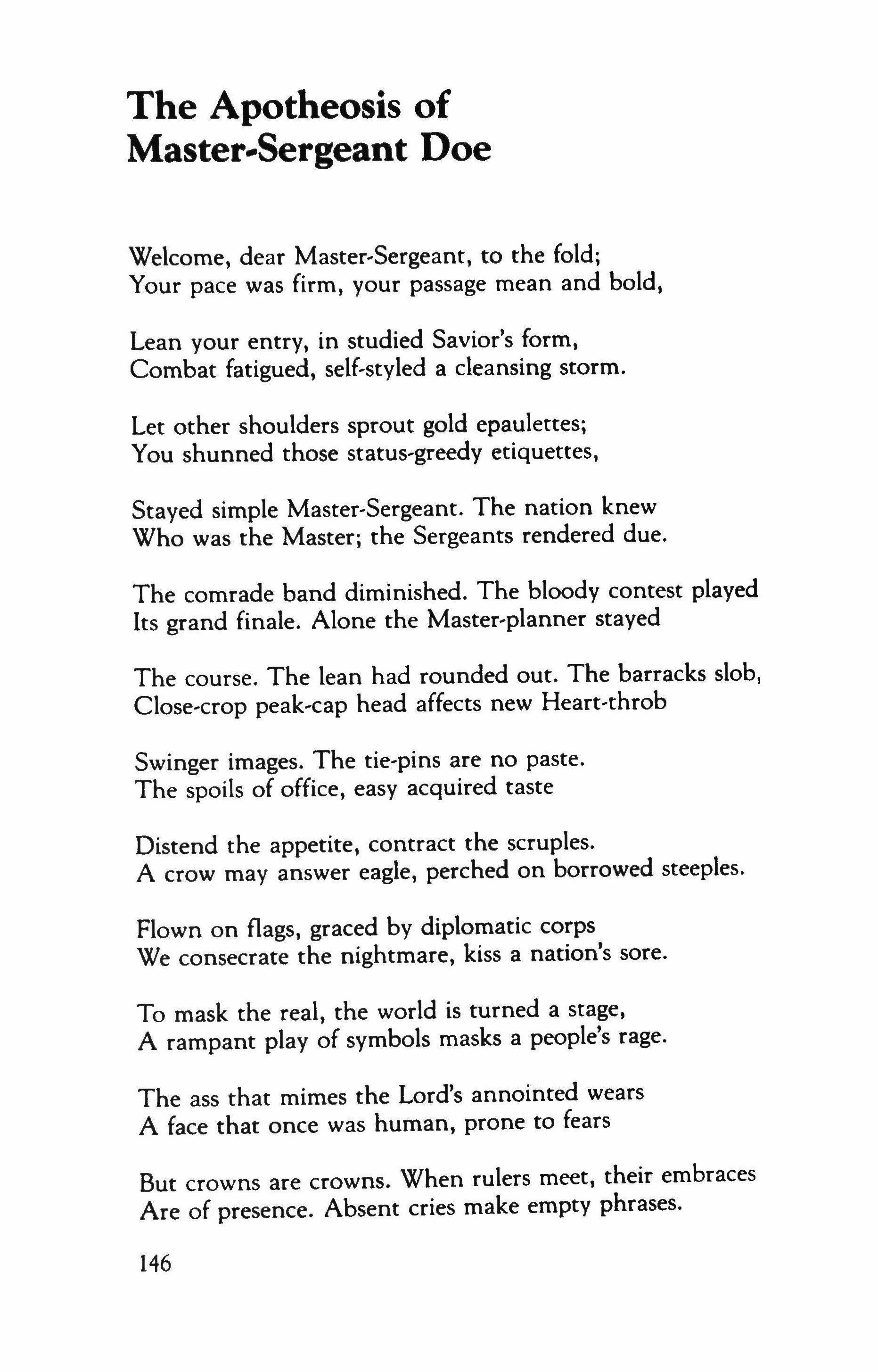
Welcome, dear Master-Sergeant, to the fold; Your pace was firm, your passage mean and bold,
Lean your entry, in studied Savior's form, Combat fatigued, self-styled a cleansing storm.
Let other shoulders sprout gold epaulettes; You shunned those status-greedy etiquettes,
Stayed simple Master-Sergeant. The nation knew Who was the Master; the Sergeants rendered due.
The comrade band diminished. The bloody contest played Its grand finale. Alone the Master-planner stayed
The course. The lean had rounded out. The barracks slob, Close-crop peak-cap head affects new Heart-throb
Swinger images. The tie-pins are no paste. The spoils of office, easy acquired taste
Distend the appetite, contract the scruples. A crow may answer eagle, perched on borrowed steeples.
Flown on flags, graced by diplomatic corps
We consecrate the nightmare, kiss a nation's sore.
To mask the real, the world is turned a stage, A rampant play of symbols masks a people's rage.
The ass that mimes the Lord's annointed wears A face that once was human, prone to fears
But crowns are crowns. When rulers meet, their embraces Are of presence. Absent cries make empty phrases.
146
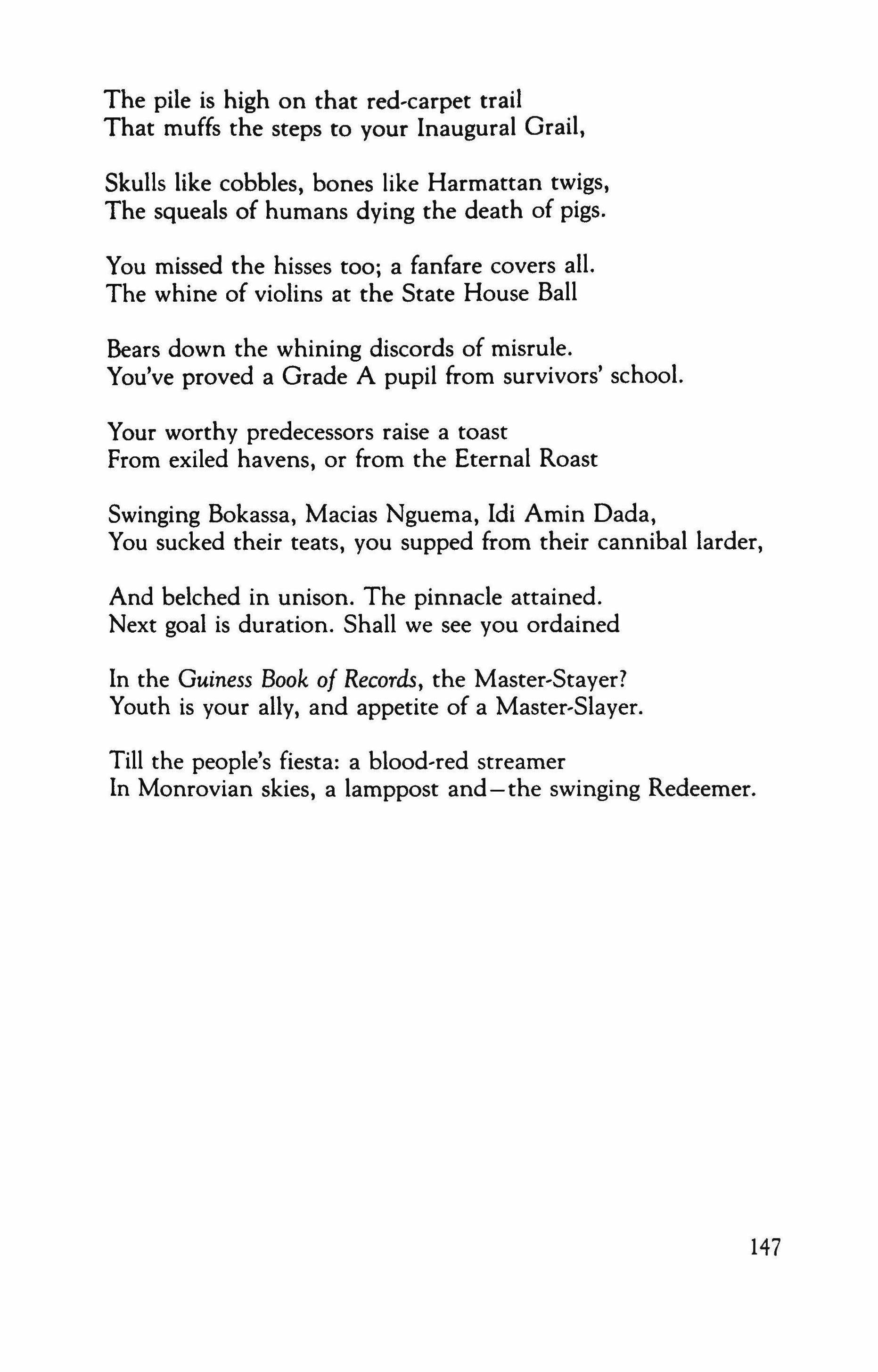
The pile is high on that red-carpet trail
That muffs the steps to your Inaugural Grail,
Skulls like cobbles, bones like Harmattan twigs, The squeals of humans dying the death of pigs.
You missed the hisses too; a fanfare covers all. The whine of violins at the State House Ball Bears down the whining discords of misrule. You've proved a Grade A pupil from survivors' school.
Your worthy predecessors raise a toast From exiled havens, or from the Eternal Roast
Swinging Bokassa, Macias Nguema, Idi Amin Dada, You sucked their teats, you supped from their cannibal larder,
And belched in unison. The pinnacle attained. Next goal is duration. Shall we see you ordained
In the Guiness Book of Records, the Master-Staver! Youth is your ally, and appetite of a Master-Slaver.
Till the people's fiesta: a blood,red streamer In Monrovian skies, a lamppost and-the swinging Redeemer.
147
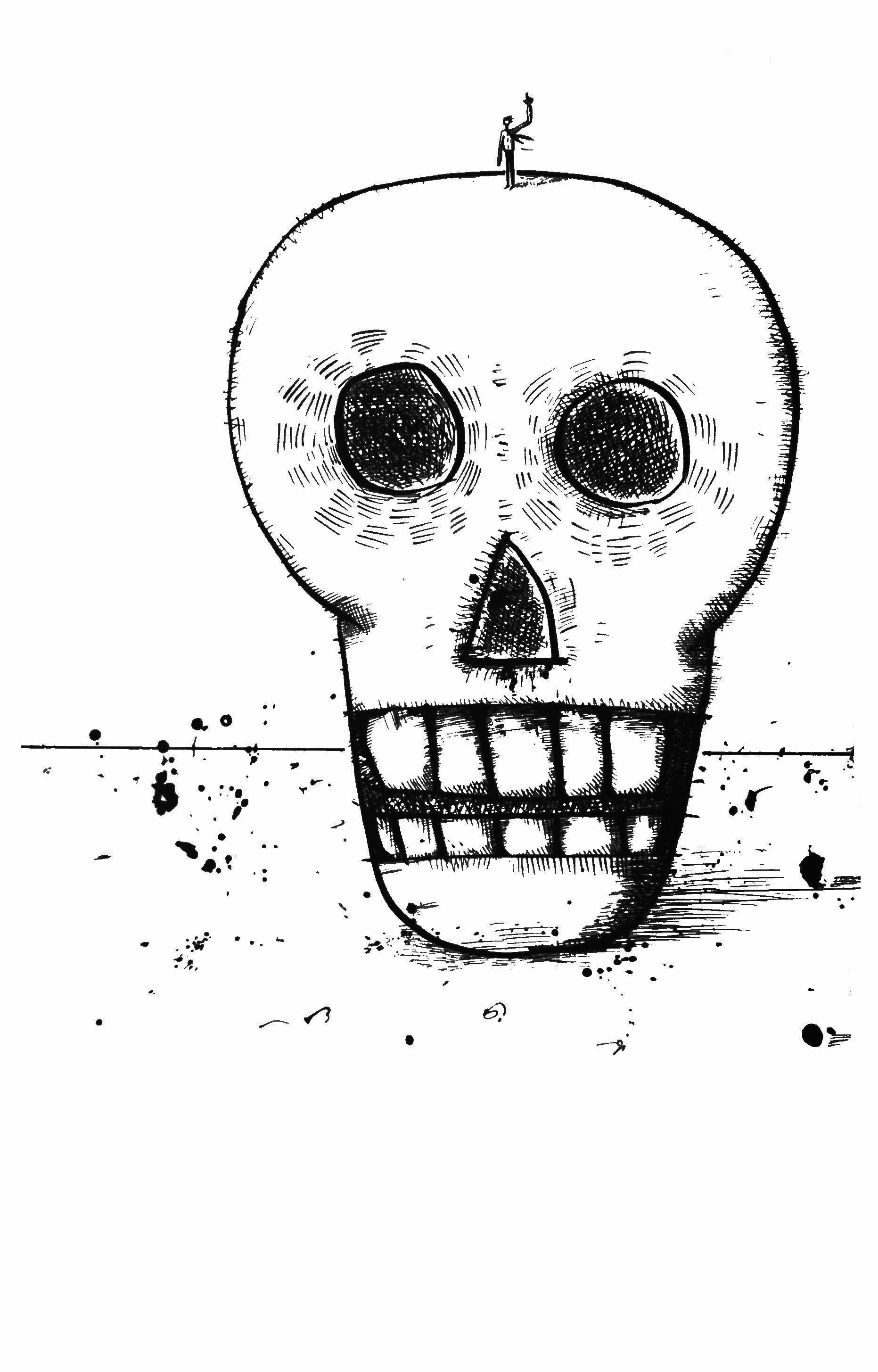
0 � • l Q' ••, � (i .� � , r •.f' , ,:� 'JJ8! � ;.:':"!!:. • ,..--.rJ 6) • _" .?
My Tongue Does Not Marry Slogans
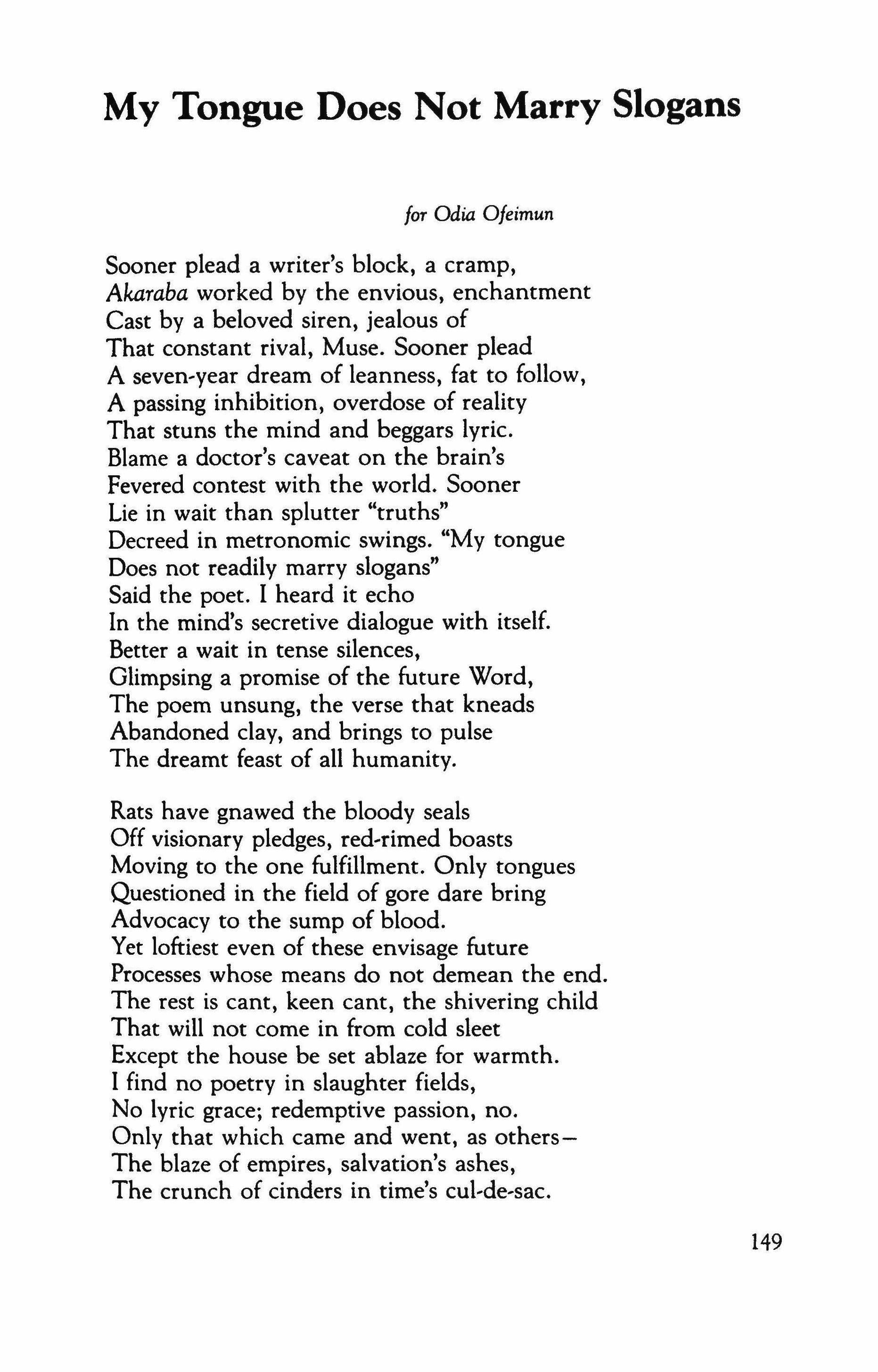 lOT Odia Oleimun
lOT Odia Oleimun
Sooner plead a writer's block, a cramp, Akaraba worked by the envious, enchantment
Cast by a beloved siren, jealous of That constant rival, Muse. Sooner plead A seven-year dream of leanness, fat to follow, A passing inhibition, overdose of reality That stuns the mind and beggars lyric.
Blame a doctor's caveat on the brain's Fevered contest with the world. Sooner
Lie in wait than splutter "truths"
Decreed in metronomic swings. "My tongue
Does not readily marry slogans"
Said the poet. I heard it echo
In the mind's secretive dialogue with itself.
Better a wait in tense silences,
Glimpsing a promise of the future Word, The poem unsung, the verse that kneads Abandoned clay, and brings to pulse
The dreamt feast of all humanity.
Rats have gnawed the bloody seals
Off visionary pledges, red-rimed boasts
Moving to the one fulfillment. Only tongues Questioned in the field of gore dare bring Advocacy to the sump of blood. Yet loftiest even of these envisage future Processes whose means do not demean the end. The rest is cant, keen cant, the shivering child That will not come in from cold sleet
Except the house be set ablaze for warmth.
I find no poetry in slaughter fields, No lyric grace; redemptive passion, no. Only that which came and went, as othersThe blaze of empires, salvation's ashes, The crunch of cinders in time's cul-de-sac.
149
My tongue eschews the doctored mint Of slogans. Dirge it may, But not invoke the wake.
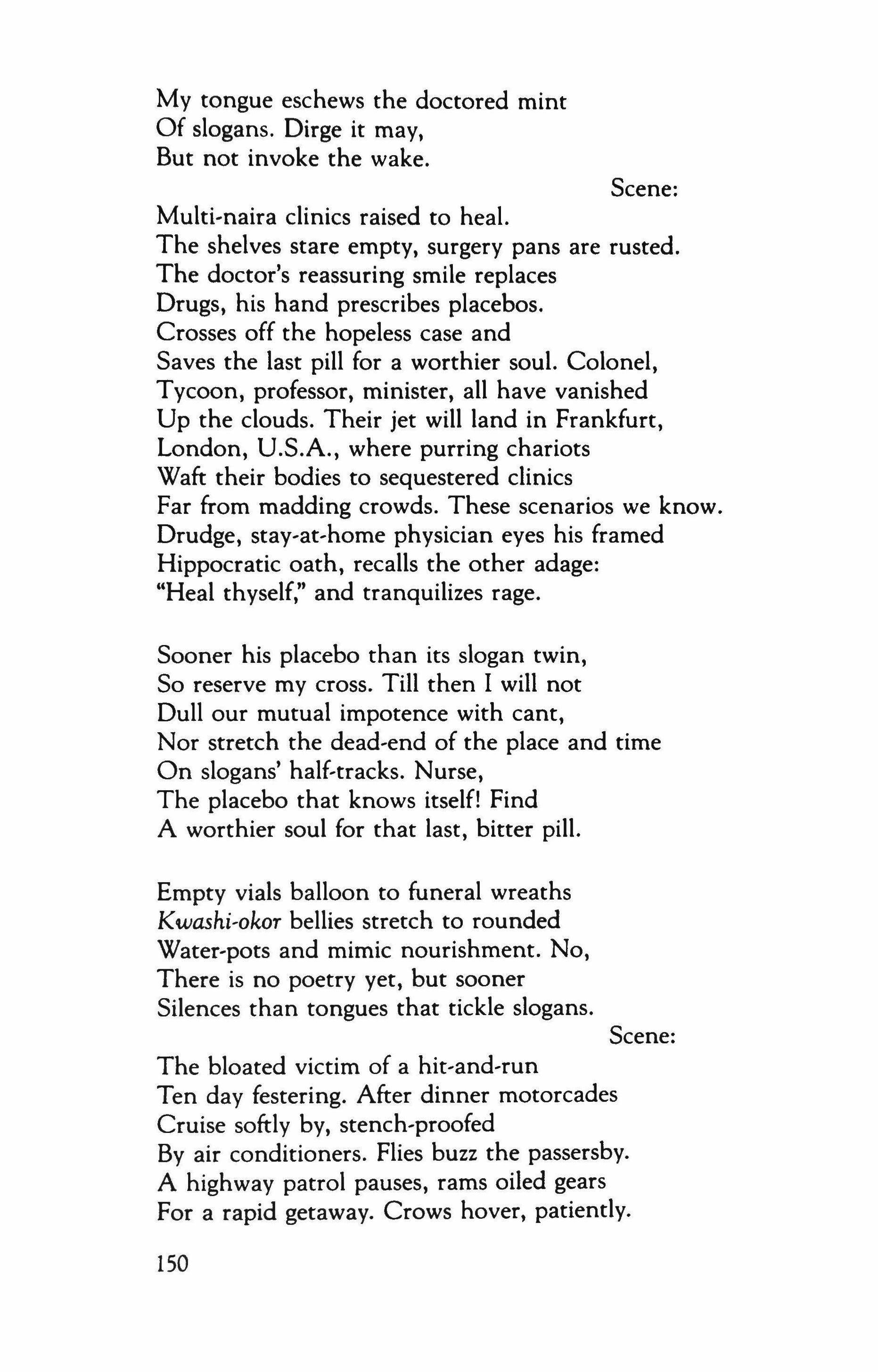
Scene:
Multi-naira clinics raised to heal. The shelves stare empty, surgery pans are rusted. The doctor's reassuring smile replaces Drugs, his hand prescribes placebos. Crosses off the hopeless case and Saves the last pill for a worthier soul. Colonel, Tycoon, professor, minister, all have vanished Up the clouds. Their jet will land in Frankfurt, London, U.S.A., where purring chariots Waft their bodies to sequestered clinics Far from madding crowds. These scenarios we know. Drudge, stay-at-home physician eyes his framed Hippocratic oath, recalls the other adage: "Heal thyself," and tranquilizes rage.
Sooner his placebo than its slogan twin, So reserve my cross. Till then I will not Dull our mutual impotence with cant, Nor stretch the dead-end of the place and time On slogans' half-tracks. Nurse, The placebo that knows itself! Find A worthier soul for that last, bitter pill.
Empty vials balloon to funeral wreaths
Kwashi,okoT bellies stretch to rounded Water,pots and mimic nourishment. No, There is no poetry yet, but sooner Silences than tongues that tickle slogans.
Scene:
The bloated victim of a hit-and-run Ten day festering. After dinner motorcades Cruise softly by, stench-proofed By air conditioners. Flies buzz the passersby. A highway patrol pauses, rams oiled gears For a rapid getaway. Crows hover, patiently.
150
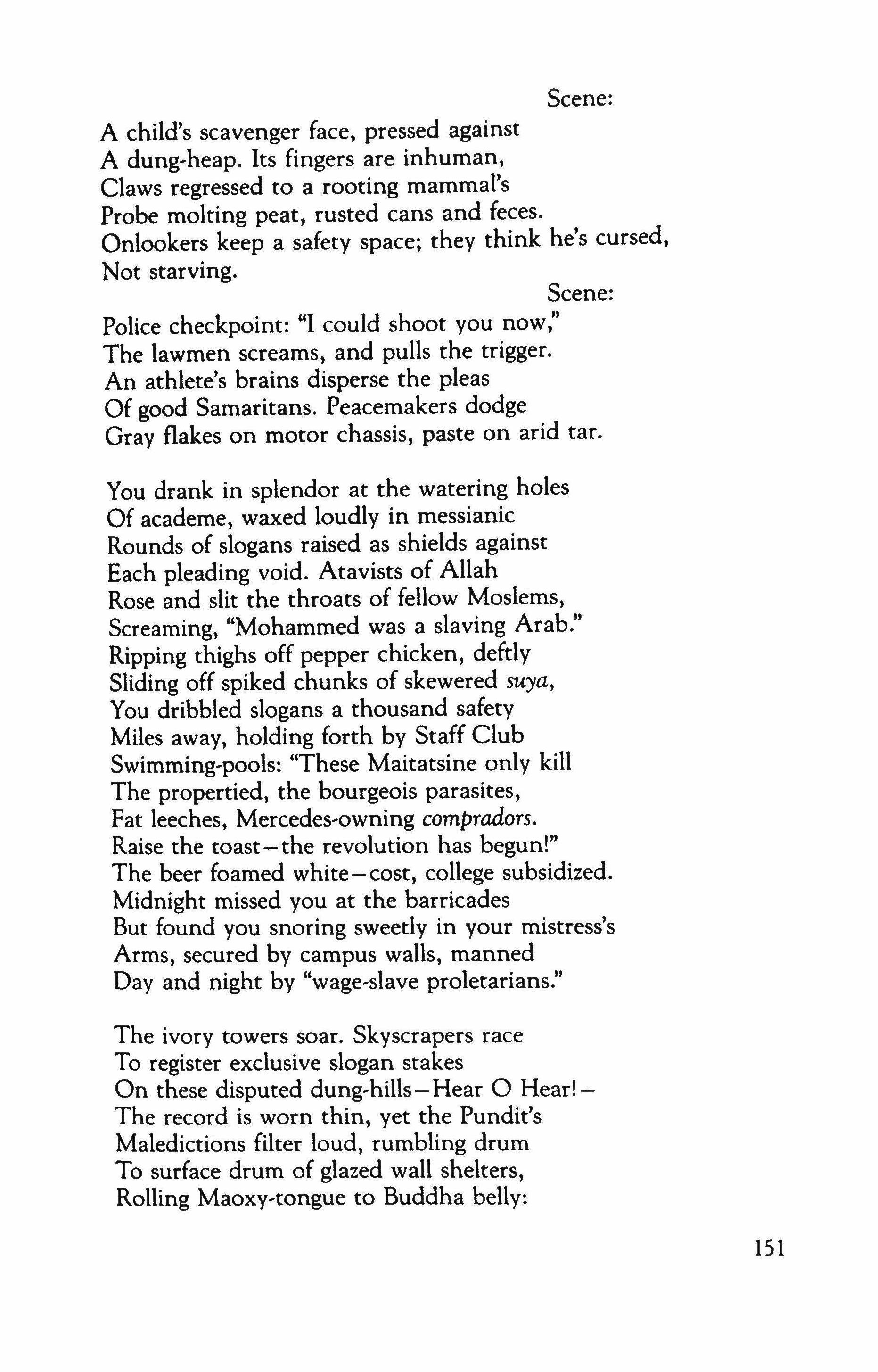
Scene:
A child's scavenger face, pressed against A dung-heap, Its fingers are inhuman, Claws regressed to a rooting mammal's Probe molting peat, rusted cans and feces. Onlookers keep a safety space; they think he's cursed, Not starving.
Scene:
Police checkpoint: "I could shoot you now," The lawmen screams, and pulls the trigger. An athlete's brains disperse the pleas Of good Samaritans. Peacemakers dodge Gray flakes on motor chassis, paste on arid tar.
You drank in splendor at the watering holes Of academe, waxed loudly in messianic Rounds of slogans raised as shields against Each pleading void. Aravists of Allah Rose and slit the throats of fellow Moslems, Screaming, "Mohammed was a slaving Arab."
Ripping thighs off pepper chicken, deftly Sliding off spiked chunks of skewered suya, You dribbled slogans a thousand safety Miles away, holding forth by Staff Club
Swimming-pools: "These Maitatsine only kill The propertied, the bourgeois parasites, Fat leeches, Mercedes-owning compradors. Raise the toast - the revolution has begun!"
The beer foamed white-cost, college subsidized. Midnight missed you at the barricades
But found you snoring sweetly in your mistress's Arms, secured by campus walls, manned Day and night by "wage-slave proletarians."
The ivory towers soar. Skyscrapers race
To register exclusive slogan stakes
On these disputed dung,hills- Hear 0 Hear!
The record is worn thin, yet the Pundit's Maledictions filter loud, rumbling drum
To surface drum of glazed wall shelters, Rolling Maoxv-tongue to Buddha belly:
151
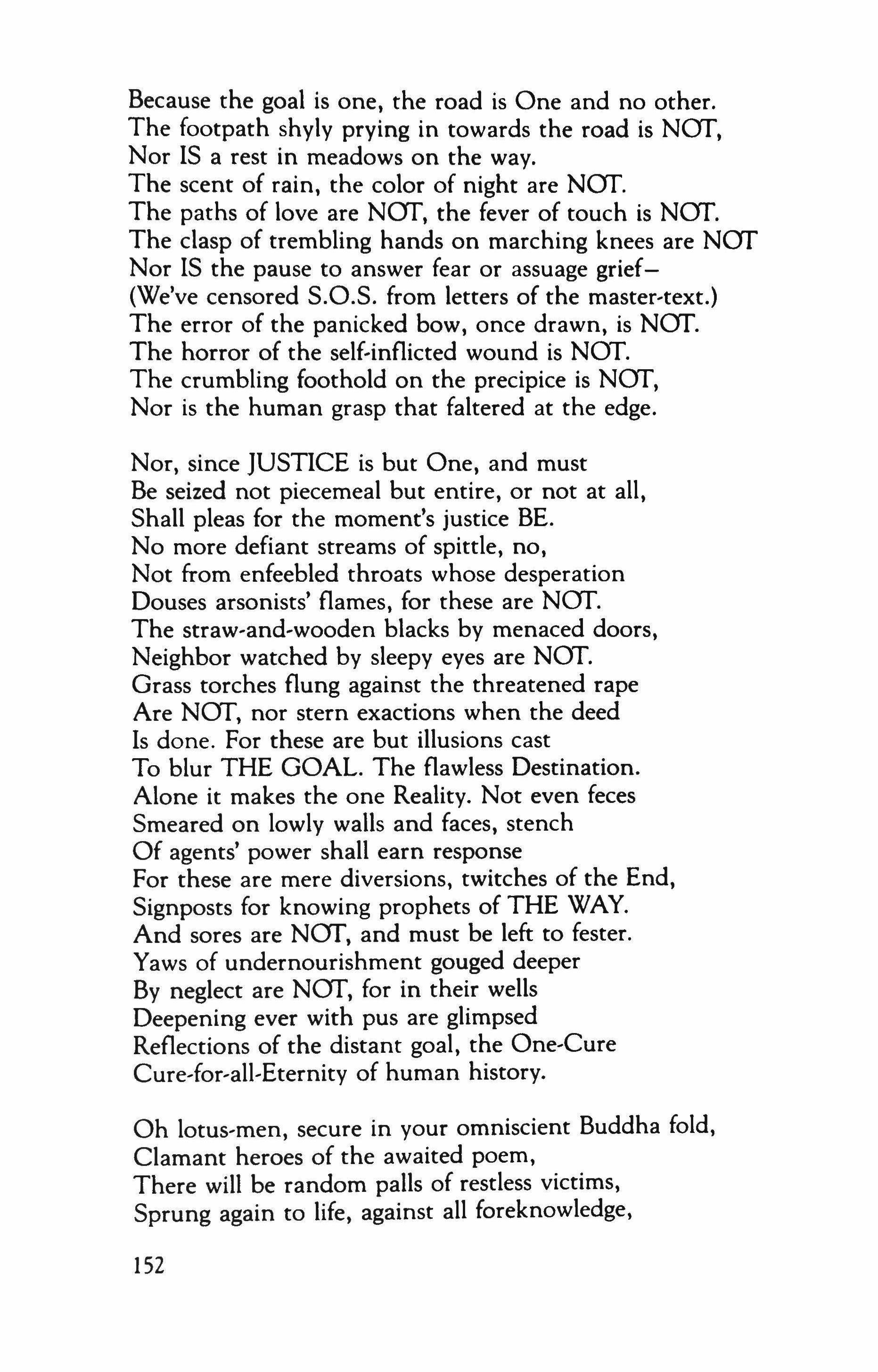
Because the goal is one, the road is One and no other. The footpath shyly prying in towards the road is NOT, Nor IS a rest in meadows on the way.
The scent of rain, the color of night are NOT.
The paths of love are NOT, the fever of touch is NOT.
The clasp of trembling hands on marching knees are NOT
Nor IS the pause to answer fear or assuage grief-
(We've censored S.O.S. from letters of the master-text.)
The error of the panicked bow, once drawn, is NOT.
The horror of the self-inflicted wound is NOT.
The crumbling foothold on the precipice is NOT, Nor is the human grasp that faltered at the edge.
Nor, since JUSTICE is but One, and must Be seized not piecemeal but entire, or not at all, Shall pleas for the moment's justice BE. No more defiant streams of spittle, no, Not from enfeebled throats whose desperation
Douses arsonists' flames, for these are NOT.
The straw-and-wooden blacks by menaced doors, Neighbor watched by sleepy eyes are NOT.
Grass torches flung against the threatened rape Are NOT, nor stern exactions when the deed Is done. For these are but illusions cast
To blur THE GOAL. The flawless Destination. Alone it makes the one Reality. Not even feces Smeared on lowly walls and faces, stench
Of agents' power shall earn response
For these are mere diversions, twitches of the End, Signposts for knowing prophets of THE WAY. And sores are NOT, and must be left to fester.
Yaws of undernourishment gouged deeper
By neglect are NOT, for in their wells
Deepening ever with pus are glimpsed Reflections of the distant goal, the One-Cure
Cure-for-all-Eternirv of human history.
Oh lotus-men, secure in your omniscient Buddha fold, Clamant heroes of the awaited poem, There will be random palls of restless victims, Sprung again to life, against all foreknowledge,
152
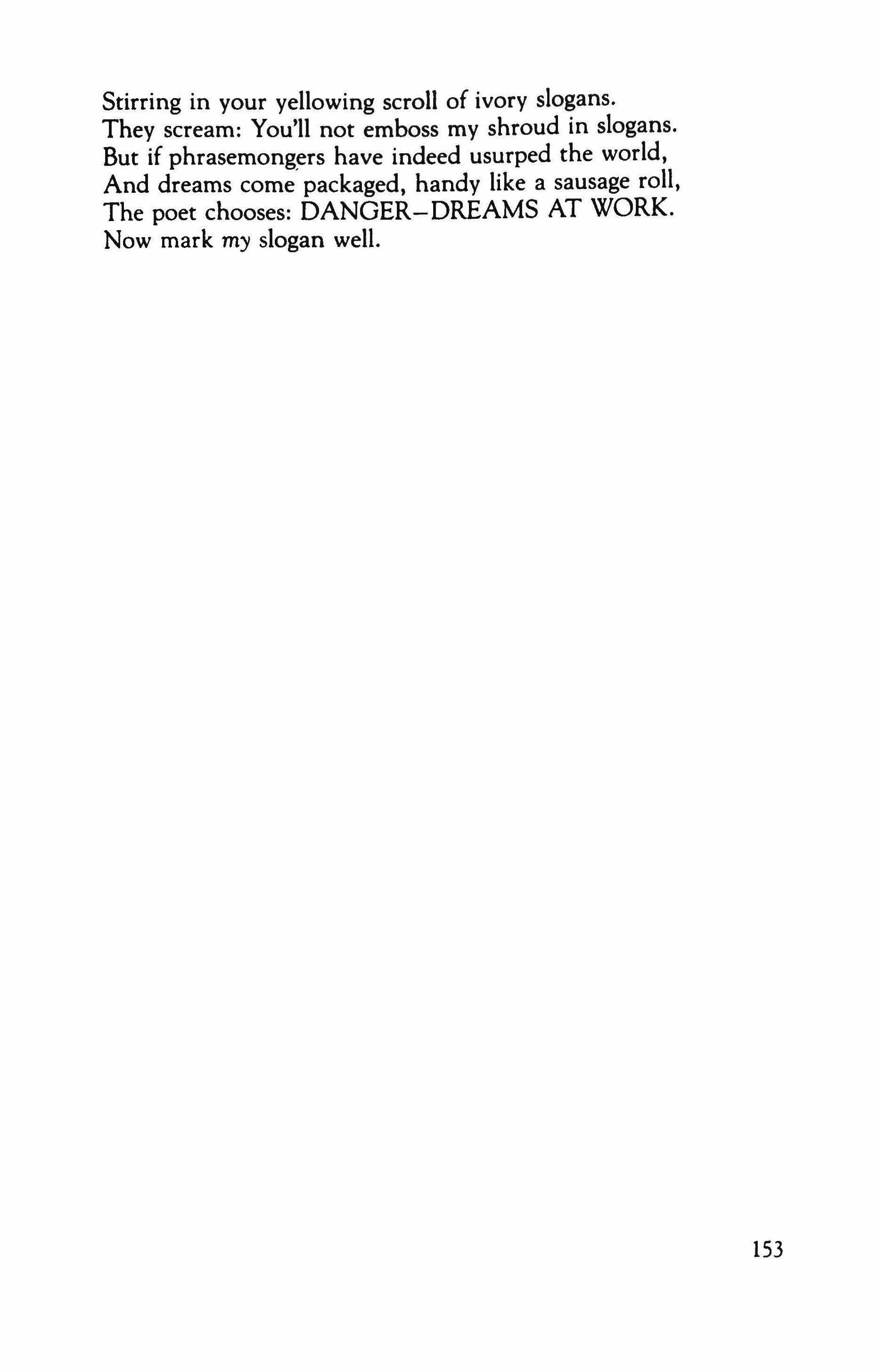
Stirring in your yellowing scroll of ivory slogans. They scream: You'll not emboss my shroud in slogans. But if phrasemongers have indeed usurped the world, And dreams come packaged, handy like a sausage roll, The poet chooses: DANGER-DREAMS AT WORK. Now mark my slogan well.
153

American Male Honor
Jonathan Holden
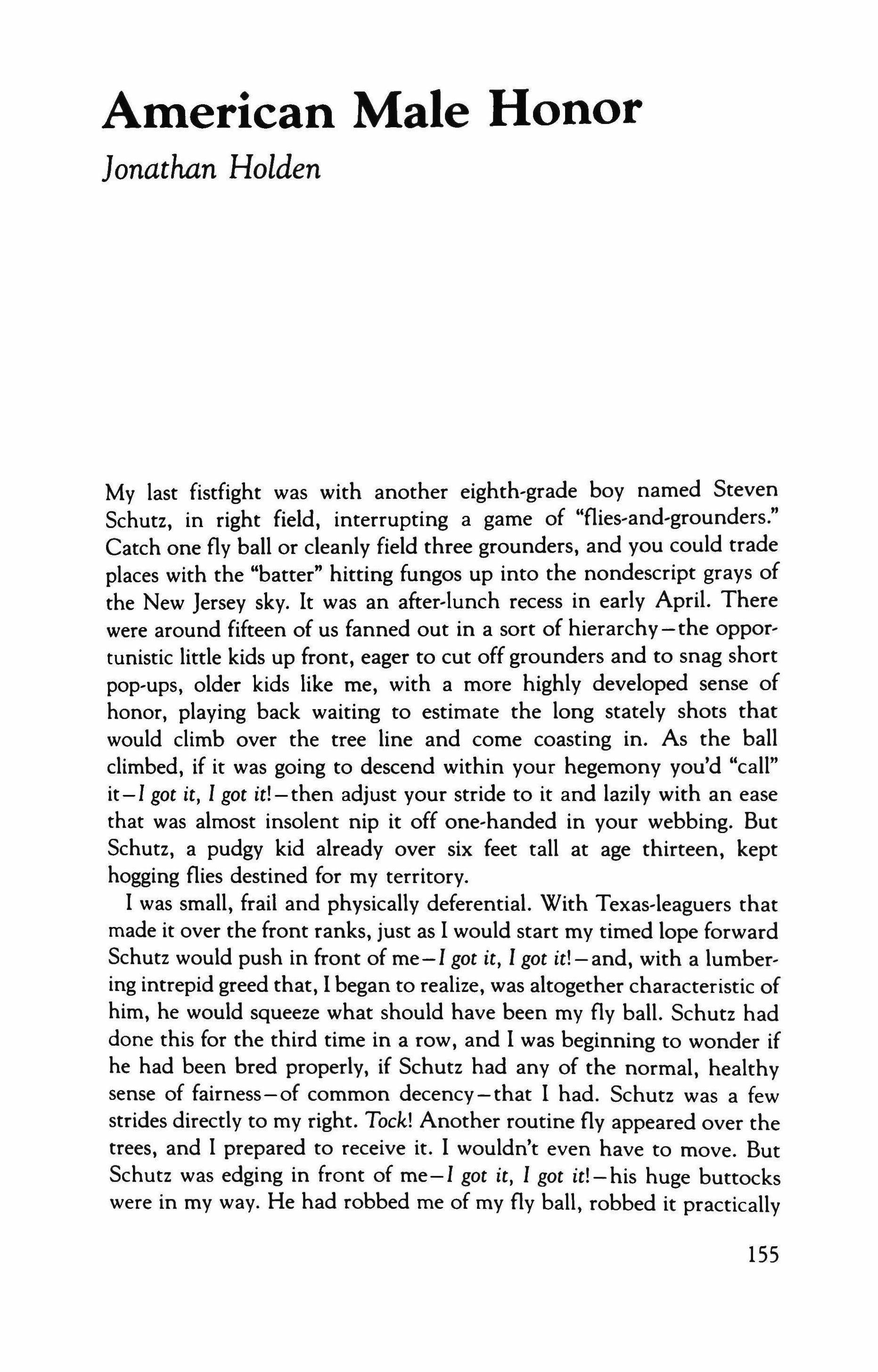
My last fistfight was with another eighth-grade boy named Steven Schutz, in right field, interrupting a game of "flies-and-grounders," Catch one fly ball or cleanly field three grounders, and you could trade places with the "batter" hitting fungos up into the nondescript grays of the New Jersey sky. It was an after-lunch recess in early April. There were around fifteen of us fanned out in a sort of hierarchy-the opportunistic little kids up front, eager to cut off grounders and to snag short pop-ups, older kids like me, with a more highly developed sense of honor, playing back waiting to estimate the long stately shots that would climb over the tree line and come coasting in. As the ball climbed, if it was going to descend within your hegemony you'd "call" it-I got it, 1 got it! - then adjust your stride to it and lazily with an ease that was almost insolent nip it off one'handed in your webbing. But Schutz, a pudgy kid already over six feet tall at age thirteen, kept hogging flies destined for my territory.
I was small, frail and physically deferential. With Texas-leaguers that made it over the front ranks, just as I would start my timed lope forward Schutz would push in front of me - I got it, I got it! - and, with a lumber, ing intrepid greed that, I began to realize, was altogether characteristic of him, he would squeeze what should have been my fly ball. Schutz had done this for the third time in a row, and I was beginning to wonder if he had been bred properly, if Schutz had any of the normal, healthy sense of fairness-of common decency-that I had. Schutz was a few strides directly to my right. Tock! Another routine fly appeared over the trees, and I prepared to receive it. I wouldn't even have to move. But Schutz was edging in front of me-I got it, I got it!-his huge buttocks were in my way. He had robbed me of my fly ball, robbed it practically
155
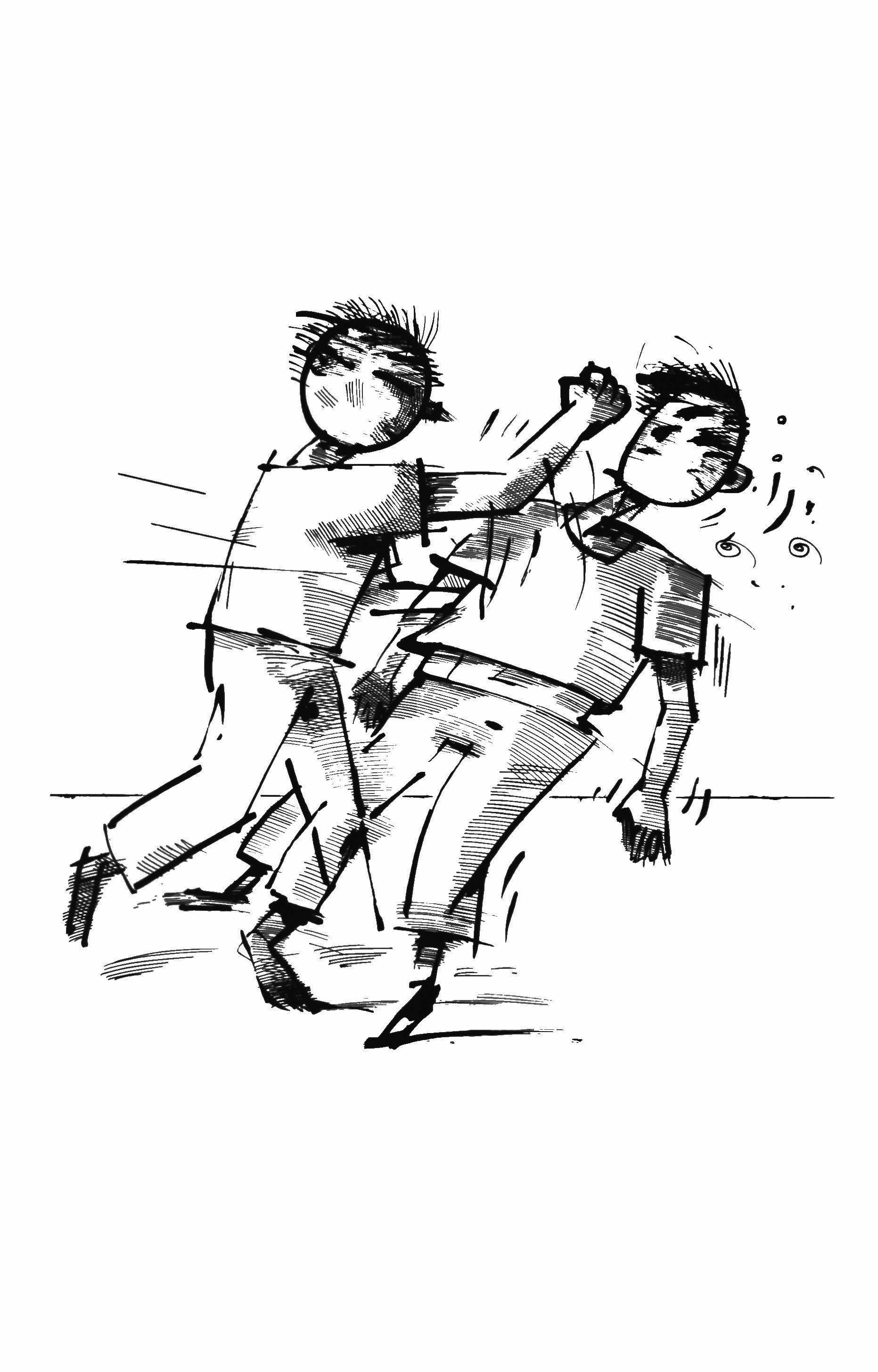
o
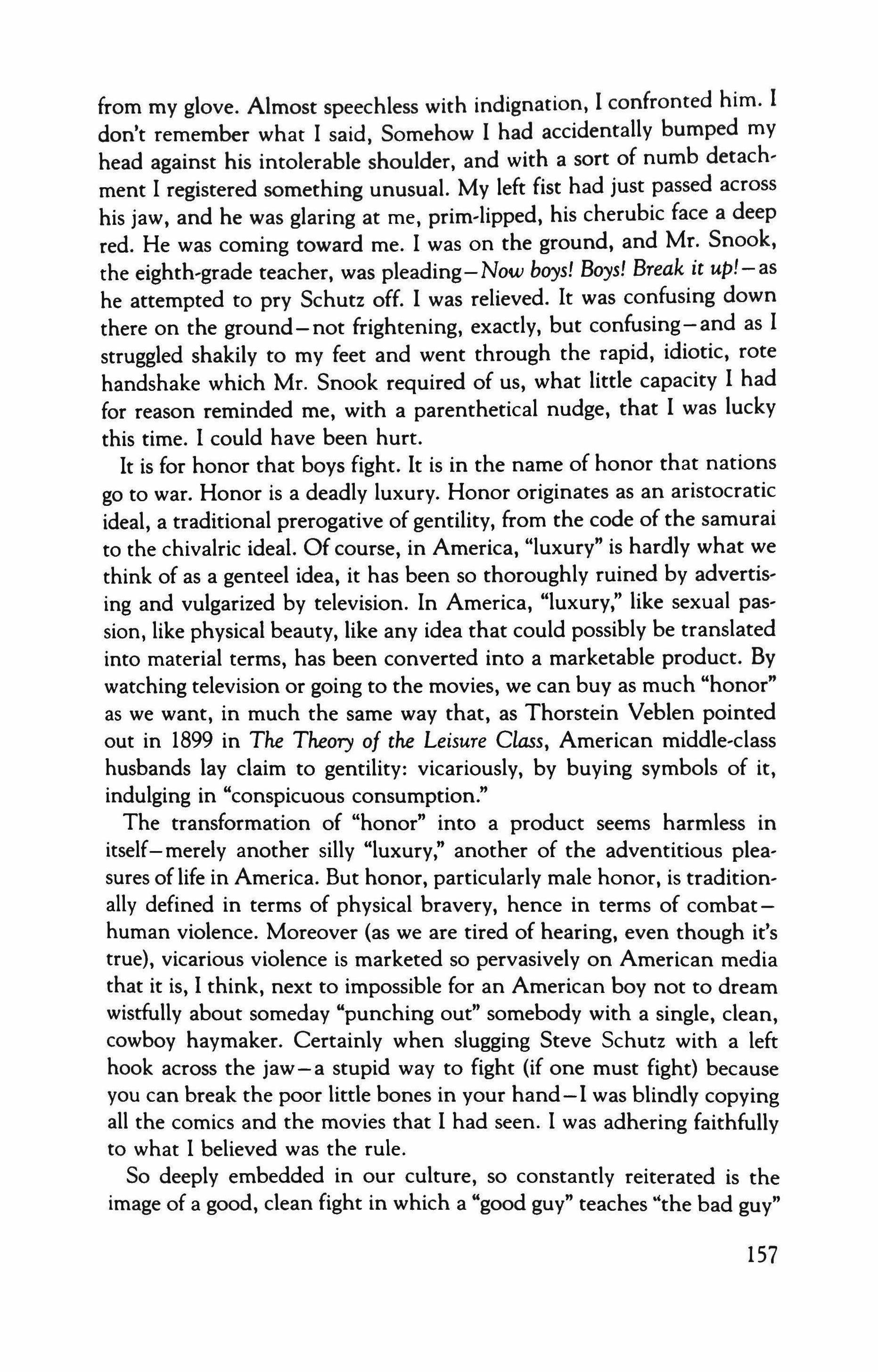
from my glove. Almost speechless with indignation, I confronted him. I don't remember what I said, Somehow I had accidentally bumped my head against his intolerable shoulder, and with a sort of numb detach, ment I registered something unusual. My left fist had just passed across his jaw, and he was glaring at me, prim-lipped, his cherubic face a deep red. He was coming toward me. I was on the ground, and Mr. Snook, the eighth-grade teacher, was pleading-Now boys! Boys! Break it up!-as he attempted to pry Schutz off. I was relieved. It was confusing down there on the ground-not frightening, exactly, but confusing-and as I struggled shakily to my feet and went through the rapid, idiotic, rote handshake which Mr. Snook required of us, what little capacity I had for reason reminded me, with a parenthetical nudge, that I was lucky this time. I could have been hurt.
It is for honor that boys fight. It is in the name of honor that nations go to war. Honor is a deadly luxury. Honor originates as an aristocratic ideal, a traditional prerogative of gentility, from the code of the samurai to the chivalric ideal. Of course, in America, "luxury" is hardly what we think of as a genteel idea, it has been so thoroughly ruined by advertising and vulgarized by television. In America, "luxury," like sexual pas' sion, like physical beauty, like any idea that could possibly be translated into material terms, has been converted into a marketable product. By watching television or going to the movies, we can buy as much "honor" as we want, in much the same way that, as Thorstein Veblen pointed out in 1899 in The Theory of the Leisure Class, American middle-class husbands lay claim to gentility: vicariously, by buying symbols of it, indulging in "conspicuous consumption."
The transformation of "honor" into a product seems harmless in itself-merely another silly "luxury," another of the adventitious plea, sures oflife in America. But honor, particularly male honor, is tradition, ally defined in terms of physical bravery, hence in terms of combathuman violence. Moreover (as we are tired of hearing, even though it's true), vicarious violence is marketed so pervasively on American media that it is, I think, next to impossible for an American boy not to dream wistfully about someday "punching out" somebody with a single, clean, cowboy haymaker. Certainly when slugging Steve Schutz with a left hook across the jaw-a stupid way to fight (if one must fight) because you can break the poor little bones in your hand-1 was blindly copying all the comics and the movies that 1 had seen. I was adhering faithfully to what 1 believed was the rule.
So deeply embedded in our culture, so constantly reiterated is the image of a good, clean fight in which a "good guy" teaches "the bad guy"
157
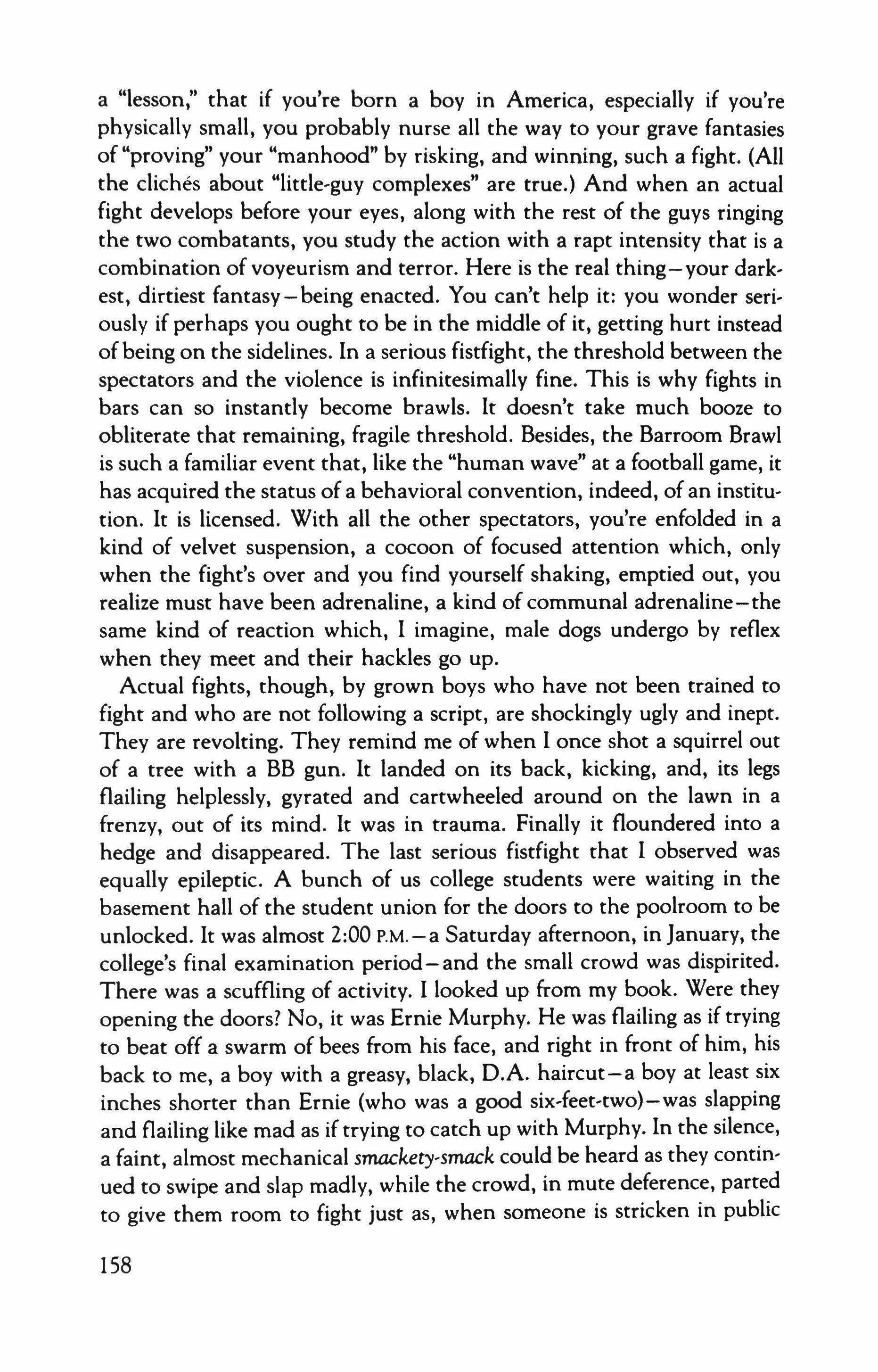
a "lesson," that if you're born a boy in America, especially if you're physically small, you probably nurse all the way to your grave fantasies of "proving" your "manhood" by risking, and winning, such a fight. (All the cliches about "little-guy complexes" are true.) And when an actual fight develops before your eyes, along with the rest of the guys ringing the two combatants, you study the action with a rapt intensity that is a combination of voyeurism and terror. Here is the real thing-your dark, est, dirtiest fantasy - being enacted. You can't help it: you wonder seriously if perhaps you ought to be in the middle of it, getting hurt instead ofbeing on the sidelines. In a serious fistfight, the threshold between the spectators and the violence is infinitesimally fine. This is why fights in bars can so instantly become brawls. It doesn't take much booze to obliterate that remaining, fragile threshold. Besides, the Barroom Brawl is such a familiar event that, like the "human wave" at a football game, it has acquired the status of a behavioral convention, indeed, of an institution. It is licensed. With all the other spectators, you're enfolded in a kind of velvet suspension, a cocoon of focused attention which, only when the fight's over and you find yourself shaking, emptied out, you realize must have been adrenaline, a kind of communal adrenaline-the same kind of reaction which, I imagine, male dogs undergo by reflex when they meet and their hackles go up.
Actual fights, though, by grown boys who have not been trained to fight and who are not following a script, are shockingly ugly and inept. They are revolting. They remind me of when I once shot a squirrel out of a tree with a BB gun. It landed on its back, kicking, and, its legs flailing helplessly, gyrated and cartwheeled around on the lawn in a frenzy, out of its mind. It was in trauma. Finally it floundered into a hedge and disappeared. The last serious fistfight that I observed was equally epileptic. A bunch of us college students were waiting in the basement hall of the student union for the doors to the poolroom to be unlocked. It was almost 2:00 P.M. - a Saturday afternoon, in January, the college's final examination period - and the small crowd was dispirited. There was a scuffling of activity. I looked up from my book. Were they opening the doors? No, it was Ernie Murphy. He was flailing as if trying to beat off a swarm of bees from his face, and right in front of him, his back to me, a boy with a greasy, black, D.A. haircut-a boy at least six inches shorter than Ernie (who was a good six-feet-twol=was slapping and flailing like mad as if trying to catch up with Murphy. In the silence, a faint, almost mechanical smackety,smack could be heard as they continued to swipe and slap madly, while the crowd, in mute deference, parted to give them room to fight just as, when someone is stricken in public
158

and a crowd closes in to stare, the first cry that goes up is "Give him some air!" The two were in trauma. We had to give them air.
Smickety-smackety, the trauma worked its way along the hall, then collapsed, thrashing, and Ernie was on top, gasping "Nuff? Nuff?" A muffled reply, and Ernie let the boy up and sent him on his way with a brisk, friendly pat on the ass. The boy groped past us. He looked dazed, ancient, as if emerging from the hospital into daylight after major surgery, still half under the anesthetic. His left eye was ruined. It was swollen closed, and under it bulged an exotic purple sac like a water balloon. The boy gingerly found his way outdoors, past a student coming in, who stared. "What happened?" A kid named Jimmy Silver, a slick semi-hood who liked to hang out with tough guys but was careful never to get into a fight himself, spoke up in a cheerful voice: "Some kid was giving us some lip, so Ernie roughed him up a little." Silver winked, coy, almost fey. He was spokesman for the gang. Ernie was their fist. The gang was his fist. Power is transitive. Silver was basking in it. He was thrilled, satiated. Vicariously.
I think of this-not of Murphy but of Silver-even now when watching news conferences on TV as different Secretaries of Defense, in their dark, conservative bankers' suits, unroll some diagram like a gradeschool social studies map and, using a long pointer to indicate exactly where an enemy infection has attacked American forces, explain, in the same patient, pedantic voice that my grade-school teachers once used, the necessary surgical countermeasures that are being taken. The rhetoric is blood-curdling, because it creates reality. If Communism is a "cancer" that is spreading, then perhaps massive radiation treatments will one day be prescribed by the doctors in that world health organization known as the Pentagon.
It can be taken as a general rule of thumb, I think, that the rhetoric which "civilized" nations deploy to try to justify their military adventures becomes abstract and medical in direct proportion to the illegitimacy of those adventures. I was impressed by this a couple of years ago at the Topeka Air Show, where the U.S. Air Force Thunderbirds were featured. A professional announcer read from a script, and there was background music-the sound track from the movie Chariots of Fire. As the six F-16's took off, we were thrilled by what I can only think of as The Technological Sublime:
159
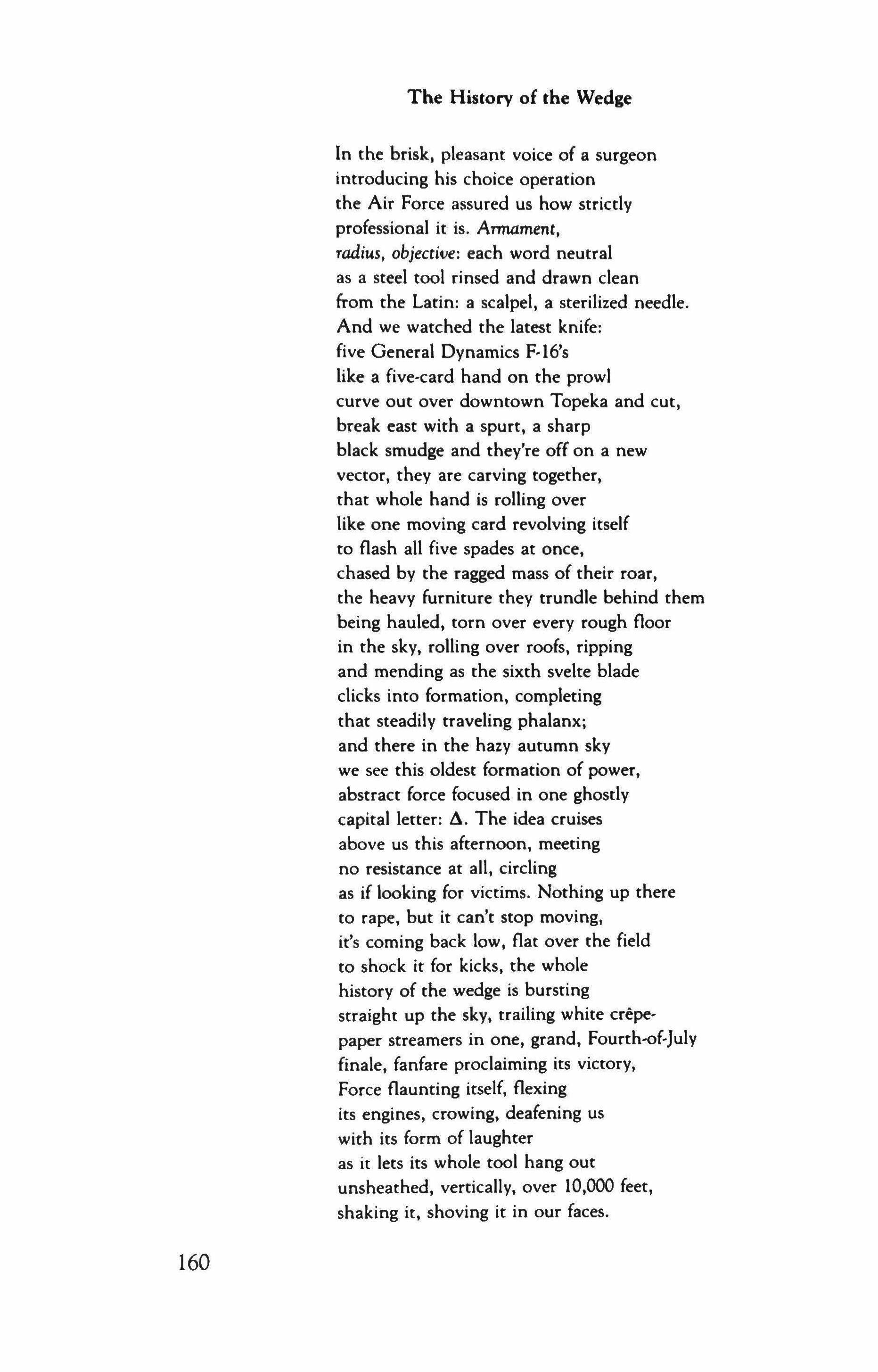
The History of the Wedge
In the brisk, pleasant voice of a surgeon introducing his choice operation the Air Force assured us how strictly professional it is. Annament, radius, objective: each word neutral as a steel tool rinsed and drawn clean from the Latin: a scalpel, a sterilized needle. And we watched the latest knife: five General Dynamics F-16's like a five-card hand on the prowl curve out over downtown Topeka and cut, break east with a spurt, a sharp black smudge and they're off on a new vector, they are carving together, that whole hand is rolling over like one moving card revolving itself to flash all five spades at once, chased by the ragged mass of their roar, the heavy furniture they trundle behind them being hauled, torn over every rough floor in the sky, rolling over roofs, ripping and mending as the sixth svelte blade clicks into formation, completing that steadily traveling phalanx; and there in the hazy autumn sky we see this oldest formation of power, abstract force focused in one ghostly capital letter: 4. The idea cruises above us this afternoon, meeting no resistance at all, circling as if looking for victims. Nothing up there to rape, but it can't stop moving, it's coming back low, flat over the field to shock it for kicks, the whole history of the wedge is bursting straight up the sky, trailing white crepepaper streamers in one, grand, Fourth-of-July finale, fanfare proclaiming its victory, Force flaunting itself, flexing its engines, crowing, deafening us with its form of laughter as it lets its whole tool hang out unsheathed, vertically, over 10,000 feet, shaking it, shoving it in our faces.
160
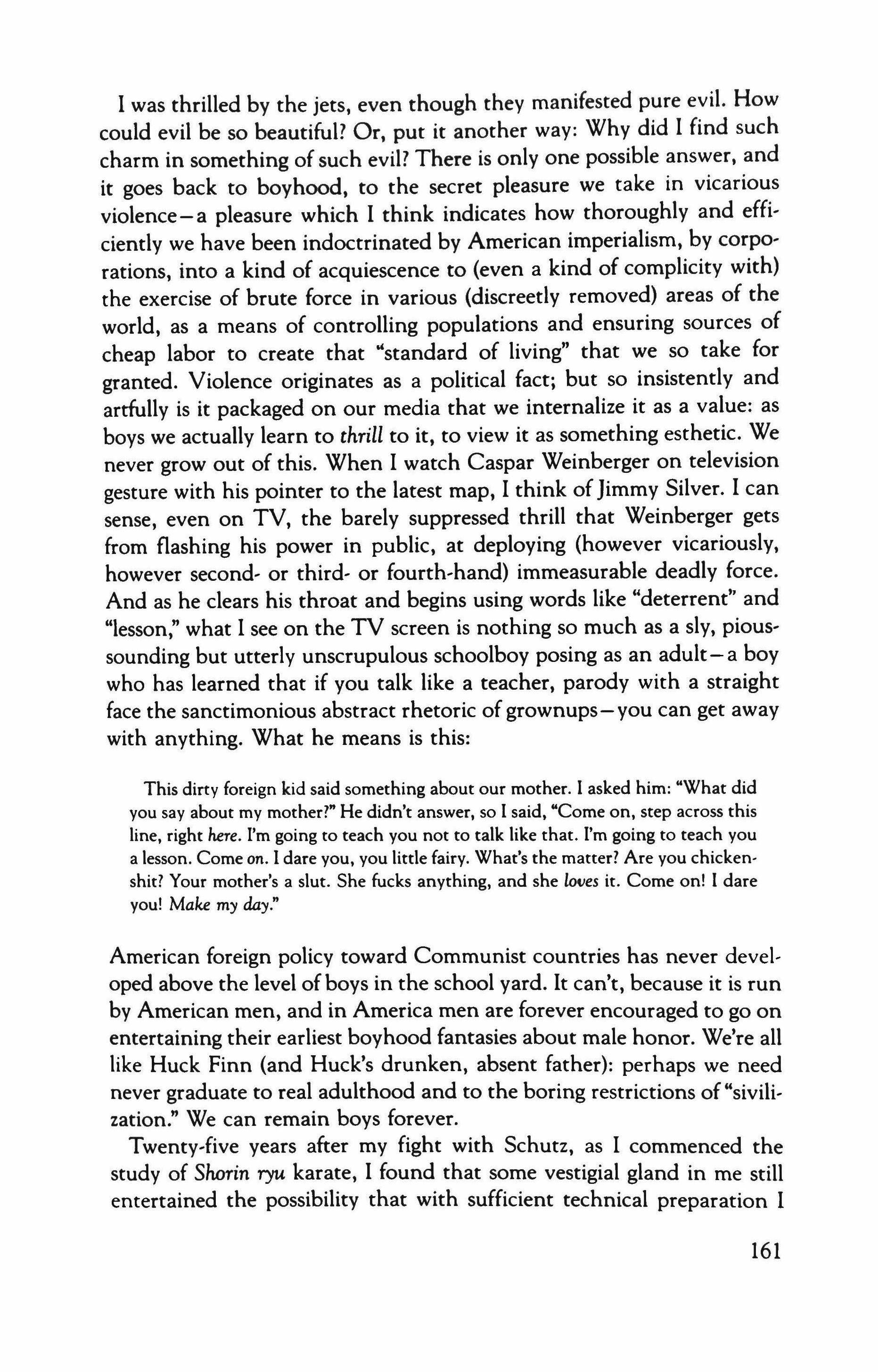
I was thrilled by the jets, even though they manifested pure evil. How could evil be so beautiful? Or, put it another way: Why did I find such charm in something of such evil? There is only one possible answer, and it goes back to boyhood, to the secret pleasure we take in vicarious violence-a pleasure which I think indicates how thoroughly and efficiently we have been indoctrinated by American imperialism, by corporations, into a kind of acquiescence to (even a kind of complicity with) the exercise of brute force in various (discreetly removed) areas of the world, as a means of controlling populations and ensuring sources of cheap labor to create that "standard of living" that we so take for granted. Violence originates as a political fact; but so insistently and artfully is it packaged on our media that we internalize it as a value: as boys we actually learn to thrill to it, to view it as something esthetic. We never grow out of this. When I watch Caspar Weinberger on television gesture with his pointer to the latest map, I think ofJimmy Silver. I can sense, even on TV, the barely suppressed thrill that Weinberger gets from flashing his power in public, at deploying (however vicariously, however second- or third- or fourth-hand) immeasurable deadly force. And as he clears his throat and begins using words like "deterrent" and "lesson," what I see on the TV screen is nothing so much as a sly, pioussounding but utterly unscrupulous schoolboy posing as an adult-a boy who has learned that if you talk like a teacher, parody with a straight face the sanctimonious abstract rhetoric of grownups-you can get away with anything. What he means is this:
This dirty foreign kid said something about our mother. I asked him: "What did you say about my mother?" He didn't answer, so I said, "Come on, step across this line, right here. I'm going to teach you not to talk like that. I'm going to teach you a lesson. Come on. I dare you, you little fairy. What's the matter? Are you chickenshit? Your mother's a slut. She fucks anything, and she lmJes it. Come on! I dare you! Make my day."
American foreign policy toward Communist countries has never developed above the level ofboys in the school yard. It can't, because it is run by American men, and in America men are forever encouraged to go on entertaining their earliest boyhood fantasies about male honor. We're all like Huck Finn (and Huck's drunken, absent father): perhaps we need never graduate to real adulthood and to the boring restrictions of "sivilization," We can remain boys forever.
Twentv-five years after my fight with Schutz, as I commenced the study of Slwrin ryu karate, I found that some vestigial gland in me still entertained the possibility that with sufficient technical preparation I
161
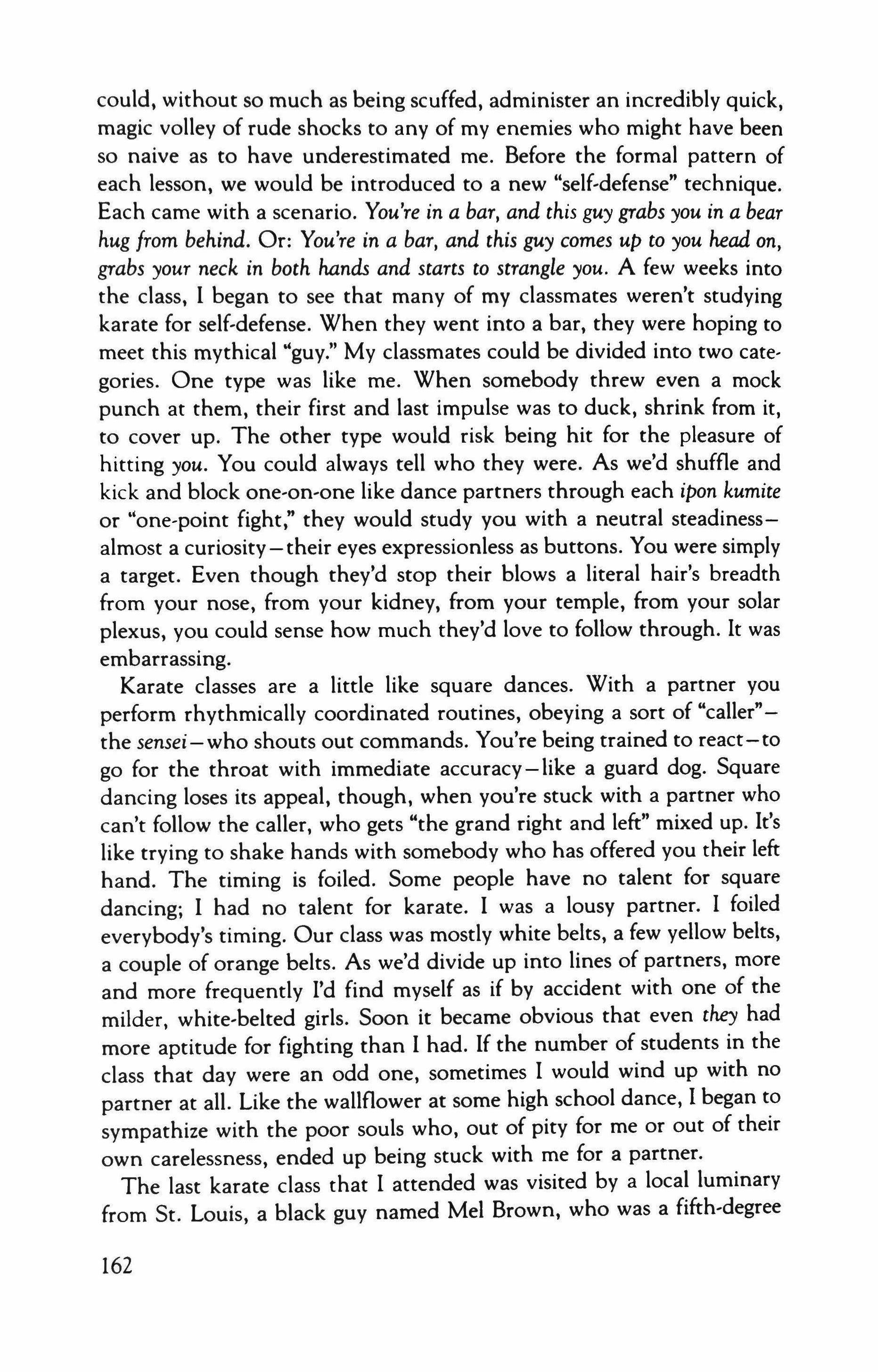
could, without so much as being scuffed, administer an incredibly quick, magic volley of rude shocks to any of my enemies who might have been so naive as to have underestimated me. Before the formal pattern of each lesson, we would be introduced to a new "self-defense" technique. Each came with a scenario. You're in a bar, and this guy grabs you in a bear hug from behind. Or: You're in a bar, and this guy comes up to you head on, grabs your neck in both hands and starts to strangle you. A few weeks into the class, I began to see that many of my classmates weren't studying karate for self-defense. When they went into a bar, they were hoping to meet this mythical "guy." My classmates could be divided into two categories. One type was like me. When somebody threw even a mock punch at them, their first and last impulse was to duck, shrink from it, to cover up. The other type would risk being hit for the pleasure of hitting you. You could always tell who they were. As we'd shuffle and kick and block one-on-one like dance partners through each ipon kumite or "one-point fight," they would study you with a neutral steadinessalmost a curiosity - their eyes expressionless as buttons. You were simply a target. Even though they'd stop their blows a literal hair's breadth from your nose, from your kidney, from your temple, from your solar plexus, you could sense how much they'd love to follow through. It was embarrassing.
Karate classes are a little like square dances. With a partner you perform rhythmically coordinated routines, obeying a sort of "caller"the sensei-who shouts out commands. You're being trained to react-to go for the throat with immediate accuracy -like a guard dog. Square dancing loses its appeal, though, when you're stuck with a partner who can't follow the caller, who gets "the grand right and left" mixed up. It's like trying to shake hands with somebody who has offered you their left hand. The timing is foiled. Some people have no talent for square dancing; I had no talent for karate. I was a lousy partner. I foiled everybody's timing. Our class was mostly white belts, a few yellow belts, a couple of orange belts. As we'd divide up into lines of partners, more and more frequently I'd find myself as if by accident with one of the milder, white-belted girls. Soon it became obvious that even they had more aptitude for fighting than I had. If the number of students in the class that day were an odd one, sometimes I would wind up with no partner at all. Like the wallflower at some high school dance, I began to sympathize with the poor souls who, out of pity for me or out of their own carelessness, ended up being stuck with me for a partner.
The last karate class that I attended was visited by a local luminary from St. Louis, a black guy named Mel Brown, who was a fifth-degree
162
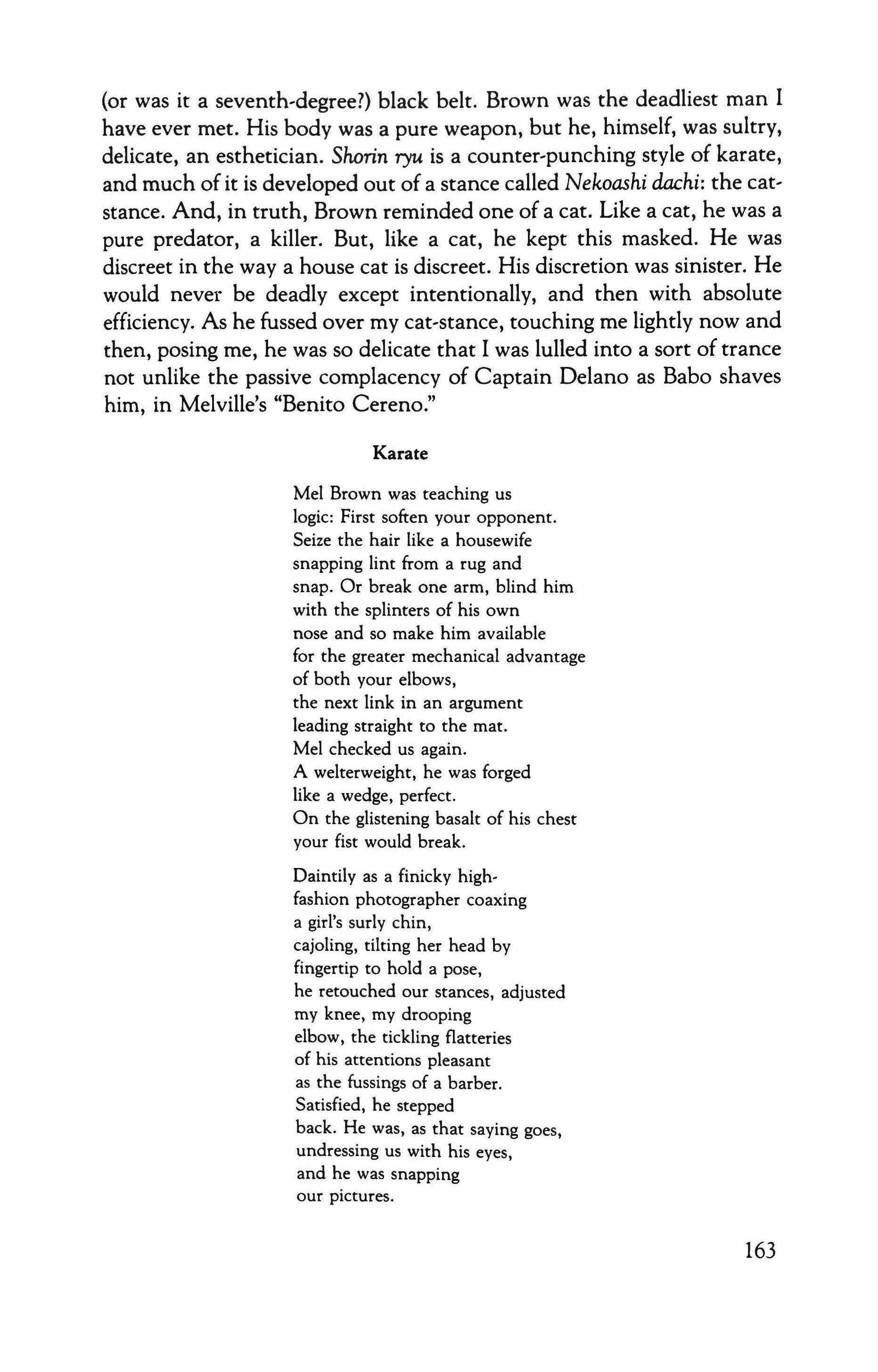
(or was it a seventh-degreei) black belt. Brown was the deadliest man I have ever met. His body was a pure weapon, but he, himself, was sultry, delicate, an esthetician. Shorin ryu is a counter-punching style of karate, and much of it is developed out of a stance called Nekoashi dachi: the carstance. And, in truth, Brown reminded one of a cat. Like a cat, he was a pure predator, a killer. But, like a cat, he kept this masked. He was discreet in the way a house cat is discreet. His discretion was sinister. He would never be deadly except intentionally, and then with absolute efficiency. As he fussed over my cat-stance, touching me lightly now and then, posing me, he was so delicate that I was lulled into a sort of trance not unlike the passive complacency of Captain Delano as Babo shaves him, in Melville's "Benito Cereno."
Karate
Mel Brown was teaching us logic: First soften your opponent. Seize the hair like a housewife snapping lint from a rug and snap. Or break one arm, blind him with the splinters of his own nose and so make him available for the greater mechanical advantage of both your elbows, the next link in an argument leading straight to the mat. Mel checked us again. A welterweight, he was forged like a wedge, perfect. On the glistening basalt of his chest your fist would break.
Daintily as a finicky highfashion photographer coaxing a girl's surly chin, cajoling, tilting her head by fingertip to hold a pose, he retouched our stances, adjusted my knee, my drooping elbow, the tickling flatteries of his attentions pleasant as the fussings of a barber. Satisfied, he stepped back. He was, as that saying goes, undressing us with his eyes, and he was snapping our pictures.
163
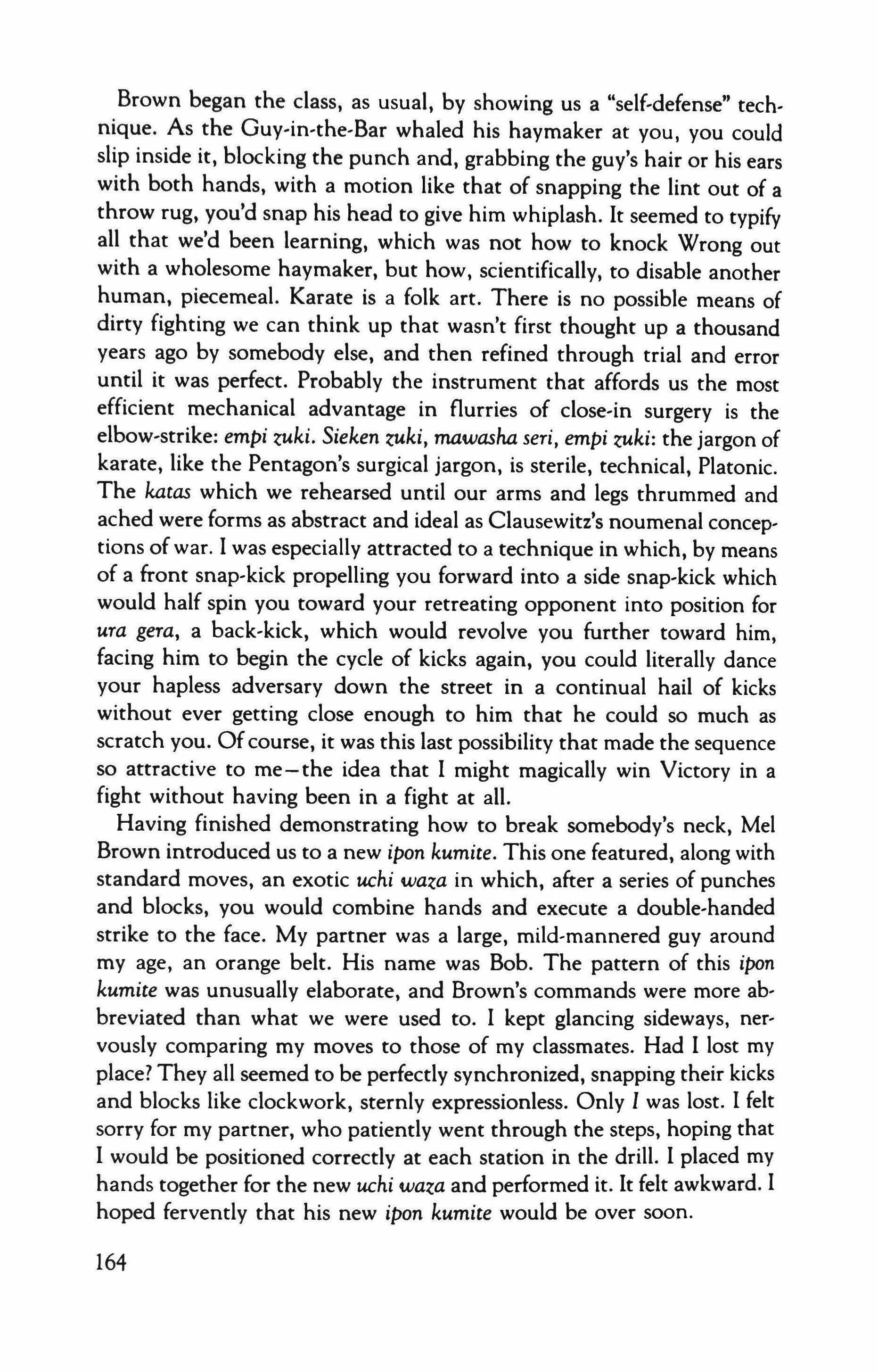
Brown began the class, as usual, by showing us a "self-defense" technique. As the Guy-in-the-Bar whaled his haymaker at you, you could slip inside it, blocking the punch and, grabbing the guy's hair or his ears with both hands, with a motion like that of snapping the lint out of a throw rug, you'd snap his head to give him whiplash. It seemed to typify all that we'd been learning, which was not how to knock Wrong out with a wholesome haymaker, but how, scientifically, to disable another human, piecemeal. Karate is a folk art. There is no possible means of dirty fighting we can think up that wasn't first thought up a thousand years ago by somebody else, and then refined through trial and error until it was perfect. Probably the instrument that affords us the most efficient mechanical advantage in flurries of close-in surgery is the elbow-strike: empi zuki. Sieken zuki, mawasha seri, empi zuki: the jargon of karate, like the Pentagon's surgical jargon, is sterile, technical, Platonic. The kacas which we rehearsed until our arms and legs thrummed and ached were forms as abstract and ideal as Clausewitz's noumenal conceptions of war. I was especially attracted to a technique in which, by means of a front snap-kick propelling you forward into a side snap-kick which would half spin you toward your retreating opponent into position for ura gera, a back-kick, which would revolve you further toward him, facing him to begin the cycle of kicks again, you could literally dance your hapless adversary down the street in a continual hail of kicks without ever getting close enough to him that he could so much as scratch you. Of course, it was this last possibility that made the sequence so attractive to me - the idea that I might magically win Victory in a fight without having been in a fight at all.
Having finished demonstrating how to break somebody's neck, Mel Brown introduced us to a new ipon kumite. This one featured, along with standard moves, an exotic uchi waza in which, after a series of punches and blocks, you would combine hands and execute a double-handed strike to the face. My partner was a large, mild-mannered guy around my age, an orange belt. His name was Bob. The pattern of this ipon kumite was unusually elaborate, and Brown's commands were more abbreviated than what we were used to. I kept glancing sideways, nervously comparing my moves to those of my classmates. Had I lost my place? They all seemed to be perfectly synchronized, snapping their kicks and blocks like clockwork, sternly expressionless. Only I was lost. I felt sorry for my partner, who patiently went through the steps, hoping that I would be positioned correctly at each station in the drill. I placed my hands together for the new uchi waza and performed it. It felt awkward. I hoped fervently that his new ipon kumite would be over soon.
164
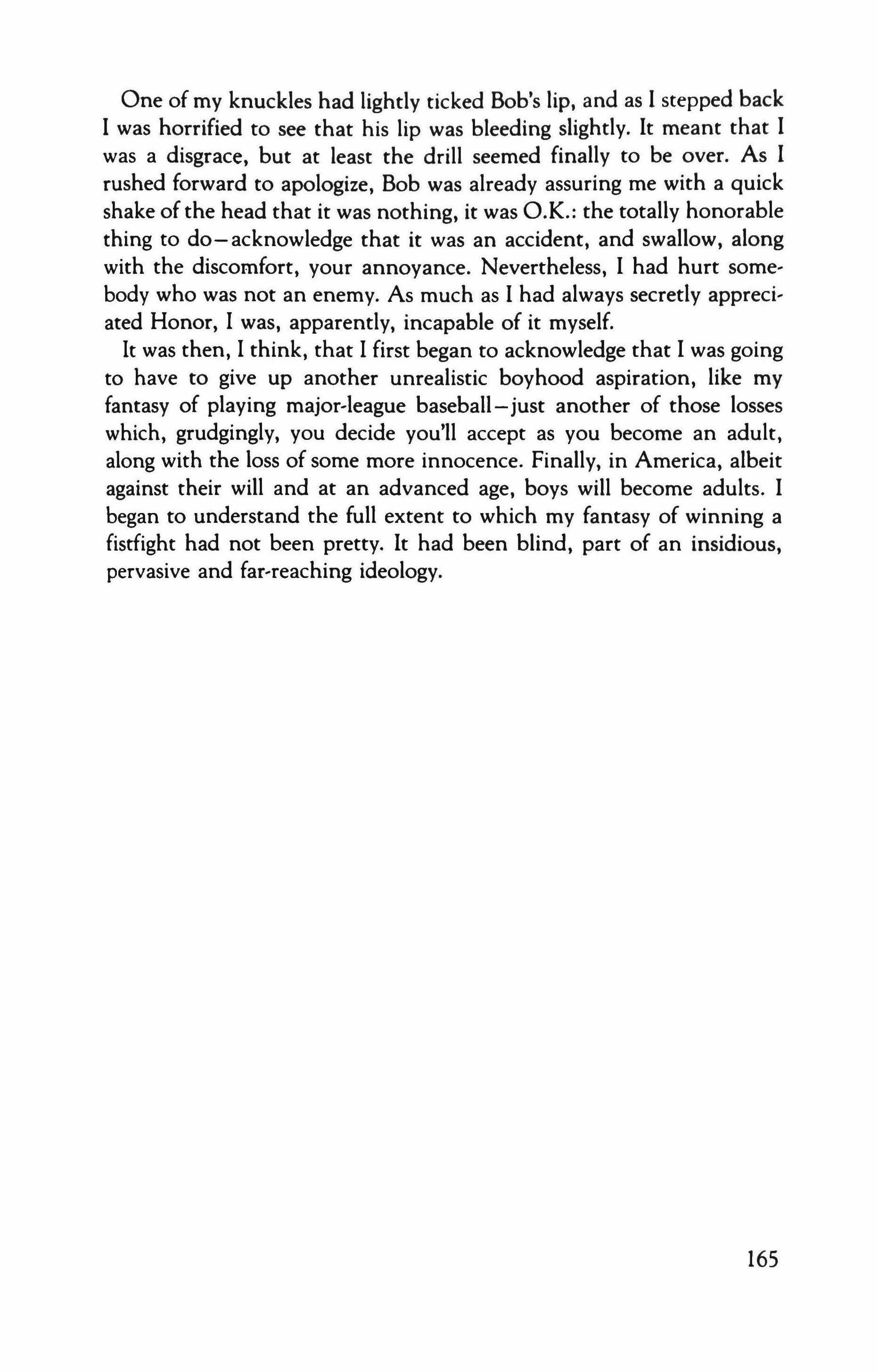
One of my knuckles had lightly ticked Bob's lip, and as I stepped back I was horrified to see that his lip was bleeding slightly. It meant that I was a disgrace, but at least the drill seemed finally to be over. As I rushed forward to apologize, Bob was already assuring me with a quick shake ofthe head that it was nothing, it was O.K.: the totally honorable thing to do-acknowledge that it was an accident, and swallow, along with the discomfort, your annoyance. Nevertheless, I had hurt somebody who was not an enemy. As much as I had always secretly appreciated Honor, I was, apparently, incapable of it myself.
It was then, I think, that I first began to acknowledge that I was going to have to give up another unrealistic boyhood aspiration, like my fantasy of playing major-league baseball-just another of those losses which, grudgingly, you decide you'll accept as you become an adult, along with the loss of some more innocence. Finally, in America, albeit against their will and at an advanced age, boys will become adults. I began to understand the full extent to which my fantasy of winning a fistfight had not been pretty. It had been blind, part of an insidious, pervasive and far-reaching ideology.
165
At the Mercy of the Play:
Poetry and Its Discontents
Theodore Weiss
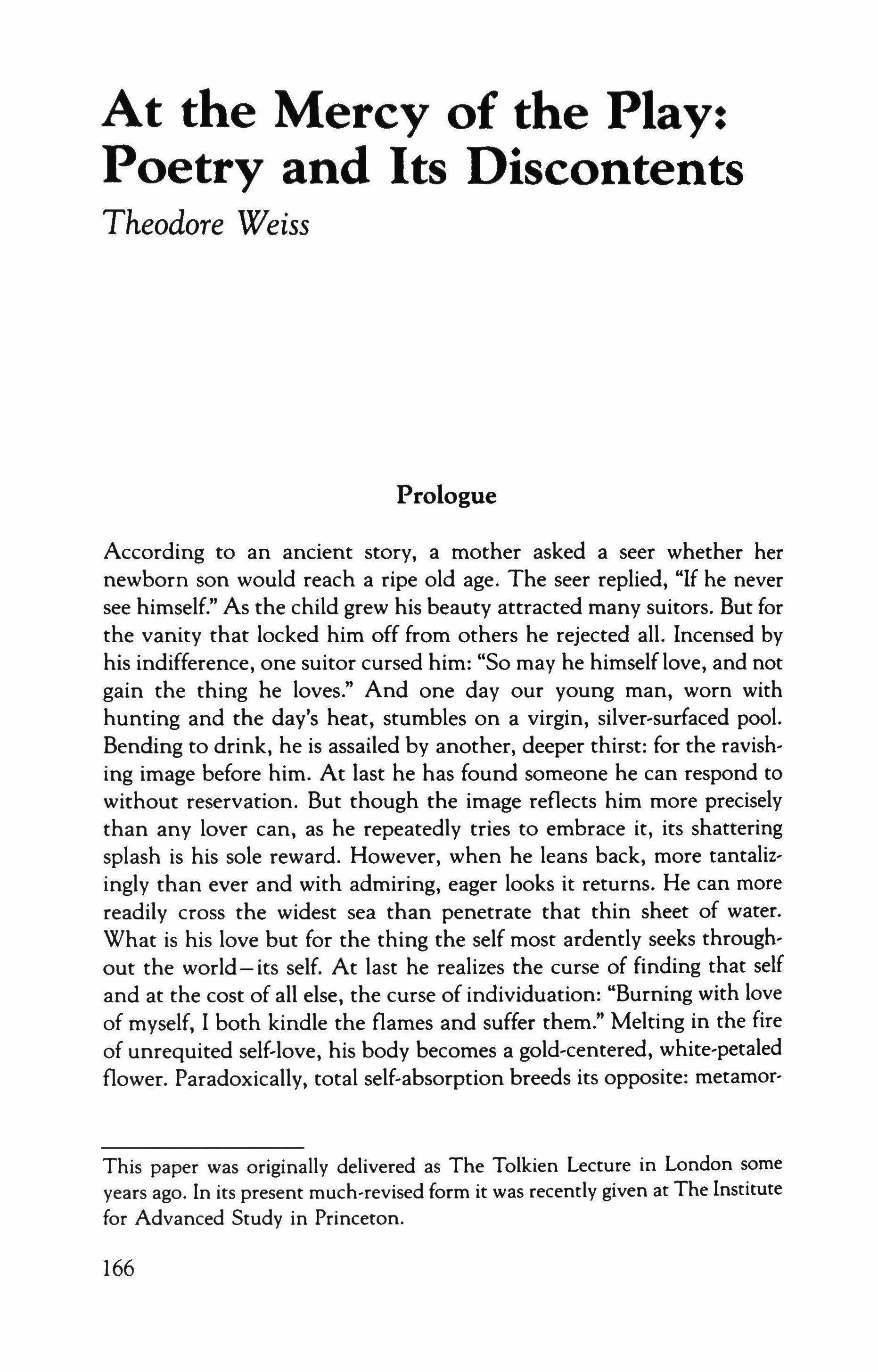
Prologue
According to an ancient story, a mother asked a seer whether her newborn son would reach a ripe old age. The seer replied, "If he never see himself." As the child grew his beauty attracted many suitors. But for the vanity that locked him off from others he rejected all. Incensed by his indifference, one suitor cursed him: "So may he himselflove, and not gain the thing he loves." And one day our young man, worn with hunting and the day's heat, stumbles on a virgin, silver-surfaced pool.
Bending to drink, he is assailed by another, deeper thirst: for the ravishing image before him. At last he has found someone he can respond to without reservation. But though the image reflects him more precisely than any lover can, as he repeatedly tries to embrace it, its shattering splash is his sole reward. However, when he leans back, more tantalizingly than ever and with admiring, eager looks it returns. He can more readily cross the widest sea than penetrate that thin sheet of water. What is his love but for the thing the self most ardently seeks throughout the world - its self. At last he realizes the curse of finding that self and at the cost of all else, the curse of individuation: "Burning with love of myself, I both kindle the flames and suffer them." Melting in the fire of unrequited self-love, his body becomes a gold-centered, white-petaled flower. Paradoxically, total self-absorption breeds its opposite: rnetarnor-
This paper was originally delivered as The Tolkien Lecture in London some years ago. In its present much-revised form it was recently given at The Institute for Advanced Study in Princeton.
166
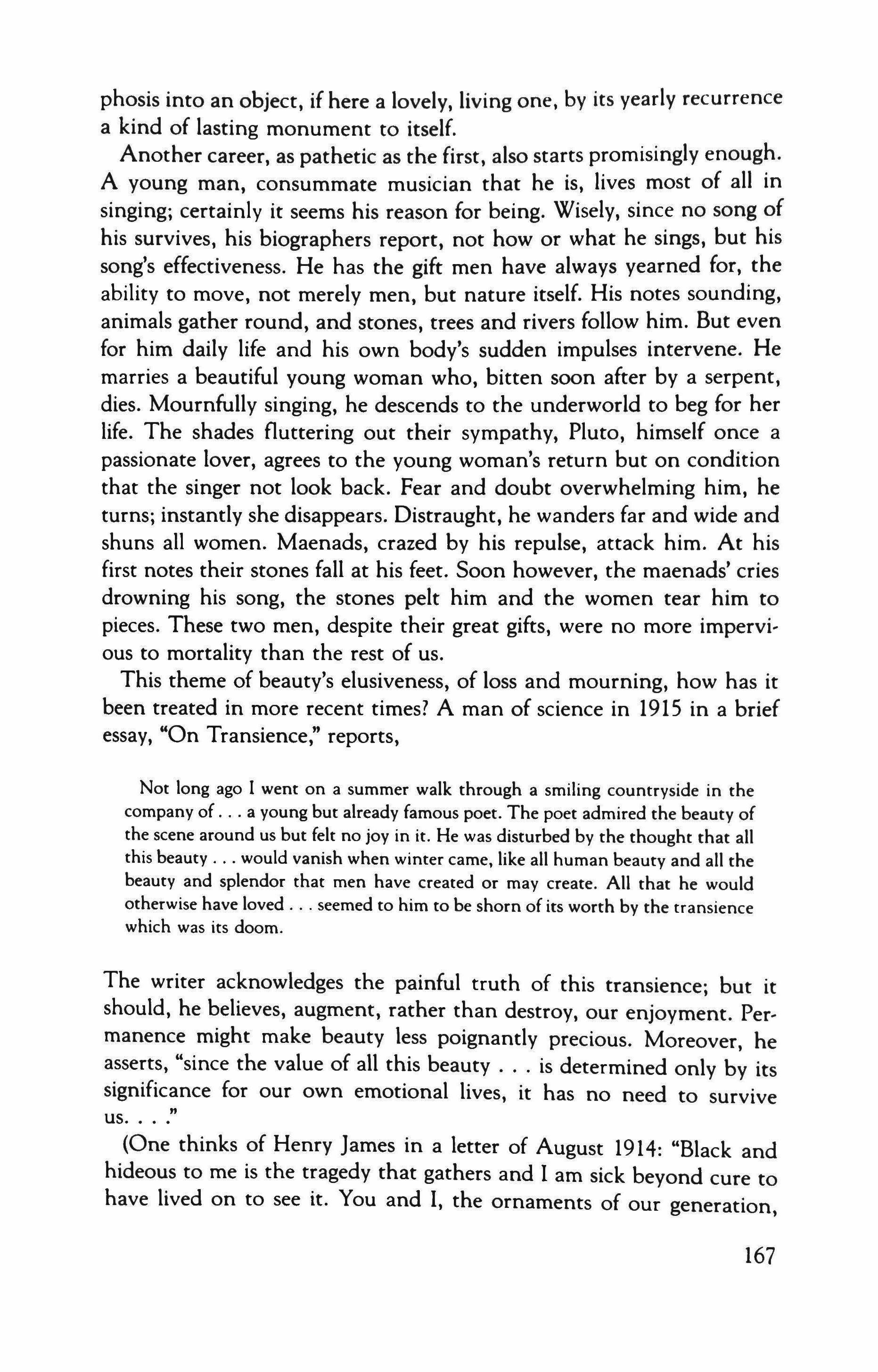
phosis into an object, if here a lovely, living one, by its yearly recurrence a kind of lasting monument to itself.
Another career, as pathetic as the first, also starts promisingly enough. A young man, consummate musician that he is, lives most of all in singing; certainly it seems his reason for being. Wisely, since no song of his survives, his biographers report, not how or what he sings, but his song's effectiveness. He has the gift men have always yearned for, the ability to move, not merely men, but nature itself. His notes sounding, animals gather round, and stones, trees and rivers follow him. But even for him daily life and his own body's sudden impulses intervene. He marries a beautiful young woman who, bitten soon after by a serpent, dies. Mournfully singing, he descends to the underworld to beg for her life. The shades fluttering out their sympathy, Pluto, himself once a passionate lover, agrees to the young woman's return but on condition that the singer not look back. Fear and doubt overwhelming him, he turns; instantly she disappears. Distraught, he wanders far and wide and shuns all women. Maenads, crazed by his repulse, attack him. At his first notes their stones fall at his feet. Soon however, the maenads' cries drowning his song, the stones pelt him and the women tear him to pieces. These two men, despite their great gifts, were no more impervious to mortality than the rest of us.
This theme of beauty's elusiveness, of loss and mourning, how has it been treated in more recent times? A man of science in 1915 in a brief essay, "On Transience," reports,
Not long ago I went on a summer walk through a smiling countryside in the company of a young but already famous poet. The poet admired the beauty of the scene around us but felt no joy in it. He was disturbed by the thought that all this beauty would vanish when winter came, like all human beauty and all the beauty and splendor that men have created or may create. All that he would otherwise have loved seemed to him to be shorn of its worth by the transience which was its doom.
The writer acknowledges the painful truth of this transience; but it should, he believes, augment, rather than destroy, our enjoyment. Permanence might make beauty less poignantly precious. Moreover, he asserts, "since the value of all this beauty is determined only by its significance for our own emotional lives, it has no need to survive us
(One thinks of Henry James in a letter of August 1914: "Black and hideous to me is the tragedy that gathers and I am sick beyond cure to have lived on to see it. You and I, the ornaments of our generation,
167
should have been spared this wreck of our belief that through the long years we had seen civilization grow and the worst become impossible It seems to me to undo everything, everything that was ours in the most horrible retroactive way - but I avert my face from the monstrous scene."}
Realizing that it was the poet's sense of transience and his mourning that spoiled beauty for him, our man of science says,
why it is that this detachment of libido from its object should be such a painful process is a mystery to us and we have not hitherto been able to frame any hypothesis to account for it. We only see that libido clings to its objects and will not renounce those that are lost even when a substitute lies ready to hand. Such then is mourning.
He seems to be baffled by our lack of common sense and to regret that some objects by their appeal and their identification with us are irreplaceable.
The young man in "On Transience" was, it is thought, the German poet, Rilke, and the man of science was Sigmund Freud. The poet would seem to have proved more accurate than the almost sixty-year-old scientist. For 1915 ushered in a period of universal mourning. Yet Freud cheerfully concludes his essay:
When once the mourning is over, it will be found that our high opinion of the riches of civilization has lost nothing from our discovery of their fragility. We shall build up again all that war has destroyed, and perhaps on firmer ground and more lastingly than before.
In the long run Freud may be right. However, World War I began with what many have considered the end of civilization, at least as the West has known it. Certainly we are struggling as much as ever with the chaos that War initiated.
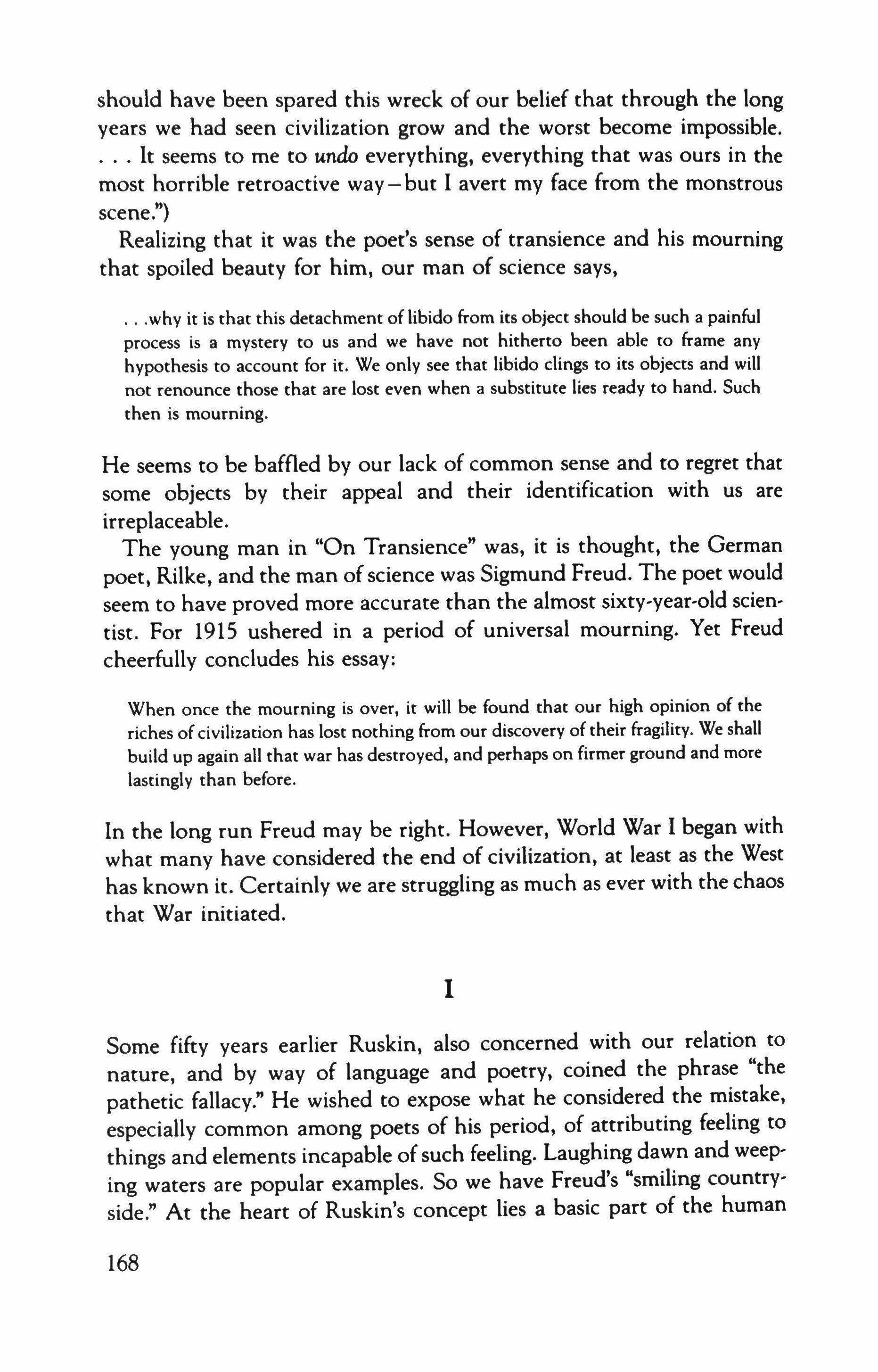
Some fifty years earlier Ruskin, also concerned with our relation to nature, and by way of language and poetry, coined the phrase "the pathetic fallacy." He wished to expose what he considered the mistake, especially common among poets of his period, of attributing feeling to things and elements incapable of such feeling. Laughing dawn and weeping waters are popular examples. So we have Freud's "smiling countryside." At the heart of Ruskin's concept lies a basic part of the human
1
168
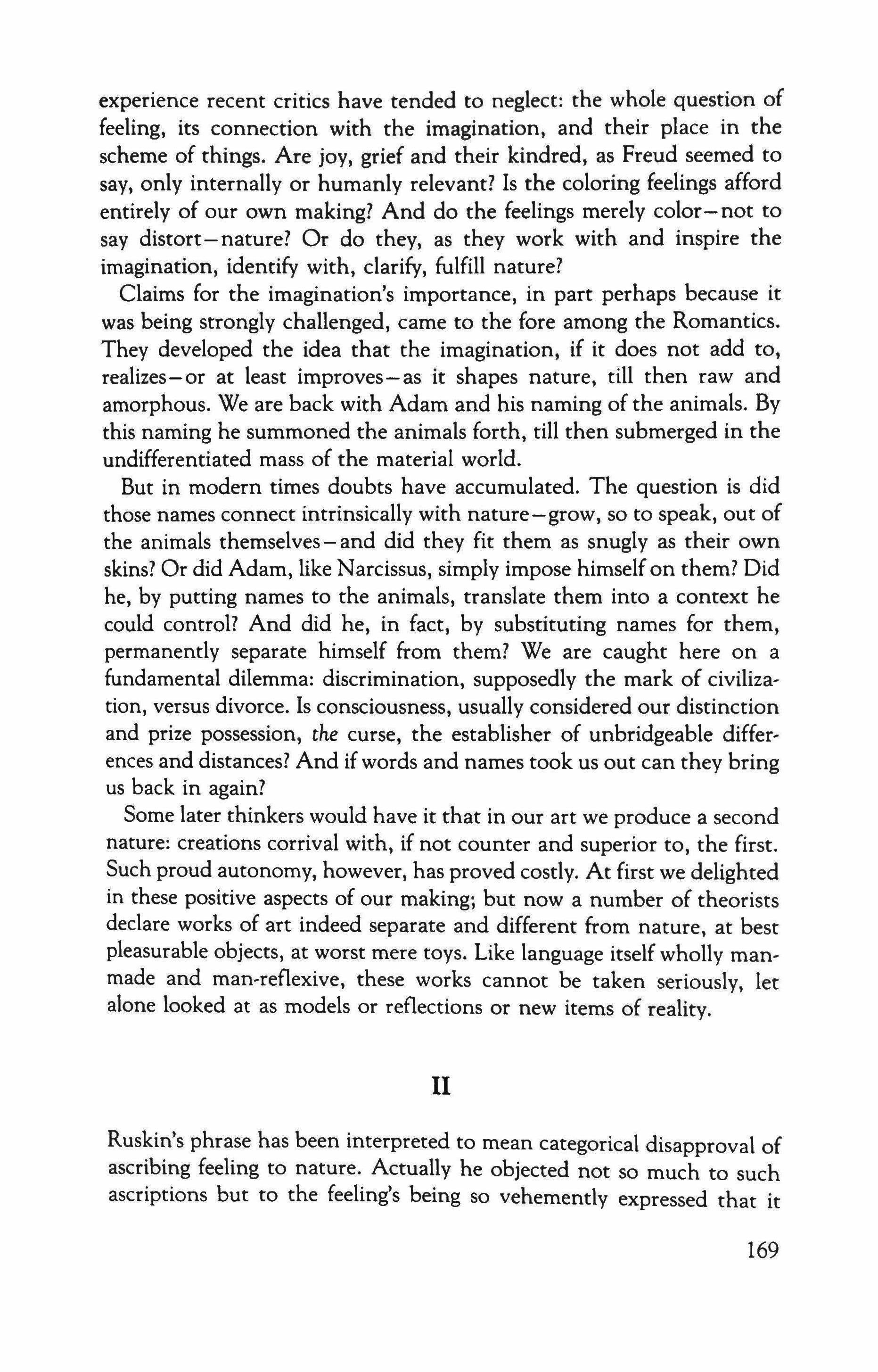
experience recent critics have tended to neglect: the whole question of feeling, its connection with the imagination, and their place in the scheme of things. Are joy, grief and their kindred, as Freud seemed to say, only internally or humanly relevant? Is the coloring feelings afford entirely of our own making? And do the feelings merely color-not to say distort-nature? Or do they, as they work with and inspire the imagination, identify with, clarify, fulfill nature?
Claims for the imagination's importance, in part perhaps because it was being strongly challenged, came to the fore among the Romantics. They developed the idea that the imagination, if it does not add to, realizes-or at least improves-as it shapes nature, till then raw and amorphous. We are back with Adam and his naming of the animals. By this naming he summoned the animals forth, till then submerged in the undifferentiated mass of the material world.
But in modern times doubts have accumulated. The question is did those names connect intrinsically with nature-grow, so to speak, out of the animals themselves-and did they fit them as snugly as their own skins? Or did Adam, like Narcissus, simply impose himself on them? Did he, by putting names to the animals, translate them into a context he could control? And did he, in fact, by substituting names for them, permanently separate himself from them? We are caught here on a fundamental dilemma: discrimination, supposedly the mark of civilization, versus divorce. Is consciousness, usually considered our distinction and prize possession, the curse, the establisher of unbridgeable differ, ences and distances? And ifwords and names took us out can they bring us back in again?
Some later thinkers would have it that in our art we produce a second nature: creations corrival with, if not counter and superior to, the first. Such proud autonomy, however, has proved costly. At first we delighted in these positive aspects of our making; but now a number of theorists declare works of art indeed separate and different from nature, at best pleasurable objects, at worst mere toys. Like language itself wholly man, made and man-reflexive, these works cannot be taken seriously, let alone looked at as models or reflections or new items of reality.
II
Ruskin's phrase has been interpreted to mean categorical disapproval of ascribing feeling to nature. Actually he objected not so much to such ascriptions but to the feeling's being so vehemently expressed that it
169
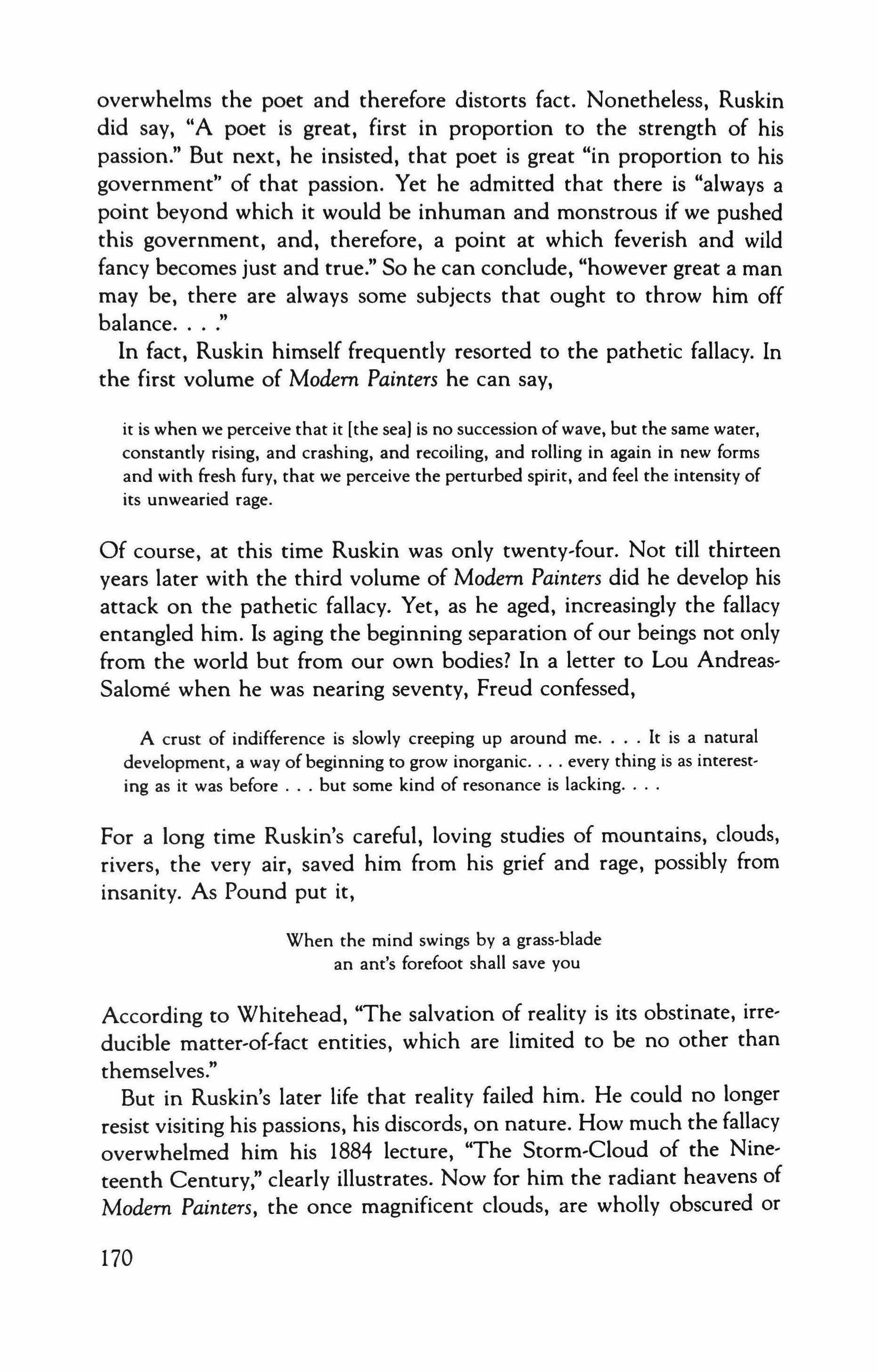
overwhelms the poet and therefore distorts fact. Nonetheless, Ruskin did say, "A poet is great, first in proportion to the strength of his passion." But next, he insisted, that poet is great "in proportion to his government" of that passion. Yet he admitted that there is "always a point beyond which it would be inhuman and monstrous if we pushed this government, and, therefore, a point at which feverish and wild fancy becomes just and true." So he can conclude, "however great a man may be, there are always some subjects that ought to throw him off balance
In fact, Ruskin himself frequently resorted to the pathetic fallacy. In the first volume of Modem Painters he can say,
it is when we perceive that it [the seal is no succession of wave, but the same water, constantly rising, and crashing, and recoiling, and rolling in again in new forms and with fresh fury, that we perceive the perturbed spirit, and feel the intensity of its unwearied rage.
Of course, at this time Ruskin was only twenty-four. Not till thirteen years later with the third volume of Modem Painters did he develop his attack on the pathetic fallacy. Yet, as he aged, increasingly the fallacy entangled him. Is aging the beginning separation of our beings not only from the world but from our own bodies? In a letter to Lou Andreas, Salome when he was nearing seventy, Freud confessed,
A crust of indifference is slowly creeping up around me It is a natural development, a way of beginning to grow inorganic every thing is as interesting as it was before but some kind of resonance is lacking
For a long time Ruskin's careful, loving studies of mountains, clouds, rivers, the very air, saved him from his grief and rage, possibly from insanity. As Pound put it,
When the mind swings by a grass-blade an ant's forefoot shall save you
According to Whitehead, "The salvation of reality is its obstinate, irreducible matter-of-fact entities, which are limited to be no other than themselves."
But in Ruskin's later life that reality failed him. He could no longer resist visiting his passions, his discords, on nature. How much the fallacy overwhelmed him his 1884 lecture, "The Storm-Cloud of the Nine' teenth Century," clearly illustrates. Now for him the radiant heavens of Modem Painters, the once magnificent clouds, are wholly obscured or
170
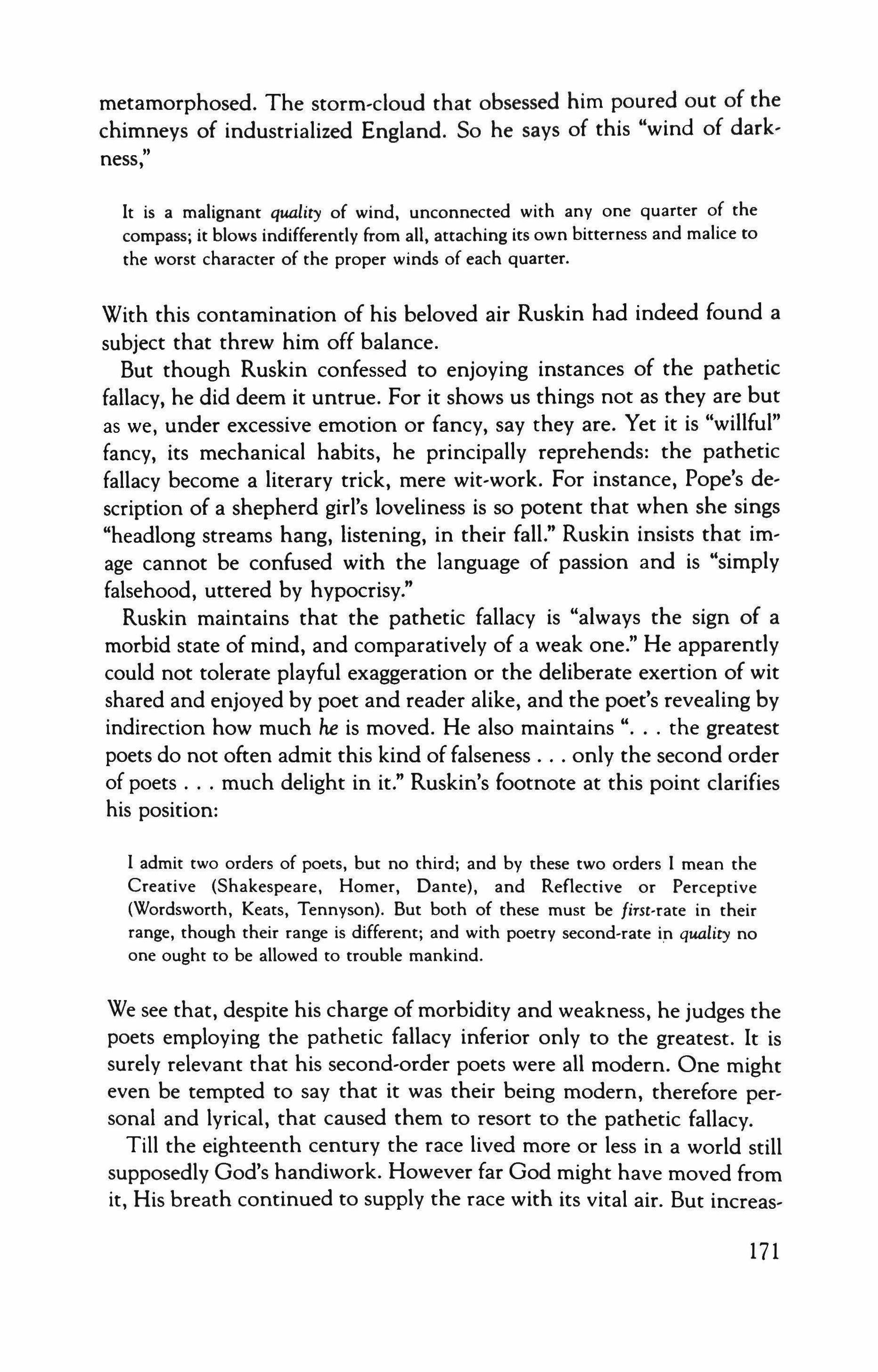
metamorphosed. The storm-cloud that obsessed him poured out of the chimneys of industrialized England. So he says of this "wind of dark, ness:'
It is a malignant quality of wind, unconnected with anyone quarter of the compass; it blows indifferently from all, attaching its own bitterness and malice to the worst character of the proper winds of each quarter.
With this contamination of his beloved air Ruskin had indeed found a subject that threw him off balance.
But though Ruskin confessed to enjoying instances of the pathetic fallacy, he did deem it untrue. For it shows us things not as they are but as we, under excessive emotion or fancy, say they are. Yet it is "willful" fancy, its mechanical habits, he principally reprehends: the pathetic fallacy become a literary trick, mere wit-work. For instance, Pope's de' scription of a shepherd girl's loveliness is so potent that when she sings "headlong streams hang, listening, in their fall." Ruskin insists that image cannot be confused with the language of passion and is "simply falsehood, uttered by hypocrisy."
Ruskin maintains that the pathetic fallacy is "always the sign of a morbid state of mind, and comparatively of a weak one." He apparently could not tolerate playful exaggeration or the deliberate exertion of wit shared and enjoyed by poet and reader alike, and the poet's revealing by indirection how much he is moved. He also maintains" the greatest poets do not often admit this kind of falseness only the second order of poets much delight in it." Ruskin's footnote at this point clarifies his position:
I admit two orders of poets, but no third; and by these two orders I mean the Creative (Shakespeare, Homer, Dante), and Reflective or Perceptive (Wordsworth, Keats, Tennyson). But both of these must be fiTst-rate in their range, though their range is different; and with poetry second-rate in quality no one ought to be allowed to trouble mankind.
We see that, despite his charge of morbidity and weakness, he judges the poets employing the pathetic fallacy inferior only to the greatest. It is surely relevant that his second-order poets were all modern. One might even be tempted to say that it was their being modern, therefore per, sonal and lyrical, that caused them to resort to the pathetic fallacy. Till the eighteenth century the race lived more or less in a world still supposedly God's handiwork. However far God might have moved from it, His breath continued to supply the race with its vital air. But increas-
171
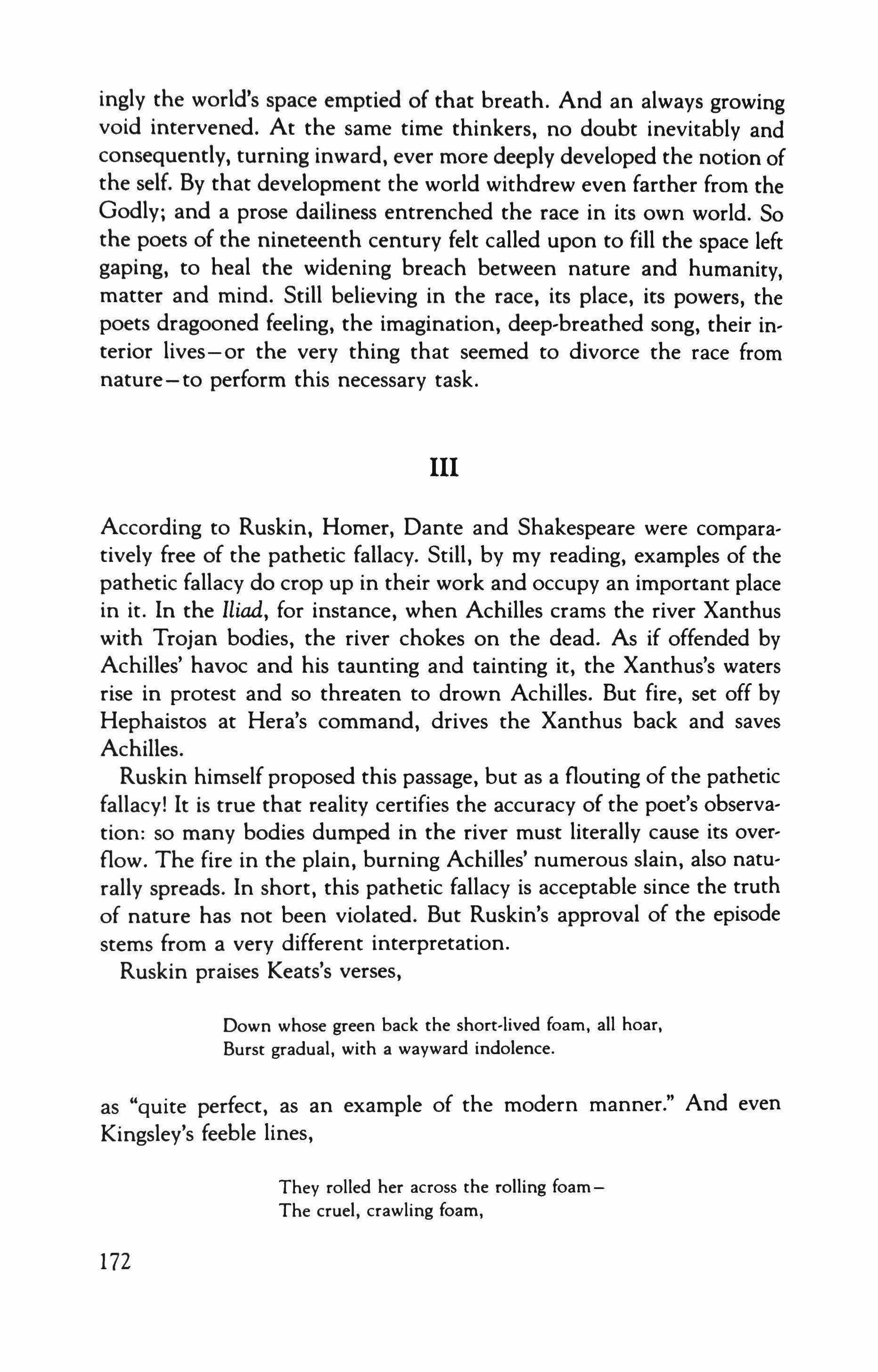
ingly the world's space emptied of that breath. And an always growing void intervened. At the same time thinkers, no doubt inevitably and consequently, turning inward, ever more deeply developed the notion of the self. By that development the world withdrew even farther from the Godly; and a prose dailiness entrenched the race in its own world. So the poets of the nineteenth century felt called upon to fill the space left gaping, to heal the widening breach between nature and humanity, matter and mind. Still believing in the race, its place, its powers, the poets dragooned feeling, the imagination, deep-breathed song, their in, terior lives-or the very thing that seemed to divorce the race from nature-to perform this necessary task.
III
According to Ruskin, Homer, Dante and Shakespeare were comparatively free of the pathetic fallacy. Still, by my reading, examples of the pathetic fallacy do crop up in their work and occupy an important place in it. In the Iliad, for instance, when Achilles crams the river Xanthus with Trojan bodies, the river chokes on the dead. As if offended by Achilles' havoc and his taunting and tainting it, the Xanthus's waters rise in protest and so threaten to drown Achilles. But fire, set off by Hephaistos at Hera's command, drives the Xanthus back and saves Achilles.
Ruskin himself proposed this passage, but as a flouting of the pathetic fallacy! It is true that reality certifies the accuracy of the poet's observation: so many bodies dumped in the river must literally cause its over, flow. The fire in the plain, burning Achilles' numerous slain, also naturally spreads. In short, this pathetic fallacy is acceptable since the truth of nature has not been violated. But Ruskin's approval of the episode stems from a very different interpretation.
Ruskin praises Keats's verses,
Down whose green back the short-lived foam, all hoar, Burst gradual, with a wayward indolence.
as "quite perfect, as an example of the modern manner." And even Kingsley's feeble lines,
They rolled her across the rolling foamThe cruel, crawling foam,
172
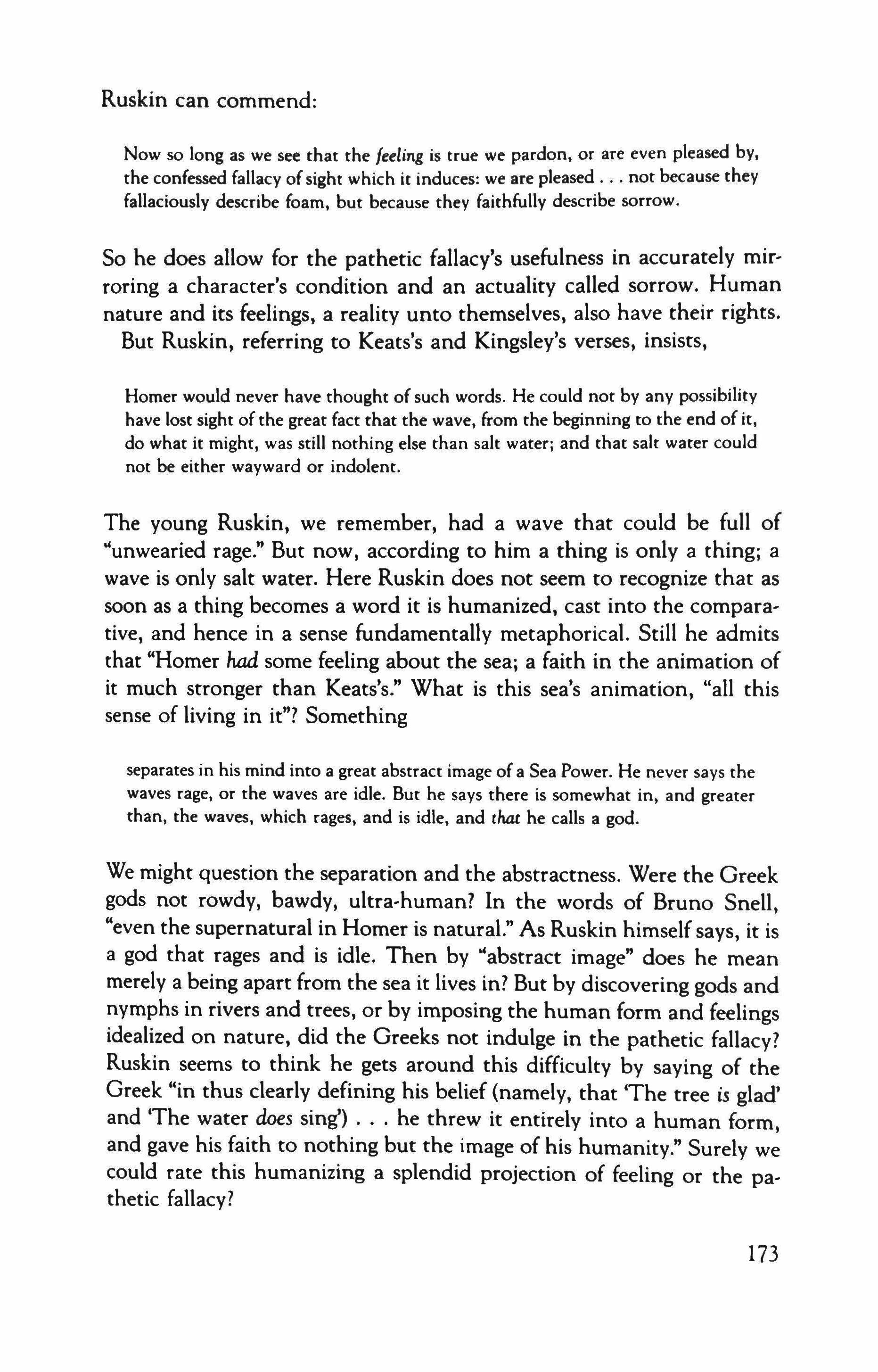
Ruskin can commend:
Now so long as we see that the feding is true we pardon, or are even pleased by, the confessed fallacy ofsight which it induces: we are pleased not because they fallaciously describe foam, but because they faithfully describe sorrow.
So he does allow for the pathetic fallacy's usefulness in accurately mirroring a character's condition and an actuality called sorrow. Human nature and its feelings, a reality unto themselves, also have their rights. But Ruskin, referring to Keats's and Kingsley's verses, insists,
Homer would never have thought of such words. He could not by any possibility have lost sight of the great fact that the wave, from the beginning to the end of it, do what it might, was still nothing else than salt water; and that salt water could not be either wayward or indolent.
The young Ruskin, we remember, had a wave that could be full of "unwearied rage." But now, according to him a thing is only a thing; a wave is only salt water. Here Ruskin does not seem to recognize that as soon as a thing becomes a word it is humanized, cast into the comparative, and hence in a sense fundamentally metaphorical. Still he admits that "Homer had some feeling about the sea; a faith in the animation of it much stronger than Keats's." What is this sea's animation, "all this sense of living in it"? Something
separates in his mind into a great abstract image of a Sea Power. He never says the waves rage, or the waves are idle. But he says there is somewhat in, and greater than, the waves, which rages, and is idle, and that he calls a god.
We might question the separation and the abstractness. Were the Greek gods not rowdy, bawdy, ultra-human? In the words of Bruno Snell, "even the supernatural in Homer is natural." As Ruskin himself says, it is a god that rages and is idle. Then by "abstract image" does he mean merely a being apart from the sea it lives in? But by discovering gods and nymphs in rivers and trees, or by imposing the human form and feelings idealized on nature, did the Greeks not indulge in the pathetic fallacy? Ruskin seems to think he gets around this difficulty by saying of the Greek "in thus clearly defining his belief (namely, that 'The tree is glad' and 'The water does sing') he threw it entirely into a human form, and gave his faith to nothing but the image of his humanity." Surely we could rate this humanizing a splendid projection of feeling or the pathetic fallacy?
173
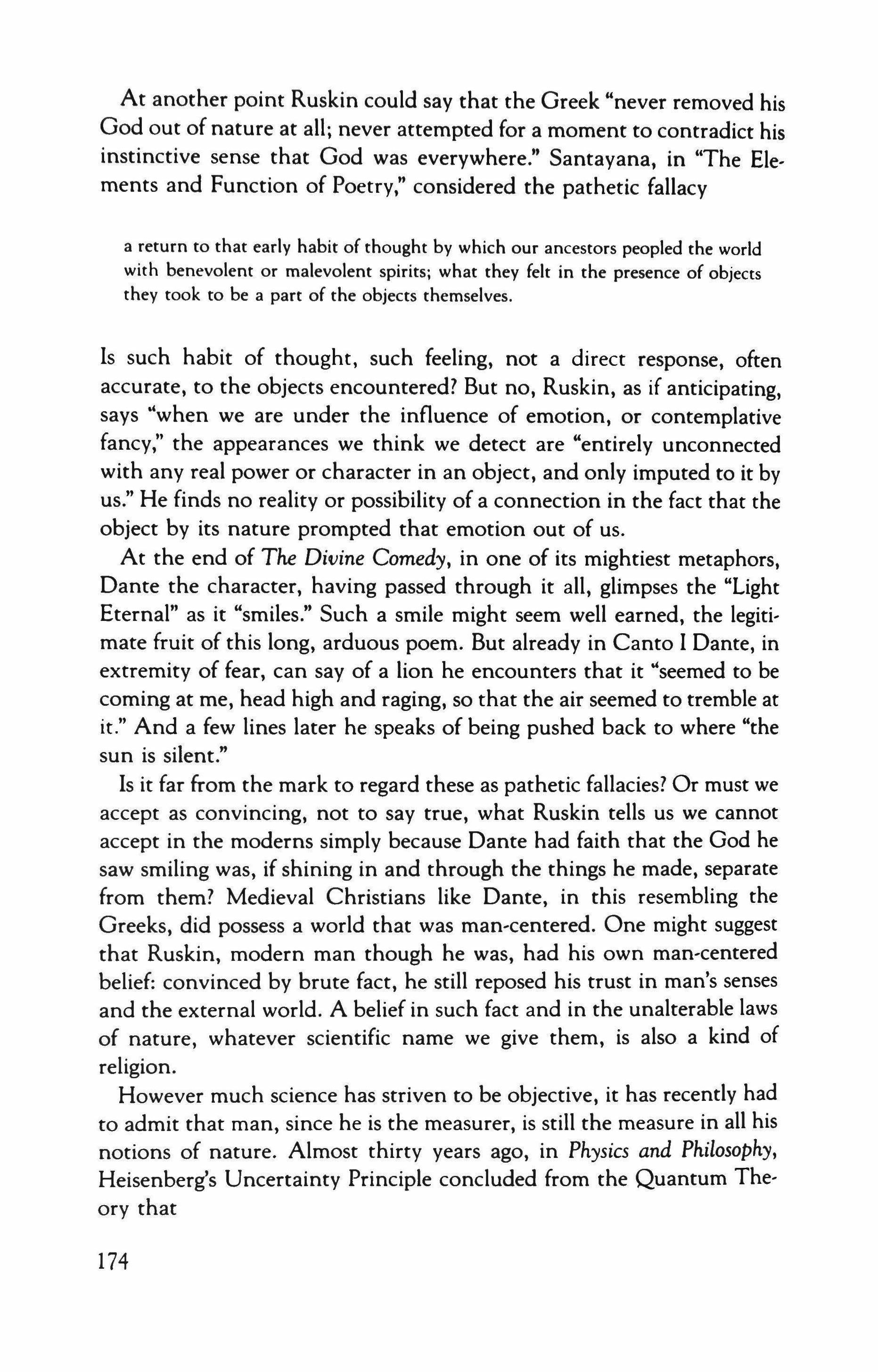
At another point Ruskin could say that the Greek "never removed his God out of nature at all; never attempted for a moment to contradict his instinctive sense that God was everywhere." Santayana, in "The Elements and Function of Poetry," considered the pathetic fallacy
a return to that early habit of thought by which our ancestors peopled the world with benevolent or malevolent spirits; what they felt in the presence of objects they took to be a part of the objects themselves.
Is such habit of thought, such feeling, not a direct response, often accurate, to the objects encountered? But no, Ruskin, as if anticipating, says "when we are under the influence of emotion, or contemplative fancy," the appearances we think we detect are "entirely unconnected with any real power or character in an object, and only imputed to it by us." He finds no reality or possibility of a connection in the fact that the object by its nature prompted that emotion out of us.
At the end of The Divine Comedy, in one of its mightiest metaphors, Dante the character, having passed through it all, glimpses the "Light Eternal" as it "smiles." Such a smile might seem well earned, the legitimate fruit of this long, arduous poem. But already in Canto I Dante, in extremity of fear, can say of a lion he encounters that it "seemed to be coming at me, head high and raging, so that the air seemed to tremble at it." And a few lines later he speaks of being pushed back to where "the sun is silent."
Is it far from the mark to regard these as pathetic fallacies? Or must we accept as convincing, not to say true, what Ruskin tells us we cannot accept in the moderns simply because Dante had faith that the God he saw smiling was, if shining in and through the things he made, separate from them? Medieval Christians like Dante, in this resembling the Greeks, did possess a world that was man-centered. One might suggest that Ruskin, modern man though he was, had his own man-centered belief: convinced by brute fact, he still reposed his trust in man's senses and the external world. A belief in such fact and in the unalterable laws of nature, whatever scientific name we give them, is also a kind of religion.
However much science has striven to be objective, it has recently had to admit that man, since he is the measurer, is still the measure in all his notions of nature. Almost thirty years ago, in Physics and Philosophy, Heisenberg's Uncertainty Principle concluded from the Quantum Theory that
174
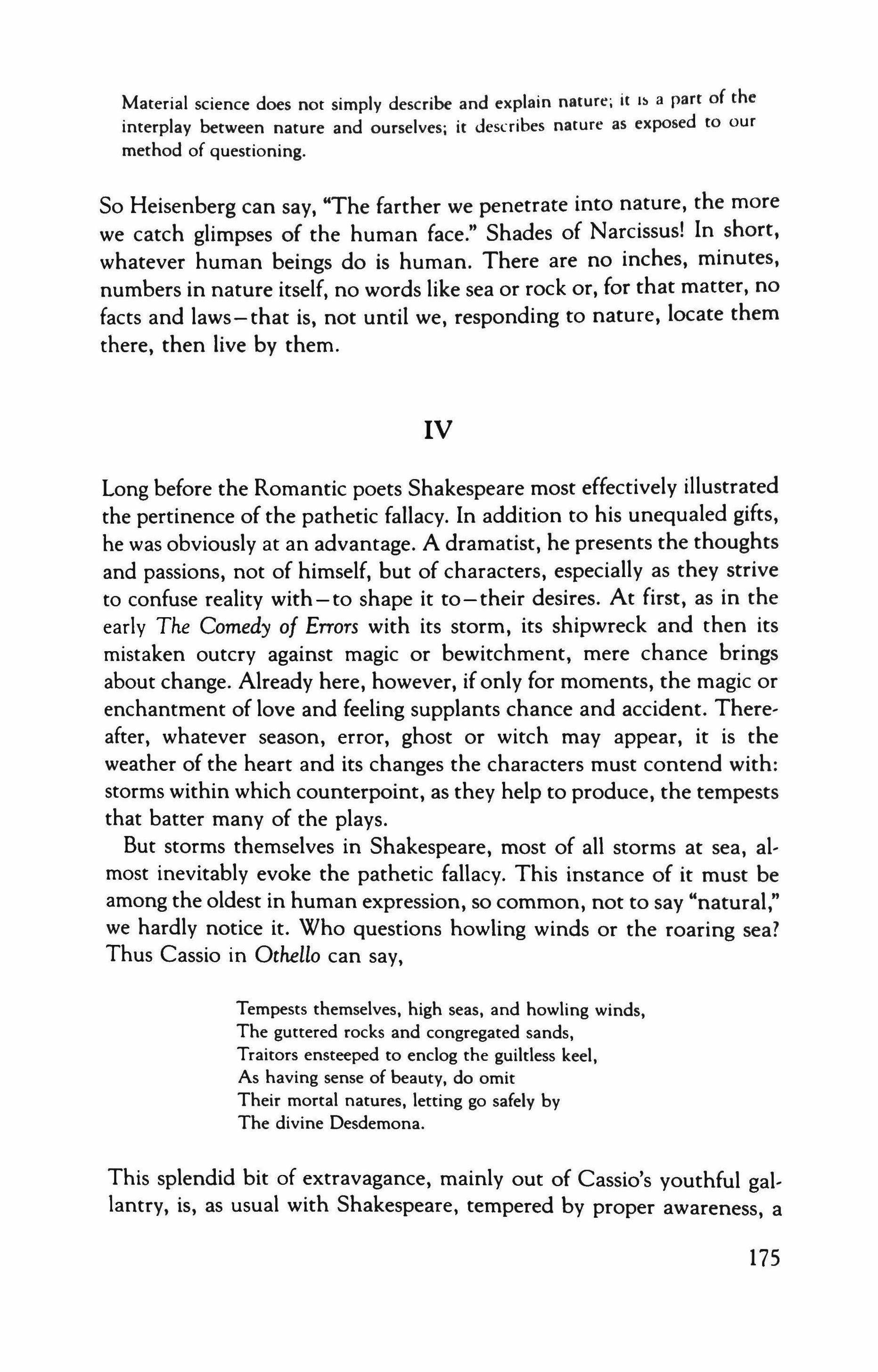
Material science does not simply describe and explain nature; it I� a part of the interplay between nature and ourselves; it describes nature as exposed to our method of questioning.
So Heisenberg can say, "The farther we penetrate into nature, the more we catch glimpses of the human face." Shades of Narcissus! In short, whatever human beings do is human. There are no inches, minutes, numbers in nature itself, no words like sea or rock or, for that matter, no facts and laws-that is, not until we, responding to nature, locate them there, then live by them.
IV
Long before the Romantic poets Shakespeare most effectively illustrated the pertinence of the pathetic fallacy. In addition to his unequaled gifts, he was obviously at an advantage. A dramatist, he presents the thoughts and passions, not of himself, but of characters, especially as they strive to confuse reality with-to shape it to-their desires. At first, as in the early The Comedy of Errors with its storm, its shipwreck and then its mistaken outcry against magic or bewitchment, mere chance brings about change. Already here, however, ifonly for moments, the magic or enchantment of love and feeling supplants chance and accident. There' after, whatever season, error, ghost or witch may appear, it is the weather of the heart and its changes the characters must contend with: storms within which counterpoint, as they help to produce, the tempests that batter many of the plays.
But storms themselves in Shakespeare, most of all storms at sea, almost inevitably evoke the pathetic fallacy. This instance of it must be among the oldest in human expression, so common, not to say "natural," we hardly notice it. Who questions howling winds or the roaring sea? Thus Cassio in Othello can say,
Tempests themselves, high seas, and howling winds, The guttered rocks and congregated sands, Traitors ensteeped to enclog the guiltless keel, As having sense of beauty, do omit Their mortal natures, letting go safely by The divine Desdemona.
This splendid bit of extravagance, mainly out of Cassio's youthful gal, lantry, is, as usual with Shakespeare, tempered by proper awareness, a
175
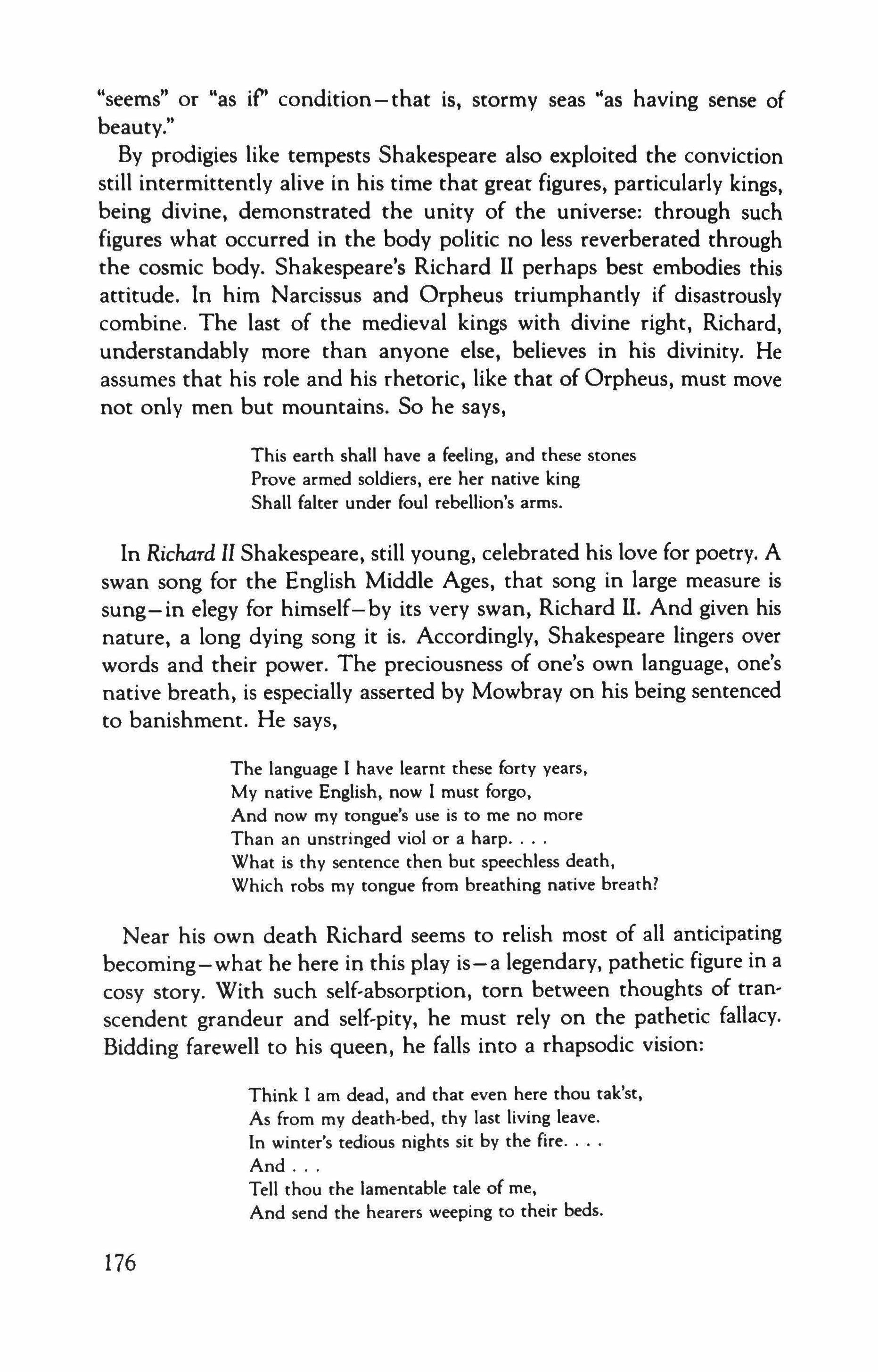
"seems" or "as if" condition - that is, stormy seas "as having sense of beauty."
By prodigies like tempests Shakespeare also exploited the conviction still intermittently alive in his time that great figures, particularly kings, being divine, demonstrated the unity of the universe: through such figures what occurred in the body politic no less reverberated through the cosmic body. Shakespeare's Richard II perhaps best embodies this attitude. In him Narcissus and Orpheus triumphantly if disastrously combine. The last of the medieval kings with divine right, Richard, understandably more than anyone else, believes in his divinity. He assumes that his role and his rhetoric, like that of Orpheus, must move not only men but mountains. So he says,
This earth shall have a feeling, and these stones Prove armed soldiers, ere her native king Shall falter under foul rebellion's arms.
In Richard II Shakespeare, still young, celebrated his love for poetry. A swan song for the English Middle Ages, that song in large measure is sung - in elegy for himself-by its very swan, Richard II. And given his nature, a long dying song it is. Accordingly, Shakespeare lingers over words and their power. The preciousness of one's own language, one's native breath, is especially asserted by Mowbray on his being sentenced to banishment. He says,
The language I have learnt these forty years, My native English, now I must forgo, And now my tongue's use is to me no more Than an unstringed viol or a harp What is thy sentence then but speechless death, Which robs my tongue from breathing native breath?
Near his own death Richard seems to relish most of all anticipating becoming-what he here in this play is-a legendary, pathetic figure in a cosy story. With such self-absorption, torn between thoughts of transcendent grandeur and self-pity, he must rely on the pathetic fallacy. Bidding farewell to his queen, he falls into a rhapsodic vision:
Think I am dead, and that even here thou tak'st, As from my death-bed, thy last living leave. In winter's tedious nights sit by the fire And
Tell thou the lamentable tale of me, And send the hearers weeping to their beds.
176
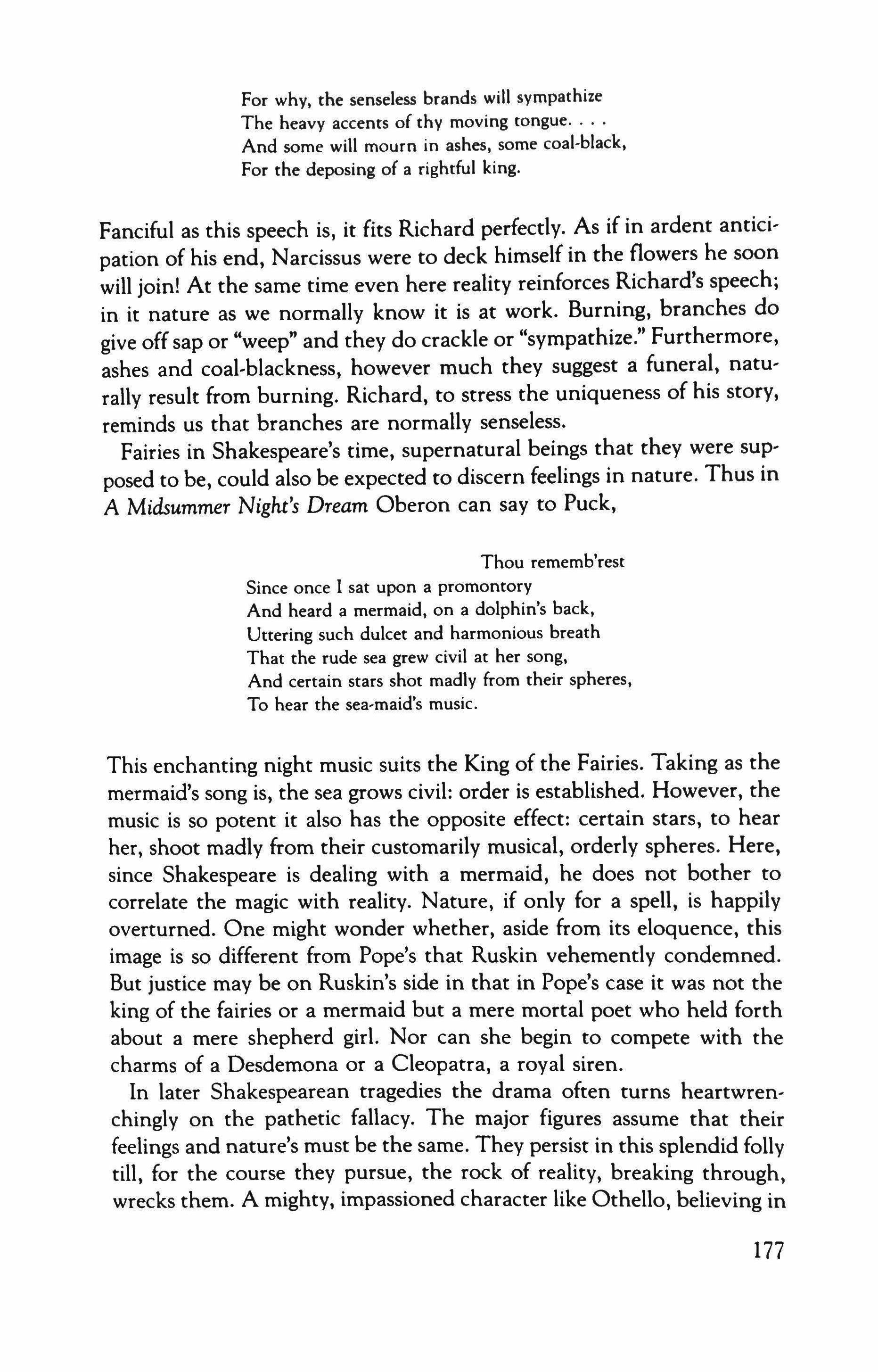
For why, the senseless brands will sympathize The heavy accents of thy moving tongue And some will mourn in ashes, some coal-black, For the deposing of a rightful king.
Fanciful as this speech is, it fits Richard perfectly. As if in ardent anticipation of his end, Narcissus were to deck himself in the flowers he soon will join! At the same time even here reality reinforces Richard's speech; in it nature as we normally know it is at work. Burning, branches do give off sap or "weep" and they do crackle or "sympathize." Furthermore, ashes and coal-blackness, however much they suggest a funeral, naturally result from burning. Richard, to stress the uniqueness of his story, reminds us that branches are normally senseless.
Fairies in Shakespeare's time, supernatural beings that they were supposed to be, could also be expected to discern feelings in nature. Thus in A Midsummer Night's Dream Oberon can say to Puck,
Thou rememb'rest
Since once I sat upon a promontory
And heard a mermaid, on a dolphin's back, Uttering such dulcet and harmonious breath
That the rude sea grew civil at her song, And certain stars shot madly from their spheres, To hear the sea-maid's music.
This enchanting night music suits the King of the Fairies. Taking as the mermaid's song is, the sea grows civil: order is established. However, the music is so potent it also has the opposite effect: certain stars, to hear her, shoot madly from their customarily musical, orderly spheres. Here, since Shakespeare is dealing with a mermaid, he does not bother to correlate the magic with reality. Nature, if only for a spell, is happily overturned. One might wonder whether, aside from its eloquence, this image is so different from Pope's that Ruskin vehemently condemned. But justice may be on Ruskin's side in that in Pope's case it was not the king of the fairies or a mermaid but a mere mortal poet who held forth about a mere shepherd girl. Nor can she begin to compete with the charms of a Desdemona or a Cleopatra, a royal siren.
In later Shakespearean tragedies the drama often turns heartwrenchingly on the pathetic fallacy. The major figures assume that their feelings and nature's must be the same. They persist in this splendid folly till, for the course they pursue, the rock of reality, breaking through, wrecks them. A mighty, impassioned character like Othello, believing in
177
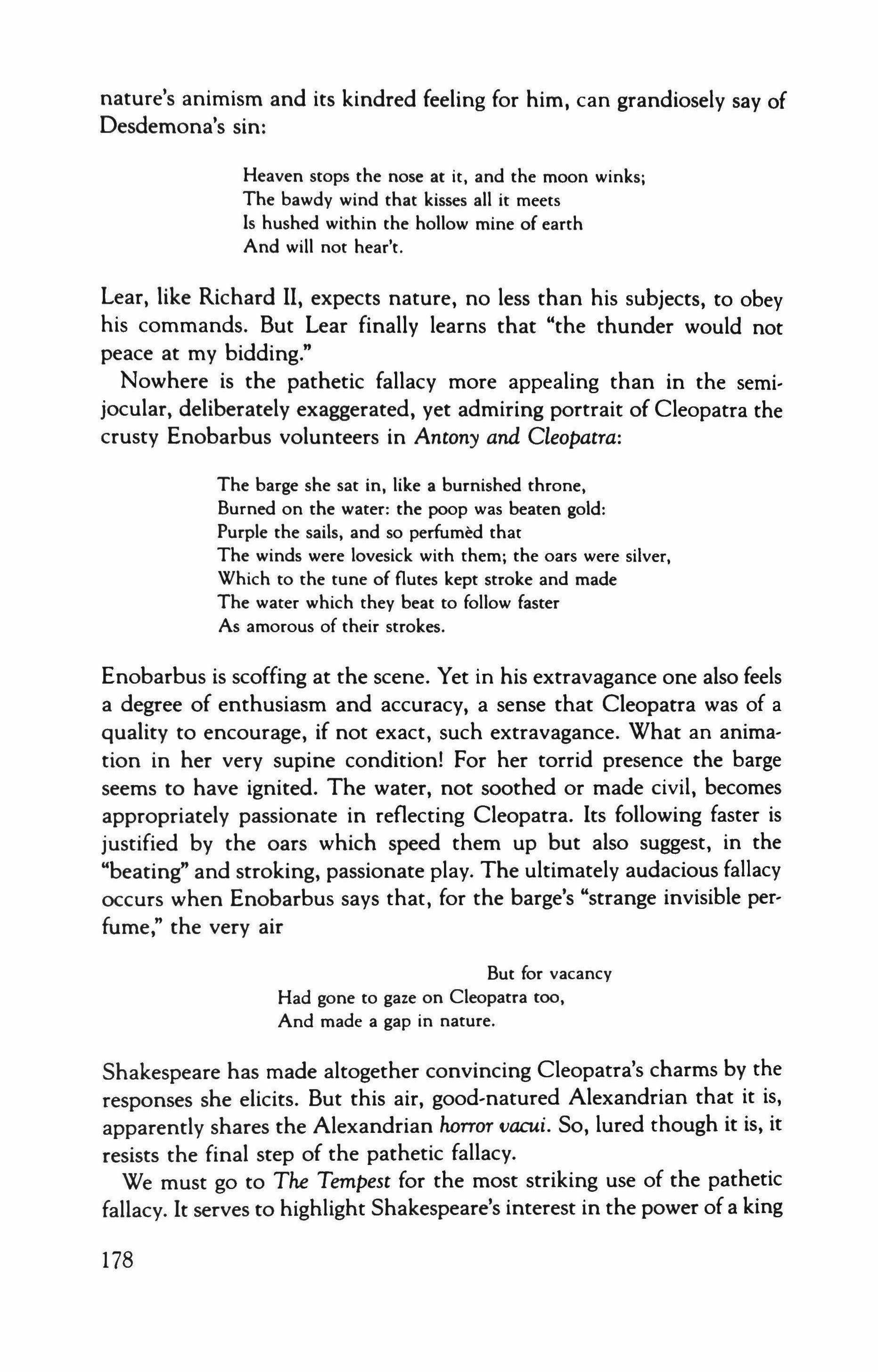
nature's animism and its kindred feeling for him, can grandiosely say of Desdemona's sin:
Heaven stops the nose at it, and the moon winks; The bawdy wind that kisses all it meets Is hushed within the hollow mine of earth And will not hear't.
Lear, like Richard II, expects nature, no less than his subjects, to obey his commands. But Lear finally learns that "the thunder would not peace at my bidding."
Nowhere is the pathetic fallacy more appealing than in the semijocular, deliberately exaggerated, yet admiring portrait of Cleopatra the crusty Enobarbus volunteers in Antony and Cleopatra:
The barge she sat in, like a burnished throne, Burned on the water: the poop was beaten gold: Purple the sails, and so perfumed that The winds were lovesick with them; the oars were silver, Which to the tune of flutes kept stroke and made The water which they beat to follow faster As amorous of their strokes.
Enobarbus is scoffing at the scene. Yet in his extravagance one also feels a degree of enthusiasm and accuracy, a sense that Cleopatra was of a quality to encourage, if not exact, such extravagance. What an animation in her very supine condition! For her torrid presence the barge seems to have ignited. The water, not soothed or made civil, becomes appropriately passionate in reflecting Cleopatra. Its following faster is justified by the oars which speed them up but also suggest, in the "beating" and stroking, passionate play. The ultimately audacious fallacy occurs when Enobarbus says that, for the barge's "strange invisible perfume," the very air
But for vacancy
Had gone to gaze on Cleopatra too, And made a gap in nature.
Shakespeare has made altogether convincing Cleopatra's charms by the responses she elicits. But this air, good-natured Alexandrian that it is, apparently shares the Alexandrian Iwrror tlacui. So, lured though it is, it resists the final step of the pathetic fallacy.
We must go to The Tempest for the most striking use of the pathetic fallacy. It serves to highlight Shakespeare's interest in the power of a king
178
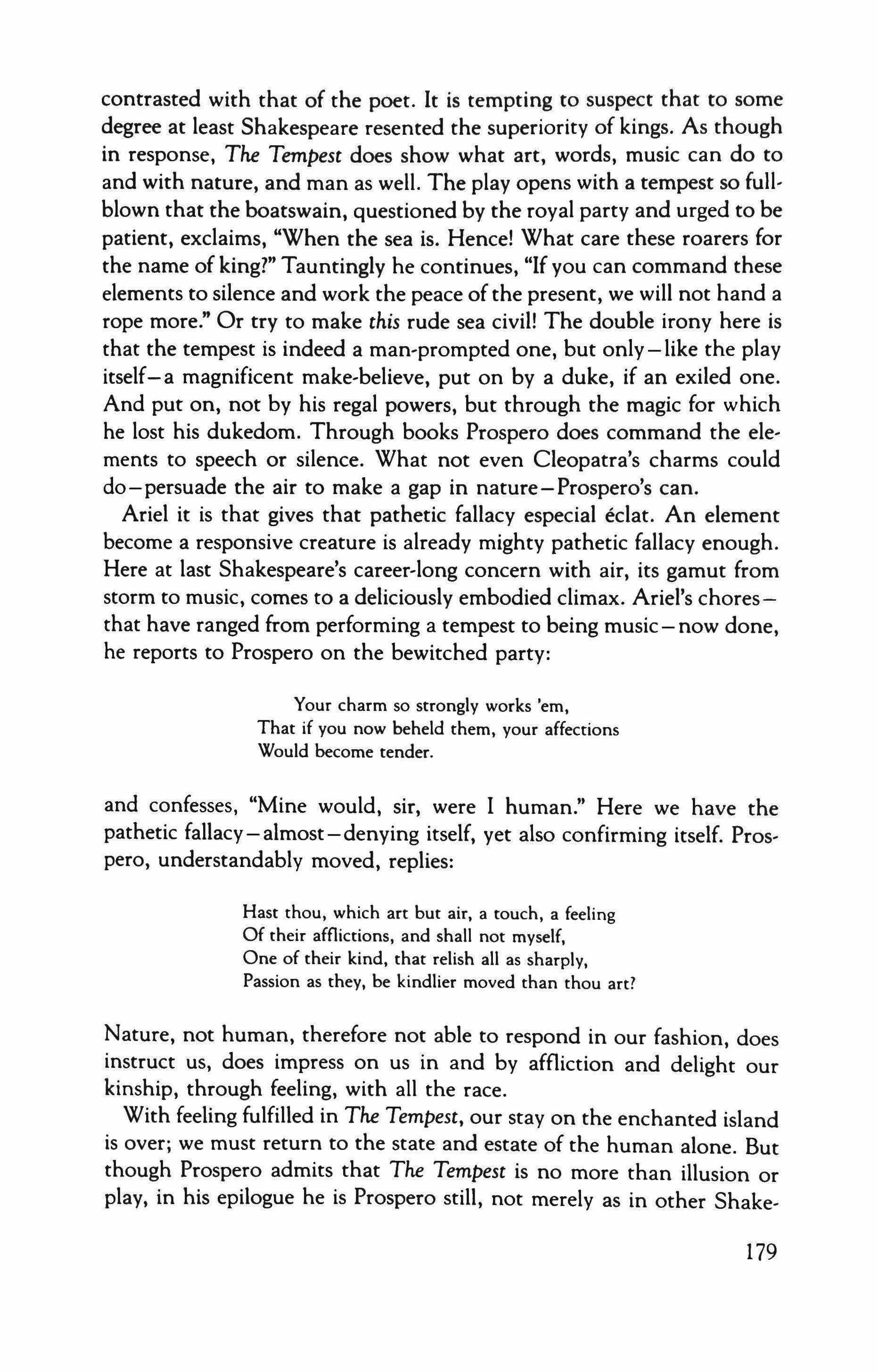
contrasted with that of the poet. It is tempting to suspect that to some degree at least Shakespeare resented the superiority of kings. As though in response, The Tempest does show what art, words, music can do to and with nature, and man as well. The play opens with a tempest so fullblown that the boatswain, questioned by the royal party and urged to be patient, exclaims, "When the sea is. Hence! What care these roarers for the name of king?" Tauntingly he continues, "If you can command these elements to silence and work the peace of the present, we will not hand a rope more." Or try to make this rude sea civil! The double irony here is that the tempest is indeed a man-prompted one, but only-like the play itself-a magnificent make-believe, put on by a duke, if an exiled one. And put on, not by his regal powers, but through the magic for which he lost his dukedom. Through books Prospero does command the elements to speech or silence. What not even Cleopatra's charms could do-persuade the air to make a gap in nature-Prospero's can.
Ariel it is that gives that pathetic fallacy especial eclat. An element become a responsive creature is already mighty pathetic fallacy enough. Here at last Shakespeare's career-long concern with air, its gamut from storm to music, comes to a deliciously embodied climax. Ariel's choresthat have ranged from performing a tempest to being music - now done, he reports to Prospero on the bewitched party:
Your charm so strongly works 'em, That if you now beheld them, your affections Would become tender.
and confesses, "Mine would, sir, were I human." Here we have the pathetic fallacy-almost-denying itself, yet also confirming itself. Prospero, understandably moved, replies:
Hast thou, which art but air, a touch, a feeling Of their afflictions, and shall not myself, One of their kind, that relish all as sharply, Passion as they, be kindlier moved than thou art?
Nature, not human, therefore not able to respond in our fashion, does instruct us, does impress on us in and by affliction and delight our kinship, through feeling, with all the race.
With feeling fulfilled in The Tempest, our stay on the enchanted island is over; we must return to the state and estate of the human alone. But though Prospero admits that The Tempest is no more than illusion or play, in his epilogue he is Prospero still, not merely as in other Shake.
179
spearean epilogues an actor about to give over his role. He is still in the world of the play, as though it were the real world after all, or at least no less real than "the great globe itself" which "shall dissolve." The tempest which opens the play was an illusion, yet effective as reality itself in working on its victims; so at the end we, the audience, must admit the reality of the play's art that has worked on us. In short, the poet is at least as real as a king. A poem's impact on us may well be more telling, more lasting, than some of the more important so-called real acts and occasions of our lives.
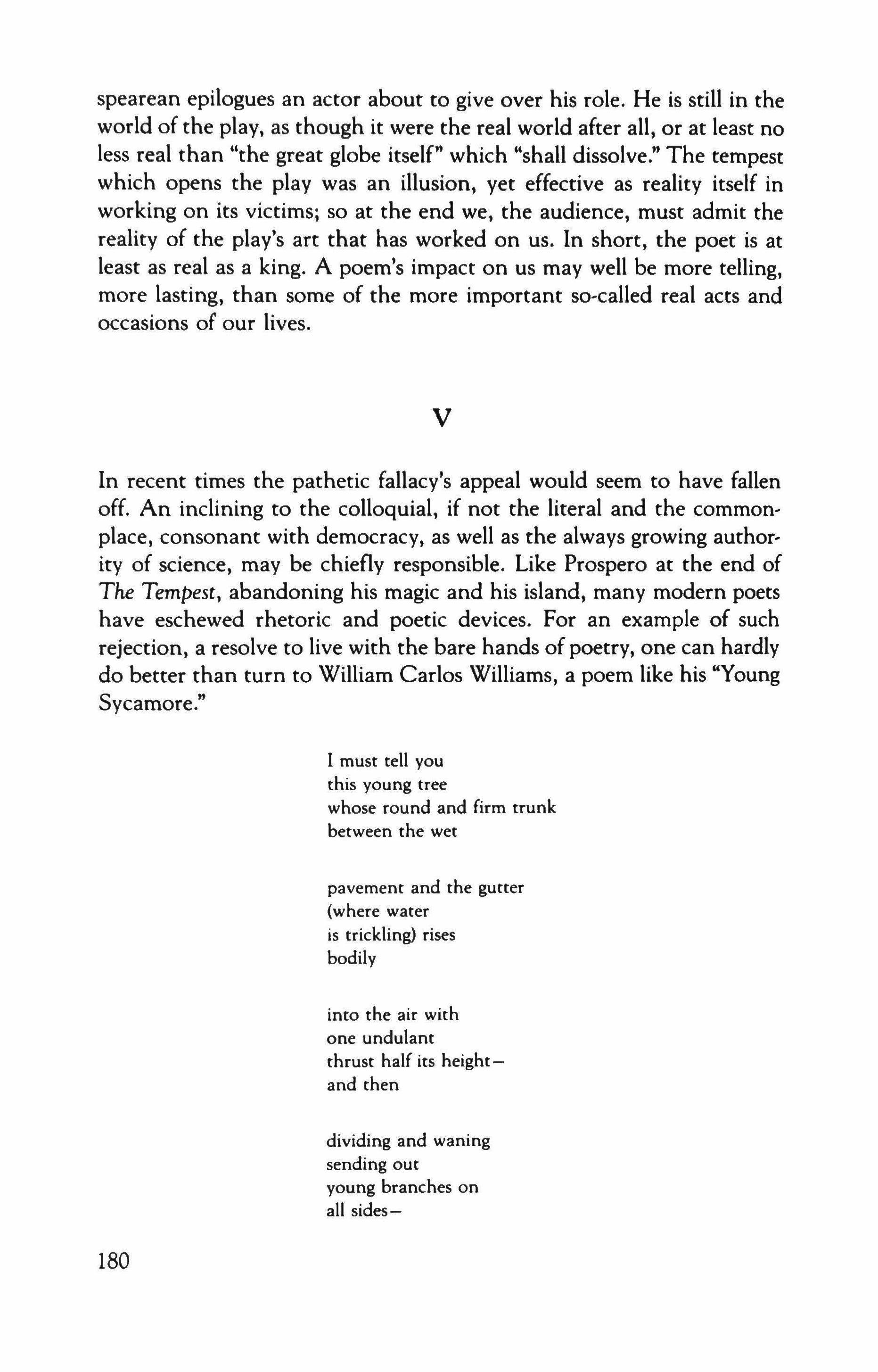
In recent times the pathetic fallacy's appeal would seem to have fallen off. An inclining to the colloquial, if not the literal and the commonplace, consonant with democracy, as well as the always growing authority of science, may be chiefly responsible. Like Prospero at the end of The Tempest, abandoning his magic and his island, many modern poets have eschewed rhetoric and poetic devices. For an example of such rejection, a resolve to live with the bare hands of poetry, one can hardly do better than turn to William Carlos Williams, a poem like his "Young Sycamore."
I must tell you this young tree whose round and firm trunk between the wet
pavement and the gutter (where water is trickling) rises bodily into the air with one undulant thrust half its heightand then
dividing and waning sending out young branches on all sides-
v
180
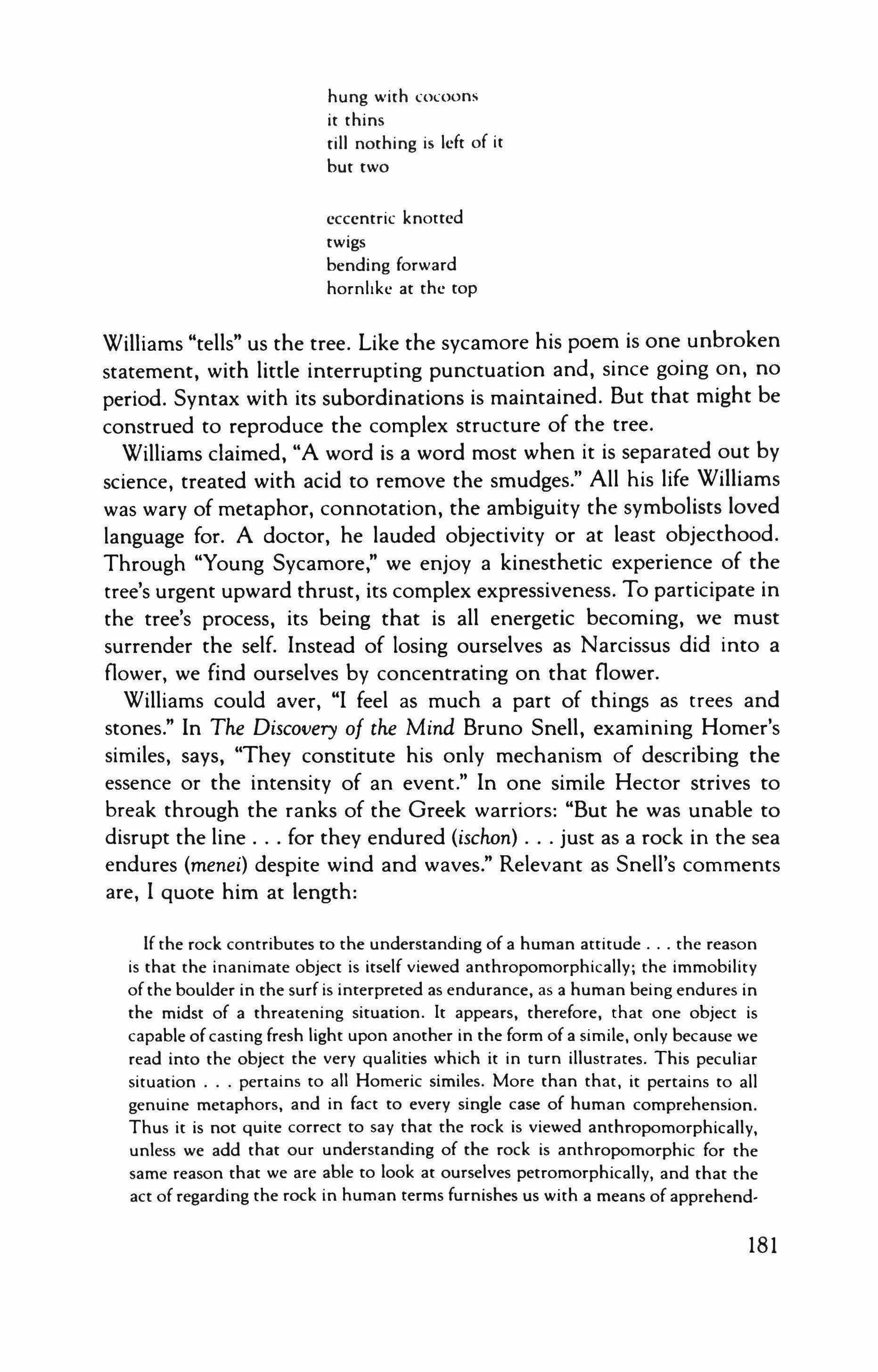
hung with cocoons it thins till nothing is left of it but two
eccentric knotted twigs bending forward hornlike at the top
Williams "tells" us the tree. Like the sycamore his poem is one unbroken statement, with little interrupting punctuation and, since going on, no period. Syntax with its subordinations is maintained. But that might be construed to reproduce the complex structure of the tree.
Williams claimed, "A word is a word most when it is separated out by science, treated with acid to remove the smudges." All his life Williams was wary of metaphor, connotation, the ambiguity the symbolists loved language for. A doctor, he lauded objectivity or at least objecthood. Through "Young Sycamore," we enjoy a kinesthetic experience of the tree's urgent upward thrust, its complex expressiveness. To participate in the tree's process, its being that is all energetic becoming, we must surrender the self. Instead of losing ourselves as Narcissus did into a flower, we find ourselves by concentrating on that flower.
Williams could aver, "I feel as much a part of things as trees and stones." In The Discovery 0/ the Mind Bruno Snell, examining Homer's similes, says, "They constitute his only mechanism of describing the essence or the intensity of an event." In one simile Hector strives to break through the ranks of the Greek warriors: "But he was unable to disrupt the line for they endured (ischon) just as a rock in the sea endures (menei) despite wind and waves." Relevant as Snell's comments are, I quote him at length:
If the rock contributes to the understanding of a human attitude the reason is that the inanimate object is itself viewed anthropomorphically; the immobility of the boulder in the surf is interpreted as endurance, as a human being endures in the midst of a threatening situation. It appears, therefore, that one object is capable ofcasting fresh light upon another in the form of a simile, only because we read into the object the very qualities which it in turn illustrates. This peculiar situation pertains to all Homeric similes. More than that, it pertains to all genuine metaphors, and in fact to every single case of human comprehension. Thus it is not quite correct to say that the rock is viewed anthropomorphically, unless we add that our understanding of the rock is anthropomorphic for the same reason that we are able to look at ourselves petromorphically, and that the act of regarding the rock in human terms furnishes us with a means of apprehend-
181
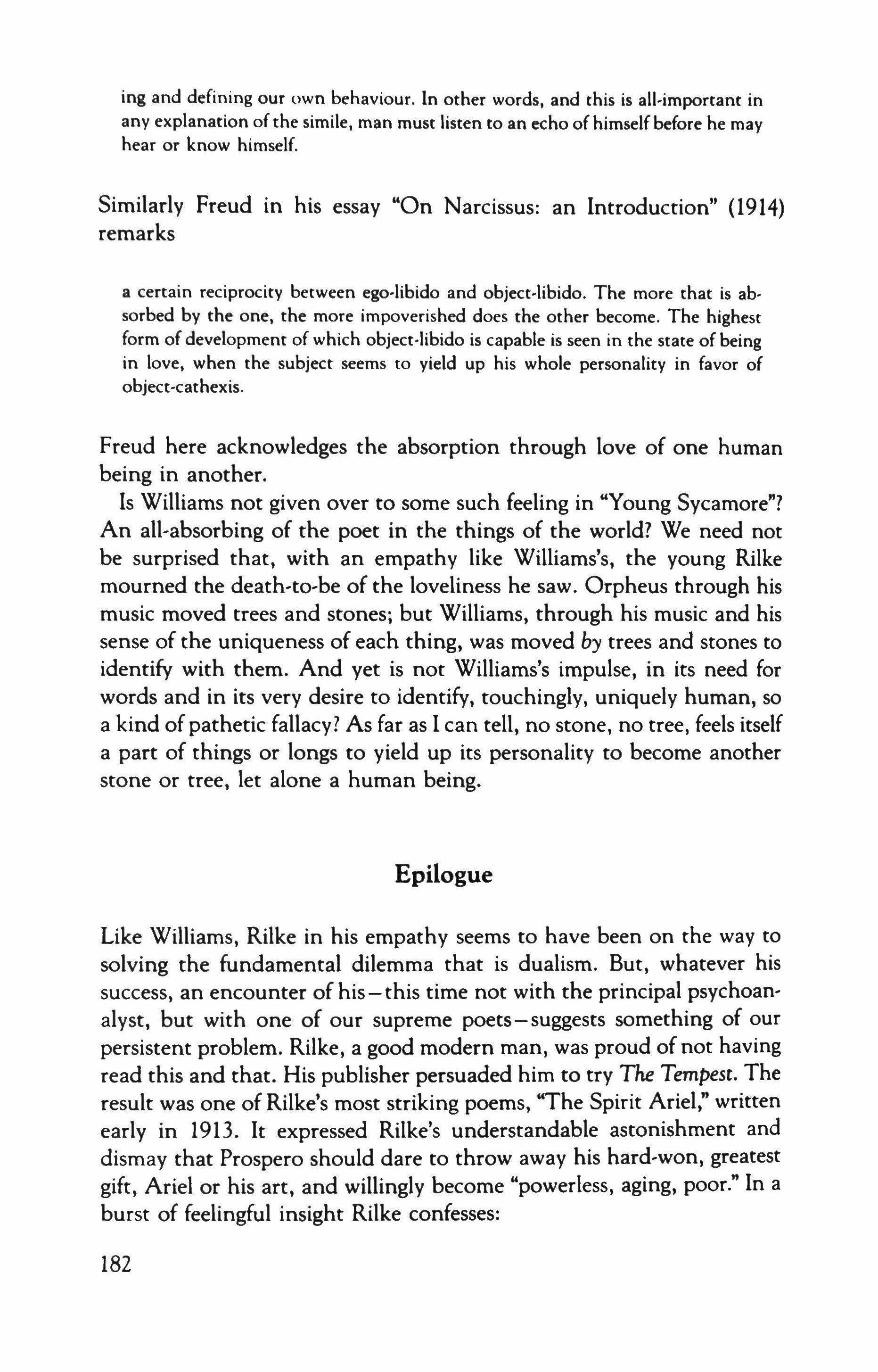
ing and defining our own behaviour. In other words, and this is all-important in any explanation of the simile, man must listen to an echo of himself before he may hear or know himself.
Similarly Freud in his essay "On Narcissus: an Introduction" (1914) remarks
a certain reciprocity between ego-libido and object-libido. The more that is absorbed by the one, the more impoverished does the other become. The highest form of development of which object-libido is capable is seen in the state of being in love, when the subject seems to yield up his whole personality in favor of object-cathexis.
Freud here acknowledges the absorption through love of one human being in another. Is Williams not given over to some such feeling in "Young Sycamore"? An all-absorbing of the poet in the things of the world? We need not be surprised that, with an empathy like Williams's, the young Rilke mourned the death-to-be of the loveliness he saw. Orpheus through his music moved trees and stones; but Williams, through his music and his sense of the uniqueness of each thing, was moved by trees and stones to identify with them. And yet is not Williams's impulse, in its need for words and in its very desire to identify, touchingly, uniquely human, so a kind of pathetic fallacy? As far as 1 can tell, no stone, no tree, feels itself a part of things or longs to yield up its personality to become another stone or tree, let alone a human being.
Epilogue
Like Williams, Rilke in his empathy seems to have been on the way to solving the fundamental dilemma that is dualism. But, whatever his success, an encounter of his - this time not with the principal psychoanalyst, but with one of our supreme poets-suggests something of our persistent problem. Rilke, a good modern man, was proud of not having read this and that. His publisher persuaded him to try The Tempest. The result was one of Rilke's most striking poems, "The Spirit Ariel," written early in 1913. It expressed Rilke's understandable astonishment and dismay that Prospero should dare to throwaway his hard-won, greatest gift, Ariel or his art, and willingly become "powerless, aging, poor." In a burst of feelingful insight Rilke confesses:
182
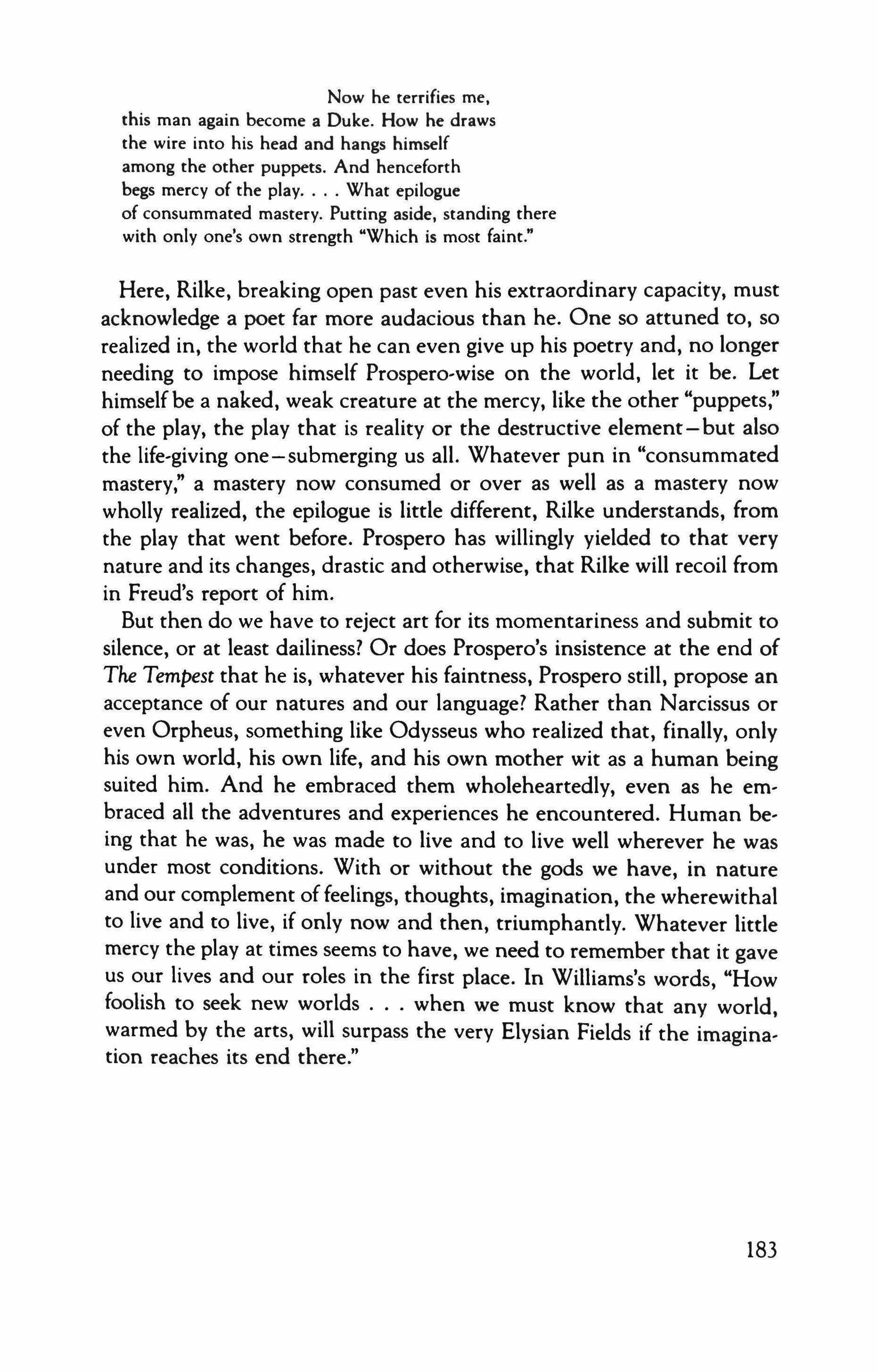
Now he terrifies me, this man again become a Duke. How he draws the wire into his head and hangs himself among the other puppets. And henceforth begs mercy of the play What epilogue of consummated mastery. Putting aside, standing there with only one's own strength "Which is most faint."
Here, Rilke, breaking open past even his extraordinary capacity, must acknowledge a poet far more audacious than he. One so attuned to, so realized in, the world that he can even give up his poetry and, no longer needing to impose himself Prospero-wise on the world, let it be. Let himselfbe a naked, weak creature at the mercy, like the other "puppets," of the play, the play that is reality or the destructive element-but also the life-giving one-submerging us all. Whatever pun in "consummated mastery," a mastery now consumed or over as well as a mastery now wholly realized, the epilogue is little different, Rilke understands, from the play that went before. Prospero has willingly yielded to that very nature and its changes, drastic and otherwise, that Rilke will recoil from in Freud's report of him.
But then do we have to reject art for its momentariness and submit to silence, or at least dailiness? Or does Prospero's insistence at the end of The Tempest that he is, whatever his faintness, Prospero still, propose an acceptance of our natures and our language? Rather than Narcissus or even Orpheus, something like Odysseus who realized that, finally, only his own world, his own life, and his own mother wit as a human being suited him. And he embraced them wholeheartedly, even as he embraced all the adventures and experiences he encountered. Human being that he was, he was made to live and to live well wherever he was under most conditions. With or without the gods we have, in nature and our complement offeelings, thoughts, imagination, the wherewithal to live and to live, if only now and then, triumphantly. Whatever little mercy the play at times seems to have, we need to remember that it gave us our lives and our roles in the first place. In Williams's words, "How foolish to seek new worlds when we must know that any world, warmed by the arts, will surpass the very Elysian Fields if the imagination reaches its end there."
183
Contributors
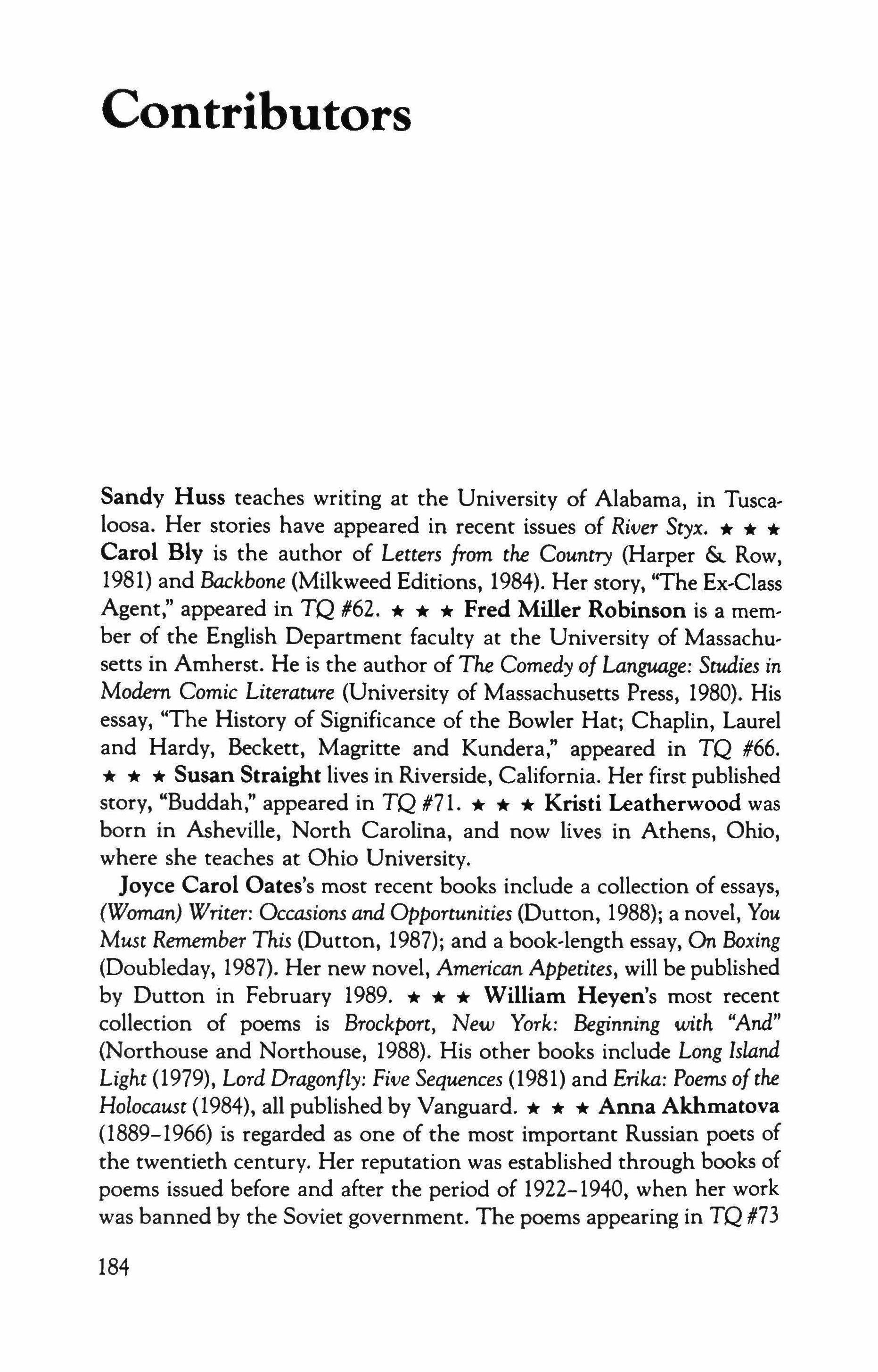
Sandy Huss teaches writing at the University of Alabama, in Tuscaloosa. Her stories have appeared in recent issues of River Styx. * * * Carol Bly is the author of Letters from the Country (Harper & Row, 1981) and Backbone (Milkweed Editions, 1984). Her story, "The Ex-Class Agent," appeared in TQ #62. * * * Fred Miller Robinson is a member of the English Department faculty at the University of Massachusetts in Amherst. He is the author of The Comedy of Language: Studies in Modem Comic Literature (University of Massachusetts Press, 1980). His essay, "The History of Significance of the Bowler Hat; Chaplin, Laurel and Hardy, Beckett, Magritte and Kundera," appeared in TQ #66.
* * * Susan Straight lives in Riverside, California. Her first published story, "Buddah," appeared in TQ #71. * * * Kristi Leatherwood was born in Asheville, North Carolina, and now lives in Athens, Ohio, where she teaches at Ohio University.
Joyce Carol Oates's most recent books include a collection of essays, (Woman) Writer: Occasions and Opportunities (Dutton, 1988); a novel, You Must Remember This (Dutton, 1987); and a book-length essay, On Boxing (Doubleday, 1987). Her new novel, American Appetites, will be published by Dutton in February 1989. * * * William Heyen's most recent collection of poems is Brockport, New York: Beginning with "And" (Northouse and Northouse, 1988). His other books include Long Island Light (1979), Lord Dragonfly: Five Sequences (1981) and Erika: Poems of the Holocaust (1984), all published by Vanguard. * * * Anna Akhmatova (1889-1966) is regarded as one of the most important Russian poets of the twentieth century. Her reputation was established through books of poems issued before and after the period of 1922-1940, when her work was banned by the Soviet government. The poems appearing in TQ #73
184

will be included in The Complete Poems of Anna Akhmatova, translated by Judith Hemschemeyer, to be released by Zephyr Press in a bilingual edition in February 1989. * * * Judith Hemschemeyer has published three books of poems: I Remember the Room Was Filled with Light (1973) and Very Close and Very Slow (1975), both from Wesleyan University Press, and The Ride Home (Texas Tech University Press, 1987).
Michael Anania's most recent books include a novel, The Red Menace (Avon, 1986), and a volume of poems, The Sky at Ashland (Moyer Bell, 1986). He is a professor of English at the University of Illinois at Chicago, and an advisory editor of TriQuarterly. * * * Debra Nystrom's writing has appeared in the American Poetry Review, Ploughshares and Boston Review. She teaches at the University of Virginia. * * *
G. E. Murray is the author of four books of poems, A Mile Called Timothy (Ironwood Press, 1972), Holding Fast (Bonewhistle Press, 1974), Gasoline Dreams (Red Hill Press, 1978) and Repairs (University of Missouri Press, 1980), the last of which received the Devins Award. He reviews poetry for the Chicago Tribune and Chicago magazine. * * *
B. H. Fairchild is the author of The Arrival of the Future (Swallow's Tale Press, 1986) and The System of Which the Body Is One Part, a chapbook to be published in fall 1988 by State Street Press. His poems have appeared in the Southern Review, Georgia Review and Southern Poetry Review.
Kavazeua Ngaruka was born in Gobabis, Namibia, and is studying toward a doctorate in sociology at SUNY-Binghamton. * * * Steve Fisher studied in the writing program of the Arizona penal system. His work has appeared in Ironwood. * * * Bibhu Padhi is the author of a book of poems, Going to the Temple (Indus, 1988), and a critical study, D. H. Lawrence: Modes of Fictional Style (Whitston, 1988). His poems, translations and essays have appeared in New Letters, Modem Fiction Studies, Poetry and other journals. He teaches English at Ravenshaw College, in Cuttack, India. * * * Sterling Plumpp's book, The Mojo Hands Call, I Must Go (Thunder's Mouth Press, 1982), received the Carl Sandburg Award in poetry. He is also the editor of a collection of South African writing, Somehow We Survive (Thunder's Mouth Press, 1982). An associate professor in the Black Studies Program at the University of Illinois at Chicago, he serves as poetry editor of Black American Forum and was one of the editors of TQ #69, From South Africa.
Roland Flint has published three books of poems, the most recent of which is Resuming Green: Selected Poems, 1975-1982 (Dial Press, 1983). His work has appeared in several previous issues of TriQuarterly. He teaches literature and writing at Georgetown University. * * *
Pattiann Rogers's most recent books of poems are Legendary Perform-
185
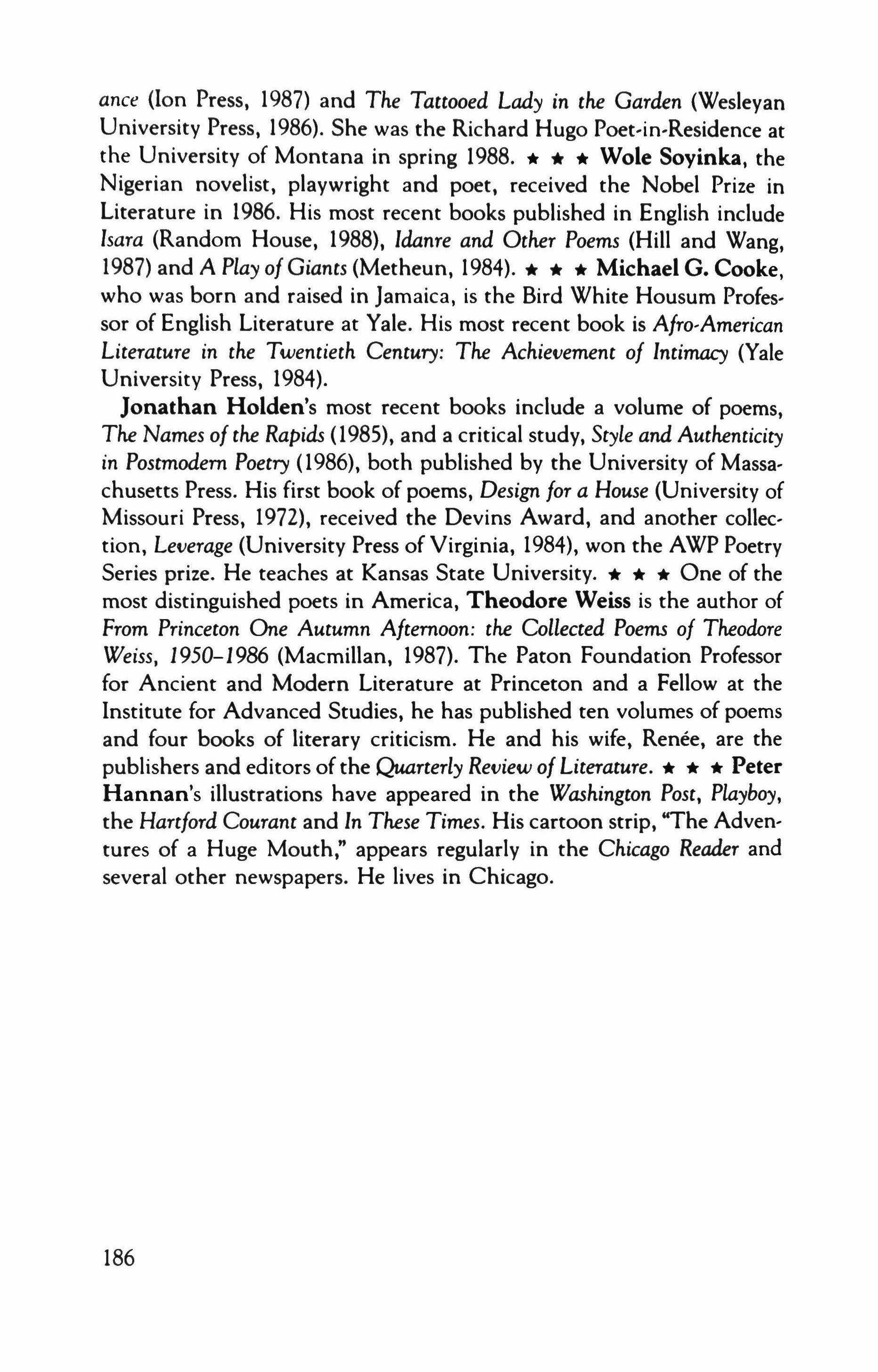
ance (Ion Press, 1987) and The Tattooed Lady in the Garden (Wesleyan University Press, 1986). She was the Richard Hugo Poet-in-Residence at the University of Montana in spring 1988. * * * Wole Sovinka, the Nigerian novelist, playwright and poet, received the Nobel Prize in Literature in 1986. His most recent books published in English include lsara (Random House, 1988), ldanre and Other Poems (Hill and Wang, 1987) and A Play of Giants (Metheun, 1984). * * * Michael G. Cooke, who was born and raised in Jamaica, is the Bird White Housum Professor of English Literature at Yale. His most recent book is Afro-American Literature in the Twentieth Century: The Achievement of Intimacy (Yale University Press, 1984).
Jonathan Holden's most recent books include a volume of poems, The Names of the Rapids (1985), and a critical study, Style and Authenticity in Postmodern Poetry (1986), both published by the University of Massachusetts Press. His first book of poems, Design for a House (University of Missouri Press, 1972), received the Devins Award, and another collection, Leverage (University Press of Virginia, 1984), won the AWP Poetry Series prize. He teaches at Kansas State University. * * * One of the most distinguished poets in America, Theodore Weiss is the author of From Princeton One Autumn Afternoon: the Collected Poems of Theodore Weiss, 1950-1986 (Macmillan, 1987). The Paton Foundation Professor for Ancient and Modern Literature at Princeton and a Fellow at the Institute for Advanced Studies, he has published ten volumes of poems and four books of literary criticism. He and his wife, Renee, are the publishers and editors of the Quarterly Review of Literature. * * * Peter Hannan's illustrations have appeared in the Washington Post, Playboy, the Hartford Courant and In These Times. His cartoon strip, "The Adventures of a Huge Mouth," appears regularly in the Chicago Reader and several other newspapers. He lives in Chicago.
186
Fiction • Poetry • Art • Criticism
Three times a year
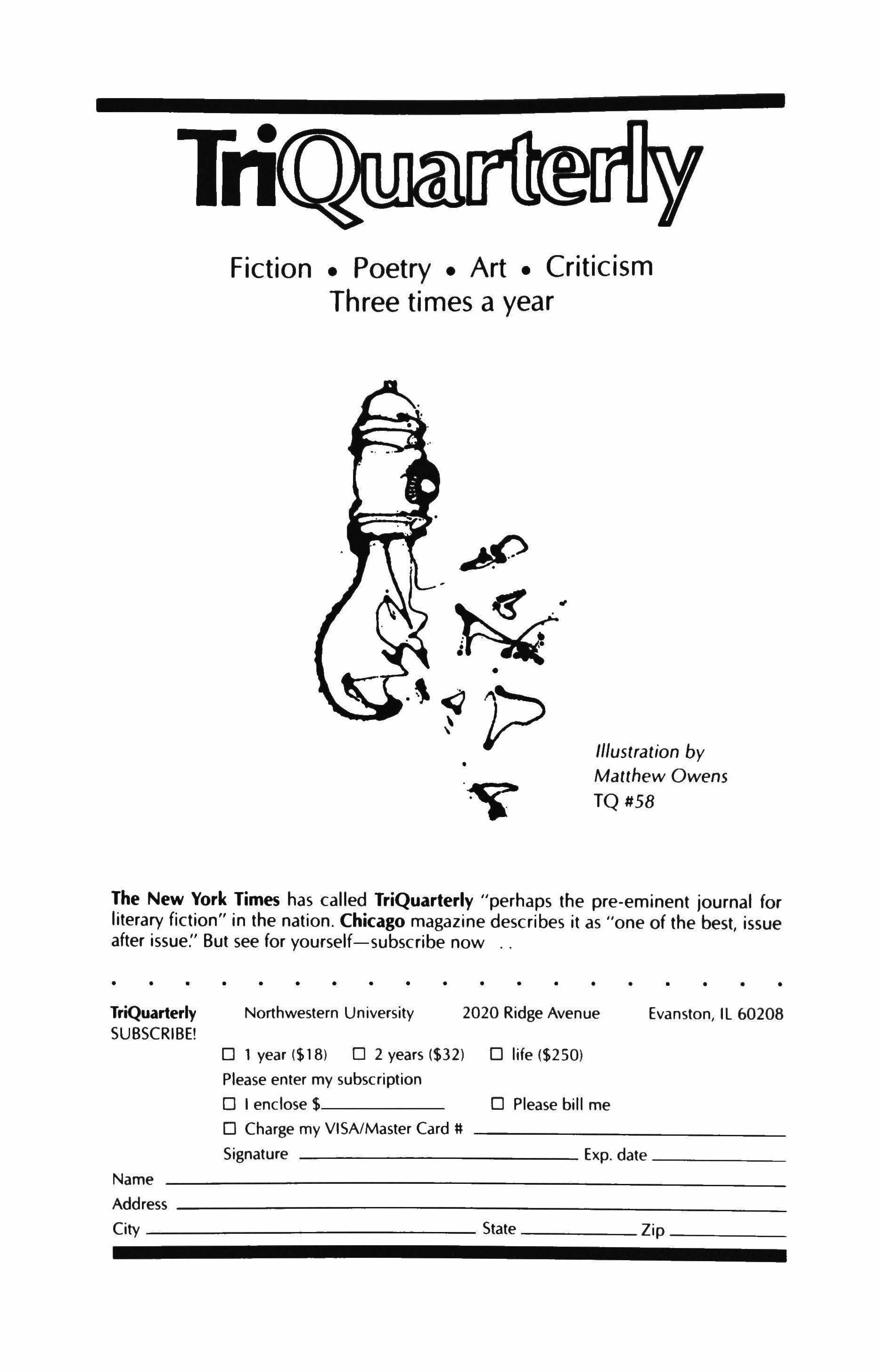
by Matthew Owens TQ#58
The New York Times has called TriQuarterly "perhaps the pre-eminent journal for literary fiction" in the nation. Chicago magazine describes it as "one of the best, issue after issue:' But see for yourself-subscribe now TriQuarterly SUBSCRIBE!
o 1 year ($18) 0 2 years ($32) 0 life ($250) Please enter my subscription
o I enclose $,
o Charge my VISA/Master Card It o Please bill me Signature Exp. date Name
.�
Illustration
Avenue Evanston, IL 60208
Northwestern University 2020 Ridge
Address City State Zip
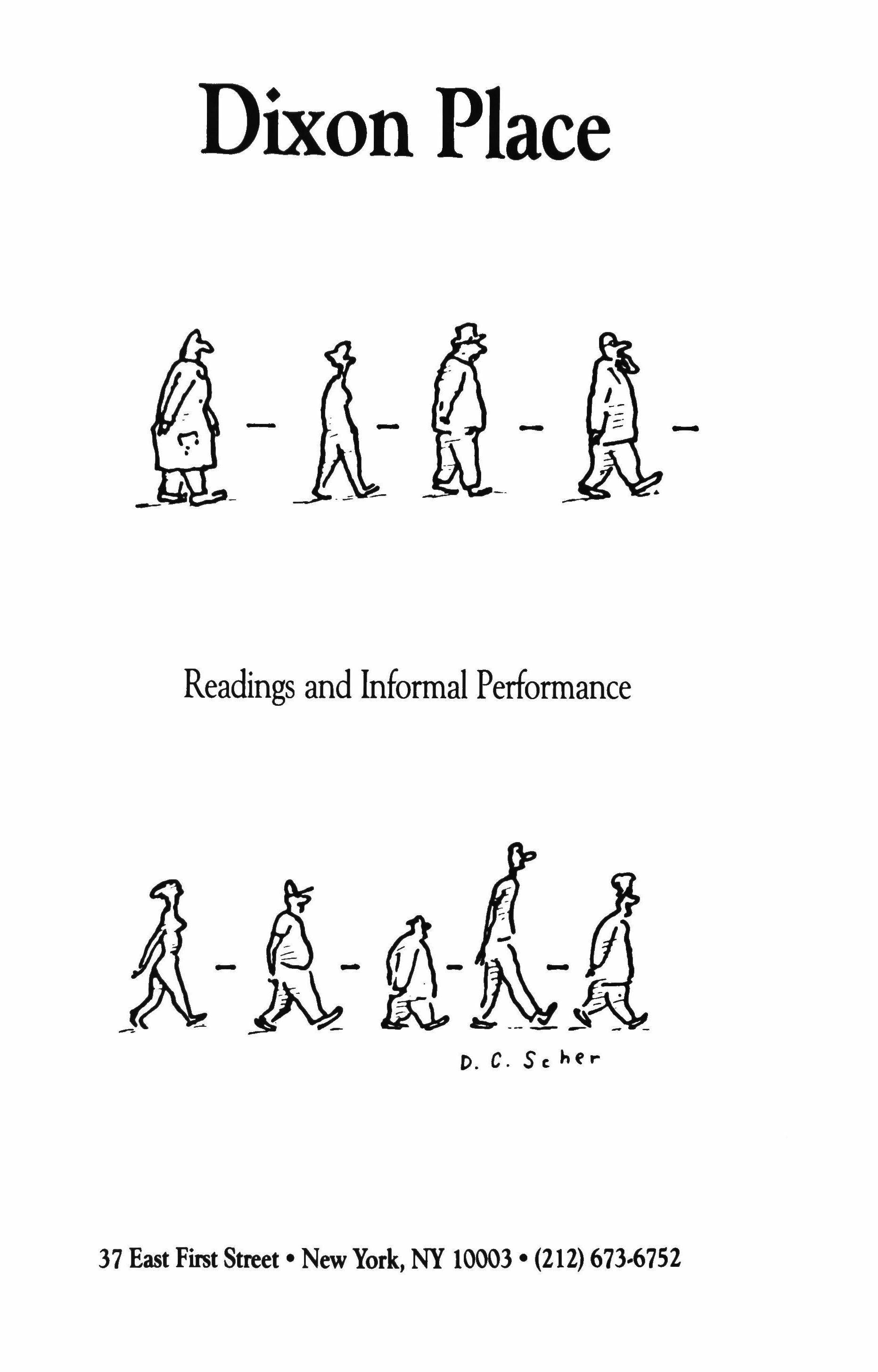
Readings and Informal Performance
-
Dixon Place
D. C. s hfr 37 East First Street New York, NY 10003 (212) 673-6752
It was a Thursday when I lifted the phone and called my agent. I said, "Gabe, I'm going to be sixty-six tomorrow, Friday, January 13, 1978, and I've been writing fiction all my life and no one's ever published a word of it and I'd give my left pinkie to get into The Paris Review:' And I did because Gabriel was interested at once and told me that he'd get in touch with me the next day because he thought he might find a buyer. He did When my story came out, I went to Dr. Dodypol and had the finger removed surgically and under anesthesia. His head nurse, Kate Crackernuts, wrapped the finger in cotton bandages and in red tissue paper with a yellow ribbon around it and I walked out a published author and weighing three ounces less than when I walked in.
-oal/as Wiebe, "Night Flight to Stockholm," Issue 73
THE PARIS REVIEW
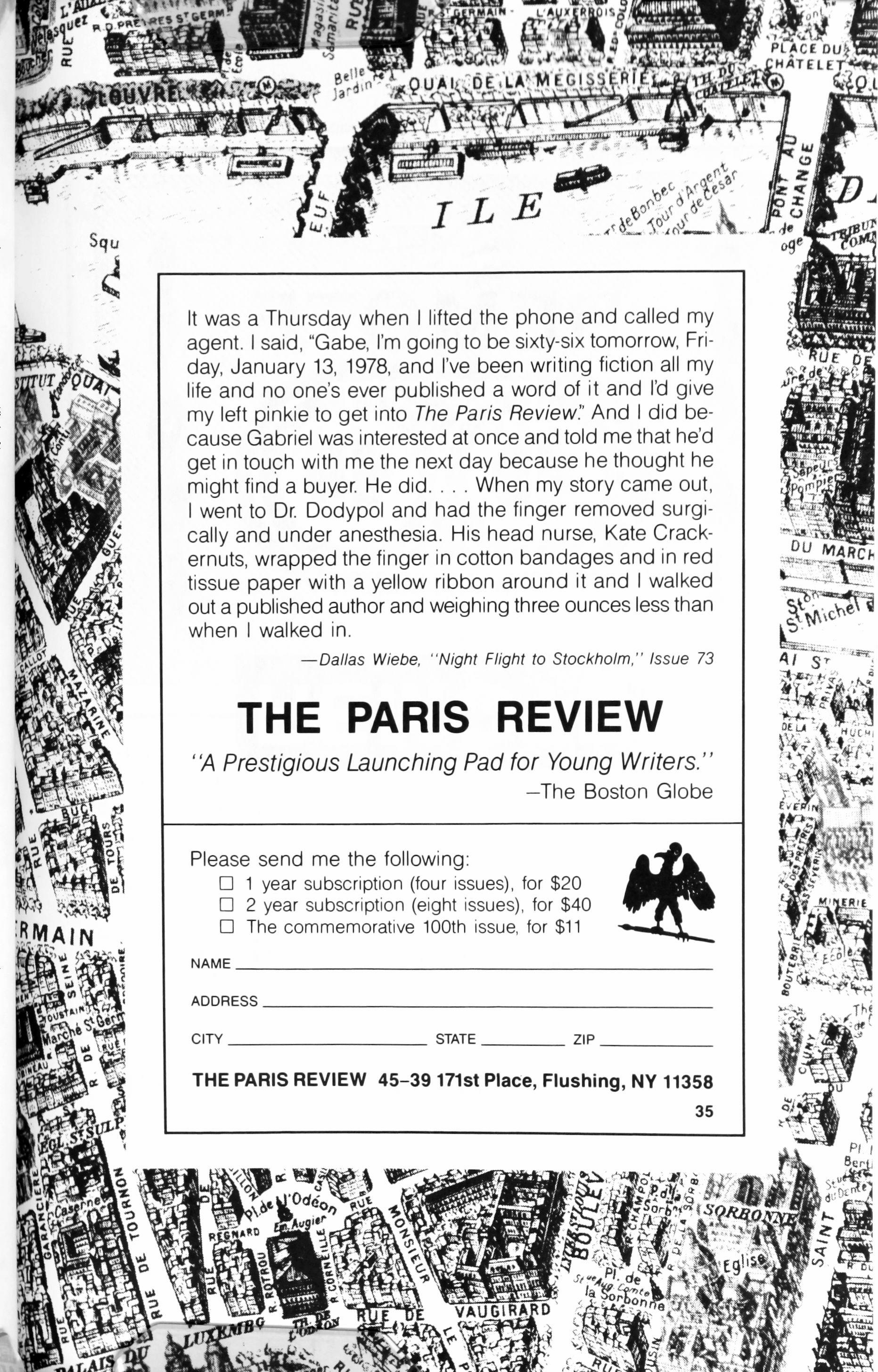
':.4
Prestigious Launching Pad for Young Writers."
-The Boston Globe
Please send me the following:
o 1 year subscription (four issues), for $20
o 2 year subscription (eight issues), for $40
o The commemorative 100th issue, for $11
NAME
ADDRESS
�
CITY STATE ZIP THE PARIS REVIEW 45-39171st Place, Flushing, NY 11358 35

Mississippi Review Twiceyearly Subscriptions: $10/yr Southern Station, Box 5144 Hattiesburg, MS 39406-5144
Dannie Abse • A. R. Ammons. John Ashbery • Wendell Berry • Randy Blasing
Philip Booth. Gwendolyn Brooks. Raymond Carver. Turner Cassity. Amy Clampitt
Alfred Corn. Peter Davison. Carl Dennis. James Dickey • Stephen Dunn
Richard Eberhart. Tess Gallagher. Albert Goldbarth • Thorn Gunn s Richard Howard
David Ignatow • Maxine Kumin • Brad Leithauser • Philip Levine Janet Lewis
William Matthews. J. D. McClatchy. James Merrill. W. S. Merwin Howard Moss
CELEBRATING75YEARSOF
POETRY
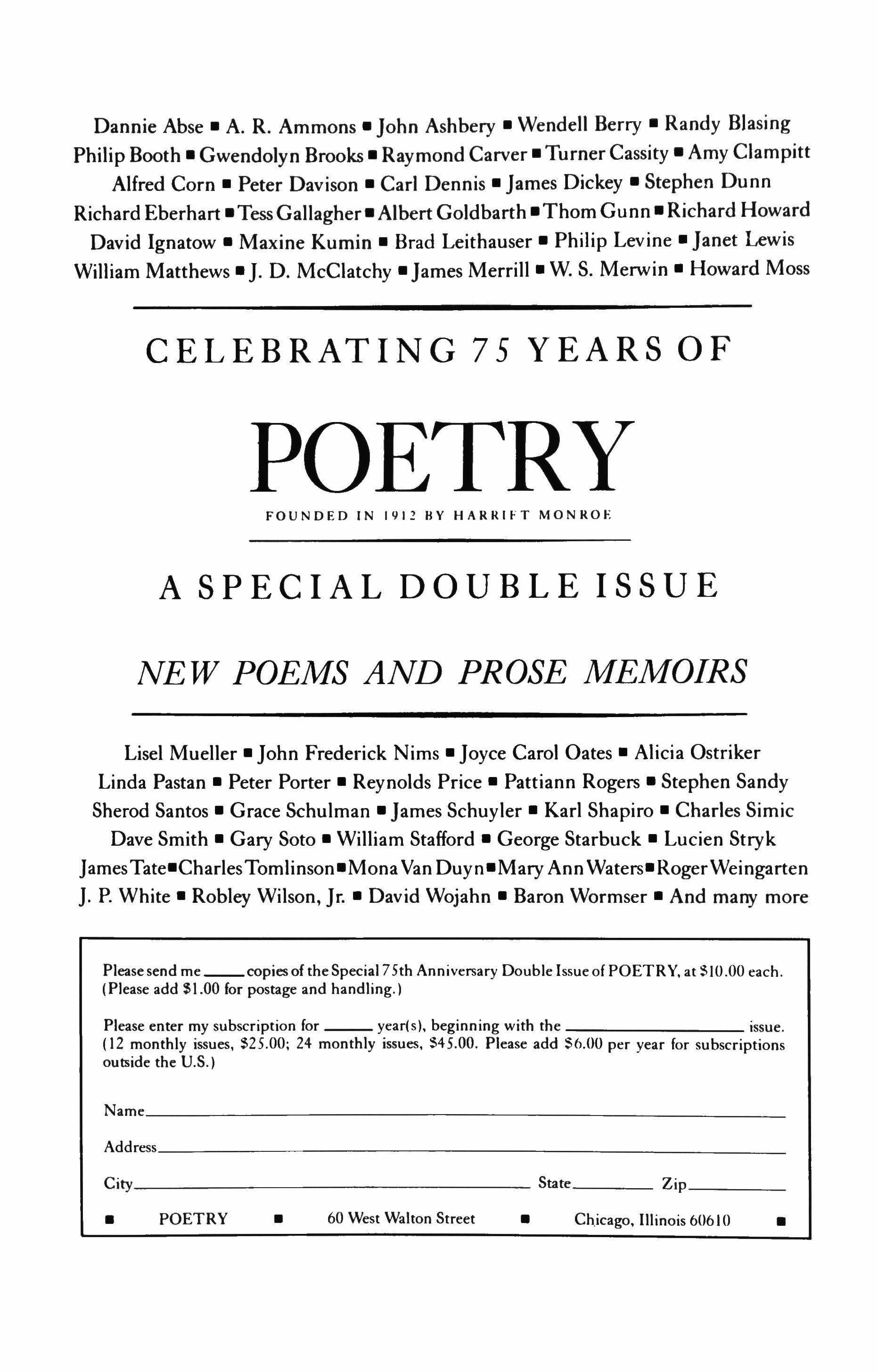
NEW POEMS AND PROSE MEMOIRS
Lisel Mueller. John Frederick Nims Joyce Carol Oates. Alicia Ostriker
Linda Pastan • Peter Porter. Reynolds Price. Pattiann Rogers. Stephen Sandy
Sherod Santos. Grace Schulman. James Schuyler. Karl Shapiro. Charles Simic Dave Smith. Gary Soto William Stafford. George Starbuck. Lucien Stryk
JamesTate.CharlesTomlinson.Mona Van DuynaMary AnnWaters.RogerWeingarten
J. P. White. Robley Wilson, Jr.• David Wojahn. Baron Wormser. And many more
Please send me copies ofthe Special?5th Anniversary Double Issue of POETRY, at 510.00 each. (Please add $1.00 for postage and handling.)
Please enter my subscription for yearts), beginning with the issue. (12 monthly issues, 525.00; 24 monthly issues, 545.00. Please add 56.00 per year for subscriptions outside the U.S.)
Name Address.
City State Zip
• POETRY 60 West Walton Street Chicago, Illinois 60610
FOUNDED IN 1912 IIV HARRIFT MONROE
SPECIAL DOUBLE ISSUE
A
TriCQ�}Y LIMITED EDITIONS
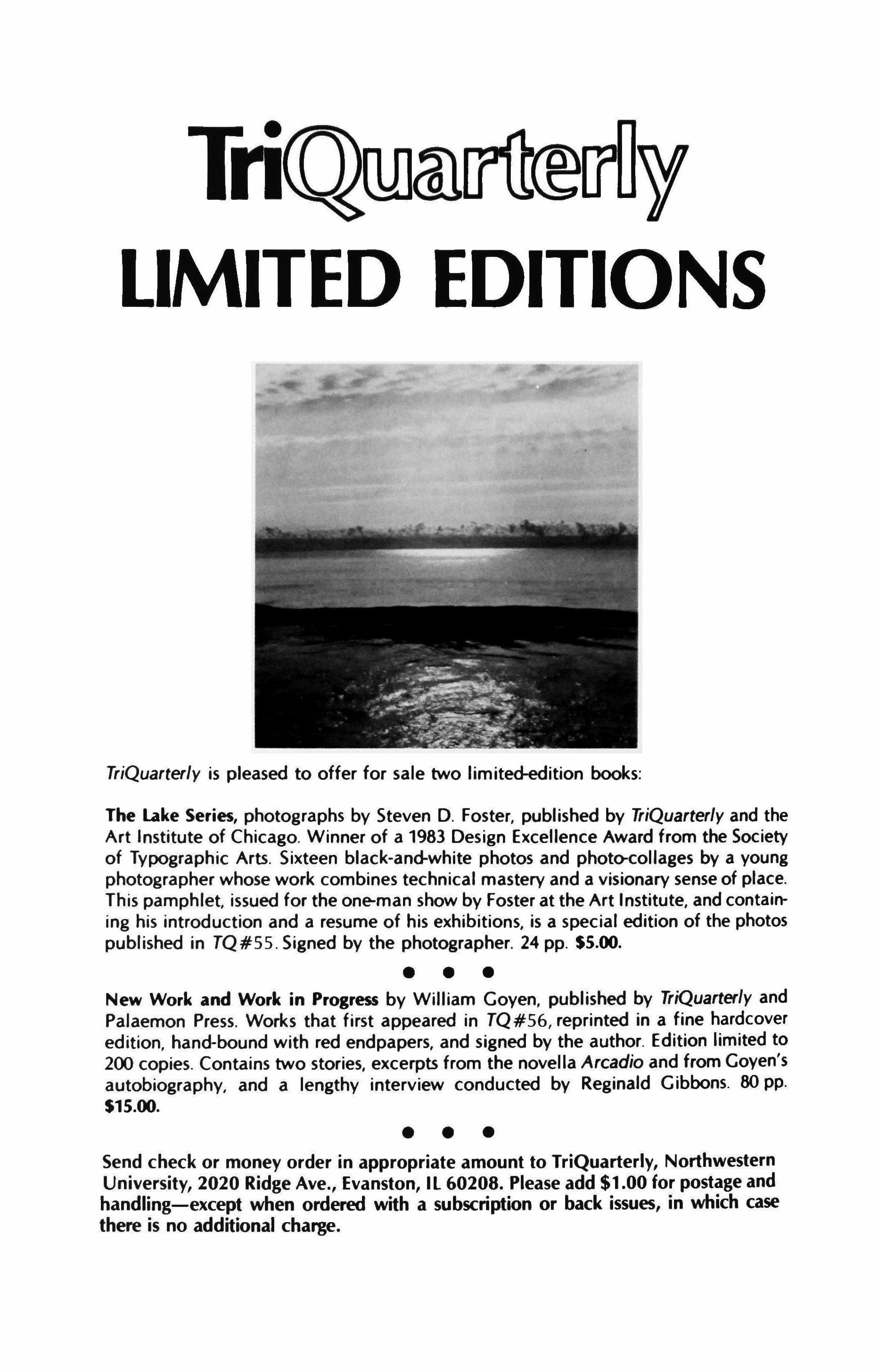
TriQuarterly is pleased to offer for sale two limited-edition books:
The Lake Series, photographs by Steven D. Foster, published by TriQuarterly and the Art Institute of Chicago. Winner of a 1983 Design Excellence Award from the Society of Typographic Arts. Sixteen black-and-white photos and photo-collages by a young photographer whose work combines technical mastery and a visionary sense of place. This pamphlet, issued for the one-man show by Foster at the Art Institute, and containing his introduction and a resume of his exhibitions, is a special edition of the photos published in TQ#55. Signed by the photographer. 24 pp. 55.00.
New Work and Work in Progress by William Goyen, published by TriQuarterly and Palaemon Press. Works that first appeared in TQ#56, reprinted in a fine hardcover edition, hand-bound with red endpapers, and signed by the author. Edition limited to 200 copies. Contains two stories, excerpts from the novella Arcadio and from Coven's autobiography, and a lengthy interview conducted by Reginald Gibbons. 80 pp. 515.00.
Send check or money order in appropriate amount to TriQuarterly, Northwestern University, 2020 Ridge Ave., Evanston, Il 60208. Please add $1.00 for postage and handling-except when ordered with a subscription or back issues, in which case there is no additional charge.
• • •
• • •
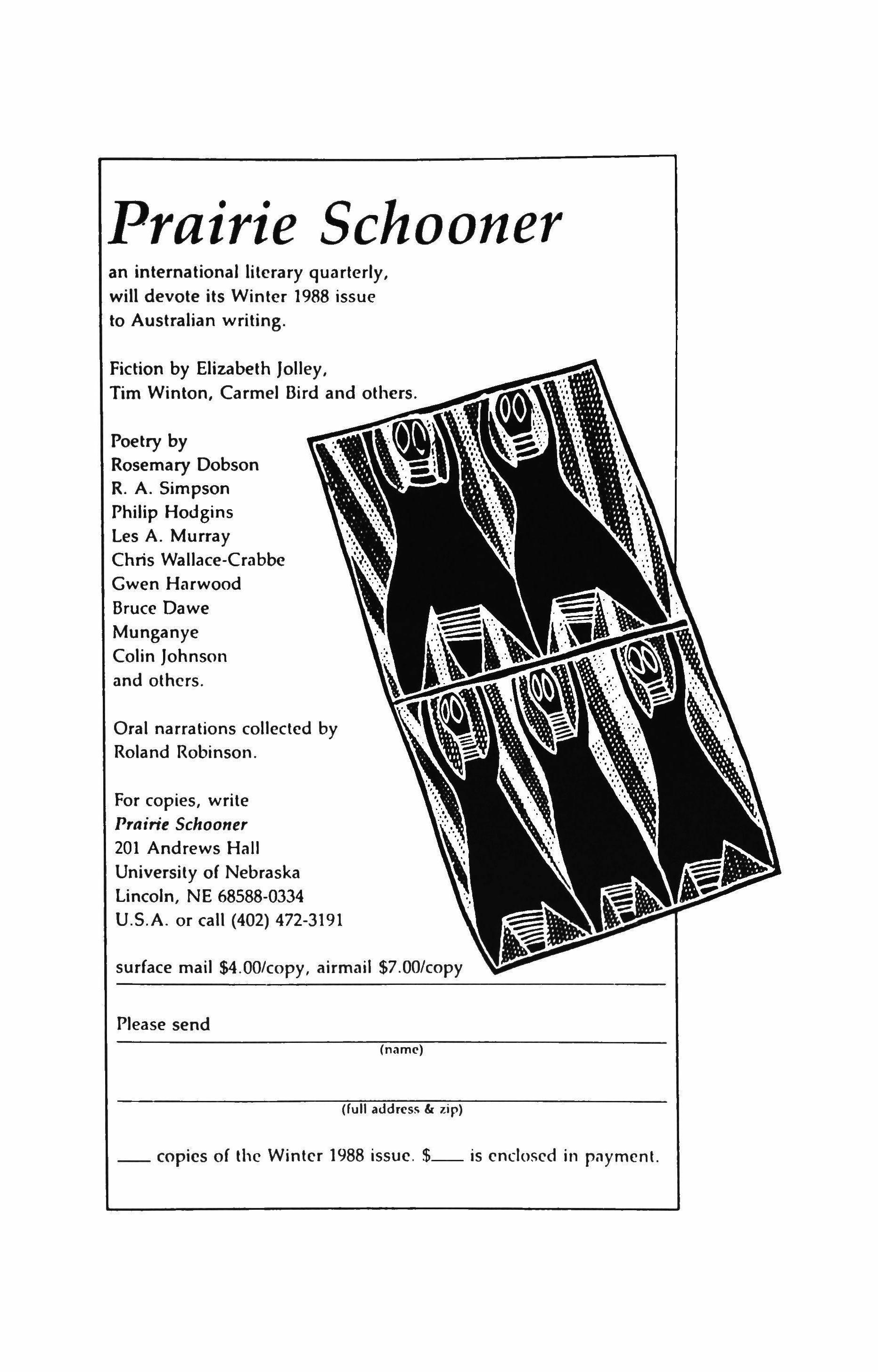
Prairie Schooner
an international literary quarterly, will devote its Winter 1988 issue to Australian writing.
Fiction by Elizabeth Jolley, Tim Winton, Carmel Bird and others.
Poetry by Rosemary Dobson
R. A. Simpson
Philip Hodgins
Les A. Murray
Chris Wallace-Crabbe
Gwen Harwood
Bruce Dawe
Munganye
Colin Johnson and others.
Oral narrations collected by Roland Robinson.
For copies, write Prairie Schooner
201 Andrews Hall
University of Nebraska Lincoln, NE 68588-0334
U.S.A. or call (402) 472-3191 (name)
surface mail $4.00/copy, airmail $7.00/copy
Please send copies of the Winter 1988 issue. $ is enclosed in payment.
lAVE A VOICE IN OUR FUTUREI A prize-winning Independent market for quality fiction, we are dedicated to original, fresh, diverse stories and novel-excerpts. Winner of EIGHT illinois Arts Council Literary Awards since our first Issue, we publish work by new, as well as established writers. Our current Issue, #8, Includes Patricia lear's interview with Ann Beattie.
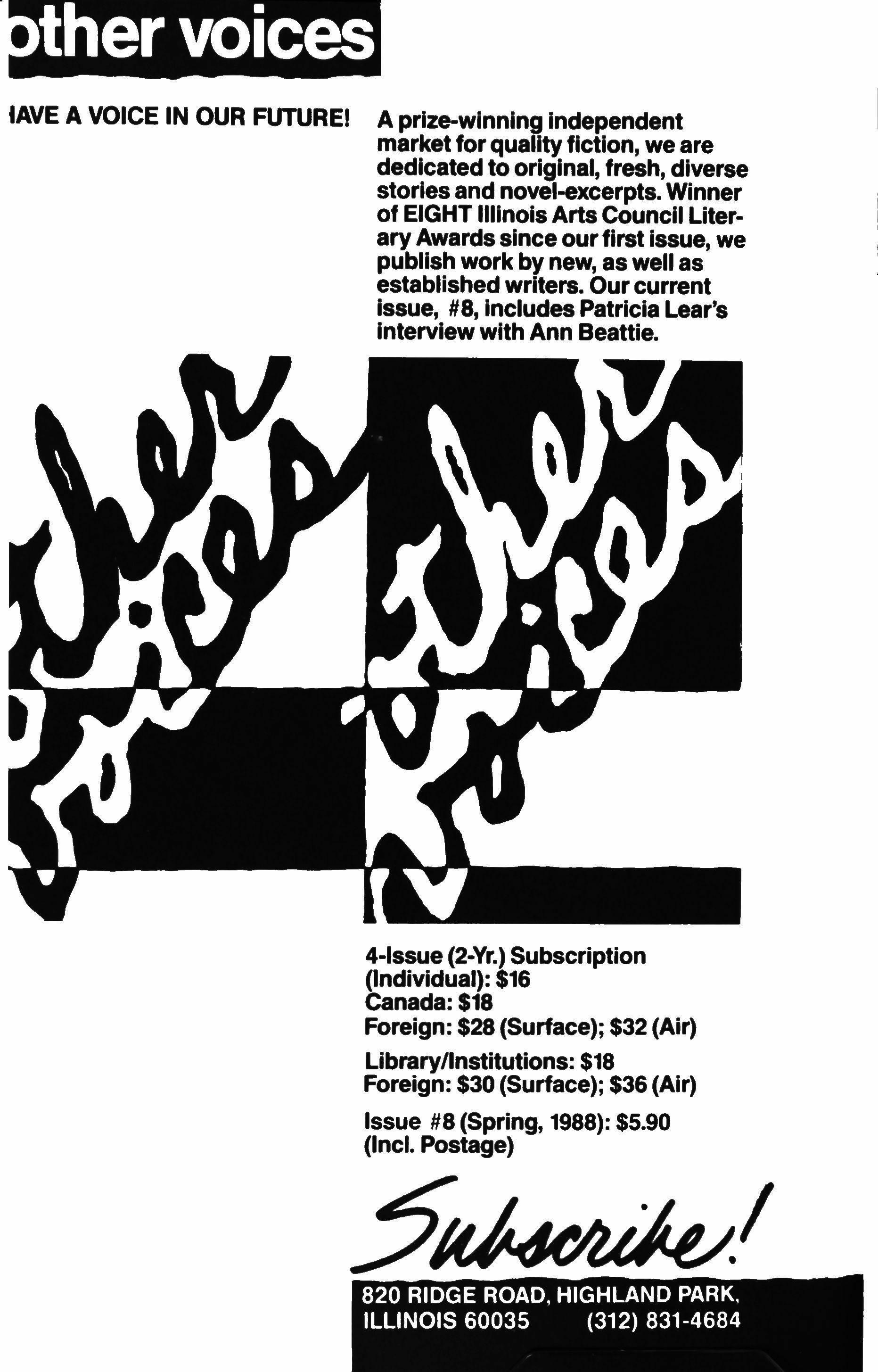
4-lssue (2-Yr.) Subscription (Individual): $16
Canada: $18
Foreign: $28 (Surface); $32 (Air)
Llbraryllnstitutions: $18
Foreign: $30 (Surface); $36 (Air) Issue #8 (Spring, 1988): $5.90 (Incl. Postage)
/ 820 RIDGE ROAD, HIGHLAND PARK. ILLINOIS 60035 (312) 831-4684
SHENANDOAH
THE WASHINGTON AND LEE UNIVERSITY REVIEW
"Full of fictional, critical, poetic and biographical splendor." - The New York Times Book Review
"Well burnished excellence, long maintained." -Kirkus Reviews
'A showcase for exceptional writing." - The Washington Post
AMONG OUR PAST CONTRIBUTORS:
Alice Adams
W. H. Auden
Ann Beattie
John Berryman
Alfred Corn
e. e. cummings
.J ames Dickey
William Faulkner
Jonathan Galassi
Seamus Heaney
John Hersey
Daniel Hoffman
Richard Howard
David Lehman
Robert Lowell
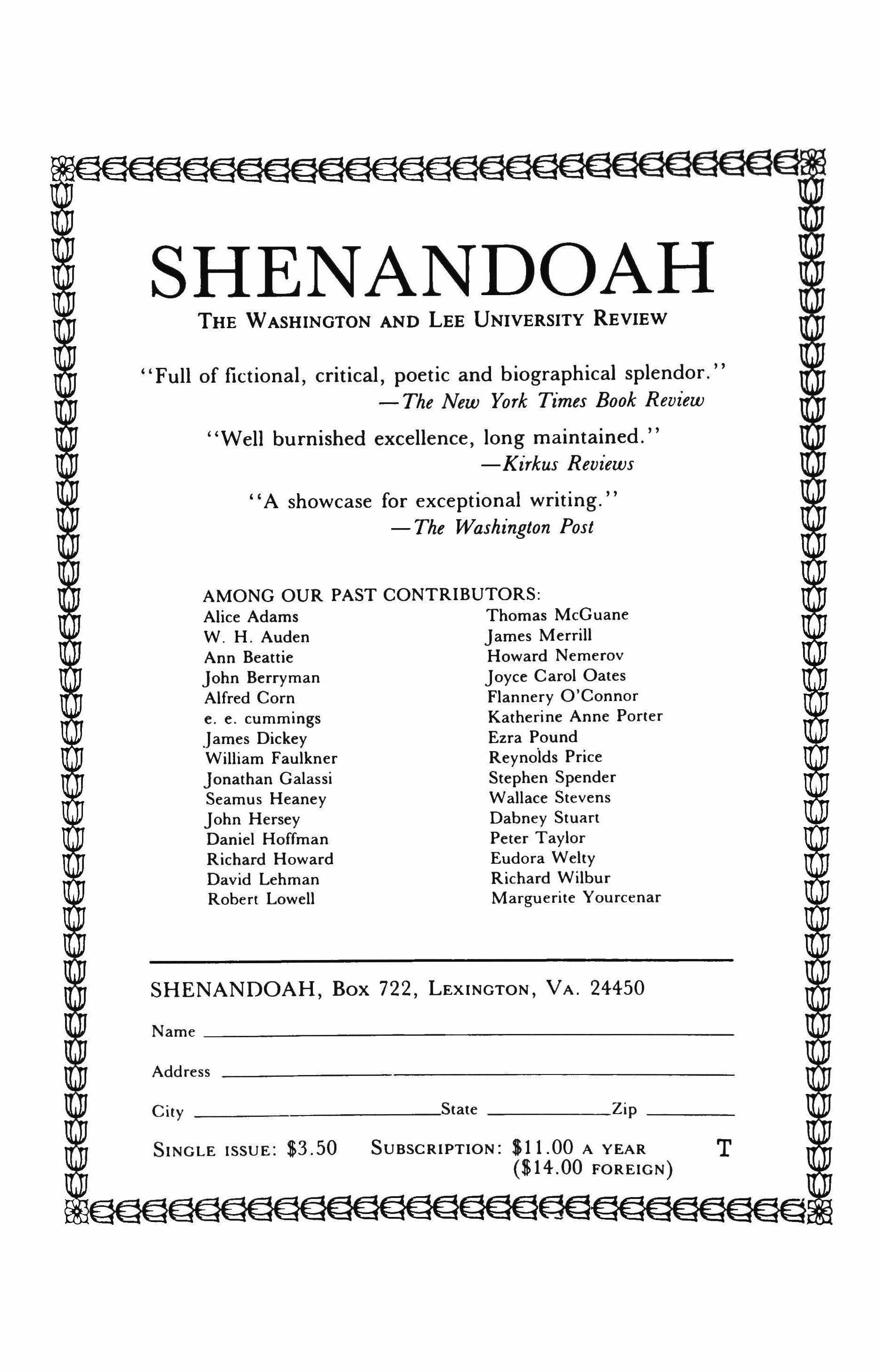
Thomas McGuane
James Merrill
Howard Nemerov
Joyce Carol Oates
Flannery O'Connor
Katherine Anne Porter
Ezra Pound
Reynolds Price
Stephen Spender
Wallace Stevens
Dabney Stuart
Peter Taylor
Eudora Welty
Richard Wilbur
Marguerite Yourcenar
Name
SHENANDOAH, Box 722, LEXINGTON, VA. 24450
Zip SINGLE ISSUE: $3.50 SUBSCRIPTION: $11.00 A YEAR ($14.00 FOREIGN) T
Address City State
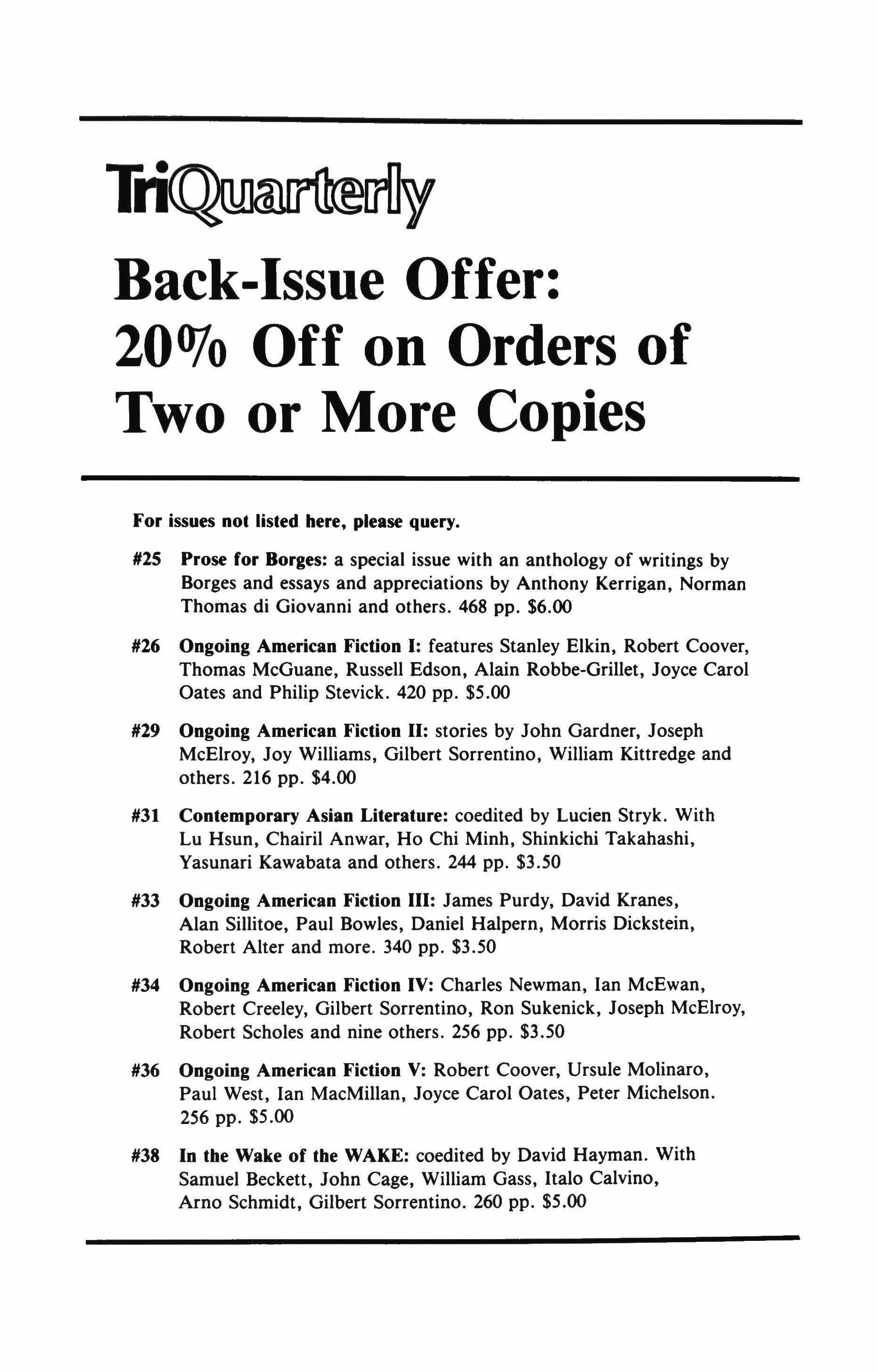
T� Back-Issue Offer: 20070 Off on Orders of
Two or More Copies
For issues not listed here, please query.
#25 Prose for Borges: a special issue with an anthology of writings by Borges and essays and appreciations by Anthony Kerrigan, Norman Thomas di Giovanni and others. 468 pp. $6.00
#26 Ongoing American Fiction I: features Stanley Elkin, Robert Coover, Thomas McGuane, Russell Edson, Alain Robbe-Grillet, Joyce Carol Oates and Philip Stevick. 420 pp. $5.00
#29 Ongoing American Fiction II: stories by John Gardner, Joseph McElroy, Joy Williams, Gilbert Sorrentino, William Kittredge and others. 216 pp. $4.00
#31 Contemporary Asian Literature: coedited by Lucien Stryk. With Lu Hsun, Chairil Anwar, Ho Chi Minh, Shinkichi Takahashi, Yasunari Kawabata and others. 244 pp. $3.50
#33 Ongoing American Fiction III: James Purdy, David Kranes, Alan Sillitoe, Paul Bowles, Daniel Halpern, Morris Dickstein, Robert Alter and more. 340 pp. $3.50
#34 Ongoing American Fiction IV: Charles Newman, Ian McEwan, Robert Creeley, Gilbert Sorrentino, Ron Sukenick, Joseph McElroy, Robert Scholes and nine others. 256 pp. $3.50
#36 Ongoing American Fiction V: Robert Coover, Ursule Molinaro, Paul West, Ian MacMillan, Joyce Carol Oates, Peter Michelson. 256 pp. $5.00
#38 In the Wake of the WAKE: coedited by David Hayman. With Samuel Beckett, John Cage, William Gass, Italo Calvino, Arno Schmidt, Gilbert Sorrentino. 260 pp. $5.00
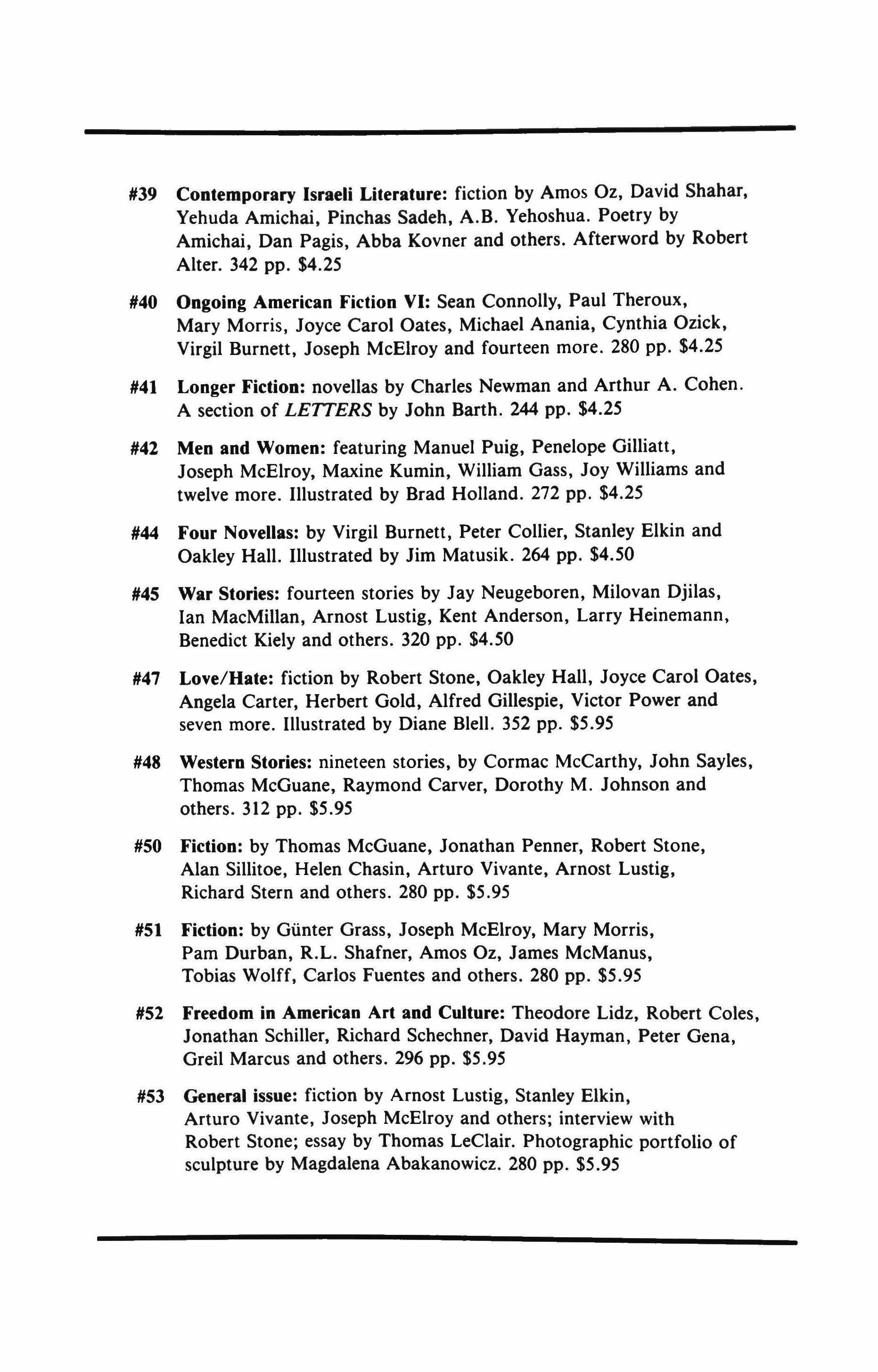
#39 Contemporary Israeli Literature: fiction by Amos Oz, David Shahar, Yehuda Amichai, Pinchas Sadeh, A.B. Yehoshua. Poetry by Amichai, Dan Pagis, Abba Kovner and others. Afterword by Robert Alter. 342 pp. $4.25
#40 Ongoing American Fiction VI: Sean Connolly, Paul Theroux, Mary Morris, Joyce Carol Oates, Michael Anania, Cynthia Ozick, Virgil Burnett, Joseph McElroy and fourteen more. 280 pp. $4.25
#41 Longer Fiction: novellas by Charles Newman and Arthur A. Cohen. A section of LETTERS by John Barth. 244 pp. $4.25
#42 Men and Women: featuring Manuel Puig, Penelope Gilliatt, Joseph McElroy, Maxine Kumin, William Gass, Joy Williams and twelve more. Illustrated by Brad Holland. 272 pp. $4.25
#44 Four Novellas: by Virgil Burnett, Peter Collier, Stanley Elkin and Oakley Hall. Illustrated by Jim Matusik. 264 pp. $4.50
#45 War Stories: fourteen stories by Jay Neugeboren, Milovan Djilas, Ian MacMillan, Arnost Lustig, Kent Anderson, Larry Heinemann, Benedict Kiely and others. 320 pp. $4.50
#47 Love/Hate: fiction by Robert Stone, Oakley Hall, Joyce Carol Oates, Angela Carter, Herbert Gold, Alfred Gillespie, Victor Power and seven more. Illustrated by Diane Bleil. 352 pp. $5.95
#48 Western Stories: nineteen stories, by Cormac McCarthy, John Sayles, Thomas McGuane, Raymond Carver, Dorothy M. Johnson and others. 312 pp. $5.95
#50 Fiction: by Thomas McGuane, Jonathan Penner, Robert Stone, Alan Sillitoe, Helen Chasin, Arturo Vivante, Arnost Lustig, Richard Stern and others. 280 pp. $5.95
#51 Fiction: by Gunter Grass, Joseph McElroy, Mary Morris, Pam Durban, R.L. Shafner, Amos Oz, James McManus, Tobias Wolff, Carlos Fuentes and others. 280 pp. $5.95
#52 Freedom in American Art and Culture: Theodore Lidz, Robert Coles, Jonathan Schiller, Richard Schechner, David Hayman, Peter Gena, Greil Marcus and others. 296 pp. $5.95
#53 General issue: fiction by Arnost Lustig, Stanley Elkin, Arturo Vivante, Joseph McElroy and others; interview with Robert Stone; essay by Thomas LeClair. Photographic portfolio of sculpture by Magdalena Abakanowicz. 280 pp. $5.95

#54 A John Cage Reader: color etchings by Cage plus contributions celebrating his seventieth birthday from Marjorie Perloff', William Brooks, Merce Cunningham and others; fiction by Ray Reno, Arturo Vivante and others; poetry by Teresa Cader, Jay Wright and Michael Collier. 304 pp. $5.95
#55 General issue: fiction by Paul West, Willis Johnson, David Plante and others; poetry by Pamela White Hadas, Roland Flint, Theodore Weiss and others; nonfiction by Janet Lewis, Phyllis Rose and Michael S. Harper; photographs by Steven D. Foster. 240 pp. $5.95
#56 General issue: New work by and an interview with William Goyen plus fiction by Frederick Busch, Amy Hempel, Stephen Dixon, Andrew Fetler and others; poetry by Marvin Bell, Joyce Carol Oates, W.S. Di Piero, Lucien Stryk and others. A selection of The Small Press Book Club. 288 pp. $5.95
#57 A special two-volume set- Vol. 1, A Window on Poland: featuring essays, fiction and poems written during Solidarity and martial law. Konwicki, Brandys and others, with twenty-two photos and graphic works. 128 pp. Vol 2, Prose from Spain, featuring recent fiction and essays, plus an interview with Juan Goytisolo and eight color pages of street murals. 112 pp. $3.95/each vol., $7.90/set
#58 General issue: stories by Fred Chappell, Janet Kauffman and others; poetry by George Starbuck, C.K. Williams, Dave Smith and others; essays by William Goyen and Alan Shapiro; illustrations by Stan Washburn and Matthew Owens. 224 pp. $6.95
#60 Chicago: interviews with Saul Bellow and Norman Maclean; fiction by Lorraine Hansberry, Harry Mark Petrakis, Richard Stern and others; memoirs by Karl Shapiro and Gwendolyn Brooks; poetry by Paul Carroll, Lisel Mueller and others; photographs by Stephen Deutch, Arthur Shay and others. 444 pp. $10.95
#63 TQ 20: twentieth-anniversary issue, with fiction by James T. Farrell, Richard Brautigan, Stanley Elkin, Jorge Luis Borges, Joyce Carol Oates, Vladimir Nabokov, Cynthia Ozick, Raymond Carver, William Goyen, Lorraine Hansberry and others; poetry by Anne Sexton, Howard Nemerov, W. S. Merwin, Jack Kerouac, Marvin Bell and others; interview with Saul Bellow; illustrations and photographs. 684 pp. $12.95
#65 The Writer in Our World: symposium featuring Stanislaw Baranczak, Terrence Des Pres, Gloria Emerson, Leslie Epstein, Carolyn Forche, Michael S. Harper, Ward Just, Grace Paley, Mary Lee Settle, Robert Stone, Derek Walcott and C. K. Williams, with original work
by most participants and by symposium moderators Angela Jackson and Bruce Weigl; photographs. 332 pp. $8.95
*66 General issue: stories by Reynolds Price, David Plante, Gordon Lish, Norbert Blei and others; poems by Raymond Carver, Susan Hahn, Irina Ratushinskaya and others; essay by Fred Miller Robinson. 240 pp. $6.95
1167 General issue: stories by Janet Desaulniers, Amy Herrick, Carol Emshwiller and Martha Bennett Stiles; poems by Rita Dove, Joyce Carol Oates, Timothy Dekin and others; special section of essays and poems by W. S. Di Piero; excerpt from autobiography by Paul Zweig. 208 pp. $6.95
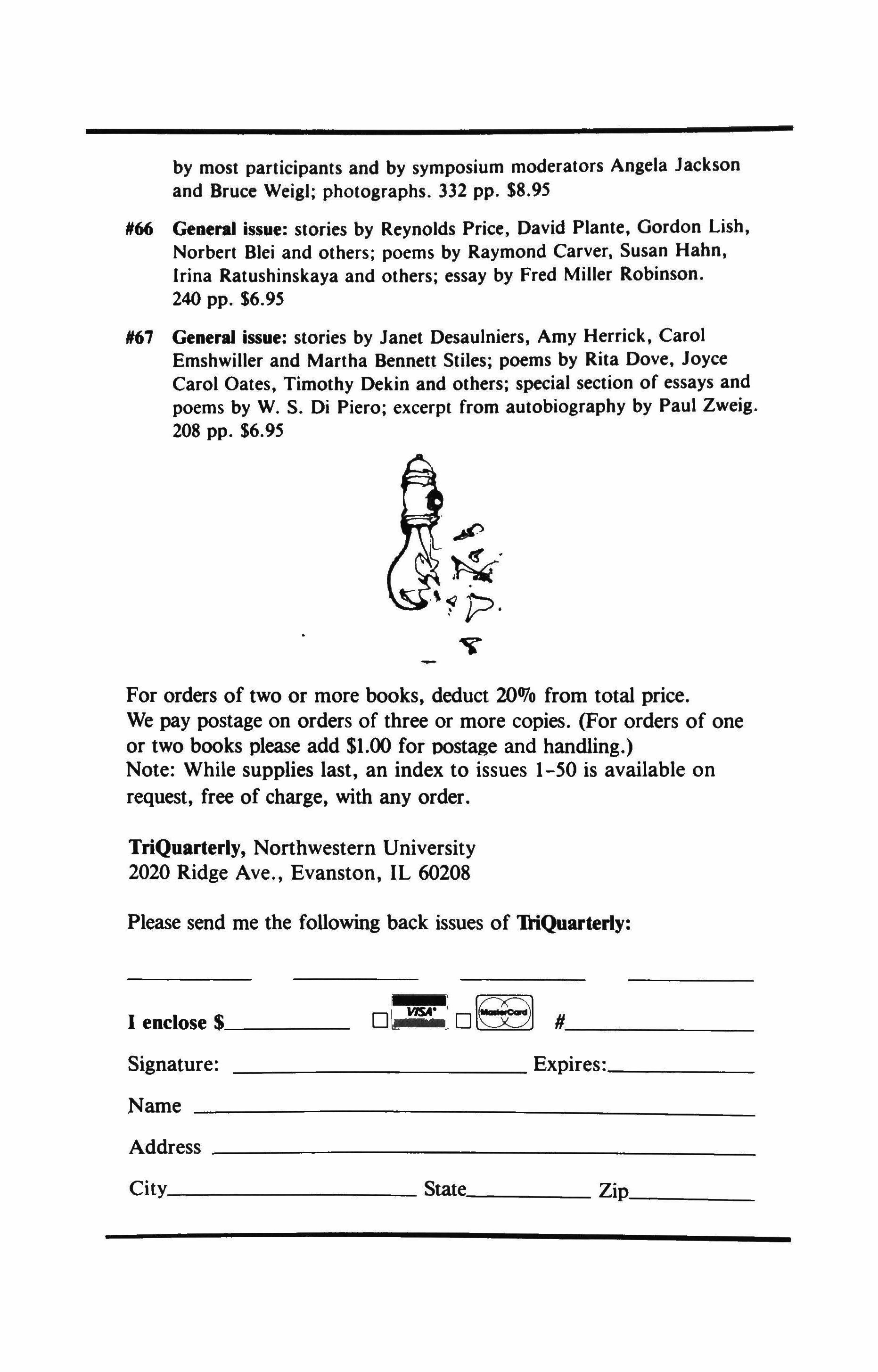
For orders of two or more books, deduct 20070 from total price. We pay postage on orders of three or more copies. (For orders of one or two books please add $1.00 for postage and handling.)
Note: While supplies last, an index to issues 1-50 is available on request, free of charge, with any order.
TriQuarterly, Northwestern University 2020 Ridge Ave., Evanston, IL 60208
Please send me the following back issues of 1iiQuarteriy:
I
$, n VISA· � 0 IEElI #
City State. Zip.
enclose
Signature: Expires: Name Address
New Poetry and Fiction
Indiana Review
Recent Fiction by:
Kevin Mcllvoy
Pam Durban
Charles Baxter
Linda Svendsen
Gerald Duff
Bret Lott

Recent Poetry by:
Albert Goldbarth
Sharon Olds
Linda Gregg
Stephen Dobyns
Michael Waters
Barbara Anderson
316 North
Jordan Avenue
Bloomington, Indiana 47405
Subscriptions
$10/three issues
Single issues $4
Submissions welcome
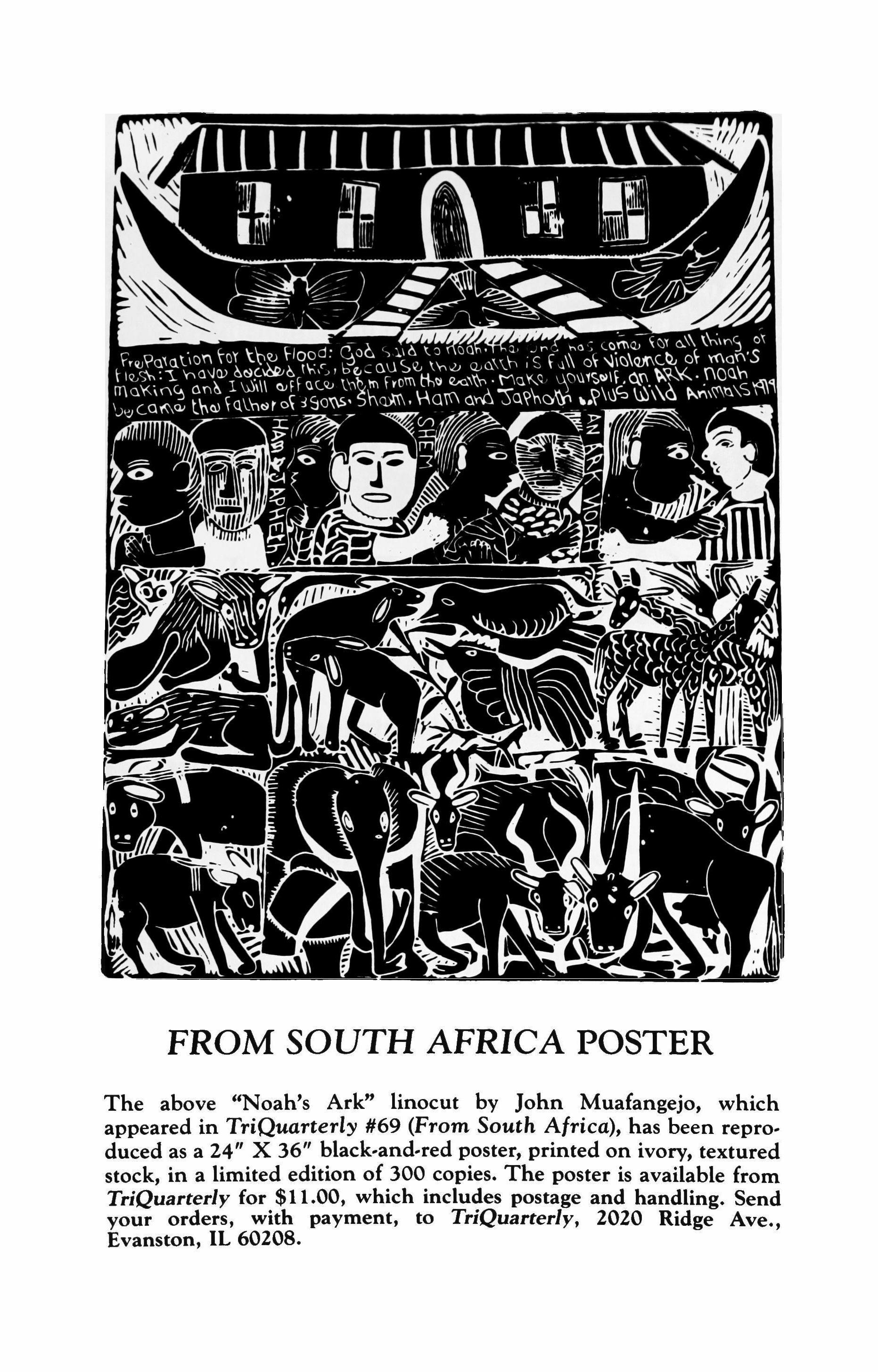
FROM SOUTH AFRICA POSTER
The above "Noah's Ark" linocut by John Muafangejo, which appeared in TriQuarterly #69 (From South Africa), has been reproduced as a 24" X 36" black-and-red poster, printed on ivory, textured stock, in a limited edition of 300 copies. The poster is available from TriQuarterly for $11.00, which includes postage and handling. Send your orders, with payment, to TriQuarterly, 2020 Ridge Ave., Evanston, IL 60208.
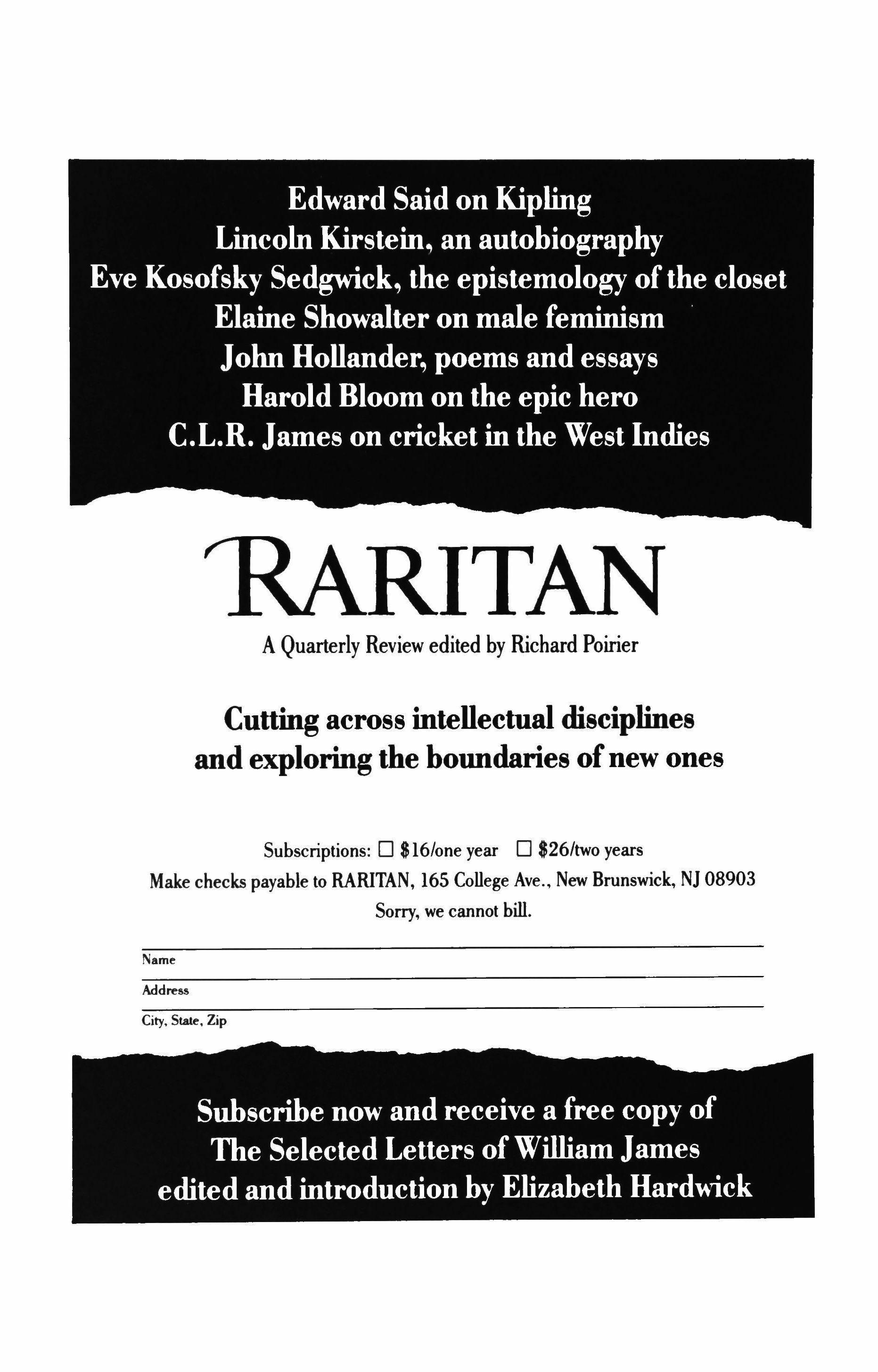
Edward Said on Kipling
Lincoln Kirstein, an autobiography
Eve Kosofsky Sedgwick, the epistemology ofthe closet
Elaine Showalter on male feminism
John Hollander, poems and essays
Harold Bloom on the epic hero
C.L.R. James on cricket in the West Indies
�ITAN
A Quarterly Review edited by Richard Poirier
Cutting across intellectual disciplines and exploring the boundaries of new ones
0 $16/one year 0 $26/two years Make checks payable to RARITAN, 165 College Ave., New Brunswick, NJ 08903 Sorry, we cannot bill. Nam� City. Stale. Zip Subscribe now and receive a free copy of The Selected Letters of William James edited and introduction by Elizabeth Hardwick
Subscriptions:
The American Voice
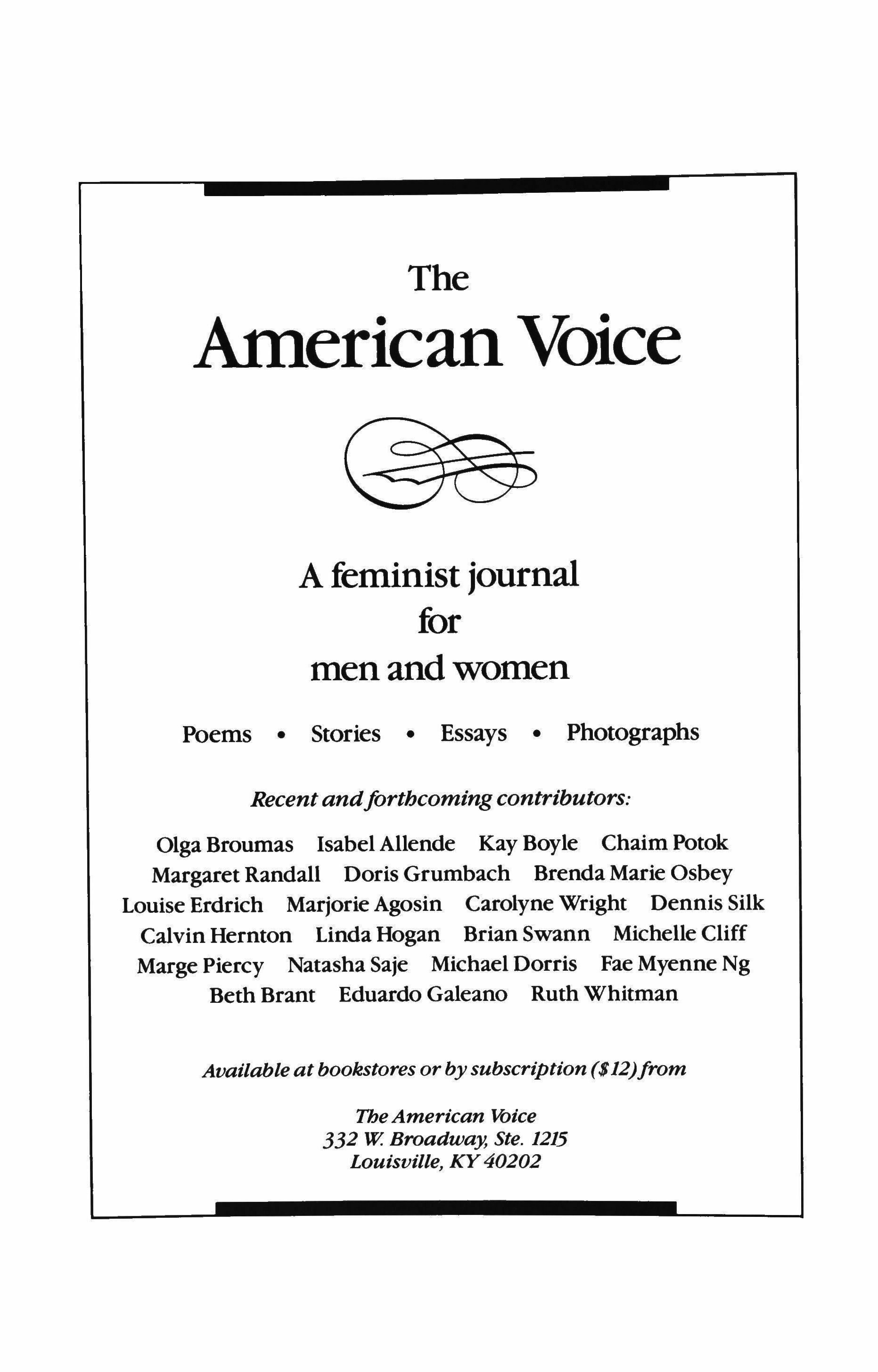
A feminist journal for men and
women
Poems Stories • Essays Photographs
Recent andforthcoming contributors:
Olga Broumas Isabel Allende Kay Boyle Chaim Potok
Margaret Randall Doris Grumbach
Louise Erdrich
Brenda Marie Osbey
Marjorie Agosin Carolyne Wright
Calvin Hernton Linda Hogan
Marge Piercy
Natasha Saje
Brian Swann
Dennis Silk
Michelle Cliff
Michael Dorris Fae Myenne Ng
Beth Brant Eduardo Galeano
Ruth Whitman
Available at bookstores or bysubscription ($12)from TheAmerican fuice 332 W. Broadway, Ste. 1215 Louisville, KY40202
tl5XBQ!lh�YARD
c2/on't miss the best Contemporary Fiction. Poetry and Nonfiction
Featuring Fine Subscribe Now work by: writing and a Alice good bargain. Adams Boulevard has a lot
John to oller those
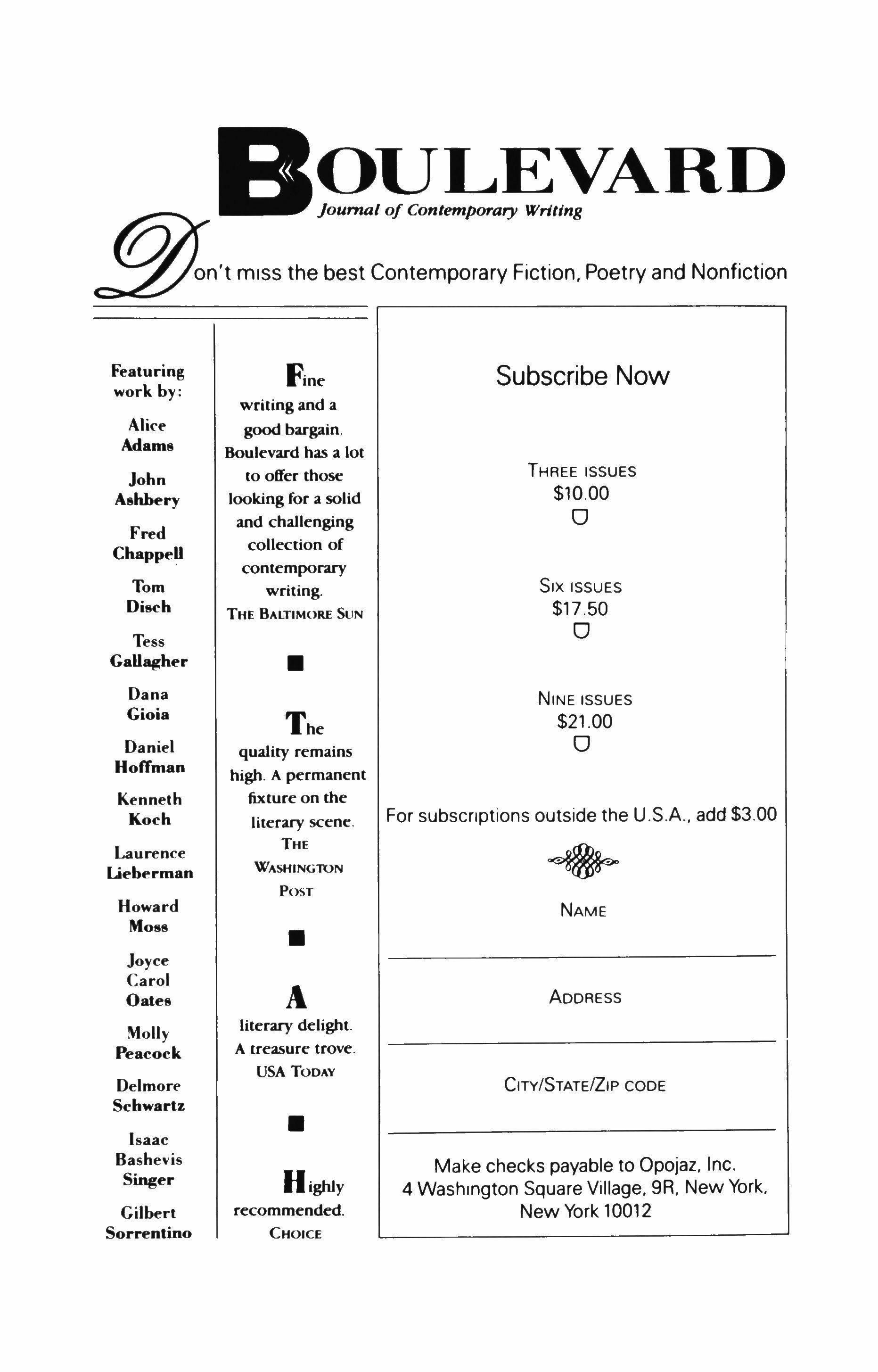
THREE ISSUES
Ashbery looking for a solid $10.00
Fred and challenging 0 ChappeD collection of contemporary
Tom writing. SIX ISSUES
Disch THE BALTIMORE SUN $17.50
Tess 0
GaDagher
Dana NINE ISSUES
Gioia
$21.00
Daniel quality remains 0 Hoffman high. A permanent Kenneth fixture on the Koch literary scene. For subscriptions outside the U.S.A add $3.00
Laurence THE • Lieberman WASHINGlUN POST
Howard NAME Moss
Joyce Carol A Oates ADDRESS
Molly literary delight. Peacock A treasure trove. USA TODAY
Delmore CITY/STATEIZIP CODE
Schwartz
Isaac
Bashevis Make checks payable to Opojaz. Inc.
Singer Highly 4 Washington Square Village. 9R. New York. Gilbert recommended. New York 10012
Sorrentino CHOICE
•
The
•
•
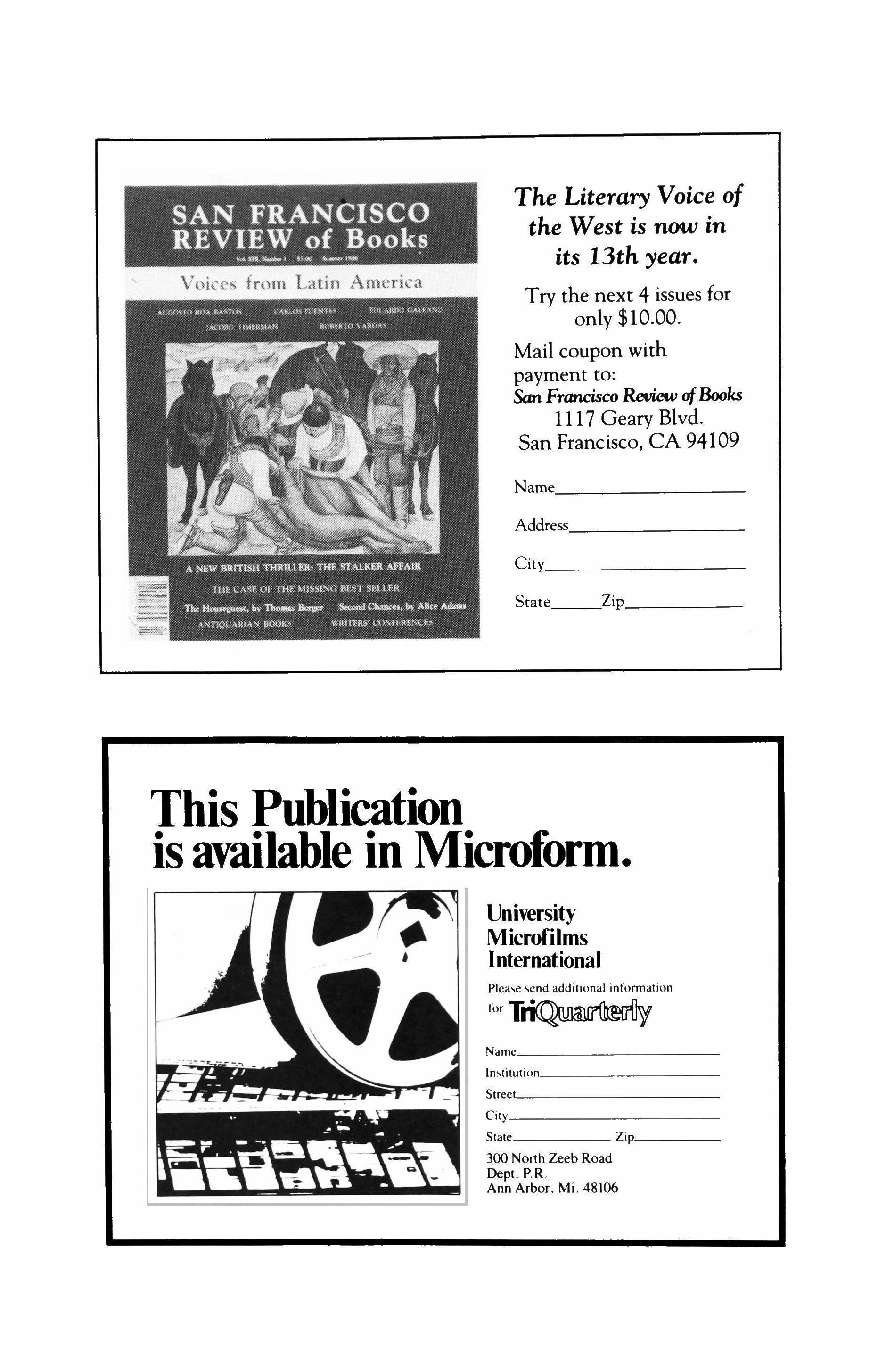
SAN FRANCISCO REVIEW of Books *",1I1:"'�1 �M� !b;_'� Vokes from Latin America The Literary Voice of the West is now in its 13th year. Try the next 4 issues for only $10.00. Mail coupon with payment to: San Francisco Review ofBooks 1117 Geary Blvd. San Francisco, CA 94109 Name Address City State Zip This Publication is available in Microform. University Microfilms International Plca e end additional information rorT� Name lnstitution Slrec� City State Zip 300 North Zeeb Road Dept. PR, Ann Arbor. Mi. 48106
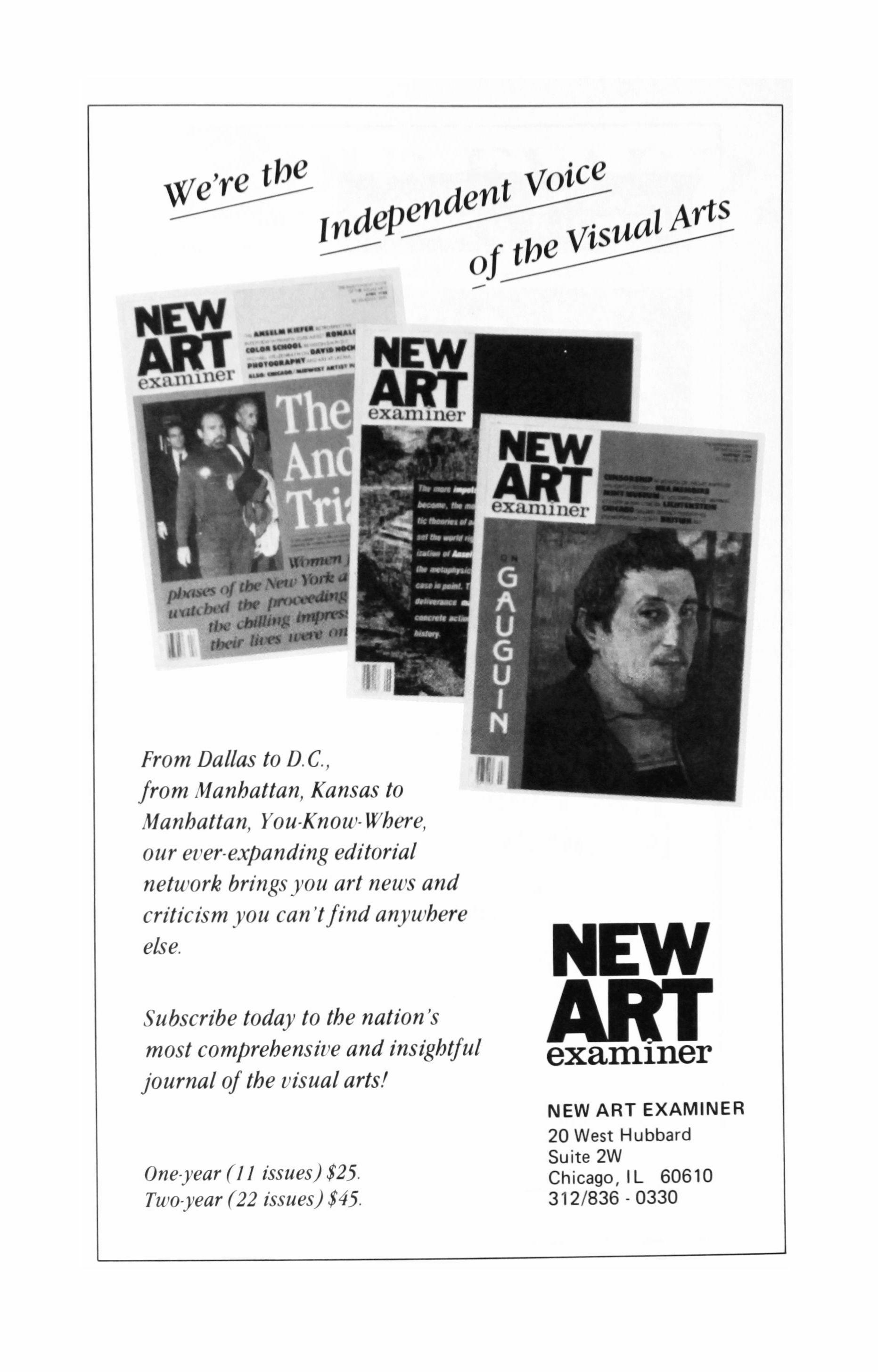
From Dallas to D. C; from Manhattan, Kansas to Manhattan, You-Know- Where, our ever-expanding editorial network bringsyou art news and criticism you can'tfind anywhere else.
Subscribe today to the nation's most comprehensive and insightful journal of the visual arts.'
One-year (J 1 issues) $25. Two-year (22 issues) $45. NEW ART EXAMINER 20 West Hubbard
312/836 - 0330
NEW ART examiner
60610
Suite 2W Chicago,IL
"One
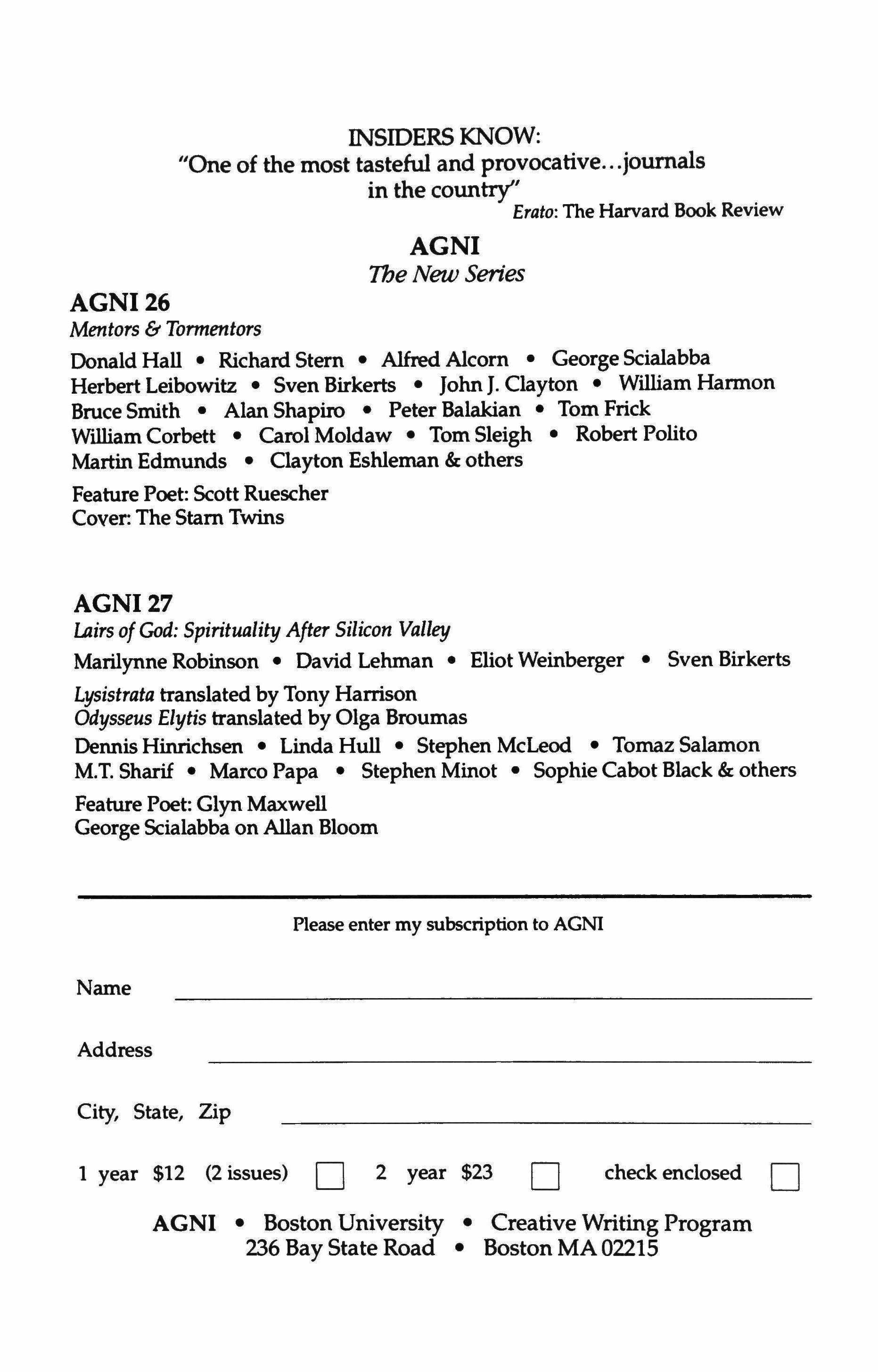
INSIDERS KNOW:
Erato: The Harvard Book Review
AGNI
The New Series
AGNI26
Mentors & Tormentors
Donald Hall Richard Stern • Alfred Alcorn • George Scialabba
Herbert Leibowitz Sven Birkerts • John J. Clayton • William Harmon
Bruce Smith • Alan Shapiro Peter Balakian • Tom Frick
William Corbett Carol Moldaw Tom Sleigh • Robert Polito
Martin Edmunds Gayton Eshleman & others
Feature Poet: Scott Ruescher
Cover: The Starn Twins
AGNI27
Lairs of God: Spirituality After Silicon Valley
Marilynne Robinson David Lehman • Eliot Weinberger Sven Birkerts
Lysistrata translated by Tony Harrison
Odysseus Elytis translated by Olga Broumas
Dennis Hinrichsen Linda Hull • Stephen Mcleod • Tomaz Salamon
M.T. Sharif Marco Papa Stephen Minot • Sophie Cabot Black & others
Feature Poet: Glyn Maxwell George Scialabba on Allan Bloom
of the most
journals
tasteful and provocative
in the country"
Please enter my subscription to AGNI
City, State, Zip 1 year $12 (2 issues) D 2 year $23 D check enclosed D AGNI • Boston University • Creative Writing Program 236 Bay State Road • Boston MA 02215
Name Address

TriQuarterly T-shirts of 50% cotton and 50% polyester, black with white design as shown above, are available for $8.00 each. TriQuarterly sweatshirts of 50% cotton and 50% polyester are also available, for $14.00 each.
Please specify size-small, medium, large or extralarge-and include $1.00 for shipping and handling for each order. Send check or money order to TriQuarterly, 2020 Ridge Ave., Evanston, IL 60208. (For Visa or Master Card charges, please include card number and expiration date.)
TriQuarterly
T-shirts
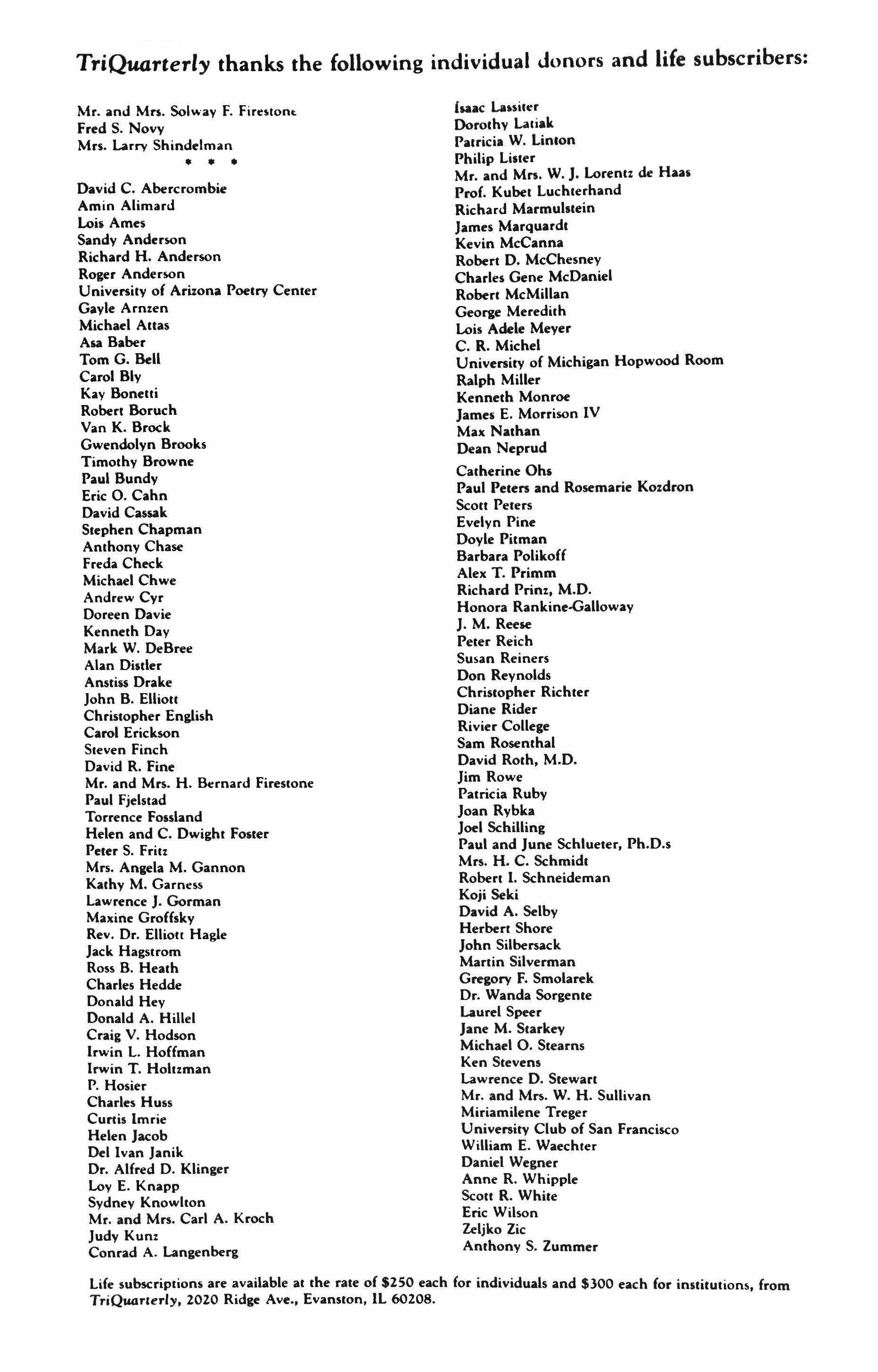
Mr. and Mrs. Solway F. Firestone
Fred S. Novy
Mrs. Larry Shindelman
David C. Abercrombie
Amin Alimard
Lois Ames
Sandy Anderson
Richard H. Anderson
Roger Anderson
UniversilV of Arizona Poetry Center
Gavle Arnzen
Michael Alias
Au Baber
Tom G. Bell
Carol Blv
Kay Bonetti
Robert Boruch
Van K. Brock
Gwendolvn Brooks
Timorhv Browne
Paul Bundv
Eric O. Cahn
David Casuk
Stephen Chapman
Anthonv Chase
Freda Check
Michael Chwe
Andrew Cvr
Doreen Davie
Kenneth Day
Mark W. DeBree
Alan Distler
Ansti" Drake
John B. Ellioll
Christopher English
Carol Erickson
Sleven Finch
David R. Fine
Mr. and Mrs. H. Bernard Firestone
Paul Fjelstad
Torrence Fossland
Helen and C. Dwighl Fosrer
Peler S. Frill
Mrs. Angela M. Gannon
Kathv M. Garne ss
Lawrence J. Gorman
Maxine Grof(skv
Rev. Dr. Ellioll Hagle
Jack Hagstrom
R055 B. Heath
Charles Hedde
Donald Hev
Donald A. Hillel
Craig V. Hodson
Irwin L Hoffman
Irwin T. HollIman
P. Hosier
Charles Huss
Cunislmrie
Helen Jacob
Del Ivan Janik
Dr. Alfred D. Klinger
Loy E. Knapp
Sydney Knowlton
Mr. and Mrs. Carl A. Krech
Judv Kuru
Conrad A. Langenberg
huc La"ilcr
Dorothv Laliak
Palricia W. Linlon
Philip Liller
Mr. and Mrs. W. J. Lorenez de Haas
Prof. Kubel Luchrerhand
Richard Marmuiliein
James Marquardl
Kevin McCanna
Robert D. McChesney
Charles Gene McDaniel
Robert McMillan
George Meredith
Lois Adele Mever
C. R. Michel
University o( Michigan Hopwood Room
Ralph Miller
Kenneth Monroe
James E. Morrison IV
Max Nalhan
Dean Neprud
Catherine Oh,
Paul Peters and Rosemarie Kcsdron
ScOIl Peters
Evelyn Pine
Dovle Pitman
Barbara PolikoU
Alex T. Primm
Richard Print, M.D.
Honora Rankine-Galloway
J. M. Reese
Peter Reich
Susan Reiners
Don Reynolds
Christopher Richter
Diane Rider
Rivier College
Sam Rosenthal
David ROlh, M.D.
Jim Rowe
Patricia Ruby
Joan Rybka
Joel Schilling
Paul and June Schlueter, Ph.D.s
Mrs. H. C. Schmidt
Robert I. Schneideman
Koji Seki
David A. Selby
Herbert Shore
John Silbersack
Martin Silverman
Gregory F. Smolarek
Dr. Wanda Sorgeme
Laurel Speer
Jane M. Starkey
Michael O. Stearns
Ken Stevens
Lawrence D. Stewarr
Mr. and Mrs. W. H. Sullivan
Miriamilene Treger
University Club of San Francisco
William E. Waechter
Daniel Wegner
Anne R. Whipple
ScOIl R. White
Eric Wilson
Zeljko lic
Anthonv S. lummer
TTiQuaTteTly
thanks the following individual donors and life subscribers:
Life subscriptions are �vailable ar rhe rate of $250 each (or individuals and $300 each (or instilulion ( Tr.Quarlerly, 2020 Ridge Ave., Evanston, IL 60208. 5, rom
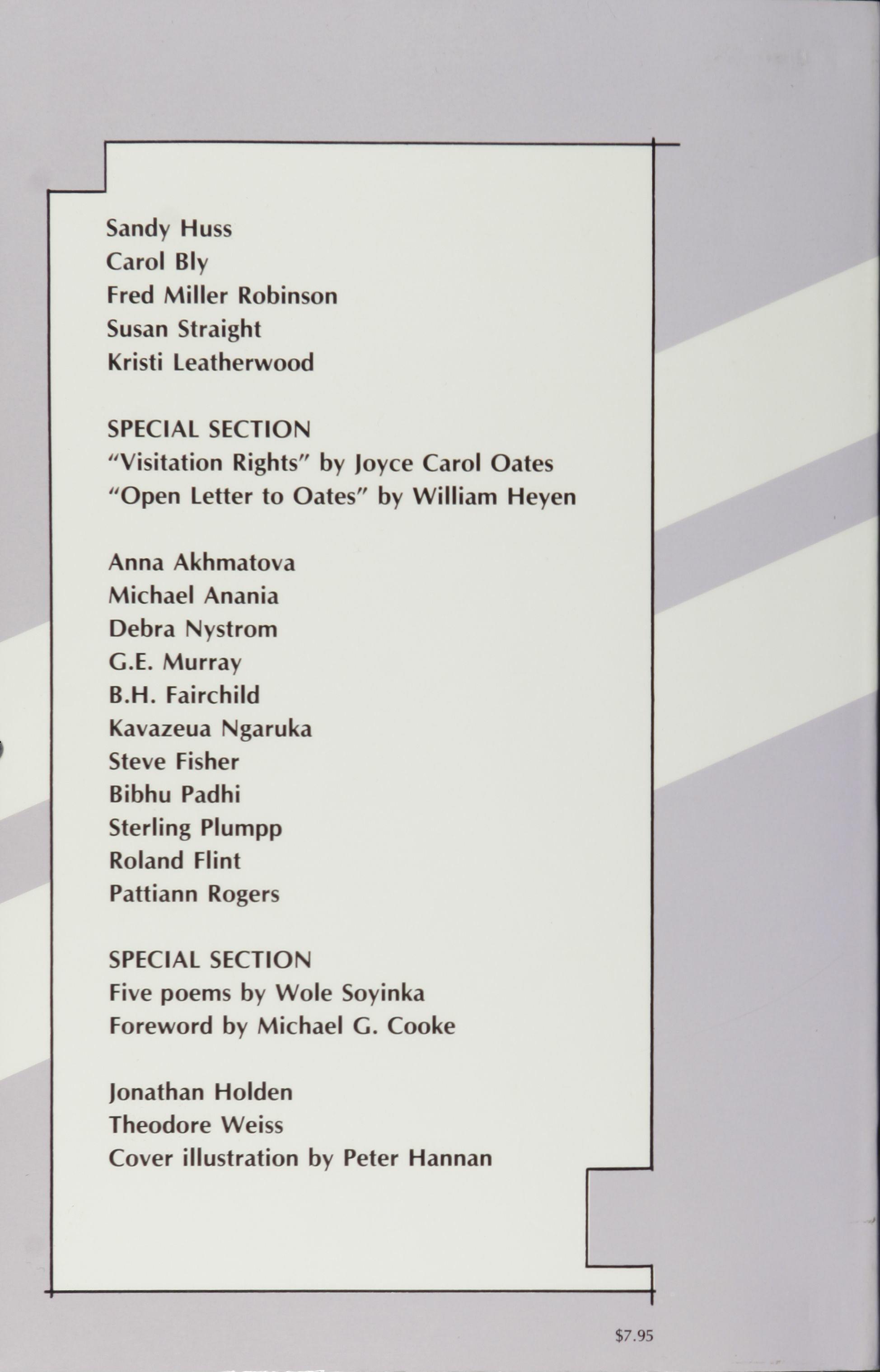
Sandy Huss
Carol Bly
Fred Miller Robinson
Susan Straight
Kristi leatherwood
SPECIAL SECTION
"Visitation Rights" by Joyce Carol Oates
"Open letter to Oates" by William Heyen
Anna Akhmatova
Michael Anania
Debra Nystrom
G.E. Murray
B.H. Fairchild
Kavazeua Ngaruka
Steve Fisher
Bibhu Padhi
Sterling Plumpp
Roland Flint
Pattiann Rogers
SPECIAL SECTION
Five poems by Wole Soyinka
Foreword by Michael G. Cooke
Jonathan Holden
Theodore Weiss
Cover illustration by Peter Hannan
I
I $7.95




















































































































































 lOT Odia Oleimun
lOT Odia Oleimun



























































